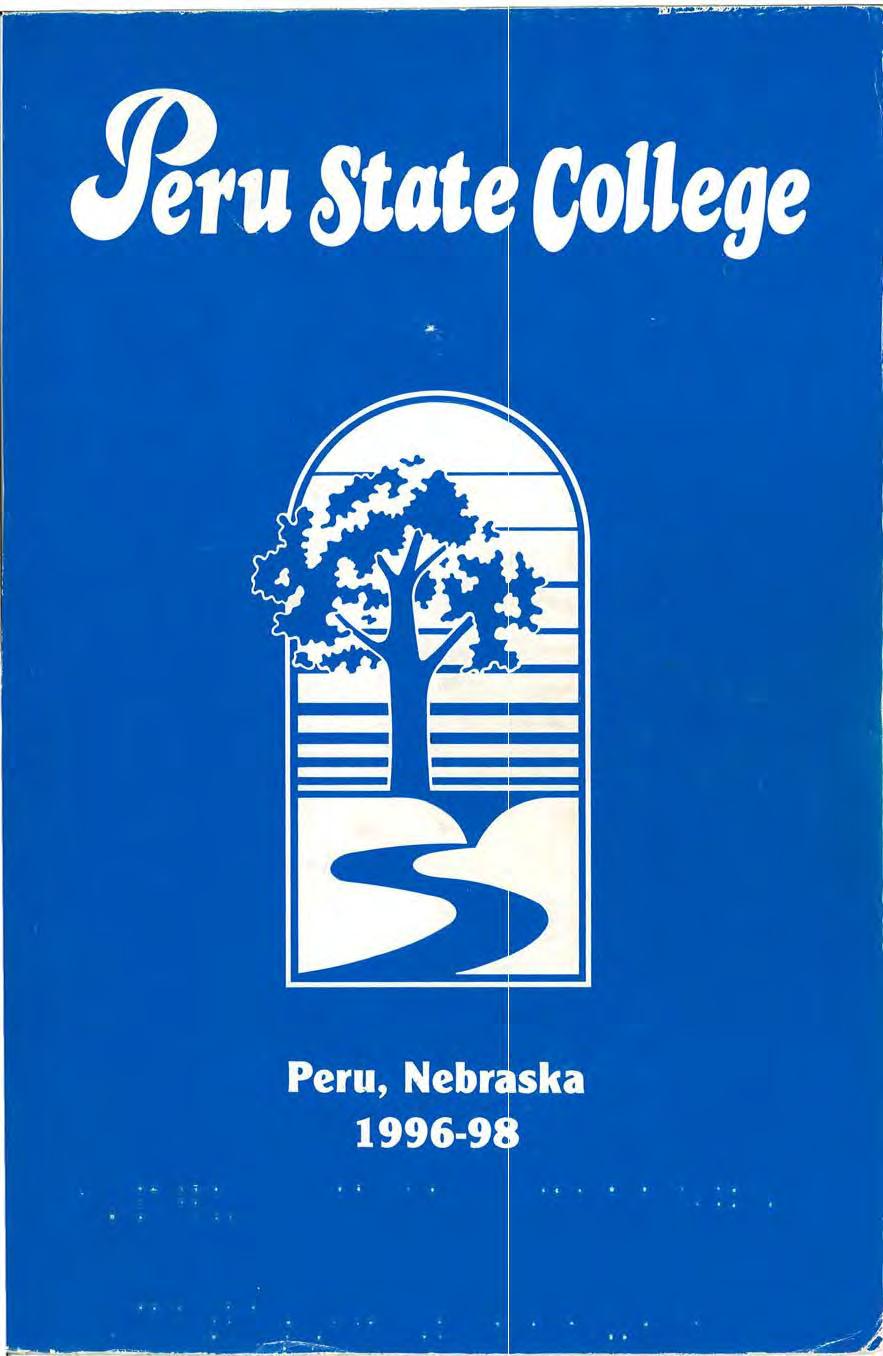

Information about student retention and completion as cequired by the Higher Education Amendments of 1976 is available throug h the Office of Student Affairs.
No person attending Peru State College shall, on the grounds of race, color, national origin, handicap, or gender, be excluded from participation in, be d enied of, or be s ubjected to discrimination under any program or activity receiving federal financial assistance. Inquiries regarding these matters s hould be directed to the Vice President for Administration and Finance.
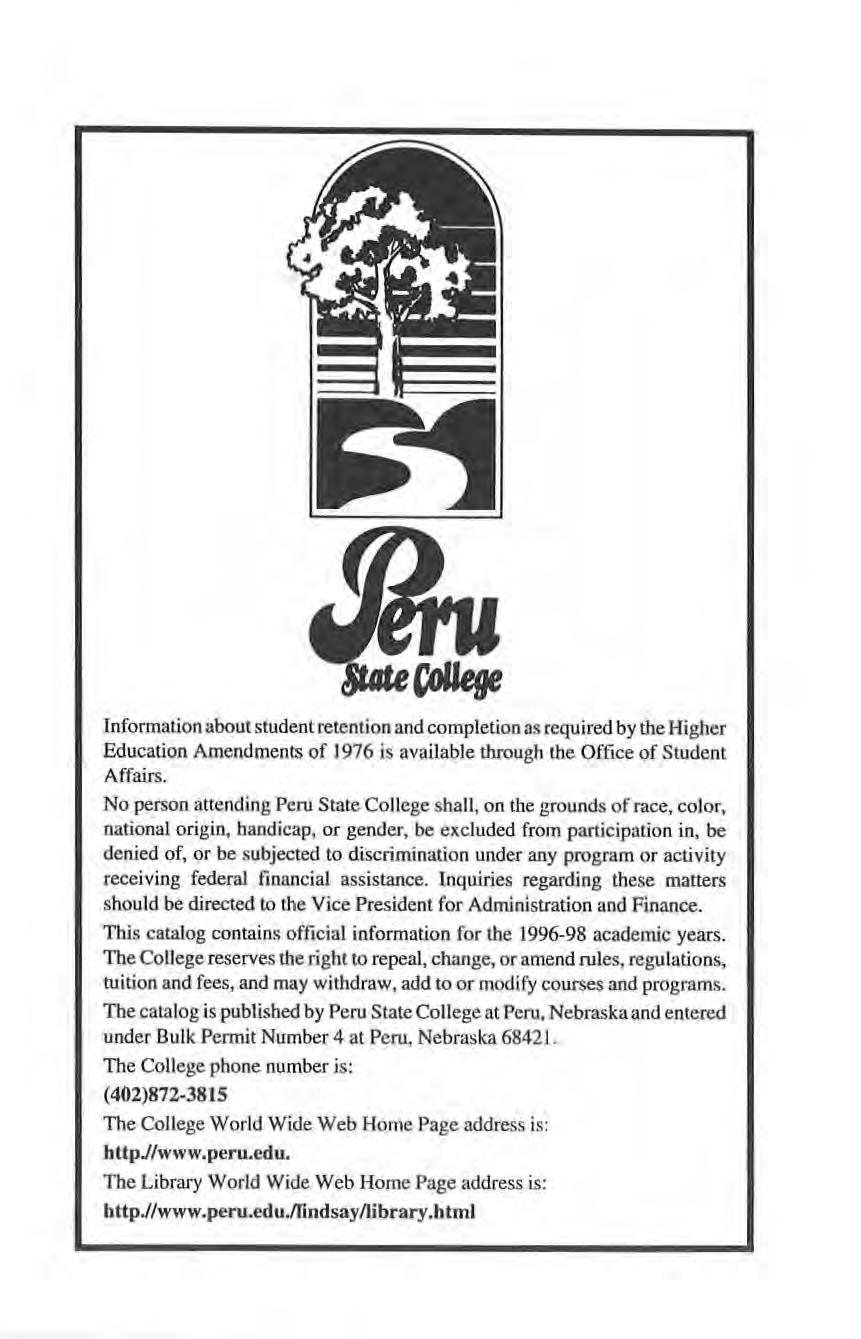
Thi s cata log conta ins official information for the 1996-98 academic years .
The College reserves the right to repeal, change, or amend ru les, r egu lations , tuition and fees, and may withdraw, add to or modify courses and programs. The c atalog is published by Peru State College at Peru, Nebr aska and e nt ered under Bulk Permit Number 4 al Peru, Nebraska 6842 L
The College phone number is: (402)872-3815
The College World Wide Web Home Page address is: httpJ/www.peru.edu.
The Library World Wide Web Home Page address is: http.//www.peru.edu./Iindsay/library.html

Co ll ege Calendar iii College History, Mission and Map ...... . ...... . .. .. ... .. ........... . ... 1 Admission .. ............................. ..... ............. . .. .......... 5 Expenses and Financial Aid ........ . ..... . ......................... , .... 11 Student Services ... . ..... .. ..... .. .. ............ .... ..... . ............. 30 Non-Academic Policies 43 College and Public Services 46 Undergraduate Degree and Program Information ...... .. ........... .. .. 48 Special Academic Programs 54 Academic Policies, R egulations & Procedures ........... .............. . 59 General Studies . ....... . . .. .. .................. ................... . .. .. 71 Personal Curriculum Guide 73 Degree Programs 75 Honors Program ........ ..... .. .. ...... .. ............................. . 77 Academic Programs Di vision of Business 81 Division of Education and Psychology . . ............................. 89 Division of Humaniti es .... .. ......... ... ........ . . ............. .... 103 Division of Science and Technology 120 Course Descriptions 140 College Personnel .... ....... ..... . ......... .. . . ... .... ............. .. . 230 Board of Trustees 230 Faculty 230 Staff..... . ..... . .. .. ....... . ................. ...... ... . .... .. . . ..... 232 Index 235
TABLE OF CONTENTS
1996-1998 ACADEMIC CALENDAR
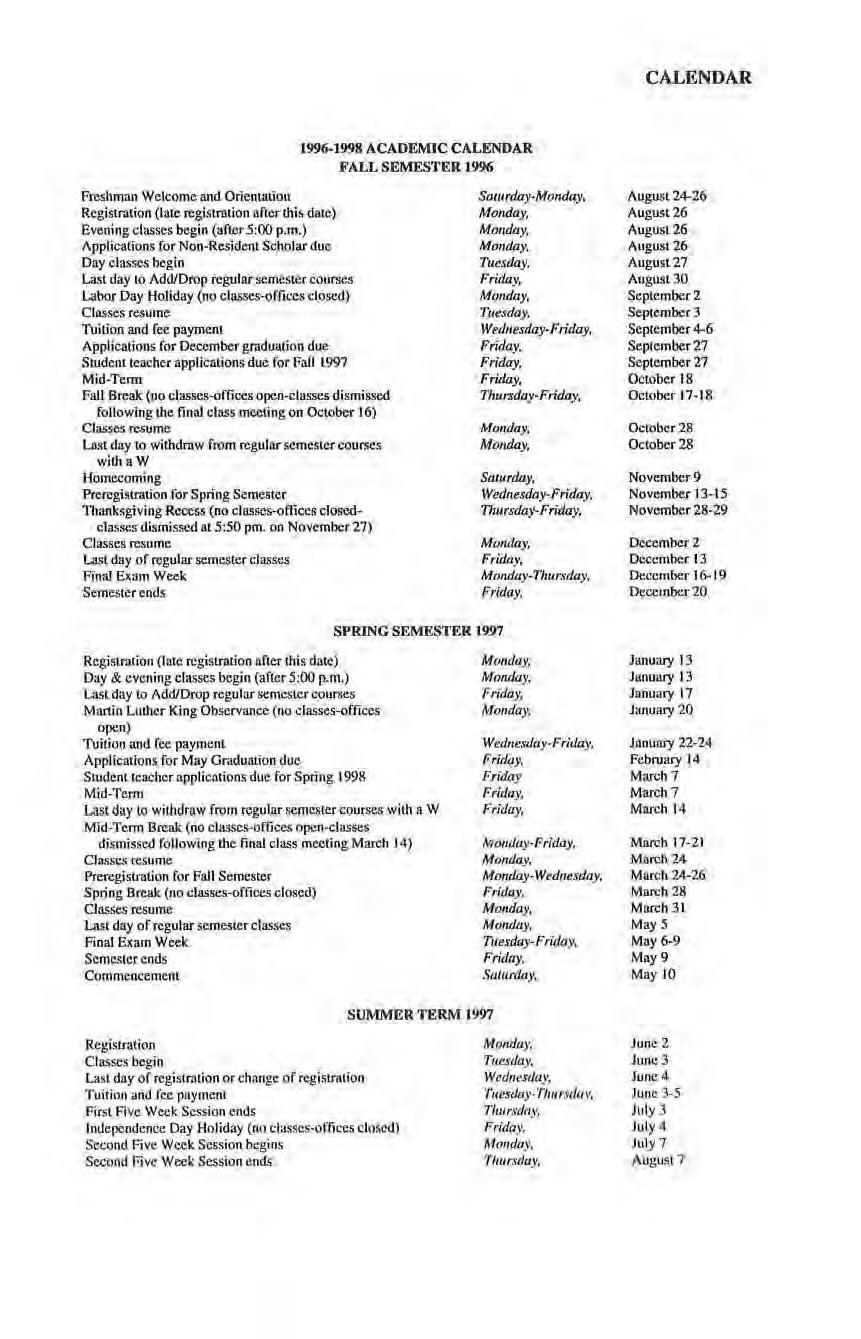
FALL SEMESTER 1996
CALENDAR
Freshman Welcome and Orientalion
Registration (late registnuion after this date) evening classes begin (after 5:00 p.m.)
/\_pplications for Noo-Resiacnt Scholar due Day cla"'se~ begin
Last day to Add/Drop rcgulnr semester courses
Labor Day Holiday (no classes-orti.ccs closed)
Cln.sses resume
Tuition and fee payment
Applications for December graduation due Student teacher applicaffons due for Fall 1997
Mid-Term Fall Break (no classes-oflices open-classes dismissed following the final clru.-s mecfing on October 16)
Cla.!>">05 resume
Lost day to withdraw from regular semc.~tcr cour.;c.~ withaW
Homecoming
Preregistration for Spring Semester
Thanksgiving Recess (nil classcs-oflices cl<lsedclasses dismissed at 5:50 pm on Novemhcr 27)
Classes resume
La,;t day of regular semester classes
Final: E am We<,k
Semester onds
SawrdQy-Monday, Monday, Mo11day, Monday. T"cstkiy, Friday, Monday, Tuesday Wed11esday-Friday, Friday, Friday, Friday, Thursday-Friday, Mo1Jday, Monday, Saturda)', Wednesday-Friday, Thurstil.ly-Friday,
Monday, Friday, Mm,day-Thursduy, Frid<1y,
SPRING SEMESTER 1997
Registration (late registration after lllis date) Day & evening classes begin (after 5:00 p.rn.)
Lal;I day to Add/Drop regu lar st:mClltcr COU™'S Martin Luther King Observance (no classes-offices open)
Tuitiou and (ce payment
Application~ ror May Gr•duation due Student teacher appl ic.11ions due ror Spring 1998
Mid-Tem,
I.Ml day \Q with\!rnw fl\lrJ• regular sern~ rer cour,;es with a W Mid-Tern, Break (no classes-offices open-cla.-ses dirn,isscd following lhc final class- meeting March 14)
Classes resume
Preregistration foe Fall Semester
Spring Break (nQ classes--orfices closed)
aas,;cs resume
Last day of regular semester classes
Final Exam Week
Semester ends
Commencement
Registration
Cla.~scs begin
August 24--26
August26
August26
August 26
August 27
August 30
September2
September)
September 4-6
September 27
September 27
Ocoobcr 18
October 17-18
October 28
Octobcr28
Novembcr9
November 13-15
November 28-29
Occcrnber2
December 13
December 16-19
D~cctnbcr20
Mo11day, Monday. Friday, Monday
\Ved11eS(/ay-Friuay, Fr-itla}\ Friday
Friday, Friday, lvio11day-f'riday, Monday. Monday-\V,dnesday, Friday, Monday, Mo11d11y, T11,sday-Friday, Friday, StJlurday,
SUMMER TERM 1997
Last day of registration or change of registration
Tuition and fee payment
First Five Weck Session ends
Independence Day Holiday (no classes-offices c losed)
Second Five Weck Session begins
Second Five Weck Session ends
January 13
January 13
January 17
January 20
Jnnuary 22-24
February 14
Murch 7
March 7
March 14
March 17-21
March 24
Murch24-26
Morch 28
Mnrch 3 1
May5
May 6-9
M~y9
May IO
Monday, T111!.!iday, Wedn esday, 1'1<csda.v-T/11o sday, Thwsdt1y, Friday. M onday. Thursduy,
June2
fonc3
June 4
June 3-5
July 3
Ju1y4
July ?
Augu~t 7
CALENDAR
Freshman Welcome & Orientation Registration (la te registration after this date)
Evcnrng classes begin (after 5:00 p.m.)
D,1y classes begin
Last day to add/drop regular semester ~lasses
F,\LL SEMESTER 1997
Lsoor Day Holiday (no claS$CS•Oflkcs closed)
Classes resume
Tuition and r.ie paymc11t
Applica!ioos for December Graduation due
Studcnlleacher applications due for Fall 1998
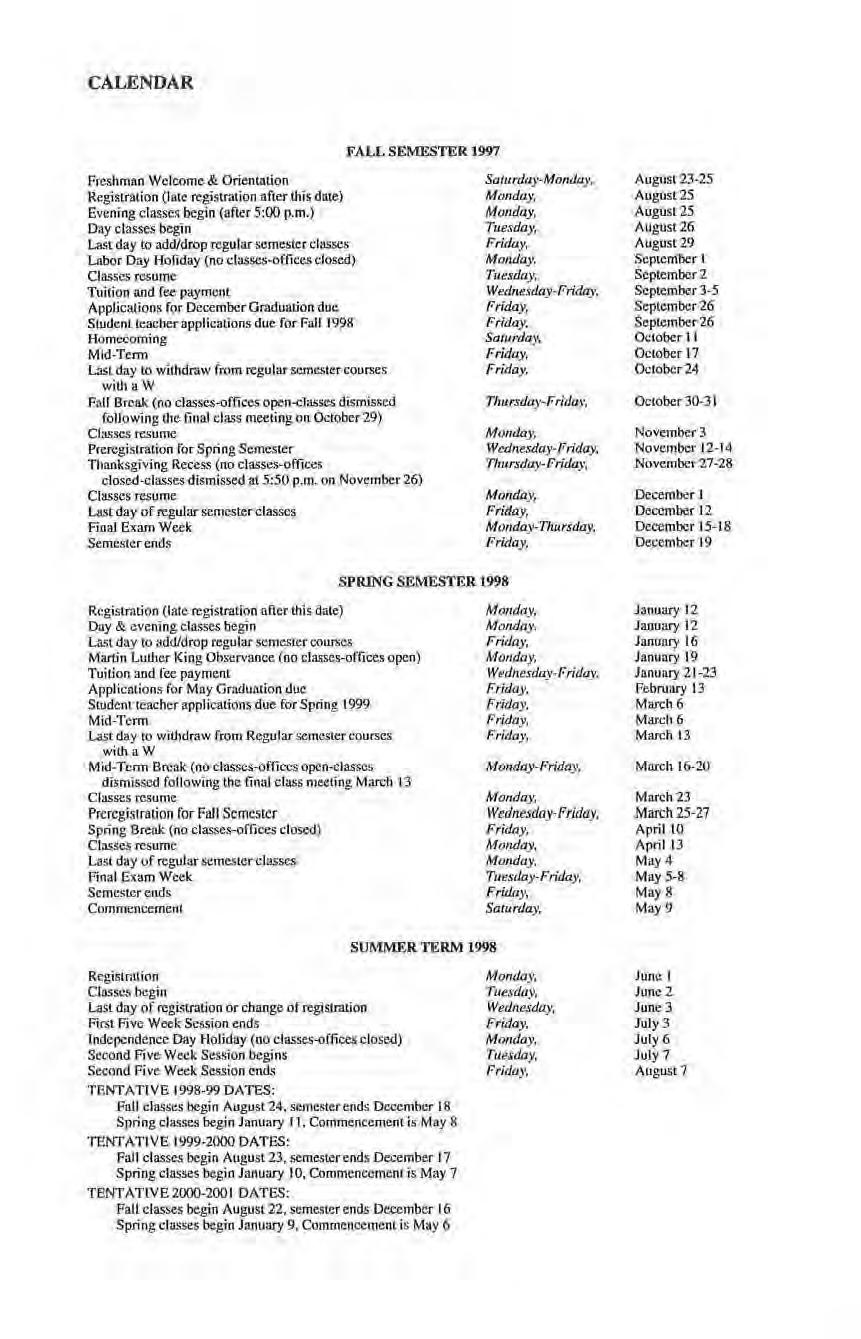
Ho mecoming
Mid -Tenn
Lasl day to withdraw from regular scrncstcr courses with a W
Fall Break (no classes-<ifficcs open~Iasses dismissed following lhe final class meeting on Octobcr29)
Classes resume
PreregislraLion for Spri ng Semc.~1cr
Tiio.nksgiving Recess (no c lasses-offices closed-classes dismissed at 5:50 p,m. on November 26)
Classes resume
Lasl day of regular semester classes
Final Exam Week
Scmcslcr ends
Sat11rdar-Mo11day, Monday, Mt.mday, Tuesday, Friday, Ma11day, 1i,esday, Wed11estloy-F riday, Friday, Friday. Sa1urday. Friday, Friday.
Tl,ursday-Friday, Mo11day, \Vednesda)• Priday, Thursday - Friday, Mo11day, Friday, Monday -Thi,rsday, Friday,
SPRING SEMESl'E.R \998
Rcgis1m1ion (la1c n:gislra(ion nl\er this date)
Day & e vening classes beg,n
l.."l.~t day 10 add/drop regular semester coun.cs
Martin LuU1er King Observance (no classes-offices open)
Tuition and fee payment
Applicntions for May Gr.1dua1ion due
Student 1eachcr applica1ion s due for Spring 1999
Mid-Term
Last day 10 wiU1draw from Regular semester courses with a W
Mid-Term Break (no classes-offices open-classes dismissed following Uie finw class meeting March 13
Classes resume
Prercgi~1rn1ion for Fall Somc.\Ict
Spring Brenk (no classes- offices closed)
C lasses :re,;ume
U!Sl day of regular i;emcsler classes
Final 6xam Weck
Sc-mt..~rer e.11ds
Commencemeul
Rcgislmtion
Cln.<SCS begin
Last day of registration or change of regis1ra1ion
First Five Weck Susfon ends
Independence Day Holiday (no dasses-0fficcs closed)
Secontl Five Week S~ion begins
Second Five Week SB&Sion end,;
TENTATIVE 1998-99 DATES:
Fall classes begin A ugust 24. semcslcrcnds December 18
Spring classes begin January 11. Commencement is Moy 8
TENTATIVE 1\/99-2000 OATES:
Pall classe.~ begin August 23, semester ends December 17
Spring classes begin January IO. Commcncemenl is May 7
TBNTATIVE2000-2001 DATES:
Fall classes begin August 22. scmeslerend6
December 16
Sprfog classes begin J:u,uary 9, Commcnce,uenl is M3y 6
Augusl :1.3-25
August25
August 25
Allgus126
August29
September I
Septcmbor2
September 3-5
September 26
September 26
Oclober 11
October 17
Oclobcr24
Oc1ober 30-31
November3
November 12-14
Novernber27-28
December I
December 12
December 15-18
Dee<:mber 19
Monday, Mo11day Friday, Monday. Wed11esduv, Friduv, Ftiday.Fridt,y, P,-iday, Friday, Monday"Fridtzy, Mo11daJ', Wednesday-Frida)', Friday, Mo11d1Jy, Ma11day, Tuesday-Friday, Friday, Saturday,
Mondm•, Tuesday, Wednesday. Friday, Mo11tla;y, Tuesday, Friday,
January 12
January 12
Januruy 16
January 19
January 21-23
February 13
March 6
March 6
March 13
March 16-20
Match 23
March25-27
April IO
April 13
May4
May 5-8
May8
May9
June I
June2
JuneJ
July3
July 6
July 7
August?
SOMMER TERM 1998
AN INTRODUCTION TO PERU STATE COLLEGE
Peru State College was founded in 1867 as Nebraska's first college and was the third teacher education ins titution established west of th e Mi ssouri River. For more than a century, thousands of young people have c rossed the Campus of a Thousand Oaks to become teachers and leaders i n Nebraska and throughout lhe nation.
The people of Nebraska have made the facilities of the College available to s tudents at a minimum of personal cost. The taxpayers of the sta te bear the maj or portion of the cost of educating the College's s tudents.
Peru State admits all graduates of accredited Nebraska high schools and qualified out-of-state students. The philosop hy of the College i s that each person is entitled to the opportunity to succeed at the collegiate level. All who have the ability and the willingness to work will have an excellent chance to s uccee d at Peru State.
The College believes in academic excellence, in opportunities for personal g rowth, and in student self- d e termination consistent with the principles of a democratic society. Administrative intent is to involve students in the decisions wh ich affect them. The College's educational experience is designed to enabl e s tude nts to learn, to equip themse l ves for meaningful careers, and to be productive members of society. Peru State s tuden ts have the opportunity to know their instructors well and to be working partners with the staff and other students. Living and working with other people offers many oppo1tunities for friend ship, growth, and personal developme nt.
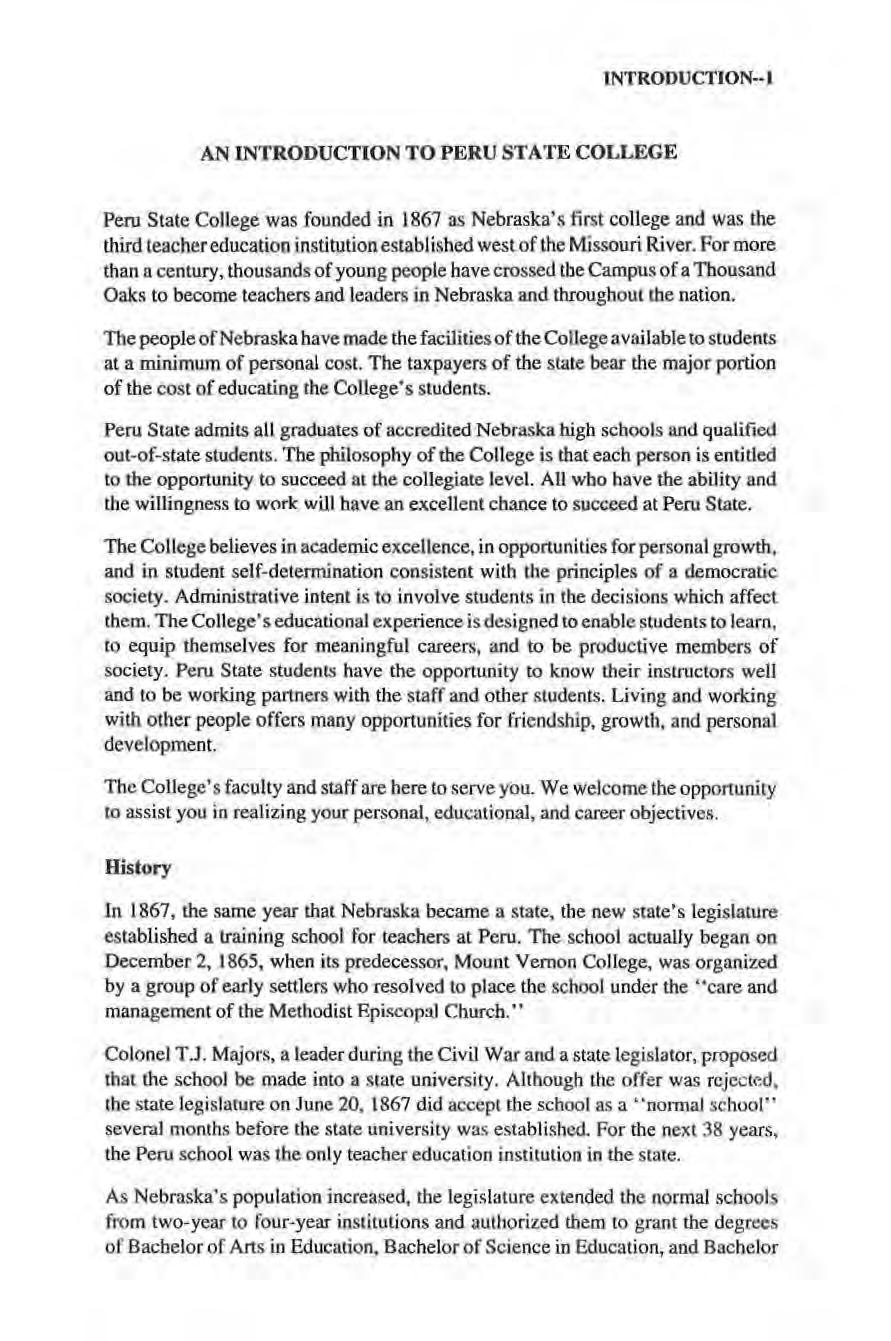
The CoUege' s faculty and staff are here to serve you. We welcome the opportunily to assist you in real izing your personal, educa tional, and career objectives.
History
In 1867, the same year that Nebraska became a state, the new state's legi slature establi shed a train ing school fo r teachers at Peru The school actually began on December 2, 1865, when its predecessor, Mount Vernon College, was organized by a group of early settlers who resolved to place the school under the "care and management of the Methodist Episcopa.l Church.''
Colonel T.J. Majors, a leader during the Civil War and a state legi s lator, proposed that the school be made into a state universi ty . Although the offe r was rejected, the s tate legislature o n J une 20, 1867 did accept the schoo l as a "nmmal sc hool" several months before the state university was established. For the next 38 years , the Peru schoo l was the o nly teach er educa tion instilution in the statt:.
As Nebraska 's population increased, the legislature exte nded the normal schools from two-year to four-year ins titution s and authoril.ed them to grant the degrees of Bachelor of Arts in Education, Bachelor of Scie nce in Edu ca tion, and Bachelor
JN'fRODUCTION--1
of Fine Arts in Education. A t the same time, the name of the school was changed from State Normal School to State Teachers College. fn 1963, Peru's name was changed to Peru State College. When the United States entered World War II , the College trained officers for the armed forces. The first of an eventual 500 men in the Navy's V-12 program arrived on camp us July I, 1943. The College operated an accelerated program for both civil ian students and naval trainees. ln 1949, the legis lature authorized the Nebraska State College.,; to confer the Bachelor of Arts degree. The Bachelor of Science deg ree was authorized in 1965. Emerging from its role as a single-pwpose teachers college, the College is now a regional state college offering a wide variety of programs to meet the changing needs ofsoutheast Nebraska and beyond.
Philosophy
Peru State College is committed to the belief that all persons are endowed with potential which, if developed, will benefit both the in dividual and the society. Each person who is exposed to the influences of the College is encouraged to develop his or her potential as well as understand and appreciate the contributions of others. Individual development can be accomplished through formal study and exposure to a variety of experiences both on and off campu s. It is the result of the reasonabl e mastery of knowledge, acquisition of certain skills and techniques, appreciation and understanding of areas beyond narrow personal interests, and meaningful religious and social experiences.
M.ission
Peru State College is a multi - purpose, state-assisted, regional institution offering a variety of educat ional opportunities to the students of Nebraska a nd the nation. Founded in 1867 as P eru Normal School, the College is accredited by the North Central Association of Colleges and Schools and the National Council for Accreditation of Teacher Education. Peru S tate is committed to providing high quality instruction, personalized attention, and a s upporti ve learning environment for s tudents of diverse abi lities. l ts principal baccalaureate programs in teacher education, business, and the libera l arts and sciences are complimented by numerous preprofessional, occupational, and continuing education programs. A Masters degree in Education is also offered.
TI1e College believes in a strong, coherent general education program designed to ensure that its graduates: I) can write, speak, and compute effectively, 2) are computer literate, 3) can think critica ll y and independently, 4) are open to and have the capacity for c ha nge, 5) are prepared to assume their social and civic roles as leaders in an increasingly interdependent world, and 6) are equipped to pursue lives that are intellectually, ethically, aes thetically, and physically rewarding.
Students are encouraged to participate in a balanced program of co-curricular activities. These group or individual activities include cultural, social, and physical
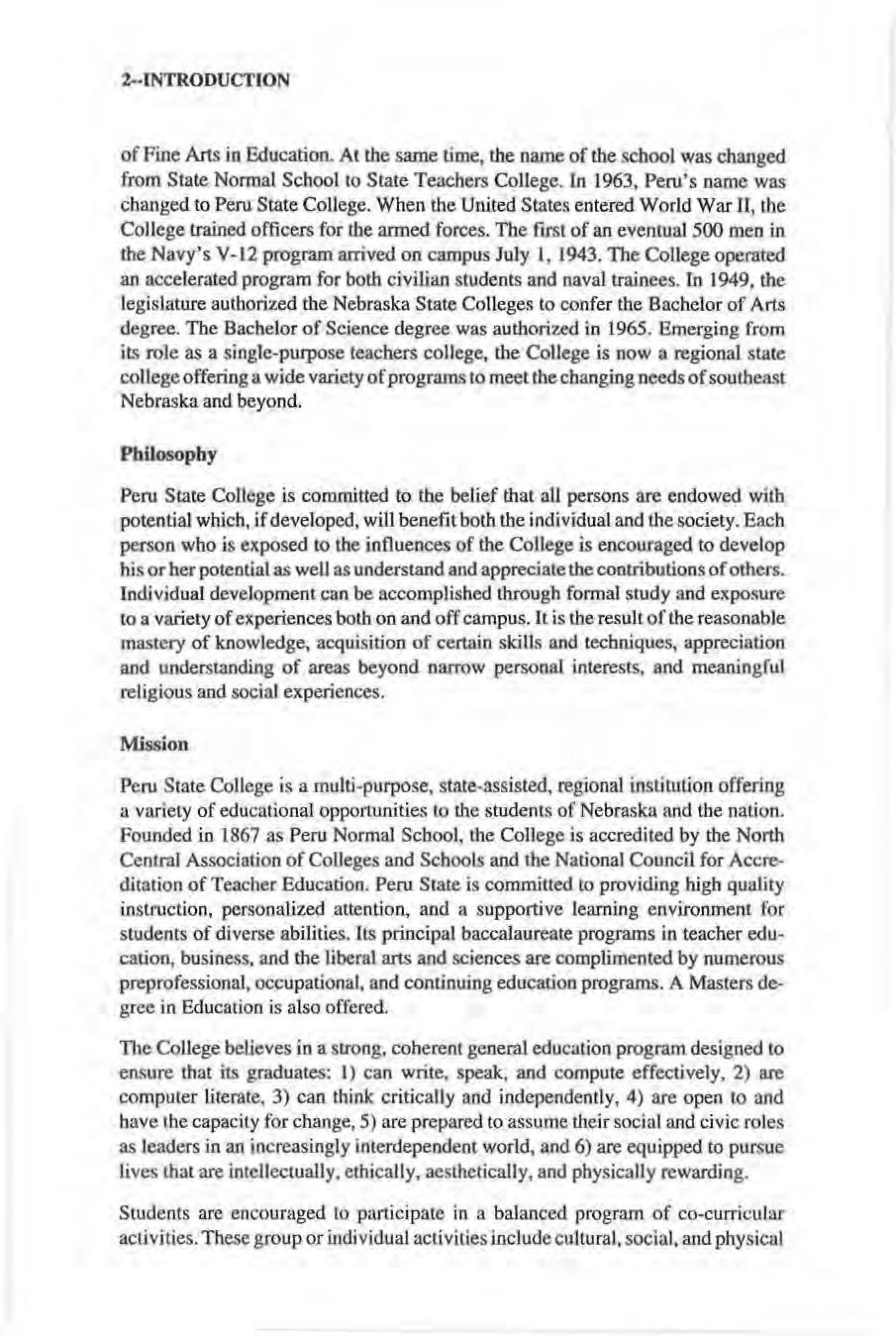
2--INTRODUCTJON
pursuits which augment or support the instructional program, sustain tradition, and strengthen the college community.
The College is committed to continuing and enhancing its role as a center for regional development. Through its cultural, educational, research and public service efforts, Peru State assists other institutions and agencies i n community and economic development for the benefit of all.
Goals
In order to fulfill its mission, Peru State has establ ished the following goals:
* To increase the qua lity and diversity of programs to persons with differing aptitudes, interests, and needs.
* To intensify its milieu of academic excellence.
* To enhance the inte.llectual cooperation between the liberal and applied arts.
* To promote the involve ment of both students and faculty in experimental and creative research.
* To strive to be a more effective public service institution.
* To offer continuing and occupational education for person al and career enrichment.
* To explore new and creative educational opportunities for students.
* To serve as a transitional educational institution for s tudents pursuing various occupational or professional objectives.
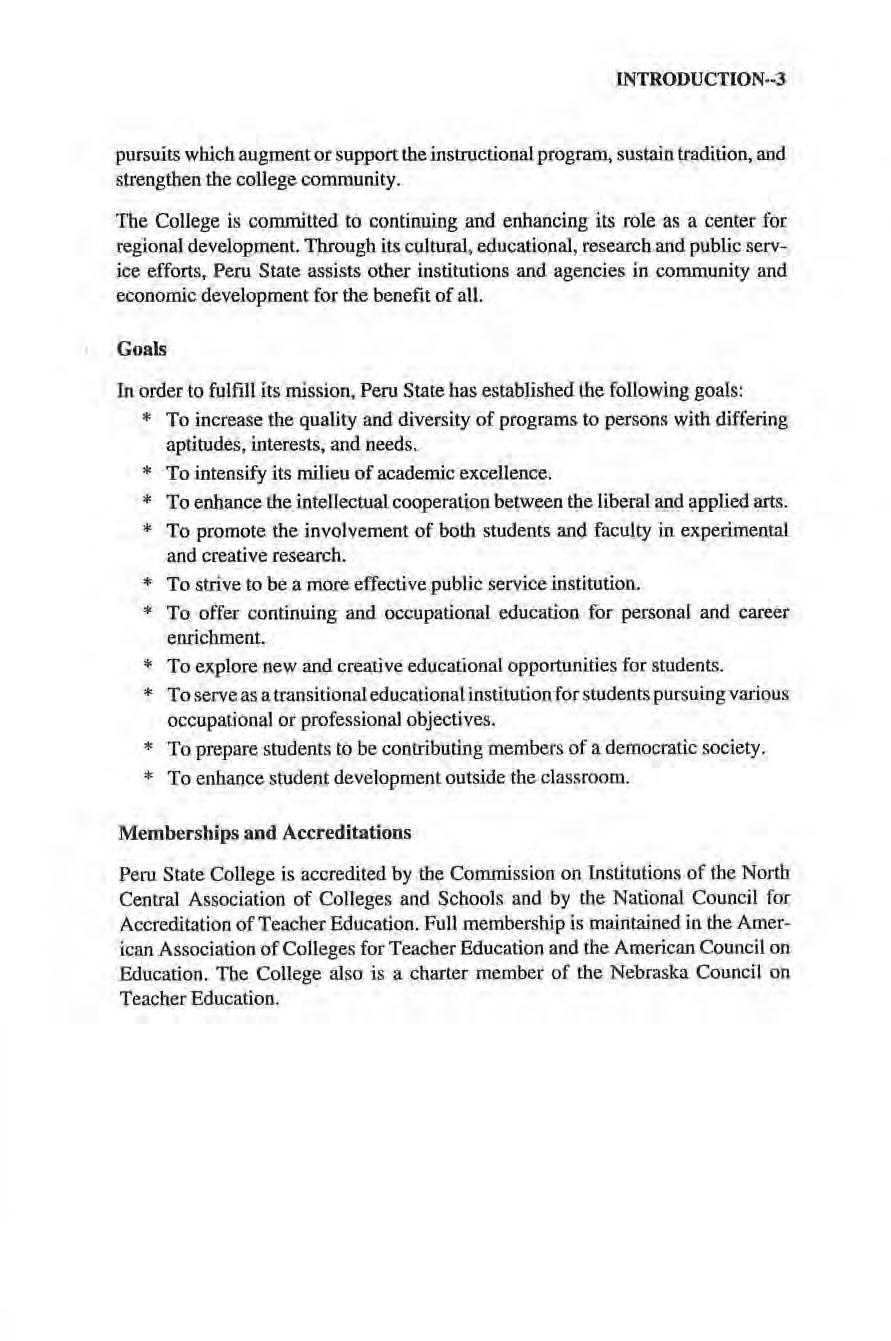
* To prepare students to be contributing members of a democratic society.
* To enhance student development outside the classroom.
Memberships and Accreditations
Peru State College is accredited by the Com.mission on Institutions of the North Central Association of Colleges and Schools and by the National Council for Accreditation of Teacher Education Full membership is maintained in the American Association of Colleges for Teacher Education and the American Council on Education. The College also is a charter member of the Nebraska Council on Teacher Education.
INTRODUCTION--3

PERU STATE COLLEGE dV Peru 2S State College INDEX OF BUILDINGS 27 e 16 7,3 D D 0 1 o11 1•t11,u l•• 2 ,..,11.,1. ai ll• C:•~•.-.i~:~.~;:t~:: ::w•u•H,11, ti CJ1,hr•••h1 • c w 1 Htl l ,: Hlt ll,al u ·l'III Ht.11 p I. Admin is trat io n Building 2. A uditorium 3. Hoyt Science Hall 4. Jindra Fine Arts Building 5. Library l , H6}'1 Stluu Hi ll • Jl • •n Pl11t. A. flt lalllh 1 J 1,11,,.,, :: r~:j.:~~:~;:r:?••1111:u•I t $1•l rH Cu,l•t 10, ll1 u M ••" •ui.1 11u H II 11 f'u • 11J' Ap•1uua11 U, ~~i~~~j•f:.n~::, lllll 1' Al Wlu tu ,\,li•ll J CtoUI ::: ~~.'\~:1•~: .'i,'1\1 tl hld Peru State College Peru, Ne braska 68421 INDEX OF BUILDINGS • 1'u11h11 II B1u.l11lt r1r14 I t. tl11lu l P-l ur 1 0 Ah, al H u u )I 01 u al o•u U O u 1 11 i, o, , llill so•••• Af,U1•••" 2, rlr ld H u JS U ••r tl l lb a• hullu ,111~ 26 hft••II Ph l d n r,ettlu l'l• l.t r ""••• P t rl h J 17. Cen tennial Complex Residence Halls
Davidson-Palmer Hall
Clayburn- Mathe ws Hall
Nicholas- Pate Hali
Neal Hall 6. Physical Education ub/Art De partment 18. Ba.sebal I Field 7 T. J Majors Building 19. Physical Plant 8. Larson Building 20. Alumni House 9. S tudent Center 2 1. Greenhouse 10. Eli,.a Morg an Residen ce Hall 22. Garage JI. Faculty Apartments 23. Oak Hill Stude n t Apartme nts 12. President's Home 24. Field House 13. lkllcll Reside nce Hall 25 Intramural/Bnnd Practice Field 14 . Al Wheeler Ac tivity Center 26. Softbal l Field 15. A. D Majors Hall 27. Practice Field 16 Oak Bo wl Athle tic Fie ld P. Student Pari< ing
a.
b.
C.
d
ADMISSION
Pero State College welcomes applications from students who wish to pursue their educational and vocational goal s.
Entering Freshman
Admission to Peru State College (PSC) is granted to students who have graduated from accredited Nebraska high schools and who have not previously attended college, or out-of-state students who meet the Co ll ege's admissions standards.
Entering freshmen who are seeking an undergraduate degree should follow these steps for admission to Peru State College:
I. Submit an application for admission to the Office of Admissions.
2. Submit a nonrefundable application fe.e of$ l 0.00 with the application form.
3. Provide an official transcript. Request that your higli school Records Office mail an official transcript which bears the seal or other official des ignation of the institution directly to the PSC Office of Admiss ions. The transcript should include at least at six semesters of study up to your Senior year. Immediately upon graduation from high school you will need to submit a finaJ high school transcript indi cati ng your graduation date, cumulative grade point average, and class rank. Out-of-state applicants must have a minimum c umulative grade point average of 2.0 or "C" average.
4. Provide tes t scores. Request that the results of your ACT (American College Test), or SAT (Scholastic Aptitude Tes t ) be sent to the PSC Office of Admissions by iodkating PSC as a recipient of your scores or by contacting the appropriate testing agency if the tes t has already been taken. Out-of-state applicants mus t have minimum composite scores of 14 on the ACT or 560 on tbe SAT. Students who have been high school graduates for more than one year, or who bold tbe GED, do not need to submit test scores. Out-ofstate applicants who do not meet the minimum requirements outlined above may be admitted by submitting a letter of recommendation from their high school counselor.

5 . Submit the PSC Medical Form. This form i s available from the PSC Office of Admi ss ions. This information is not used to eva luate an applicant for admission to the college. The completed form is forwarded to the PSC Health Center. The information is used to provide the medical staff with a confidential medical history which is used should medical treatm e nt become necessary. Proof of medical immunizations is required for admission.
When to apply. You may apply for admission after you have completed your junior year. It is recommended that you apply during the first semester of your senior year or at least six months in advance of the semester in which you plan to e nroll. Please h ave all paperwork submitted by August J for fall enrollment.
ADMISSION--5
College Trans[er Students
Peru State College accepts transfer students from other accredited colleges and universities (see below for ''Seamless Transfer''). Transfer students who are seeking an undergraduate degree should follow these steps for admission to Peru State College:
l. Submit an application for admission to the Office of Admis sions.
2. Submit a nonrefundable application fee of $10.00 with the.application form.
3. Provide an official transcript(s). Request that the Office of the Registrar of each college or university you have attended forward an official transcript directly to the PSC Office of Admissions . A transcript is required from each postsecondary institution in which you have been enrolled whether or not credit was earned An official high school transcript is also req uired if you have completedfewer than 30 transferable semester credits. To be considered official, a transcript must be sent to the Office of Admissions directly from the issuing institution and wust bear the seal or other official designation of the institution.
4 . S ubmit a Transfer Student Report from the last postsecondary institution attended. These forms are available from the PSC Office of Admissions. The studen t must complete the top section of the form and forward the report to the last postsecondary institution attended. The ins titution completing the transfer student report form must forwa rd the information directly to the PSC Office of Admissions Transfer Student Report forms are not required of students who have completed a college degree.
5. Submit the PSC M edical Form. This form is available from the PSC Office of Admissions. This information is not used to evaluate an applicant for admission to the coUege. The co mpleted form is forwarded to the PSC Health Center. The information is used to provide the medical staff with a confidential medical history which is used shou ld medical treatment become necessary Proof of medical immunizations is required for admission.

When to apply. You may apply for admission during your final year of attendance at another college or university. Please have all paperwork submitted by August 1 for fall e nrollment
Transfer of Credit. After the 'Studen t has been admitted, an official evaluation (Progress Sheet) is completed which identifies the applicability of previous work to the student's expressed major and degree program.
A maximum of 66 semester credit hours from a vocational/technical/community college may be applied toward the minimum 125 semester hours required for a bachelors degree.
A maximum of 95 semester credit hours from a regionally accredited four-year college or university may be applied toward the minimum 125 semester hours required for a bachelors degree.
6--ADMISSlON
Transfer students who already have a significant amount of credit hours toward their major will have their transcripts rev iewed by the appropriate D i vision Chairperson.
Students who seek admission and are accepted while on probation from their last college are placed on probation for one semester and are subject to all the policies of probation at tbe College.
Students who have been suspended from another college will not be considered for admission until the period of suspension has expired and the facts of the dismissal are provided.
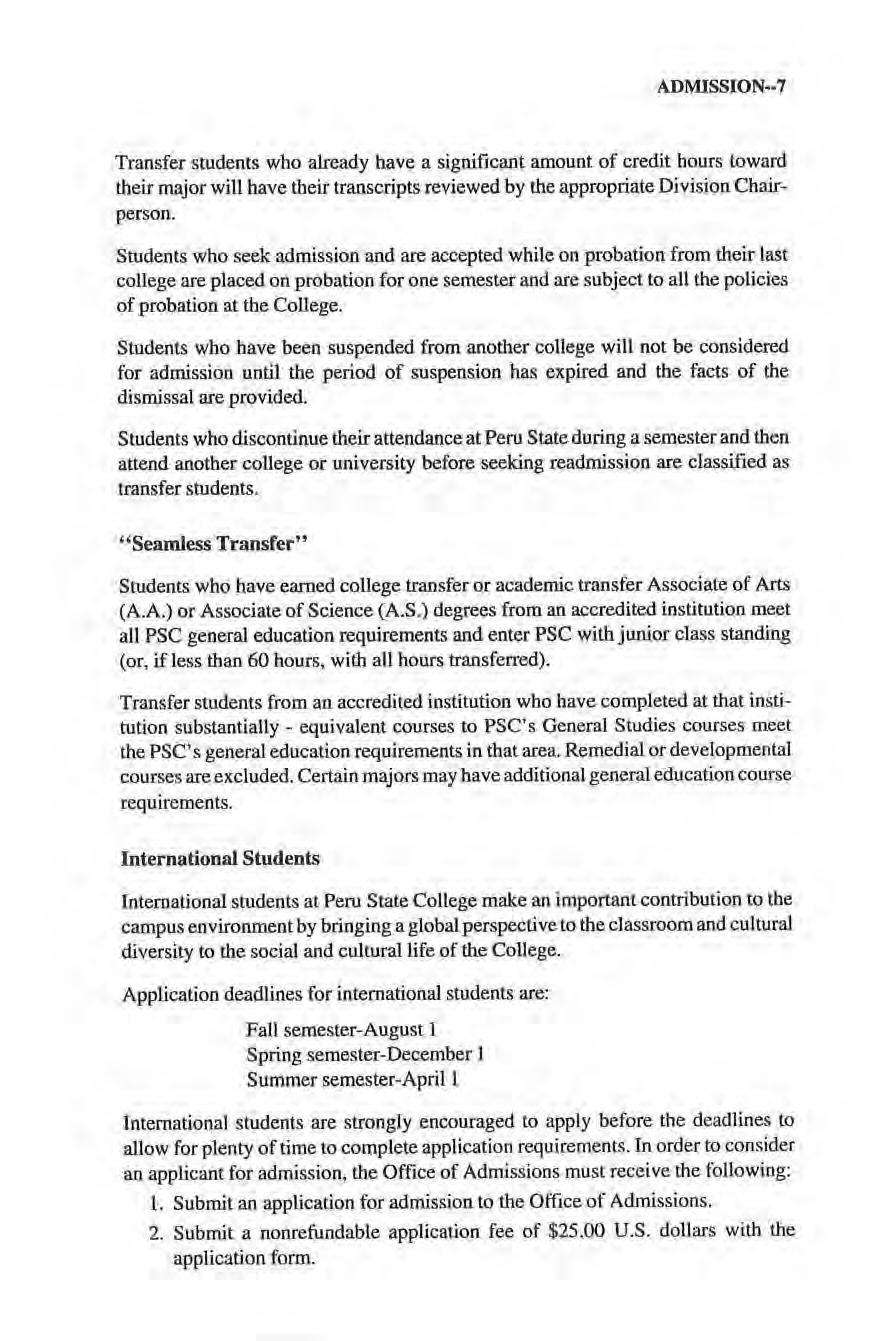
Students who discontinue their attendance at Peru State during a semester and tben attend another college or university before seeking readmission are classified as transfer students.
"Seamless Transfer"
Students who have earned college transfer or academic transfer Associate of Arts (A.A.) or Associate of Science (A.S.) degrees from an accredited institution meet al] PSC general education requirements and enter PSC with junior class standing (or, if less than 60 hours, with all hours transferred).
Transfer students from an accredited institution who have completed at that institution substantially - equivalent courses to PSC's General Studies courses meet the PSC's general education requirements in that area Remerual or developmental courses are excluded. Certain majors may have additional general education course requirements.
Ioteroational Students
International students at Peru State College make an important contribution to the campus environment by bringing a global perspective to the classroom and c ultural ruversity to the social and cultural life of the College.
Application deadlines for international students are:
Fall semester-August I
Spring semester-December I
Summer semester-April 1
International students are strongly encouraged to apply before the deadlines to allow for plenty of time to complete application requirements . ln order to consider an applicant for admission, the Office of Admissions must receive the following:
l. Submit an appljcation for admission to fue Office of Admissions.
2. Submit a nonrefundable application fee of $25.00 U.S. dollars with the application form.
ADMISSION--7
3. Official transcripts of all academic work. These incl ude:
a. Secondary school records. Send a complete, year-by-year, official record of all schooling beyond the ninth year of education, including any certificates or diplomas earned. An English translation is required in addition to the original s.
b. College or university records (if applicable). Send a complete, year-byyear official record of academic performance for all postsecondary schooling including any certificates or diplomas earned. An English translation is required in addition to the originals.
For admission to PSC, average marks during schooling and on final examinations must be a minimum 2 .0 grade point average in the PSC grading system In the PSC grading s ystem, A is 4.0, B is 3.0, C i s 2 .0, D is 1.0 and F 0.0. International students may need to send their transcripts to an international credentials evaluation service for evaluation. The students will be notified by the Office of Admissions if this is necessary and will be sent a list of agencies that perform this service. The cost will depend upon the type and complexity of the evaluation.
4. Evidence of English lan guage proficiency. Scores from the T est of English as a Foreign Language (TOEFL) must be provided by those who come from areas in which English is not the dominant language spoken and written. The minimum acceptable score is 525 for an undergraduate. An individual mus t be proficient at speaking and writing English to be exempt from this step.
5. International Student Financial Certificate and supporting documents . A oneyear guaranteed funding source is required of all international students.
6. Submit th.e PSC Medical Form. This form is available from the P SC Office of Admissions. Th.is information is not used to evaluate an applicant for admissions to the college. The completed form is forwarded to the PSC Health Center. The information is used to provide the medical s taff with a confidential medical history which is used should medical treatment become necessary. Proof of medical immunizations is required for admission. Upon ad.mission to Peru State College, the student wjlJ be sen t a Form 1-20. The pros pective s tudent tlien talces the 1-20 and other supporting academic and financial documents to the nearest U.S. embassy or consulate to apply for an F ~l (student) visa.
Admission of Non-High School Graduates Seeking a Degree
Pem State College requires verification of high school graduation prior to enrolling as a student seeking a degree . For the srudent with a nontraditional educational background, PSC accepts the successful completion of the General Education Development test (GED) in lieu of a formal high school diploma. Non-high school graduates seeking a degree should follow these steps for admission to Peru State College:
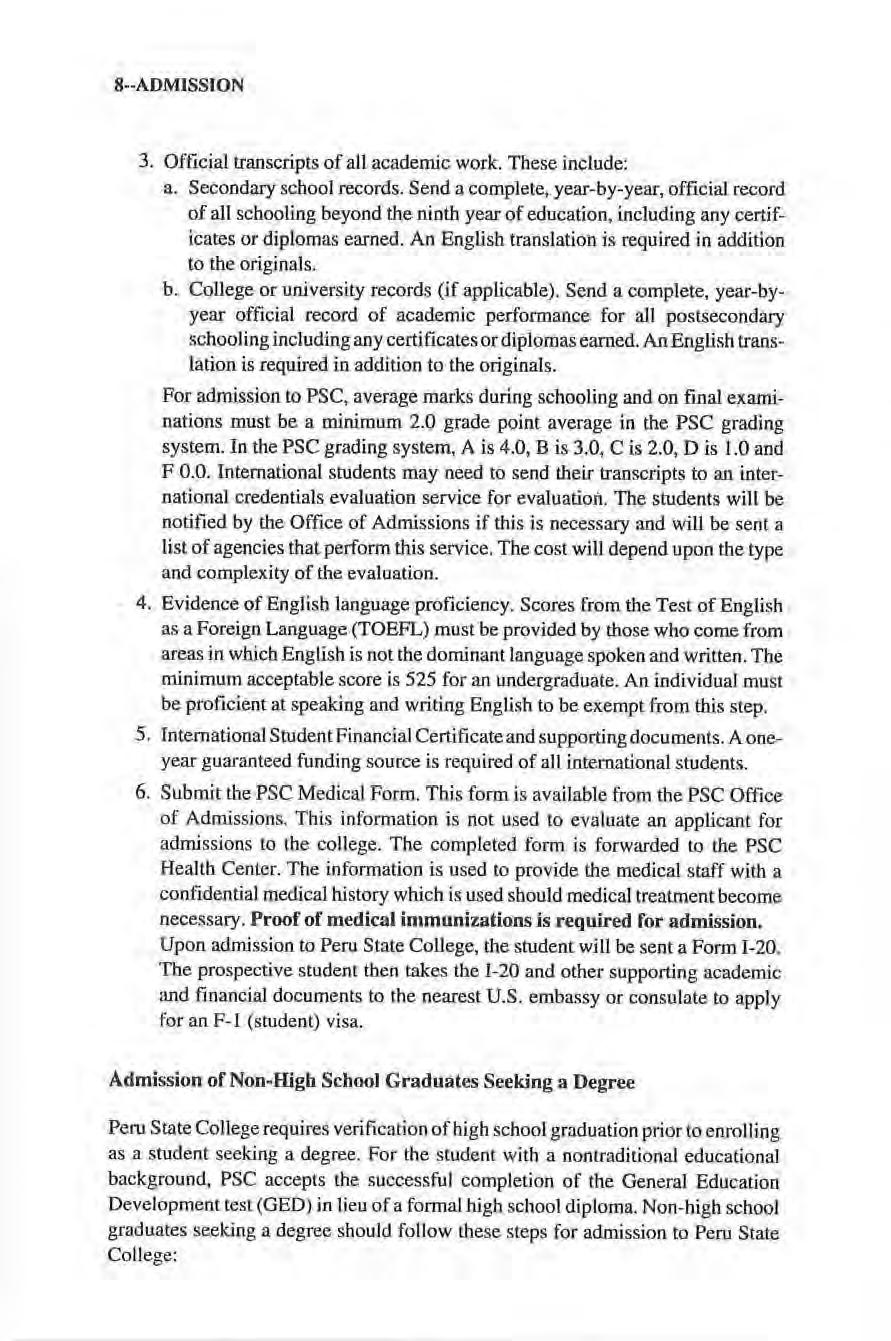
8--ADMISSION
l. Submit an application for admission to the Office of Admissions.
2 . Submit a nonrefundable application fee of $10.00 with the application form.
3. Provide an official copy of General Education Development test (GED) results.
4. Submit the PSC Medical Form. This form is available from the PSC Office of Admissions. This infonnation is not used to evaluate an applicant for admission to the college. The completed fonn is forwarded to the PSC Health Center. The infor mation is used to provide the medical staff with a confidential medical history w hich is used should medical treatment become necessary. Proof of medical immunizations is required for admission.
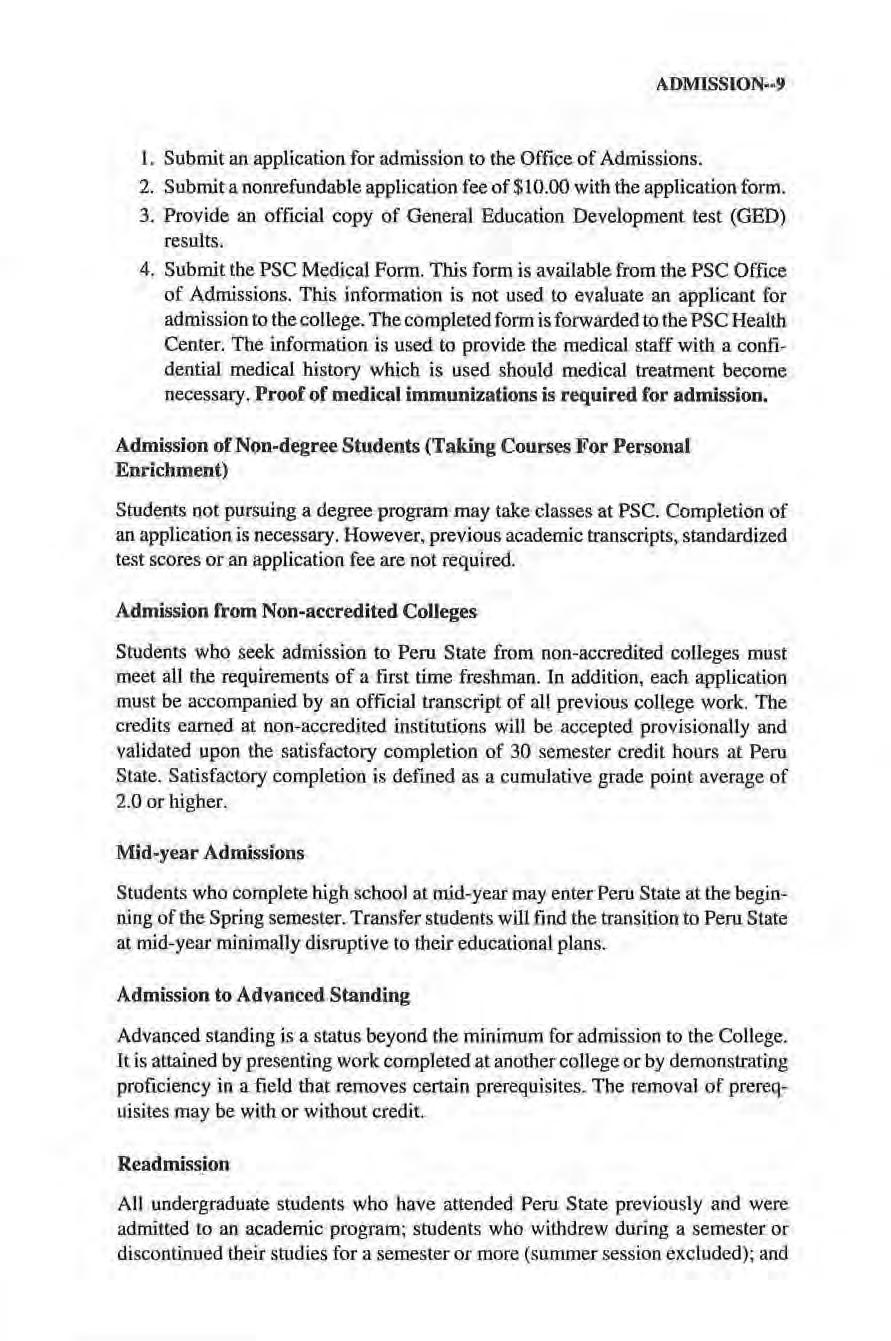
Admission of Non-degree Students (Taking Courses For Personal Enrichment)
Students not pursuing a degree program may talce classes at PSC. Completion of an application is necessary. However previous academic transcripts, standardized test scores or an application fee are not required.
Admission from Non-accredited CoUeges
Students who seek admission to Peru State from non-accredited colleges must meet all the requirements of a first time freshman. ln addition, each application must be accompanied by an official transcript of all previous college work. The credits earned at non-accredited institutions will be accepted provisionally and validated upon the satisfactory completion of 30 semester credit hours at Peru State. Satisfactory completion i s defined as a cumulative grade point average of 2.0 or higher.
Mid-year Admissions
Students who complete high school at mid-year may enter Peru State at the beginning of tbe Spring semester. Transfer students will find the transition to Peru State at mid-year minimally dtsruptive to their educational plans.
Admission to Advanced Standing
Advanced standing is a status beyond the minimum for admission to the College. It is attained by presenting work completed at another co ll ege or by demonstrating proficiency in a field that removes certain prerequisites. The removal of prerequisjtes may be with or w ithout credit.
Read miss.ion
All undergraduate students who have attended Peru State previousl y and were admitted to an academic program; students who withdrew during a semester or discontinued their studies for a semester or more (summer session excluded); and
ADMISSION--9
all post-graduates seeking an additional academic program must apply to the Office of Admissions for readmission. Students suspended for academic or socia l reasons must a lso reapply to the Office of Admiss1ons
Students generally are readmitted for the semester or summer term they wish, provided they left the College in good standing.
Students who interrupted their studies, and who were on academic probation, will general ly be readmitted for the semester or summer term they wish, provided they are in good standing throughout the CoJlege
Students who are suspended academically will not be considered for readmission for two semesters.
Previously suspended students who are readmitted will generally be s ubject to permanent suspension if they are suspended a second time.
Students readmitted following academic suspension must maintain an average of 2.0 or higher for the re-entry term and for each successive term untiJ the required cumu lative grade point average of 2.0 has been achieved. Failure to meet the above conditions will result in academic suspension. A student who has been suspended twice is generally not considered for readmission

Transfer students who have been previously suspended are subject to the same policies as readmitted students.
Students who discontinue attendance at Peru State College, attend another college or unjversity, and then seek readmission are considered transfer students.
Readmitted Peru State students may graduate under the catalog in effect at the time of their first admission , if they graduate within seven (7) years of initial enrollme nt at Peru. Readmitted students are subject to all college regulations and to any additional provisions as a condition of readmission.
Notification of Admission
Applicants will receive a Jetter notifying them of their admission status when aII necessary items of information - application form , officia l transcripts and test scores - have been completed and received by the Office of Admissions.
Please telephone the Office of Admissions if you have any questions about the application process. Our telephone number is (402) 872-222 1 or toll-free (800) 742-4412.
10--ADMISSION
EXPENSES & FINANCIAL AID
The expenses fo r attending Peru State College are set by the Board o f T rustees o f the Nebras ka State Co lleges and Peru State. The CoUege reserves the right to chan ge its tuition, fees, and other charges at any time. Additional expenses fo r books and s uppli es, travel, and p ersonal items will vary for individual students. Tuition rates fo r 1996-1997 are below.
Nebraska residency for tuition pu rposes is determined in accordance with Nebraska statutes and the poli cies of the Board of Trustee s. Residency status is based upon evidence provided in a student's application for ad mission and related documents. Th.e Office of Admissions and School Relations classifies all new students

A curren tly e nrolled non-resident s tudent who seeks Nebraska res idency status must officially apply through the Office of th e Registrar. The completed application and supporti ng documents mu st be submi tted on o r before the final date to drop and add courses. This date is published in the catalog and cl.ass schedul e. A change in residency status is determined by the Registrar.
Studen ts who gain resident status from non-resident status q ualify for a specific term a nd subsequent terms. Students do not qualify as res idents for any term of attendan ce prior to the initial res id en t term. In addition, a change in resident classification th at occu rs during a term, but prior to the application deadline, does not enti tle a student to a tuition refund for that term.
Students are responsible fo r pro mptly notifying the Regi strar if their residen t status changes. A student's residency classification may be reviewed if there is ev idence to indicate a change in legal resid ence.
The residency policy is not related to the Non-Resident Scho larship program. Information concerning t he Non-Resident Scholarshi p p rog ram s hould be directed to the Office of Admissions.
EXPENSES & FINANCIAL AID--11
Tuition Undergraduate per Semester-credi t h our Graduate per Semester credit hour Resident $55.00 $69 .00 Nebraska Residency Regulations for Tuition Non-Resident $ 110.00 $1 37.50
& FINANCIAL AID
Fees
Fees must be paid each term at the time indicated in the academic calendar. Course credit will not be awarded unless debts have been paid or arrangements for late payments have been approved by the Bus iness Office. Fees for 1996-97 are :
Mandatory, On-Campus Fees:
Computer Lab Fee (Fall, Spring and Summer Sessions)
1-6 hours 7 + hours
Facilities Fee (Fall, Spring and Summer Sessions) 1-1 I hours 12 + hours
Health Center Fee ( R eguJar Semester) 1 + hours
Publications Fee 1 + hours
Replacement I.D. Card
Student Activi ty Fee 1-6 hours 7 + hours
Student Event Fee 1- 6 hours 7 + hoUis
Student Identification Card (FaU, Spring and Summer Sessions)
I + hours
Other Applicable Fees for: 1996-97:
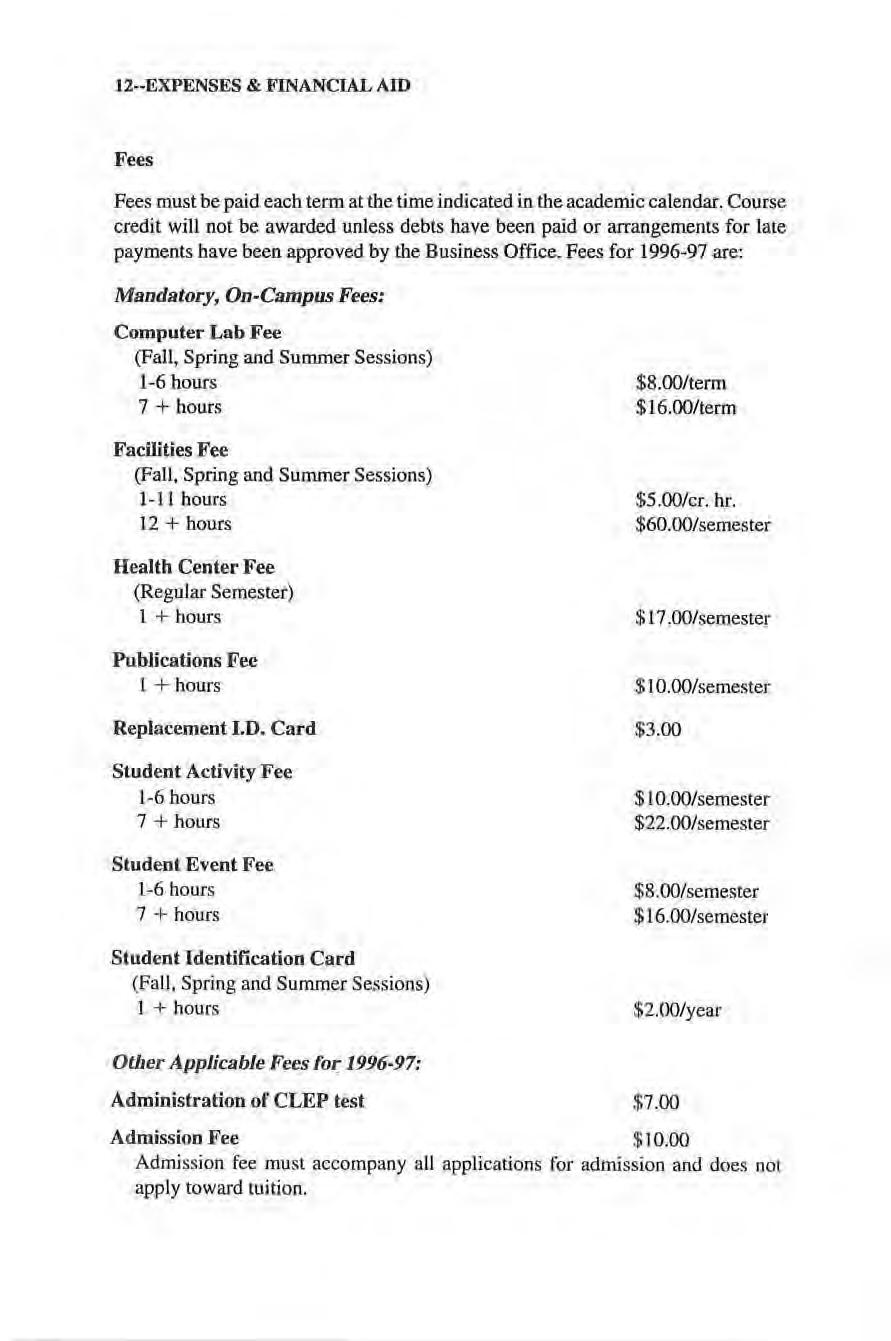
Administration of CLEP test
Admission Fee
te r
Admiss io n fee must accompany a ll application s for admission and does not apply toward tuition.
12--EXPENSES
$8.00/term $16.00/term $5.00/cr. hr. $60.00/semester $17 .DO/
$10.00/semester $3.00 $10.00/semester $22.00/semester $8.00/semester $16.00/semes
$2.
$7.00 $10.00
semester
()0/year
Some courses require additional materials, s upplies, or laboratory fees.
(The cap a nd gown are rented from the Campus Bookstore. This fee is not a College fee.)
Late Registration Fee $ 10.00
Due on all registrations compl eted between the end of regular enrollment and up to one week after the regular enrollment period is ended.
Late Tuition Fee
15% of tuition
Due on all registrations completed more than one ( I ) week after the regular enrollment period is ended. Due on all tuition payments more than one week late, unless other arrangements have been approved by the Financial Aid and Business Offices.
Motor Vehicle Registration
Off-Campus Service Fee

Private Music Lessons (Non-Music Majors OnJy)
Charged to non-Music majors.
Tuition, fees and deposits are refunded in accordance with College policies a nd the Department of Education Calculation Guidelines for refunds. Refunds go directly to the source of original payment.
Withdrawal from Class
Tuition and fees refunds are granted for a reduction in semester credit hours through the final date to add/drop regular semester courses as indicated in the catalog. The final date to withdraw from class durjng the summer session is a proportional period of lime.
EXPENSES & FINANCIAL AID--13
Varies
Course Fees
Credential File Fee Deferment Penalty Fee Degree Fee Undergraduate Graduate $4.00 $20.00 $20.00 $35.00
Transcript T uition Refunds $15.00/year $10.00/hour $90.00/cr. hr $4.00
Withdrawal from College
Students must officially withdraw through the Vice President for Student Affairs. Refunds are granted to students who totally withdraw from the College witlun a given time period. All first-time students are subject to the Department of Education Calculation Guidelines for refunds. All other students receive a proportional refund according to the followi ng schedule:
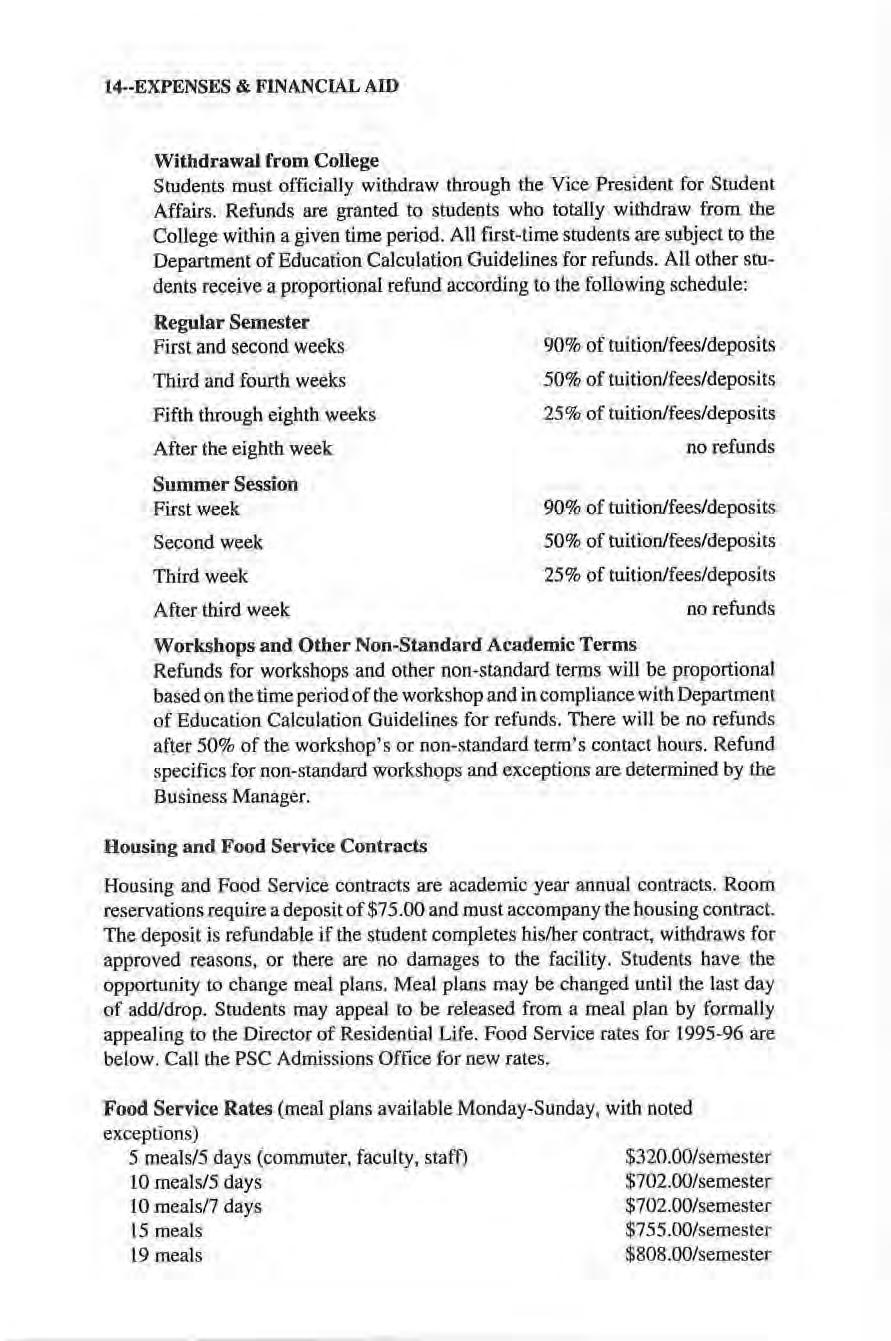
Regul ar Semester
First and second weeks
Thi rd a nd fourth weeks
Fifth through eighth weeks
After the e ighth week
Summer Session
First week
Second week
Third week
After third week
90% of tuition/fees/deposits
50% of tuition/fees/deposits
25% of tuition/fees/deposits
no refunds
90% of tuition/fees/deposits
50% of tuition/fees/deposits
25% of tuition/fees/deposits
no refunds
Workshops and Other Non-Standard Academic Terms
Refunds for workshops and other non-standard terms will be proporti onal based on the time period of the workshop and in compliance with Department of Education Calculation Guidelines for refunds. There will be no refunds after 50% of the workshop 's or non-standard term's contact hours. Refund specifics for non-standard workshops and exceptions are determined by the Business Manager.
Housing and Foo d Service Contracts
Housing and Food Service contracts are academic year annual contracts. Room reservations require a deposit of $75 .00 and must accompany the housing contract. The deposit is refundable if the student completes his/her contract, withdraws for approved reasons, or there are no damages to the facility. Students have the opportunity to change meal plans. Meal plans may be changed until the last day of add/drop . Students may appeal to be released from a meal plan by formally appealing to the Director of Residential Life. Food Service rates for 1995 -96 are below. Cal l the PSC Admissions Office for new rates.
Food Service Rates (meal plans available Monday-Sunday, with noted exceptions)
5 meals/5 days (commuter, faculty, staft)
10 meals/5 days
10 meals/7 days
15 meals
19 meals
$320.00/semes ter
$702.00/semes ter
$702.00/semester
$755.00/semeste r
$808.00/semester
14--EXPENSES & FINANCIAL AID
Housing Rates
Delzell and Morgan llalls (per semester)
Private Room
Semi-Private Room
Centennial Complex (per semester)
Private Room
Semi-Priv ate Room
Oak mu Apartments (partially furnished)
One-bedroom unit
Two·bedroom unit
$ 978.00/semester
$ 728 .00/semester
$ l 069.00/semester
$ 8 19.00/semester
$ 185.00/month
$ 226.00/monlh
Both the one-bedroom unit and the two - bedroom unit in Oak Hill include water and gas, but not electricity. Utilities are taxed and subject to a monthly surcharge based on utility cost.
N ic holas Hall Apartments (furnished with utilities included)
One-bedroom unit $ 248.00/month
Two-bedroom unit $ 301 .00/month
Housing Deposit $ 75.00
Housing and Food Service Refunds
Students who withdraw from school o r whose housing coo.tract is canceled (both require approval of the Vice President for Student Affairs) may receive prorated refunds of their housing and food serv ice fees . Refunds for housing follow the same refund schedul e established for tuition and fees. Refunds for meals are prorated on the number of days in the semester and the date of approved cancell ation of the contract.

Room deposit will be refunded if:
1. All terms of the contract are c ompleted.
2. There is no damage or unusual wear-and-tear to the facility
3 The student checks out of his/her room properly and returns all keys.
4 The facility is left clean.
Applying for Financial Aid
The firs t step is to complete a Federal Application by April I for priority consideration. Applications are accepted throughout the year by date priority after April I. Priority deadline for scholarships is March I. Any questions or problems regarding applications or el igibility should be directed to the Financial Aid Office.
EXPENSES & FI NANCIAL AID--15
Federally-Funded Programs (Eligibility Determined by Federal Standards)
Federal Pell Grants
Federal Pell Gran ts are determined after con sidering student need a nd college costs Eligibility is calculated from the Student Aid Report.
Federal Supplemental Educational Opportunity Gran ts .(FSEOG)
These g rants are awarded to students who have exceptiona l fi nancial need
The grants range from $200 to $1,000 a year. All grants are awarded yearly
Federal Work-Study (FWS)
The Federal Work-Study is a need-based program. Its purpose is to per mit students to pay for a portion of their e ducation by working. Wben attending college full time, students can work a maximum of 15 hours per week; during vacation periods, students are allowed to work 40 hours per week. Federal Work-Study jobs are usually on campus and vital to the efficient operation of the College.
Federal Perkins Loans
These low interest. lon g-term loans are mad e to s tude nts who are in good standing and show financi al need.
Federa l Fa mily Education Loan P rograms
This program makes long-tenn loans avail able to stude nt s attending an e li gible in s titution of higher education The loans included in this program are: Federal Stafford Loans, F edernl PLUS, F ederal SLS, and Federal Consolidation L oan P rogram.
State-Funded Programs
State Scholarship A ward Program (SSAP)

This financial assistance p rogram enables el i g ible students to receive educat iona l serv i ces at an elig ible Nebraska institut ion.
Scholarship Assistance Program (SAP)
T his program pro"ll ides financial assistance to an eli gi bl e Nebraska resident attending a Nebraska institution.
Tuition Assistance for Members of the Nebraska National Guard
The Nebraska Natio na l Guard ca n pay one- half of the tuiti o n for a limited number o f members. Guard personnel must apply through thei r unit.
Military Reserves Tuition Waivers
Se lect members of military reserve units in Nebraska may have one-half of their tuition waived at Peru State. Reservists apply th.rough their reserve unit.
16--EXPENSES & FINANCIAL AID
lnstitutionally•Funded Programs
College Work Jobs
These jobs are similar to Federal Work- Study j obs in pay, type of work, and hours worked.
Board of Trustees Scholarships*
The Board of Trustees of the Nebraska State Colleges provides full tuition scholarships for current graduates of Nebraska high schools who have demonstrated outstanding academic achievement based on class rank and entrance examinations. The scholarships are renewable to cover four regular academic years. The application deadline is January 15.
Cooperating Schools Scholarships
Scholarships are available to designated graduates of school systems which assist Peru State with its teacher education program. The scholarships are for one-half the basic tuition costs per semester for eight semesters. Potential applicants sbould inquire at their high school.
Davidson Scbolai:-shlp*
Available to out-of-state high school seniors with a minimum ACT of 20. This $400 scholarship (subject to change) is for one academic year. An application and letter of recommendation are required and should be sent to the Admissions Office.
Leadership Scholarship
Available to high school seniors that held a leadership role in high school clubs and organizations and plan to continue that leadership at PSC This $400 scholarship (subject to change) is for one academic year. To be eligible, students must have a minimum ACT of 18. An application and letter of recommendation are required and should be sent to the Admissions Office
Presidentia l Scholarship*
Available to Nebraska high school seniors with a minimum ACT of 22. This $400 scholarsh ip (subject to change) is for one academic school year. Applications for the award must be sent to the Admissions office.
Special Activity Tuition Scholarships
These scholarsh ips are a type of financial assistance in the form of partial tuition waivers granted to students with special abilities in athletics, art, drama, music, etc. Applicants should contact the appropriate department head or coach indicating their desire to be considered for a scholarship. The waivers are approved for one academic year, bot are renewable.

Peru State College Foundation SchoJarships
Through the generosity of alumni and friends of Peru State, the Peru State College Foundation presents a variety of aid opportunities. Permanent, fully endowed student aid funds are listed at the end of the Expenses and Financial Aid portion of the catalog.
EXPENSES & FINANCIAL AID--17
Students may apply for a specific Foundation scholarship (or any available scholarship) on the College's scholarship application fonn which is available from the Office of Financial Aid . March 1 is the priority deadline.
Nonresident Scholars Program*
The Nonresident Scholars Program is a waiver program allowing students from contiguous states to attend Peru State College and pay in-state tuition. Students meeting the following criteria should apply for the waiver. Tuition remissions for the amount of nonresident tuition over resident tuition are available to entering freshmen from states contiguous to Nebraska, enrolled full time who ranked in the upper quartile of their high school class, or have a cumulative 3.25 GPA, or have a 25 ACT or 1100 cumulative SAT. Transfer students are required to have a 3.0 cumul ative GPA from previous college work. To continue in the program, students are required to maintain a cumulative 3.0 GPA. Entering graduate students roust have a cumulati ve GPA of 3.5 for all previous work attempted at all colleges attended prior to their enro11ment at a Nebraska State College. To continue in the program, graduate students are required to maintain a 3.5 cumulative GPA. Students desiring to continue with the Nonresident Scholars Program must reapply each semester through the Vice President for Student Affairs.
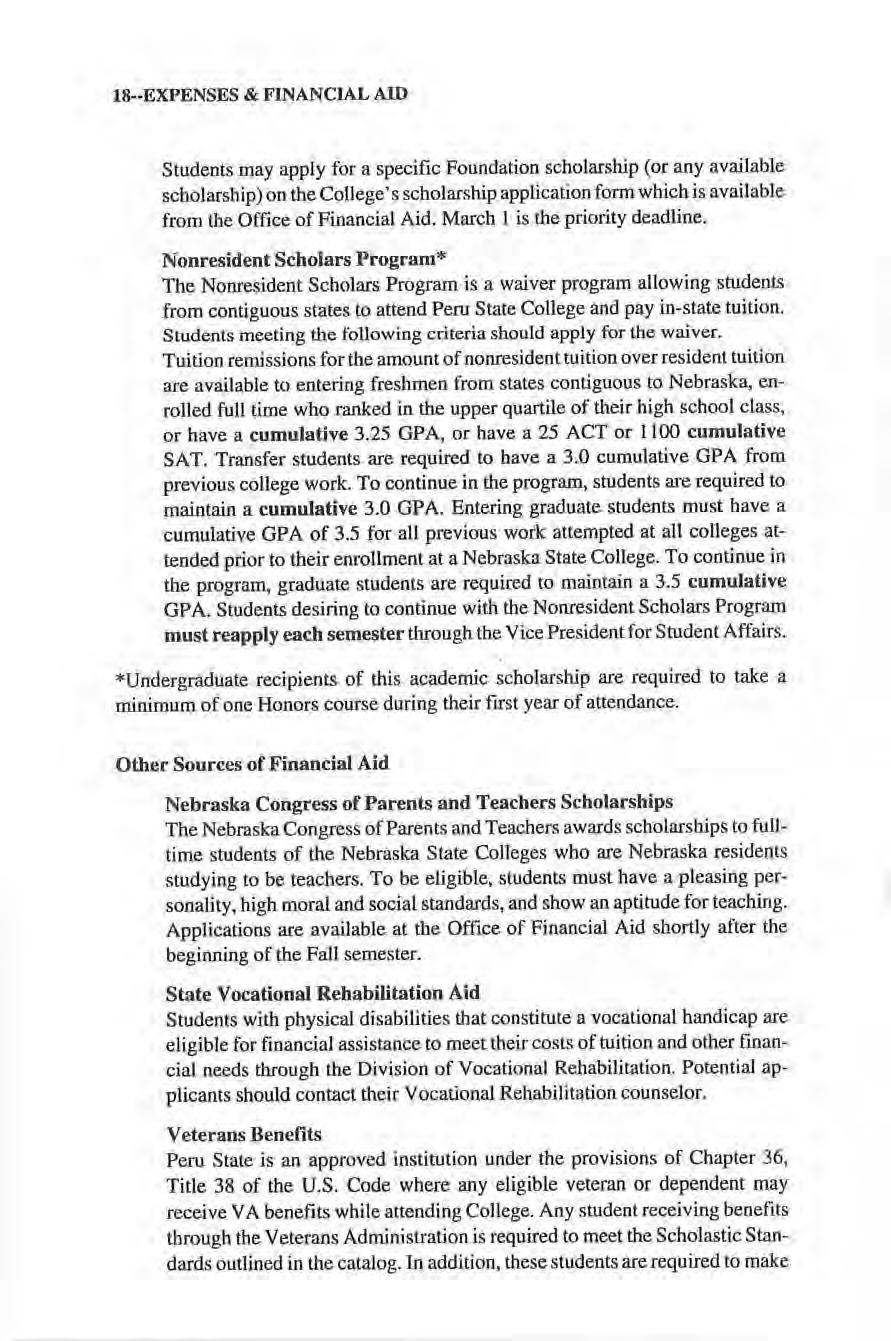
*Undergraduate recipients of this academic scholarship are required to take a minimum of one Honors co urse during their first year of attendance.
Other Sources of Financial Aid
Nebraska Congress of Parents and Teachers Scholarships
The Nebraska Congress of Parents and Teachers awards scholarships to fulltime students of the Nebraska State Colleges who are Nebraska residents studying to be teachers. To be e ligible, students must have a pleasing personality, high moral and social standards, and show an aptitude for teaching. Applications are available at the Oftice of Financial Aid shortly after the beginning of the Fall semester.
State Vocational Rehabilitation Aid
Students with physical disabilities that constitute .a vocational handicap are eligible for financial assistance to meet their cosL~ of tuition and other financial needs through the Division of Vocational Rehabili tation . Potential applicants should contact their Vocational Rehabilitation counselor.
Veterans Benefits
Peru State is an approved institution under the provisions of Chapter 36, Title 38 of the U.S. Code where any eligible veteran or dependent may receive VA benefits while attending College. Any student recei ving benefits through the Veterans Administration is required to meet the Scholastic Standards outlined in the catalog. In addition, these students are required to make
18--EXPENSES & FINANCIAL AID
normal progress toward their edu cational objectives as defined in this Catalog.
Academic Requirements for Financial Eligibility
Students who receive financial aid from any federal, state or college administered financial aid program are required to maintain satisfactory academic standing and progress. Academic good standing is a 2.0 GPA (4.0 scale). Satisfactory progres s is completing a term of enrollment at the enrolled status for which the s tuden t received aid, such as, full t ime, 3/4 time or l/2 time (grades of F , Withdrawals, or lncompletes prod uce no credit hours and are not included). Full-time students must complete a minimum of 12 credit hours with a 2.0 GPA per semester. The standards for satisfactory academic standing are published under the Academic Standards portion of this catalog.
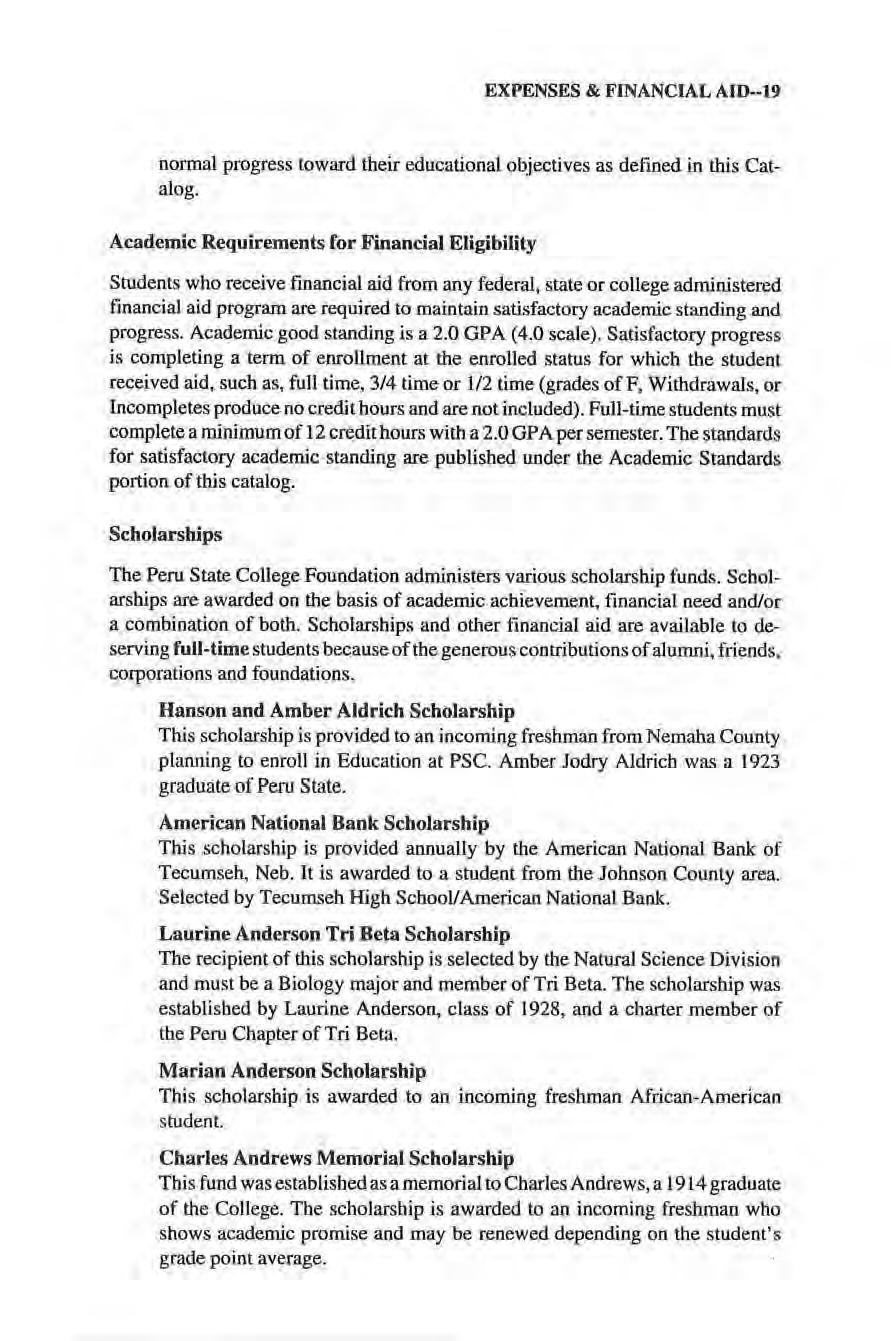
Scholarships
The Peru State College Foundatio n administers various scholarship f unds. Scholarships are awarded on the basis of academic acbi.evement, financial need and/or a combination of both. Scholarships and other financial aid are available to deserving full-time students because of the generous contributions of alumni, friends , corporations and foundations.
Hanson and Amber Aldrich Scholarship
This scholarship is provided to an incomin g freshman from Nemaha County planning to enroll in Education at PSC. Amber Jodry Aldrich was a 1923 graduate of Peru State.
American National Bank Scholarship
This scholarship is provided annually by the American National Bank of Tecomseh., Neb. 1t i s awarded to a s tudent from the Johnson County area. Selected by Tecumseh High School/American National Bank.
Laurine Anderson Tri Beta Scholarship
The recipient of this scholarship is sel ected by the Natural Science Divis ion and must be a Biology major and member of Tri Beta. The scholarship was established by Lauri ne Anderson, class of 1928, and a charter member of the Peru Chapter of Tri Beta.
Marian Anderson Scholarship
This scholarship is awarded to an incoming freshman African-American s tudent.
Charles Andrews Memorial Scholarship
This fund was established as a memorial to Charles Andrews, a 1914 grad uate of the College. The scho larship i s awarded to a n incoming freshman who shows academic promise and may be renewed depending on the student's grade point average.
EXPENSES & FINANCIAL AID--19
&FINANCIAL AID
Bath Family Memorial Scholarship
This scholarship was established in 1967 by Mrs. Minnie Bath in memory of her husband John Bath and her two sons, Edward J. and Robert L. Bath. It is awarded for academic achievement.
Merle Hoot Bauer Memorial Scholarship
This scholarship is awarded to an incoming freshman, with preference to Tecumseh, Ho ldrege, North Platte or Bertrand graduates, who will be on t he basketball team. Mr. Bauer, a 1950 graduate, was an outstanding varsity basketball player. Selection by the Athl etic Department.
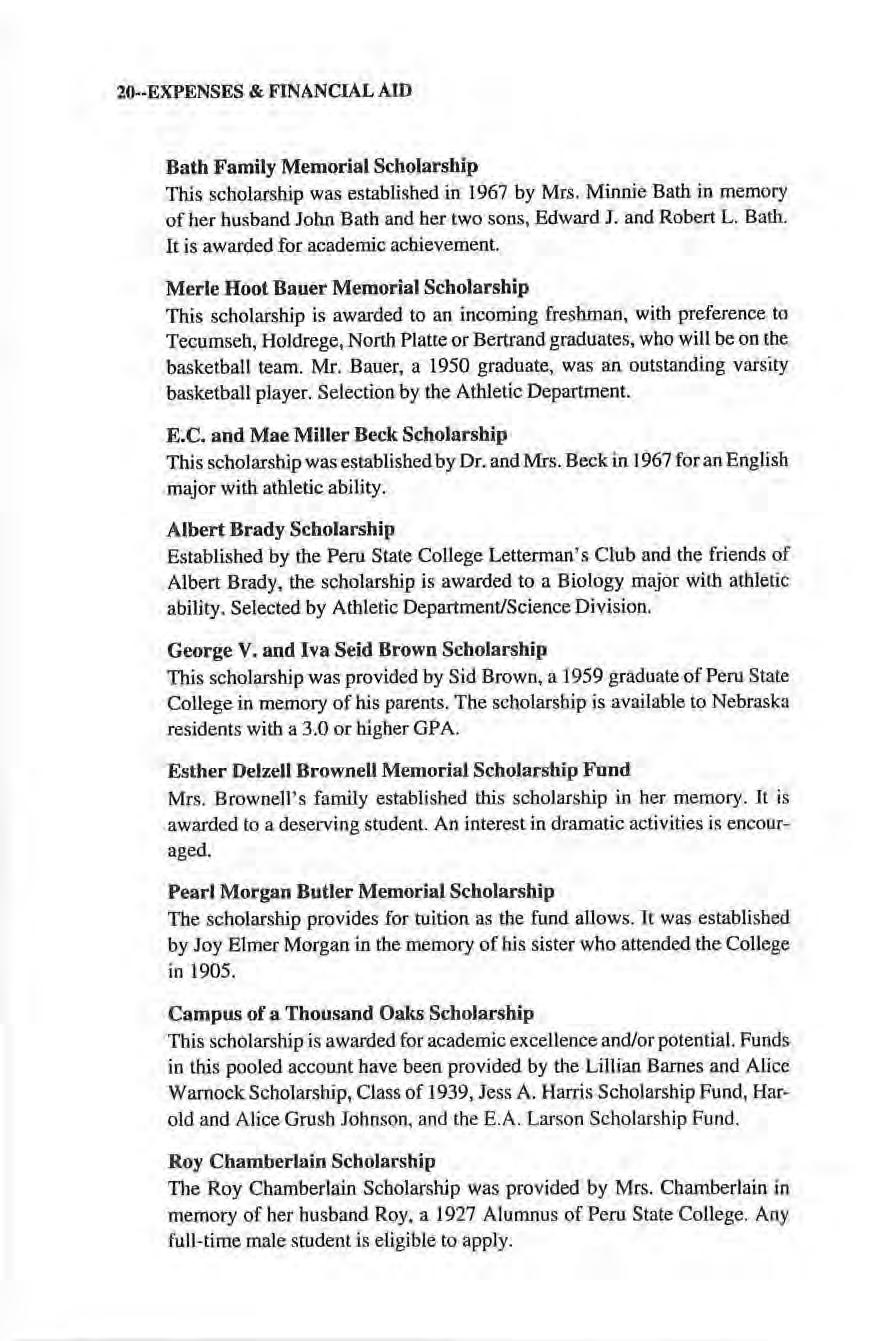
E.C. and Mae Miller Beck Scholarship
Thi s scholarship was established by Dr. and Mrs. Beck in 1967 for an English major with athletic ability.
Albert Brady Scholarsh i p
Established by the Peru State College Letterman's Club and the friends of Albert Brady, the scholarship is awarded to a Biology major with athletic ability. Selected by Athletic Department/Science Division.
George V. and Iva Seid Brown Scholarship
This scholarship was provided by Sid Brown, a 1959 graduate of Peru State College in memory of ltis parents. The scholarship is available to Nebraska residents with a 3.0 or higher GPA.
Esther Delzell Brownell Memorial Scholarship Fund
Mrs. Brownell's family established thls scholarship in her memory. It is awarded to a deserving student. An interest in dramatic activities is encouraged.
Pearl Morgan Butler Memorial Scholarship
The scholarship prov ides for tuiti on as the fund allows. It was established by Joy Elmer Morgan in the memory of his sister who attended the College in 1905.
Campus of a Thousand Oaks Scholarship
This scholarship is awarded for academic excellence and/or potential. Funds in this pooled account have been provided by the Lillian Barnes and Alice Warnock Scholarship, Class of 1939, Jess A. Harris Scholarship Fund, Harold and Alice Grush Johnson. and the E.A. Larson Scholarship Fund.
Roy Chamberlain Scholarship
The Roy Chamberlain Scholarship was provided by Mrs. Chamberlain in memory of her husband Roy, a 1927 Alumnus of Peru State College. Any full-time male student is eligible to apply.
20--EXPENSES
C.C. and Erma Wilson Choyce Scholarship
This scholarship was establi shed by Mr. and Mrs. C.C. Choyce to recognize academic achievement. Mr. Choyce attended the Co llege in 1919, and Mrs. Choyce graduated in 1920.
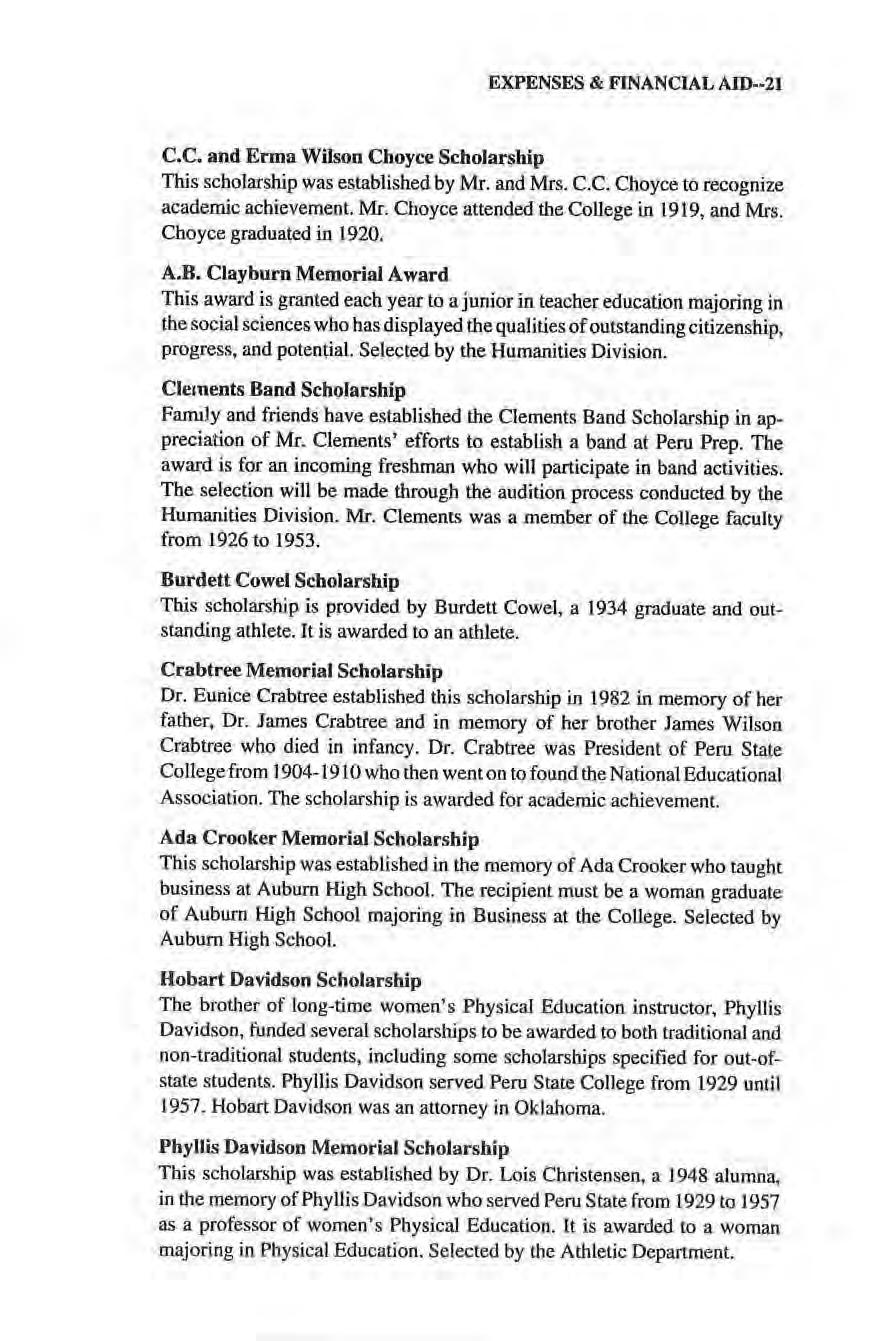
A.B. Clayburn Memorial Award
This award is granted each year to a junior in teacher education majoring in the social sciences who has displayed the qualities of outstanding citizenship, progress, and potential. Selected by the Humanities Division.
Clements Band Scholarship
Farruly and friends have established the Clements Band Scholarship in appreciation of Mr. Clements' efforts to establish a band at Peru Prep. The award is for an incoming freshman who will participate in band activities. The selection will be made through the audition process conducted by the Humanities Division. Mr. Clements was a member of the College facu l ty from 1926to 1953 .
Burdett Cowel Scholarship
This scholarship is provided by Burdett Cowel, a 1934 graduate and outstanding athlete. It is awarded to an athlete.
Crabtree Memorial Scholarship
Dr. Eunice Crabtree establ ished this scholarship in l 982 in memory of her father, Dr. James Crabtree and in memory of her brother James Wilson Crabtree who died in infancy. Dr. Crabtree was President of Peru State College from 1904- 1910 who then went on to found the National Educationa l Association. The scholarship is awarded for academic achi evement.
Ada Crooker Memorial Scholarship
This scholarship was established in the memory of Ada Crooker who taught business at Auburn High School. The recipient must be a woman graduate of Auburn High School majoring in Business at the College. Selected by Auburn High School.
Hobart Davidson Scholarship
The brother of long-time women's Physical Education instructor, Phyllis Davidson, funded several scholarships to be awarded to both traditional and non-traditional students, including some scholarships specified for out-ofstate s t udents. Phyllis Dav idson served Peru State College from 1929 until 1957. Hobart Dav-idson was an attorney in Oklahoma.
Phyllis Davidson Memorial Scholarship
This scholarship was established by Dr. Lo is Christensen, a 1948 alumna, in the .memory of Phyllis Davidson who served Pe ru State from I 929 to I 957 as a profe ssor of women ' s Physical Education. It is awarded to a woman majoring in Physical Educ ation. Se lected by the Athletic Department.
EXPENSES & FINANCIAL AID--21
Elizabeth Aldrich Dougherty Scholarship
Elizabeth Dougherty was a 1921 graduate of PSC. This schol arship was established by her children and is designated for a Junior or Senior in Teacher Education. Students living in Nemaha, Richardson, Johnson, Pawnee or Otoe coun ties in Nebraska are eligible for this scholarship. Selection will be made by the Education Division.

Helen Naeve Douglas Music Scholarship
This scholarship is provided annually by Judson Douglas in memory of his mother. The award is given to a freshman who is a talented musician majoring in Music Education. Preference wi ll be given to Johnson, Otoe o r Nemaha county residents Selected by the Humani ti es D i visi on.
Mac Dunning Industrial Arts Award
This i s an annual cash grant given to an outstanding student in Industrial Technology and Education. Selected by IT faculty.
Lura Hendricks Eichler Memorial Kindergarten Education Award
This award is presented annually to a student who has demonstrated ability, aptitude, and interest in Kindergarten Education. Sel ected by Education DivL~ion.
Loure Salt zman Firoved Scholarship
Mrs. Firoved, a 1916 graduate of the Co ll ege, served many years as secretruy to the college president. Th.is schol arship, established by her chi ldren, is desi gned for a s tude nt majoring in business.
Elsie I. Fisher Memoria l Scholarship
This schol arship was established in memory of Elsie I. Fisher, a graduate, who taught for 39 years in the Omaha school system. It is awarded to students in Att Education.
Esther Cole Franklin Memorial Scholarship
Dr. Franklin was a 1920 grad uate of the College who was recognized as a distingui s hed a lumna in 1977. This schol arship was established in her memory and is awarded to an outstanding student.
Glen and Verda Frary Scholarship
Glen and Verda Hauptman Frary were both 1927 graduates of Peru State who devoted the ir careers to educating youth. Thi s scholarship is to be awarded to a sophomore or junior Education major.
Emma Anoe Hart Fuller Scholarsh ip
Helen Hart Fuller, who graduated from Peru State in 1919, left a sizeable bequest to assist nontraditional students who have been out of high school at least teo years
12--EXPENSES & FINANCIAL AID
Chris Haddad Memorial Scholarship
Established by friends and family, this scholarship is awarded to a business student, with preference to someone from Seward County. Chris Haddad was a 1989 graduate and was an admissions counselor at Peru State College.
Clifford Harding Social Science Scholarship

This scholarship is available to Sophomores, Juniors, and Seniors who are majoring in Social Sciences. Applications for this award are available from the Humanities Division. Clifford Harding was a 1944 graduate of PSC.
Benjamin Harrison Memorial Scholarship
The family of Benjamin Harrison, Class of 1907, established this memorial to provide scholarships to worthy Peru State students.
Harrison Family Scholarship
This scholarship provides partial tuition for a student pursuing a career in Education and was established by Mrs. Benjamin Harrison of Omaha.
Walter and Lillian Harrison Memorial Scholarship
This scholarsh ip was established by Carlos Harrison in honor of his parents. The award is given to freshmen students from Mills, Fremont or Page counties in Iowa.
Arnold and Bertha Hilterman Scholarship
This scholarship was established by Charles Masopust in memory of his sister and her husband. Jtjs presented to a deserving Peru State student.
Lena Huff Memorial Scholarship
This scholarship is awarded for scholastic excellence in the memory of Lena Huff, a 1909 gradua te of the College.
Harry and Mary Hutchinson Memorial Scholarship
This scholarship is provided by Charles Masopust in memory of the parents of his sister-in-law, Hollis. It is to be given to an outstanding sophomore or junior who has excellent potential to be an outstanding teacher. The recipient should demonstrate campus leadership and a need for financial assistance.
Dee V. and Kathleen Jarvis Industrial Education Scholarship
Dee V. and Kathleen Jarvi s provide a scho larship for a student majoring in Industrial Arts Education. Mr. Jarvis, a 1948 graduate of the College, served on the staff as a professor of Industrial Education for 30 years before retiring in 1978. Selected by the IT faculty ,
Glenn D. Jenkins Memorial Scholarship
The family and friends of Glenn D. Jenkins, Class of 1 909, established this schola rship for students from Humboldt and Richardson County. Selected by Humboldt High School.
EXPENSES & FINANCIAL AID--23
Victor H. Jindra Memorial Scholarship
This scholarship for s tu dents in Music was established from the estate of Victor a Jindra, a professor of Music at the College from 1923 to 1961. Selected by the Humanities Division.
Pearl A. Kenton Language Arts Award
This award is presented annually to an outstanding student majoring in Language Arts Selected by the Humanities Division.
Coretta Scott King Scholarship
These scholarships are provided annually by an anonymous donor. They are awarded to African-American female students.
A .V. and Wilhelmina Larson Memorial Industrial Arts A ward
This award is presented to a sophomore stu dent who demonstrates promise as a teacher of Industrial Technology. Selected by IT faculty.
Arthur R. Majors Memorial Scholarship
This scho larship was established in memory of Arthur R . Majors, a l 926 graduate of Peru State, who was an active ed ucato r for 43 years. Mr. Majors was a strong supporter of the College and the Peru State College Foundation. The scholarship is awarded to a student majoring in Biology, Chemistry, or Physics.
Charles Masopust Scholarship
This scho larship was donated by Charles Masopust. Although he never attended Peru State, Mr. Masopust developed an inte rest in the College throu gh his brother Joe, a supporter of the College and Peru resident. This award is given to a deserving student who may not qualify for other scholarship funds based on outstanding academic accomplishments, but who demonstrates personal qualities that are a credit to the College and student body and who distinguishes himself/herself through involvement in cocurricul ar act iviti es.
Hollis Hutchinson Masopust Memorial Scholarship
This scholarship, established in 1986, was donated by Charles Masopust in memocy of his sister-in-law, a 1933 graduate of Peru State College. The award is to be given to an outstanding sophomore or junior student who has participated above and beyond average in math and science and to whom this award will make a difference in achieving his/her education.
Joe Masopust Memorial Scholarship
This scholarship was established i n 1986 and is donated by CharlesMasopust in memory of his brother, a friend and benefactor of Peru State College. The scholarship is to be gi-ven to the outstanding sophomore or junior student who has contributed the most to Peru State College in non-scholastic activities (not sports), has good scho lastic potential and to w hom this assistance will make a difference in achieving the student's education.
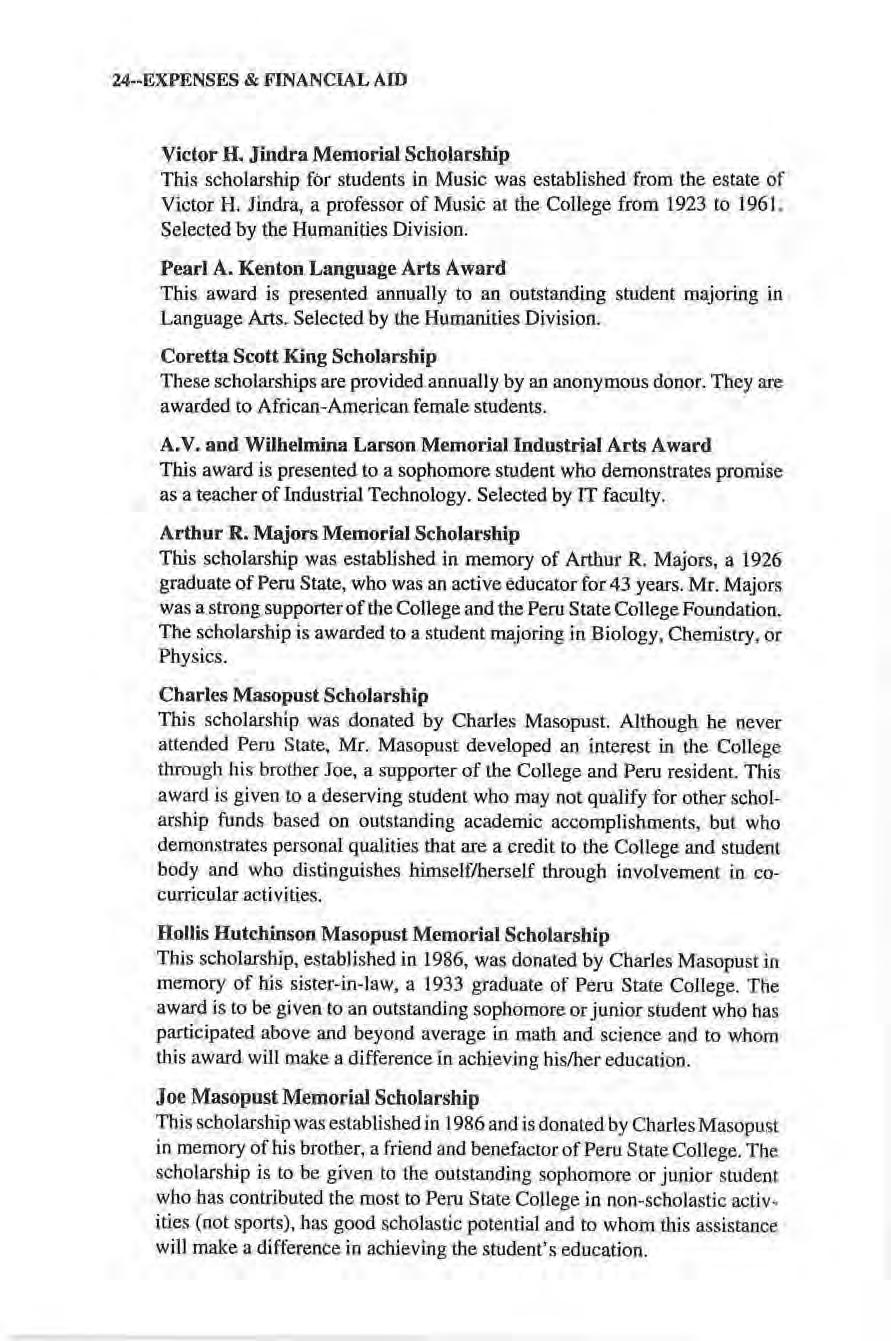
24--EXPENSES & FINANCIAL AID
John and Francis Schima Masopust Schola rship
This scholarship was donated by Charles Masopust in memory of his parent,; and is awarded to a student who knows the value of hard work.
L.B. and Ruth Mathews Memorial Scholarship
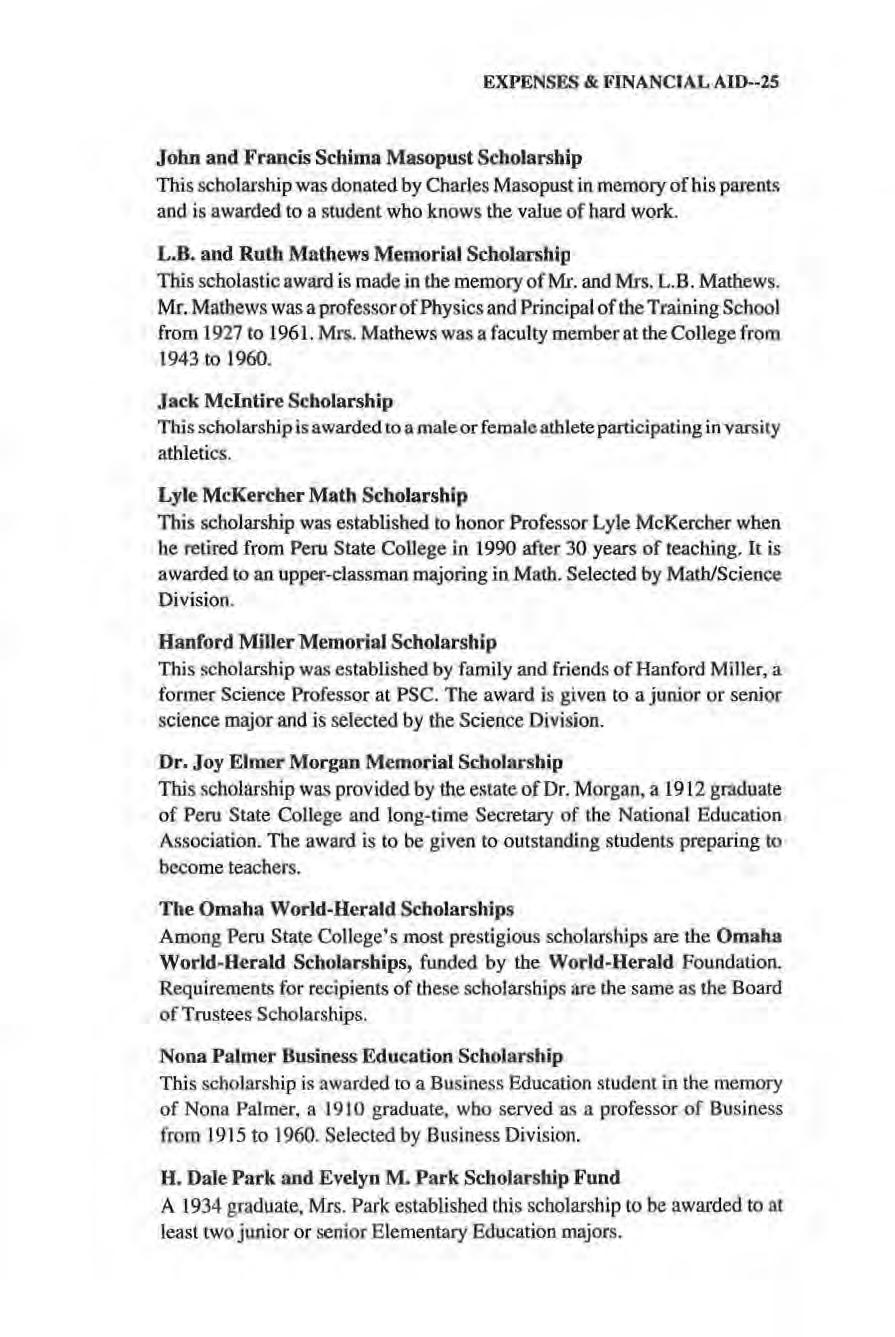
This scholastic award is m ade in the memory of Mr. and Mrs. L.B. Mathews. Mr. Mathews was a professor of Physics and Principal of the Training School from 1927 to 1961. ,Mrs. Mathews was a faculty member at the College from 1943 to 1960.
Jack McIntire Schola rs hip
This scho lars hip i s awarded to a male or female athlete participating in varsity athleti cs.
Lyle McKercher Math Scholarship
This scholarship was establi s hed to honor Professor Lyle McKercher when he retired from Peru State ColJege in 1990 after 30 years of teaching. It is a warded to an upper-classman majoring in Math. Selected by Math/Science Div ision.
Hanford Miller Memorial Scholarship
Trus scholars hip was establi shed by family and friends of Hanford Miller, a fo rmer Science Professor at PSC. The award is given to a junior or senior scie nce major and is selected by th e Science Division.
Dr. Joy Elmer Morgan Memorial Scholarsh ip
This scholarship was provided by the estate of Dr. Morgan, a 1912 graduate of Peru State College and lon g-time Secretary of t he National Education Assoc iation The award is to be given to outstanding s tuden ts preparing to become teachers.
The Omaha World-Herald Scho larships
Among Peru State College's most prestigious scho larships are the Omaha World-Herald Sc holarships, funded by the World-Herald Foundation. Requirements for reci pients of th ese scholarships are the same as the Board of Trus tee-s Scholarsh ips
Nona Palmer Business Ed ucation Schol ars hip
Trus scholarship is awarded to a Bus iness Education student in the memory of Nona Palmer, a 1910 graduate, who served as a professor of Business from 1915 to 1960. Se lected by Business Division.
ff. Dale Park and Evelyn M. Park Scholars hip Fund
A 1934 graduate, Mrs. Park established th is scholarship to be awarded to at least two junior or senior E lementary Education majors.
EXPENSES & FINANCIAL AID--2S
Mr. and Mrs. W.R. Pate Scholarship
The family of Mr. and Mrs. W.R. Pate provide this scholarship to students of high academjc achievement. Mr. Pate served as President of the College from 1923 to 1946.
Helen E. Co le Pollard Founders Award
An award presented at the Spring Honors Co nvocation to the senior who has demonstrated loyalty and service to the College.
E lain e Gerdes Pratt Scho larship
A student of non-traditional age hailing from Nemaha County in Nebraska is to be the recipient of the Elaine Gerdes Pratt Scholarship. The scholarship was establ ished by h er husband, Charles Pratt, a 1967 PSC graduate, in memory of his wife, a 1964 alumna who was extremely active in college affairs.
Ernest J. Rawson Memorial Indus trial Education Scholarship
This scho larship was establ ished by the family of Ernest J. Rawson, Class of 1938. Mr. Rawson taught Industrial Education in high school and college before retiri ng in the late 1970's Se lected by IT faculty.
Wayne and Adele Penterman Reed Scholarship
This scholarship was established by Mrs. Reed in memory of her husband who served as Peru State College President in 1950. It i s awarded to an upperclass man majorin g in Education.
Troy Rippen Memorial Scholarship
Troy Rippen was a popular student on campus and participated in many activities. At the time of his death, a scholarship fund was established by family and friends . Th.is scho larship is awarded to a student majoring in Business. Selected by the Business Division.
A.B. Ritchie Scholarship
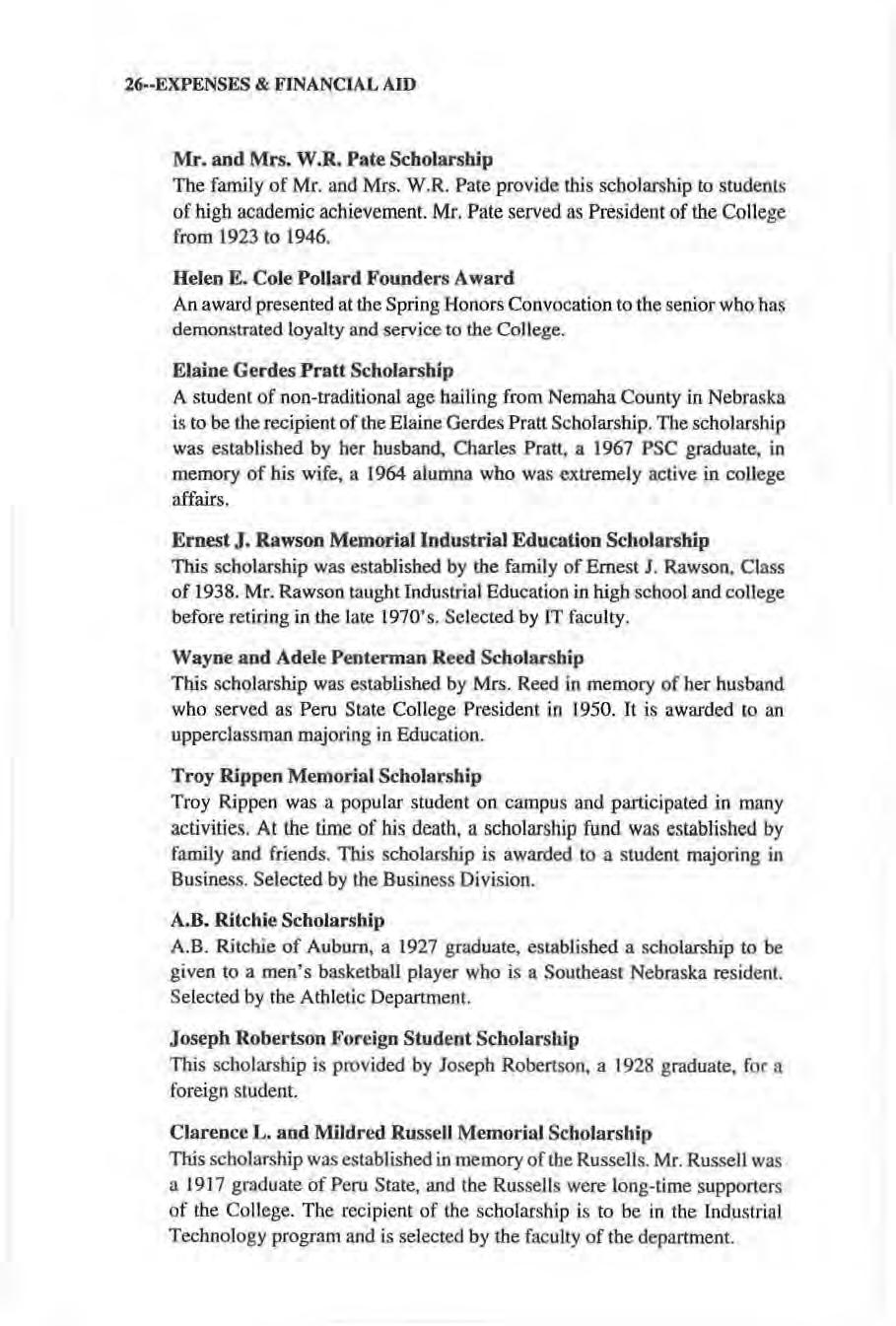
A.B. Ritchie of Auburn, a 1927 graduate, establi s hed a scholars hip to be given to a men's bas ke tball player who is a Southeast Nebraska re sident. Selec ted by the Athletic Department.
Joseph Robertson Foreign Student Scho larship
This scholarship is prov ided by Joseph Robertson, a 1928 graduate, for a foreign student.
Clarence L. and Mildred Russell Memorial Scholarship
This schola rship was established in memory of the Russell s. Mr. Russell was a 19 I 7 graduate of Peru S tate , and the Russells were long-time suppo rters of the College. The recipient of the scholarship i s to be in tbe Industr ial Technology program and is selected by the faculty of th e department.
26•-EXPENSES & FINANCIAL AID
Ruth M. Russell Scholarship Fund
This fuod was c reated by family and friends of Mrs. Russell, a long time Peru resident, in honor of her 100th birthday. Students eligible for this scholarship shall have gradu ated in the upper one-third of their high school class. The scho larship shall alternate each year between students studying in the Arts/Humanities and Science.
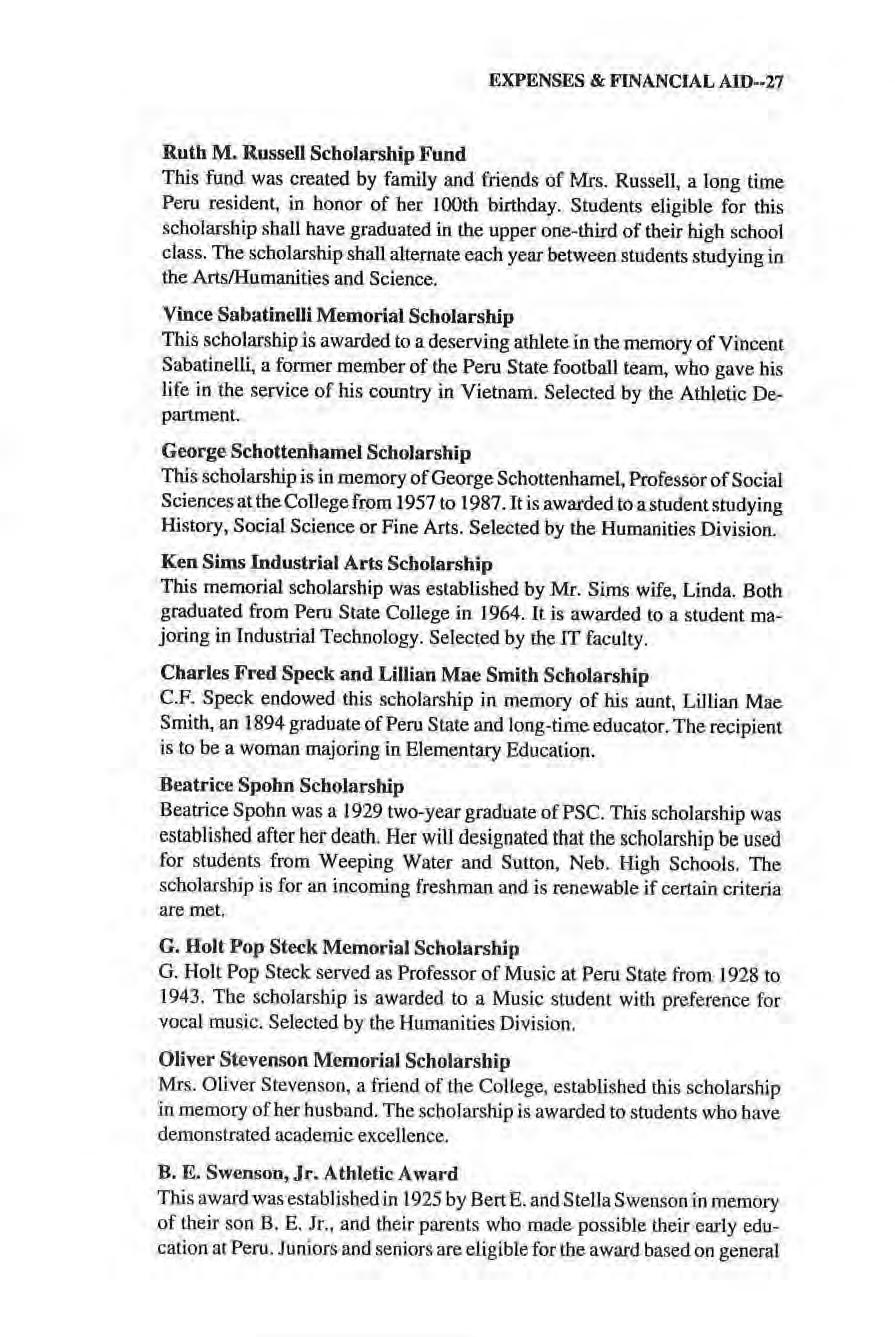
Vince Sabatinelli Memorial Scholarship
This scho larship is awarded to a deserving athlete in the memory of Vincent Sabatinelli, a former member of the Peru State football team, who gave his life in the service of his country in Vietnam. Selected by the Athletic DepanmenL
George Schottenhamel Scholarship
This scholarship is in memory of George Schottenhamel, Professor of Social Sciences at the College from 1957 to 1987. It is awarded to a student s tudying History, Social Science or Fine Arts. Selected by the Humanities Division.
Ken Sims Industrial Arts Scholarship
This memorial scholarship was establi shed by Mr. Sims wife, Linda. Both graduated from Peru State College in 1964. It is awarded to a student majoring in Industrial Technology. Selected by the IT faculty.
Charles Fred Speck and Lillian Mae Smith Scholarship
C.F. Speck endowed this scholarship in memory of his aunt, Lillian Mae Smith , an 1894 graduate of Peru State and long-time educator. The recipient is to be a woman majoring in Elementary Education.
Beatrice Spohn Scholarship
Beatrice Spohn was a 1929 two-year graduate of PSC. This scholarship was established after her death , Her wiJI designated that the scbolarship be used for students from Weeping Water and Sutton, Neb . High Schools. The scholarship is for an incoming freshman and is renewable if certain criteria are met.
G. Holt Pop Steck Memorial Scholarship
G. Holt Pop Steck served as Professor of Music at Peru State from 1928 to 1943. The scholarsh ip is awarded to a Mu$ic student with preference for vocal music. Selected by the Humanities Division.
Oliver Stevenson Memorial Scholarship
Mrs. Oliver Stevenson, a friend of the College, establis hed this scholarship in memory of her husband. The scholarship is awarded to students who have demonstrated acadetnic excellence.
B. E. Swenson, Jr\ Athletic Award
This award was established in 1925 by Bert E. and Stella Swenson in memory of their son B , E. Jr. , and their parents who made possible their earl y education at Peru Juniors and seniors are eligible for the award based on ge neral
EXPENSES & FINANCIAL AID--27
character and personality, scholarship, school loyalty, and athletics. A student may win the award only once. Selected by the Athletic Department.
Bill and Jeanne Tynon Memorial Scholarship
This award is presented to a Nebraska resident student in good standing who has participated in inter-collegiate sports at Peru State College. The Bill Tynon Memorial Scholarship fund was established by Mrs. Jeanne Rhinehart Tynon, a 1965 graduate, in memory of her hu s band, a 1964 graduate of Peru State, who was active in athletics at the college. Jeanne Tynon passed away in 1986 and the name of the scholarship has been changed in memory of Jeanne also.
Maude Phelps Vacek Scholarship
This scholarship was established by her children and grandchildren. Tt is awarded to a full-time student living in Pawnee City or Pawnee County who will be pursuin g a degree in teacher education.
Evan Van Zant Teacher Education Scholarship
The recipient of this scholarship is selected by the Education Division for academic excellence, dedication to the teaching profession, and an aptitude for teaching. It was est.abIished in the memory of Evan Van Zant, Professor of Education from 1961 to 1980. Selected by the Educ atio n Division.
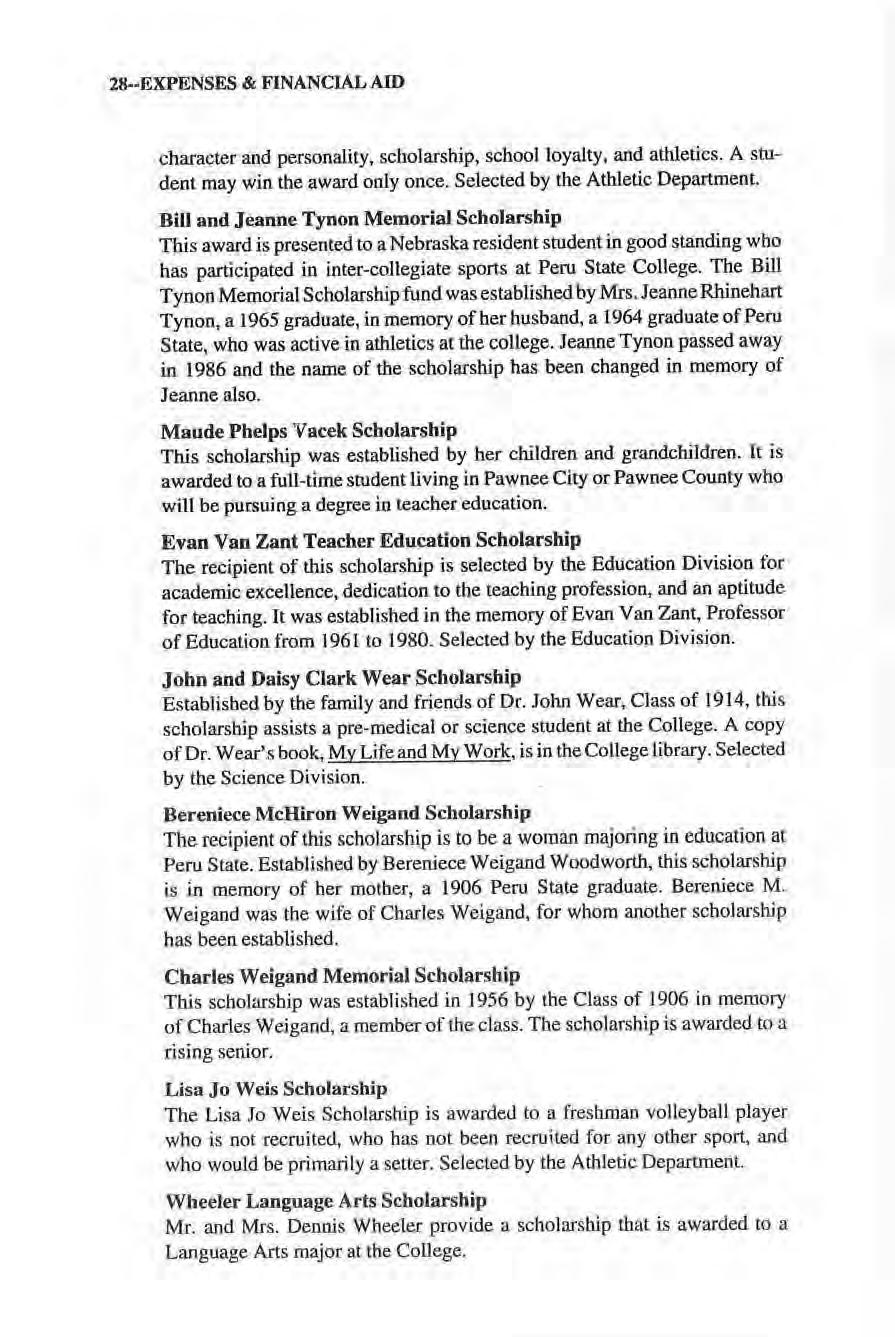
John and Daisy Clark Wear Scholarship
Established by the family and friends of Dr. John Wear, Class of 1914, thi s scholarship assists a pre-medical or science student at the College. A copy of Dr. Wear's book,MyLifeandMy Work, isin the College library. Selected by the Science Division.
Bereniece McHiron Weigand Scholarship
The recipient of this scholarship is to be a woman majoring in education at Peru State. Established by Bereniece Weigand Woodworth, this scholarship i s in memory of her mother, a 1906 Peru State graduate. Bereniece M. Weigand was the wife of Charles Weigand, for whom another scholarship has been established.
Charles Weigand Memorial Scholarsh_ip
This scholarship was established in 1956 by the Class of 1906 in memory of Charles Weigand, a member of the class. The scholarship is awarded to a rising senior.
Lisa Jo Weis Scholarship
The Lisa Jo Weis Scholarship is -awarded to a fresh.man volleyball player who is not recruited, who bas not been recroited for any other sport, and who would be primarily a setter. Selected by the Athletic Department.
Wheeler Languag.e Arts Scholarship
Mr. and Mrs. Dennis Wheeler provide a scholarship that is awarded to a Language Arts major at the Co ll ege.
28--EXPENSES & FINANCIAL AID
The Al Wheeler Scholarship
Funds for this scholarship have been provided by Fran Wheeler Kendrick, son Dr. Al Wheeler, Jr., and friends of th e long -time coach and athletic administrator who served Peru State from 1938 to 1965. The recipient is to be a male majoring in Physical Education, who participates in intercollegiate athletics, with preference given to a football player. Selected by the Athletic Department.
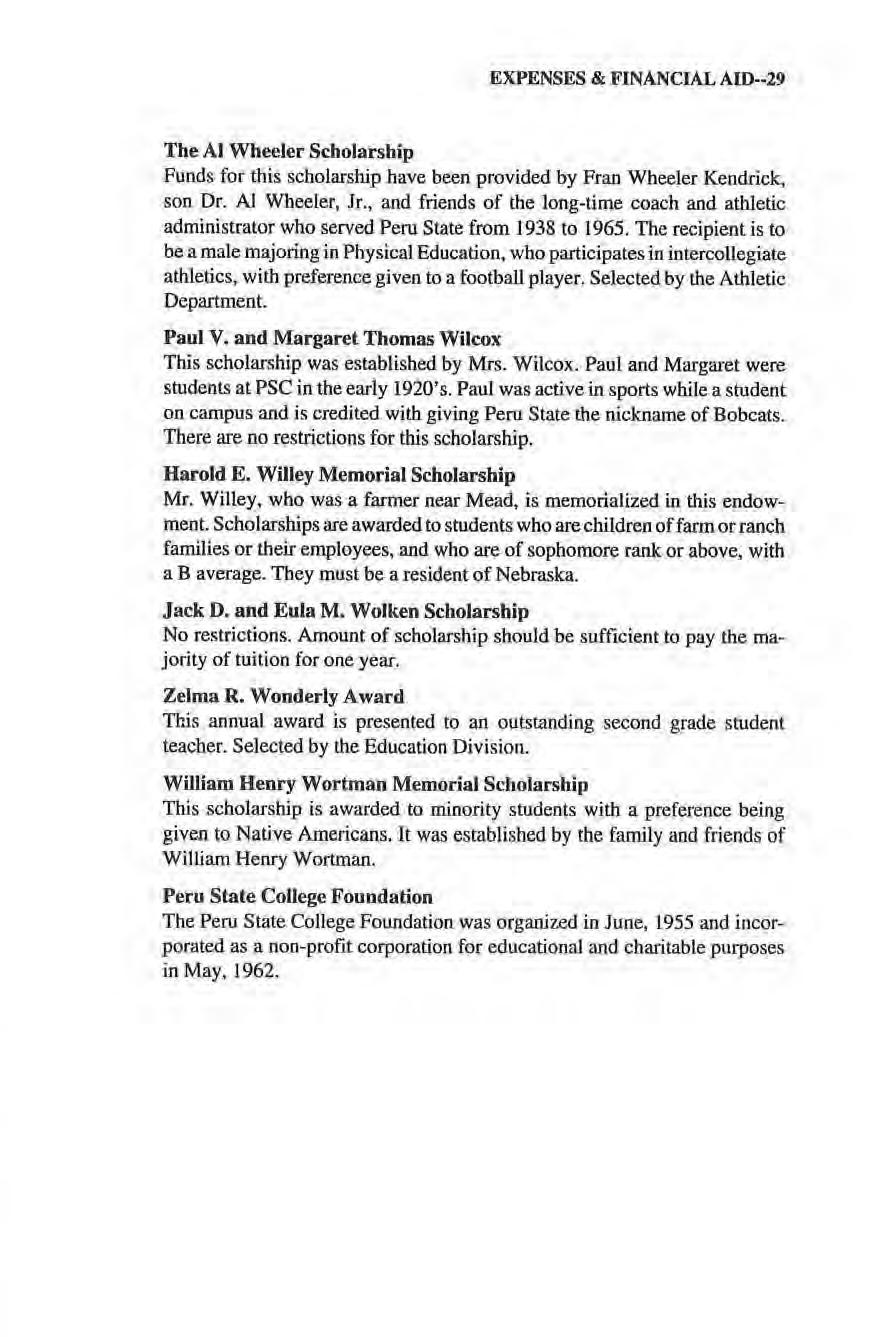
Paul V . and Margaret Thomas Wilcox
This scholarship was established by Mrs. Wilcox. Paul and Margaret were students at PSC in the early 1920's. Paul was active in sports while a student on campus and is credited with giving Peru State the nickname of Bobcats. There are no restrictions for this scho larship.
Harold E. Willey Memorial Scholarship
Mr. Willey, who was a farmer near Mead, is memoriali zed in this endowm ent. Scholarships are awarded to students who are children of farm or ranch families or their employees, and who are of sophomore rank or above, with a B average. They must be a resident of Nebraska.
Jack D. and Eula M. Wolken Scholarship
No restrictions. Amount of scholarship s hould be sufficient to pay the majority of tuition for one year.
Zelma R. Wonderly Award
Thi s annual award is presented to an outstanding second grade student teacher. Selected by the Education Division.
William Henry Wortman Memorial Scholarship
This scholarship is awarded to minority students with a prefere nce being given to Native Americans. It was established by the family and friends of Wi.lliam H enry Wortman.
Peru State College Foundation
The Peru State College Foundation was organized in June, 1955 and incorporated as a non-profit corporation for ed ucational and charitable purposes in May, 1962.
EXPENSES & FINANCIAL AlD--29
STUDENT SERVICES
St udent Affairs Mission Statement
The miss ion of Student Affairs is to provide a n environment that s upports tile development of the student as a whole person. Education of the whole student encompasses academic training as well as social, spiritual, cultural, physical and emotional deve lopment. Student Affairs e ncourages students to b e active participants in the forma tion and fruition of their educational process to clarify values, to solve problems and to discover, apply and integrate knowledge.
Admiss ions and School Relations
The Office of Admissions and Sch ool Relations assists students and prospecti ve students with admission to PSC and transition to careers. The activities of the Office of Admis sions and School Relations include the following:
Admission counseling
Admission processing
Campus tours conducted by Student Ambassadors
Board of Trustees Scholarship Program
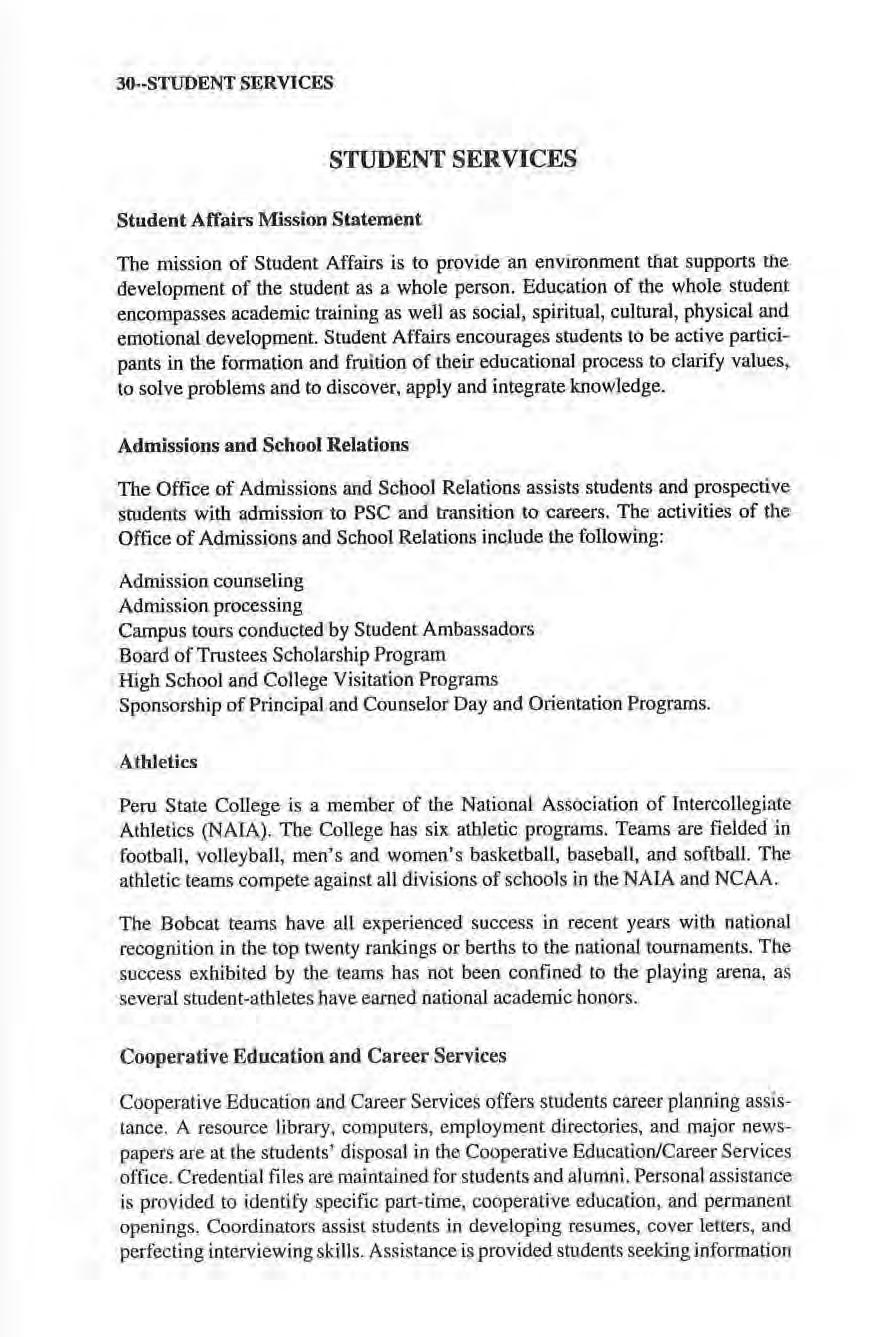
H1gb School and College Visitation Programs
Sponsorship of Principal and Counselor Day and Orientation Programs.
AtbJetics
Peru State College is a member of the National Associa ti on of I ntercollegiate Athletics (NAIA). The College bas six athletic programs. Teams are fielded in football, volleyball, men ' s and women's basketball, baseball, and softball. The athletic teams compete agains t all divisions of schools in the NAlA and NCAA.
The Bobcat teams have all experienced succes s in recent years with national recognition in the top twenty rankings or berths to the national tournaments. The success exhibited by the teams has not been confined to the playing arena, a s several student-athletes have earne d national academic honors.
Cooperative Education and Career Services
Cooperative Education and Career Services offers students career planning assistance A resource library, computers, employment directories, and major newspap er s are al the students' disposal in the Cooperative Education/Career Services office. Credentia l files are maintained fo r students and alumni. Personal assistance is provided to identi fy specific part-time, cooperative education, and permane nt openings. Coordinators assist students in deve loping resumes, cover letters, and perfecting interviewing skills. Ass istance is provided stude nts seeking information
30•-STtJDENT SERVICES
on graduate schools, scholarships, and career choices via computer programs, videos, and relate d resource library materials.
The office administers PPST, CLEP and Miller Analogies (MAT) tests, and has reg i stration materials for GMAT, ORE and LSAT.
Counseling and Student Support Services
Students sometimes feel the need to seek assistance in dealing with personal, vocational, educational, or social concerns. The Offices of Student Affairs, Student Health Center and Student Support Senrices will assist and counsel students. Toe Student Health Center provides educational, personal, and social counseling. Student Support Services assists students with academic and personal counseling related to college success.
Student Support Services, a TRIO program, assists students with their academic and personal i ssues re l ated to college success. Student Support Services is funded by a grant ftomthe-U .S . Departmentof Education. Students who meettheelj gibi)jty requirements can receive academic and tutorial assistance, financial aid information, a nd personal and social support. In order to qualify for . program services, students must be a first generation college student or show financial need based on U.S Department of Education guidelines or have a ve rifiable learni ng or physical disability.
Dining Services
The Student Center also serves as the main din ing facility. The main dining area is open seven days a week for meal service to students, faculty, staff, and g uests. All meals are designed with variety, nutrition, and good taste in mind.
There are cun·ently five meal plans from which s tudents may choose:
19 meal plan - provides a ll three meals Monday through Friday and two meals on Saturday and Sunday.
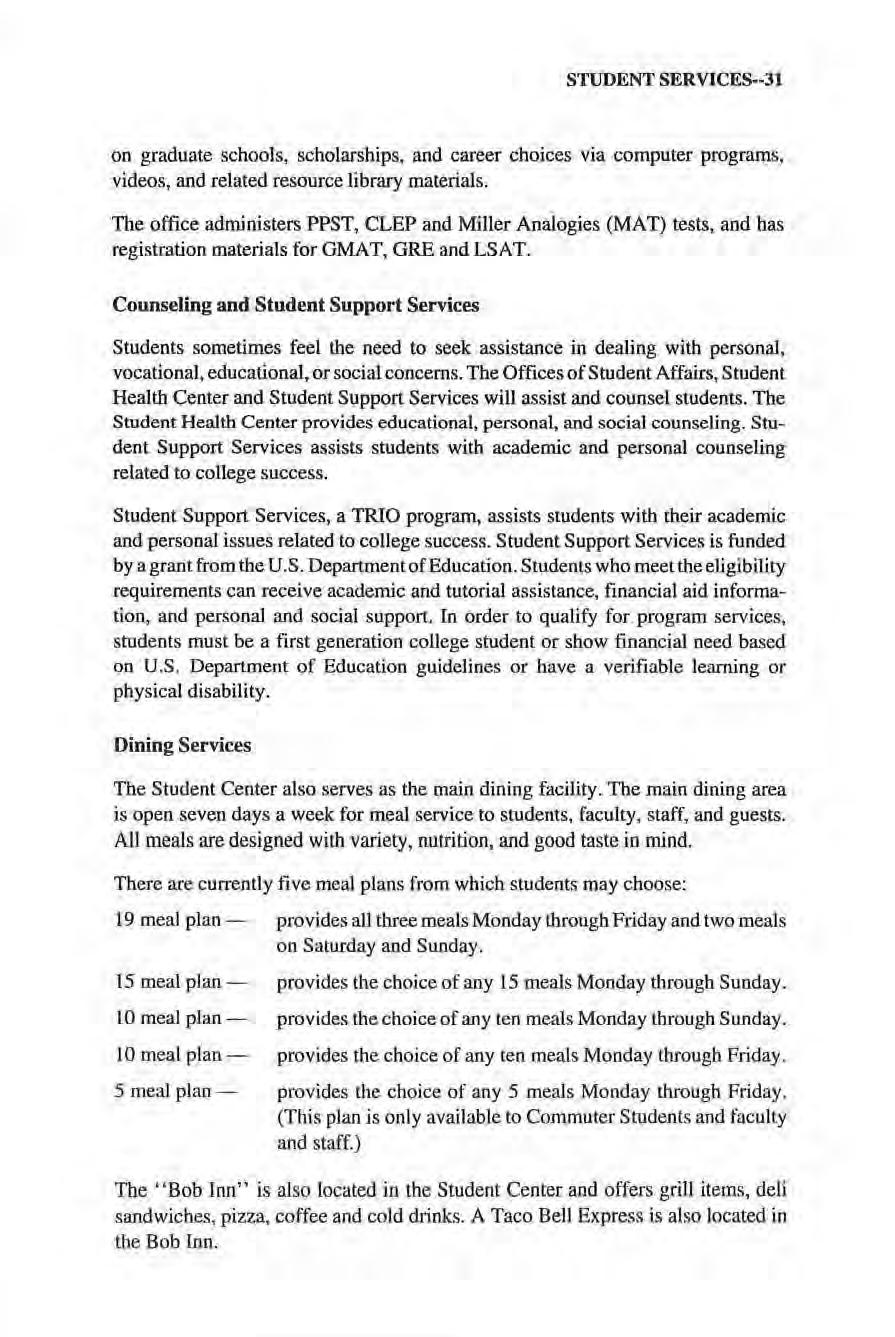
15 meal plan - provides the choice of any 15 meals Monday through Sunday.
lO meal plan - provides the choice of any te n meals Monday through Sunday.
10 meat plan - provides the choice of any ten meals Monday through Friday
5 meal plan - provides t he choice of any 5 meal s Monday through Friday. (This plan is on ly availabl e to Commuter Students and faculty and staff.)
Tbe "Bob Inn" is also located in the Student Center and offers grill items, deli sandwiches, pizza, coffee and cold drinks . A Taco Bell Express is also located in the Bob Inn.
STUDENT SERVICES--3 1
Financial Aid
The College provides a variety of ways for students with limited resources to meet educational costs. An extensive program of Federal and State grants, scholarships, loans, and jobs are available to students with financial need. A Free Application for Federal Aid must be completed and filed. The U.S. Department of Education will determine the student' s need and eligibility. (See Expenses and Financial Aid section in thi s catalog for further information.)
Intramurals and Recreation
Intramurals and other recreational activities offer each individual an opportunity to choose the type of activity in which they wish to participate. I ntramural activities are offered each semester. Other recreational opportunities for students incl ude use of the weight room, pool, and the Al Wheeler Activity Center. Activities are added to the program as the needs and interests indica te depending l argely on the participation of .the students and their involvement.
Orientation
T h e College conducts several orientation sessions designed to address the special concerns of incoming studen ts. Each program acquaints students (and their parents) with th e College and campus li fe. The goal of the orientation program is to have the student leave campus that day being knowledgeable about college life, academically advised, and registered. The New Student Weekend is the first weekend prior to class each. Fall semester. The weekend is designed to acquaint students with their new campus and expose them to new skills that will help them be successful both academically and socially. I t also meets the requirements for College 100.
Residence Halls and L i ving Accommodations
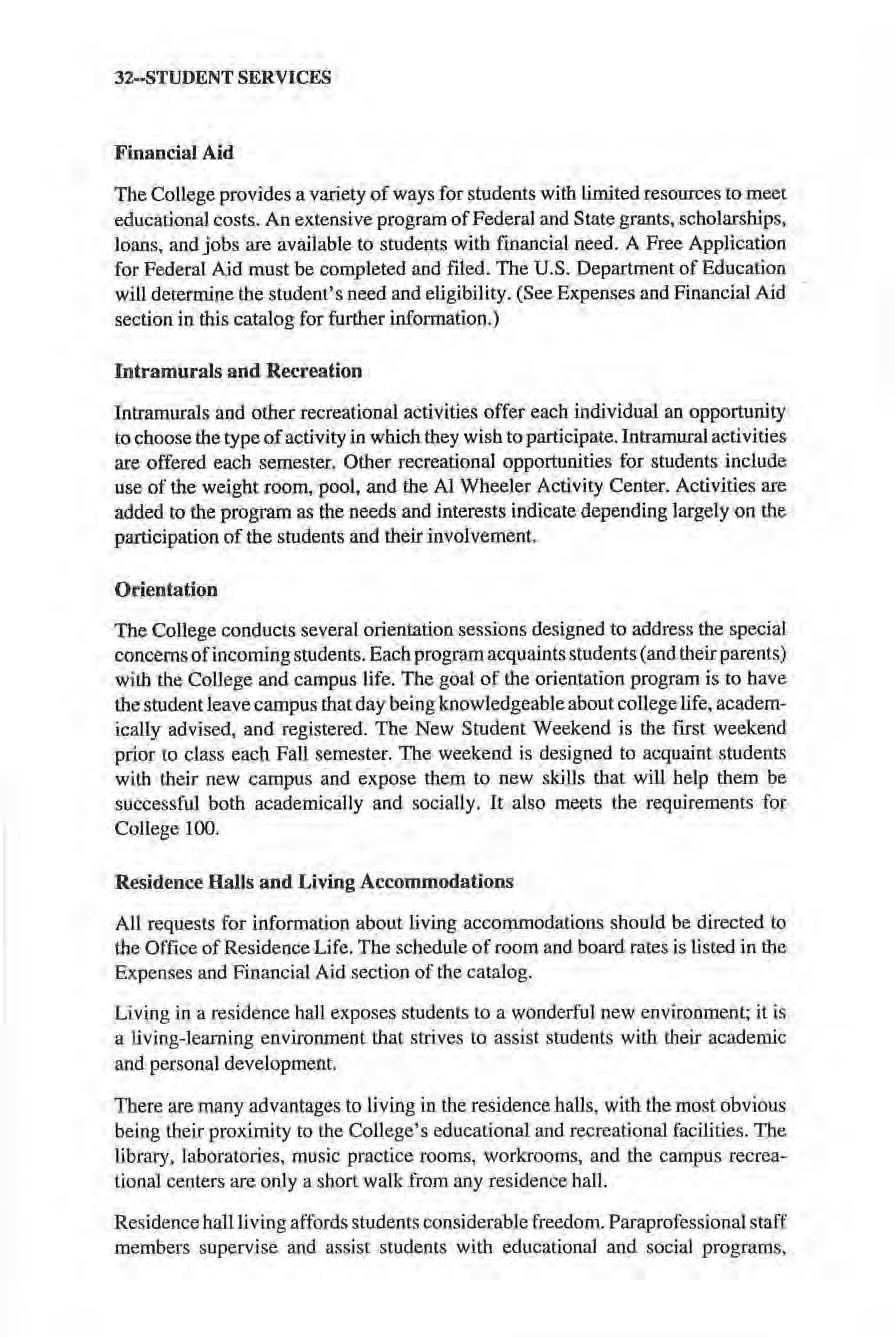
All requests for information about living accommodations should be directed to the Office of Residence Life. The schedule of room and board rates is listed in the Expenses and Financial Aid section of the catalog.
Living in a residence hall exposes students to a wonderful new environment; it is a living-learning environment that strives to assist students with their academic and personal development.
There are many advantages to livin g in tbe residence balls, with the most obvious being tbeic proximity to the College's educational and recreational facilities. The library, laboratories, musi c practice rooms, workrooms, a nd the campus recreational centers are o nly a short walk from any residence hall.
Res idence hall Iiving affords students considerable freedom. Paraprofessional staff members supervjse and assist students with educational and social programs,
32--STUDENT SERVICES
augmenting the academic program. These program s provide the assistance that may be needed to adjust to college life.
Peru State offers a variety of alternative living accommodations for students to choose from. There are separate residence halls for men a nd women as well as coeducational halls. Each residence ball bas its own visitation polici es and unique physical layout. Students are responsible for supp lying their own li nen and bedding including pillows and mattress pads. Residents are welcome to bring other personal items from home suc h as radios, stereos, etc. Hot plates, microwave ovens, and air conditioners are not permitted. The lower level of each hall is equipped with kitch en facilities, microwave oven, washers and dryers, and recreational equipment such as pool and ping- pong tables. Also, computer labs are located in each haU for student use. Hours of operation vary between hal ls.
The res idence ball and/or food contracts are for the full academic year. StudenL'> should understand that the contract is a financia ll y b inding agreement that ob ligates them for rental rates for the academic year. Contracts will be voided only for the following docum entable reasons: unforeseen financial hardship, medical, withdrawal from college, graduation, transfer, or marriage (appropriate ver ification is required). The last day to make changes to the residence hall and/or food contract coincides with the last day to drop/add .
All unmarried freshman and sophomore students must live in college residence halls; however, tl1is req u irement shall not apply to tllose undergraduates who:
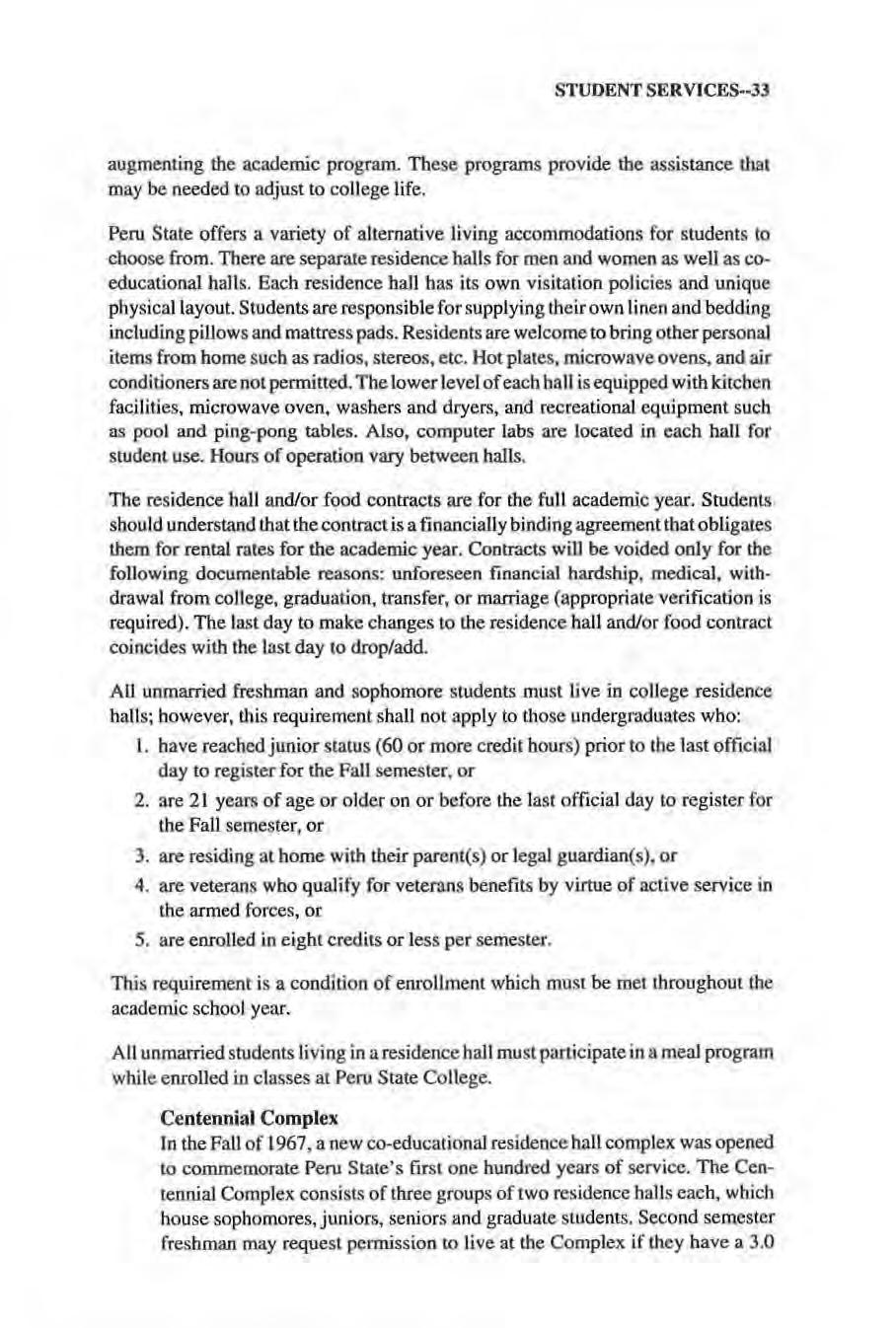
l. have reached junior status (60 or more credit hours) prior to the last official day to register for the Pall semester, or
2. are 2 1 years of age or older on or before the last official day to register for the Fall semester, or
3. are resid ing at home with their parent(s) or l egal guardian(s), or
4. are veterans who qualify for veterans benefits by virtue of active service in the armed forces, or
5. are enrolled in eight credits or less per se mester .
This requirement is a condition of enrollment which must be met throughout the academic school year
All unmarried students living in a residence hall must participate in a meal program while enrolled in classes at Peru S~ate College.
Cente nn ial Complex
Jn the Fall of 1967, a new co-educational residence hall complex was opened to commemorate Peru State's first one hundred years of serv ice. The Centennial Complex consists of three groups of two residence ball s each, which house sophomores, j u niors, seniors and graduate st udents. Second semester freshman may request permission to live at the Complex if they have a 3.0
STUDENT SERV ICES--33
GPA or higher. Davidson/Palmer Hall and Clayburn/Mathews Hall are coeducational. Nicholas/Pate Hall houses both sing le and married/family students.
The living areas in the Complex are set up suite-style. Each suite is comprised of two or three bedrooms, a living room and a bath. The suites are carpeted and furnished; each bedroom has two built-in desks, s tudy lights, book cases, a dresser, twin beds and a doub le closet with ampl e storage. For the convenience of resid ents there are computer/study suites with IBM-compatible computers and printers. The computer labs are also equipped for internet access.
Delzell Hall
Gothic-styled Delzell Hall house s approximately 150 men. The spacious living room is furnished with sofas, chairs, a television , and a fireplace.
There are four floors of rooms arranged as combination sleeping and study rooms with each room housing two students. A built-in combination dresser and desk, bookcase, bulletin board, twin bed, and draperies are furnished each student.
In addition to a walk-in closet, lavatory, and medicine cabinet that are s hared, each student is provided with an individual bui lt-in wardrobe. There is a large shower room of ceramic tile and marble located o n each floor. Delzell Hall also has a computer/study room for the conveni e nce of its residents, with computer access to the internet.
Eliza Morgan Hall

Located in the northwest comer of the campus, Eliza Morgan Hall was opened in 1929. The building houses 167 women in rooms situated on four floors. There are two large furnished lounges located on the first floor and the basement for student use. Rooms are double occupancy and furnished with two twin beds, two desks a dresser and window coverings. Jn addition, each resident shares with her roommate a closet and sink area. Each floor h as cent rally located bath.rooms aod shower areas.
M org an Hall has study rooms situated on each floor and a computer room on the first floor for the convenience of its residents . A compu ter with access to the Internet is located io this lab.
Oak Hill Apartment Housing
Campus apartments are available to students who have families or are older than traditional college age. Preference is given to married students who may or may not have children. There are one and two bedroom units available in Oak Hill. Each unit is furnished with a stove a nd refrigerator. Apartments are leased on a renewable yearly basi s. A deposit is required and is refundable at the eod of the lease agreemen t provided the property is left in good
34--STUDENT SERVICES
condition. Rent is due the first o f the month and is pa yabl e in the College Business Office.
Inquiries about marri ed/family housing may be made at t he Office of Residence Life.

Student Handbook
The S tudent Handbook is a guide for college success, college services, campus l iving, and student conduct. Students are expected to acquaint themselves and comply with the rules and policies in this catalog and the Student Handbook.
Student Health Services
The College maintains i ts Health Center in A.O. Majors Hall. Students may visit the college nurse, doctor, or counselor at the Health Center during regularly schedule d office hou rs or make appointments through the n urse with other health care p roviders. Some no nprescription drugs, first aid, and primary care are administered at the Hea lth Center. The College's respo nsib ility for med ical expenses is limited to these services.
It is recommended t hat s tude nts have health insurance. The College does not insure students for health care S tudents who wish to p articipate in intercollegiate athlet ics most be certified eac h season as physi cally fit by a physician and p rovide insurance information before beginning their sport.
Public Health Services
The College provides s pace at the Health Center for two medical clinics. for the benefit of the communi ty and t he College.
Famil y Planning Clinic provides pap smears, testing for sex ually transmitted infections (including HIV) and pregnancy, and coun seling on family planning. This clinic is held monthly
Nemaha County Health Department holds a Well Child Clinic several t imes each month which is available to any chil d regardless of residence or income.
Student Programs and Student Life
Peru S tate College provides opportu oiti es for students to grow outside the classroom setting
Studen t life on campus may be enhanced throu,gb many avenues. Students have the opportunity to become an in tegral part of campus activi ties through Studen t Senate, the student govern ing body of t he campus The Student Senate provides a lin k between t he Coll ege faculty, administration and the student body by serving on many College committees. The stude nt representative to the Nebraska State ColJege Board of Trustees a lso reports reg ularly to the Student Senate Tbe Student Senate is an el ected body representative of the student community.
STUDENT SERVICES--35
Students may also elect to be involved in Campus Activities Board (CAB), a volunteer student organization that provides campus educational, social, cultural, and recreational programs. CAB offers individuals opportunities to select, develop, and present quality programming. Throughout the year CAB sponsors a wide variety of activities including: professional artists, dances, picnics, non-traditional student programming, low-budget activities, ethnic cultural events, Women's Hi story Month, Homecoming, and Spring Fling activities.
Students also have the opportunity to become involved in other organizations on campus. Participation in these organizations and programs provides students an opportunity to develop leadership and social skills.
Student Organizations
Students at Peru State may partic.ipate in a wide variety ,of student organizations for their personal, social, academic, or professional benefit.
Professional and Social Organizations
ACORN - AEYC is a local affiliate of the national organization for the e ducation of young children. Membership in ACORN is open to both students and local area educators. NAEYC is the nation's largest membership organization of early childhood professionals. Students interested in the ed ucation of young children are encouraged to belong to this organization.
The Art Club is a soc ial club for art majors a nd students inte rested in art.
The Accounting Association is affiliated with the I nstitute of Management Accountants. Its purpose is to increase student awareness of careers in accounting and to increase employers awareness of Peru State graduates.
T he Association of Challenged and Enabled Students (ACES) provides support and information for those having or concerned with learning disabilities or physical disabilities and to expose the non-disabled population to a more realistic per spective of those with disabi lities.
The Campus Activities Board (CAB) is the central agency to provide and assist with co-curricular and recreational programs for the benefit of PSC and the surrounding community, and to develop sound student leadership through planning and executing co-curricular activities.
The Computer Club is open to all Peru State College stude nts. Its purpose is to enhance the membership's knowJedge of co mputers, computer applications, the I nternet, and other co mputer-related topics. Interested me.mbers have the opportunity to gain experience by doing consulting work fo r business and industry.
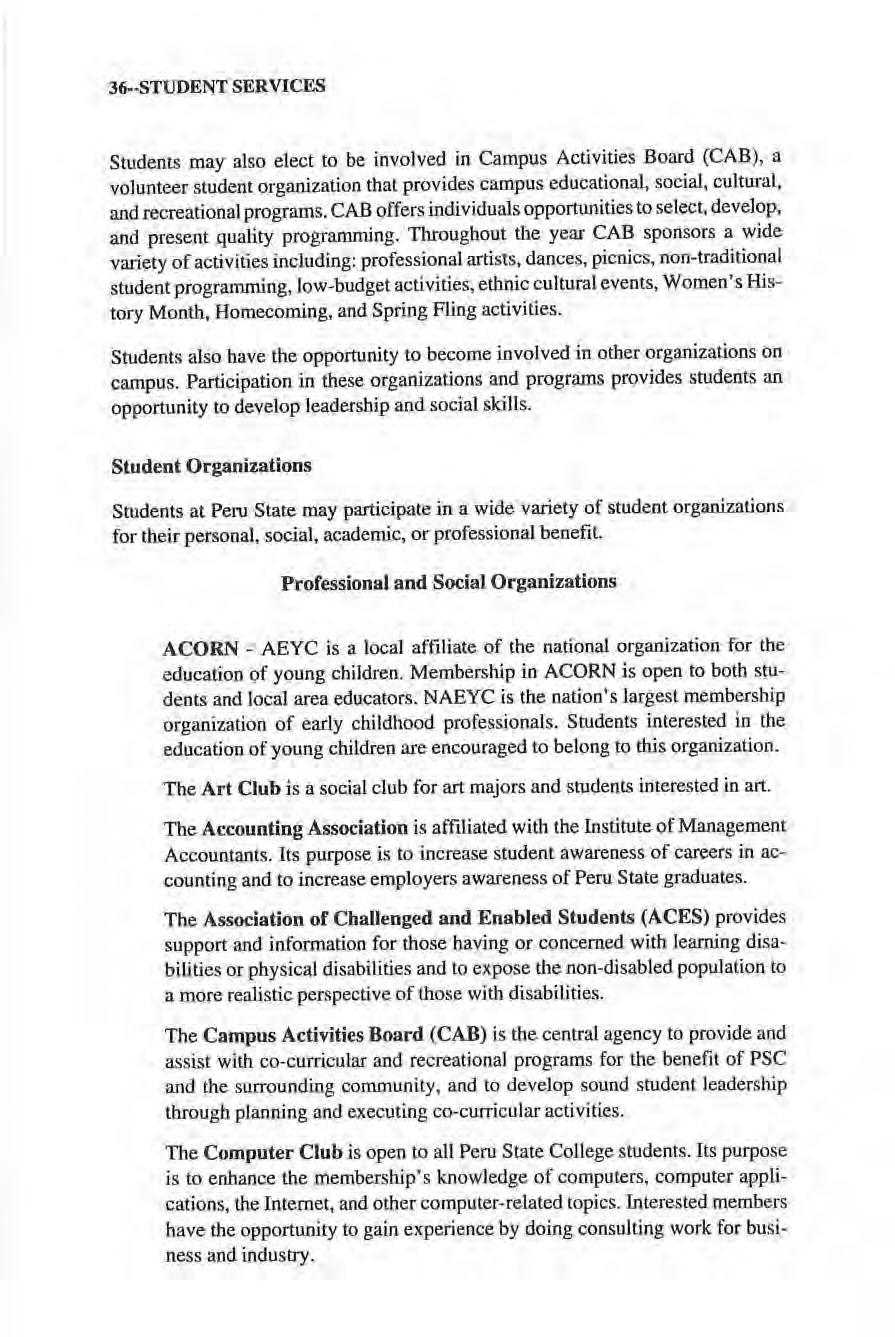
36--STlJDENT SERVICES
The Council for Exceptional Children-Student (CEC-S), a program of CEC, is an international _ association for all student members of CEC and i s organized on both the state/pro vincial level and on the the international l evel. Its primary purpose is to "present stu dents with opportunities to improve educational, professional standards and increase awareness of exceptional children and youth,'' and it is ''the focal point for the professional preparation of any student interested in services forex:ceptional children and youth."
The Biology Club provides educational and professional activities for students interested in the biological sciences.
The English Club promotes the mastery of written expression, encourages worthwhile reading, and fosters fellowship among students specializing in English or literature.
The Honors C lub allows academically successfu l students to interact a nd express ideas and thoughts among one another and promotes a high academic standard at Peru State College. The cl ub is open to students who are eligible to participate in the Honors Program.
The Industrial Arts Club is devoted to promoting interest in the industrial arts and vocational education.
The Multicultural Committee is a campus-wide committee composed of students, faculty and staff that assists the campus in increasing awareness and respect for the variety of cultures that inhabit the earth.
The Peru Players is the state' s oldest college d ramatic organization. The m e mbers assist in presenting the best in drama to the College and the community. The Peru Players membership is open to all interested stude11ts.
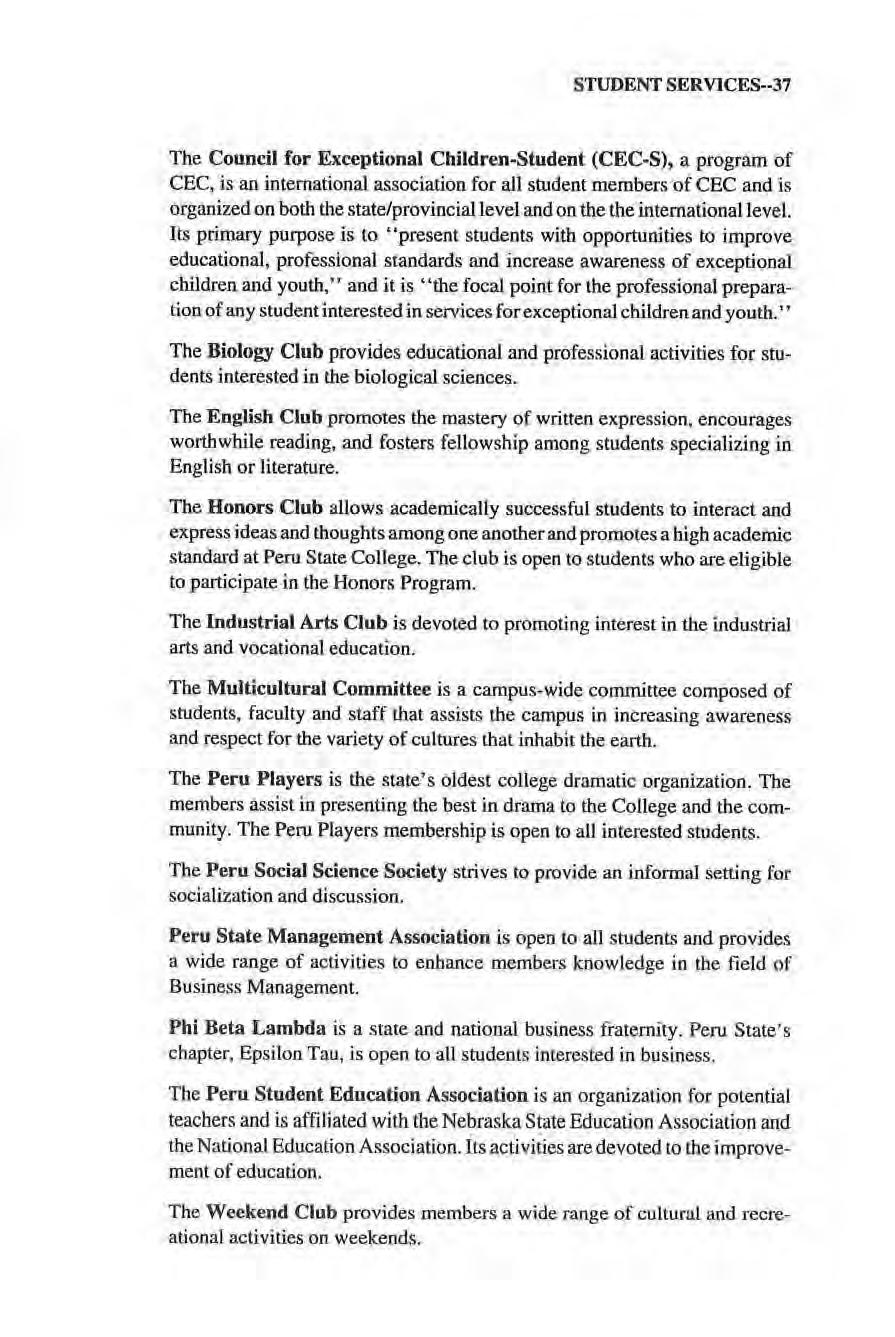
The Peru Social Science Society strives to provide an informal setting for social ization and discussion.
Peru State Management Association is open to all stude nts and provides a wide range of activities to enhance members knowledge in the field of Business Management.
Phi Beta Lambda is a state and nation al business fratemily. Peru State' s chapter, Epsilon Tau, is open to all students interested in business.
The Peru Student Education Association is an organization for potential teachers and is affiliated with the Nebraska State Education Association and the National Education Association. Its activities are devoted to the improvement of education.
The Weekend Club provides members a wide range of cultural and recreation al activities on weekends.
STUDENT SERVICES--37
Honorary Societies
Alpha Chi is the College's national honorary scholarship society. It recognizes academic scholarship, good reputation, and character. The society's members are selected from the top ten percent of thejunior and senior classes.
Alpha Mu Omega is an honorary mathematics fraternity which aims to develop and promote interest in the study of mathematics. Students with above-average grades in mathematics who have taken at least ten bours of mathematics are eligible for membership.
Alpha Psi Omega, the national honorary theater fraternity, is represented on the Peru State campus by the Zeta Lambda Chapter. Scholastic ability and active theater participation are the criteria for membership.
Beta Beta Beta is the College's professional honorary biology fraternity open to junior and senior biology students. Candidates for membership must have above-average grades and plan to continually study biology.
Epsilon Pi Tau, an honorary professional fraternity in technology education. selects juniors and seniors based on their grade point averages in the industrial arts and other fields.
Kappa Delta Pi is a national honorary education fraternity open to juniors who rank in the upper quartile of their class and who show evidence of a continued interest in education.
Lambda Delta Lambda is an honorary fraternity for students interested ia physical science.
Phi Alpha Theta, a national h.onorary history fraternity, is open to students with more than 12 hours of history and high scholastic standing.
Sigma Tau Delta, the national honorary English fraternity, granted Peru State its Phi Alpha Chapter in 1926. Students who demonstrate an interest in literature and creative writing and who are above average in scholarship are eligible for membership. The chapter assists the English Club in publishing Sifting Sands.
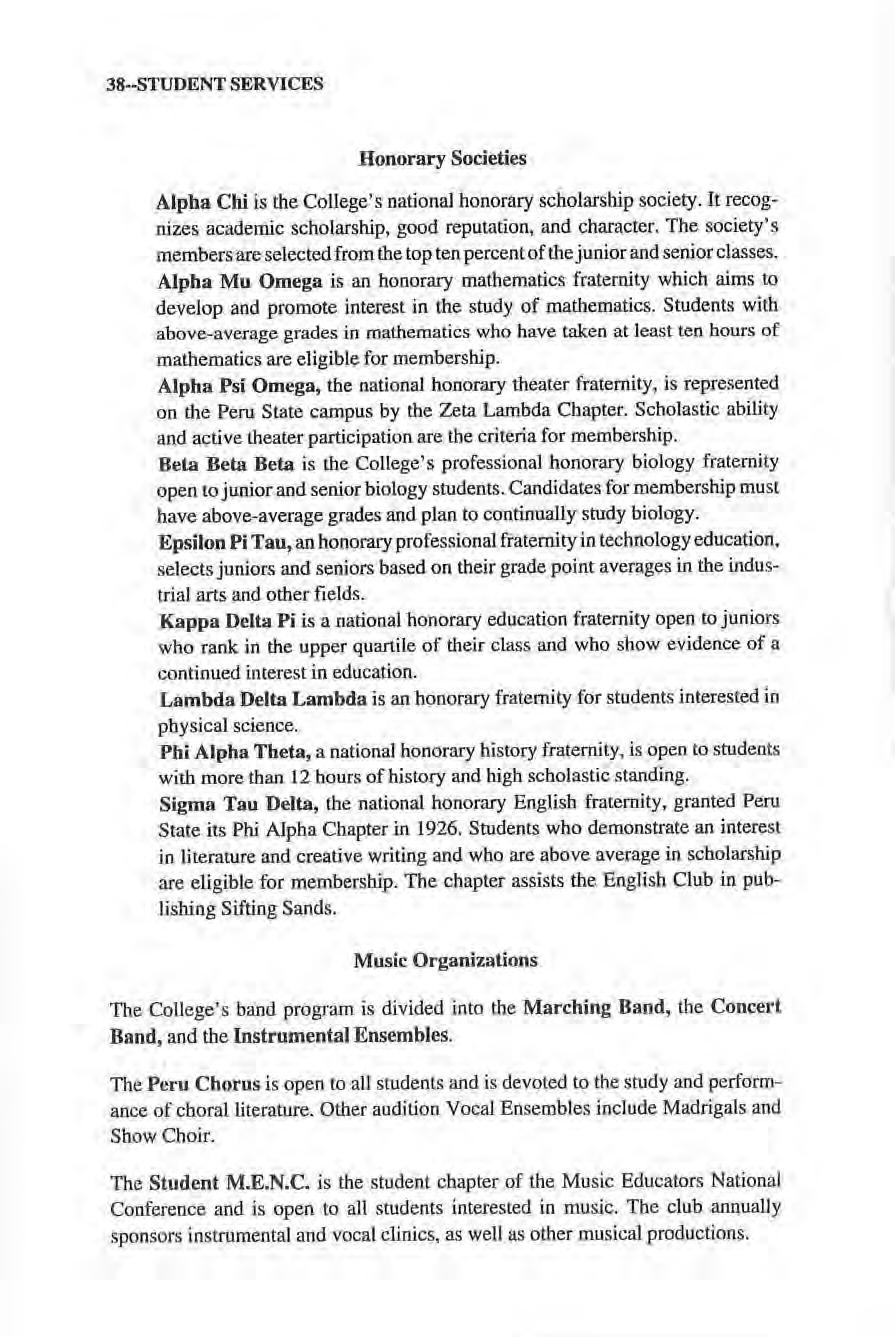
Music Organizations
The College's band program is divided into the Marching Band, the Concert Band, and the Instrumental Ensembles.
Th e Peru Chorus is open to alf students and is devoted to the study and performance of choral literature. Other audition Vocal Ensembles include Madrigals and Show C hoir.
The Student M.E.N.C. is the student ch apter of the Mu sic Educators National Conference and is open to all students interested in music. The club annually sponsors instrumental and vocal clinics, as well as other musical productions.
38--STUDENT SERVICES
Religious Organizations
There are several religious groups available to Peru State students. Currently th ere are the Fellowship of Christian Athletes, the United Ministry to Higher Education, and the Campus Crusade for Christ.
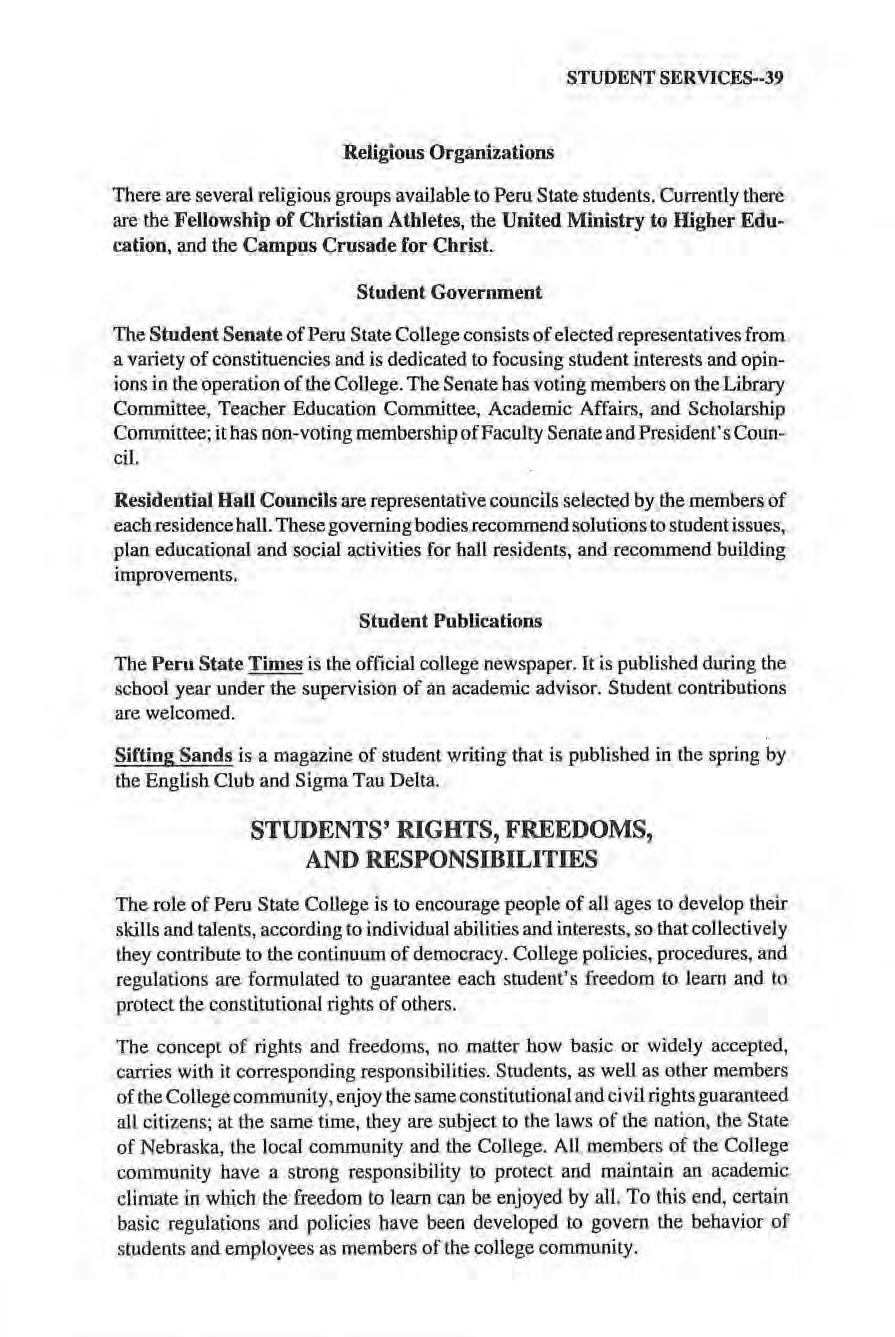
Student Government
The Student Senate of Peru State College consists of elected representatives from a variety of constituencies and is dedicated to focusing student interests and opinion s in the operation of the Co!Jege. The Senate bas voting members on the Library Committee, Teacher Education Committee, Academic Affairs, and Scholarship Committee; it has non-voting membership of Faculty Senate and President's Council.
Residential Hall Councils are representative councils selected by the members of each residence hall. These governing bodies recommend solutions to student issues , plan educational and social activities for hall residents, and recommend building improvements.
Student Publications
The Peru State !imes is the official college newspaper. It is published during the school year under the supervision of an academic advisor. Student contributions are welcomed.
Sifting Sands is a magazine of student writing that is publi s h ed in the spring by the English Club and Sigma Tau Delta.
STUDENTS' RIGHTS, FREEDOMS, AND RESPONSIBILITIES
The role of Peru State College is to encourage peopl e of all ages to develop their skills and talents, according to individual abilities and interests, so that collectively they contribute to the continuum of democracy. College policies, procedures, and regulations are formulated to guarantee each student's freedom to learn and to protect the constitutional rights of others.
The concept of rights and freedoms, no matter how basic or widely accepted, carries with it corresponding respo ns ibilities Students, as well as otller members of the College community, enjoy the same constitutional and civil rights guaranteed all citi zens; at the same time, they are subject to the laws of the nation, the State of Nebras ka, the local community and the College. All members of the College community have a s trong responsibility to protect and maintain an academic climate in which the·freedom to learn can be enjoyed by all. To this e nd , certain basic regulatio ns and policies have been developed to govern the behavior of stud ents and employees as members of the college community.
STUDENT SERVICES--39
Violations of student conduct regulations will be handled through the Office of the Vice President for Student Affairs. Violations of federa~ state, and/or local laws make a student subject to civil and/or criminal action in addition to disciplinary action by the College. Each student is responsible for knowing and complying with PSC policies, procedures, and deadlines
Policies and regulations may be found in the College Catalog, the Student Handbook, and in the Student Affairs Office.
Academic Rights of Students
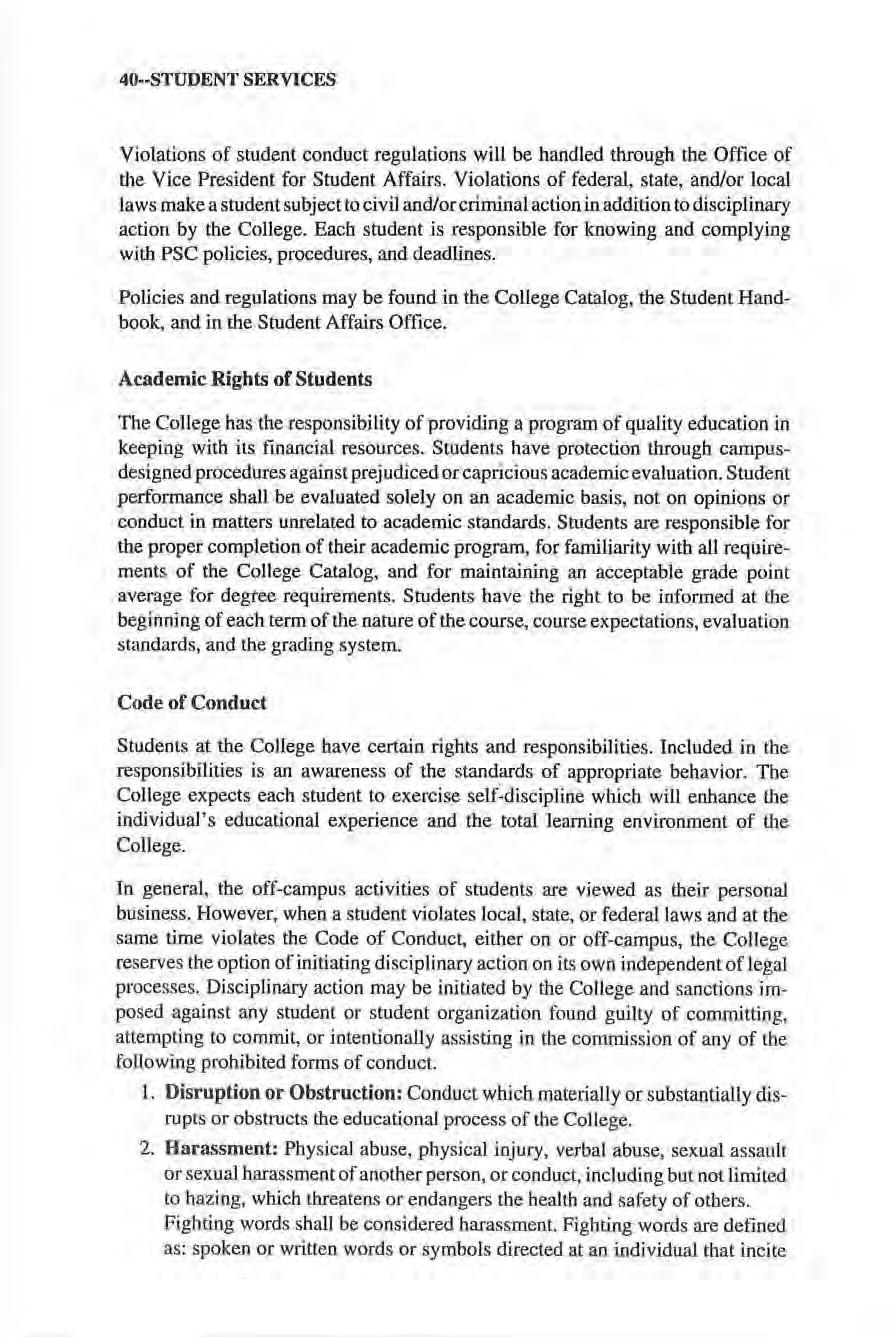
The College has the responsibility of providing a program of quality education in keeping with its financi al resources. Students have protection through campusdesigned procedures against prejudiced or capricious academic evaluation. Student performance shall be evaluated solely on an academic basis, not on opinions or conduct in matters unrelated to academic standards. Students are responsib le for the proper completion of their academic program, for familiarity with all requirements of the College Catalog, and for maintaining an acceptable grade point average for degree requirements. Students have the rig ht to be informed at the beginning of each term of the nature of the course, course expectations, eval uation standards, and the grading system.
Code of Conduct
Students at the College have certain rights and responsibilities. Included in the respo nsibilities is an awareness of the standards of appropriate behavior. The College expects each student to exercise selfdiscipline which will enhance th e individual' s educational experience and the total learning environment of the College.
In general, the off-camp us activities of students are viewed as their personal business. However, when a student violates local, state, or federal laws and at the same time violates the Code of Conduct, e ither on or off-campus, the College reserves the option of initiating disciplinary action on its own independent of legal processes. Disciplinary action may be initiated by the College and sanctions imposed against any student or s tudent organization found guilty of committing , attempting to commit, or intentionally assisting in the commission of any of the following prohibited forms of conduct.
1. Disruption or Obstruction: Conduct which materially or substantially disrupts or obstructs the educational process of the College.
2. Harassment: Physical abuse, physical injury, verbal abuse, sexual assault or sex1m] harassment of another person, or cond uct, including but not limited to hazing, which threatens or endangers the health and safety of others. righting words shall be considered harassment. Fighting words are defined a s : spoken or w1itten words or symbols directed at an fodividual that incite
40--STUDENT SERVICES
riot, violence or destruction of property and infringement of ability to engage in one's collegiate activities.
3. Hazing: Student organizations or individuals shall neither engage in nor condone any form of hazing. Hazing may include but is not limited to:
a) any action taken or situation intentionally created to subj ect another person to mental or physical discomfort, embarrassment, risk or ridicule; b) verbal or physical harassment or abuse; c) encouragement, facilitation or parti cipation in public stunts, violations oflaw as college policy, morally degrading or humiliating behavior or games on or off campus w hich interfere with academic performance or Un.reasonably create a hostile or offensive learning e nvironment; or d) the physical marking of students, e.g., branding, tattooing or other disfigurement.
4. Intoxicants and Drugs: Possession: consumption, being under the intluence, or furnishing of alcoholic beverages, narcotic or dangerous drugs on ·camp us property or at supetvised functions of student organizations is prohibited Possession, consumption, being perceptibly under the influence, or furnishing of any narcotic or dangerous drugs is prohibited except wben use or possession is lawfully prescribed by an authorized medical. doctor or dentist.
5. Dangerous Chemicals and Devices: U nauthorized use, possession , or sale of firearms, explosives, chemicals, or other dangerous weapons on College property except as expressly authorized by campus procedures and properly stored.
6 _ Other Forms of Misconduct: Viol ations of local, state and/or fede ral laws, forgery, alteration, or misuse of College documents, records or deliberate misrepresentation, theft, damage or misuse of College or private property. Unautl10rized use of College funds, equipment and supp lies ( including but not limited to falsely representing oneself as an agent of the College, incurring debts or entering into contracts on behalf of the College).
7. Violations of College Regulations: Violating published College regulations, including those related to entry and use of College facil ities, th e rules in this section, and any other rules or regulations which may be enacted by the College. Fail ure to comply with the lawful directions of College personnel acting in the performance of their duties
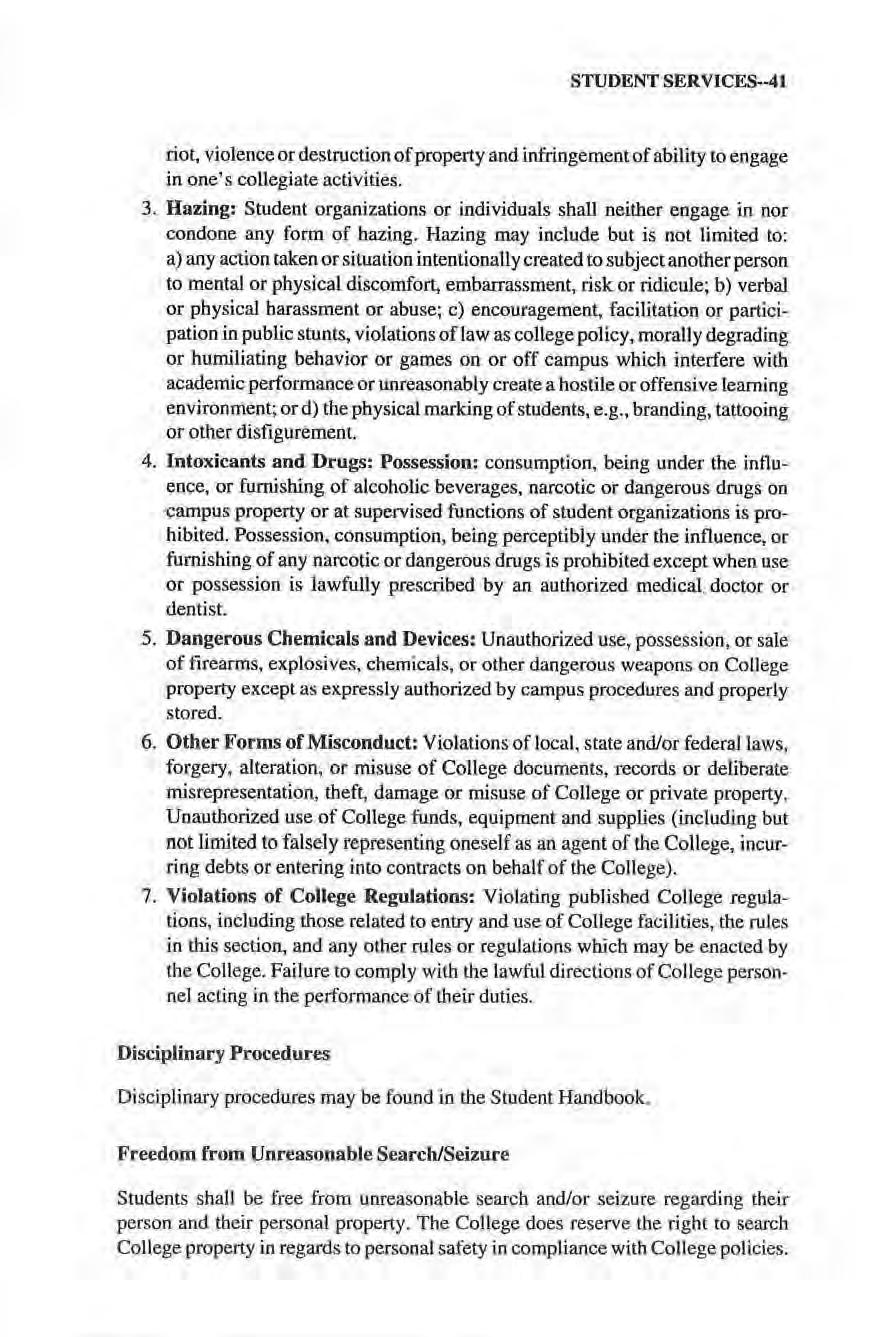
Disciplinary Procedures
Di sciplinary procedures may be found in the Student Handbook.
Freedom from Unreasonable Search/Seizure
Students shall be free from unreaso nable search and/or seizure regarding their person and their p ersonal p roperty. The College does reserve the right to search College property in regards to personal safety in compliance with College poli.cies.
STUDENT SERVICES- -41
Freedom of Access
Within the limits of its resources, Peru State College shall be open to all applicants who are qualified according to current admission requirements. Peru State College does not discriminate on the basis of race, creed, color, national origin, mental or physical disabilities, age, sex, or sexual orientation in any of its polic ies, practices, or procedures. Th.is includes, but is not limited to, admissions, employment, ftnan • cial aid, and educational services, programs, and activities .
Freedom of Association
Students are {ree to associate and promote their common interests. They have the right to seek, through official p rocedures, the establishment of organizations as long as they are not in conflict with the educational purposes of the Co11ege. Students have the right to affiliate with officially recognized campus organizati ons of their choice, within the membership requirements of those organizations.
Freedom of Expression
The rights of free speech and peaceable assemb ly are fundamental to the democratic process The College supports the rights of students of the College community to express their views and opinions on actions or ideas, to associate freely w i th others, and to assemb le peacefully. The College reserves the right to determine or regulate time, p lace and manner of expression, demonstrations, or meetings.
Whether expressing themselves as individuals or in organized groups, members of the College commu ni ty are expected to conduct themselves responsibly, according to Jaw and to respect the basic educational goals of the College. Accordingly, the College insists that free expression not violate the rights of others. Disruption of the educational processes and fu nctions of the College, violation of law, and fig hting words would constitute such violation of the Student Code of Conduct, for ex.ample.
Student Participation in Institutional Government
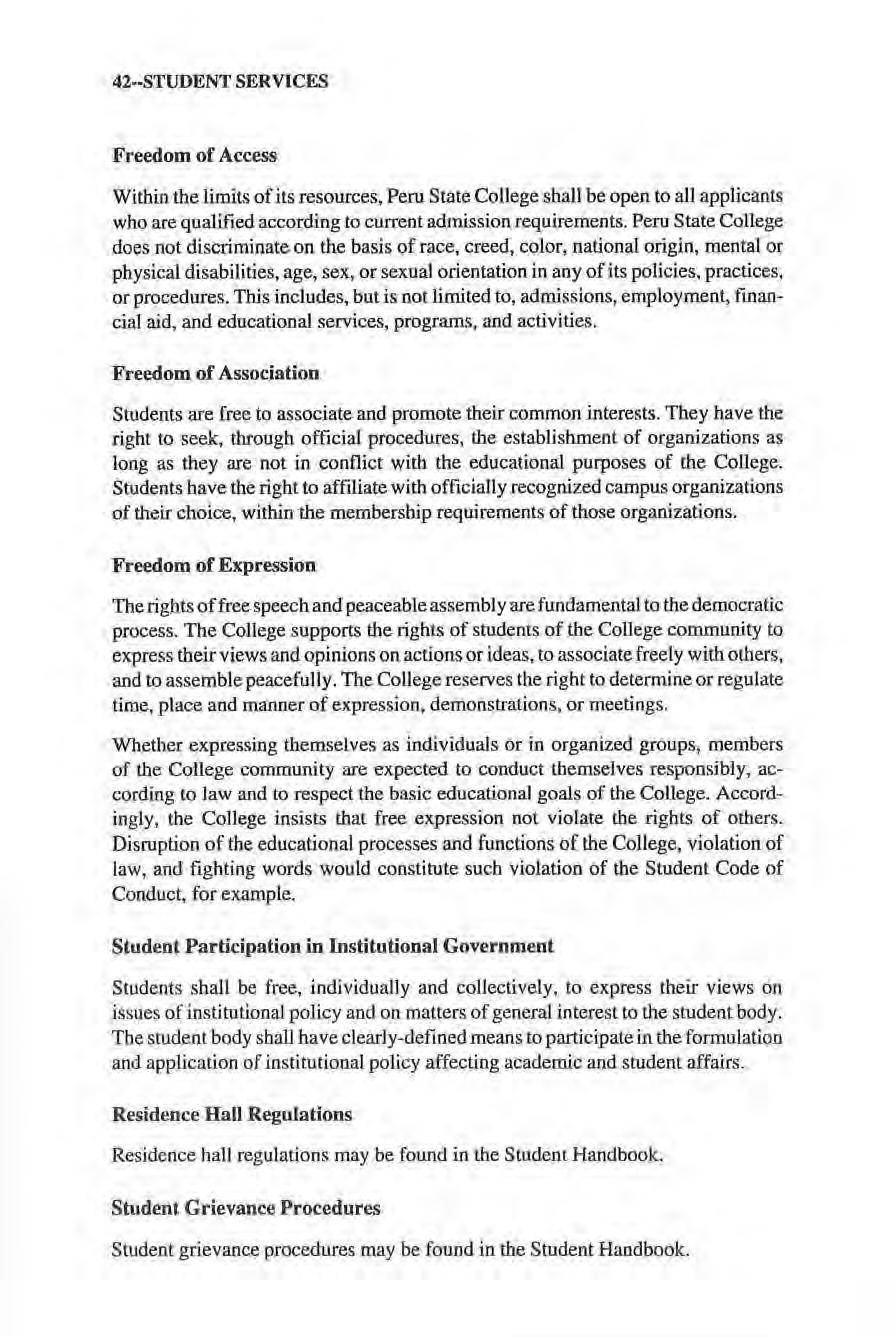
Students shall be free, indiv idually and collectively, to express their views on is sues oJ institutional policy and on matters of ge neral interest to the student body. The student body shaU have clearly-defined means to participate in the formulation and application of institutional policy affecting academic and student affairs
Residence Hall Regu.lations
Residence hall regulations may be found in the Student Handbook.
Student Grievance Procedures
Student grievance procedures may be found in the Student Handbook.
42--STUDENT SERVICES
NON-ACADEMIC POLICIES
AIDS
This policy is followed in the event any student, employee, or other school cont.act has contracted AIDS (Acquired Immune Deficiency Syndrome), or has been diagnosed by a physician as being infected with the HIV virus ( Human Immunodeficiency Virus).
The goals of Peru State College are to:
1 Provide an appropriate and leas t restr ictive work/study setting as feasible for AlbS, and IDV p e rso ns.
2. Provide a safe environment for t he College community.
3. Maintain and protect all rights and privacy of Atos, and HIV persons.
4. Continue to observe non-discriminatory guidelines for all areas of campus life (i.e. social, academic, and cultural).
5. Assure that students/staff are not put at risk because of lack of knowledge, education, or proper equipment.
6. Increase awareness and provide education to prevent further disease .
HIV/STD testing is available at the Student Health Clinic.
Discrimination
Peru State College believes that fostering diversity and respect for difference is a fundamental goal of higber educational institutions. Therefore , the College takes the unequivocal stance that the s ubordination of a p erson or a group based on race, color, creed, disab i lity, marital status, national origin, rnce, sex, or sexual orientation, cannot be tolerated. Peru State College will take strong and effective steps to achieve a diverse learning environment and a workplace respectful of differences. Clear, fair and effective poHcies will tie formulated and communicated t o all members of the campus community, and will respond promptly and consistently to co mplaints about any acts that violate those policies.
Family Education Rights and Privacy Act of 1974
Tbe primary purpose for maintaining student records at Peru State i s to assist students with their educational endeavors and to record ins titutional actio ns. lt is the policy of the College to allow students to inspect, review and challenge their educational records as provid ed by the Family Education Rights and Privacy Act of 1974 (Buckley Amendment).
Th.e publication, '' Access to and Dissemination of Informatio n about Students at Petu State College,'' contains detailed information about the Buckley Amendment and is available from the Office of Student Affairs.
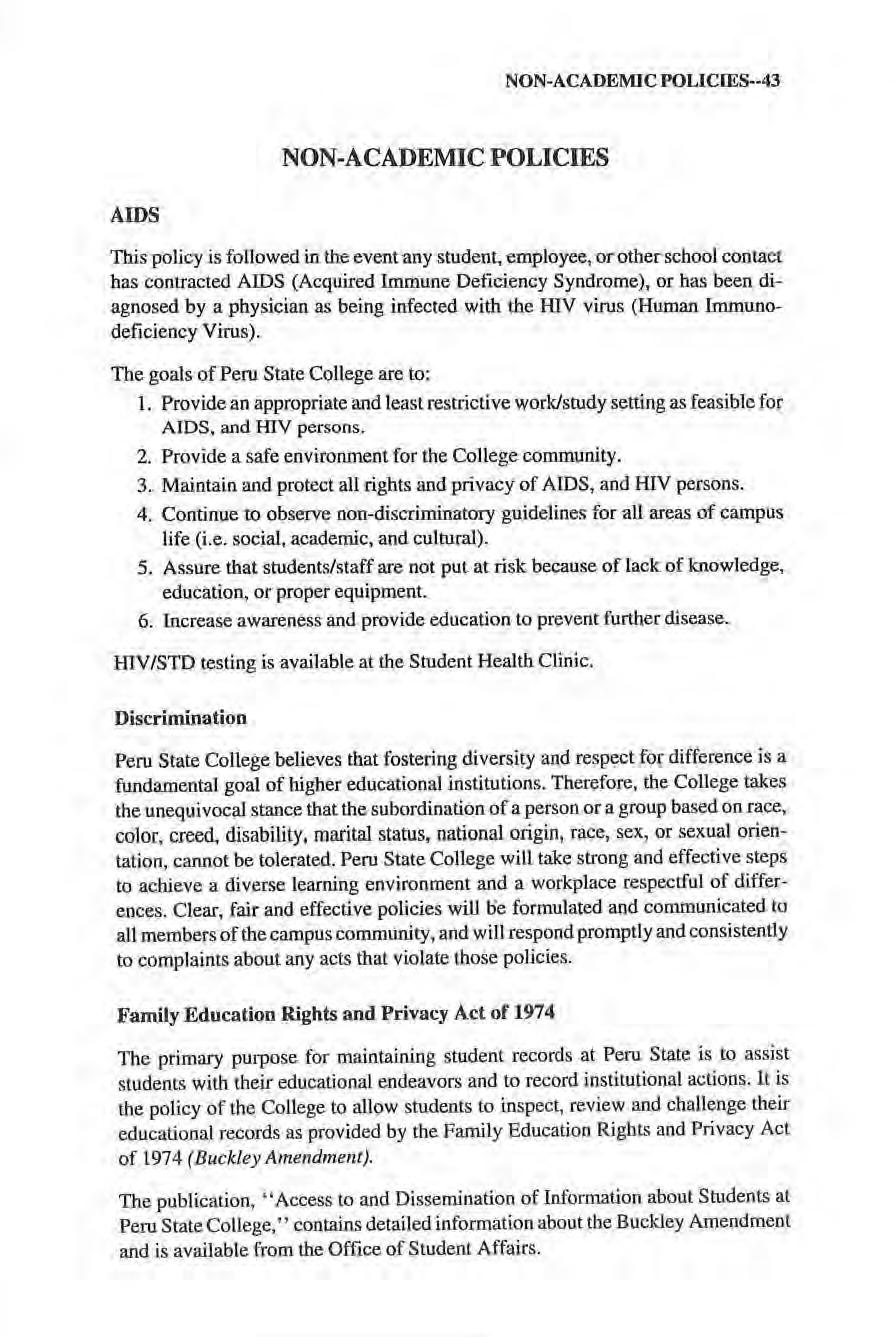
NON- ACADEMIC POLICffiS--43
Co mplaints about the alleged failure of the College to comp!y with the requireme nts of the Buckley Amendment should be first addressed to the Office of the Vice President for Academic Affairs.
Sexual Assault and Sexual Harassment
The College is concerned about the safety and weH-being of its students and staff and will promote awareness of sexual harassment. rape, acquaintanc e rape, and other sex offenses throtlgh educational programs, workshops, counseling and printed materials.
Sexual assault or harassment are violations of the Student Code of Conduct and the Board of Trustees policy concerning emp loyees, and are prohibited. All allegatio ns of sexual assault and/or harassment should be made in a timely manner directly to the Vice President for Student Affairs. All allegations will be investigated thoroughly and will require detailed accounts of the incident(s). The investigat ion will be as confidential as possible. ln cases of sexual assault the victim will be encouraged to immediately contact the proper leg al and medical authorities in order to preserve evidence and prove criminal sexual assault.
Allegations of sexual assault or sexual harassment will result in a disciplinary and/ or grievance procedure as outlined in the Student Handbook. Th e results of disciplinary and/or gtievance hearings evolving from allegations of sexual assault or sexual harassment will be made known to both the plaintiff and accused within forty-eight (48 ) hours after the conclusion of the hearing. The physical violation of one person by another is deemed as most serious, and all appropriate campus and legal sanctions will be brought to bear on all guilty persons.
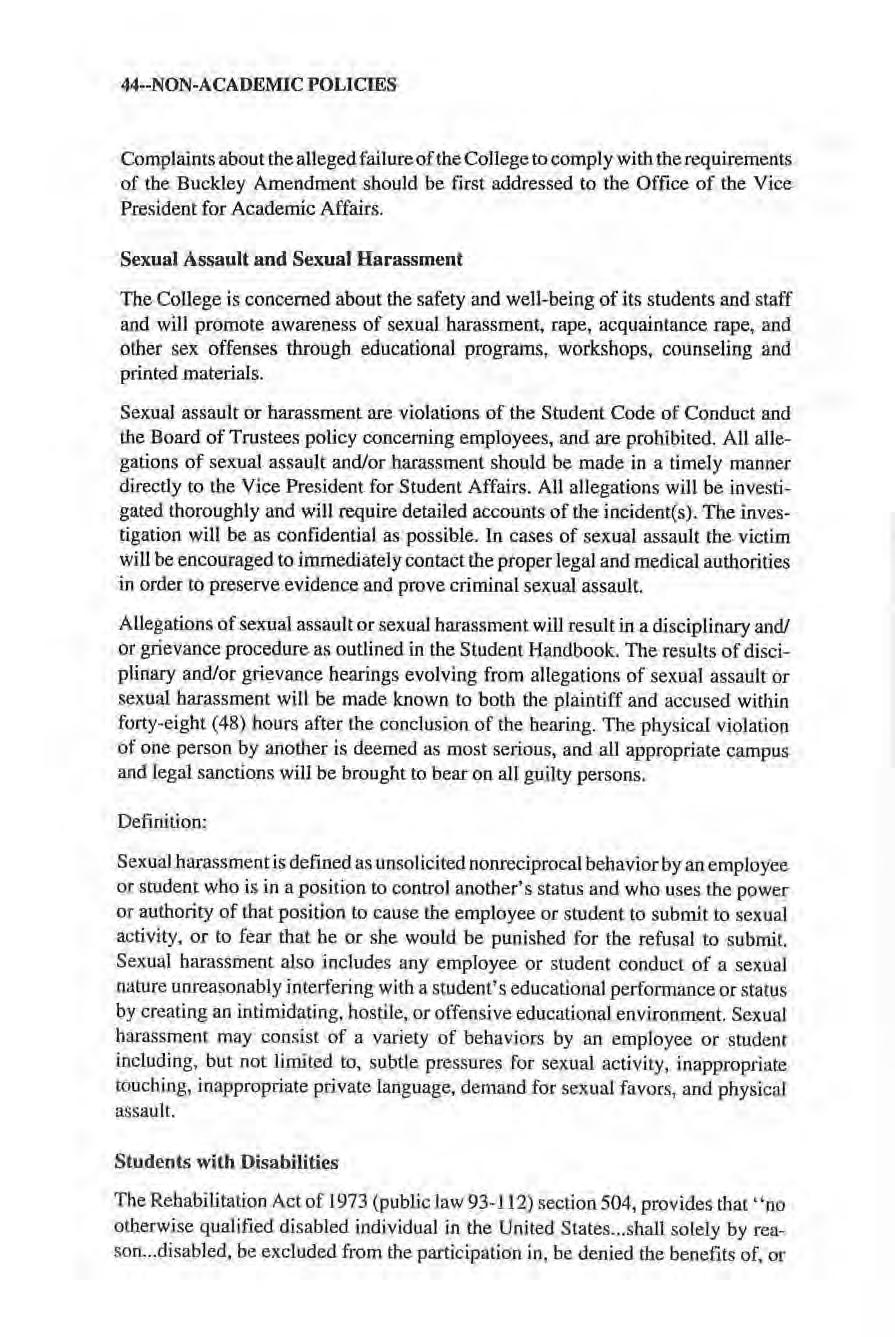
Definition:
Sexual harassment is defined as unsolicited nonreciprocal behavior by an employee or student who is in a positi on to control another's status and who uses the power or authority of that position to cause the employee or student to submit to sexual activity, or to fear that be or she would be punished for the refusal to submit. Sexual harassment also includes any e mployee or student conduct of a sexual nature unreasonably interfering with a student's educational performance or stat us by creating an intimidating, hostile, or offensive educational environment. Sexual harassment may consist of a variety of behaviors by an em ployee or student including, but not limited to, subtle pressures for sexual activity, inappropriate touching, in appropriate private language, demand for sexual favors, and physical assault.
Stude nts with Disabilities
The Rehabilitation Act of 1973 (public Jaw 93-1 12) section 504, provides that ' 'no otherwise qualified disabled individual in the United States...shal l so lely by reason.. .disabled, be excluded from the participation in, be denied the benefits of, or
44--NON-ACADEMlC POLICIES
be subjected to discrimination under any program or activi ty receiving federal financial assistance."
1. It is the student's responsibility to notify the institution of any special circumstances that would affect bis/her ability to compete equall y in the college environment. Learning disabilities must be appropriately documented.
2. While students are encouraged to self-identify at the earliest possible time, students may notknoworchoosetoself-identify, but can still recei ve serv ices at any time once they self-disclose and document.
3. Students should contact the office of Student Support Services, Vice President for Stude ntAffairs or the Director of Admissions for further advisement.

Vehicle Registration and Parking
Students must register their motor vehicles with the Physical Plant Office if they plan to operate them on campus. Vehicles are defined as all gasoljne-powered vehicles such as automobiles, motorcycles, or motor scooters. The registration fee is fifteen dollars ($15.00).
Only vehicles with the proper identification are a llowed to park in residence hall and other restricted areas. Adequate parking is available in off-street areas, and students are not to park in the residential areas adjacent to the campus.
NON-ACADEMIC POLICIES--45
COLLEGE AND PUBLIC SERVICES
Economic Development
Peru State College provides economic development services to communities in Southeast Nebraska. The Economic Development Program is headed by a fulltime director. Community service activities of th e Economic Development Program include short courses and workshops, assistance to communities in strategic planning, site evaluation, marketing, business retention, and other aspects of de-velopment as requested by communities and development agencies. In addition, the College's Economic Development Program serves as a liaison between state and regional development agencies a nd community development groups within its se.rvice area
Activities of the Economic Development Program are overseen by an Advisory Council composed of financial contributors and commuruty representatives from the Peru State College service area.
Nebraska Business Development Center
The Nebraska Business Development Center on the College campus provides free consulting to businesses or persons wanting to start a business. Clients may be assisted with management, financial projections, marketing, writing business plans, selectin g compute rs . or other concerns. The N'BOC is funded by the Small Business Administration, the State of Nebraska. and the College.
Peru Alumni Association
All graduates of Peru State College, as well as former students, faculty and staff who request it, are considered members of the Peru State College Alumni Association. There are no annual dues or fees.
Active chapters includeLincoln (organized in 1955), Omaha(l955), Rocky Mountain ( 1957, includes Colorado, Wyoming, western Kansas, and western Nebraska ), Northern California (1958), Arizona (1995) and Kansas City ( 1995). Inactive chapters include Southern California (1961), the locaJ Thousand Oaks chapter (1973), and the East Coast chapter ( 1988 , includes Maine to North Carolina along eastern seaboard).
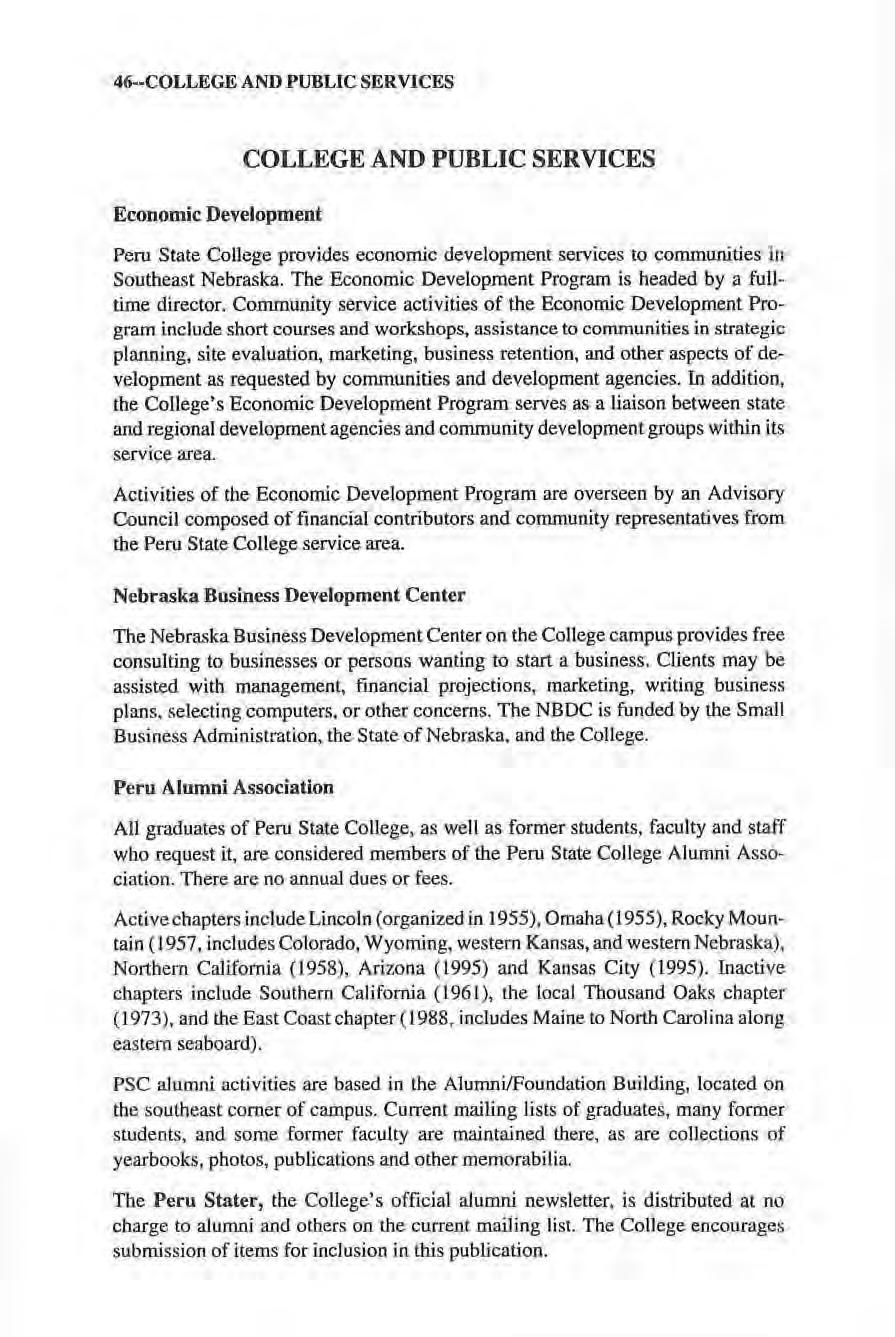
PSC alumni activities are based in the Alumni/Foundation Building, located on the southeast corner of campus. Current mailing li sts of graduates, many former students, and some for mer faculty are maintained there, as are collectio ns of yearbooks, photos, publications and other memorabilia.
The Peru Stater, tile College's official alumni newsletter, is distributed at no charge to alumni and others on the current mailing list. The College encourages submission of items for inclusion in t his publication.
46--COLLEGE AND PUBLIC SERVICES
College Library
The Peru State College Library is fully automated with on_line catalog, databases, full-text resources, and Internet access. The print collection is 125,000 volumes. Interlibrary Joan service provides access to print resources around the world. Special collectio ns include the original manuscripts of authors Marion Marsh Brown, E.P. Conkle, Ruth Crone, and Louise Mears and includes the his tory of Peru State College and region. Students and other interested parties may review reports from accrediting agencies in the College Library.
Instructional Services Center
The Instructional Services Center houses a large variety of audio-visual equipment and materials. A computer and word processor are also available for student use. The Center's satellite dish and television studio provide a wide range ?f educational and recreational opportunities for students and community
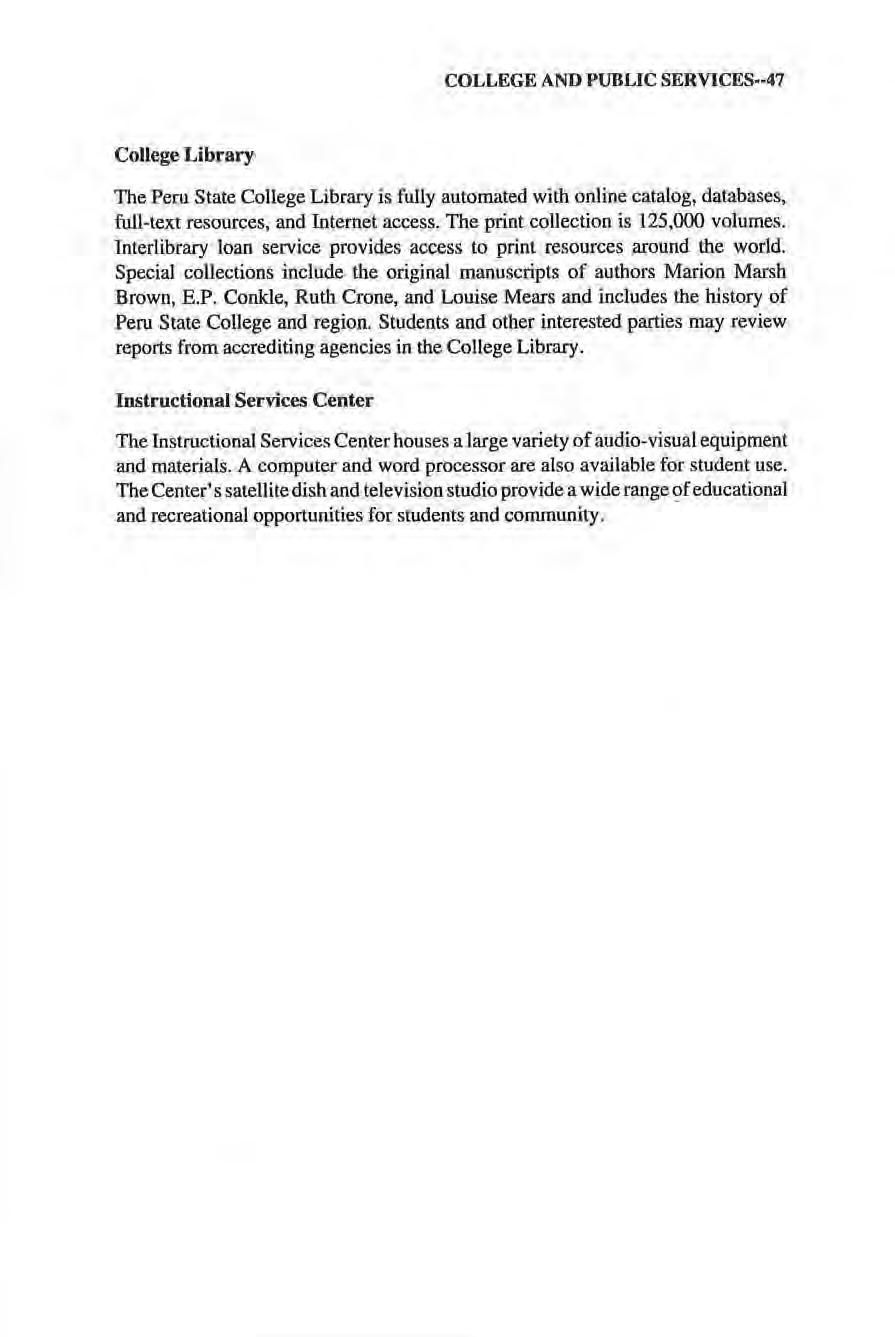
COLLEGE AND PUBLIC SERVICES-.47
UNDERGRADUATE DEGREE AND PROGRAM INFORMATION
Graduation Requirements
In compliance with Board of Trustees policy, this catalog is intended as a description of the educational programs and activities offered by Peru State. Information in the catalog is correct according to information available at the time of publication. The catalog is explanatory in nature and is not a contract between the student and Peru State College. Peru State College reserves the right to withdraw courses at anytime, change the rules and requirements regulating admission and graduation requirements, and change other regulations affecting the student body.
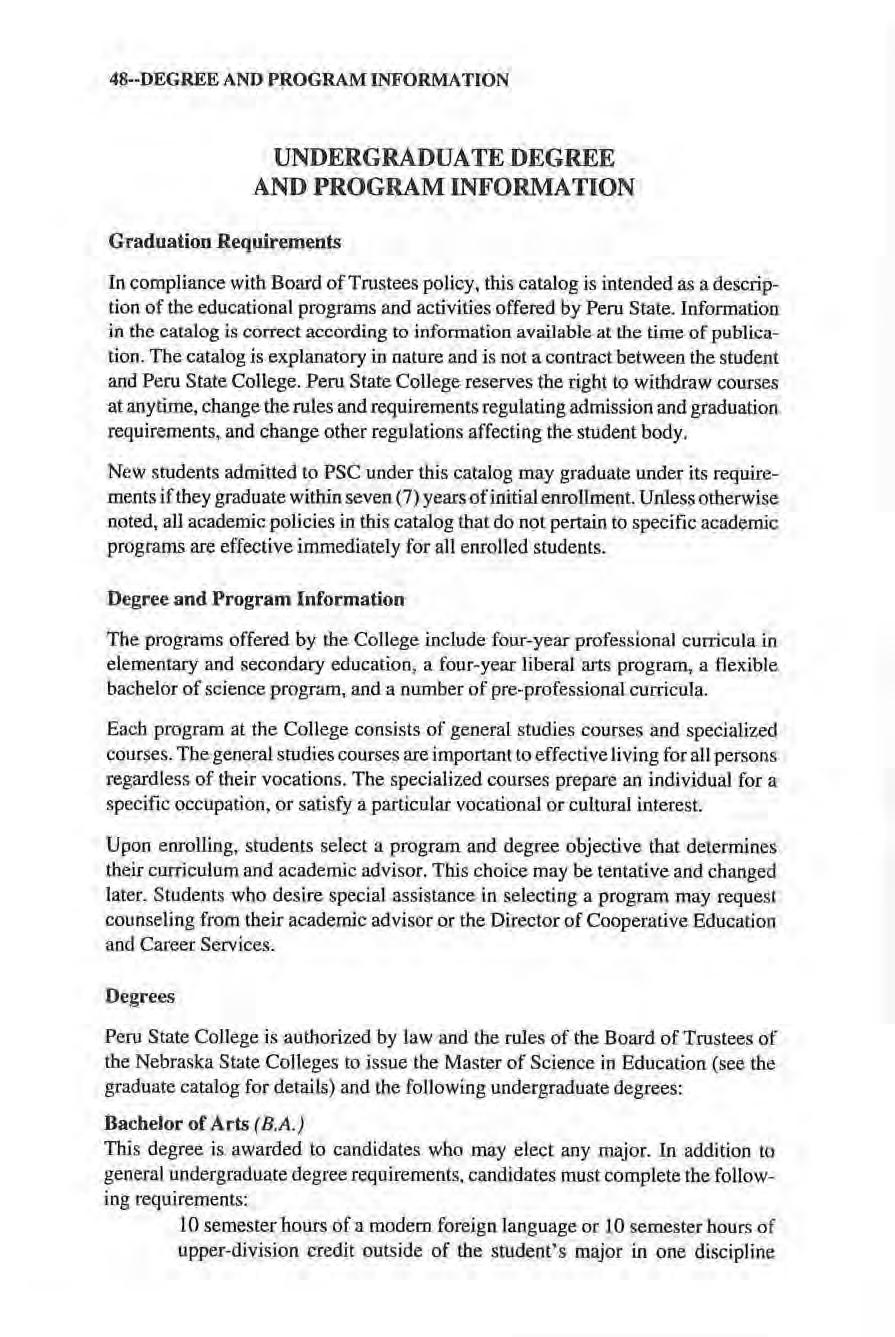
New students admitted to PSC under this catalog may graduate under its requirements if they graduate within seven (7) years of initial enrollment. Unless otherwise noted, all academic policies in this catalog that do not pertain to specific academic programs are effective immediately for all enrolled s tudents.
Degree and Program Information
The programs offered by the College include four-year professional cunicula in elementary and secondary education, a four-year liberal ruts program, a flexible bachelor of science program, and a number of pre-professiona l curricula.
Each program at the College consists of general studies courses and specialized courses. Tbe general studies couises are important to effective living for all persons regardless of their vocations. The specialized courses prepare an individual for a specific occupation, or satisfy a particular vocational or cultural interest.
Upon enrolling, students select a program and degree objective that determines their curriculum and academic advisor. This choice may be tentative and changed later. Students who desire special assistance in selecting a program may reque s t counseli ng from their academic advisor or the Director of Cooperative Education and Career Services.
Degrees
Peru State College is authorized by law and the rules of the Board of Trustees of the Nebraska State Coll eges to issue tbe Master of Science in Education (see the graduate catalog for details) and the following undergraduate degrees:
Bachelor of Arts (B.A.)
This degree is awarded to candidates who may elect any major. In addition to general undergraduate degree requirements, candidates must complete the following requirements:
10 semester hours of a modem foreign language or 10 semester hours of upper-division credit outside of the student's major in one discipline
48--DEGREE AND P~OGRAM INFORMATION
approved by the appropriate Division Chair; 6 semester hours of Mathe-matics or 6 hours of Psychology; Political Science 201 and 9 semester hours from History 11 3, 114, 201, 202, or Sociology 201.
Bachelor of Science (B.S.)
Th is degree is awarded to candidates who elect any major Bachelor o f Technology B. T. j
This degree is awarded to cand idates whose complementary area of emphasis is D istribution, Supervision, or Management, and who transfer from other inst itutions after having completed an associate technical deg ree prog ram or equivalent.
Degree Requirements for Bachelor of Arts and Bachelor of Science
The following are the minimum requirements for the B.A. & B .S. degrees:
Total Hours
Degree candidates must earn a minimum of l 25 semester credit hours.
Upper Division Credit
Degree candidates must earn at least 40 semester hours of upper division credit (300 and 400 level courses).
Grade Point Average
A minimum, cumulative grade po i nt average of 2.5 is required for all degrees i n teacher education; the minimum cumulative average for other degrees is 2.0.
General Studies and Major
Degree candidates must compl ete t he general studies program, a major (teacher education candidates must complete one field endorsement or one subject endorsement), and courses in support of their educational objective.
Major Gr ade Point Average
A minimum cumulative grade point average of2.0 is required for all courses listed or selected to fulfill the major boor requirements. No grade lower than a D + ( or C for trans.fer work) may be used to fulfill course requirements in an academic major.
Peru State Credits
A minimum of 30 semester hours must be earned from Pe ni State College.
Resident Credits
A minimum of24 of the last 30 semester hours mu st be earned in residence. This requirement may be waived in cases where any of the required resident credit is earned at another Nebraska state college or where official cooperative agreements with other institutions exist. Extension, continuing education, and off-campus courses conducted by Peru State are considered resident credits
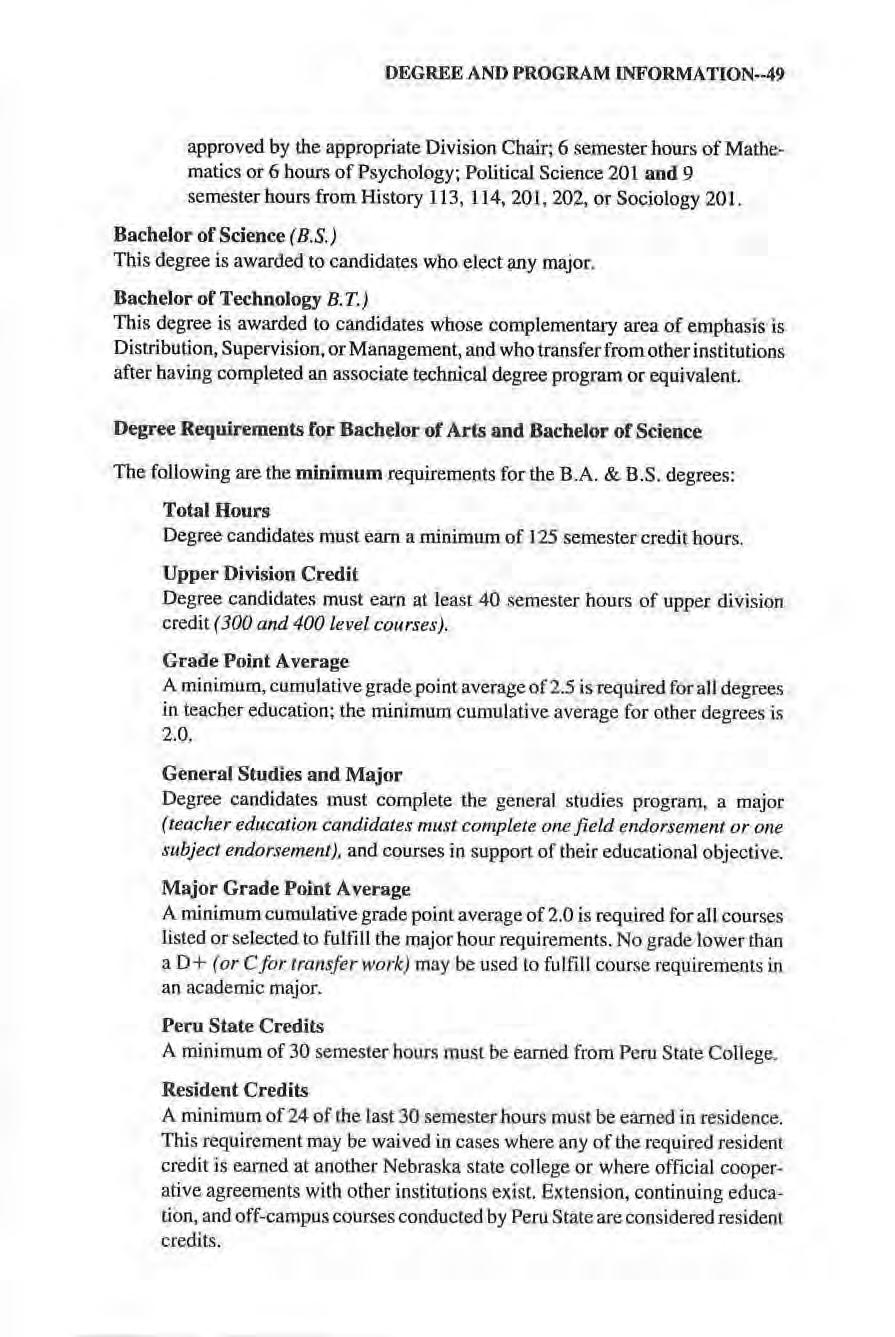
DEGREE AND PROGRAM INFORMA TION--49
College Survival Skills
A one semester hour course, College 100, is a graduation req uirement for all full time on-campus, undergraduate, degree-seeking students (carrying 12 or more hours per semeste r). The purpose of College 100 is to introduce the new studen t to information and skills pertaining to college success. Among t he subjects covered are academic expectations a nd planning, study skills, time management, financial a.id, s ubstance abuse, and diversity issues.
This c lass can be waived under the fo11owing conditio ns :
I. T ransfe r students who have comp leted at least t hirty (30) semester hours before the term o( admissi on.
2. P SC students who have accumulated at least thirty (30 ) credit hours at a part-time level before attending PS C o n a full- time basis.
3. Readmitted students who have not maintained normal progress and who compl eted at least thirty (30) semester hours.
4. Transfer students with less than thirty (30 ) semes t er hours before the term of admiss io n and who can transfer in a similar cou rse from another college.
Degree Requirements for Bachelor o f Technology
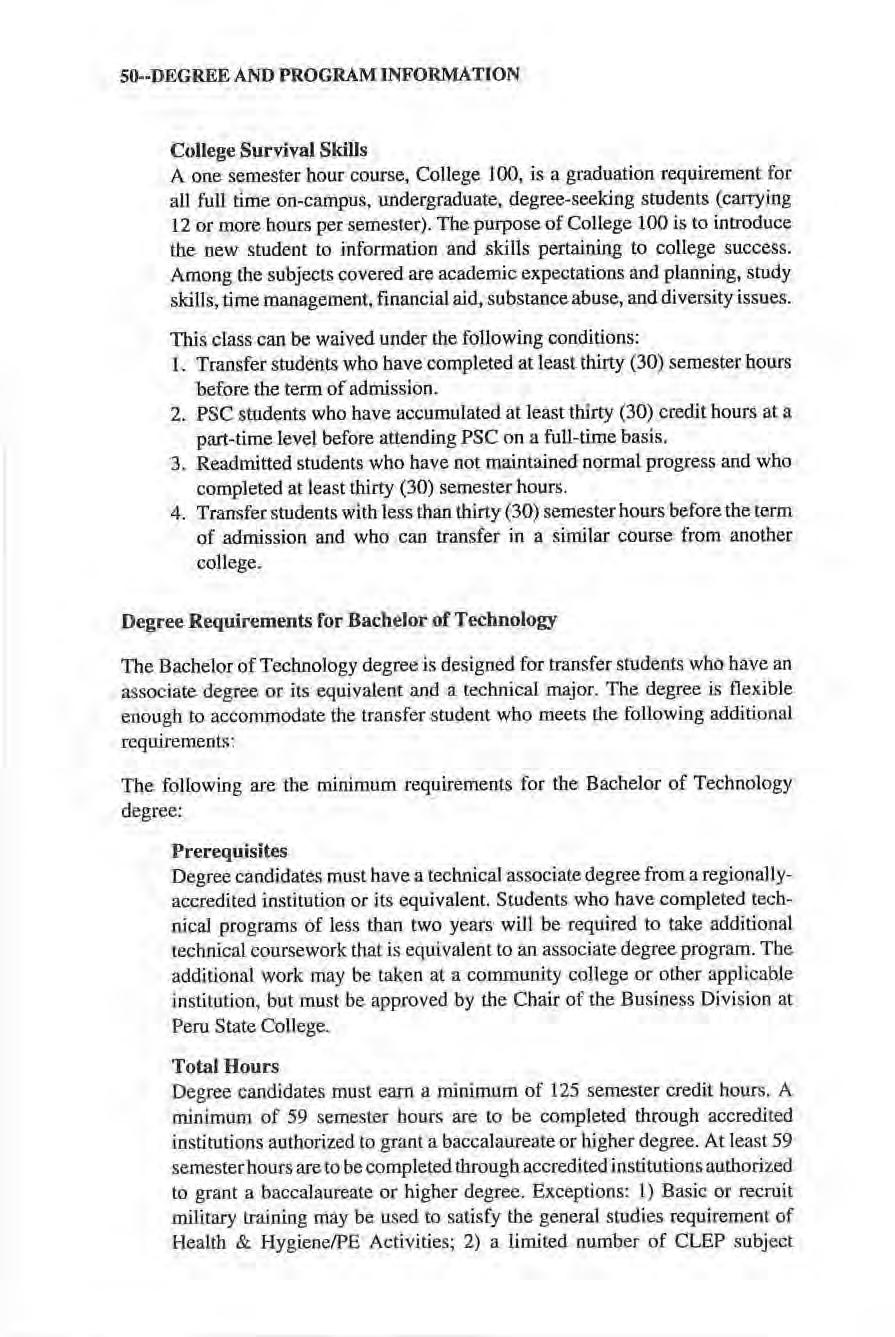
The Bachelor of Technology degree is designed for transfer students who have an associate degree or its equivalent a nd a techni cal major. The degree is flexible enough to accommodate the transfer s tudent who meets the following additional requirements :
The following are the minimum requirements for the B achelor of Technology degree:
Prerequisites
Degree cand id ates must h ave a technical associate degree from a regionallyaccredited institution or its eq uivalent Students wbo hav e completed technical programs of less th an two yearn will be requ ired to take additi onal technical coursework that is equ ivale nt to an associate degree program. The additiona l work may be taken at a community college or other ap plicable institut ion, but must be approved by the Chair of the Bus in ess Divi s ion at Peru State College.
Total Hours
Degree candidates must earn a minimum of 125 semester credi t hours. A minimum of 59 semester hours are to be completed through accredited institution s authorized to grant a baccalaureate or higher degree. At l east 59 semester hours are to be co mpleted through accredited institutions authorized to grant a baccalaureate or higher degree. Exceptions: l) Basic or recruit military training may be u sed to satisfy the general studies requirement of Health & Hy giene/PE Activi ti es; 2) a li mited number of CLEP subject
50•-DEGREE AND PROGRAM INFORMATJON
examination s are acceptable; 3) a minimum of 30 semester hours must be Peru State College instructio n.
Upper Division Credit
D egree candidates must eam at least 20 sem ester hours of upper divisi on c red it (300 and 400 level courses).
Grade Point Average
A minimum, cumul a tive grade point average of2.0 is required for all coursework compl eted at Peru State.
General Studies
Thirty semester credit hours are required. At l east three (3) hours must be selected from each area listed bel o w and no more than nine (9) hours o f the total can be i n any one area. Courses selec ted m u st be exclus ive of those comple ted fo r the area of emphasis:
E ngli sh Compositi o n ; Mathematics/Science/ComputerScience; Speech; Literature/Pin e ArL'! (Art. Theater, Music); Social and Behavioral Science; Health and Hygiene/P.E. Activities.
C omplementary Emp hasis
A minimum of 30 semeste r credit hours in an emphasis is required with a minimum c um ulative grade point average of 2 .0. No grade lower than a D + (C for transfer work) may be used to fulfill requirements w ithin the area.
Technical Emphasis
Si xty-six semester houJs of credit from the technical associ a te degree are the maximum applicab le toward the 125 hours required for the Bachelor of Technology degree. Associate Degree credit hours cannot be used to fu lfill the General Studies or complementary area of emphas is.
Directed E lectives (Offutt Program)
Additional hours are selec ted frorn general studies courses beyond the requ ired 30 se mester hours, co urses s upportive of the technical or complementary emphas is, o r others in consultation with an advisor.
Add i tional Degree Regulations
In ad dition to the above degree requirements, the following regulations apply to Peru State bachelor degrees:
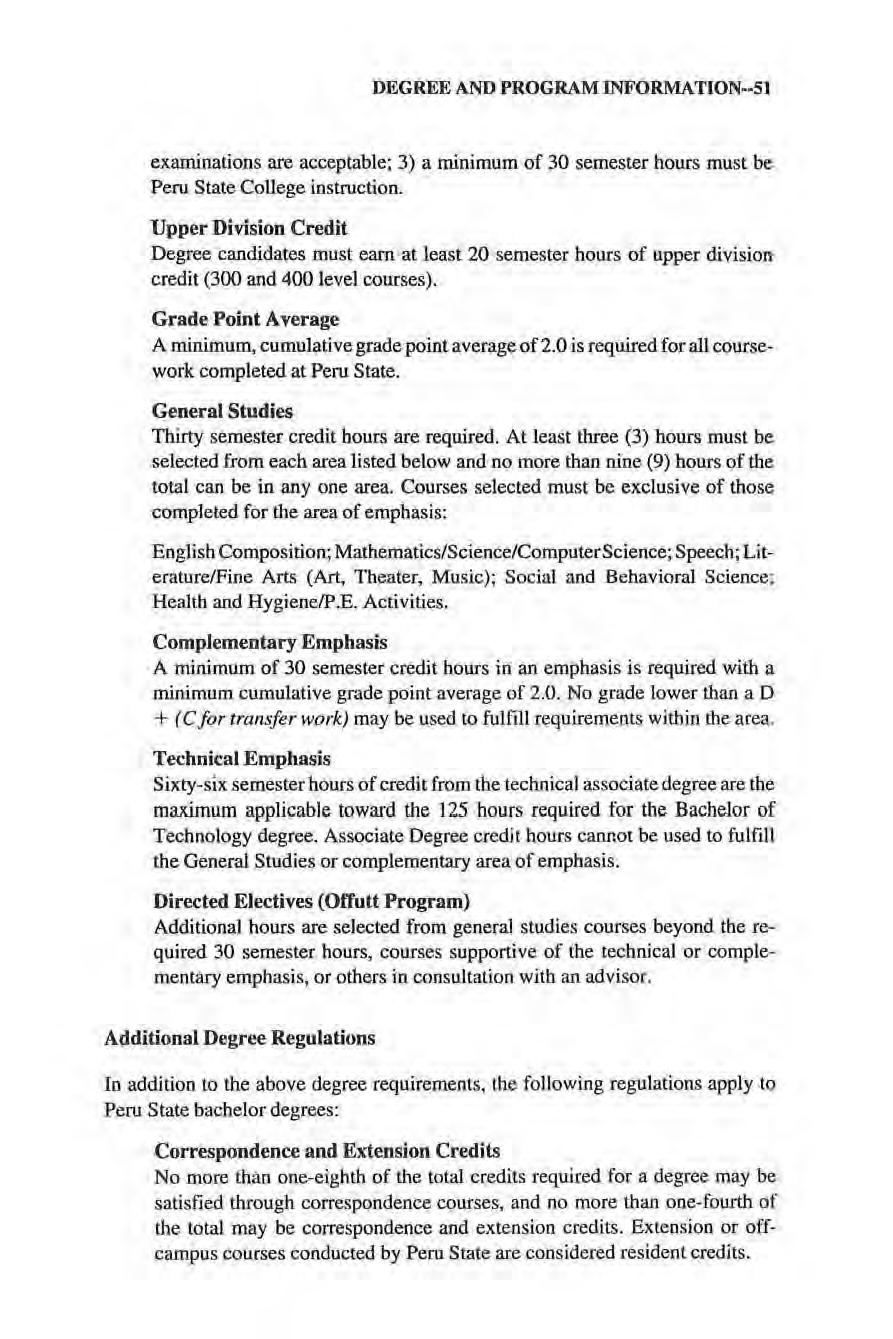
Corresponde nce and Extension Credits
No more tha n o ne--elghth of the total c redits required for a degree may be satisfied through correspondence courses, and no more th an one- fourth of the total may be correspondence and ex tension credits .Extens ion or offcampus couJ ses conducted by Peru State are considered resident credits.
DEGREE AND PROGRAM INFORMATION--51
Profess ional School Residence Credits
Pre-professional students who have successfully completed three years in a specifically approved program may transfer to an accredited professional school during their fourth year and qualify for a bachelor's degree provided they meet all other graduation requirements.
Varsity Sports C redits
A maximum of four (4) credit hours of P.E. 190-Varsity Sp orts is allowed toward a degree . PE 190 may not meet General Stud ies requirements.
Developmental Skills Credi t
A maximum of five (5) credit hours of Developmental Skills course.s is a llo wed toward a degree.
Independent Study
A maximum of soc (6) hours of I ndependent Study is allowed toward a degree (see page 57).
Directed Study
A maximum of eight (8) hours or two courses of Directed Study is allowed toward a degree (see page 56).
Cooperative E ducation
A maxim um of 12 hours of Cooperative Education internship credit is allowed toward a degree. Primarily, the hou rs earned are noted as general ele.ctives. In certain m ajors, there are some limitations placed on the number of hours that may be applied to that major (see page 55).

Appl ication for Degree
Peru S tate Co ll ege has three graduation dates: D ecember, May and summer. D egree candi dates , upon enrolling for their final coursework, m u st comp lete a degree application through the Registrar' s Office.
T he applicat ion must be compl eted within the first five weeks of the semester or within the first two weeks of the first s ummer term. Students are expected to have compl eted all degree requirements o n or before the planned date of graduation. December graduates receive a statement of degree completion. Diplomas are given at the subsequent May g raduation. Summer grad uates may p articipate in May Commencement, but must apply for summer graduation by the May graduation deadline .
Second Undergrad uate Degree
Students apply for on l y one undergraduate degree. If, because of certain specific academic prog rams, tt appears the studen t can qualify for more than one degree , the student mus t determine the degree for which be/she will apply
52--DEGREE AND PROGRAM INFORMATION
An additional undergraduate degree may be obtained by completing at least 30 semester hours of credit beyond the total hours recorded when qualifying for the previous baccalaureate degree. All prescri bed requirements for the degree must be successfully completed.
Individuals will follow the academic requirements of the college catalog in effect at the time of their readmiss ion to pursue the additional degree.
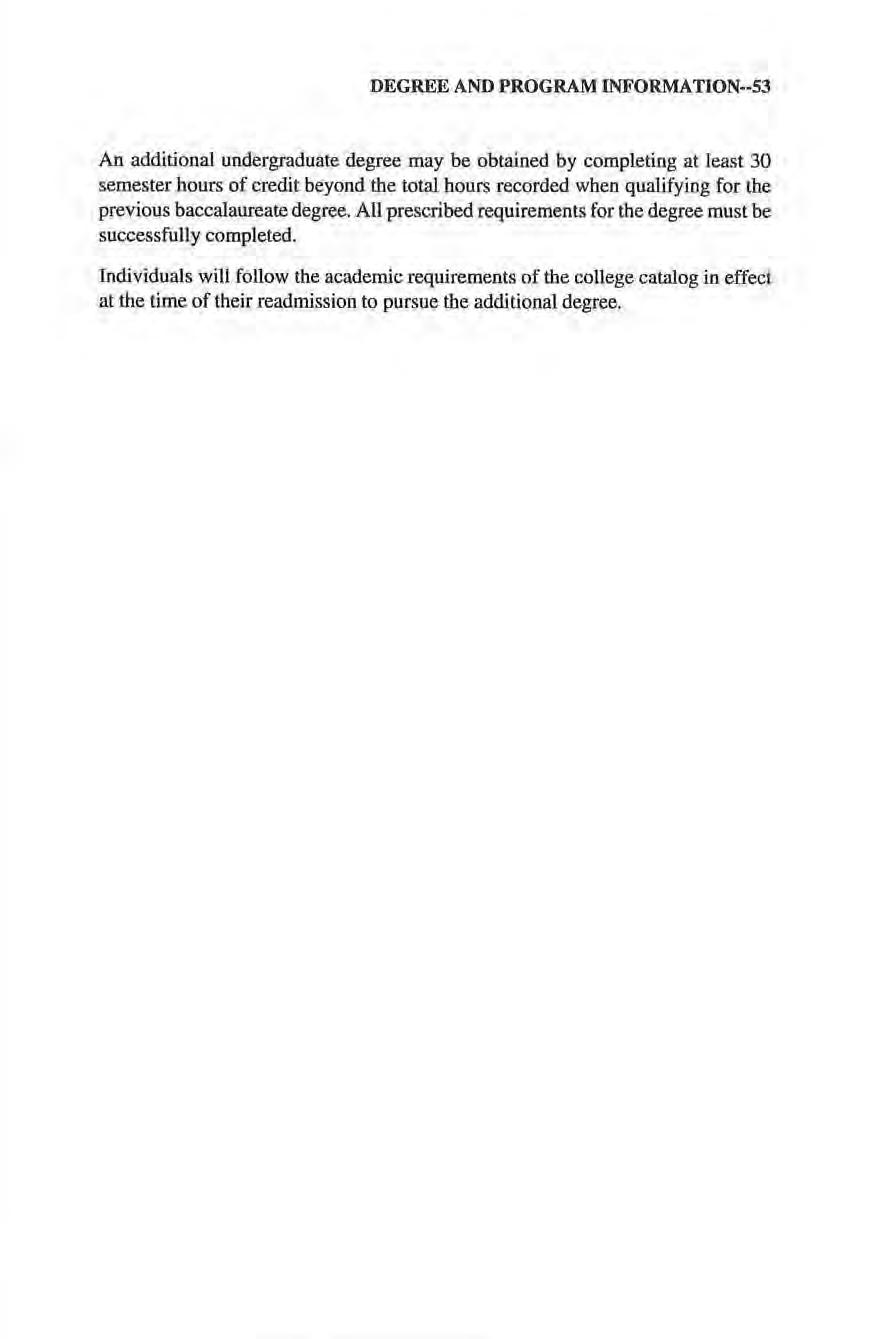
DEGREE AND PROGRAM INFORMATION--53
SPEC IAL ACADEMIC PROGRAMS
Agriculture Tran sfer Program Peru State and the College of Agricultural Science and Natural Resources at the University of Nebraska-Lincoln cooperate to offer a transfer program for agriculture students Und er the terms of this agreement, students may complete a specified group of courses at Peru State and then transfer to the University's Co llege of Agliculture.
Continuing Education
The Office of Continuing Education offers a variety of programs and serv ices to meet the educational needs of the Co llege's service area.
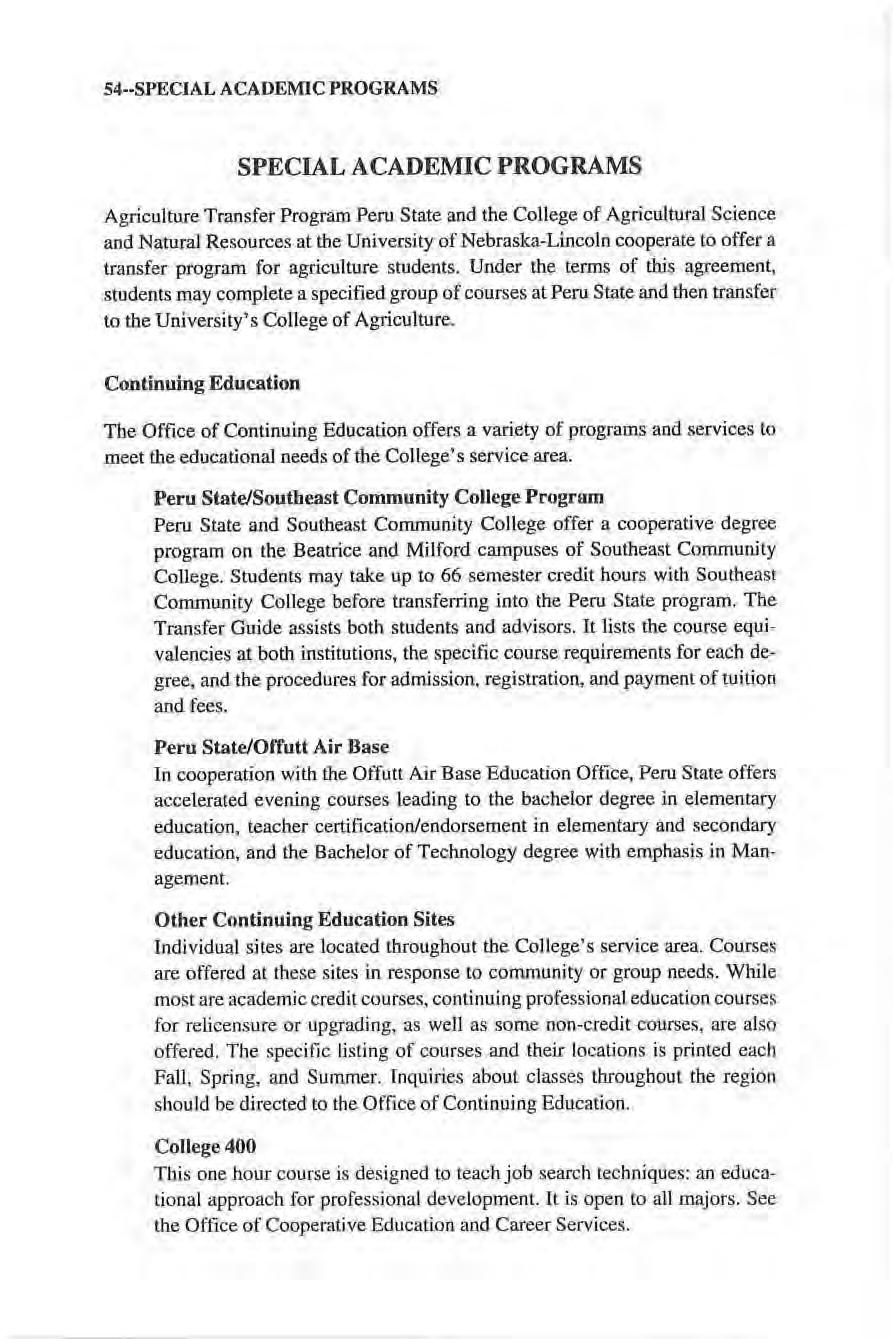
Peru State/Southeast Community College P rogram
Peru State and Southeast Comm unity College offer a cooperative degree program on the Beatrice and Milford campuses of Southe ast Community College. Students may take up to 66 semester credit hours with Sou theast Commuohy Co ll ege before transferring into the P eru State program. Th e T ransfer G uide assists both students and advisors It li sts the course equivalencies at both institutions, the specific course requirements for each degree, and the procedures for admjssion, registration, and payment of tuition and fees.
Peru State/Offutt Air Base
In cooperation with the Offutt Air Base Education Office, Peru State offers accelerated evening courses leading to the bachelor d egree in elementary education, teach er certification/endorsement in elementary and secondary education, and the Bachelor of Technology degree with emp hasis in Management.
Other Continuing Education Sites
Individual s ites are located throughout the College's service area. Courses are offered at these s ites in response to commun ity or group needs. While most are academic credit cou rses, contin uin g professional education courses for relicensu re or upgradjng, as well as some non-credit courses, are a lso offered. The spec ific listing of cou rses and their locations is prin ted each F all , Spring, and Summer. [nquiries about classes thro ughout the region should be directed to the O ffice of Continuing Education.
Co ll ege400
This one hour course is designed to teach job search techn iques: an educati onal approach for professiona l development. It is open to all majors. See the Office of Cooperative Education and Career Serv ices.
54--SPECIAL
ACA DEMIC PROGRAMS
Cooperative Education
The Cooperative Education In ternship Prog ram provides s tudents with the opportunity to explore the field of work or gain valu able work experience while eamfog academic credit in all majors. T he maximum number of hours aUowed for graduation is 12. Employ ment occurs in positions which are relevant to a student's major or career interests. The program is available to all students incJuding off-campus and non -traditional students. A flexible registrati on schedule allows s tudents to enroll throu_gh the middle of each semester. To he lp facilitate a mutually beneficial work experience for the student, each placement is approved by the cooperative education staff and the respective division chairs. E ach internship is monitored by the cooperative education staff.
First- year students who have completed 15 c redit hours and are in good academic standing .are eligible to enroll for exploratory or major- related cooperative education experiences at the Bus 241, GSci 24 1, Educ 241, or Hum 241 l evel. Students may take one to four hours at this level. Students who have completed 45 credit hours and are in good acade mic standi ng are eligible to enroll for major or career rel ated cooperative education experiences at the Bus 441, GSci 441, Ed uc 441, or Hurn 44 1 level. Students may talce from one to twelve hours at this level.
A total of twelve hours maximum may be used toward graduat ion.
All transfer students must comp lete 15 hours at PSC before being eligible for the program.
All s tudents must have a permission form signed by a cooperative education staff member and the respect ive division chair before enro ll ing.
Developmental Studies
The Developmental Studies program is designed to ass ist students in reaching their educational objectives. The program is concentrated in three areas that most often impact student success: Eng)ish composition, mathematics and reading.
Placement in Developmental Studies is through the Computer Placement Test (CPT) wh_ich is required of all students entering Peru State College with fewer than 30 hours of col lege work a nd ACT sco res lower than 20 in readi ng, 21 in sentence composition and 2 1 in mathematics.

The courses are taught through the use of computer-assisted instruct.ion and th roug h one-to-one interaction between the stude nt and tbe instructor.
Students must sign up for developmental courses based on the fo llowing criteria:
SPECIAL ACADEMIC PROGRAMS--55
Reading - Students scoring below 65 on the reading comprehen sio n portion of the CPT are required to enroll in English 070 Reading I.
English Composition - Students scori ng below 75 on the sentence skill portion of the CPT are required to enroll in English 080 Compos i tion.
Math - Students scori ng below 60 on either or both the arithmetic and elementary algebra portions of the CPT are required to enroll in Math 080 Arithmetic.
Peru State College offers developmental reading English 070 and 071, composit ion Engli sh 080 and 08 I, mathemat ics Math 080 and 08 I. Students failing to pass the post- test of the first course in the sequence are required to register for the second course. Passing of theposUest in English is a requirement for entry into the General Studies English curric ulum. Passi ng tbe post-test in mathematics is a requirement for entry into the General Studies mathemat ics cun·iculum.
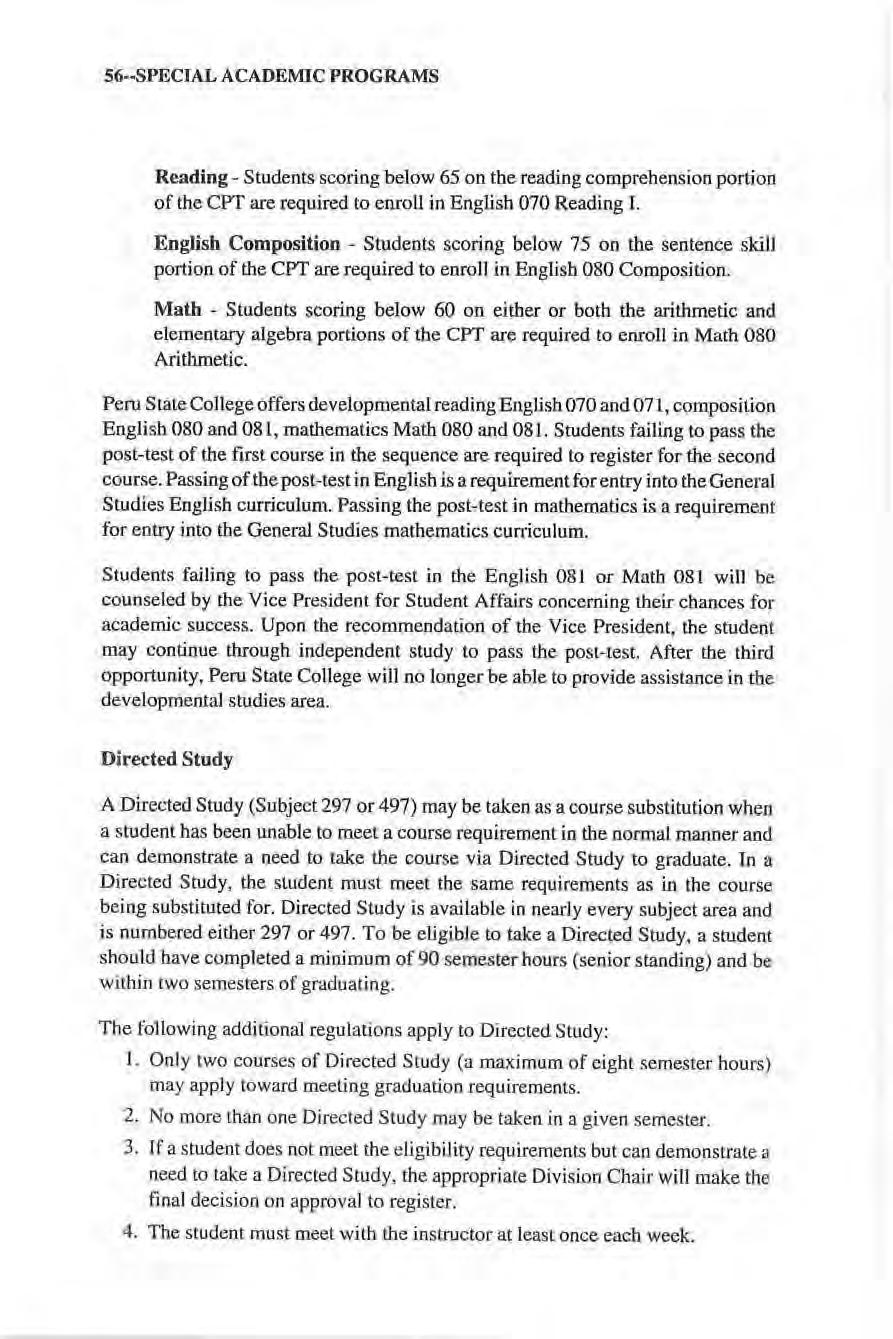
Students failing to pass the post-test in the English 081 or Math 081 will be cou n seled by the Vice President for Student Affairs concerning their chances for academic success. Upon the recommendation of tbe Vice President, the student may conti nue through independent study to pass the post-test. After the third opportunity, Peru Slate College will no longer be able to provide assistance in the developmental studies area.
Directed Study
A Directed Study (Subject 297 or 497) may be taken as a course substitution when a student has been unable to meet a course requirement in the normal manner and can demonstrate a need to take the course via Directed Study to graduate. In a Direc ted Study, the stud ent must meet the same requirements as in the course b e ing substituted for Directed Study is available in nearly every subject area and is numbered either 297 or 497. To be eligible to take a Directed Study, a student should have completed a minimum of 90 semester hours (senior standing) and be within two semesters of graduating.
The following additional regulations apply to Directed Study:
I Only two courses of Directed Study (a maximum of eight semester hours) may apply toward meeting graduation require ments.
2. No more than o ne Directed Study may be taken in a given semester.
3, If a student does not meet the eligibility requirements but can demonstrate a need to take a Directed Study, the appropriate Division Chair will make the final decision on approval to register.
4. The student must meet with the in structor at least once each week.
56--SPECIAL ACADEMIC PROGRAMS
5 A Directed Study Fo rm must be completed and submitted to the Division C hair, the Registrar, and Vice President for Academic Affairs by the end of the second week of the semester.
Extension (see Continuing Educat.ion)
Graduate Studies
Peru State College offers a Master of Science in Education degree program for classroom teachers in elementary and secondary cl ass room s. It is a program designed in respo nse to the assessed needs of teachers. The program features e m p hasis on the im provement of classroom teaching, the use of technology in teaching, and the strengthening of the foundations of educational practice. Further information may be secured by contacting the Division of Education.
In dependent Study
An Independent Study is a carefully organized learning activity with specific objectives and methods of e valuation developed i n consultation with a fuculty member. Independent S tudy courses are avail able in nearly every subj ect area and are numbered 499. To be e ligible to take an Independent Study a student must have completed 60 semester hours (junior standing) and be capable of doing independent research, work, a nd study. The following additional regulations app ly to Independent Study courses:
1. No more than 6 semeste r hours of Indep e ndent Stud y may be counted toward meeting graduat ion requirements.
2. No more than o ne lnde_pendent Study (a m aximum of three hours) may be taken io a gi ven seme ster.
3. The student must communicate with the inst ruc tor at least once each week
4. An Independent Study Form m ust be completed and submitted to the D ivision Chair, the Registrar, and the Vice President for Academic Affairs by the end of the second week of the semester.
5. A copy of the Independent Study final project shou ld be sub mitted to the Division Chair as well as the instructor for Departmental archives.
lnte rnship (see Cooperati ve Education)
Pre-Professional Programs
The e ntrance require me nts of most professional schools require programs of general studies which vary only slightly from one profession to another. These programs usually require two years or more of study. Since such wo rk is also required in the p rofessio nal curric ulum of teache rs, Peru State's general s tudie s program mee ts the pre-p rofessional needs of prospective doctors , dentists, pharmacis ts,
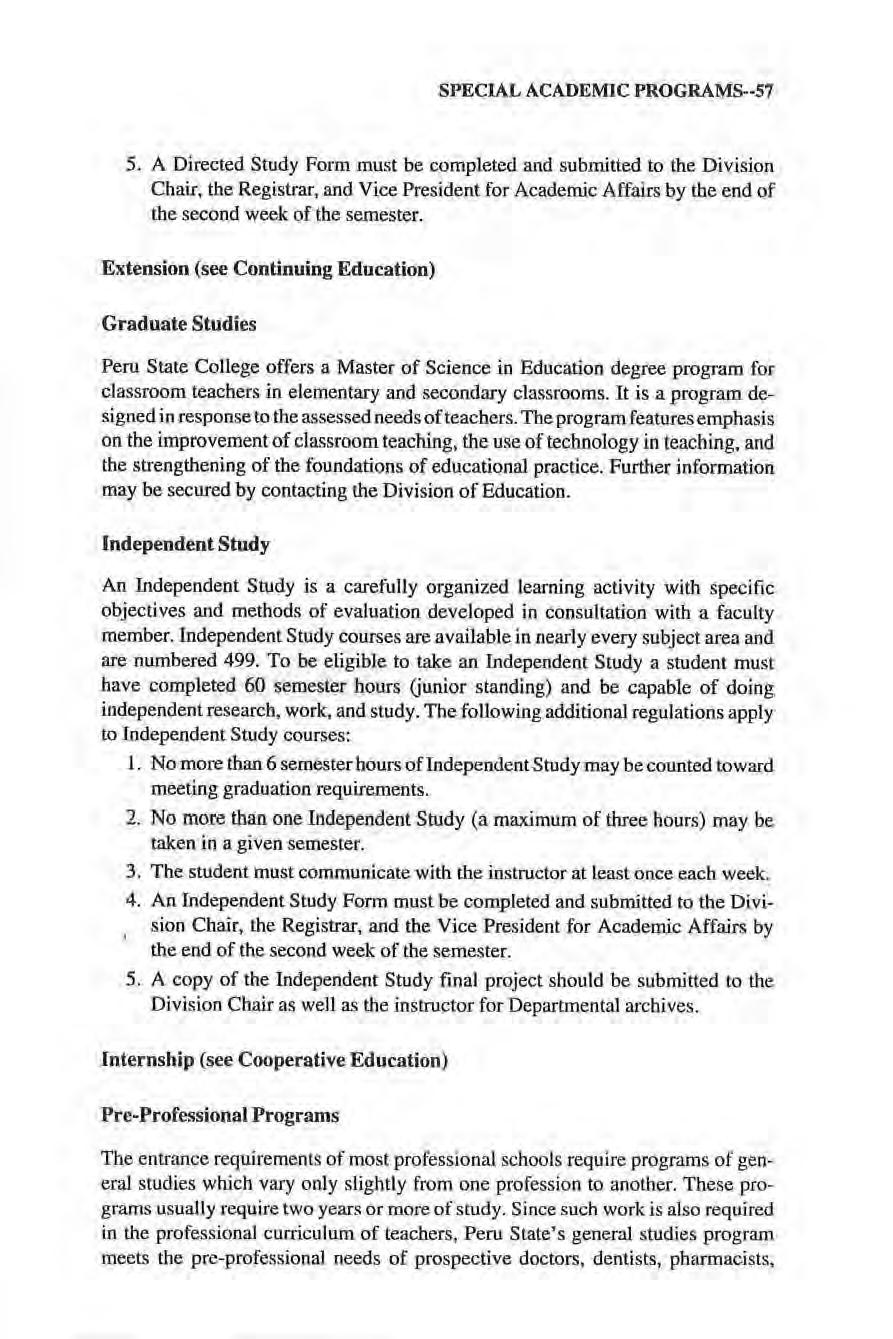
SPECIAL ACADEMIC PROGRAMS--57
58--SPEC I AL ACADEMIC PROGRAMS
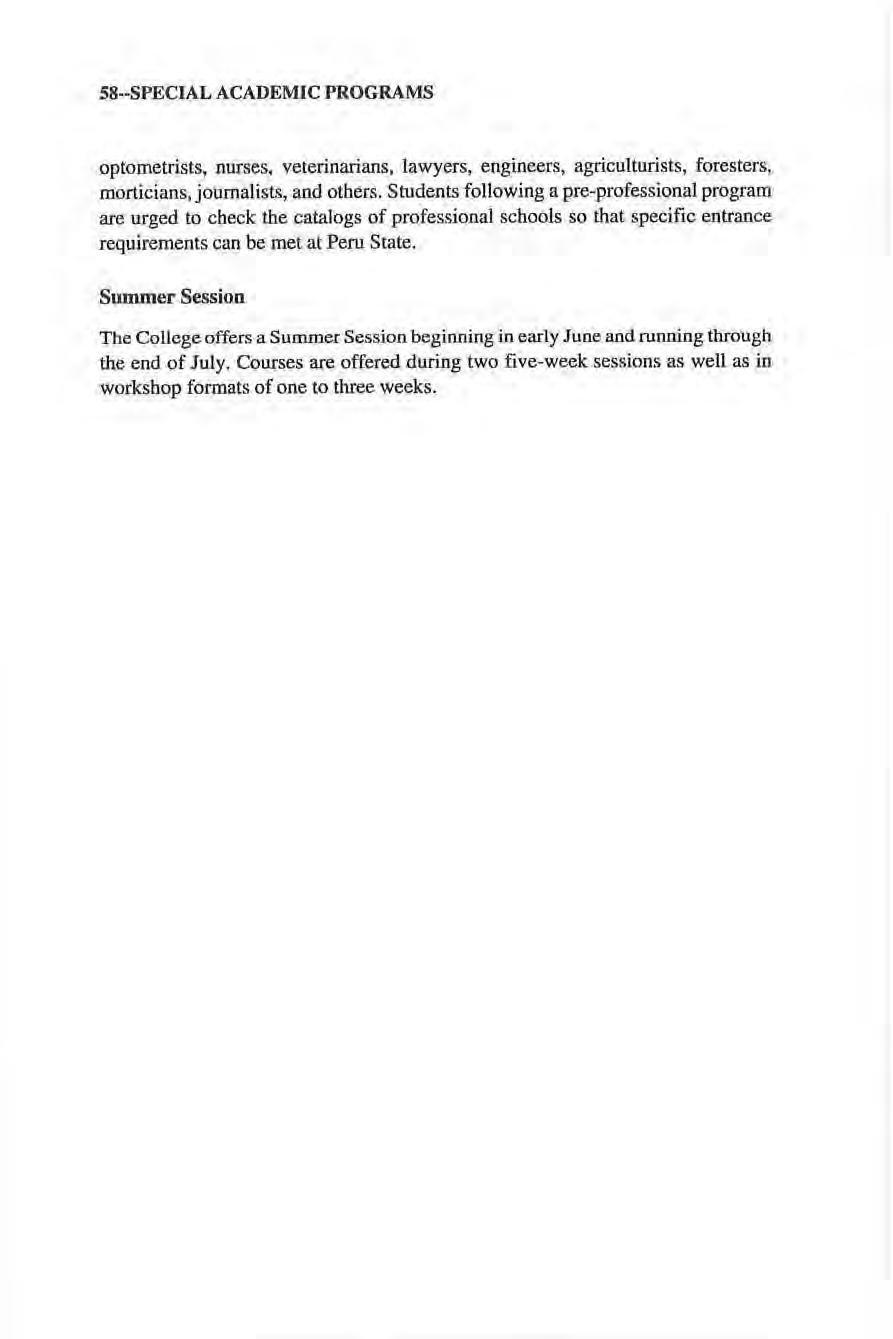
optometrists, nurses, veterinarians, lawyers, engineers, agriculturists, foreste rs, morticians, journalists, and others. Students followi ng a pre-professional program are urged to check tlie catalogs of professional schools so that speci fic entrance requirements can be met at Peru State.
Summer Session
The College offers a Summer Session beginning in early June and running through the e nd of July. Courses are offered during two five-week sessions as well as in workshop formats of one to three weeks.
ACADEMIC POLICIES, REGULATIONS, & PROCEDURES
Academic Appeal
Any request for waiver or exception to the policies and regulations stated in the Catalog is submitted as a written petition to the Office of the Vice President of Academic Affairs Cons ideration is given to the petition by the Faculty Senate, and a written res ponse is sent to the petitioning student. Petitions should clearly and specifically state the grounds for the request.
Academic Bankruptcy
A student may remove up to two complete semesters of work from his/her cumul ative grade point average and degree considerations by petitioning for approval to the Office of Vice President for Academic Affairs. To qualify, a student must have completed either 15 consecutive Peru State College semester hours of credit with a minimum 3.0 term grade point average or 30 consecutive hours with a minimum 2.5 term grade point average at Peru State Coll ege following the se mester(s) the s tudent wishes to remove.
To declare a semester bankrupt, all courses taken during that semester are voided (both credit hours and grades ). The bankrupt semester is removed from con s ideration for cumulative grade point average purpos es and the bankrupt credit is not used for degree requirements. The semes ter li s ting of courses and g rades, howev er, remains on the academic transcript.
Academic Credit
AP CrediL (See Standardized Examinations .)
Armed Services. Veterans of the armed forces who are honorably discharged and cu.rrent active duty personnel will generally be granted credit for their military experience in accordance with the recommendations of the Americ an Council on Education. Air Force records should be obtained from the Community College of the Air Force. Army records should be obtained from the Anny/ American Council on Education Regist ry Transcript System (A ARTS).
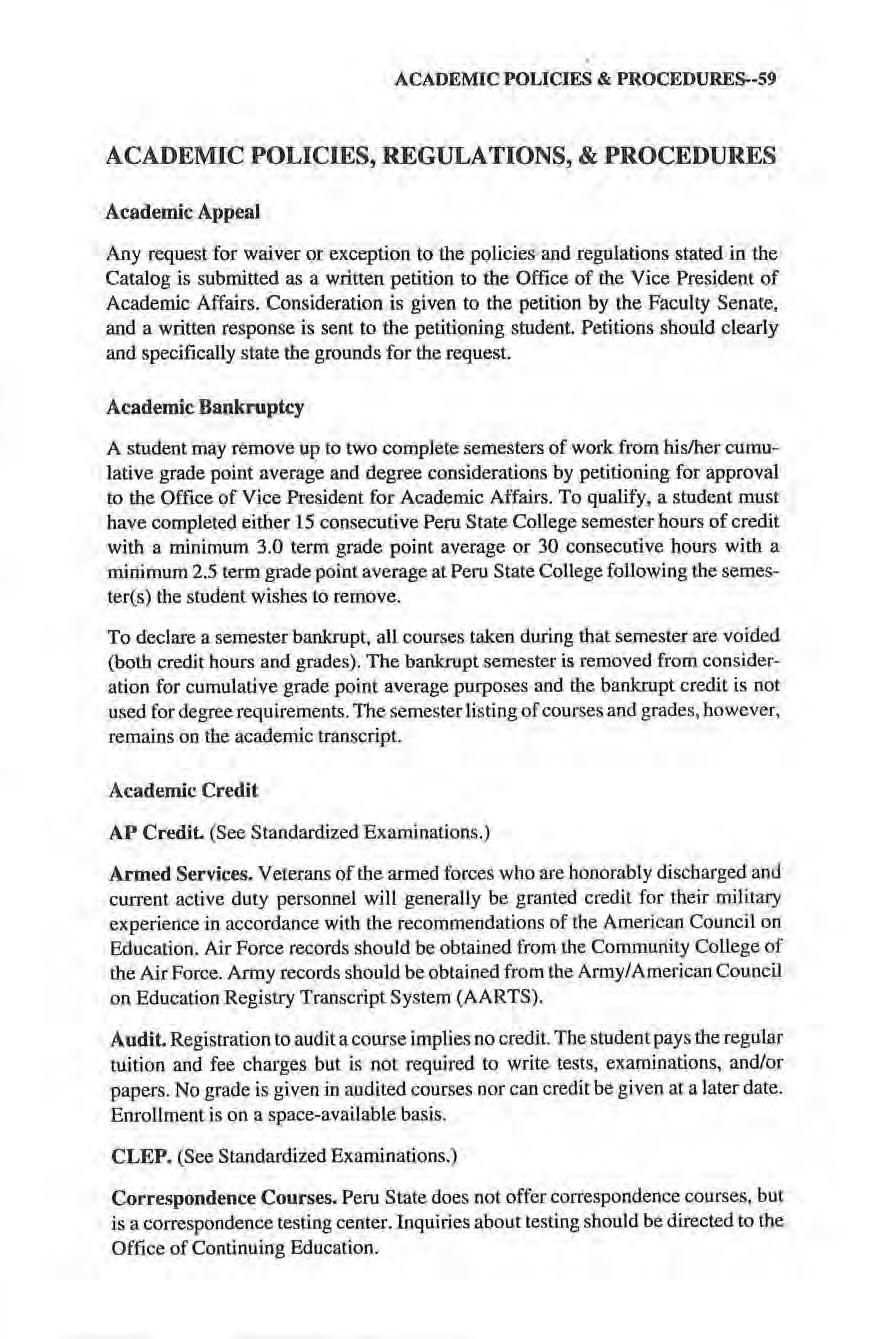
Audit. Registration to audit a course implies no credit. The student pays the regular tuition and fee charges but is not required to write tests, e xaminations, and/or papers. No grade is given in audited courses nor can credit be g iv e n at a later date. Enrollment is on a space-available basis.
CLEP. (See Standardized Exami n ations )
Correspondence Courses. Peru State does not offe r correspondence courses, but is a correspondence testing center. Inquiries about testing shou]d be directe d to the Office of Continu ing Education.
ACADEMIC POLICIES & PROCEDURES--59
Course ChaUenge. (See Institutional Exams.)
DANTES. (See Standard ized Examinations.)
Early Entry. In high ~chools where Peru State has a formal early entry agreement, the principal decides which students are quali fied to take college courses. Other restrictions also appl y; contact the Office of Cootinu.i ng Education for detai ls
Any high sch ool student approved to register for a college credit course will have the appropriate information entered on a college transcript
Extra-insti t utional. Stude nts may earn college credit for experiences and accomplishments attained o utside of the normal college setting. Cred it may be granted through standardi zed examination programs or t he credit recommendations of the Guide to the Evaluation of E ducation al Experiences in the Armed Services and The National Guide to Education a l Credit for Training Programs.
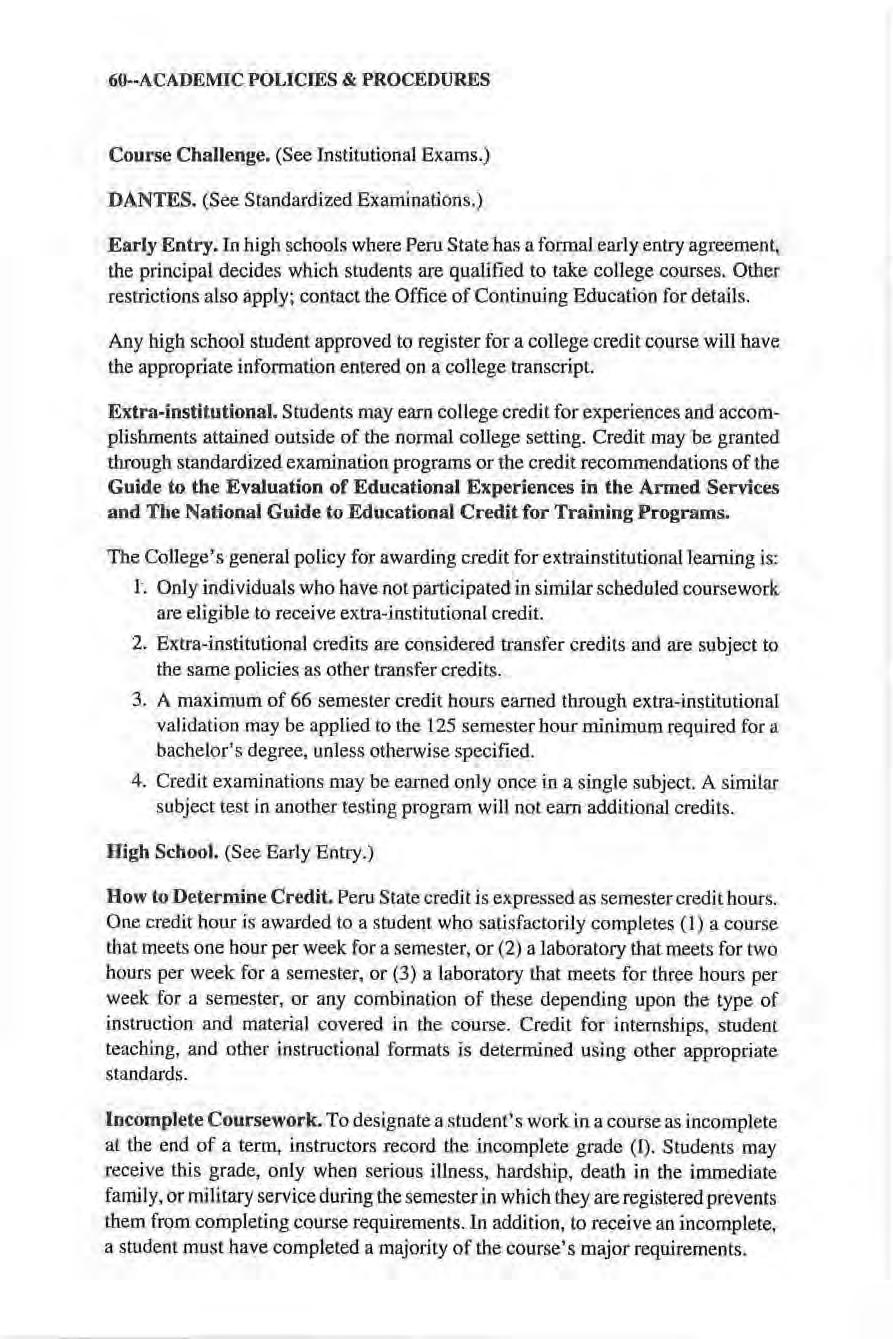
The Coll ege's general policy for awarding credit for extrainstitutional learning is:
I- OnJy individ uals who have not participated in similar scheduled coursework are e li gib le to receive extra-institutional credit.
2 . Extra-institutional credits are considered transfer credits and are subj ect to the same policies as other transfer cred its .
3. A maximu m of 66 semester c redit hours earned through extra -institutional validation may be applied to the 125 semester h o ur minimum required for a bachelor' s degree, unless o therwise specified
4. Credit examinations may be earned o nl y once in a singl e subject. A si mi lar subject test i n another testing program will not earn additional credits.
IDgh School. (See Early Entry.)
How to D etermine Credit. Peru State cred it is expressed as semester credit hours. One c red it hour is awarded to a student who satisfactorily completes (l) a course that meets one hour per week fo r a semester, or (2) a laboratory that meets for two hours per week for a semes ter, or (3) a laboratory that meets for three hou rs per week fo r a semester, or a ny combination of these depending upo n the type of instruction and material covered in the cou rse. Credit for internships, student teaching, a nd other instructional formats is determined using other appropriate standards
Incomplete Coursework. To designate a student's work i n a course as incomplete at th e e nd of a term, instructors record the inco mplete grade (I) Students may receive this grade, only when serious illness, hardship, death in the immediate family, or military serv ice during the semester in which they are reg iste red p reven ts them from comple ting co urse requ irements. In addi tion , to receive a n incomplete, a student must h a ve completed a majority of the course's major requireme n ts
60--ACADEMIC POLICIES & PROCEDURES
Unless extenuating circumstances dictate otherwise, students must initiate requests for an incomplete by filling out an Incomplete Grade Completion Contract, which requires the student and faculty signature.
The Incomplete Grade Completion Contract cites the reason(s) for the incomplete and details the specific obligations the student must meet to change the incomple te to a Jetter grade. If students agree to complete required work prior to the normal deadline for making up an incomplete the end of the subsequent semester this date must appear in the contract. The division chair, the instructor, and the student receive signed copies of the Incomplete Grade Completion Contract.
Even if the student does not attend Peru State CoUege, all incomplete course work must be finished by the end of the subsequent semester. U nless Faculty Senate approves an extension, if the student does not fulfill contract obligations in the allotted time, the incomplete grade automatically becomes an F.
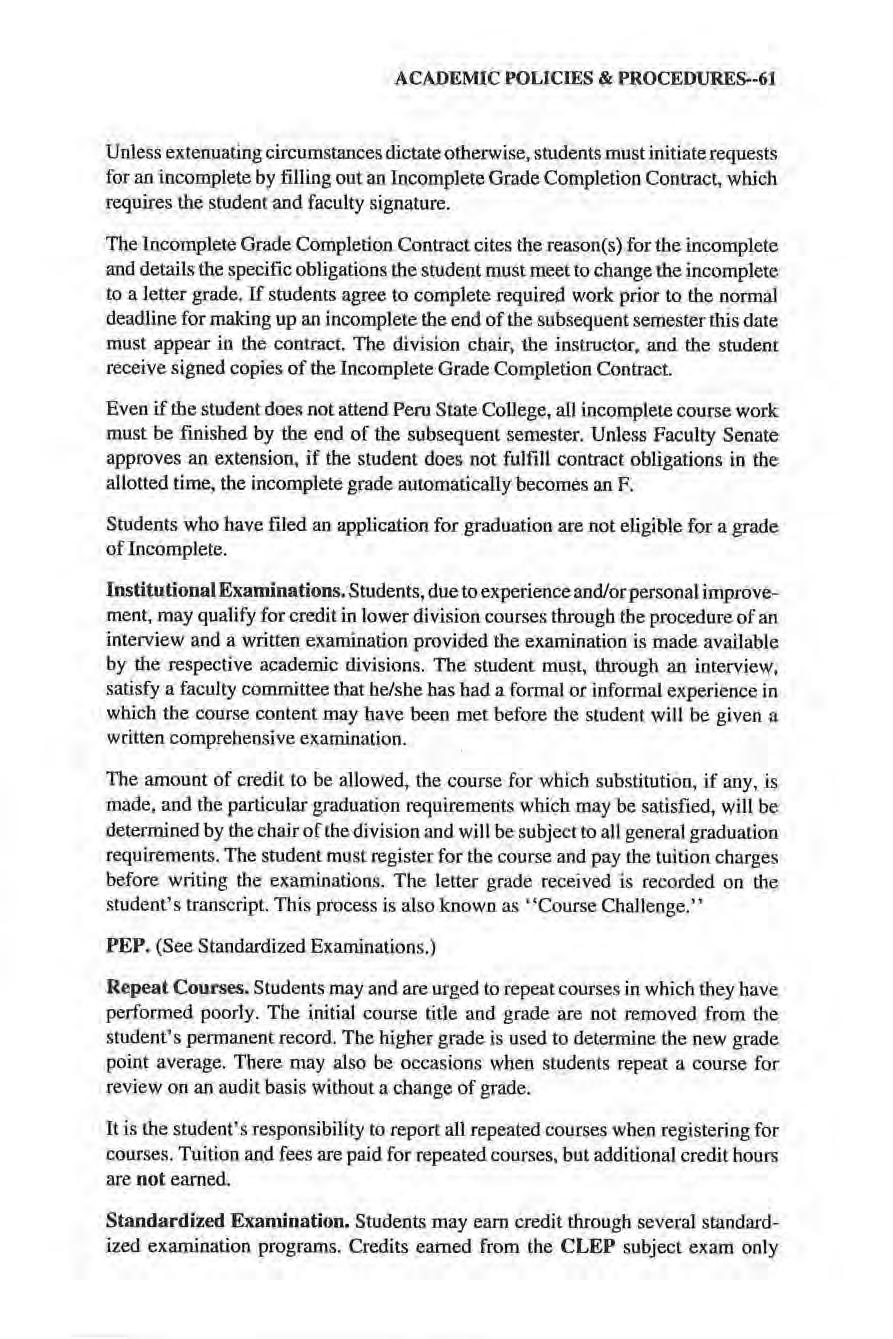
Students who have filed an application for graduation are not eligible for a grade of Incomplete.
Institutional Examinations. Students, due to experience and/or personal improvement, may qualify for credit in lower division courses through the procedure of an interview a nd a written examination provided the examination is made available by the respective academic divisions. The student must, through an i nterview, satisfy a faculty committee that he/sbe has had a foonal or i nformal experience in which the course content may have been met before the student will be given a written comprehens i ve examination.
The amount of credit to be allowed, the course for which s ubstitution, if any, is made, and the particular graduation requirements which may be satisfied, wi ll be determined by the chair ofthe division and will be subject to all general graduation requirements. The student must register for the course and pay the tuition charges before writing the examinations The letter grade received is recorded on the student's t ranscript. This process is also known as "Course Challenge."
PEP. (See Standardized Examinations.)
Repeat Courses. Students may and are urged to repeat courses in wh ich tbey have performed poorly. The initial course title and grade are not removed from the student's permanent record. The higher grade is used to determine the new grade point average. There may also be occasions when students repeat a course for review o n an audit basis without a change of grade.
It is the student's respon sibility to report aU repeated courses when reg is tering for courses. Tuition and fees are paid fo r repeated courses, but additional credi t hours are not earned.
Standardized Examination. Students may earn credit through several standardized examination programs. Credits earned from the CLEP subject exam only
ACADEMIC POLICIES & PROCEDURES--61
62--ACADEMIC POLICIES & PROCEDURES
(College Level Examination Program), DANTES (Defense Activity Nontraditional Education Support), PEP (Proficiency Examination Program), and APP (Advanced Placement Program) can satisfy certain Peru State degree requirements. St udents should contact the Office of Cooperative Education and Career Services for specific information about the College's regulations and procedures for standardized examinations. The 66 hour maximum for extra institutional credit includes standardized examinations. Ir. ' µ or <UJOV(_
Transfer. Peru State College accepts credit hours successfully completed.at other accredited colleges and universities, provided they are reported on the official transcript of each previously attended institution and in credit hours. This policy also applies to Peru State College students who earn credits on an interim basis at another college, provided they have the prior approval of the appropriate Djvision Chairperson/Registrar. The required forms for reporting transfer credits are available at the R egistrar's Office.
Variable Credit Courses. The credit hours to be earned and the coursework to be completed are determined at the time of registration Students do not have the option of reducing or increasing credit hours or coursework after the free add/drop period at the beginning of the term.
Academic Dishonesty
Academjc integrity is a basic principle that requires the stude nt to tiuce credit only for id eas and eff011s that are his/her own. Cheating is defined as the submission of materials in assignments, exams, or other academic work that is based on sources prohibited by the faculty member. Cheating shall include, but is not limited to, situations in which a student:
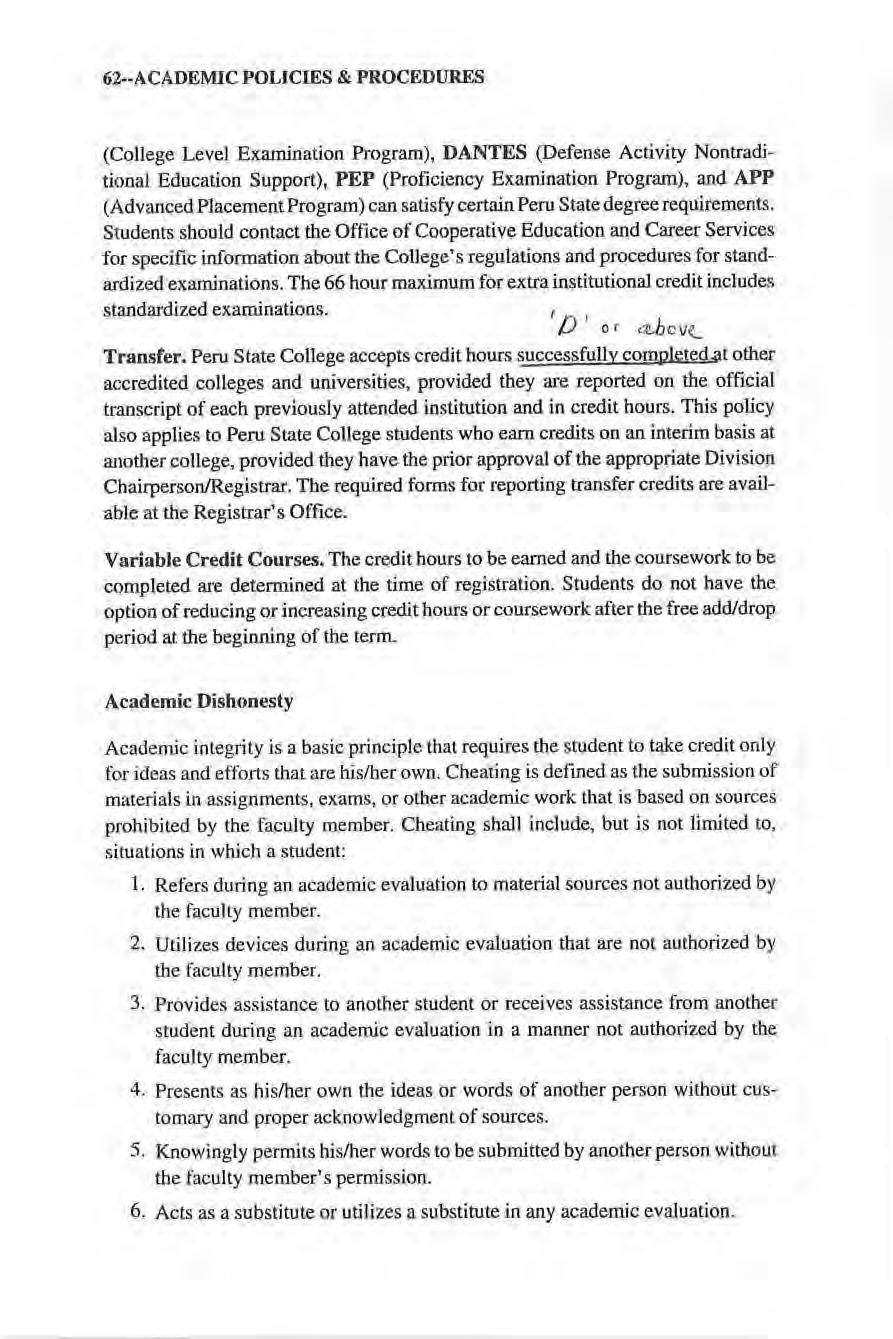
1. Refers during an academic evaluation to material sources not authorized by the faculty member.
2. Utilizes devices during an academic evaluation that are not authorized by the faculty member.
3 Provides assistance to another student or receives assistance from another stude nt during an academic evaluation in a manner not authorized by the faculty member.
4. Presents as his/her own the ideas or word s of another person without customary and proper acknowledgment of sources.
S. Knowingly permits his/her words to be submitted by another person without the faculty member's permission.
6. Acts as a substitute or utili zes a substitute in any academic evaluation.
7. Fabricates data in support of laboratory or field work.
8. Possesses, buy s, sell s, o btai ns, or u ses a copy of any materials intend ed to be used as an instrument of academic evaluatio n in advance of i ts administ ration.
9. Alters grade records of hi s/her own or another s tudent's work in a course or a componen t of a course.
In addition to any adverse academic action that may result from engaging in academicall y dishonest behavior, the Co llege specifically reserves the right to address a nd sanction the conduct involved through the disciplinary procedures outlined in th is catalog . Academic actions are reviewable under the Academic Appeals Policy containe d in this catalog.

Students with a cumul ative grade point average of .00.1]9
semester, regardless of the number of attempted hours, are placed on academic probation. Probationary students must ob ta in a minimum 2.0 ave rage for each success iv e semeste r of atte ndanc e (continued probation) until the required cu mulative grade point average of2.0 or higher has been achieved. Failure to meet the above condition wi ll re su lt in academic suspension (see below). Academic suspension is generally fo r t wo semesters.
" 21-Hour Rule. " Students who have attemp ted 2 1 credit hours or less ( includi ng transfer record} and have a cumulative grade point average below 1.00 at the close of a semes ter are pl aced on academic probation and may continue attendance un der the above requirements provided the foll ow ing additional requirements have been satisfied: The student must petitio n the Vice President fo r AcadeIDJc Affairs on or before the day of ge nera l registration, and m ust address the following points:
2) the student's expla nation for his/her prior poor performance;
1) rea sons why the College should allow the student to continue;
3) t he student's personal plan for improvement. The student must agree to the provisions of an Academic P robation Contract that may inclu de the following: limited enrollment (9-12 hours) ; advisor meetings; and o ne or more mandatory courses. (See chart below)
Suspension
Stude nts who have attem pted 22 semester hours or more , including transfer record, and have a cumulative grade point average below 1.00 at the end of a semester are s uspended. Academic suspension is gene rall y for two semesters. A second academic s uspension is general ly a final suspens io n. Suspended students may not talce Peru State Co ll ege courses du rin g the period of suspension. (See chart below.)
ACADEMIC POUClES & PROCEDURES--63
. _ _ • 'I- /) __. .... _ . . /4 _.J', -· ;.../.. ::).{,~ (,,V)oWI- .;2_ / h o7,V\S WU,MI)\ ttW..O{ijflt(.(JY{}[ilY.tV 41?/J';', v .P. "X~del!!ic Probation & Suspe_!lSion . ~ - + '.l f.& c..J/J i. .c a- .1_ J ,.,,,(.~t'~u.sP.,Wl~ lOYI t, 1-\- OKA, ll"-.$0. u r:t<.-.;>O c, 7'0 ~IL.»;~
aCfu~~ '
Academic Standards Chart
*Unless the student has attempted 21 hours or less (including transfe r hou rs), in which case t he status is probation , See ''21 Hour Rule, '' above.
**Unless semester G.P.A. is 2.00 or higher, in which case the s tatus is continued probatio n .
Academic Progress S heet
An academic progress sheet guides and records a student's progress to graduation and is maintained by the Registrar. The progress sheets are normally iss ued during t h e firs t sopho mo re se mester of attendance. Transfer student sheets are in itiated as soon as possible following fuJI admission to the Co ll ege.
Administrative W i thdraw al/D rop
Students who do not meet the prerequisites of a course as stated in the current catalog and who have not recei ved instructor permission to e nroll may be administratively dropped from the course. Students who are so ide ntified after registering for a course will be noti fied with.in the add/drop period by the Division Chair tbat they do not meet the prerequisites and should institute the procedures for dropping the course. Students who do not drop wi ll be notified by the Division Chair that they a re being withdrawn. The Di vision Chair wjjJ notif y the Registrar to have th e student dropped. Such notification will be approved by the Vice President for Academic Affairs.
Assessment
All Peru State s t udents participate in outcomes assessment activ i ties that determine whether specific le arning goals have been achieved.
T o assess whether students have met general e ducation goal s, t h e college compil es portfolios comprised of pieces of sign ificant work from each General Studies
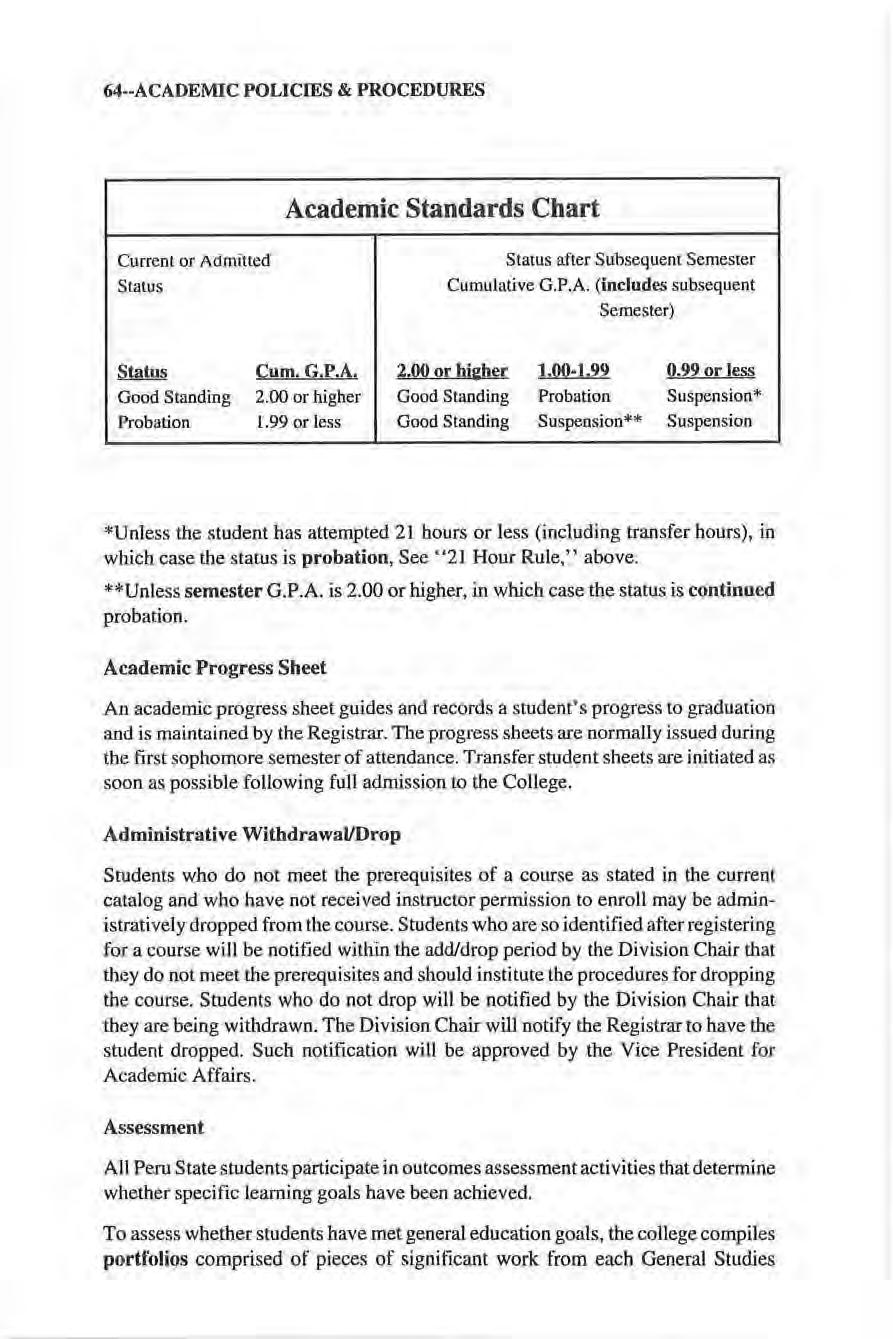
64--ACADEMIC POLICIES & PROCEDURES
Current or Admitted Status after Subsequem Semester Status Cumulative G.P A. (includes subsequent Seme~ter) Cum,G,P.A. 2.00 or hi2ber 1.00-1.22 Q.99 or Jess Good Standing 2.00 or higher Good Standing Probation Suspension* Probation l.99 or less Good Standing Suspension** Suspension
taken during the student's freshman and sophomore years During the second semester of the sophomore year, a faculty team evaluates the portfolio and meets with the student to discuss the student's progress toward general education goals and, if necessary, the need for remedi ation. Students with 45 or more boars must complete their portfolio evaluation meeting before preregistering for the next semester's coursework.
To assess whether senior students have mastered the content, methodology, and liberal arts base of their discipline, each graduati ng senior must s uccessfu ll y complete the discipline's senior competency. Senior competenciet- for each major are noted in the major's section of the catalog and below:
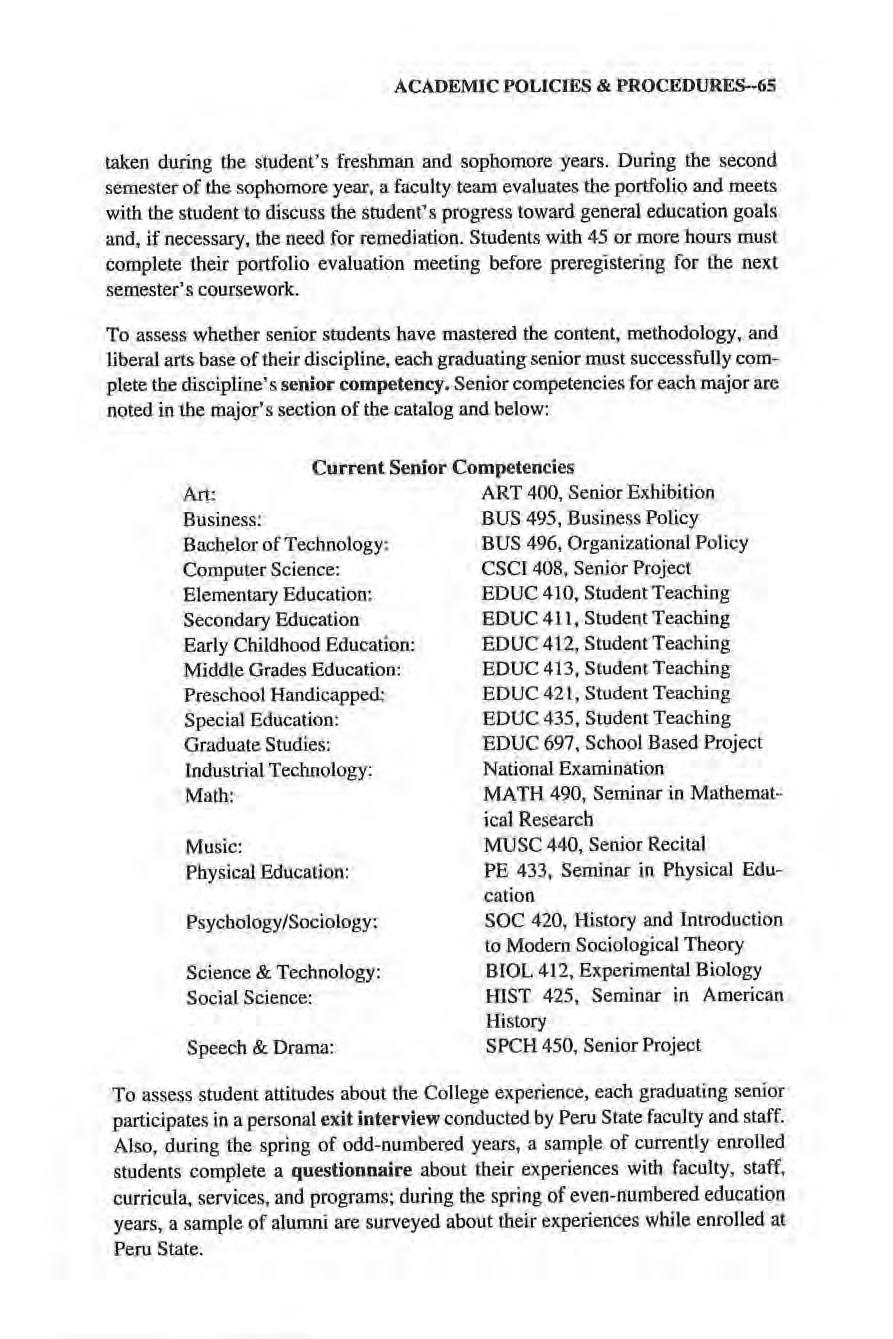
Current Senior Competencies
Art:
Business:
Bachelor of Technol ogy:
Computer Science:
Elementary Education:
Secondary Education
Early Childhood Education:
Middle Grades Education:
Preschool Handicapped:
Special Education:
Graduate Studies:
Industrial Technol ogy:
Math:
Music:
Physical Education:
Psychology/Sociology:
Science & T echnology:
Social Science:
Speech & Drama:
ART 400, Senior Exhibiti on
BUS 495, Business Policy
BUS 496, Organizational Policy
CSCI 408, Senior Project
EDUC410, Student Teaching
EDUC 4 11, Student Teaching
EDUC 412, Student Teaching
EDUC 413 , Student Teaching
EDUC 42 1, Student Teaching
EDUC 435, Student Teaching
EDUC 697, School Based Project
National Examination
MATH 490, Seminar in Mathematical Research
MUSC 440, Senior Recital
PE 433, Seminar in Physical Educatio n
SOC 420, History and Introduction
to Modern Sociological Theory
BIOL 4 12, Experimental Biology
HIST 425, Seminar in American
H istory
SPCH 450, Senior Project
To assess student attitudes about the College experience, each graduating senior participates in a personal exit interview conducted by Peru State faculty and staff. Also , during the spring of odd-nu mbered years, a sample of currently enrolled students complete a questionnaire about their experiences with faculty, staff, curricula, services, and programs; d urin g the spring of even-nurobered education years, a samp le of al umni are surveyed about thei.r experiences while enrolled at Peru State.
ACADEMIC POUCIES & PROCEDURES--65
The results of all assessment activities are distributed to appropriate personnel and governance units for recommendations about program and service improvement.
Attendance and Scholastic Attitude
Students are expected to attend classes regularly, to arrive punctually, and to complete all assigned work. Attendance is a privilege and a responsibility represented by not only the student's investment, but also by a s ignificant investment by the State of Nebraska.
When it is necessary for students to miss class, they have the responsibility to notify their instructor in advance whenever possible. Faculty members have the prerogative of allowing s tudents to make up and complete work missed during the absence.
Instructors have the right to base a portion of a student ' s grade on attendance. They must present their grading practices and attendance policies in writing to botb s tudent s and their division chair duri ng the first week of the semester.
Whenever absences or other elements of scholastic attitude become detrimental (regardless of cause) to the student's staniling in class and/or the success of the class as a whol e, the instructor may confer with the s tudent. The instru ctor and the student may mutually agree that the registration in the course should be withdrawn, or the instructor may issue the student a scholastic alert. Future conferences for the same or related reasons m ay result in the i nstructor withdrawing the student from the class. ff the student requests, the Vice President for Academic Affairs may be asked to participate in the decision. The grade will be a W if the course withdrawal is prior to the l ast date to withdraw with a W. An F will be reco rded after this date.
Change of Advisor
Students who want to change advisors may obtain a Change of Advisor form from their division office or the Registrar's Office. Change of advisor is not official and complete until the previous advisor, the new adv isor's chair, and the new advisor's signatures are obtained. The previous division's office is responsible for tran sfer of student files to the new advisor.

Change of Major
Students who want to change their majo r or undeclared status complete the C hange of Major form available from their division office or at the Registrar' s Offi ce.
Students who elect t o change their major may have to follow the requirements in the College catalog current at the time of change, rather than the one in effect al the time they were admitted to the Co llege to pursue a degree program. A change in major may also require additional classes and delay the graduation date.
66--ACADEMIC
POLICIES & PROCEDURES
Change in Registration - Drop/Add
Students are allowed to drop/add until the published final date. Their course registrations are the n final.
Students are responsible for the accuracy of each registration and are ultimately responsible for meeting aU degree requirements.
A c hang e in registration is processed at the R egistrar's Office. No full sem ester cou rses may be added after the published final date to add courses. When applicable, tuition charges wHI be adjusted for changes initiated during the official add/ drop period only.
Classification of Students

Students are classified according to the number of semester credit hours earned:
Post-graduate students have earned a bachel or's degree or higher and are earning additional undergraduate credit.
Non-degree students are qualified persons who are enrolled primarily to satisfy an occupati o nal need or personal interest.
Dead Week
Dead Week is the week prior to finals week and no exams are to be gjven during that week. Exceptions to this policy may be granted only by the Vice Pre sident for Academic Affairs.
Final Exams
Final exams are scheduled the last week of the semester. Coac hes of varsity athletic teams are not to schedule regu lar games or events during this week. However, they may enter their teams in NAIA approved play-offs in which the College has declared an intention to participate if qualified. Students who pm1icipate in playoff events during finals week are still subject to the attendance policies of their instructors ,
ACADEMIC POLICffiS & PROCEDURES--67
Freshman Sophomore Junior Senior 0 to 29 credits 30 to 59 credits 60 to 89 credits 90 and over
F ull -Time Student Status
Peru State students who are enrolled for 12 credit hours or more during a semester are considered full-time students. However, the normal course load for a student who expects to complete a bachelor's degree within eight (8) semesters (four years) is 15-16 hours. The maximum load without special permission is 17 hours; more than 17 hours requires the approval of the chair of the division in which the student is majoring. The Registrar may approve 18 credit hours provided the student obtained a minimum 3.5 grade point average the previous semester. The maximum credit hour load is 2 1. Class withdrawals subsequent to the add/drop period are included in the credit hour load.
Veterans and other eligible persons attending Peru State under the benefits of Chapter 34 and 35, Title 38, U .S.C., as full-time students must be enrolled for at least 12 semester hours, or the equivalent.
Courses at Offutt Air Base and Southeast Community College are scheduled on an eight-week cycle.
For each eight-week session when students are not registered for student teaching, they may register for a maximum of 12 semester credit hours with Peru State. The 12 hours include any independent or directed study courses.
For the eight-week session when students are regis tered for student teaching, they may register for a maximum of 11 hours with Peru State. The I 1 hours include any independent study courses.
Grading System
CR and NCR do not affect grade point average; CR is applicable to graduation hours.
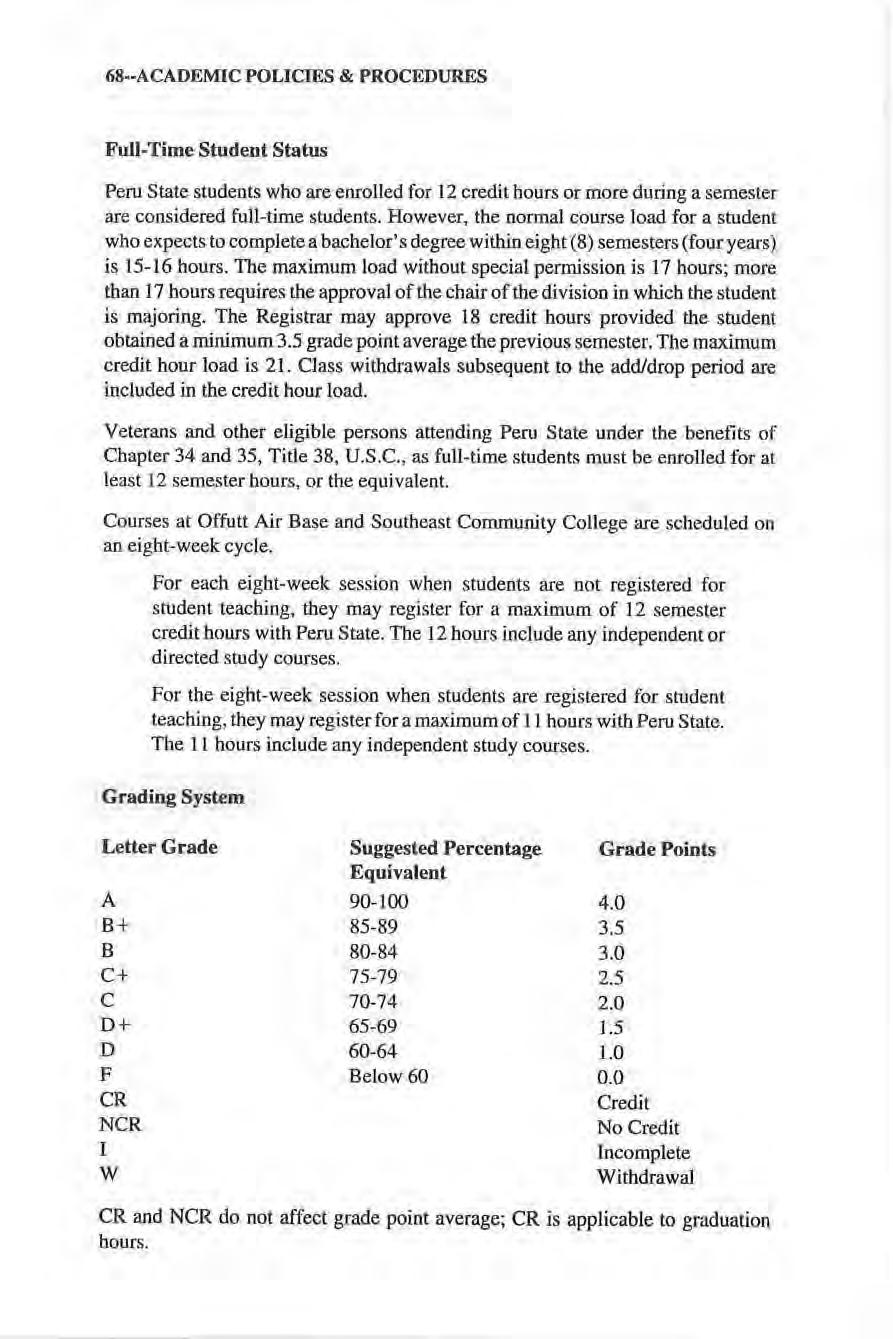
68--ACADEMICPOLICIES & PROCEDURES
Letter Grade Suggested Percentage Grade Points Equivalent A 90-100 4.0 B+ 85-89 3.5 B 80-84 3.0 C + 75-79 2.5 C 70-74 2.0 D + 65--69 1.5 D 60-64 1.0 F Below60 0.0 CR Credit NCR No Credit I Incomplete w Withdrawal
I (Incomplete) work must be completed within the next semester or the record will show an F. Work is to be completed whether the student is in attendance or not. Students who have filed an application for graduation are not eligible for a grade of Incomplete.
Graduation Honors
Graduation honors are conferred on bachelor's degree candidates who have earned a minimum of 60 Peru State College semester hour creclits in graded courses (CR grades excluded). These hours must be resident credit hours. Grades and credits earned at other colleges and universities do not apply toward graduation llonors from Peru State.
With High est Distinction With High Distinction With Distinction
At the end of each semester the Vice President for Academic Affairs publishes the Academic Honors List. Students on the Academic Honors List must have a grade point average of 3.75 or higher for the sem ester, have completed at least 12 hours (credit/no credit not included), have no incomplete grades for the semester, and have no holds on their academic record.
Outcomes Assessment (See Assessment.)
Overload (See Pull-Time Student Status,)
Petition (See Academic Appeals.)
Probation (See Academic Probation.)
Progress Sheet (See Academic Progress Sheet.)

Selecting a Major
Students who apply for admission to the College will indic'ate on the Application for Admission the major area of study they intend to pursue. Individuals who are unsure of a major should indicate "Undeclared'' on the application form.
Suspension (See Academic Suspension.)
Transcripts
A fee is charged for each transcript (including the first). Transcripts are not issued to students who bave financial obligations to the College or holds on their academic record s. Transcript requests are made in writing to the Registr'df.
ACADEMIC POLICIES & PROCEDURES-·69
Honors List 3.90-4.00 3.75 - 3.89 3.50- 3.74
POLICIES & PROCEDURES
Once a student graduates or discontinues attendance at Peru State, subsequent college credits do not become a part of his/her Peru State transcript. This does not apply to an active student's credential file in the College's Cooperative Education and Career Services Office.
Waiver (See Academic Appeal.)
Withdrawal from C lass
Students who wish to withdraw from a class must notify their advisor, the course instructor, and officially withdraw through the Registrar's Office. Students withdrawing after the last day to add classes, the end of the first week of class,receive a W. After one week past the term mid-point date, students who initiate a withdrawal receive an F for the class.
Withdrawal from the College
Students who wish to withdraw from the College must initiate their withdrawal with the Vice President for Student Affairs and complete all the appropriate paperwork. Proportional tuition refunds are made in accordance with the refund schedule (see the Expenses and Financial Aid sectio11) to students who officially withdraw from the College.
Prior to one week past the mid-point of the term, withdrawal course grades will be (W). After o ne week past the mid -point of the term, the Vice President for Stude nt Affairs wjlJ determine if unusual or extenuating circumstances surround a withdrawal request and recommend either Withdrawal (W) or Failing (F) grades for all coursework. Poor academic performance is not sufficient reason to receive all W's.
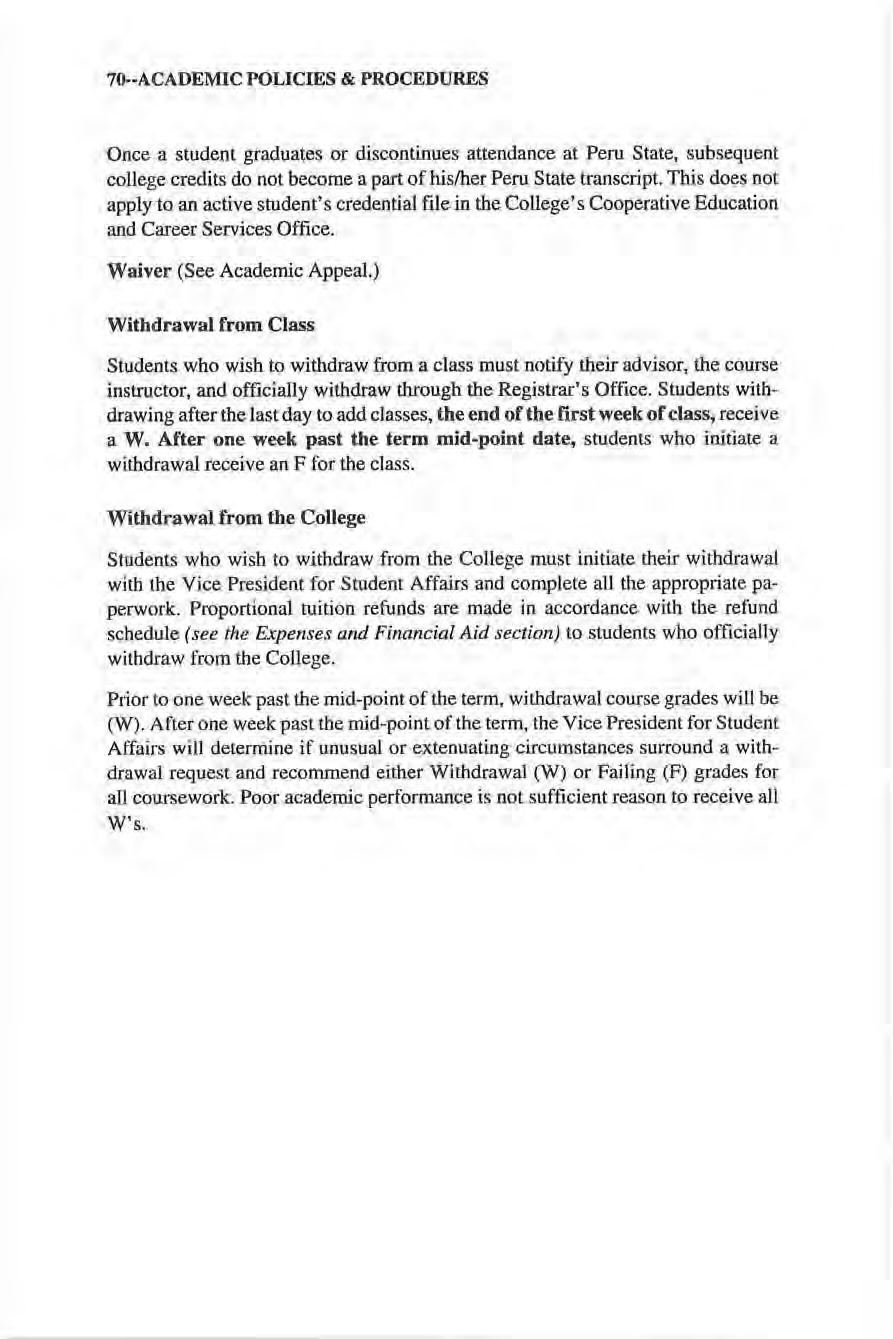
70--ACADEMlC
GENERAL STUDIES
The purpose of the General Studies Pwgram at Peru State is to prepare the student for advanced college work as well as for li fe- lo ng learning. The General Studies Program consists of s pecific courses that are designe d to assis t the s tudent in acqui ring the intellectual foundation that will last for a lifetime of learning.
The objectives of the General Studies Program are establis hed in the Role and Mission stateme nt. This s tate me nt requ ires that Peru graduates I ) can write, sp eak, and comp ute effectively, 2) are computer l iterate, 3) can think c ritic ally and independently, 4) are open to and have the capacity fo r change, 5) are prepared to assume the ir social and civic roles as leaders in an increasingly intecdependent world, and 6 ) are equipped to pursue lives that are inte llectu ally, e thically, aestheti cal ly, and physically rewarding. Below is the curriculum designed to meet th e above objectives
rank al •h<85th percentile or higher Oil the English section of tl,e ACT,,, SAT tests may waive theJim course ofthe compoxit/011 skills requireme/11 Eng JOI/.)
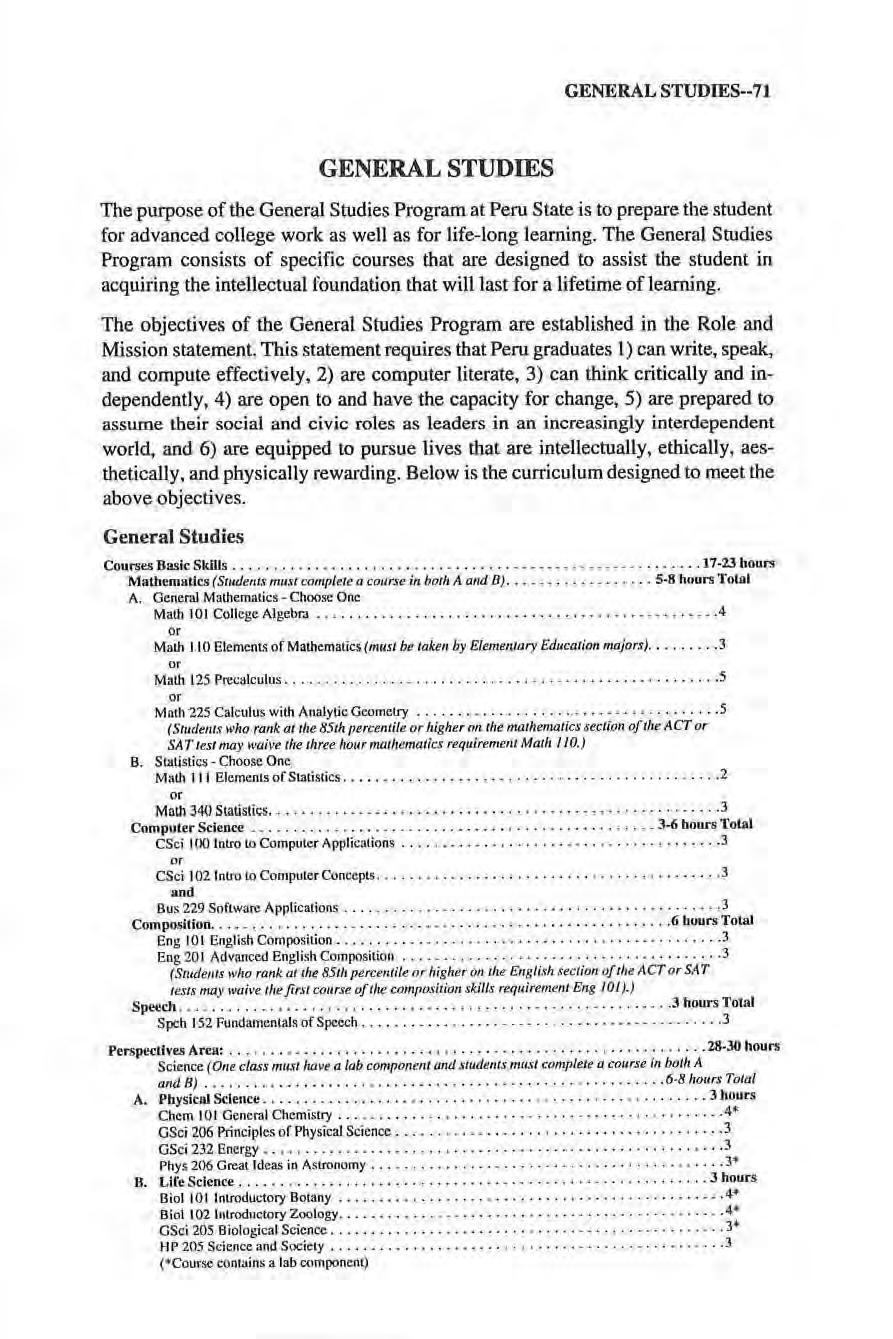
GENERAL STUDIES--71
General Studies Courses Basic S kills , ...•... , ..•..... • 17-23bours Mathematics (Swdems must cnmplete a co,1rse in bot/, A and BJ .... .. • .. ..•... .. 5-8 ho urs Tolol A General Mathematics- Choose One MaU1 101 College Algebra •• ....•.... • , 4 or Malh 110 Element1 of Mathematics (m11st be takm by Elementary Educatior1 majors) , 3 or Malh 125 Prccalc ul us ....•.. . .... , .. . ' . '' ...... ' ...... ' .s or Mnth '225 Calculus with Analyti c Geometry ...••.. ••. 5 (Students w/Jo rallk ar 1/Je 85tlr pertentile
section oft/le ACT or SAT test hlay w<1ive the
Math 110.) B SU!\iSLics - Choose One Math 111 Elcrnenls of Statistics ............•..... •• • 2 or Malh 340 Statistics. , , ... • , , , ............ . .... • ...... •. . . .. , , . • • • • • . , .....3 Computer Science ....•. •• • .....• • • •• ••. .•.. 3-6 hours 1'otal CSci l (J(l lnlro 10 C o mputer Applications 1 or CSci I02 lnlr0 to CompulerConccplli ., ,, 3 and Bus 229 Software Applications , •.. .•........ .• ...•.. , ..•3 Composition • •• , , ,6 hours Tola! Eng 101 English Composition , ......•. • , ..•.. 3 Eng 201 Adv!!Jlced English Composition , , , , , . , 3 / St11de111s
S p eticl1 , • , , , , , 3 hours Total Speh 152 Fundamentals of Speech ..•.... • 3 Perspectives Area : , . •. , ...•.•.... , ....•. , • 2/1.JO h ours Science (011e class m11.<t have
lab
must complete a co11 rse in
A andB) ,, ...•.••.... ,, • .....•..• , , •• •...... • 6-8 hoim·Tota/ A. Physicul Sdeuce • ..•.... , .••. , , 3 hours C hem IOI Generai C hemis try • ..••.. • ...•......... .4• GSci 206 Principles of Physical Science • , 3 GSci 232 Bncrgy , • .• • •• •.. • , , 3 Phys 2()6 Great Ideas in Astronomy , • • • •• • , , •• , , 3* B. Lire Science , , • , , • , • , • •. , . 3 hours Biol IOI ln1roduc1ory Botany •. • , , , • •• , , 4• Biol 102 lntrod11 clmy Zoology , •• • •• • .• • • , , 4• GSci 205 ll iological Science. , . . .... ... •.. , • , • . ... • ... , ............... , , .... 3~ H P 205 Science and Society , , ......... .. , , ...... .. . , .................. . .... 3 (•Course contains a lab component)
or higher 011 the mathematics
three hour rna//remalics requirement
who
a
component and studen ts
both
72--GENERAL STUDIES
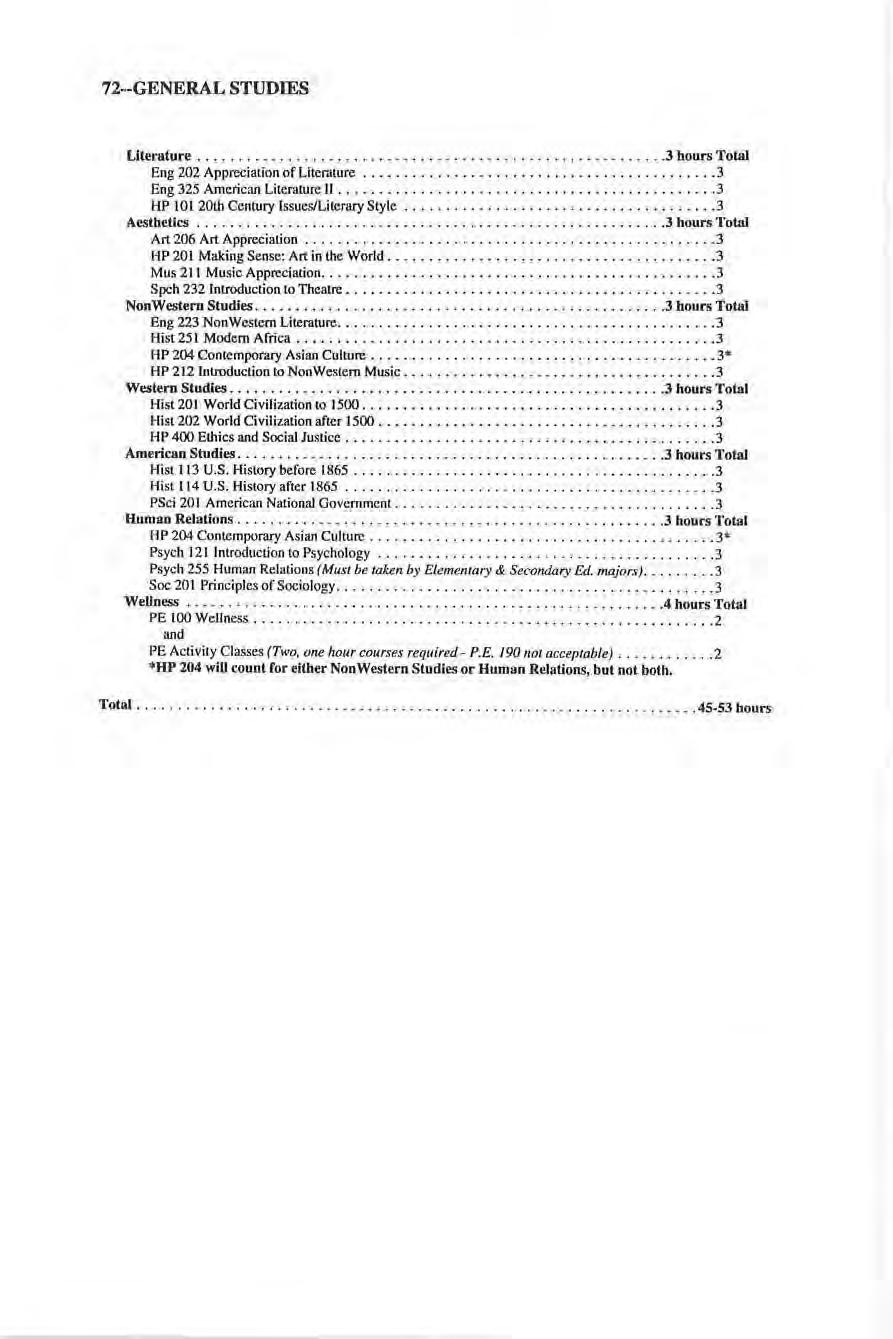
Literature , , • •. • , , • , , , •• 3 hours Total Eng 202 Appreciation of Li terature • , • , 3 Eng 325 American Literature II ...... . ........ •. • , .. ..... . , , . , . .. • ... .. ......3 HP 101 201.h Century Issues/Literary Style p 3 Aesthetics 3 hours Total Art 206 Art Appreciation • • .........•..........•......3 HP 201 Making Sense: Art in the World .. ... ..... ... .. . . .. . . .... . ...... .. . .....3 Mus 2 11 Music Appreciation.. .... . . ..... . . .. . .......... . . . . .••... • . • .• . .•.. 3 Speh 232 Introduction to Theatre 3 NonWestern Studies ..• •••• •• , , • 3 hours Total Eng 223 NonWestern Literature • • ••. • •. ..•......3 Hist 251 Modem Africa , 3 H P 204 Contemporary Asian Culture , • • ••... • • 3• HP 212 Introduction to NonWestern Music 3 Western Studies •. • 3 hours Tnlal Hist 201 World Civilization to 1500 3 Hist 202 World Civilr,ation after 1500 •. , 3 HP 400 Ethics and Social Justice 3 Ame rican Studies . .. ... • . ... .. ........ . . .. • ................. . . ...• ...3 hours Total Hist I 13 U.S. History before 1865 . ...... . ............ .. . . .. . . .. .......... .. ..3 Hist 114 U.S. History after 1865 3 PSci 201 American National Government. 3 Humoli Relations ...• •. , • • 3 hours Total HP 204 Contcmporary Asian Culture •. 3• Psych 121 lntroductfon to Psychology . . ..... .... .. . ..... •.. . . . ... , . . .. ........ 3 Psych 255 Human Relations ( Must be takn by Eleme111ary & S econdary Ed. major.<) 3 Soc 201 Principles of Sociology , • 3 WeUness • , •. • , 4 hours Total PE 100 Wellness • • , , , 2 and PE Ac LiVily Classes (Two, one hour courses requ ired - P E. /901101 acceptable ) • • .•. • 2 • HP 204 wiU count for either NonWestern Studies or Human Relations, but not both. Total ..• •.• • •• , .45-SJ hours
Course
PERSONAL CURRICULUM GUIDE
Below is an unofficial worksheet that permits the student to inventory General Studies and major courses by grade received, term completed, and number of creditbours earned.
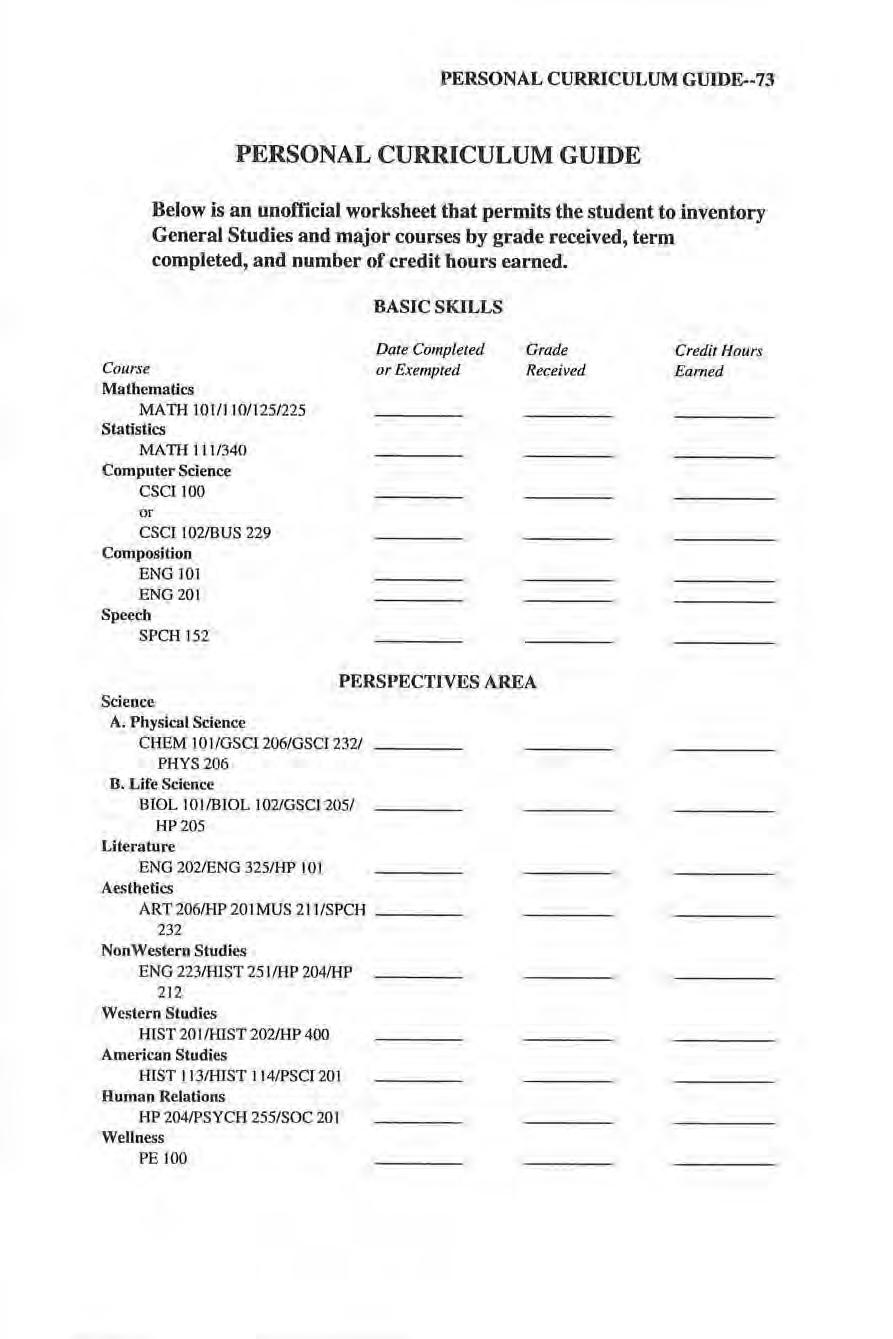
BASIC SKILLS
Date Completed or Exempted
Grade Received
Mathe m atics
MATH 101/110/125/225
Statistics
MATif i I 1/340
Com puter Science
CSCl 100 or
CSCI 102/BUS 229
Composition
BNG 101
ENG 201
Speech
SPCH 152
Science
A. Physical Science
PERSPECTIVES AREA
CHEM 101/GSCI206/OSCI 232/ PHYS 206
B. Life Science
BIOL 101/BIOL 102/GSCJ205I
HP205
Literature
ENG 202/ENG 325/HP 101
Aesthetics
ART 206/HP 201 MUS 2 11/SPCH ____ 232
No nWcsteru Stud ies
ENG 223/HlST 25 IIJ-IP l04/HP 212
Western Studies
HlST 201/HlST 202/HP 400
American Studies
H1ST 113/HIST l 14/PSCJ201
Ruman Relations
HP 204/PSYCH 255/SOC 201
Wellness
PE JOO
Credit Hours
Earned
PERSONAL CURRICULUM GUIDE--73
MAJOR COURSES
PROGRAM· SPECIFIC REQUIREMENTS
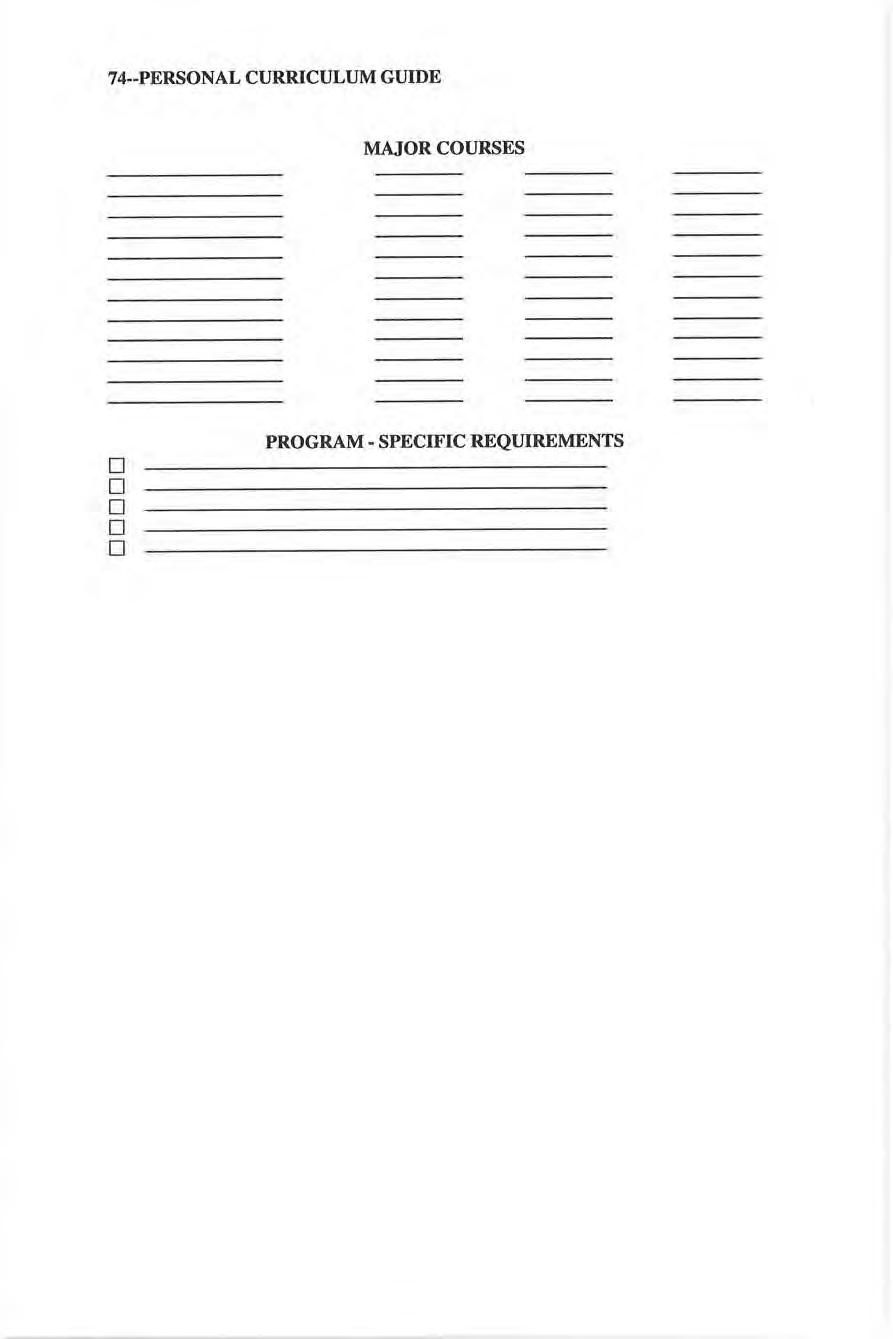
74--PERSONAL
CURRICULUM GUIDE
DEGREE PROGRAMS
Peru State College offers fourteen undergraduate majors with 43 options, 28 endorsements, and fo ur minors within the major structure.
Degree
BS/BA
BT
Major Business Business Admi nistration Technology
Option
Accounting Management
Management Information Systems
Marketi ng
Distribution
Management (Offutt P rogram onl y)
Supervision
Minor
BS/BA
Elementary Education
"Elementary Education
..,.Special Education- v ·
Elementary or Secondary
*•Ea rly Childhood v
•• Preschool Handicapped v'
**Ml.ddle
BS/BA
Physical Education
**Physical Education v ( K-6)
**Physical Education V (7- 12)
Sports Management V
*Athletic Coaching
BS/BA.
BS/BA
BS/BA
Art
English
Music
*Art
*Language Arts
*English
**Yocal/Jnscrumental
Mu si c Educatio n
Music (7-12) _
*"Ele mentaryVocal ) -\ cJ.,s() bL
Music Education (K-6) > b
Musi c Performance " ~ 'f'f'-°JO"\_
Mus ic Marketing __)
BS/BA BS/BA
BS/BA
BS/.BA
Psychology/ Sociology
Social Scie nce
Speech & Drama
Natural Science
Criminal Justice
Psychology-Soc iology
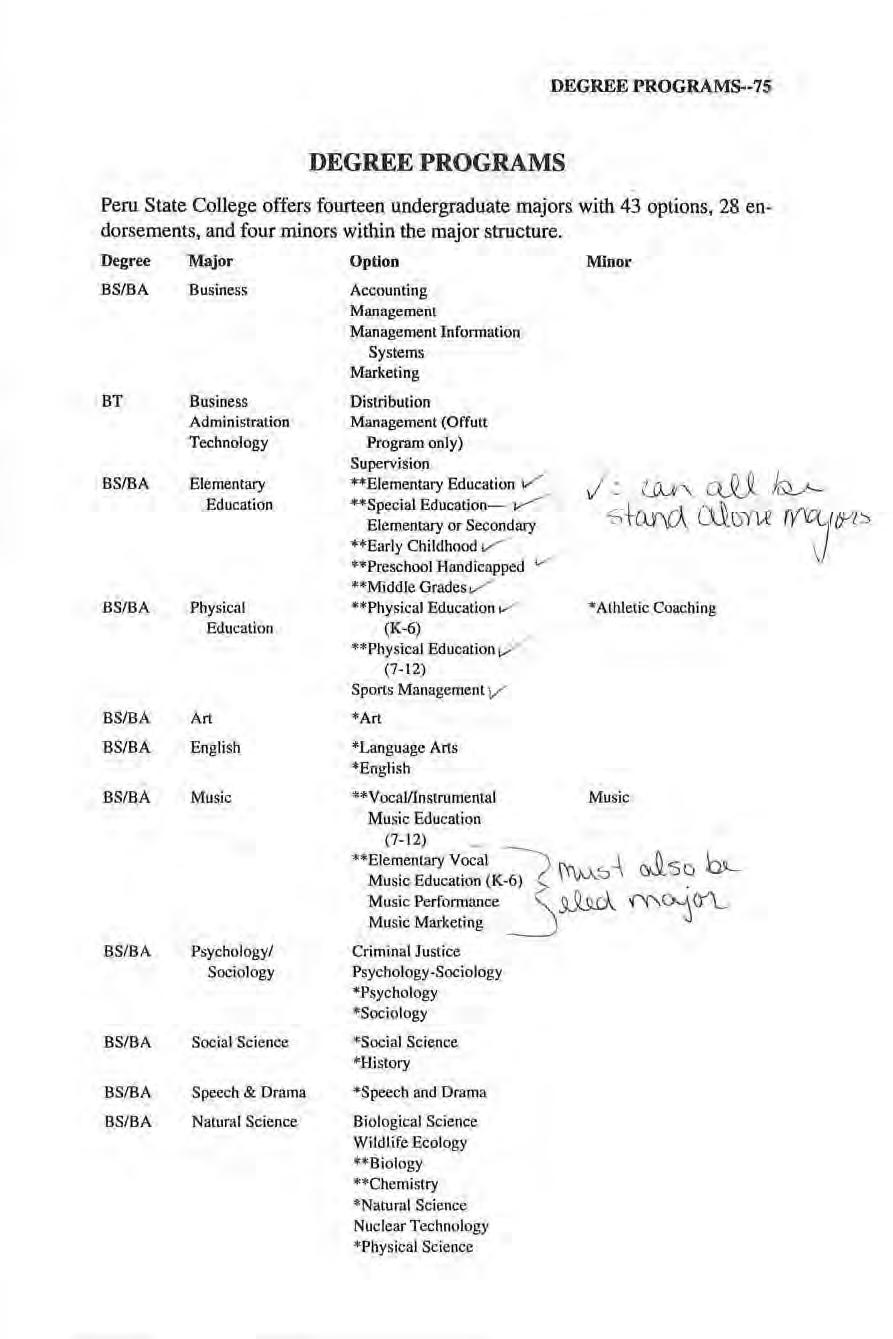
•Psychology
*Sociology
*Social Science
·•History
• speech and Drama
Biolo gical Science
Wildlife Ecology
h Biology
*"Chemistry
*Natural Sc ience
Nuclear Techno logy
*P hysical Science
DEGREE PROGRAMS--75
76--DEGREE PROGRAMS
BS/BA Computer Science Technical Business Applications
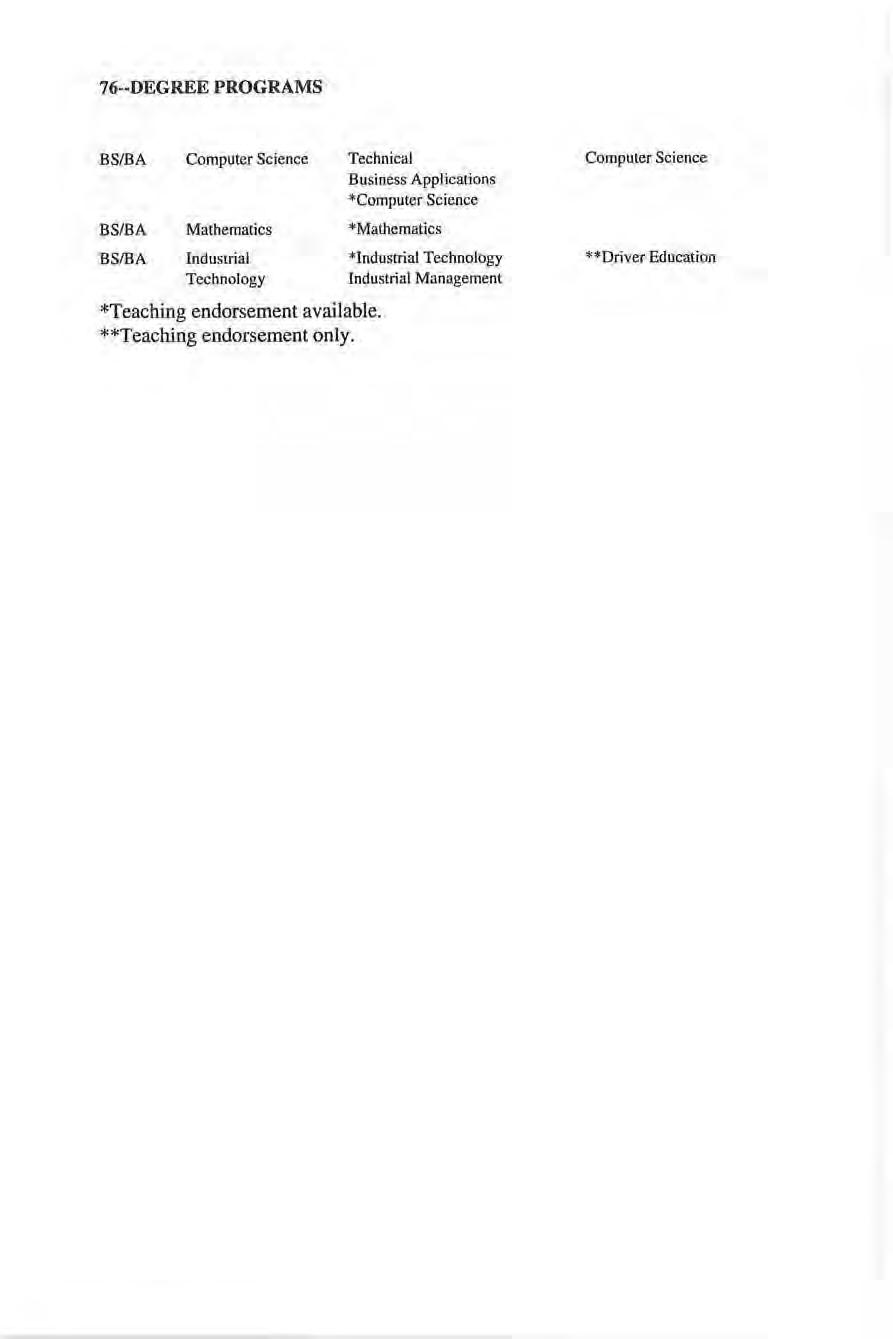
BS/BA Mathematics
BS/BA Industrial
"'Computer Science
*Mathematics
"lnduslTial Technology Technology Industrial Management
*Teaching endorsement avai lable.
**Teaching endorsement only.
Computer Science
**Driver Education
HONORS PROGRAM
The purpose of the Honors Program is to challenge academjcally-gifted students with new ideas and perspectives. Honors courses are usually interdisdplinary in approach. Oass size is limited and student eligibility requires higher than average academic qualifications.
Honors courses are designed to s timulate an inquiry model of learning through a seminar structure. The Honors Program is an opportuILity for personal growth and an inspiration for a lifetime of intellectual curios ity. Honors Program students may attend special cultural or scholastic events throughout the academic year, as well as interact with visiting scholars on the Peru State College campus.
To complete the Honors Program, students need at least 15 hours of Honors classes. Two of these courses are required: HP I 01 - Twentieth Century lssues Literary Styles (meet s the G eneral Studies Literature requirement) and HP 400 - Ethics and Social Justice Capstone course (meets tbe General Studies Western Studies requirement). Four additional Honors courses are offered on a regular basis; students must take at least three of these courses to fulfill the 15 cred it hour requirement. All regularly scheduled Honors cours esfo lfill requirements of Peru State College's General S tudies Program. In addition to the two co urses already described , the folJowing four courses will be offered: (choose three)
1) HP 201 Making Sense: Art in the World (Satisfies the General Studies Aesthetics requirement)
2) HP 204 Contemporary Asian Cultures (Satisfies the General Studies Non-Western Studies or Human R elations requiremeot, but not both)
3) HP 205 Science and Society (Sa ti sfies one of the General Studies Science course requirements)
4) HP 212 Introduction to Non-Western Musics (Satisfies the General Studies Non-Western Studies requirement)
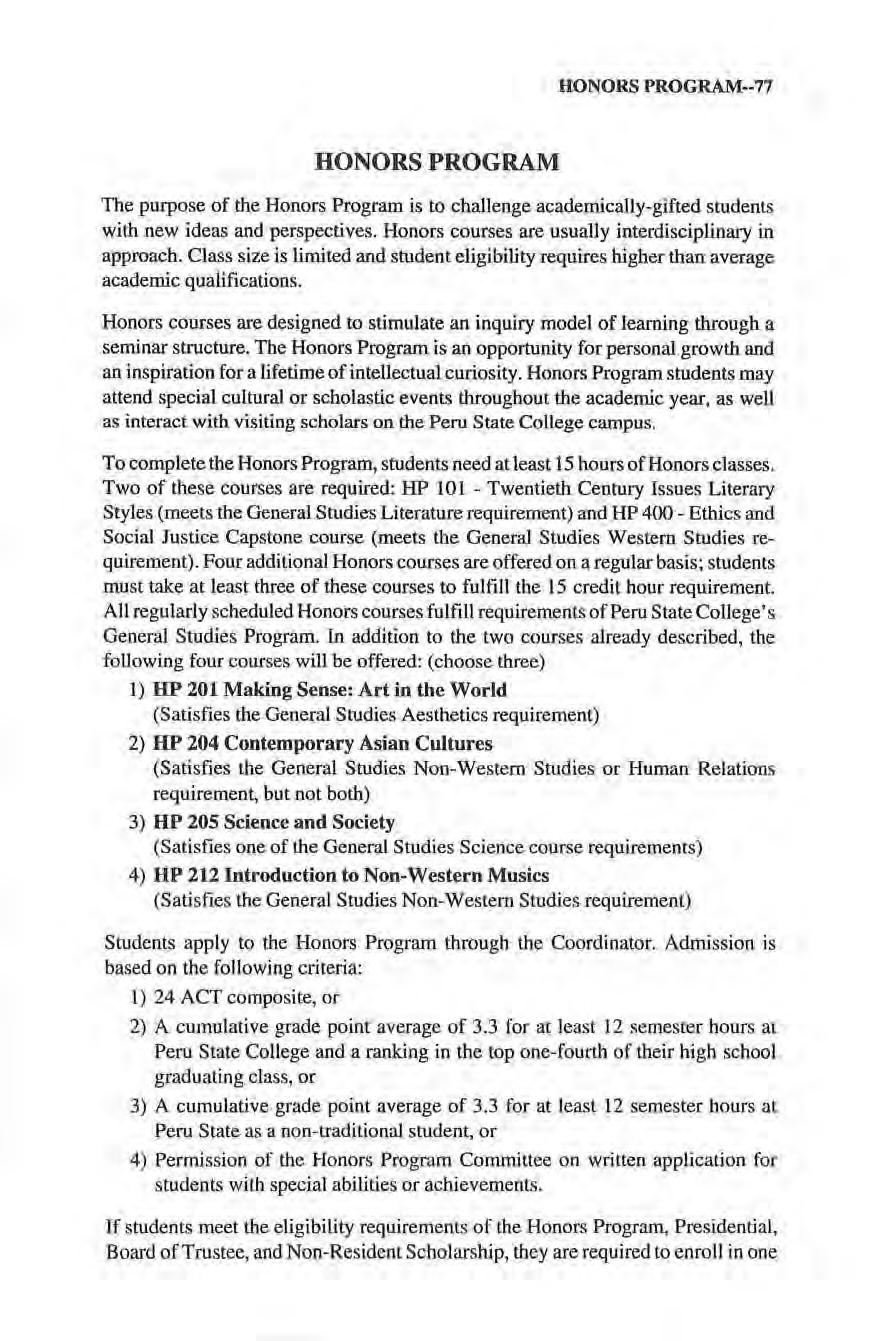
Students apply to the Honors Program through the Coordinator. Admjssion is based on the following criteria:
l) 24 ACT composite, or
2) A c umulative grade point average of 3 3 for at least 12 semester hours at Peru State College and a ranking in the top one-fourth of their high school graduating class, or
3) A cumulative -grade point average of 3.3 for at least 12 semester hours at Peru State as a non-traditional student, o r
4) Permission of the Honors Program Committee on written application for students with specia l abilities or achievements.
If students meet the eligibility requirements of the Honors Program, President ial, Board of Trustee, and Non-Resident Scholarship, tbey are required to enroll in one
HONORS PROGRAM--77
Honors course during their first year at Peru State College. They then have the option to continue in or to drop the program
All students wishing to continue in the program must finish each academic year with at least a 3 .0 cumulative grade point average. To be considered Honors Program graduates, students must have maintained at least a 3.0 cumulative grade point average, and completed the 15 credit hour requirement.
Students who s uccessfully complete the Honors Program are designated as Honors Program graduates. They are recognized at Commencement and on their permanent college records.
Course Descriptions

Honors Program
101 Twentieth Century Issue-Literary Styles ( 3 hours)
(Satisfies the General Studies Literature requirement)
Through literature such as fiction, poetry, drama, biography, autobiography. and historical narrative, this course will focus oo selected issues such as education, the environment, racism, behaviorism, nuclear war, political leadership and the psychology of leadership, mass political movements. and the use of propaganda.
Permission of Honors Program Coordinator requ ired.
(Each Fall Semester)
201 Making Sense: Art in the World (3 hour)
(Satisfies the General Studies Aesthetics requirement)
This is an integrated Fine Arts course designed to provide s tudents the opportunity to view and discuss the interrelatedness of th e fine arts, in particular the perfonnance arts, e.g., classical theatre, mod ern theatre, musical theatre, ballet, modern dance, choral performance, orchestral performance, opera, the visual arts in all media, film, photography, architecture, etc It will rely heavily upon on-campus seminar sessions and s~udent attendance at on-campus and off-campus performances. Permission of Honors Program Coorruoator required.
(Each Spring Semester)
204 Contemporary Asian Cultures (3 hours) (Satis fies the General Studies Non- Western Studies or Human Relations requirement, but not both)
This course will introduce societies and cul tures of the Far Eas tern countries with emphasis on Japan, Korea, a nd China. The course covers s uch topics as the group, relativism, education, business, religion, rofe of women, and psychological traits. In addition, students will look at the curre nt issues affecting the United States and Asian countries
Permission of Honors Program Coordinator requi red .
(Ea ch Spring semester)
78--HONORS
PROGRAM
205 Science and Society (3 hours)
(Satisfies one of the General Studies Science course requirements)
This course will focus on the scientific method, and the impact that science bas on society and individuals. Topics to be considered will be the relationships of science, ethics, politics, moral issues , and societal goal s. Students will read pub lished articles, write about, and discuss the topics of this class. The course topics will be considered in light of a single discipline within science, evolutionary biology.
Permission of the Honors Program Coordinator required.
(Each Spring semester)
212 Introduction to Non~Western Musics (3 hours)
(Satisfies the General Studies Non-Western Studies requirement)
This course is an introduction to ethnorousicology in which the student will learn to experience and understand music in the context of human life. Students will experience and analyze the musics of Africa, Native America, Black America, Asia, the Near East, the Pacific, and Eastern Europe. This course will also provide the student the tools with which to discover the meanings of music in the life of any society.
Permission of the Honors Program Coordinator required.
( Each Fall semester)
400 Ethics and Social Justice (3 hours)
(Satisfies the General Studies Western Studies requirement)
This course examines contrasting conceptions of social justice and the ideal society as these appear in some of the major thinkers in the tradition of Western ethical philosophy.
Permjssion of the Honors Program Coordinator required
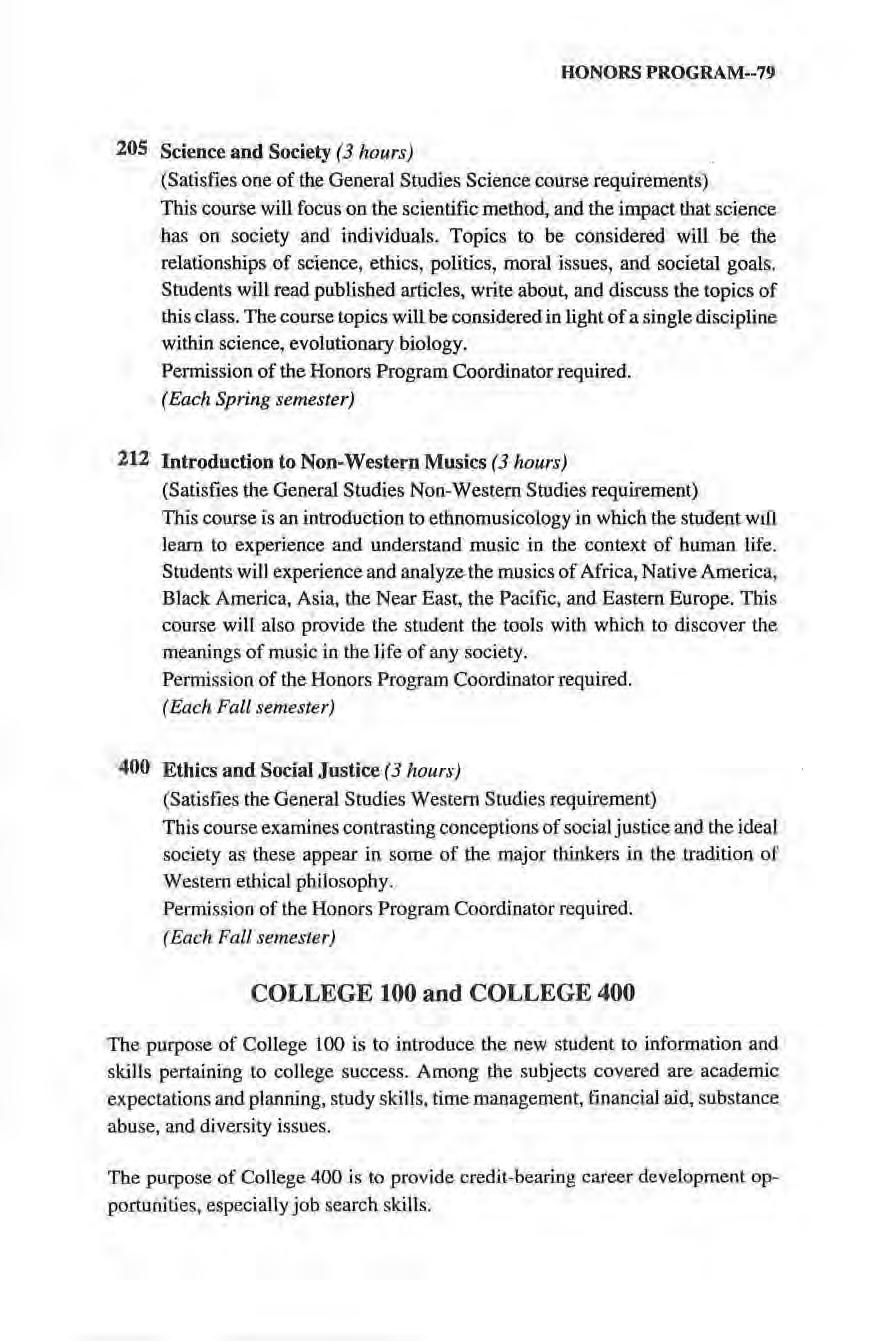
(Each Fall semester)
COLLEGE 100 and COLLEGE 400
The. purpose of College 100 is to introduce the new student to information and ski ll s pe rtaining to college success. Among the subjects covered are academic expectations and planning, study skills, time management, financial aid, s ubstance abuse, and diversity issues.
The purpose of College 400 is to provide credit-bearing career development opportunities, especially job search skills.
HONORS PROGRAM--79
College
Course Descriptions
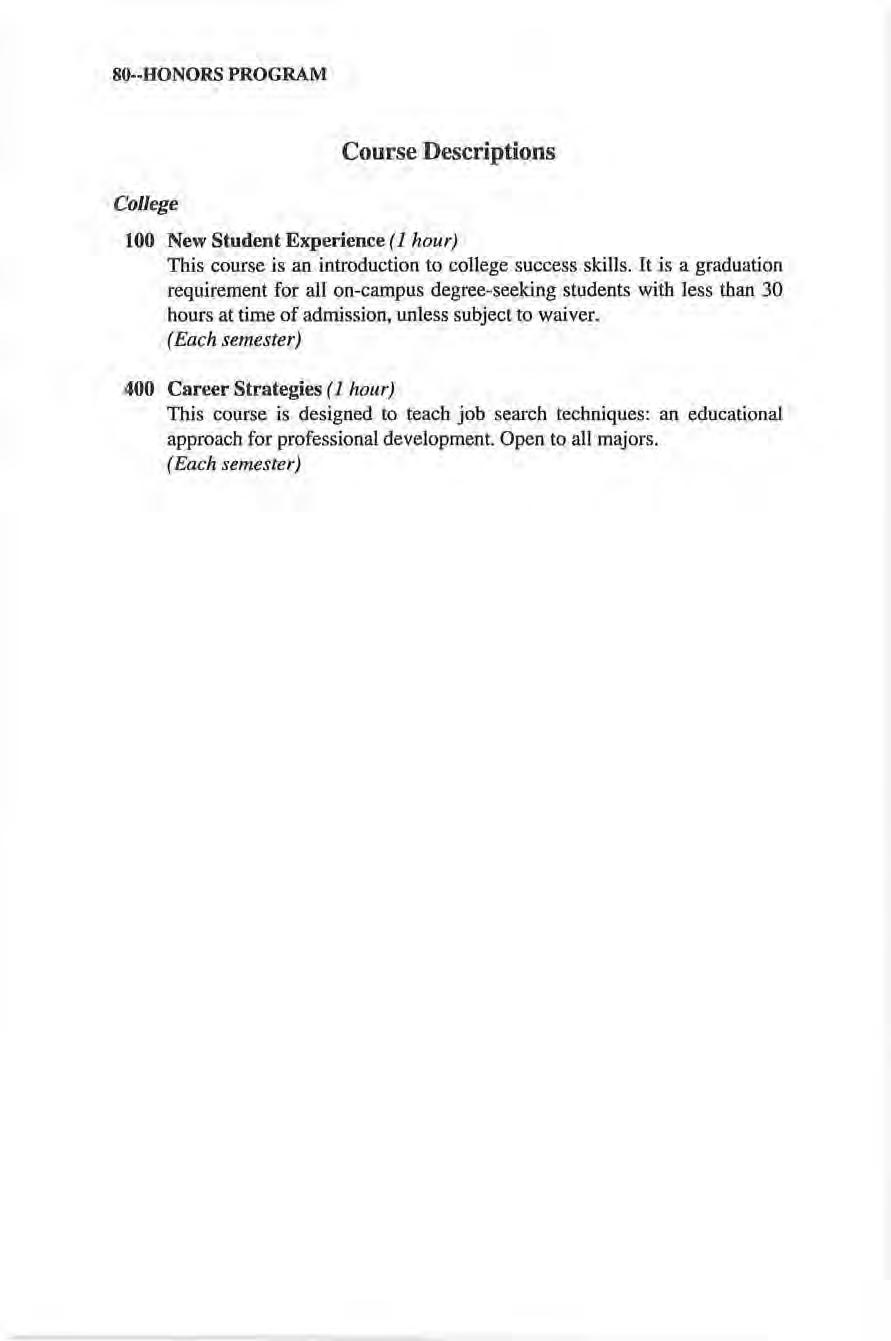
100 New Student Experience (1 hour)
This course is an introduction to college success ski ll s. It is a graduation requirement for all on-campus degree-seeking students with less than 30 hours at time of admission, unless subject to waiver.
( Each semester)
400 Career Strategies (1 hour)
This Col,ll'Se is designed to teach job search techniques: an educ&tio naJ approach for professional development. Open to all majors.
(Each semester)
80--HONORS PROGRAM
DMSION OF BUSINESS
Chair: Jack Hami lton
Professo rs: S nyder, Thomas
Assistant Professors: Beldin, Hamilto n, Kesh, Lewellen, Ruck, Tabata

Nebraska B usiness Development Center Director: Ruenholl
Th e Division of Business offers programs to prep are students for a wide range of occupations in business and industry. The programs are designed to provide marketable ski lls and knowledge, preparation for advancement on the job, and background fo r graduate study . B.A. and B.S. degrees are offered in Business Admin, is tration and the B.T. degree in Technology.
The Busi ness Adm inis tration program offers a c ho ice of options Account ing, Management, Management Information Systems, and Marketing. The Techno logy program offers emphases in Distribution, Management, and Supervision.
DMSION OF BUSINESS--81
TECHNOLOGY
BUSINESS CORE
Principles of Macroeconomics
Principles of Microeconomics
Principl es of Financial Accounting
Pri n cip l es of Managerial Accounting
Legal Environment and Contract Law
Orga nizational Communications
Pr in cip l es of Marketing
Production/Operations Mana geme nt
Business F in ance
Organizational Behavior
Bu siness Policy (last Semester) ( Senio r Competency Course)
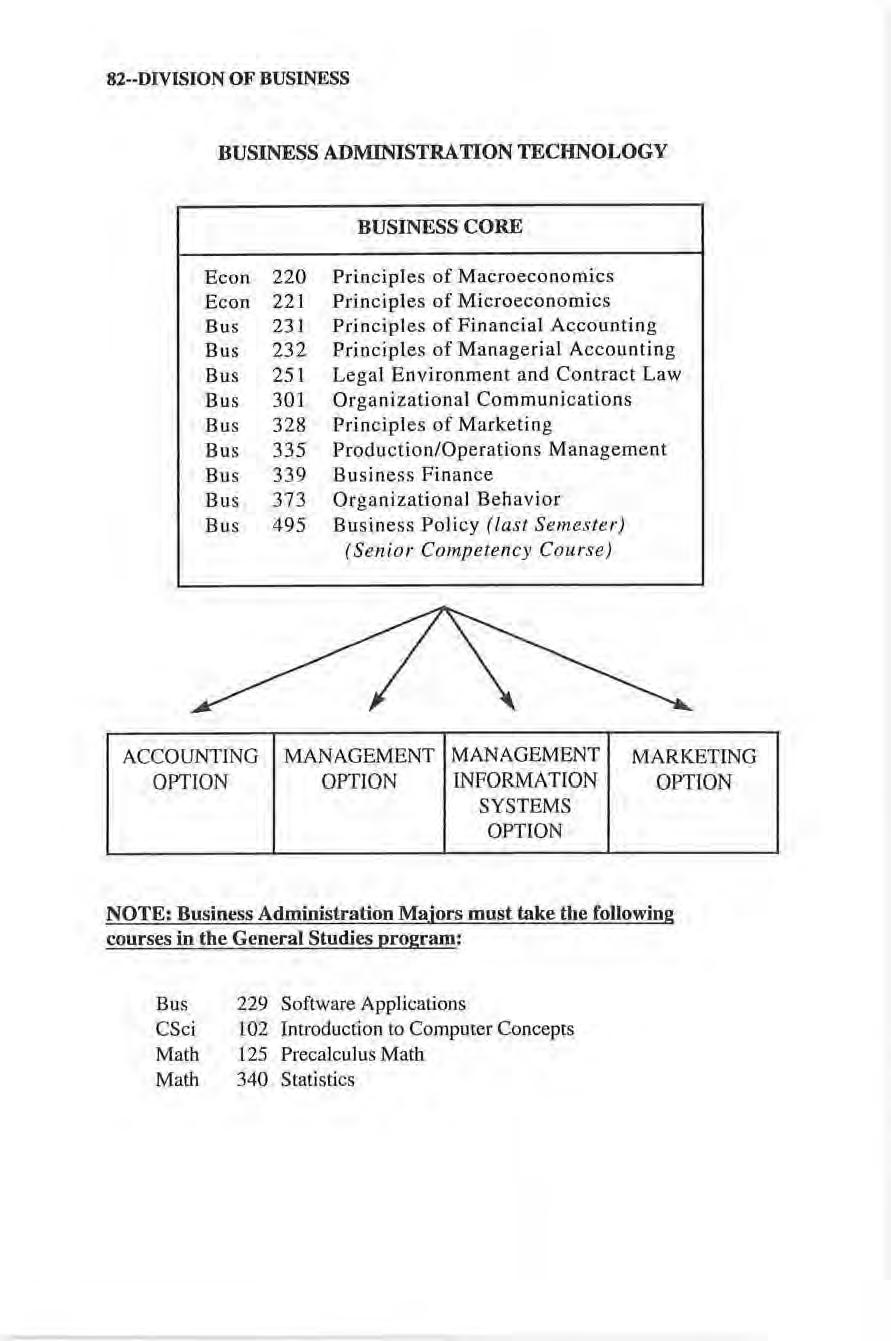
ACCOUNTING MANAGEMENT MANAGEMENT MARKETING OPTION OPTION INFORMATION OPTlON
NOTE: Business Administration Majors must take the foJlowing courses in the General Studies program:
Bus 229 Software Application s CSc i 102 I ntroductio n to Computer Concepts
Math 125 Precalculus Math
Math 340 Statistics
82--DIVISION OF BUSINESS
Econ 220 Econ 221 Bus 231 Bu s 232 Bus 251 Bus 301 Bu s 328 Bus 335 Bus 339 Bus 373 Bus 495
BUSINESS ADMINISTRATION
OPTlON
SYSTEMS
Business Administration • Accounting Option
The Accounting option prepares students for several high-demand careers in financial occupations. Initial coursework is designed to prepare students for positions in private industry and the Certified Management Accountants (CMA) examination. Those students desiring to take the Certified Public Accountants (CPA) examination will need to complete the additional Requirement-. for Public Accounting/CPA Focus.

DIVISION OF BUSINESS--83
Requirements for General Accounting/CMA Focus (125 hours required) Hours 337 Intermediate Accounting I 3 338 Intermediate Accounting II 3 341 Federal Income Truces - Individual 3 Bus Bus Bus Bus 342 Accounting Information Systems Analysis and Bus Bus Bus Bus Bus 351 371 372 450 470 Design 3 Commercial Law 3 Cost/Managerial Accounting 3 Advanced Cost/Managerial Accounting 3 Advanced Accounting 3 Auditing 3 Total 27 Additional
for Public Accounting/CPA Focus (150 hours
Bus Bus 353 Organizational Ethics 45 1 Governmental and Not-for-Profit Accounting Select one ( 1) from the following subjects: Bus 420 Federal Income Taxes - Corporate, Partnerships, and Fiduciary Bus 421 Accounting Theory Total 3 3 3 9
Requirements
required)
Students opting for the CPA Focus are required to talce a total of 60 hours of credit in general education excluding PE but .including the current General Studies Program. Credit hours beyond those required by the General Studies Program may be from any area of general studies and are not specifically designated classes (i.e. any English or math class). The CPA Focus degree requirement is 150 hours . This is the State of Nebraska requirement effective January 1, 1998 and will be the requirement for membership in the American Institute of Certi fied Public Accountan ts (AICPA) effective January 1, 2001.
Business Administrati on • Management Option
The Management option offers a general business approach and prepares graduates for entry and mid-leve l management positions.
(Only 3 hours of Cooperative Education Internship may count toward the Management option .)
Business Administration • Management Information Systems Option
The Management Information Systems (MIS) option prepares students for employment in the development and maintenance of computer-based systems that generate timely and accurate information for managing an organization.
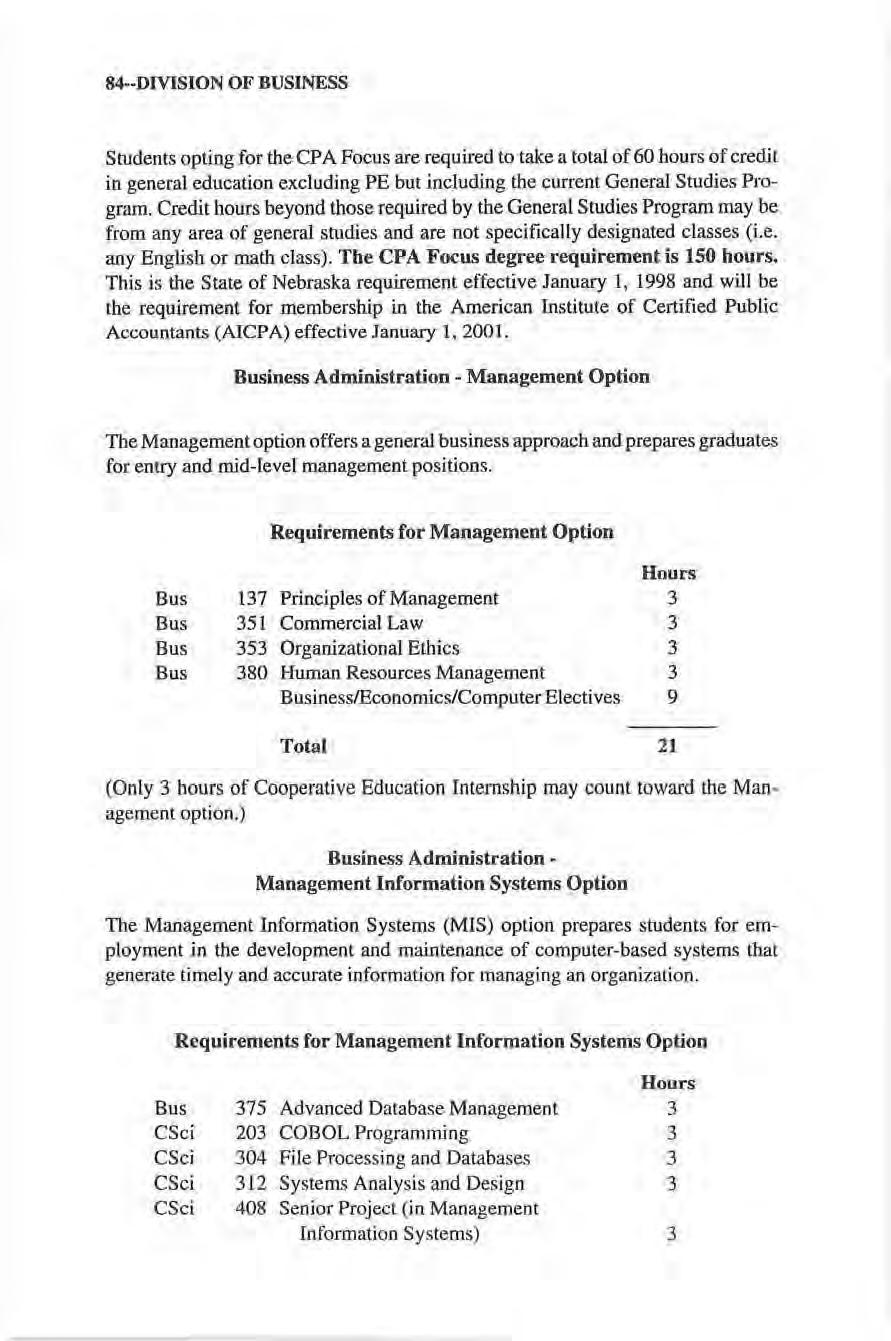
84--DIVISION OF BUSINESS
Bus Bus Bus Bus Req uirements for Management Option 137 Principles of Management 351 Commerc ial Law 353 Organizational Ethics 380 Human Resources Management Business/Economics/Computer Electives Total Hours 3 3 3 3 9 21
Requi rements for Management Information Systems Option HQurs Bus 375 Advanced Database Management 3 CSci 203 COBOL Programmjng 3 CSci 304 File Process ing and Databases 3 CSci 312 Systems Analys is and Design 3 CSci 408 Senior Project (in Management Information Systems) 3
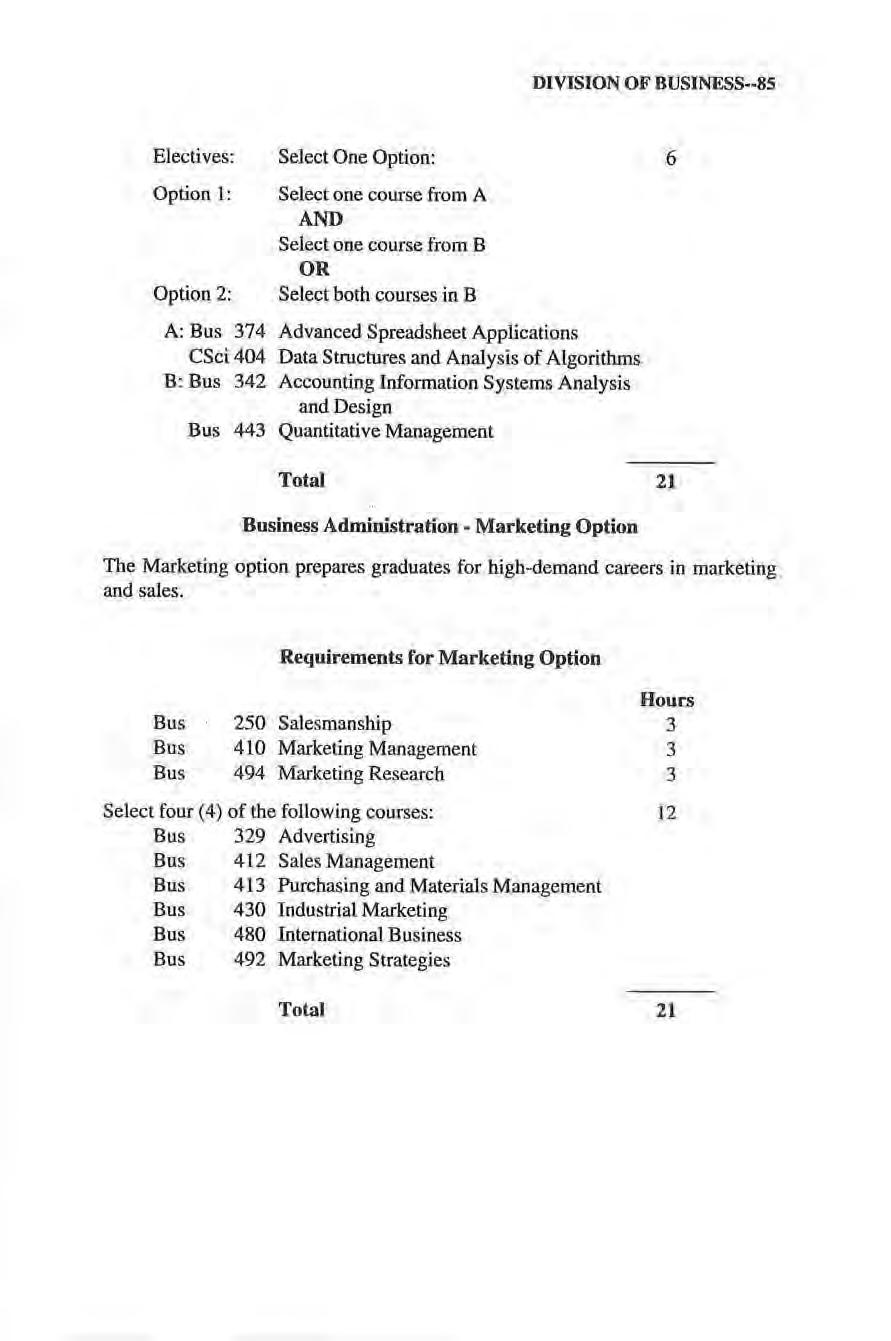
DIVISION OF BUSJNESS--85 Electives: Option 1: Option 2: Select One Option: Select one course from A AND Select one course from B OR Select both courses in B A: Bus 374 Advanced Spreadsheet Applications CSci 404 Data Structures and Analysis of Algorithms B: Bus 342 Accounting Information Systems Analysis and Design Bus 443 Quantitative Management Total Business Administration - Marketing Option 6 21 The Marketing option prepares graduates for high-demand careers in marketing and sales. Bus Bus Bus Requirements for Marketing Option 250 Salesmanship 410 Marketing Managem ent 494 Marketing Research Select four ( 4) of the following courses: Bus 329 Advertising Bus 412 Sales Management Bus 413 Purchasing and Materials Management Bus 4 3 0 Industrial Marketing Bus 480 International Business Bus 492 Marketing Strategies Total Hours 3 3 3 12 21
TECHNOLOGY
The Bachelor of Technology degree requires a technical associate degree or equivalent. All majors should complete the technology core before the option. T echnology majors are not required to take the business core.
TECHNOLOGY CORE
231 Princip l es of Financial Accounting or 233 Financial Management and Bus/Mgmt 30 I Organizational Communications
Bus Mgmt
Bus/Mgmt 328 Principles of Marketing/Marketing Strategies
Bus/Mgmt 373 Organizational Behavior/ O rganizational Management
Bus/Mgmt 496 Organizational Policy (Senior Competency Course)

DISTRIBUTION MANAGEMENT SUPERVISION OPT ION OPT ION OPTION
86--DIVISION OF BUSINESS
The Distribution option prepares graduates for a variety of marketing careers in tbe technical areas.
The Management option is designed to meet the needs of Air Force personnel. Civilians may also elect the Management option and attend the Offutt program. Some restrictions apply. CaJl l -402-293-1764 for more information.
Select twelve (12) hours from the following:

DMSION OF BUSINESS--87 Distribution Option
Bus Bus Bus Bus Bus Requirements for Distribution Option 229 Software Applications 250 Salesmanship 410 Marketing Management 413 Purchasing and Materials Management 430 Industrial Marketing Total Management Option Hours 3 3 3 3 3 15
Requirements for Management Option Mgmt 335 Production/Operations Management or Mgmt 443 QuantitativeManagement and
Mgmt Mgmt Mgmt Mgmt Mgmt Mgmt Mgmt M gmt Mgmt
220 Economic Concepts l 221 Economic Concepts II 234 Accounting Managemen t 25 1 Legal Concepts 380 Human Resources Management 41 0 Marketing Management 412 Sales Management 430 Small Business Manage ment 497 Directed Study in Management (1 -4 h ours) Hours 3 12
(Two must be an upper-division course)
Mgmt 498 Specia l Topics in Management (One hour each)
( Maximum of three ( 3) hours allowed)
T opics are:
Stress/Time Management
Effective Public Relations
Equal Opportunity Regulations
Effective Personnel Relations
OSHA Regulations
Benefit Programs
Entrepreneurshrp
Practical Management Techniques (TQM)
Mgmt 499 Independent Study in Management (1-3 hours)

Total 15
Supervision Option
The Supervision option prepares graduates for entry-level management careers in the technical area. The equivalent coursework offered at Offutt AFB has a MGMT prefix.
88--DMSION OF BUSINESS
Requirements for Supervision Option Hours Bus 229 Software Applications 3 Bus 251 Legal Environment and Comract Law 3 Bus 353 Organizational Ethics 3 Bus 380 Human Reso urces Management 3 Bus 414 Supervisory Problems 3 TotaJ 15
DIVISION OF EDUCATION AND PSYCHOLOGY
Chair: Dr. David Ainsworth
Professors: Ainsworth, Citrin, Fen-e
Associate P.rofessors: Cox, Lundak
Assistant Professors: Art.baud, D. Dunnigan. J. Dunnigan, Fritz, R empp
Instructors: Gabriel, Gibbs
TEACHER EDUCATION
The Division of Education and Psychology provides teacher preparation programs in accordance with the Nebras ka Department of Education. The Nebraska Department of Education requires that individuals seeking teach er certification be qualified for e ndorseme nt in one field or one s ubject. Subjects and fields are defined as follows:
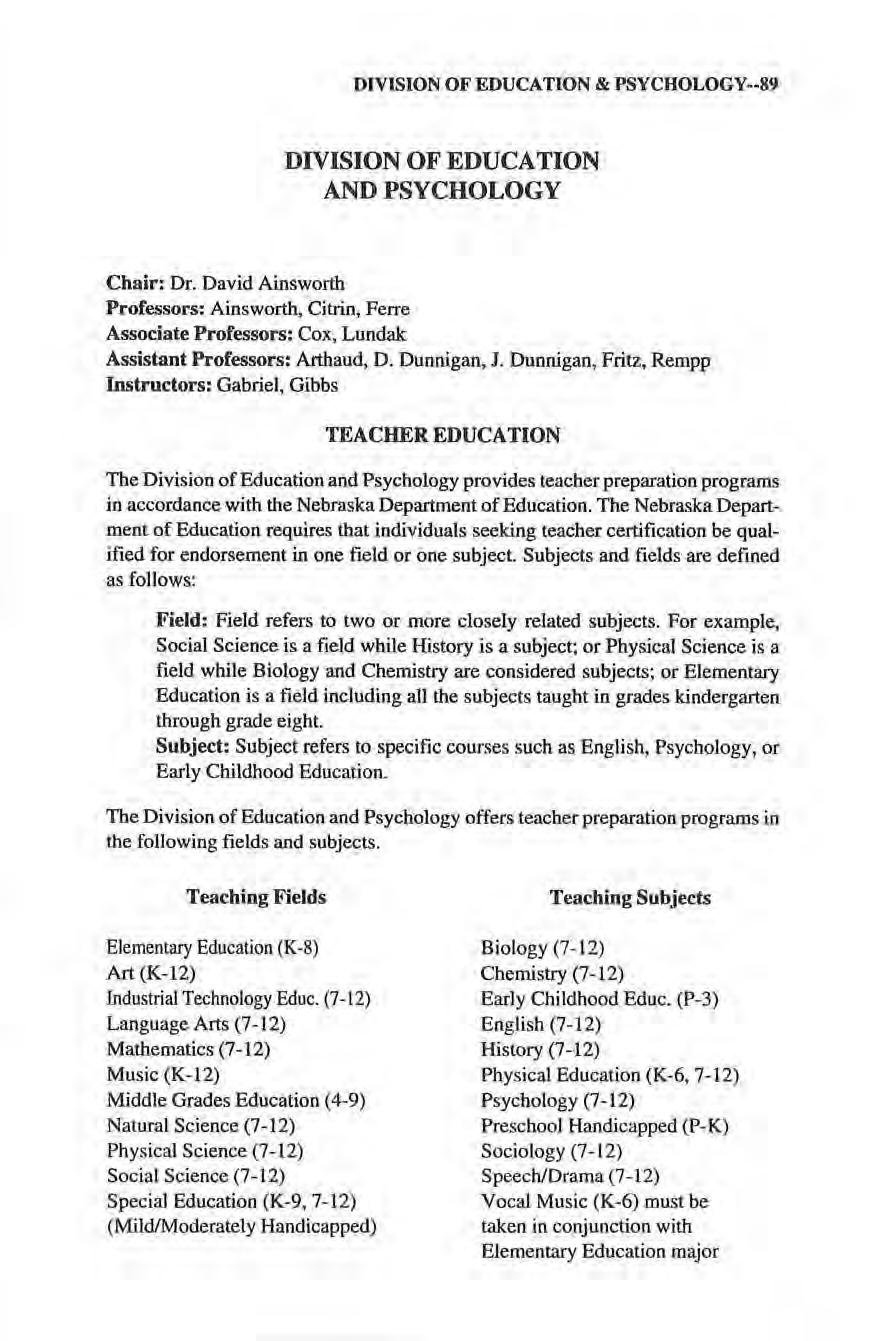
Field: Field refers to two or more closely related s ubjects. For example, Social Science is a field while History is a subject; or Physical Science is a field while Biology and Chemistry are considered s ubj ects; or Elementary Education is a field including all the subjects taught in grades kindergarten through grade eight.
Subject: Subject refers to specific courses such as English , Psychology, or Early Childhood Education.
The Division of Education and Psychology offers teacher preparation programs in the following fields and subjects.
Teaching Fields
Elementary Education (K-8)
Art (K-12)
Industrial Technology Educ. (7-12)
Language Arts (7 - 12)
Mathematics (7- 12)
Music (K- 12)
Middle Grades Education ( 4-9)
Natural Science (7 -12)
Physical Science (7- l 2)
Social Scie nce (7-12)
Special Education (K-9, 7- 12)
(Mild/Moderately Handicapped)
Teaching Sub.iects
Biology (7 - 12)
Chemistry (7-12)
Early Childhood Educ. (P-3)
English (7 - 12)
History (7-12)
Physical Education (K-6, 7-12)
Psychology (7-12)
Pre school Handicapped (P-K)
Soc iology (7-12)
Speech/ Drama (7- 12)
Vocal Music (K-6) must be taken in conjunction wi th
Elementary Education major
DIVISION OF EDUCATION & PSYCHOLOGY--89
Addjtional suppl emental teaching endorsements in Computer Science, Coaching and Driver's Education are available with any of the above areas.
For complete information regarding teacher ed ucation requirements and teacher certification, contact the Certification Officer, Division of Education at Peru State College, or the Director of Teacher Certification, State Department of Education, Lincoln, Nebraska 68509.
Offutt Air Force Base Extension Program
The Offutt AFB Extensio n Program offers non-traditional, accelerated teacher preparation programs with priority enrollment to active and retired military, Offutt AFB employees, their dependents, and as space is available, civilians. These programs include the Elementary Education field endorsement and selected general studies classes and the Secondary Education curriculum. These programs will meet the initial Nebraska teacher certification requirements. The content courses required for secondary endorsement are not offered by the Offutt program. Admission, degree and co urse requirements are the same as on-campus. Infonnation regarding the Offutt Extension Program is available by contacting the Peru State College Exten sion Office, Base Education, 55 MSS/MSE, Offutt AFB, NE 68113 (402) 293-1764.
Admission to Teacher Education
Admission to Peru State College does not automatically permit admission to teacher education. Students planning to enter teacher education are required to file a formal application w ith the Teacher Education Committee.
Application fo r admission to teacher education will nonnaUy be made during the sophomore year in conjunction with enrollment in Ed 208: Orientation & Practicum. Students who transfer credit which includes this course wi ll be required to make application during their first semester on campus. Non-degree students seeking endorsements only roust apply immediately.
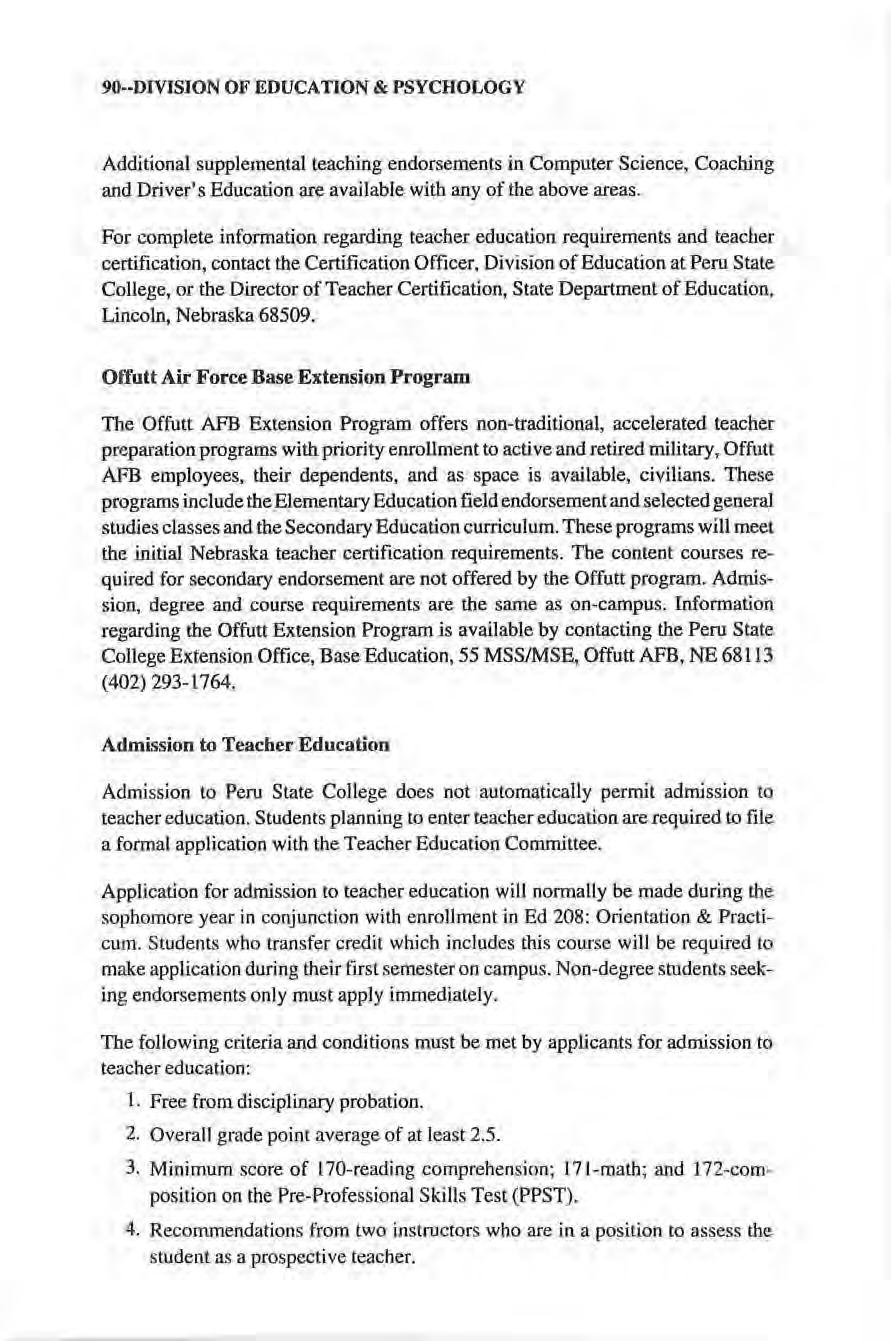
The following criteria and conditions must be met by applicants for admission to teacher education:
I. Free from disciplinary probation.
2. Overall grade point average of at leas t 2 .5.
3. Minimum score of 170-reading comprehension; 171-rnath; and 172-composition on the Pre-Professional Skills Test (PPST).
4. Recommendations from two instructors who are in a position to assess the s tude nt as a prospective teacher.
90--DlVISION OF EDUCATION & PSYCHOLOGY
5. Evidence of proficiency in English and Mathematics as indicated by a grade of C or above in college level courses or scores a t or above the fiftieth percentile on the English and Mathematics sections of the ACT.
6. The Nebraska State Department of Education's Rule 20 requires that the following regulation and appeal process be in effect:
Nebraska Felony and Misdemeanor Policy
All teacher education institutions shall require the prospective student teacher to affinn under oath that he or she has no felony convictions, nor misdemeanor conv ictions involving abuse, neglect. or injury to any person, or any other convictions involving moral turpitude
A person with a conviction as indicated in the rule shall not be allowed to participate in pre-student teaching field, laboratory, and classroom expeliences or student teach without approval by the Board.
To meet thi s requirement, all students s hall complete an oath prior to participation in pre- s tudent teaching field, laboratory, and classroom experiences or student teaching.
In compUance with this rule the following Peru State College policy is in effect:
NO STUDENT WILL BE ALLOWED TO PARTICIPATE IN PRE-STUDENT TEACHING FIELD, LABORATORY, AND CLASSROOM EXPERIENCES OR STUDENT TEACH UNTIL A NOTARIZED OATH AS DESCRIBED IN THE TEACHER EDUCATION HANDBOOK HAS BEEN PRESENTED TO THE DIRECTOR OF FIELD EXPERIENCES.
No student will be admitted to teacher education until all of the above criteria h ave been met.
After cons ide ration by the Teacher Education Committee, the applicant will be approved or di sapproved for admission to teacher education. Approved applicants and their advisors will be notified by letter from the Teacher Education Committee. Applicants not approved for admission to teacher education and their advisors will be notified of the reasons for disapproval by the Teacber Education Committee. Applicants may request a review of the application and/or a hearing before the Teacher Education Committee.

Admission to Student Teaching
Candidates who wish to student teach mus t s ubmit an application for student teaching two semesters prior to the student teaching term. To b e eligible to enter s tudent teaching, students must meet the following requirements:
DIVISION OF EDUCATION & PSYCHOLOGY·-91
1. They must have received official notification of their acceptance into teacher education.
2 They must have an overall GPA of at least 2.5
3. They must have earned enough credits to graduate within one semester following student teaching.
4. They must have completed a minimum of 12 hours of credit at Peru State College.
5. They must have provided the appropriate statement concerning conviction of a felony or misdemeanor as described in the Teacher Education Handbook.
TEACHER EDUCATION MAJOR
The Division of Education offers the B.S. with a major in Education. The B.S. prepares a student to teach in Elementary or Secondary Schools. Options are avail able i n Elementary Education, Secondary Education, K-12 Art and Music Education, Early Childhood Education, Middle G rades Education, Special Education: E l ementary, Special Education: Secondary, and Preschool Handicapped Education.
In addition to the requirements listed below all teacher education students must take Psych 255: Human Relations.
Professional Education Sequence
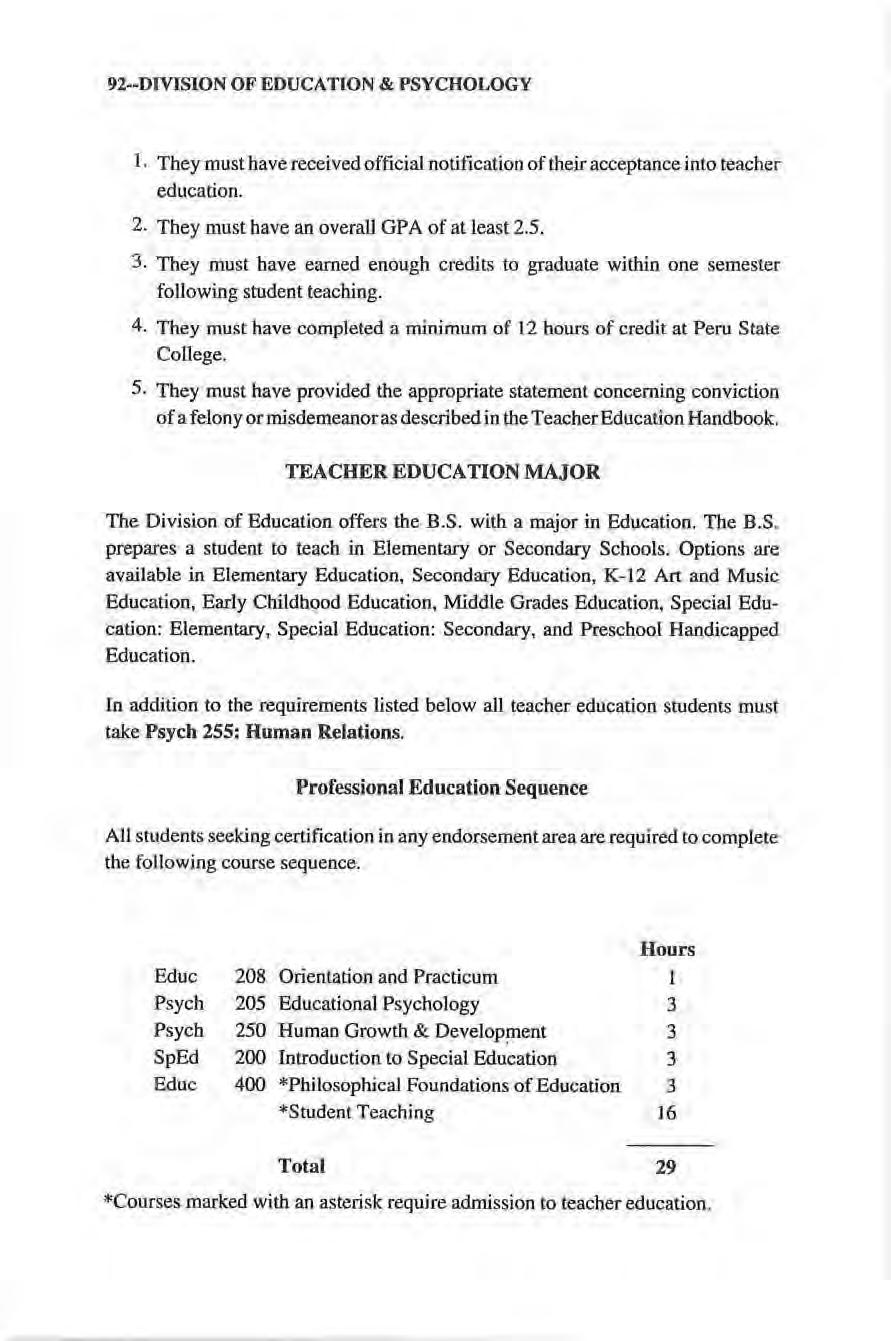
All students seeking certification in any endorsement area are required to complete the following course sequence.
*Courses marked with an asterisk require admission to teacher education
92--DMSION OF EDUCATlON & PSYCHOLOGY
Educ Psych Psych SpEd Educ 208 Orientation and Practicum 205 Educational Psychology 250 Human Growth & Develop~ent 200 Introduction to Special Education 400 *Philosophical Foundations of Education *Student Teaching Total Hours 3 3 3 3 16 29
All students seeking endorsement in elementary education (grades K - 8) must comp lete the following course sequence in elementary education.
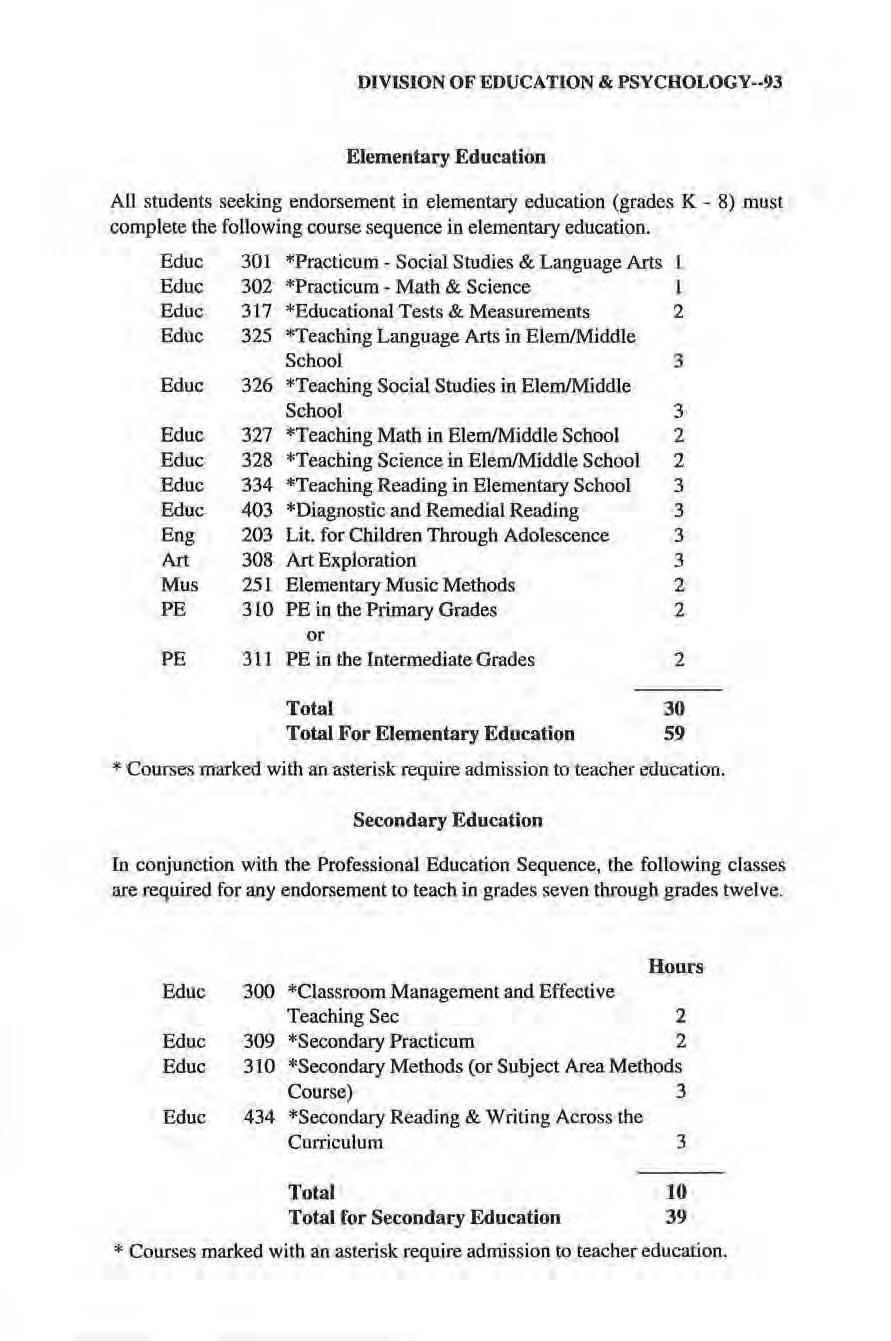
* Cour~es marked with an asterisk require admission to teacher education.
Secondary Education
In conjunction with the Professional Education Sequence, the following cla~ses are required for any endorsement to teach in grades seven through grades twelve.
DlVlSION OF EDUCATION & PSYCHOLOGY--93 Elementary Education
Educ 301 *Practicum - Social Studies & Language Arts l Educ 302 *Practicum - Math & Science 1 Educ 317 *Educational Tests & Measurements 2 Educ 325 *Teaching Language Arts in E1em!Middle School 3 Educ 326 *Teaching Social Studies in Elem/Middle School 3 Educ 327 *Teaching Math in Elem/Middle School 2 Educ 328 *Teachi ng Science in Elem/Middle School 2 Educ 334 *Teaching Reading in Elementary School 3 Edu c 403 *Diagnostic and Remedial Reading 3 Eng 203 Lit. for Children Through Adolescence 3 Art 308 Art Exploration 3 Mus 251 Elementary Music Methods 2 PE 310 PE in the Primary Grades 2 or PE 311 PE in the Intermediate Grades 2 Total 30 Total For Elementary Education 59
Hours Educ 300 *Classroo m Management and Effective Teaching Sec 2 Educ 309 *Secondary Practicum 2 Educ 310 *Secondary Methods (or Subject Area Methods Course) 3 Educ 434 *Secondary Reading & Writing Across the Curric ulum 3 Total Total for Secondary Education 10 39
Courses marked with an asterisk require admission to teacher education.
*
K-12 Art and Music Education
Peru State College offers programs to prepare individuals to teach from kindergarten through the twelfth grade in tbe areas of Art and Music. Students working toward K-12 certification must meet the same requirements and follow the same professional teach.er education programs as Secondary Education candidates with the exception of practicum and student teaching, which must include experiences with both elementary and secondary students.
Early Childhood Education
This program will endo rse an individ ual to teach Early Childhood grades Prekindergruten through 3.
* Courses marked with an asterisk require admission to teacher education.
Middle Grades Education
This program will endorse an individual to teach: (A) any or all students in a selfcontained classroom in grades four (4) through nine (9), (B) the areas of special preparation in an integrated team planning/teaching organizational pattern in grades four (4) through nine (9), or (C) tbe areas of special preparation in classrooms with other organizational patterns in grades four (4) through nine (9)

94--DIVISION OF
EDUCATION & PSYCHOLOGY
Hours Educ 301 *Practicum - Soc ial Studies and Language Arts I Educ 302 *Practicum - Math and Science I Educ 305 Principles of Early Childhood Education 3 Educ 308 *Early Childhood Practicum 2 Educ 325 *Teaching Lang Arts in Elem/Middle School 3 Educ 326 *Teaching Social Studies in Elem/Middle School 3 Educ 327 *Teaching Math in Elem/Middle School 2 Educ 328 *Teaching Sci ence in Elero/MiddJe School 2 Educ 334 * Teaching Reading in Elementary School 3 Educ 401 *Language Development and Reading Readiness 2 Educ 402 *Methods in Early Childhood Education 3 Educ 403 *Diagnostic and Remedial Reading 3 Psych 438 Approaches to Parent/Family Counseli ng 3 one additional course selected from: Art 308 Art Exploration 3 Mus 251 Elementary Music Methods 2 Total 33-34
Additional Requirements
Special Area Requirements: This endorsement shall assure th e applicant has special knowledge in three areas. The applicant must have 18 distinct semester hours in each of two Special Areas and 12 distinct semester hours in one other Special Area, of which no more than two of the Special Areas may be chosen from any one of the four Broad Fields li sted below:

Fine and Practical Arts
Humanities Sciences
Social Sciences
T he course of study in the broad fields will be developed for each student
DIVISION OF EDUCATION & PSYCHOLOGY--95 Hours Educ 301 *Practicum - Social Studies and Language Arts l Educ 302 *Practicum - Math and Science l Educ 325 *Teaching Language Arts in Elementary/ Middle School 3 Educ 326 *Teaching Social Science in Elementary/ Middle School 3 Educ 327 *Teaching Math in E lementary/Middle School 2 Educ 334 *Teaching Reading in E lementary School 3 or Educ 434 *Teaching Reading and Writing Across the Curriculum 3 Educ 403 *Diagnostic and Remedial Reading 3 Educ 425 *Teaching in the Middle Grades 3 one additi onal course selected from: Art 308 Art Exploration 3 M us 251 Elementary Music Methods 2 Total 23-24
* Courses marked with an asterisk require admission to teacher education.
96--DJVrSION OF EDUCATION & PSYCHOLOGY
grades K through 9.

* Courses marked wi th an asterisk require admission to teacher education.
Special Education: Secondary
Th is program will endorse an individual to teach Special Education (Mild/Moderate Handicapped) grades 7 through 12.
Special Education: Elementary This
Handicapped)
Hours Educ 301 *Practicum - Social Studies and Language Arts 1 Educ 302 *Practicu m - Math and Science J E d uc 325 *Teaching Language Arts in the Elem/ Middle Sch oo l 3 Educ 326 *Teaching Social Studies in the Elem/ Middle School 3 Educ 327 *Teaching Math in the Elem/Middle School 2 Educ 328 *Teaching Science in the Elem/Middle School 2 Educ 334 *Teaching Reading i n the E lementary School 3 Educ 403 *Diagnostic and Remedial Readi ng 3 SpEd 285 Education of the Leaming Disabled 2 SpEd 290 Education of Mentally Handicapped Learners 2 SpEd 300 *Assessment i n Special Education 3 SpEd 307 *Practicum in Spe-cial Education 2 SpEd 430 *Methods of Special Education Program Management 3 SpEd 460 *Career & Vocational Education for Handicapped 2 SpEd 465 Education of Emotionally Impaired Learners 2 Ps ych 438 Approaches to Parent and Family Counseling 3 Psych 440 Behavior Management & Modification 3 Total 40
program will endorse an individual to teach Elementary Special Education (Mild/Moder ate
Educ Educ Psych Psych SpEd SpEd 375 405 438 440 200 285 Education of Gifted Learners *Diagnostic & Remedial Math Hours 3 Approaches to Parent & Family Counseling Behavior Management & Modification Introduction to Special Education Education of Learning Disabled 2 3 3 3 2
* Courses marked with an asterisk require admission to teacher education.
* Courses marked with an asterisk require admission to teacher education.
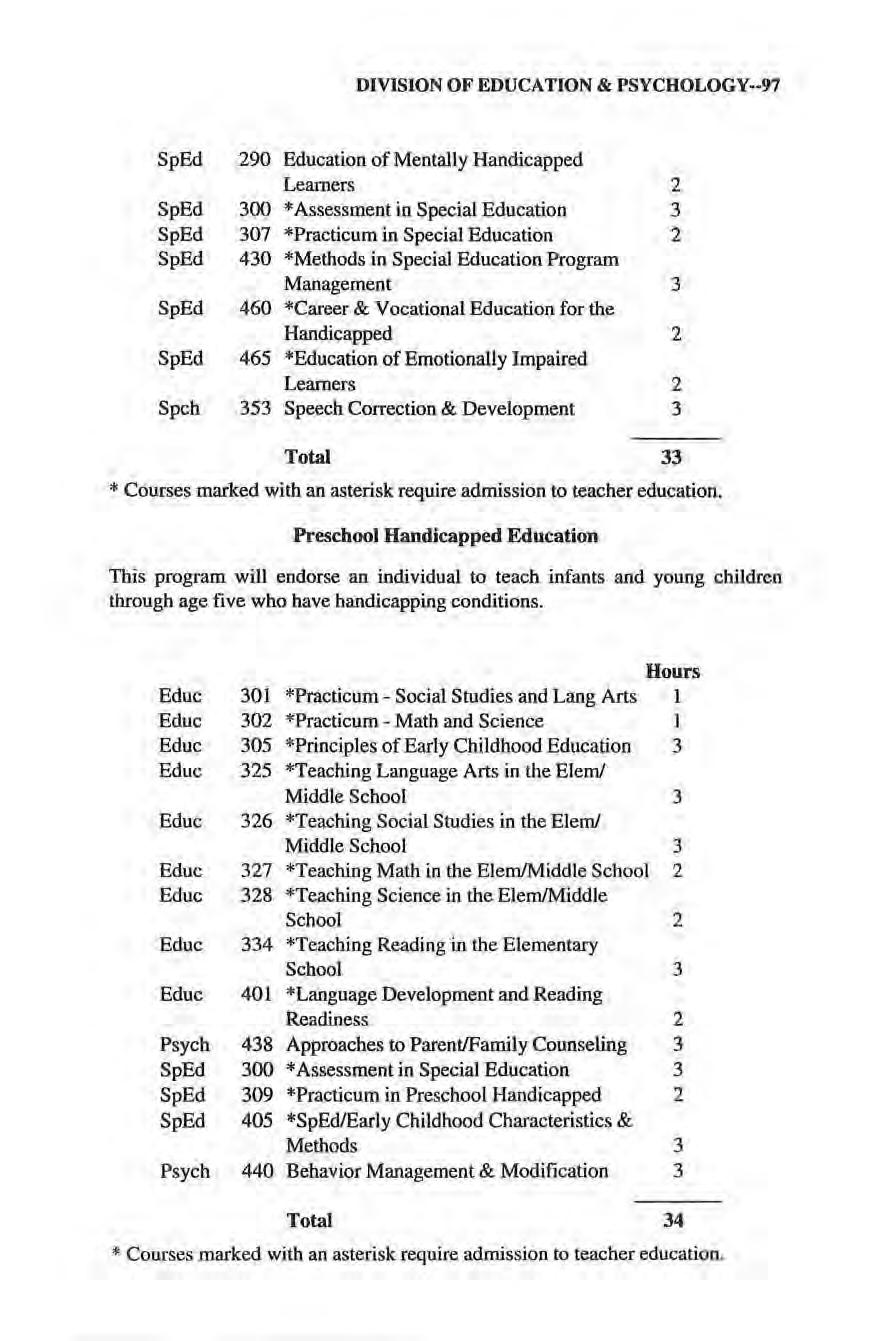
DIVISION OF EDUCATION & PSYCBOLOGY--97 SpEd 290 Education of Mentally Handicapped Leamers 2 SpEd 300 *Assessment in Special Edu cation 3 SpEd 307 *Practicum in Special Education 2 SpEd 430 *Methods in Special Education Program Management 3 SpEd 460 *Career & Vocational Education for the Handicapped 2 SpEd 465 *Education of Emotionally Impaired Learners 2 Speh 353 Speech Correction & Development 3 Total 33
Preschool Handicapped Education
Hou.rs E duc 301 *Practicum - Social Studies and Lang Arts 1 Educ 302 *Practicum - Math and Science l Educ 305 *Principles of Early Childhood Education 3 Educ 325 *Teaching Language Arts in the E l em/ Middle School 3 Educ 326 *Teaching Socia l Studies in the Elem/ Middle School 3 Educ 327 *Teaching Math in the Elem/Middle School 2 Educ 328 *Teaching Science in the Elem/M1ddle School 2 Educ 334 *Teaching Reading in the Elementary School 3 Educ 401 *Language Development and Reading Readiness 2 Psych 438 Approaches to Parent/Family Counseling 3 SpEd 300 *Assessment in Special Education 3 SpEd 309 *Practicum in Preschool Handicapped 2 SpEd 405 *SpEd/Early Childhood Characteristics & Methods 3 Psych 440 Behavior Management & Modification 3 Total 34
Tots program will endorse an individual to teach infants a nd young children through age five who have handicapping condi tions.
Thi s program will endorse an individual to teach Psychology in Grades 7- 12
The Divi sion of Education offers programs for individuals wishin g to maj o r in Physical Education which will e na bl e graduate s to b ecome certified as Physical Education teachers in the public sc hools or to become qualified fo r caree rs in Sports Management a nd to e nabl e students to meet the requirements fo r certification as coaches. (No n-teaching PE majors must choose the Sport M anagement option.)
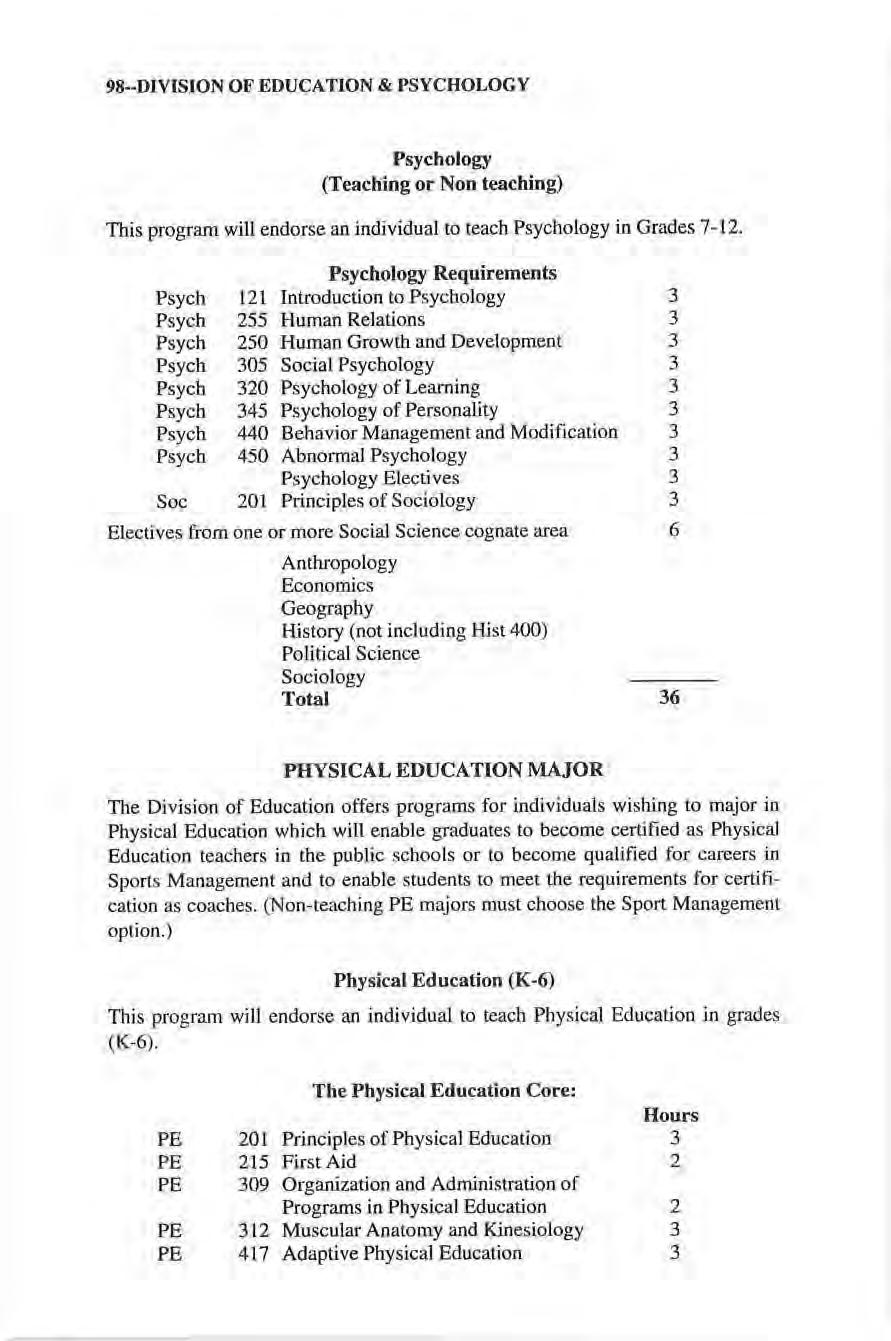
Physical Education (K-6)
This program will endorse an individual to teach Physical Education in grades (K-6).
98--DIVISJON OF EDUCATION & PSYCHOLOGY Psychology (Teaching or Non teaching)
Ps yc h Psych Psych P sych Psych P sych Psych P syc h Soc Psychology Requirements 12 l Introduction to P sycho logy 255 Human Rela tion s 250 Huma n G rowth and Development 305 Social Psychology 320 P sychology of Learning 345 P sycho logy of Personality 440 Behavior Management and Modification 450 Abnormal Psychology P sych o logy Electives 20 1 Prin cipl es of Sociology Elec tives from one or more Soc ial Science cognate area Anthropology Economics Geogra phy History (not including Hi st 400) Po liti cal Science Sociology Total PHYSICAL EDUCATION MAJOR 3 3 3 3 3 3 3 3 3 3 6 36
The Physical Education Core: Hours PE 201 Principles o f Phys ical Education 3 PE 2 15 First A id 2 PE 309 Org anization and Administratio n of Progra ms in Physical Education 2 PE 3 12 Muscular Anatomy and Kinesiology 3 PE 4 17 Ada pt ive Physical Education 3
Th is program will endorse an individual to teach Physic al Education in grades (7-12).
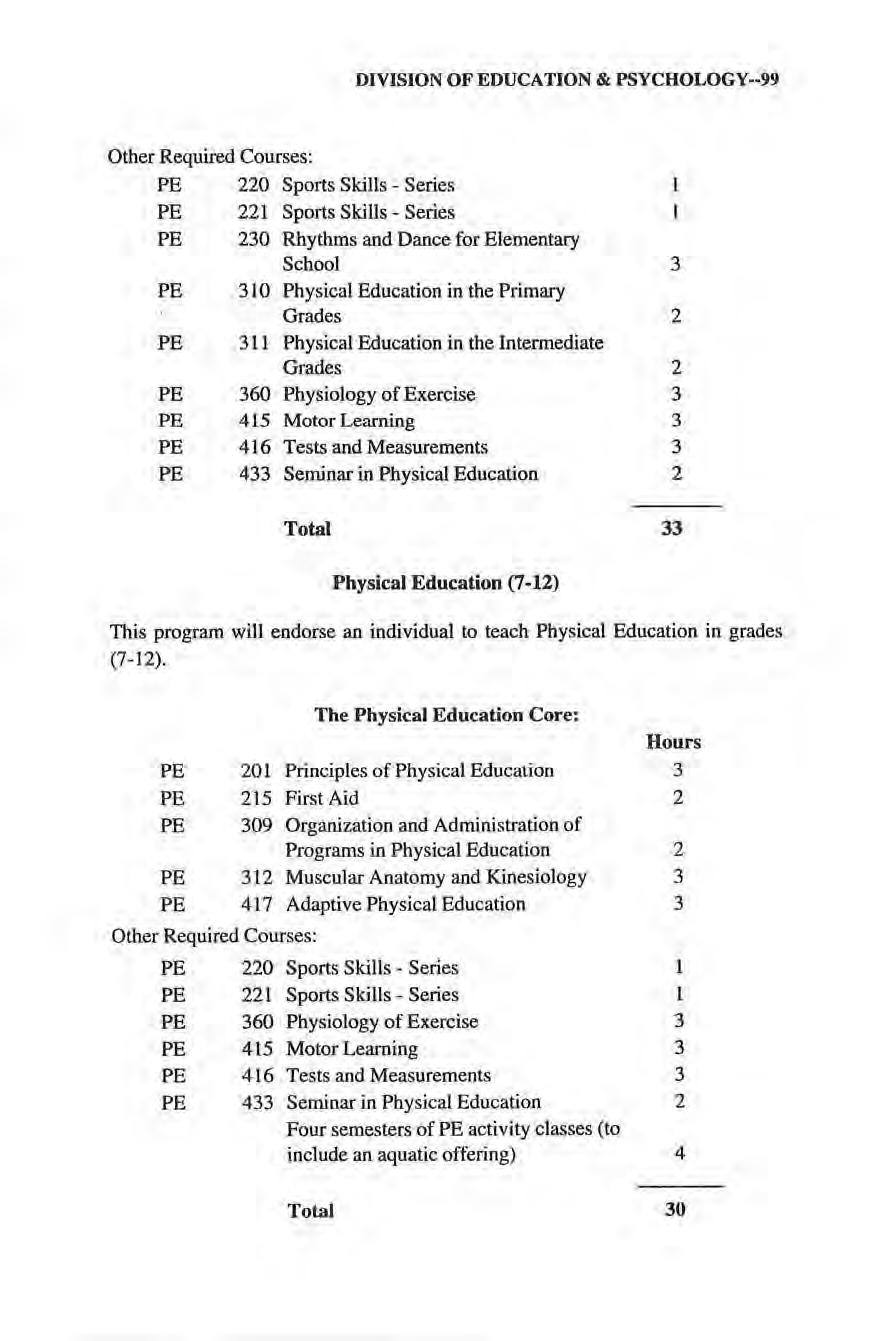
DIVISION OF EDUCATION & PSYCHOLOGY--99 Other Required Courses: PE 220 Sports Skills - Series PE 221 Sports Skills - Series PE 230 Rhythms and Dance for Elementary School 3 PE PE PE PE PE PE 3 10 Physical Education in the Primary Grades 311 Physical Education in the Intermediate Grades 360 Physiology of Exercise 415 Motor Leaming 416 Tests and Measurements 433 Seminar in Phys ical Education Total Physical Education (7-12) 2 2 3 3 3 2 33
PE 201 Principle s of Phys ical Education PE 215 First Aid PE 309 Organization and Administration of Programs in Physical Education PE 3 1 2 Musc ular Anatomy and Kinesiology PE 417 Adaptive Physical Education Other Required Courses: PE 220 Sports Skills - Series PE 22 l Sports Skills - Series PE 360 Physiology of Exerc ise PE 415 Mo tor Learn ing PE 416 Tests and Measurements PE 433 Seminar in Physical Education Four semesters of PE activi ty classes (to include an aquatic offering) TotaJ Hours 3 2 2 3 3 3 3 3 2 4 30
The Physical Education Core:
100--DIVISlON OF EDUCATION & PSYCHOLOGY

Physical Education (K-6/7-12)
This program will endorse an individual to teach Physica l Education in grades (K-617- 12).
Note: The K-6 s ubject endorsement requires the middle level methods and practicum. The 7-12 subject endorsement requires the secondary level methods and practicum and the K-6/7-12 subject endorsement may take either or both.
Athletic Coaching
The following program will meet the needs of the high school coach. Students com plet ing this program are required to have a major in Physical Education. PE 300 Pre vention & Care of Sports Injuries
Nine (9) hours selected from the following:
PE PE PE PE PE The Physical Education Core: 201 Principles of Physical Education 215 First Aid 309 Organization and Administration of Programs in Physical Education 312 Muscular Anatomy and Kinesiology 417 Adaptive Physical Education Other Required Courses: 3 2 2 3 3 PE 220 Sports Skills - Series I PE 221 Sports Skills - Series 1 PE 230 Rhythms and Dance for Elementary School 3 PE 300 Prevention and Care of Sports Injuries 3 PE 310 Physical Education in the Primary Grades 2 PE 311 Physical Education in theJnterrnecliate Grades 2 PE 360 Physiology of Exercise 3 PE 415 Motor Learning 3 PE 416 Tests and Measurements 3 PE 433 Seminar in Physical Education 2 Four semesters of PE activity classes (to include an aquatic offering) 4 Total 40
PE
Theory of Football and Wrestling PE 209 Theory of B asketball and Baseba ll Hours 3 PE 210 Theory of Track & Field and Cross Country 3 3 3 3 3 PE 211 Theory of Womens Basketball & Softball PE 212 Theory of Volleyball and Soccer Total 12
208
Athletic Coaching E ndorsement for Non-Physical Education Majors
The fo lJ owing program is provided for those stude nts i nterested in coaching interscholastic sports but who do not have a major in Physical Education. It w ill meet the needs of the high sch ool coach. Students comple ti ng this program are required to have a major in an area other than Physical Education.

DIVlSION OF EDUCATION & PSYCHOLOGY--1 01
PE PE PE 300 Prevention and Care of S po rts Injuries 360 Physiology of Exercise 4 15 Motor Leaming One (1) other offering from the Theory of Coaching seties: Hours 3 3 3 PE 208 Theory of Football and Wrestling 3 PE 2 09 Theory of Basketball and Baseball 3 PE 2 10 Theory of Track and Fiel d and Cross Country 3 PE 2 11 Theory of Women's Basketball and Softball 3 PE 2 12 Theory ofVoJleyball and Soccer 3 Total 12 Physical Education Sport Management The Sport Management option will allow the graduate to pursue a career in the sports industry. Required Courses in B usiness: BUS 137 P rinciples of Management 3 BUS 231 Prin ciples of Financial Accounting 3 BUS 251 Legal Environm ent and Contract L aw 3 BUS 301 Organizational Comun.i cations 3 The studen t shall a lso select nine (9) additi o nal hours with an emphasis in one of the Bus in ess options: Management, Marketing, Accountin g, or Management In forma tion Systems. 9 Required Courses in Physical Educati on: The Phys ical Education Core: P E 201 Principles of Physical Education 3 P E 2 15 First Aid 2 PE 309 Organization and Administration of Programs in Physical Education 2 P E 3 12 Muscular Anatomy and Kinesiology 3 PE 4 17 Adaptive Physical Education 3
Note: Sport Management students will be advised to take the Business Option in General Education computing.

102--DIVISION OF EDUCATION &
Additi onal Requirements: PE 300 Prevention and Care of Sports Injuries 3 PE 360 Physiology of Exerc ise 3 PE 4 l 5 Motor Learning 3 PE 416 Tests and Measurements 3 PE 433 Seminar in Physica l Education 2 PSY 310 Psychology of Sports and Physical Activities 3 Educ 441 Cooperative Education loternsb.ip 5 Total 56
PSYCHOLOGY
DIVISION OF HUMANITIES

Chair: Dr. David Edris
Professors: Anderson, Davis, Ediger, Edris, Harper, Holtz
Associate Professors: Clemente, McCrann
Assistant Professors: Asmussen, Ciesielski, Crook, Jones, Mokris
Instructors: Emerson, Fryer
The Division of Humanities offers majors in Art, English, Music, PsychologySociology, Social Science, and Speech and Drama. A curriculum has been developed for each of these areas designed to meet specific degree requirements and provide preparation for careers in teaching and non-teaching professions. The English Major provides options for either English or the broader area of Language Arts. The Social Science Major provides options for History, and the broader area of Social Sciences. The Psychology-Sociology major provides options for Psyc hology, Sociology, Psychology/Sociology combined, and a Criminal Justice opti o n. Majors in the visual and performing arts areas provide various teaching and non-te ac hing options in Art, Music, and Speech and Drama.
ART MAJOR
DIVISION OF HUMANITIES--103
Art Major (K-12 Field Endorsement or Non-Teaching) Hours Art lOl Drawing I 3 102 Drawing II 3 203 2-D Design 3 204 3-D De sign 3 206 Art Appreciation 3 210 Watercolor 3 221 Printing Processes 3 300 Pottery 3 *308 Art Exploration 3 310 Sculpture 3 3 11 Painting 3 317 Art History I 3 318 Art History II 3 325 Figure Drawing 3 **400 Senior Exhibition 0 IT 226 Photography 3
Art electives (select 11 hours from the following)
addition to required 3 hours) 310
required 3 hours)
498
*Students taking a non teaching option in Art may substitute any art elective for Art 305 and Art 308
** Art 400 Senior Exhibition produces no credit hours but is a graduation requirement for ALL Art Majors.
ENGLISH MAJOR English

104--DIVlSION
OF HUMANITIES
Art 300 Pottery
Sculpture (in
Pai nting (in
to
(in
addition to required 3 hours) 311
addition
Special Topics in Art (1
Total 56
to 4 hours)
Language
English Core Requirements: Eng 101 English Composition 201 Advanced English Composition 222 World Literature to 1500 30 l Traditional Grammar 440 History of the English Language Additional English Requirements: Eng 225 Short Story 305 Practicum in Composition 309 Creative Writing 324 American Literature I 325 American Literature II 418 Shakespeare Speh 232 Introduction to Theatre 254 Public Speaking 355 Pl ay Production in tlie Secondary School 357 Interpretative Reading Jour 100 Introduction to Mass Communications 234 Beginning Journalism 235 News Editing 40 I Journalism Practicum Edu c 434 Secondary Reading and Writing Across the Curriculum Hours 3 3 3 3 3 3 3 3 3 3 3 3 3 3 3 3 3 2 I 3
Arts Option (7-12 Field Endorsement)
Select nine (9) hours from the following with at least one course from the British Literature and Modern Liter ature se lections.
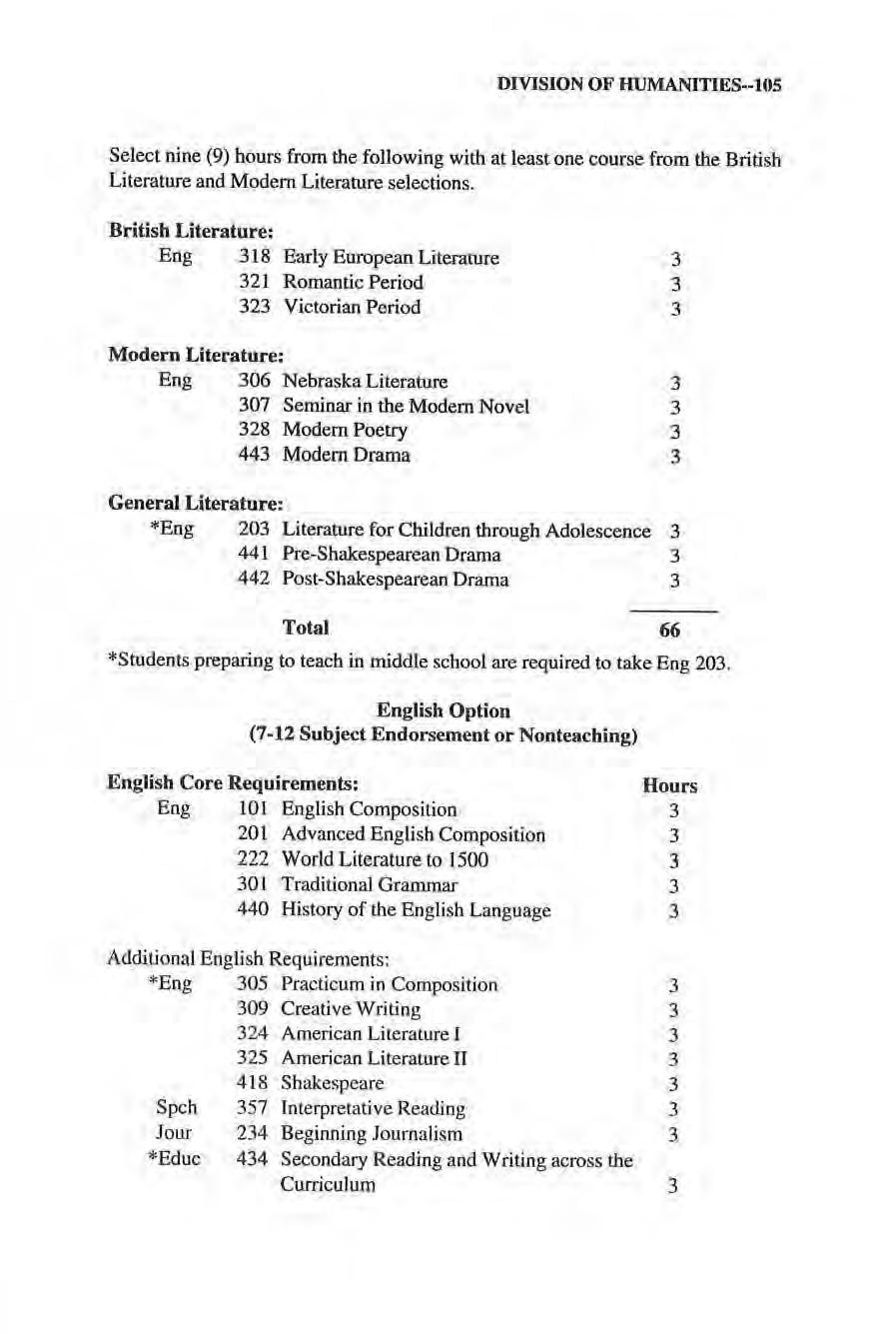
DIVlSION OF HUMANITIES--105
British Literature: Eng 3 18 Early European Literature 321 Romantic Period 323 V icto ri an P eriod Modern Literatll.{'e: E n g 306 Nebraska Literature 307 Seminar in the Modem Nove l 328 Modem Poetry 443 Modem Drama General Literature: 3 3 3 3 3 3 3 *Eng 203 Literature for C hildren through Adol escence 3 441 Pre-Shakespearea n Drama 3 442 Pos t -Shakes pearean Dram.a 3 Total 66
Englis h Option (7-lZ Subject E ndorsemen t or Nonteaching) English Core Requirements: Eng 101 English Composition 201 Advanced Eng li sh Composit ion 222 World Lite rature to I500 301 Traditional Grammar 440 History of the English Language A dditional English Requirements: *E ng 305 Practicum in Composition 309 Creative Writing Speh Jour *Educ 324 American Lite rature I 325 American Literature IT 4 I 8 Shakespeare 357 In terpretative Reacting 234 B eginning Journalism 434 Secondary Reading and Writing across the Curriculum Hours 3 3 3 3 3 3 3 3 3 3 3 3 3
*Students preparing to teach in middle school are required to take Eng 203.
Select rune (9) h ours from the following with at least on e course each from the British Literature and Modern Li terature selections.
*Students talcing a noo teaching option i n English may substitute for Eng 305 and Ed 434 any course fro m t h e English e lectives.
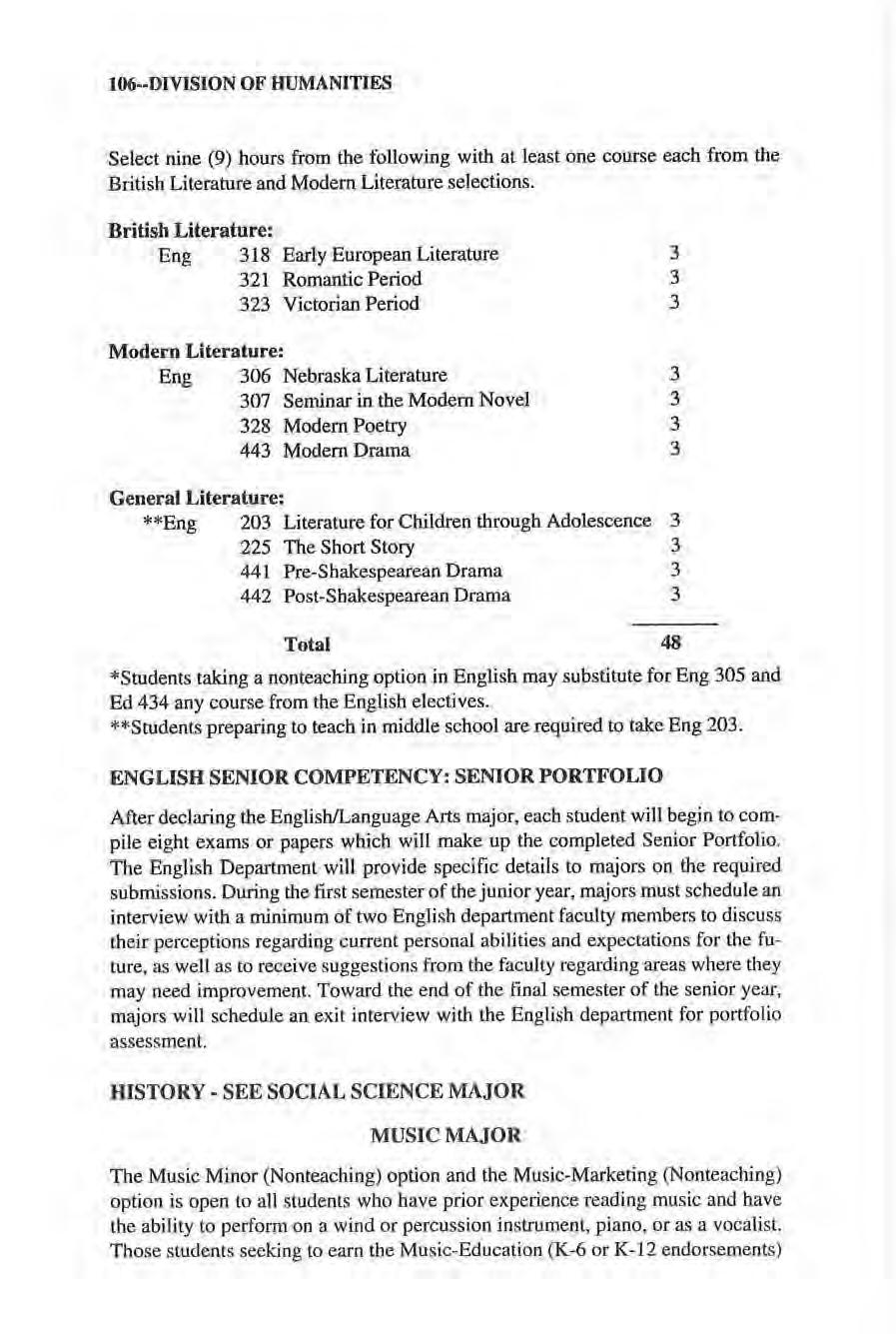
**Students preparing to teach in middl e school are required to take Eng 203.
ENGLISH SENIOR COMPETENCY: SENIOR PORTFOLIO
After declaring the Engli sh/Language Arts major, each student w ill begin to compile e ight exams or papers which will make up the completed Senior P ortfolio. The English Department wilt provide specific details to majors on the required submissions. During the first semester of the junior year, majors must sc.hedule an interview with a minimum of two Engl ish department faculty members to discuss their perceptions regarding c urrent personal abilities and expectations for the future , as well as to receive suggestions from the faculty regarding areas where they may need improvement. Toward the e nd of the final semester of the sen ior year, majors will schedule an exit in terview with th e English department for portfolio assess ment.
HISTORY· SEE SOCIAL SCIENCE MAJOR
MUSIC MAJOR
The Music Minor (Nonteaching) option and the Music-Marketing (Nonteaching) option is open to all s tude nts who have prior experience reading music and have the ability to perform on a wind or percu ssion in s trument , piano, or as a vocalist. Those students seeking to earn tbe Music-Education (K--6 or K-12 endorsements)
106--DIVISlON OF
HUMANITIES
British Literature: Eng 3 18 Early European Literature 321 Romantic Period 323 Victorian Period Modern Literature: Eng 306 Nebraska Literature 307 Seminar in the Modem Novel 328 Modem Poetry 443 Modem Drama General Literature: 3 3 3 3 3 3 3 **Eng 203 Literature for Chi ldren through Adolescence 3 225 The Short Story 3 441 Pre-Shakespearean D rama 3 442 Post-Shakespearean Drama 3 Total 48
or Music-Performance (Nonteaching) options will be conditionally accepted into the program. Besides needing to have the ability to read music and perform, students must also satisfy two levels of qualification before being fully accepted into the music education or performance programs.
Level I Qualification: Music-Education or Music-Performance
1. The student must have achieved at least a 2.5 overall GPA after completing two consecutive semesters.
Level II Qualification: Music-Education
1. The student must be free from disciplinary probation.
2. The student must have achieved at least a 2.5 overall GPA after completing four consecutive semesters
3. The student must achieve on the Pre-Professional Skills Test (PPST) a minimum score of 170 - reading comprehension , 171 • math, and 172composition.
4. Letters of recommendation from three faculty (two should be music faculty) who are in a position to assess the student as a prospective teacher.
5. Complete an interview conducted by a faculty member.
Level 11 Qualification: Music-Performance

J. The student must be free from disciplinary probation.
2. The student must have achieved at least a 2.5 overall GPA/ after completing four consecutive semesters.
3. Letters of recommendation from three faculty (two s hould be music faculty) who are in a position to assess the student's attitude, motivation , and enthusiasm toward music perlormance.
4. After four consecutive semesters the student must perform a qualifying audition cons isting of a prepared piece and a demonstration of fundamental music perlormance skills, such as sight reading, scales, or other ski lls appropriate to the performa nce medium.
Special Music Major Regulations and Information
1. AU music majors are requi(ed to participate io a large ensemble each semester of full-time enro llment even though only a limited number of credits may count toward meeting graduation requirements.
2. Music majors are required to take final examinations in their major applied area before a jury of music faculty members at the end of each semester.
3. All music majors are required to register for Mus 100 each semester until they have completed the estab li shed number of semesters of recital attendance
DIVISION OF HUMANITIES-·107
4. Music-Education majors are required to have at Least two semesters ofprivate voi ce and private piano instruction for certification purposes.
5 Students pursuing either of the Music-Education majors are required to pass a functio nal piano examination (Mus 2 00) before enrolling in student teaching. During the semester students are enrolled for Mus 200 they should concurrently be enrolled for Applied Piano.
6. Music-Education (K-12 Vocal/Instrumental) majors are required to g ive a Senior recita l (Mus 440). Music-Performance majors are required to give a junior recital (Mus 340) and a senior recital (Mus 440). Students should concurrently be enrolled for appl ied music du1ing the semester they are enrolled for the junior or senior recital.
7. Music-Performance majors during the Freshman year are limited to taking only one hour of applied music instruction in the major applied area. Commencing with the Sophomore year, Music-Perfonnance majors will need to take two hours of private music instruction in the major applied area each semester in order to complete the required number of hours within the four years of attendance.
8. Appl ied music fees are l isted in the financial section of the catalog. Declared musi c majors are not charged an additional fee for private music instruction. Others taking applied private music i nstruction will be charged at the establi shed rate.
*If the major applied area is piano, then two hours of applied voice or applied instrument will be substituted for the two hour applied piano requirement.
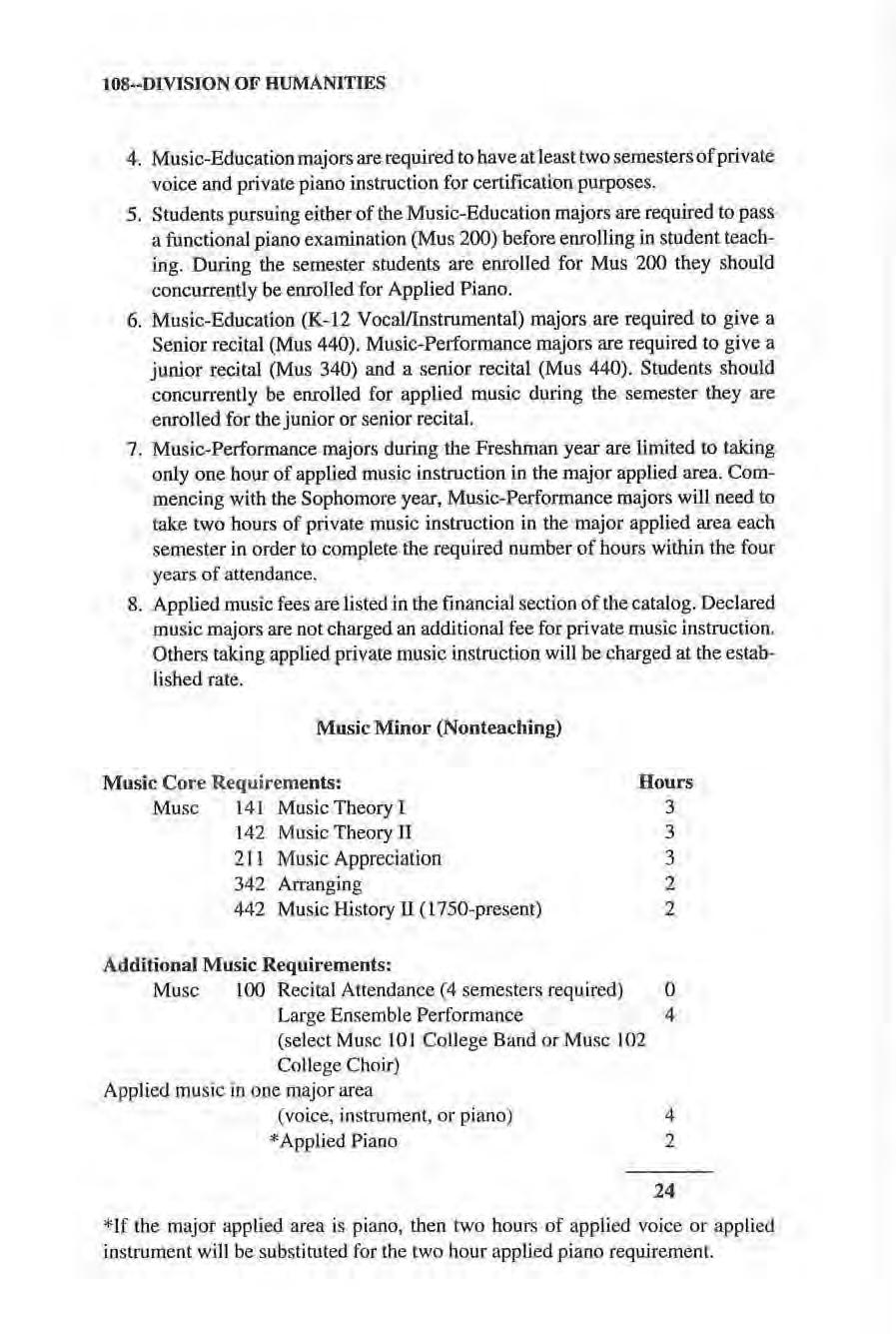
108-•DIVISION OF HUMANITIES
Music Minor (No nteaching) Music Core Requirements: Mu se 141 Music Theory I 142 Music Theory IT 211 Music Appreciation 342 Arranging 442 Music History II (1750-present) Additional Music Requirements: Hours 3 3 3 2 2 Muse 100 Recital Attendance (4 semesters required) 0 Large Ensemble Performance 4 (select Muse IO I Coll ege Band or Muse 102 College Choir) App lied music in one major area (voice, ins trument, or piano) 4 *Applied Piano 2 24
Music.• Marketing Option (Nonteaching)
*If the major app lied area is piano, then two hours of applied voice or applied instrument will be substituted for the two hour applied piano requirement.
K-6 Vocal/Elementary Music Education Option (Subject Endorsement)
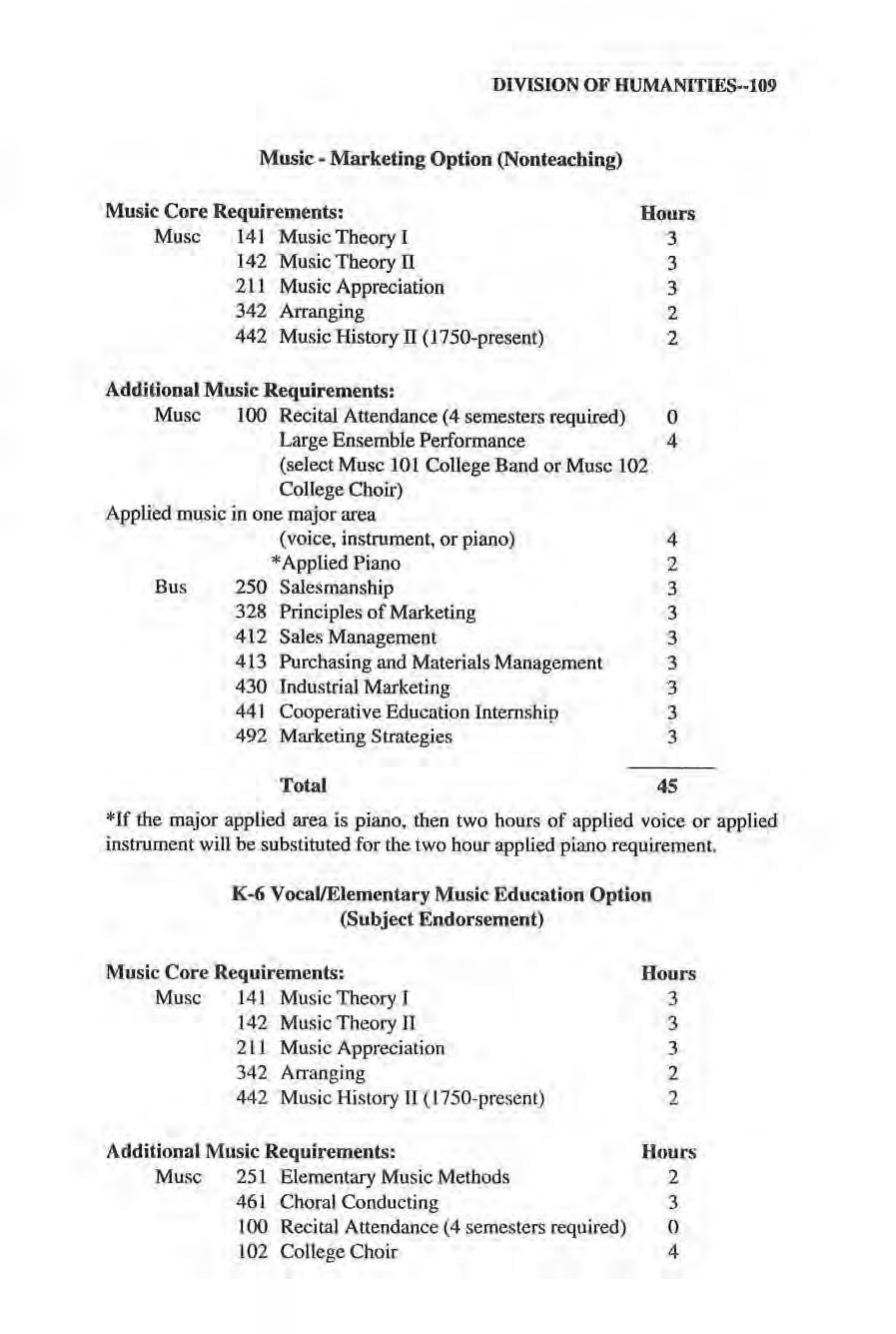
DIVISION OF HUMANITIES--109
Music Core Requirements: Muse 141 Music Theory I 142 Music Theory II 2 11 Music Appreciation 342 Arranging 442 Music History II (1750-present) Additional Music Requirements: HOlll'S 3 3 3 2 2 Muse 100 Recital Attendance (4 semesters required) O Large Ensemble Performance 4 (select Muse 101 College Band or Muse 102 Coll ege Choir) Applied music in one major area (voice, instrument, or piano) 4 *Applied Piano 2 Bus 250 Salesmanship 3 328 Principles of Marketing 3 4 I 2 Sales Management 3 413 Purchasing and Materials Management 3 430 Industrial Marketing 3 44 1 Cooperati ve Education Intem ship 3 492 Marketing Strategies 3 Tota l 45
Music Core Requirements: Muse 141 Music Theory I 142 Music Theory n 211 Music Appreciation 342 Arranging 44 2 Music Hj story IJ ( l 750-present) Additional Music Requirements: Muse 251 Elementary Music Methods 461 Choral Conducting 100 Recital Attendance (4 semesters required) 102 College Choir Hours 3 3 3 2 2 Hours 2 3 0 4
*If the m ajor applied area is piano, then three hours of applied voice or applied instrument will be substituted fot the three hour applied piano requirement. Regardless of what the major instrument i s, the student must have experience on voice, instrument, and piano.
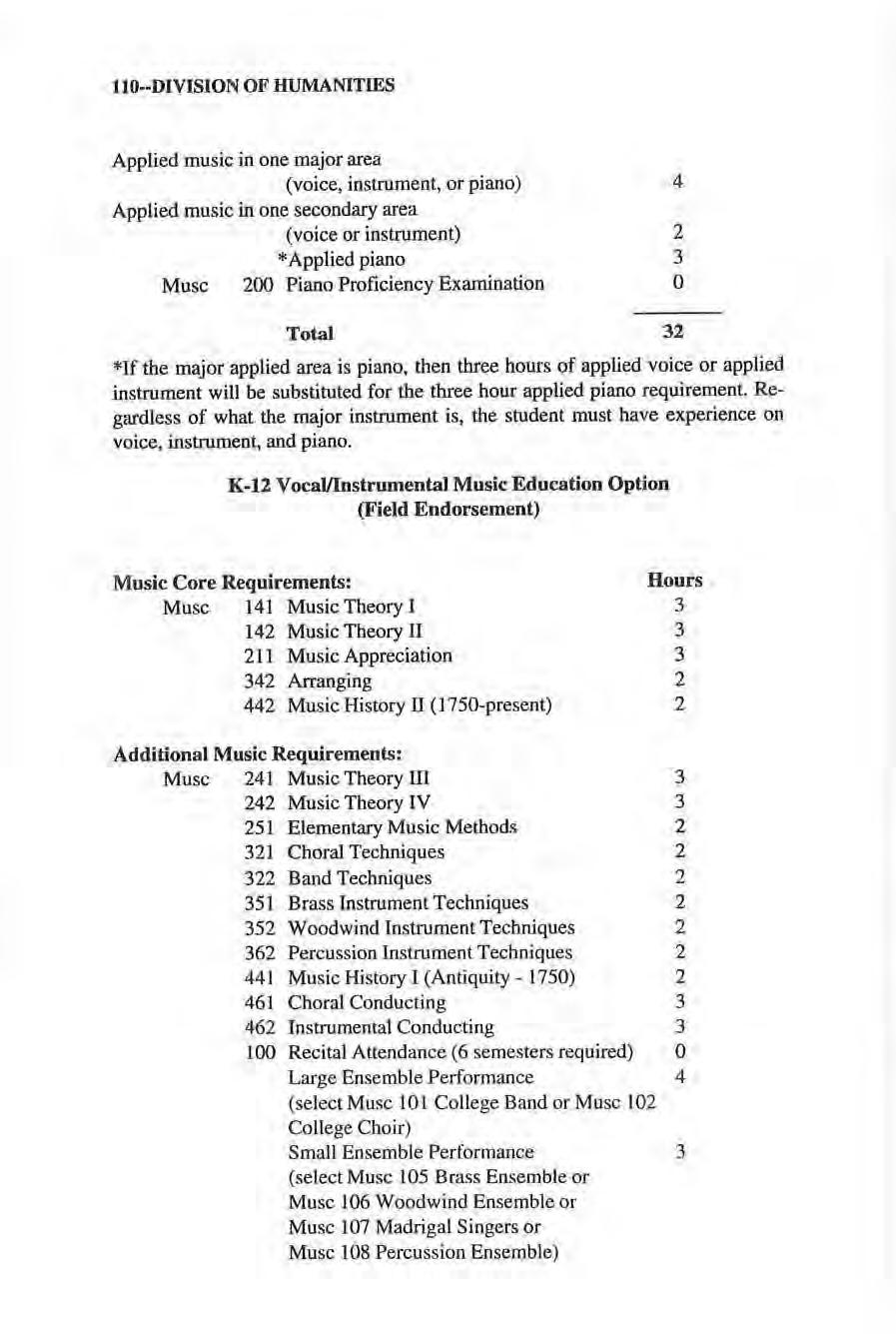
Applied music in one major area (voice, instrument, or piano) Applied mu sic in o ne secondary area (voice or instrument) * Applied piano Muse 200 Piano Proficiency Examination 4 2 3 0 Total 32
110--DIVISION OF HUMANITIES
Music Core Requirements: Muse 141 Music Theory l Hours 3 142 Music Theory II 211 Musi c Appreciation 342 Arranging 442 Music History Il ( 17SO-present) Additional Music Req uirements: 3 3 2 2 Muse 241 Music Theory Ill 3 242 Music Theory lV 3 251 Elementary Music Methods 2 321 Choral Techniques 2 322 Band Techniques 2 351 Brass Instrument Techniques 2 352 Woodwind I nstrument Techniques 2 362 Percussion Instrument Techniques 2 441 Music History I (Antiquity - 1750) 2 461 Choral Conducting 3 462 In strumental Conducting 3 100 Recital Attendance (6 semesters required) 0 L arge Ensemble Performance 4 (select Muse IO 1 College Band or Muse l02 College Chou:) Small Ensemble Performance 3 (select Muse 105 Brass Ensemb le or Muse 106 Woodwind Ensemble or Muse 107 Madrigal S ingers or Muse 108 Percussion Ensembl e)
K-12 Vocal/Instrumental Music Education Option (Field Endorsement)
Appli ed music in one major area
*If the major applied area is piano, then three hours of applied voice or applied instrument will be substituted for the three hour applied piano requirement. Regardless of what the major instrument is, the student must have experience on voice, instrument, and piano.

DMSlON OF HUMANITIES--111
i nstrument,
Applied music in
secondary
(voice or instrument) *Applied piano Muse 200 Piano Proficiency Examination M use 440 Se nior Recital Total 6 2 3 0 l 59
(voice,
or piano)
one
area
- Performance O p tion (Nonteaching) Music Core Requirements: Muse 141 Music Theory I 142 Mus ic Theory II 2 11 Mus ic Appreciation 342 Arrangi ng 442 Music History Il (1750-present) Additional Music Requirements: Muse 24 1 Music Theory lII 242 Music Theory rv 441 Music His tory I (Antiqui ty-1750) Select one: 461 Choral Conducting or Ho urs 3 3 3 3 2 3 3 2 3 462 JnstrumenJal Conducting 3 Muse I 00 Recital Attendance (8 semesters required) 0 Large Ensemble Perfonnan ce 6 (selec t Mus 101 College Band or Muse 102 College Choir) Small Ensemble Perfor man ce 2 (select Mus l05 Brass Ensemble o r Muse 106 Woodwind Ensemble or Muse 107 Madrigal Singers or Muse I08 Percussion E nsemble)
Music
*If the major applied area is piano, then two hours of applied voice or applied instrument will be substituted for the two hour applied piano requirement.

ll2--DIVISION OF HUMANITIES Applied music in one major area (voice, instrument, or piano) *Applied Piano Muse 340 Junior Recital Muse 440 Senior Recital Total 14 2 1 51
MAJOR PsychoJogy/Sociology Option (Non teaching) Psychology-Sociology Core Requirements: Psyc 121 Principles of Psychology 255 Human Relations Soc 20 I Principles of Sociology Additional Psychology Requirements: Psyc 345 Psychology of Personality 250 Human Growth and Development 305 Social Psychology 320 Psychology of Learning Soc 225 lntroduction to Cultural Anthropology 250 Community Organization 300 Contemporary Social Problems 340 The Family 420 Soc.iological and P sycholo g ical Theory (Selec t one) Psyc 440 Behavior Modification OR 450 Abnormal Psychology (Select one) Soc 230 Sociology of Women or 320 Sociology of Educat ion Hours 3 3 3 3 3 3 3 3 3 3 3 3 3 3 3 3
PSYCHOLOGY-SOCIOLOGY

DIVISION OFHUMANITIES--113 Social Work Electives (select 9 hours io one or more areas listed below) Sowk 280 Introduction to Social Work 3 310 Social Services 3 TISC~~~ 3 390 Groupwork 3 498 Special Topics i n Social Work 3 Total Psychology Option (7 - 12 Subject Endorsement or Nonteaching) Psychology-Sociology Core Requirements: Psyc 121 Principles of Psychology 255 Human Relations Soc 20 l Principles of Soc iology 51 Hours 3 3 3 Additional Psychology Requirements: Hours Psyc 345 Psychology of Personality 3 250 Human Growlh and Development 3 305 Social Psychology 3 320 Psychology of Learning 3 440 Behavior M orufication 3 450 Abnormal Psychology 3 Electives in Psychology 6 Electives from one or more of the soc ial science cognate areas of anthropology, economics, geography, his tory ( not including Hist 400), p olitical scien ce, or sociology. 3 Total Sociology Option (7-12 Subject Endorsement or Nonteaching) Psychology-Sociology Core Requirements: Psyc 12 1 Principles of P sychology 255 Human Relations Soc 20 I Principles of Sociology Additional Sociology Re quirements: Soc 25 0 Communjty Organization 260 Rural Sociology 300 Contemporary Social Problems 320 Sociology of Education 36 Hours 3 3 3 3 3 3 3
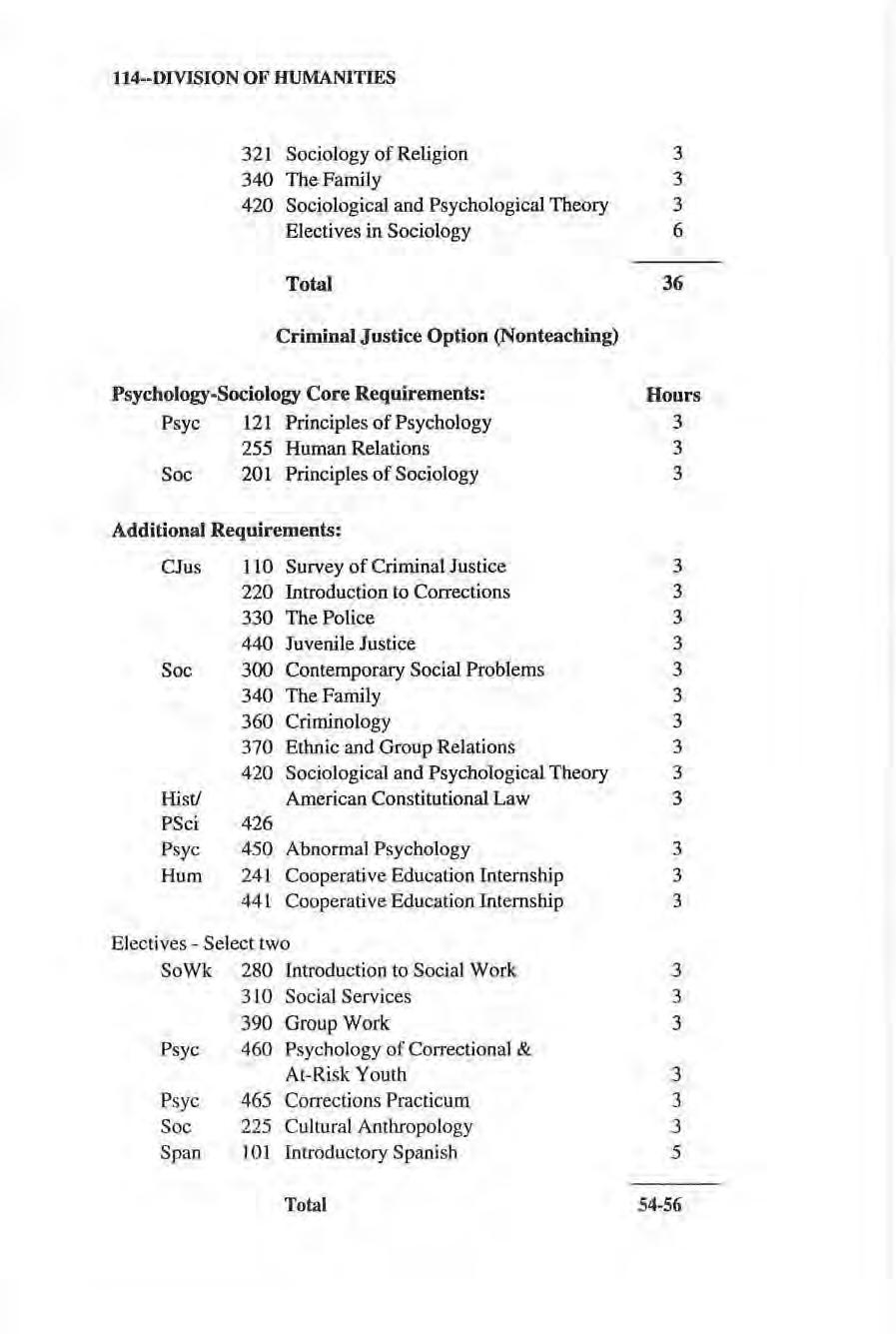
114•-DMSION OF HUMJ\NITIES 32 I Sociology of Religion 3 340 The Family 3 420 Sociological and Psychological Theory 3 Electives in Sociology 6 Total 36 Criminal Justice Option (Nonteacbing) Psychology-Sociology Core Requirements: Hours Psyc 121 Principles of Psychology 3 255 Human Relations 3 Soc 201 Principles of Sociology 3 Additional Requirements: CJus 110 Survey of Criminal Justice 3 220 Introduction to Corrections 3 330 The Police 3 440 Juvenile Justice 3 Soc 300 Contemporary Social Problems 3 340 The Family 3 360 Criminology 3 370 Ethnic and Oroop Relations 3 420 Sociol ogical and Psycho1ogical Theory 3 Hist/ American Cons titutional Law 3 PSci 426 Psyc 450 Abnormal Psychology 3 Hum 241 Cooperative Education Internship 3 441 Cooperative Education Internship 3 Electives - Select two SoWk 280 Introduction to Social Work 3 310 Social Services 3 390 Group Worlc 3 Psyc 460 Psychology of Correcti onal & At-Risk Youth 3 Psyc 465 Con-ections Practicum 3 Soc 225 Cultura l Anthropology 3 Span 101 Introductory Spanish 5 Total S4 -S6
SOCIAL SCIENCE MAJOR
Additional Social Science Requirements: Electives in History
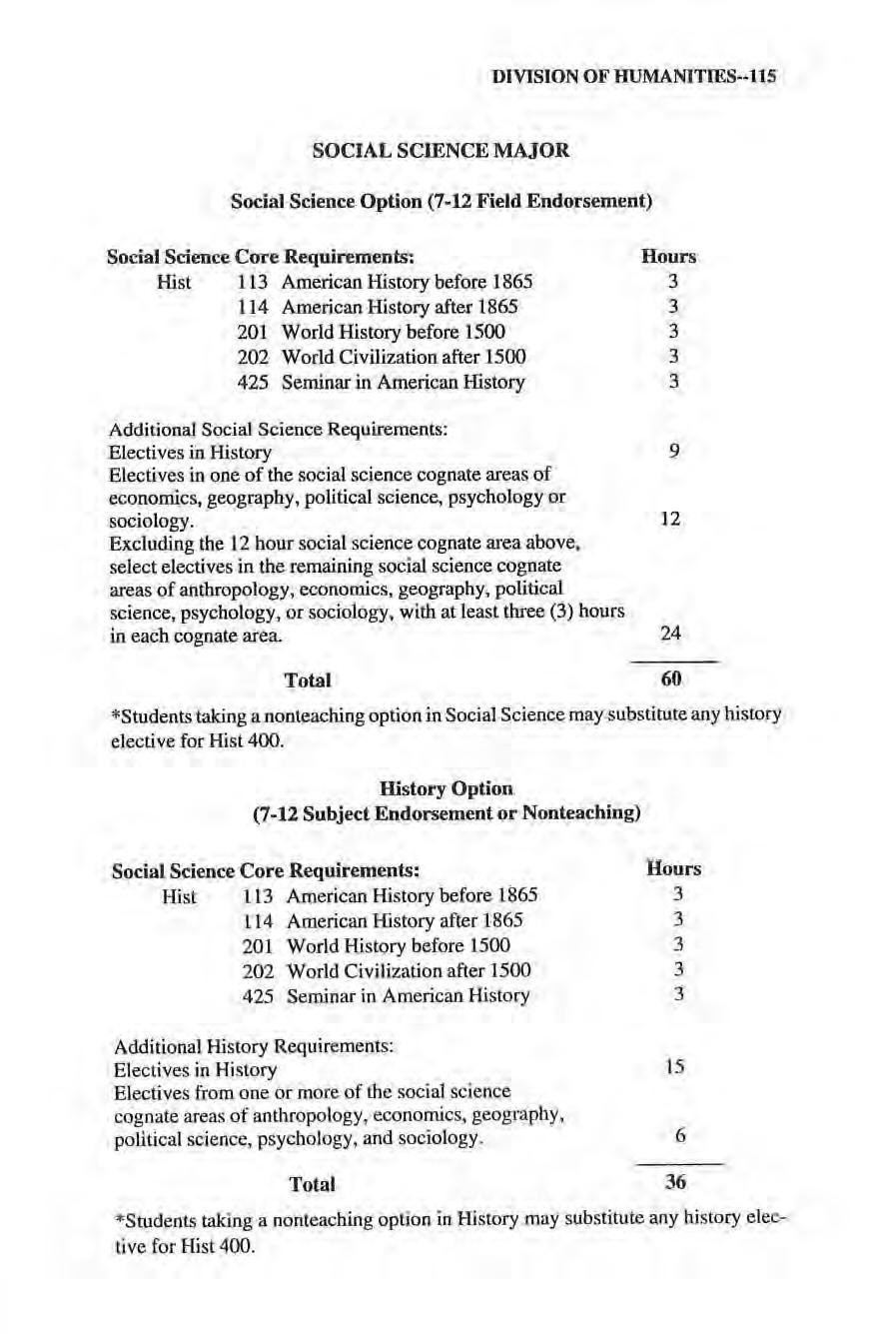
Electives in one of the social science cognate areas of economics, geography, political science, psychology or sociology.
Excluding the 12 hoUT social science cognate area above, select electives in the remaining social science cognate areas of anthropol ogy, economics, geography, political science, psychology, or sociology, with at least three (3) hours in each cognate area.
*Students talcing a nonteachi ng option in Social Science may substi tute any history elective for Hist 400.
*S tudents talcing a nonteaching option in History may s ub stitute any history elective fo r Hist 400.
DIVISJON OF HUMANITIES--115
Core
Hist 113 American History
114
World
Social Science Option (7-12 Field Endorsement) Social Science
Requirements:
before 1865
American History after 1865 201
History before 1500 202 World Civilization after 1500 425 Seminar in American History
Total Hours 3 3 3 3 3 9 12 24 60
Science Core Requirements: Hist 11 3 American His tory before
114 American History after
20 1 World History
efore 1500
World Civi li zation
Seminar in American History
History Option (7-12 Subject Endorsement or Nonteaching) Social
1865
1865
b
202
after 1500 425
Electives in Hi story Electives from
political sc ience, psychology, and socio logy. Total llours 3 3 3 3 3 15 6 36
Additional History Requirements:
one or more of the social science cognate areas of a nthropology, economics, geography,
SPEECH AND DRAMA MAJOR
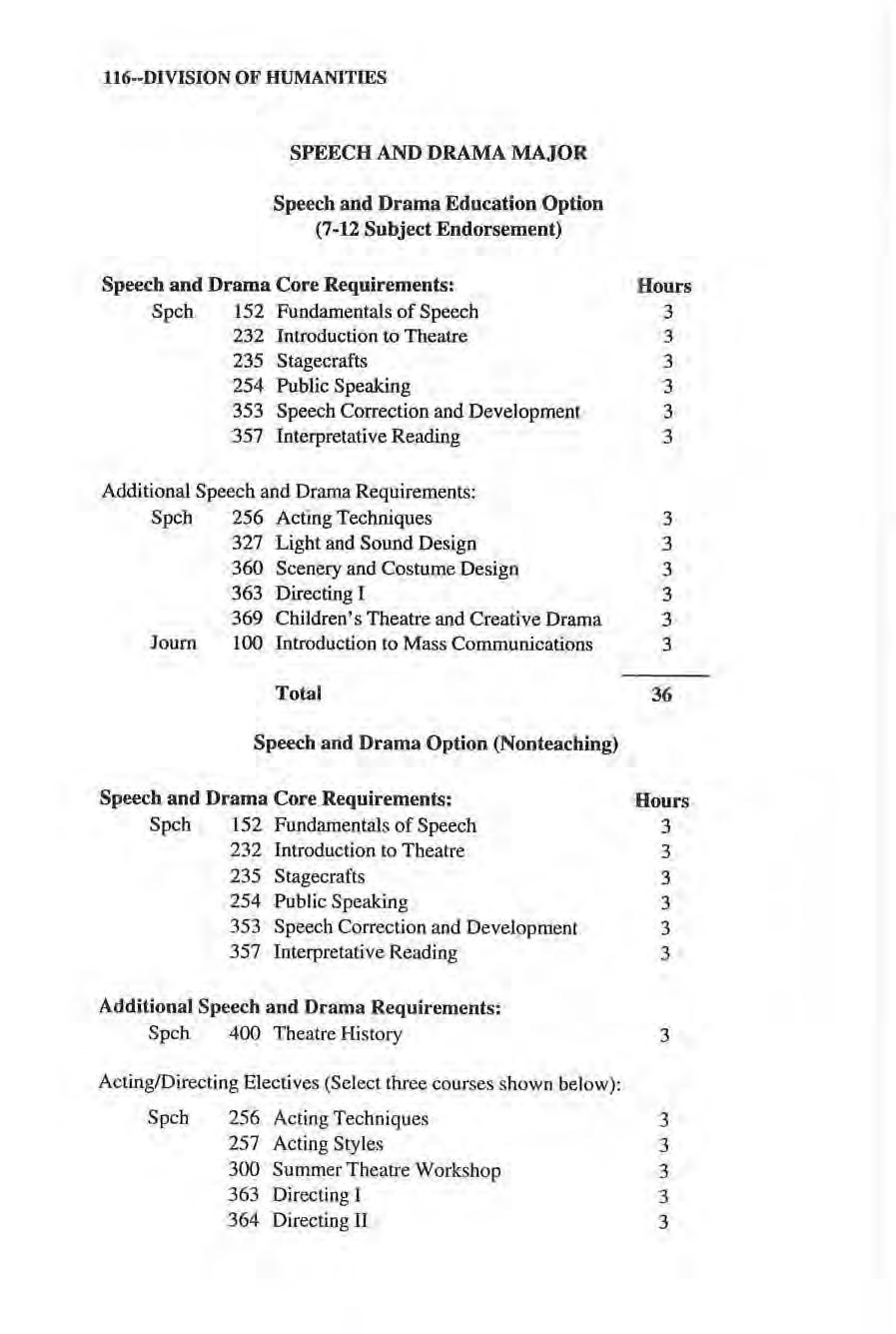
116--DIVISION OF HUMANITIES
Speech and Drama Education Option (7-12 Subject Endorsement) Speech and Drama Core Requirements: Speh 152 Fundamentals of Speech 232 Introduction to Theatre 235 Stagecrafts 254 Public Speaking 353 Speech Correction and Development 357 Interpretative Reading Additional Speech and Drama Requ.irements: Speh 256 Acting Techniques 327 Light and Sound Design 360 Scenery and Costume Design 363 Directing I 369 Children's Theatre and Creative Drama Joum 100 Introduction to Mass Communications Tota.I Speech and Drama Option (Nonteaching) Speech and Drama Core Requirements: Speh 152 Fundamentals of Speech 232 Introduction to Theatre 235 Stagecrafts 254 Public Speaking 353 Speech Correction and Developme nt 357 Interpretative Reacling Additional Speech and Drama Requirements: Speh 400 Theatre History Acting/Directing Electives (Select three courses s hown below): Speh 256 Acting Techniques 257 Acting Styles 300 Sum.mer Tbeatse Workshop 363 Directing 1 364 Directing II Hours 3 3 3 3 3 3 3 3 3 3 3 3 36 Hours 3 3 3 3 3 3 3 3 3 3 3 3
The term Pre-Law refers to a student's intention to pursue advanced studies at a law school., not to any prescribed major or cunicul urn . Adequate preparations for entrance into a ranking law school require s a bachelor's degree. Neither the committee on pre-law education of the American Bar Association nor leading Jaw schools specify a particular undergrad uate major or prescribe a spec ific pre-Jaw program, but they do stress the ability to read perceptively, to write intelligently, to use a library, and to evaluate evidence. Success in law school requires intellectual depth and breadth as well as certain skill s and insights relevant to law study. Since many of the goals of legal education are also the goals of liberal education, law schools recommend that pre-law students obtain the widest poss ible undergraduate experience consistent with their profess ional objectives. Literate, well-infonned students with broad general educations t end to succeed in Jaw school. Those students aspiring to e nter law school , then, may major and/or minor in any number of fields that will aid them in a ttainjng the following:
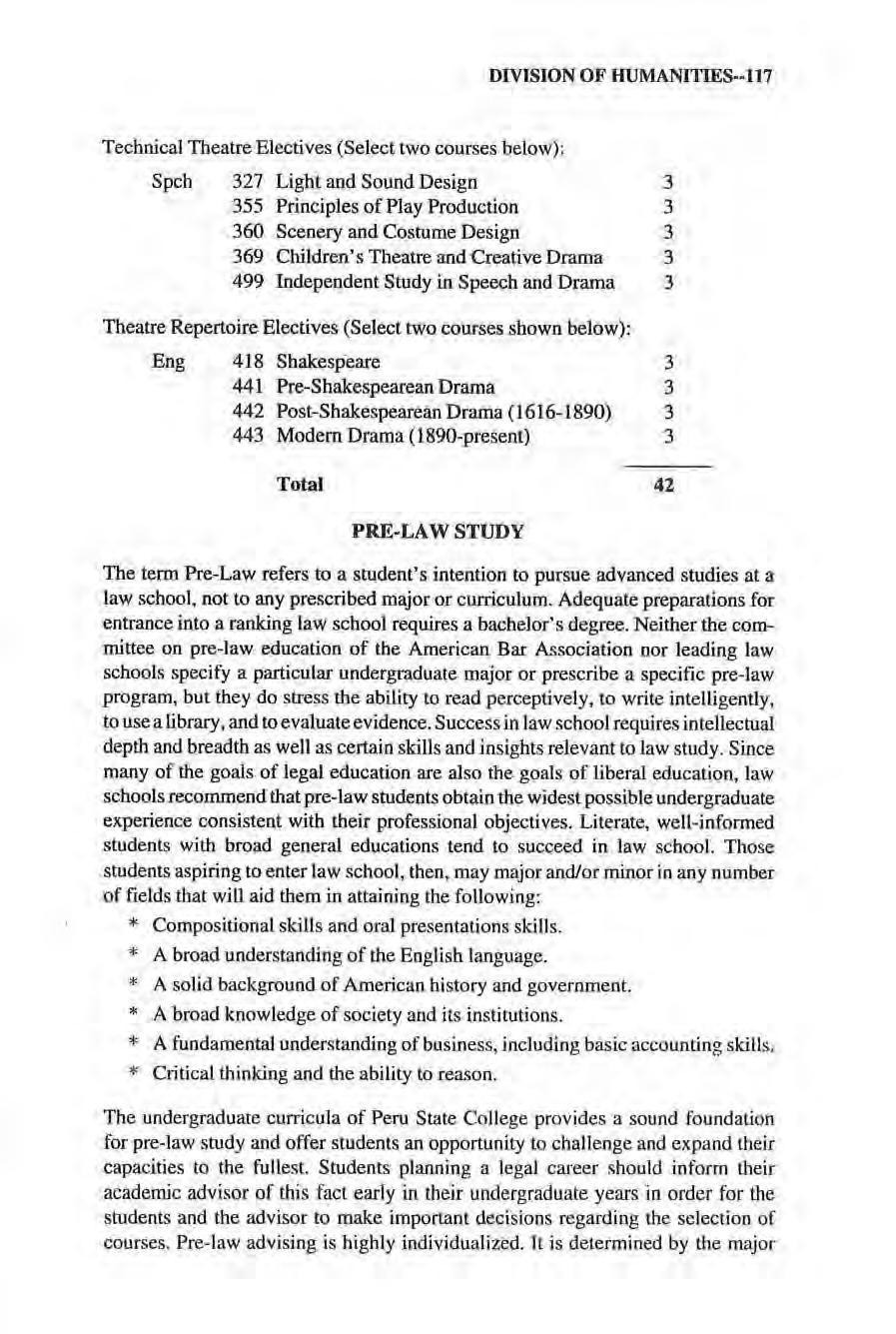
* Compositional ski ll s and oral presentations skills
* A broad understanding of the English language.
* A solid background of American history and government.
* A broad knowledge of society and its institutions.
* A fundamental understandi ng of bu si ness, including basic accounting skills.
* Critical thinking and the abi lity to reason.
The undergraduate curricula of Peru State Co1Jege provides a sound foundation for pre- law study and offer students an opportunity to challenge and expand their capacities to the fullest. Students p lanning a legal career should in form their academic advisor of this fact early in their undergraduate years in order fo r the students and the advisor to make important decisions regartling the selection of courses. Pre-law advising is highly indi viduali zed. lt is determined by the major
DMSION OF HlJMANITIES••l17 Technical Theatre E lectives (Select two courses be1ow): Speh 327 Ligh t and Sound Design 3 355 Principles of Pl ay Production 3 360 Scenery and Costume Design 3 369 Children's Theatre and Creative Drama 3 499 Independent Study i n Speech and Drama 3 Theatre Repertoire Elec tives (Select two courses s hown below): Eng 418 Sbakesp·eare 3 44 1 Pre-Shakespearean Drama 3 442 Post-Shakespearean Drama (1616-1890) 3 443 Mod em Drama (1890-present) 3 Total 42
PRE-LAW STUDY
the student has selected and the unique goals of each student. During the senior year the student will need to register for the Law School Admissions Test (LSAT). Acceptance into law school will depend upon many factors, of which scores on the LSAT and grade point average are usually but partial criter ia. Other factors generally considered by law schools include campus and comm.unity involvement, work experience, and letters of recommendations. The PSC undergraduate ex.perience provides an excellent opportunity to demonstrate strength in these additional areas.
SUGGESTED PRE-LAW COURSES

118--DIVISION OF HUMANITIES
Computer Science 102 Introduction to Computer Concepts Criminal Justice 110 Survey of Criminal Justice English 075 Speed Reading 301 Traditional Grammar 308 Technical Writing 309 Creative Writing Speech 254 Public Speaking 357 Interpretative Reading History 113 U.S. History Before 1500 114 U.S. History After 1500 201 World Civilization to 1500 202 World Civilization since 1500 Political Science 201 American National Government 202 State and Local Government 426 American ConstitutionalLaw *468 Public Administration Sociology 201 Principles of Sociology 225 Introduction to Cultural Anthropology Business 231 Principles of Financial Accounting 251 Legal Environment and Contract Law *468 Public Administration
*
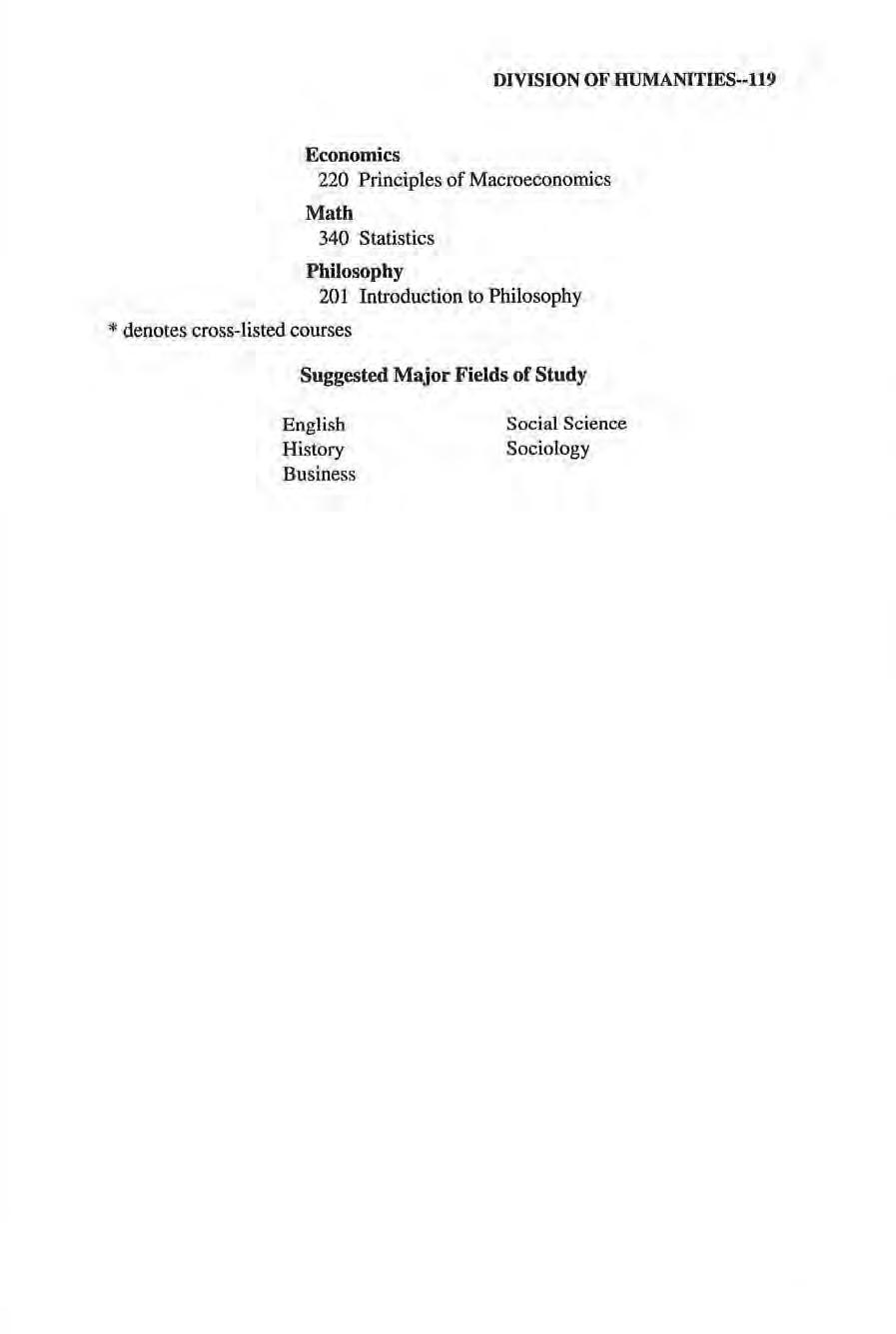
DIVISION OF BUMANfTIBS--ll9 Economics 220 Principles of Macroeconomics Math 340 Statistics Philosophy 201 I ntroduction to Philosophy
denotes cross-listed courses
Major Fields of Study English History Business Social Science Sociology
Suggested
DIVISION OF SCIENCE AND TECHNOLOGY
Chair: Dr. David L. Pippert
Professors: Long, Pippert
Assistant Professors: Clopton, Evans , Kincaid, Klubertanz, Mccaslin, Udey
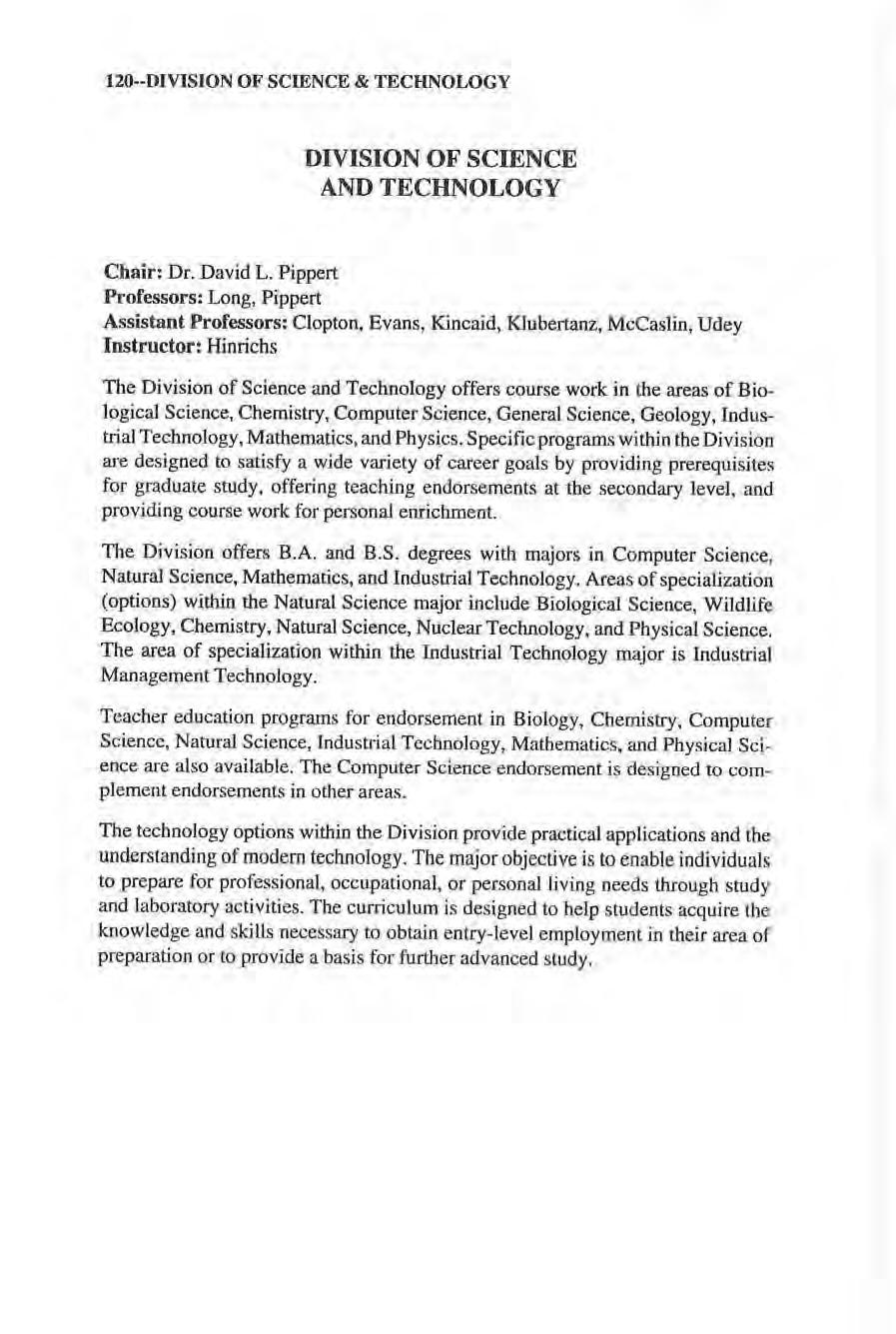
Instructor: Hinrichs
The Division of Science and Technology offers course work i n the areas of B iological Science, Chemistry, Computer Science, General Science, Geology, Ind ustrial Technology, Mathematics, and Physics. Specific programs wi thin the Division are designed to satisfy a wide variety of career goals by providing prerequisites for giaduate study, offering teaching e ndorsements at the secondary level , and providing course work for personal enrichment.
TI1e Division offers B.A. and B.S. degrees with majors in Computer Science, Natural Science, Mathematics, and Industrial Technology. Areas ofspecialization (options) wUhin the Natural Science major include Biological Science, Wildlife Ecology, C hemis try , Natural Science, Nuclear Technology, and Physical Science, The area of specialization within the Industrial Technology major is Industrial Management Technology.
Teacher education programs for endorsement in Biology, Chemistry, Compu ter Science, Natural Science, Indu stri a l T echnology, Mathematics, and Physical Science are also available. The Computer Science endorsement is d es igned to complement endorsements in other areas.
The technology options within the Division provide pract ical applications and the understanding of modern technology. The major objective is to enable individuals to prepare for professional, occupational, or personal li ving needs through study and laboratory activities. The c urriculum is designed to he lp s tudents acquire the knowledge and s kills necessary to obtain en t ry-le vel employment in their area of preparation or to provide a basis for further advanced s tudy.
120--DrVISION OF SCIENCE & TECHNOLOGY
NATURAL SCIENCE MAJOR
The Natural Science Bachelors Degree Program (B.S., B.A.) consists of a core of courses to provide the students with a general background. In addition to completing these core courses, the student must also select and complete one of the several options within the curriculum. These options will allow the student to work towards one of a variety of career and occupational goals.
The Biological Science option is designed for students planning to enro ll in a graduate or professional school after completioo of the baccalaureate degree.
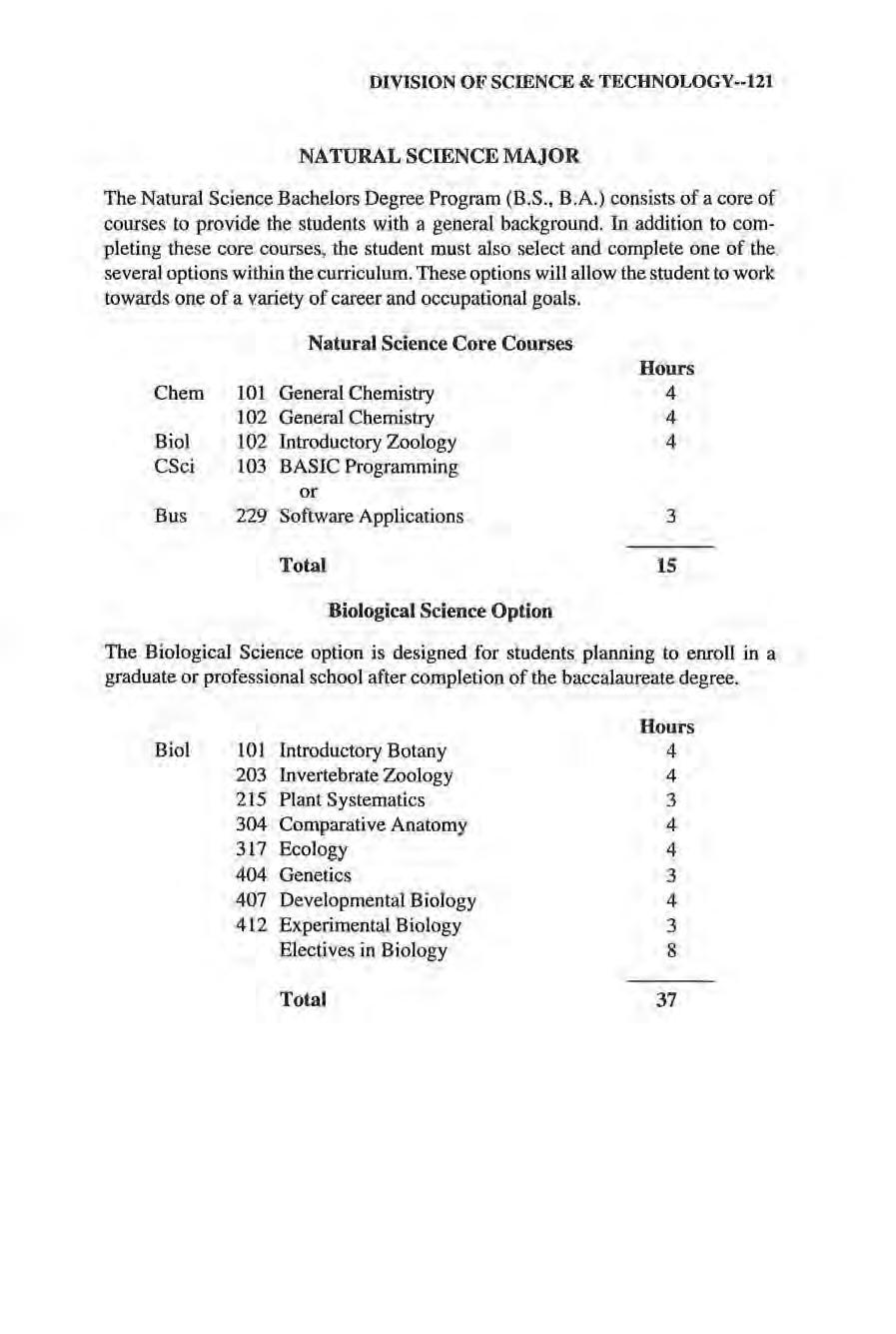
DlVISION Of SCIENCE & TECHNOLOGY--121
Natural Science Core Courses Chem 101 General Chemistry 102 General Chemistry Biol 102- Introductory Zoology CSci 103 BASIC Programming or Bus 229 Software Applications Total Biological Science Option Hours 4 4 4 3 1S
Hours B io l 101 Introductory Botany 4 203 Invertebrate Zoology 4 215 Plant Systematics 3 304 Comparative Anatomy 4 317 Ecology 4 404 Genetics 3 407 Developmental Biology 4 412 Experimental Biology 3 Electives in Biology 8 Total 37
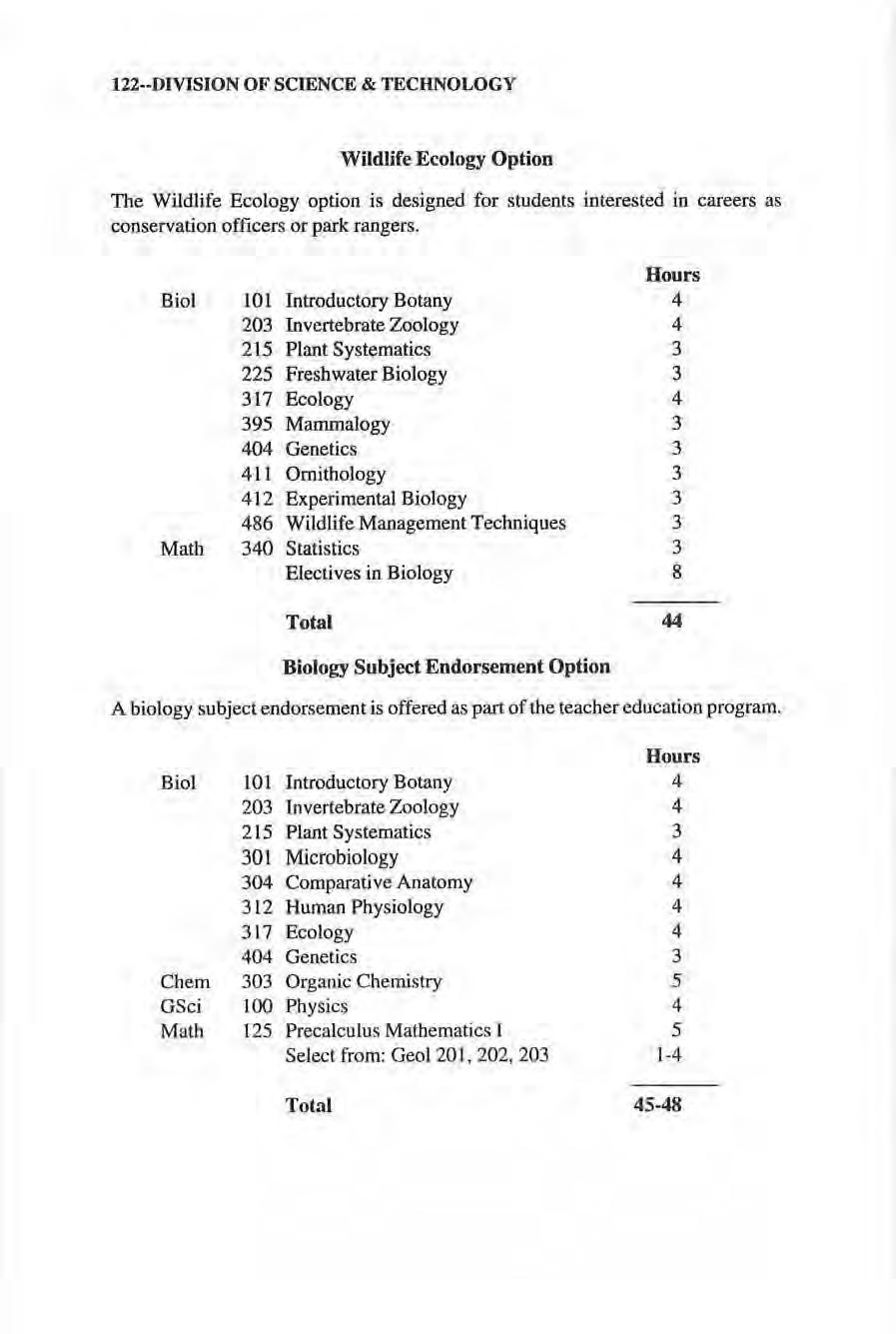
122--DIVISION OF SCIENCE
Wildlife Ecology Option The Wildlife Ecology option is designed for students interested in careers as conservation officers or park rangers. Hours Biol lOl Introductory Botany 4 203 Invertebrate Zoology 4 215 Plant Systematics 3 225 Freshwater Biology 3 317 Ecology 4 395 Mammalogy 3 404 Genetics 3 411 Ornithology 3 412 Experimental Biology 3 486 W il dlife Management Techniques 3 Math 340 Statistics 3 Electives in Biology 8 Total 44 Biology Subject Endorsement Option A biology subject endorsement is offered as part of the teacher education program Biol Chem GSci M a th 101 203 215 301 304 312 317 404 303 JOO 125 Hours Introductory Botany 4 Invertebrate Zoology 4 Plant Systematics 3 Microbiology 4 Comparative Anatomy 4 Human Physiology 4 Ecology 4 Genetics 3 Organic Chemistry 5 Physics 4 Precalculus Mathematics T 5 Select from: Geol 201 , 202, 20 3 1-4 Total 45-48
& TECHNOLOGY
Chemistry Subject Endorsement Option
A chemistry subject e ndorsement is offered as part of the teacher education program.
The requirements listed represent both the education and non-education degree programs. If the teaching endorseme nt is chosen, attention must be given to the additional courses required for entrance into the teacher education program professiona l semester. In the teacher e ducation program, Natural Science is a field endorsement.
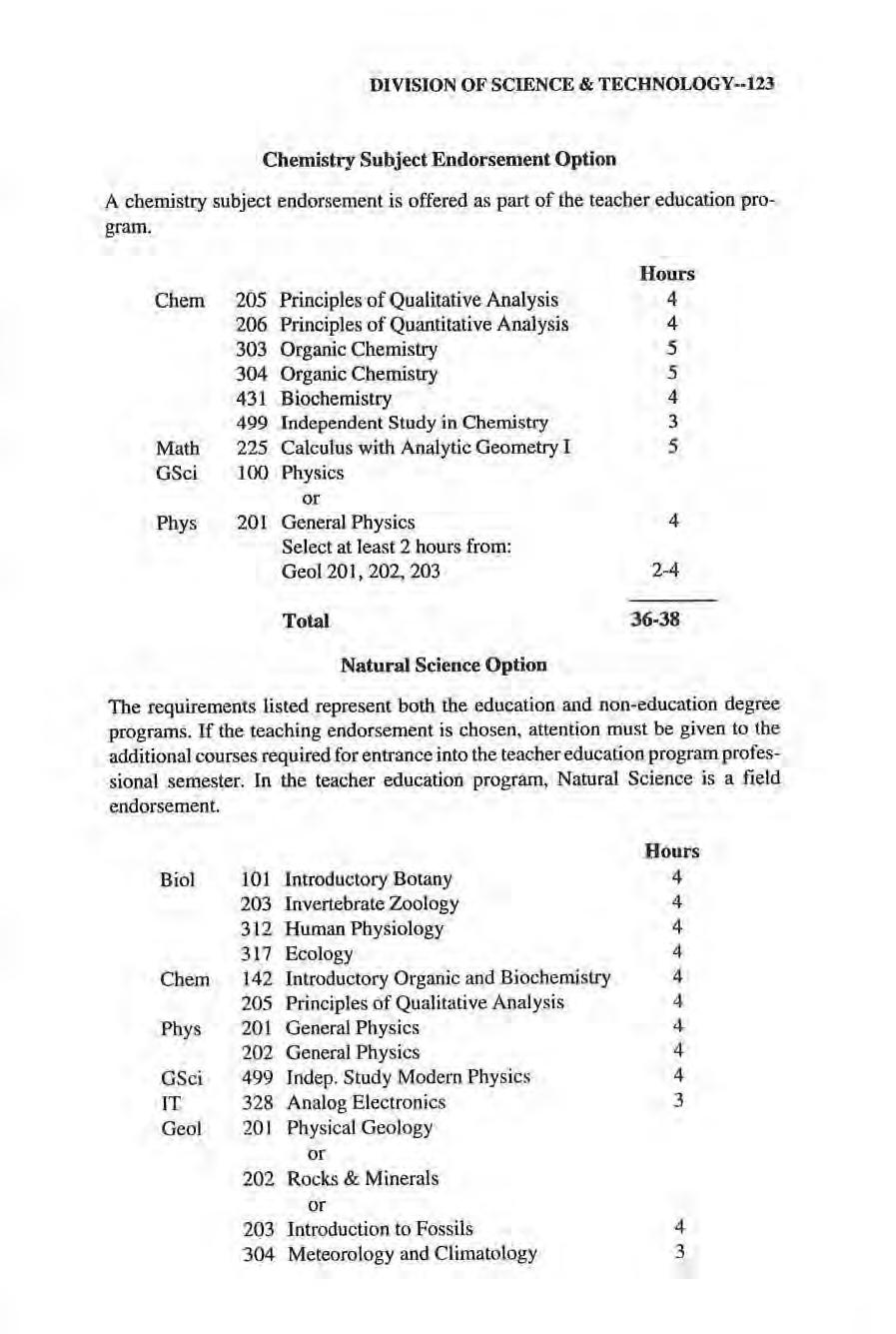
DIVISION OF SCIENCE & TECHNOLOGY--123
Chem Math GSci Phys 205 206 303 304 431 499 225 100 201 H ours Principles of Qualitative Analysis 4 Principles of Quantitative Analysis 4 Organic Chemistry 5 Organic Chemistry 5 Biochemistry 4 rndependent Study in Chemistry 3 Calculus with Analytic Geometry I 5 Physics or General Physics 4 Select at least 2 hours from: Geol 20 I, 202. 203 2-4 Total 36-38 Natural Science Option
Biol 101 203 3 12 317 Chem 142 205 Phys 201 202 GSci 499 IT 328 Geol 201 202 203 304 Introductory Botany Invertebrate Zoology Human Physiology Ecology Introductory Organic and Biochemistry Principles of Qualitative Analysi s General Physics General Physics Indep. Study Modern Physics Analog Electronics Physical Geology or Rocks & Minerals or Introduction to Fossils Meteorology and Climatology Hours 4 4 4 4 4 4 4 4 4 3 4 3
Additional work in either Biology, Chemistry, Physics or Earth Science is required so that the candidate has completed at least 20 semester hours in one of these subjects.
Nuclear Technology Option
In addition to the specific coursework requireme nt s listed below, the candidate for this option must a lso be a licen sed reactor operator. Q uestions regarding this program sho uld be directed to the C ha ir of the Divisi on of Sc ience and Technology.
Physical Science Option
The requirements listed represent both the education and non-education degree progr ams. 1f the teaching endorsement is chosen , attention must be give n to the additional courses required for entrance into the teacher education program professional semester. In the teacher educatio n program, Physical Science is a field endorsement.
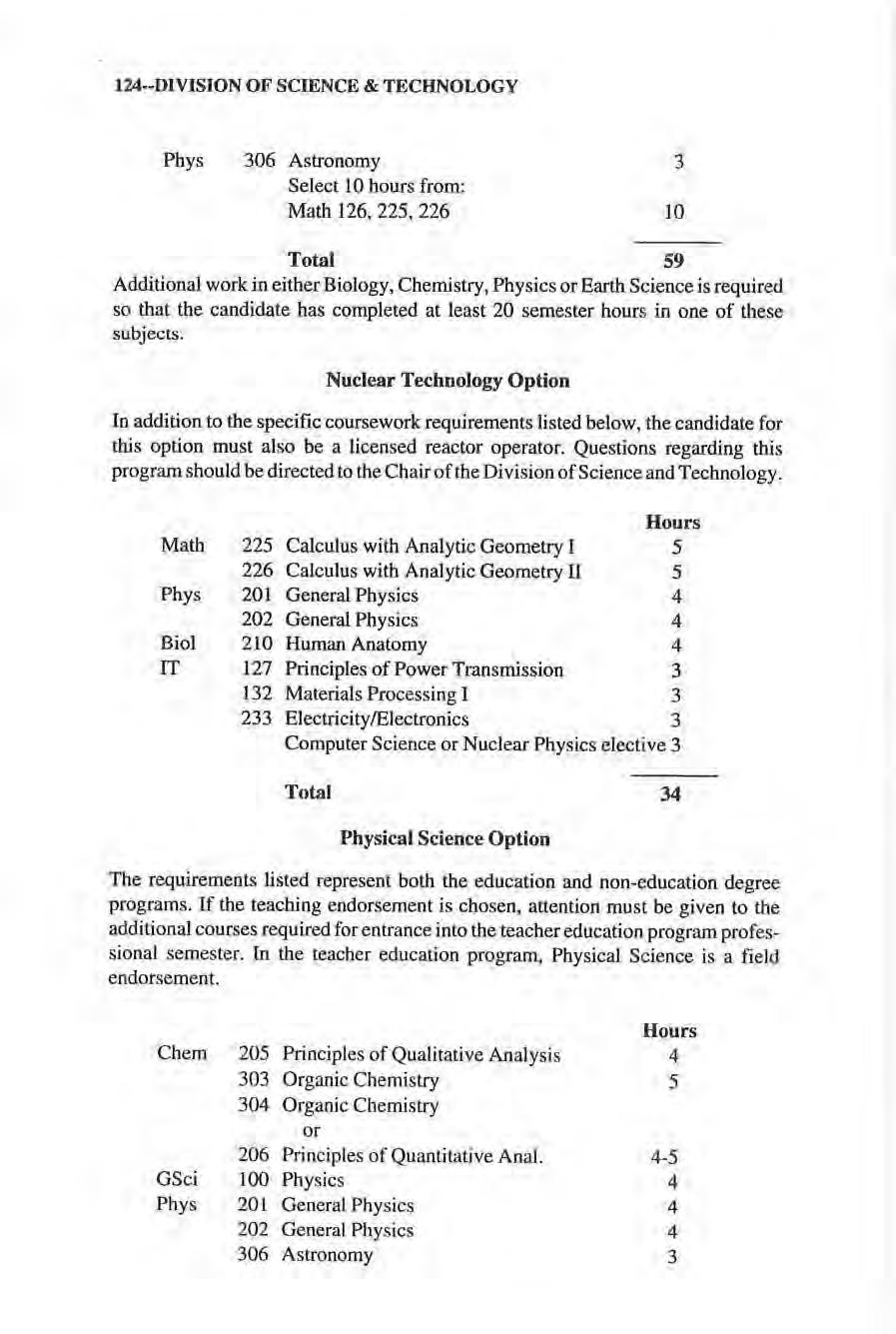
124--DLVISION OF SCIENCE & TECHNOLOGY Phys 306 A stronomy 3 Select IO hours from: Math l 26, 225. 226 Total 59
Hours Math 225 Calculus with Analytic Geometry I 5 226 Calculu s with An alytic Geometry U 5 Phys 201 General Physics 4 202 General Physics 4 Biol 210 Human Anatomy 4 IT 127 Principles of Power Transmission 3 132 Ma terials Processi ng I 3 233 Electricity/Electronics 3 Computer Science or Nuclear P hysics elective 3 Total 34
Hours Chem 205 Principles o f Qualitative Analysis 4 303 Organic Chemistry 5 304 Organic Chemistry or 206 Princip les of Quantitative Anal. 4-5 GSci 100 Physic s 4 Phy s 201 General Physics 4 202 General Physics 4 306 Astronomy 3
COMPUTER SCIENCE MAJOR
Aftercompletioga core curriculum, two options are available to students interested in a Computer Science major, the technical option and the business application option. Students majoring i n other areas and seeking background in computers may select the Comp uter Sci ence minor.
* Students who have successfu ll y completed mathematics courses equivalent to Math 125 and Math 126 may have these courses waived. Consent of Div ision Chair is required. If consent is given, only 54 hours are required for the major.
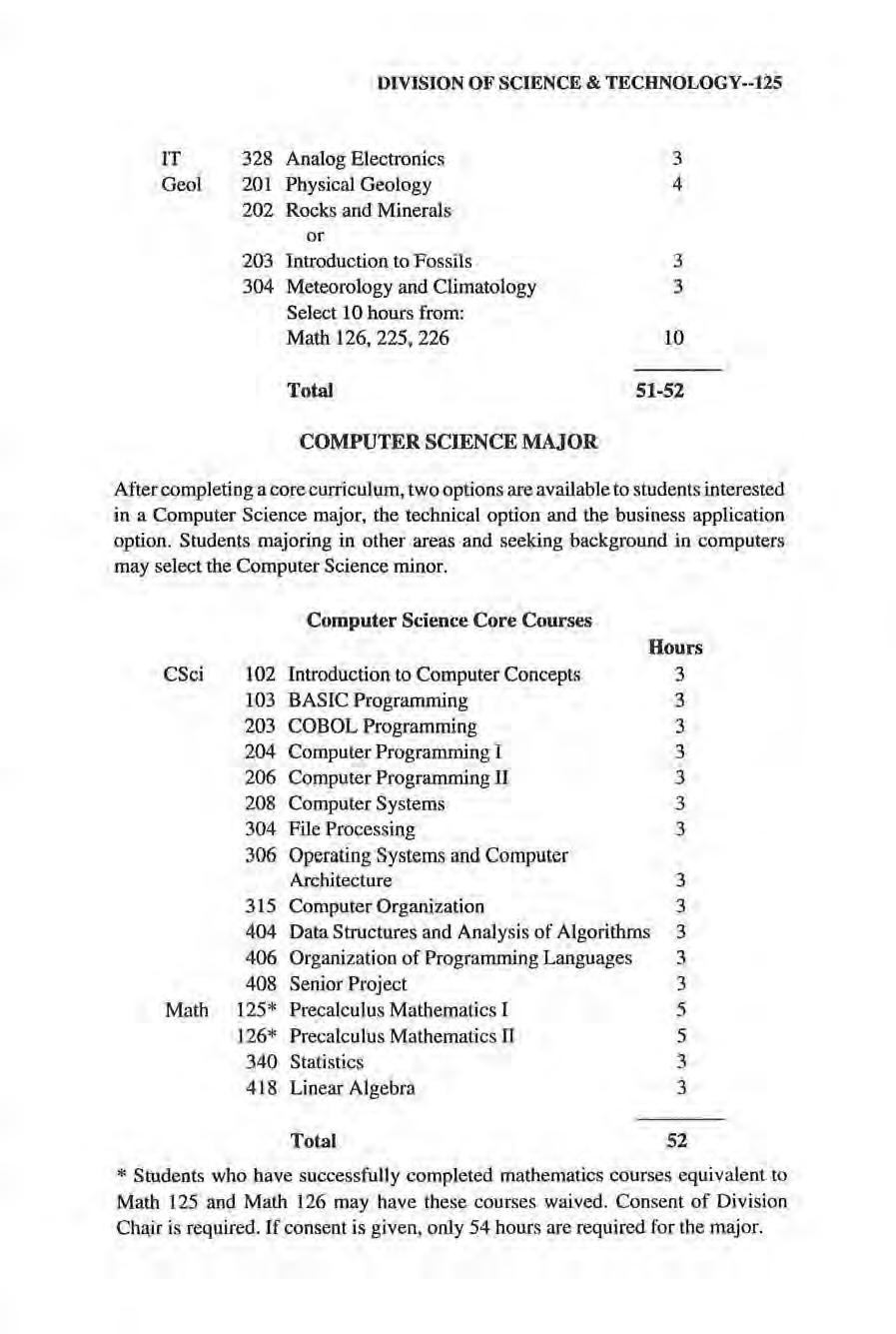
DIVISION OF SCIENCE & TECHNOLOGV--125 IT 328 Analog Electronics 3 Geo! 201 Physical Geology 4 202 Rocks and Minerals or 203 Introduction to Fossils 3 304 Meteorology and Climatology 3 Select 10 hours from: Math 126, 225, 226 10 Total 51-52
Computer Science Core Courses Hours CSci 102 I ntroduction to Computer Concepts 3 103 BAS IC Programming 3 203 COBOL Programming 3 204 Computer Programming I 3 206 Computer Programming Il 3 208 Computer Systems 3 304 File Processing 3 306 Operating Systems and Computer Architecture 3 3 15 Computer Organization 3 404 Data Structures and Analysis of Algorithms 3 406 Organiza tion of Programming Languages 3 408 Senior Project 3 Math 125* Precalcu lus Mathematics I 5 126* Precalculus Mathematics U 5 340 Statistics 3 418 L i near Algebra 3 Total 52
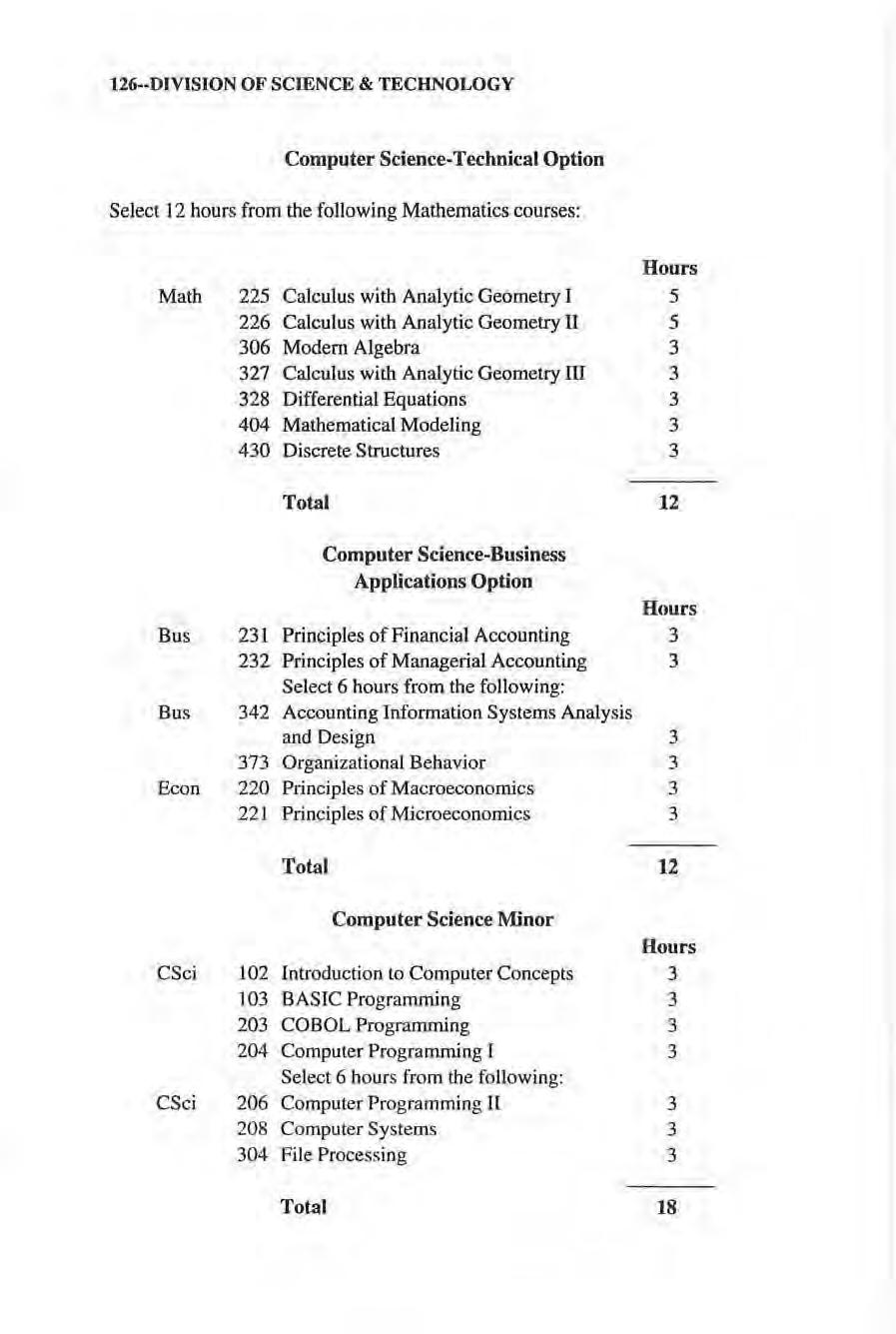
126--DJVISION OF SCIENCE & TECHNOLOGY Computer Science-Technical Option Select 12 hours from the following Mathematics courses: Hours Math 225 Calculus with Analytic Geometry I 5 226 Calculus with Analytic Geometry II 5 306 Modem Algebra 3 327 Calculus with Analytic Geometry ill 3 328 Differential Equations 3 404 Mathematical Modeling 3 430 Discrete Structures 3 Total 12 Computer Science-Business Applicatlons Option Hours Bus 231 Principles of Financial Accounting 3 232 Principles of Managerial Accounting 3 Select 6 hours from the following: Bus 342 Accounting Information Sys tems Analysis and Des ign 3 373 Organizational Behavior 3 Econ 220 Principles of Macroeconomics 3 221 Principles of Microecon omics 3 Total 12 Computer Science Minor Hours CSci 102 Introduction to Computer Concepts 3 103 BASIC Programmjng 3 203 COBOL Programming 3 204 Computer Programming f 3 Select 6 hours from the following: CSci 206 Computer Prog ramming ll 3 208 Computer Systems 3 304 File Processing 3 Total 18
Computer Science Supplemental Endorsement
To obtain the endorsement, teacher ed uca ti on students must a lso sati s fy the require m e nts of eithe r a field or s ubject endorsement.
MATHEMATICS MAJOR
The mathematics major has two o ptio ns, a mathemati cs opt io n and a mathematic s education option (field endorsement).
If the mathe matics educatio n opt io n is c hosen, attention must be g iven to the additi o nal co urse work requirements for entrance into the secondary teach er education program and to the profe ssiona l semester. M athematics is a fiel d endo rsement in the teacher education program. S tud ents who h ave taken mathematics courses eq uivalent to Math 125 and 126 s hou ld begi n their program with M ath 225. Consent o f the Div ision Chair is required.
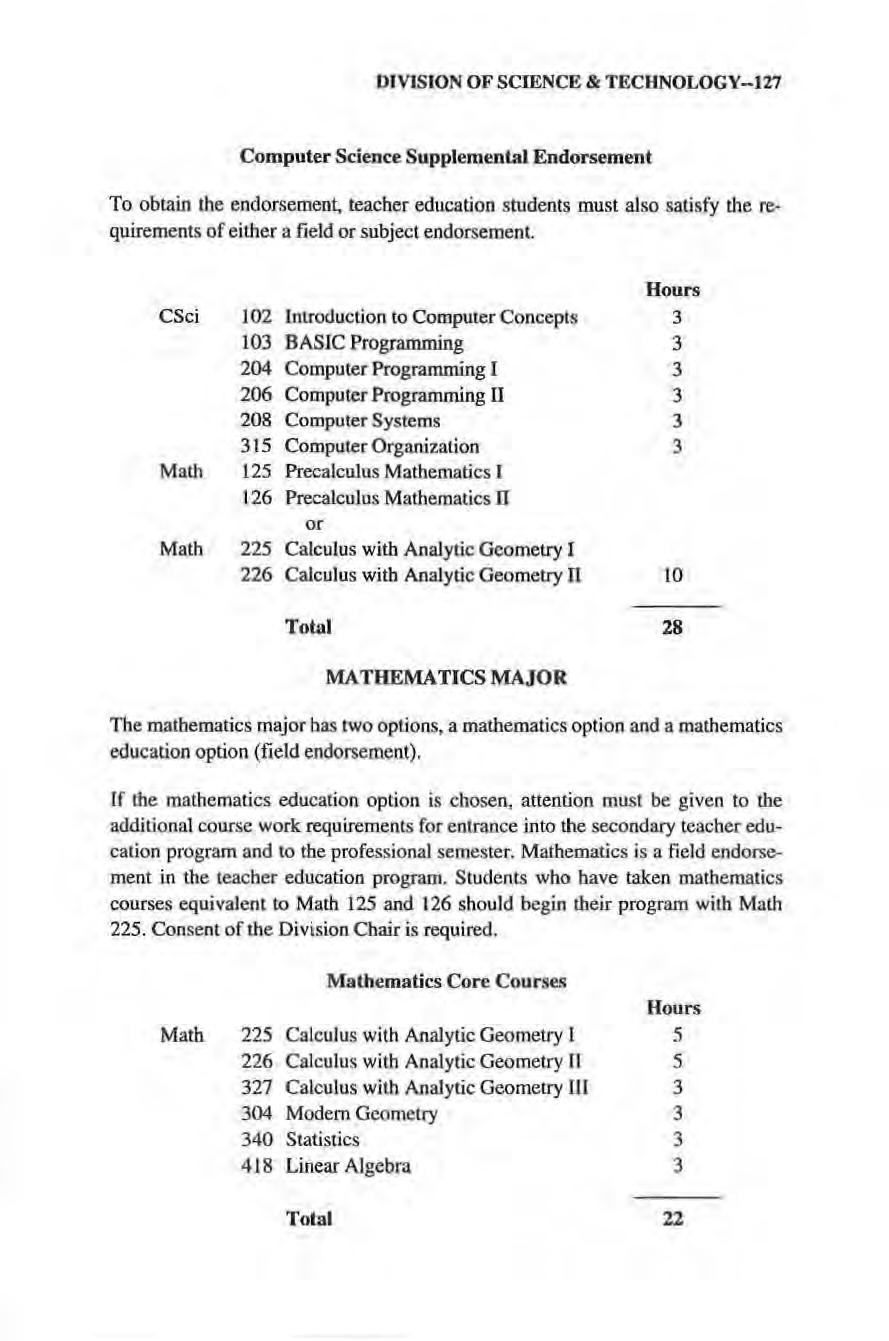
DIVIS ION OF SCIENCE & TECHNOLOGY-127
Hours CSci 102 lnlrodu c tion to Computer Co ncepts 3 103 BASIC Programming 3 204 Computer Programming I 3 206 Computer Programmi ng II 3 208 Computer Syste m s 3 3 15 Computer Organization 3 M ath 125 Precalculus Mathematics I 126 Precalculus Math ema t ics Il or Math 225 Calcu lus with Analytic Geometry r 226 Calcu lu s with Analytic Geometry II 10 Total 28
Hours Math 225 Calculus with Analytic Geo m etry I 5 226 Calculus wi th Analytic Geome try II 5 327 Calcu lus with Anal ytic Geometry III 3 304 Mode m Geometry 3 340 Statistics 3 4 18 Linear Algebra 3 Total 22
Mathematics
Core Co urses
* A student who has taken Mathematics courses equivalent to Ma th 1 25 and 126 ma y waive the p recalculus requirement. In such cases, a total of 42 hours are needed for the fie ld endorsement. Consent of the Divi s ion Chairperson is required .
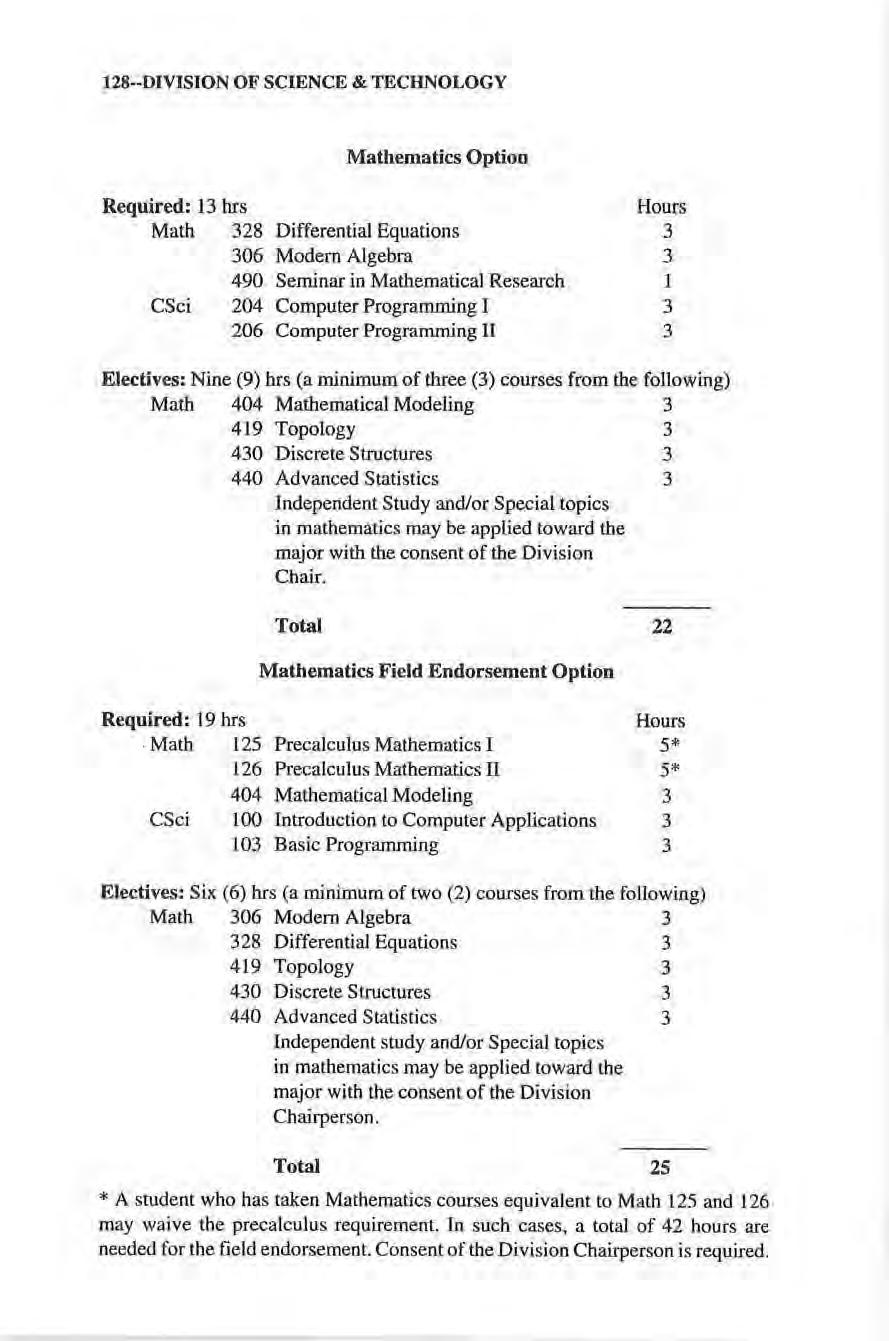
128--DIVISION OF SCIENCE & TECHNOLOGY Mathematics Option Required: 13 hrs Math 3 2 8 Differential Equation s 306 Modero Algebra 490 Seminar in Mathematical Research CSc i 204 Computer Programming I 206 Computer Programming 11 Hours 3 3 1 3 3 Electives: Nine (9) hrs (a minimum of three (3) courses from the following) Math 404 Mathematical Modeling 3 419 Topology 3 430 Discrete Structures 3 440 Advanced Statistics 3 Independent Study and/or Special topics in mathematics may be applied toward the major with the consent of the Division Chair. Total Mathematics Field Endorsement Option Required: 19 hrs . Math 125 126 404 CSci 100 103 Precalcu]as Mathematic s I Precalculus Mathematics Il Mathematical Modeling Introduction to Computer Applic ations Basic Programming 22 Hours 5* 5* 3 3 3 Electives; Six (6) hrs (a m.irumum of two (2) coUises from the followi n g) Math 306 Modem Algebra 3 328 Differential Equations 3 419 Topology 3 430 Discrete Structures 3 440 Advanced Statistics 3 Independen t study and/or Special topics in mathematics may be applied toward the major with the consent of the Division Chairperson. To tal 25
INDUSTRIAL TECHNOLOGY MAJOR
The Industrial Technology Bachelors Degree Program consists of a core of technical courses to provide the student with a broad general background of technology. The options available within the curriculum e11able the student to specialize in Industrial Technology Education or Industrial Management Technology.

Industrial Technology Education Option
The Industrial Technology Education opt ion is for those who plan to teach Industrial Technology in public or private secondary schools. The professional education requirements must be met in addition to the courses listed for a teaching endorsement,
Industrial Management Technology Option
The curricu.lum for the Industrial Management Technology opt ion is designed for students whose main objective is preparation for technician and managerial positions in industry. The curriculum has been developed to include a combination of technical and business courses in order to prepare the graduate for employment in an industrial enterprise.
DIVJSION OF SCIENCE & TECHNOLOG Y--129
Industrial Technology Core Courses Hours IT 121 Introduction to Computer Aided Design 3 124 Construction Materials 3 125 Graphic Communkations 3 127 Principles of Power Transmission 3 132 Material Processing I 3 233 Electricity/Electronics 3 242 Principles of Technology 3 323 Material Processing TI 3 324 Construction Processes 3 339 Computer Aided Design 3 Total 30
IT Math 333 CAD/CAM 343 Hydraulics & Pneumatics 370 Robotic Applications IT or VE Elective 420 Technology Lab Management Select from Math 101, 125, 225 Total Hours 3 3 3 3 3 4-5 19-20
For those s e eking an endorsement in Vocational Trades and Ind us trial Education, the followi ng is required in addition to t he ge neral degree program.
l An emphas i s in Industrial T echnology
2. A minim um of 12 semest er hours in an area ofspecialization.-
3. Six hours from the following vocational courses:
a Vocational Education 441 /54 l
b. Vocat ional Education 442/542
c . Vocational Education 443/543
d. Vocational Education 445/545
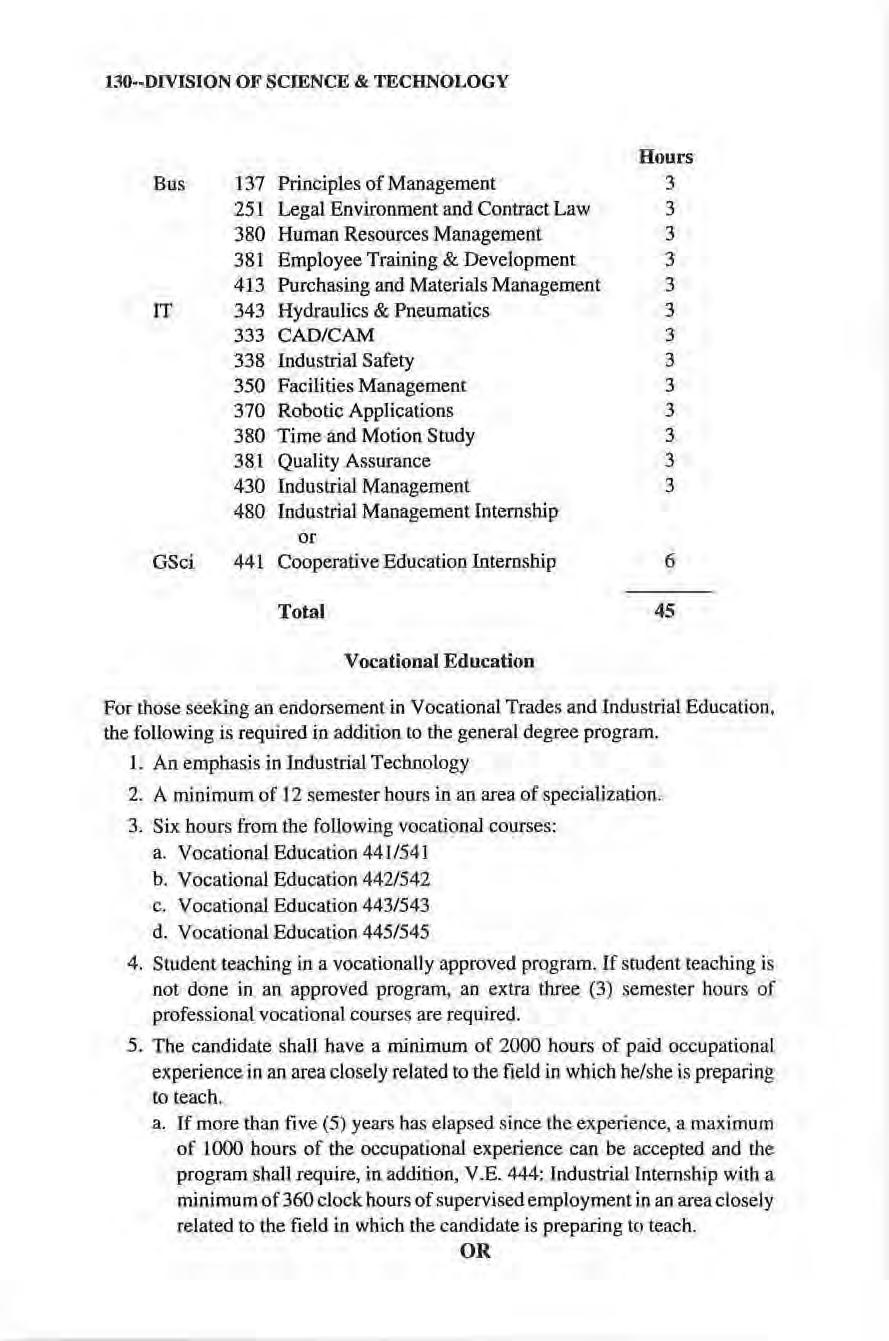
4. Student teaching in a vocationally approved program. If student teaching is not done in an approved program, an extra three (3) semester hours of professional vocational courses are required.
5. The candidate s hall have a minimum of 2000 hours of p a id occupati onal experience in an area closely rel at ed to the field in which he/she is preparing to teac h
a. If more than five (5) years has elapsed s ince the-experience, a maximum of l 000 h ou rs of the occupatioaal expeJience can be a ccepted and the program shall req uire, in addition, V.E. 444: Industrial lntemship wi th a minimum of360 clock hours of supervi sed employme nt in a n area closely related to the fie ld in which the cand idate is preparing to teach_ OR
130--DIVISION OF SCIENCE & TECHNOLOGY Hours Bus 137 Principles of Management 3 251 Legal Environment and Contract Law 3 380 Human Resources Management 3 381 Employee Training & D evelopment 3 413 Purchasing and Material s Management 3 IT 343 Hydraulics & Pneumatics 3 333 CAD/CAM 3 338 Indu strial Safety 3 350 Fac ilities Management 3 370 Robotic Applicati ons 3 380 Time and Motion S tudy 3 381 Quality Assurance 3 430 Industrial Management 3 480 Indu strial Management Internship or GSci 441 Cooperative Education Internship 6 Total 45 Vocational Education
The cand idate shall have a minimum of 1000 clock hours of full-time employment or the equivalent in accumulated part-time empl oyment plus comp letion of V.E. 444: Industrial Internship, with a minimum of 360 clock hours of supervised work experience in an area clo sely related to the field in which the candidate is preparing to teach.
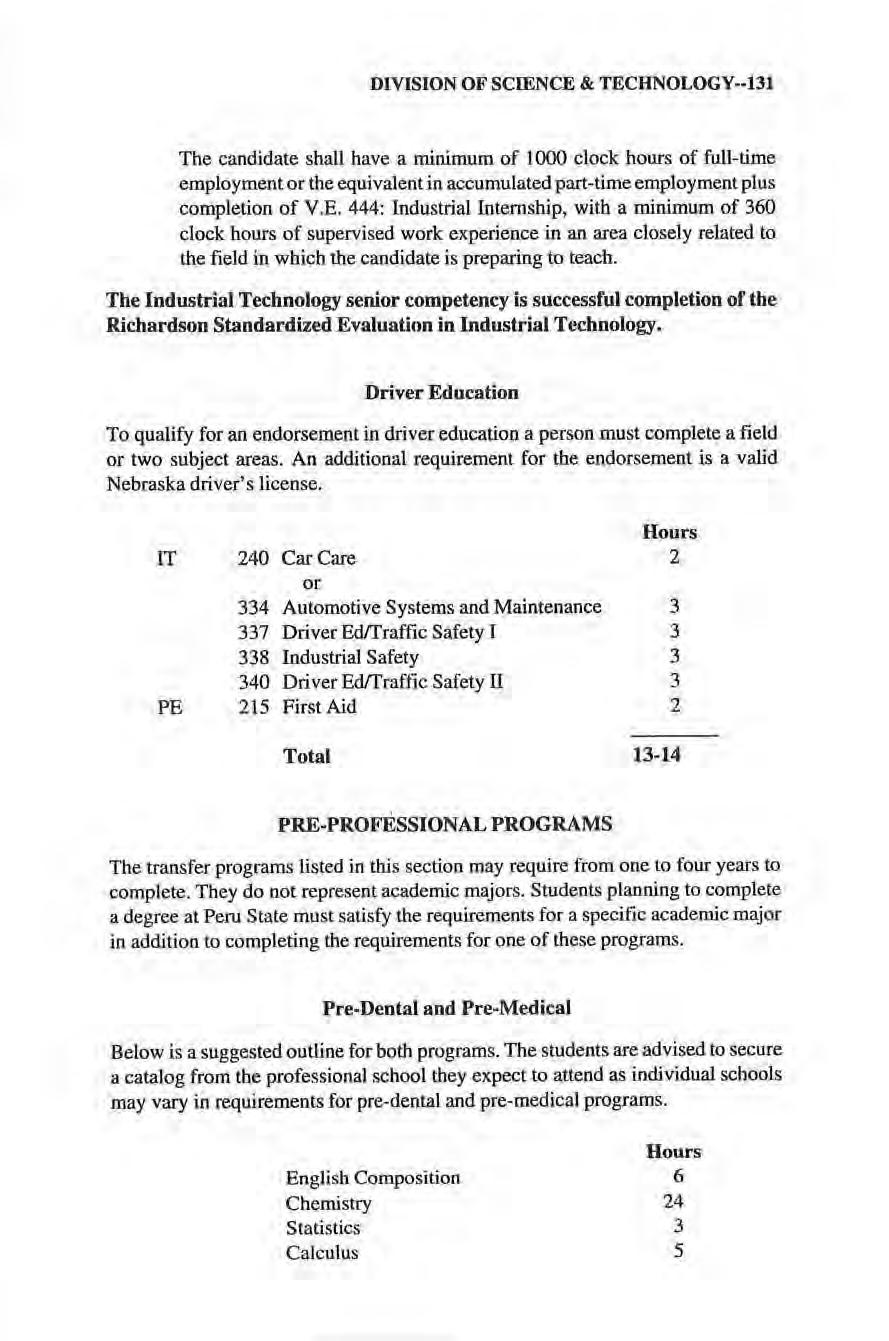
The Industrial Technology senior competency is successful completion of the Richardson Standardized Evaluation in Industrial Technology.
Driver Education
To qualify for an endorsement in driver education a person must complete a field or two subject areas. An additional requirement for the endorsement is a valid Nebraska driver' s license
The transfer programs listed in thi s section may require from one to fo ur years to complete. They do not represent academic majors. Students planning to complete a degree at Peru State must satisfy the requirements for a specific academic major in addition to completing the requirements for o ne of these programs.
Pre-Dental and Pre-Medical
Below is a suggested outline for both programs. The s tudents are advised to secure a catalog from the profe ssi onal school they expect to attend as individual schools may vary in requirements for pre-dental and pre-medical programs.
DIVJSION OF SCIENCE & TECHNOLOGY--131
IT PE 240 CarCare or 334 Automotive Systems and Maintenance 337 Driver Edtrraffic Safety T 338 Industrial Safety 340 Driver Ed/Traffic Safety II 215 First Aid Total PRE-PROFESSIONAL PROGRAMS Hours 2 3 3 3 3 2 13-14
English Composition C hemistry Statistics Calculus Hours 6 24 3 5
The fol lowing courses are suggested for admittance into a dental hygiene program:
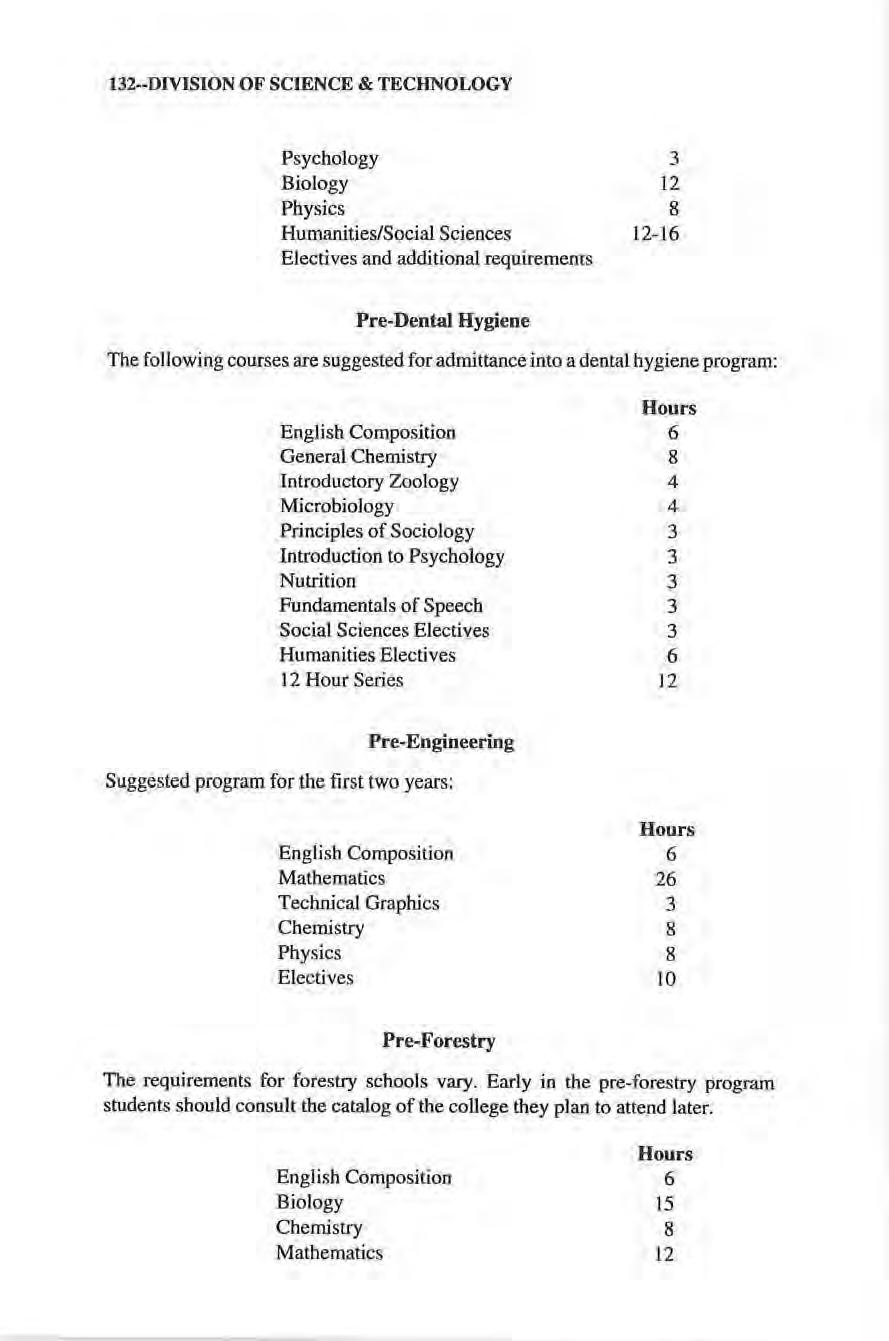
Suggested program for the first two years:
The requirements for forestry schools vary. Early in the pre-forestry program students should cons ult the catalog of the college they p l an to attend later.
132--DIVISION OF SCIENCE & TECHNOLOGY Psychology 3 Biology 12 Physics 8 Humanities/Social Sciences 12-16 E lectives and additional r equirements Pre-Dental Hygiene.
English Composition General Chemistry Introductory Zoology Microbiology Principles of Soc iology Introducti on to Psychology Nutrition Fundamentals of Speech Social Sciences Electives Humanities Electives 12 Hour Ser:ies Pre-Engineering
English Composition Mathematics Technical Graphics Chemistry Physics Electives Pre-Forestry Ho urs 6 8 4 4 3 3 3 3 3 6 12 Hours 6 26 3 8 8 10
English Composition Biology Chemistry Mathematics Hours 6 15 8 12
The following program is suggested as a prerequisite for entering a college of mortuary science:
The basic science and humanities requirements for nursing programs vary depend• ing on the school selected and the level of training offered (i.e., diploma, associate degree or baccalaureate degree program). The pre-nursing student's urged to obtain a copy of the catalog of the nursing school selected to insure proper planning for transfer. The following courses are suggested for a one-year pre-nursing program. A second year of coursework may be necessary for students enterin g a B.S.N. program.
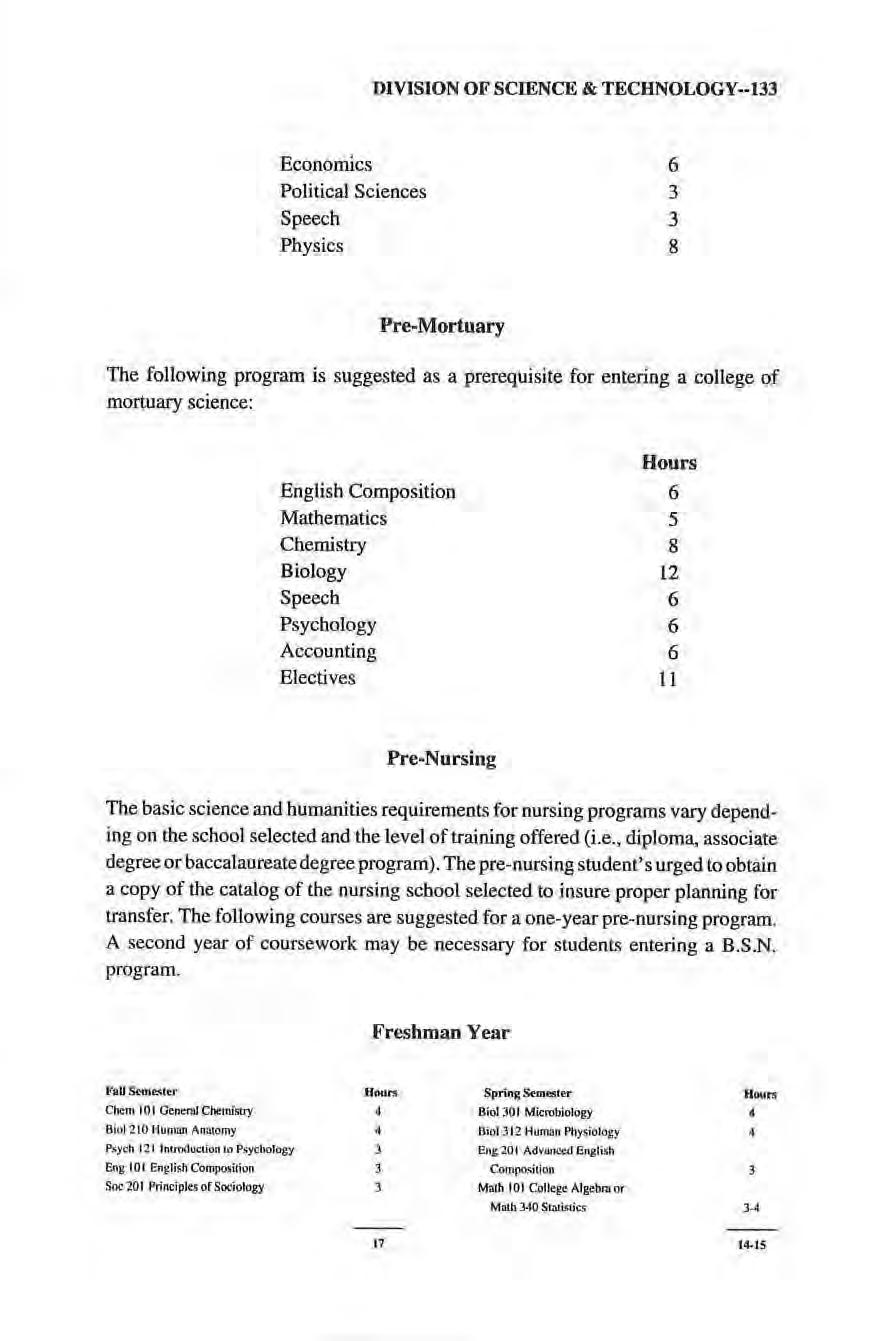
l'aUSt-m~tcr-
O,em IO I Geneml Chernfs,ry Biol 2 lO Huma,, Aoa1omy
P~yc:h I'l l Jntmdoclion to P$ychology Eljg IOI Engli~ Composi1ion
DIVISION OF SCIENCE & TECHNOLOGY--133 Economics Political Sciences Speech Physics Pre-Mortuary 6 3 3 8
English Composition Mathematics Chemistry Biology Speech Psychology Accounting Electives Pre-Nursing Hours 6 5 8 12 6 6 6 11
201 Principles
Sociology Freshman Year 17 Spring SemeslerBiol 301 Microbiology Biol J 12 Human Pf)y,iotogy E11i;20 I Advunced Engli,h Compo:i:i1lon Maih IO I College Algebra or Moth J.10 Stnti:."UcsKoo"' 4 4 3-4 14-15
Soc
or
In addition to a total of at l east 9 0 semester hours of credit, stude nts accepted for admissio n must have co mp leted coursework in the following specific areas:
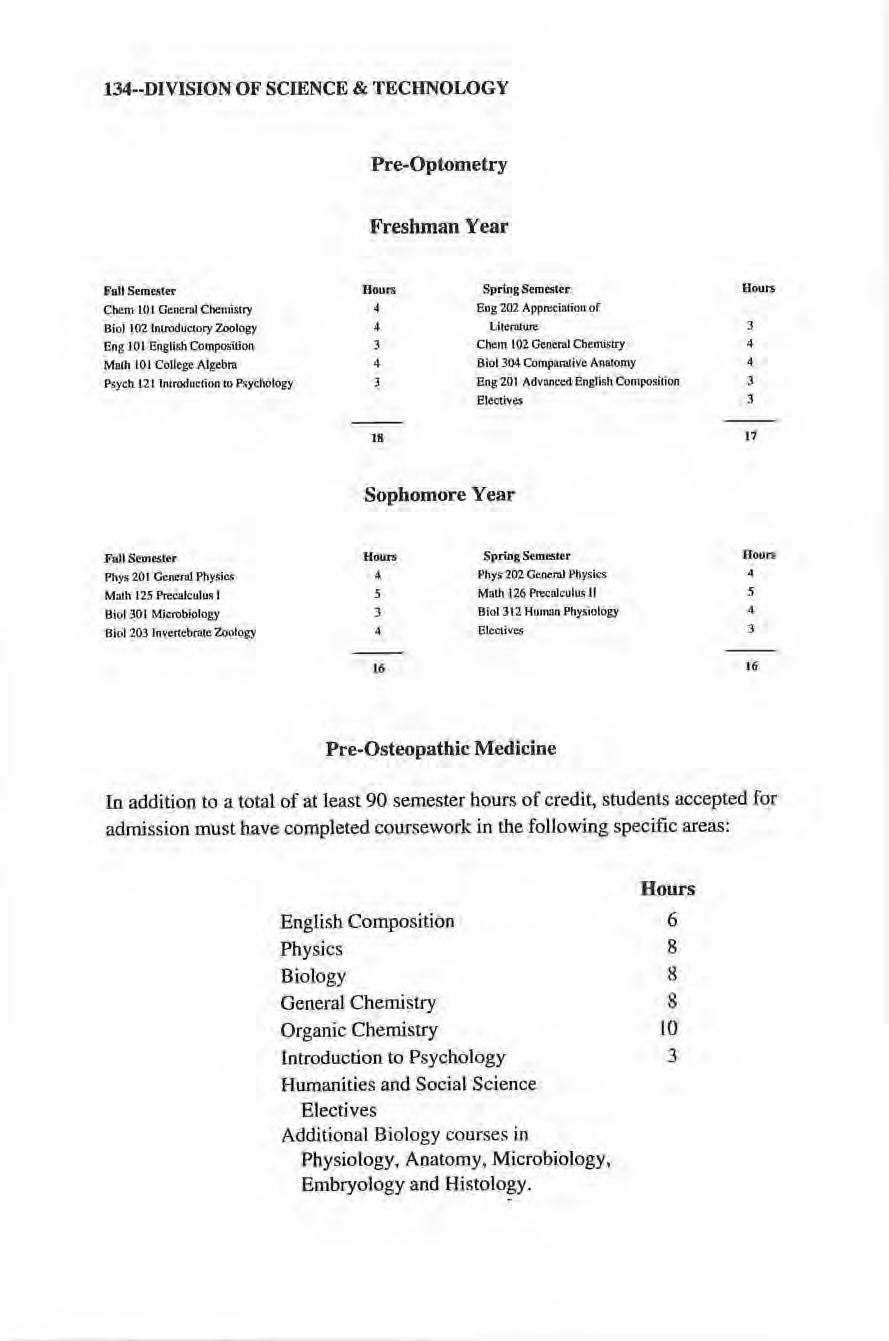
134--DIVISION OF SCIENCE & TECHNO LOGY Full Seme.,tor Chent lO I Gc:ucral Cberni~try Biol IO'l lnoroduciory Z.OOlogy Eng l OI Englil<h Composition Molh 101 Co!lcgcAlgcbm Psych 111 Introduction 10 Psychology FaJJStm<St,r Phys 201 Ocnoml Physic,< Molh 125 Precolculus I Blol 301 Micmbiology Blol 203 lnvcrtcb!111C ZoolQgy Pr~Optometry Freshman Year Hoots 4 3 4 I& Sprtng Seme.ter Eng 202 Appreciotion or Lltcn>turc Chem I02 Cenc1'1'1 Chemi.stry Biol 304 Componllivc AMtomy Bni 201 AdvMc:<.-d ~nglish Composi1ion electives: Sophomore Year HourS Spring Sem tcr !I Phy~:102 Ocnor.il Physics 5 M oth ,126 Pnocalculu• II 3 Biol 3L2 Humnn Physiology A 61cc:tive.,,; 16 Pre-Osteopathic Medicine Boun 4 4 3 3 17 Rours 4 5 4 3 16
English Composition Phy sics Biology General C h emistry Organic Chemistry Introduction to Psychology Humanities a nd Social Science E lec tive s Additional Biology cou rses in Physiology, Anatomy, Microbiology, Embryology and Hi s to logy . Hours 6 8 8 8 10 3
Restricted electives should be from the foUowing areas: Humanities, Social Sciences, and Behavioral Sciences. Additional electi ves should be selected from the areas of Physics, Chemistry, Compu ter Science, Mathematics, Business Administration. Stude[lts shou ld refer to co llege p harmacy catalogs for more information.
Pre-Physical Therapy
The following courses are s ugge sted forstudents ioterested in Phys ical Therapy : FeU
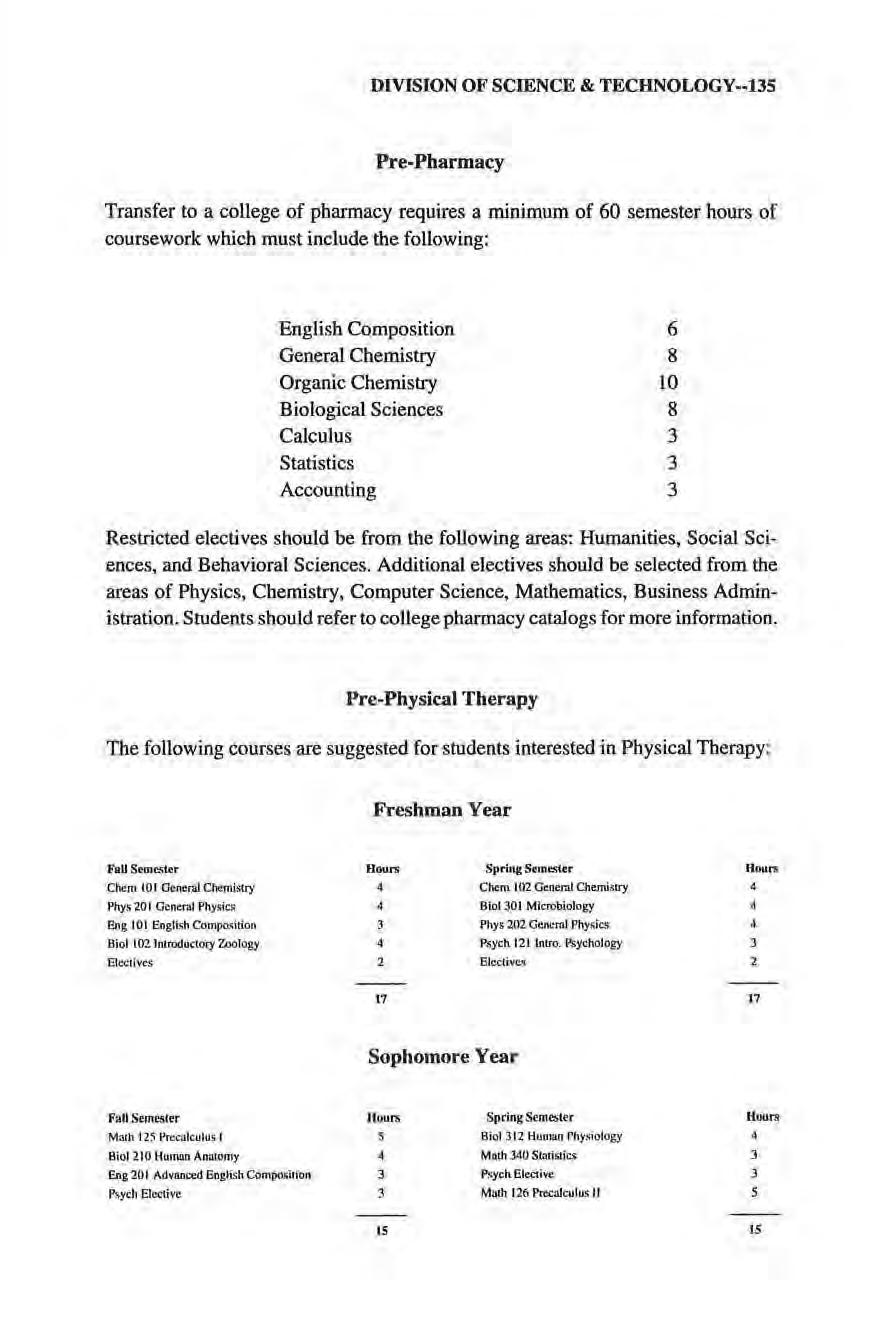
DIVISION OF SCIENCE & TECHNOLOGY--135 Pre-Pharmacy Transfer to a college of pharmacy re qu ires a mini mum of 60 semester hours of coursework which must include the following: Eng lish Composition 6 General Chemistry 8 Organic Chemistry IO Biological S ciences 8 Calc ulu s 3 Statis tics 3 Accounting 3
Srm~t.er Chem IOI
20
Physic, Eng I OI English Compmition Biol 102 lntroduCIO{)' Zool ogy Elt."CfiVCS f all Semesler Maih t 2~ Procalculu.s f Biol 210 Ruman A nmomy Eng 201 Adeanced English Con1pmi1fon Psych Elective Freshman Year Boun 4 4 4 2 17 Sp ring Semester Chem 102 General Chemi, 1ry Biol 3 01 Microbiology Phy, 2112 Gcncrnl Phy•oc.s ~ych 121 Intro" P$ychology Blccti'vesSophomore Year llours s 4 3 l 15 Spri11g Scme.ler Biol 312 Human Physiology MQ<h 340 Stoti<li<:$ Psych Elective Moth 126 Pr«:nltulu< If, Hou~ 4 4 3 2 17 Hours 15
OeiicntlChemiSlr)' Phy•
I Generol
136--DIVISION OF SCIENCE & TECHNOLOGY
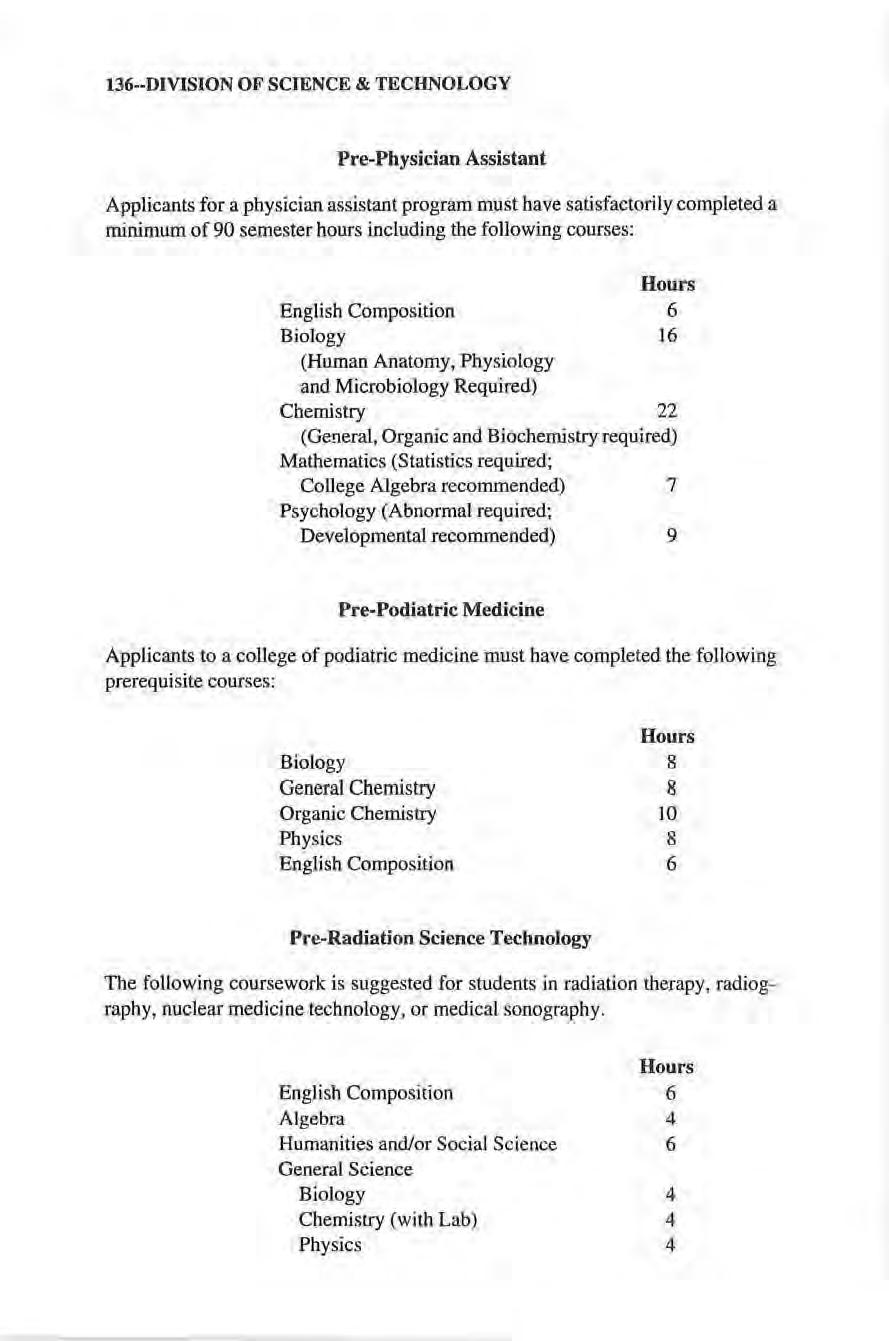
Applicants for a physician assistant program must have satisfactorily completed a minimum of90 semester hours including the following courses:
Applicants to a college of podiatric medicine must have completed the following prerequisite courses:
The following coursework is suggested for students in radiation therapy, radiography, nuclear medicine technology, or medical sonography.
Assistant
Pre-Physician
English Composition Biology (Human Anatomy, Phy siology and Microbiology Required) Hours 6 16 Chemistry 22 (General, Organic and Biochemistry required) Mathematics (Statistics required; CoUege Algebra recommended) Psychology (Abnormal required; D evel opmental recommended) Pre-Podiatric Med icine 7 9
Biology General Chemistry Organic Chemistry Physics English Compos ition Pre-Radiation Science Technology Hours 8 8 JO 8 6
English Composition Algebra Humanities and/or Social Science General Science Biology Chemistry (with L ab) Physics Hours 6 4 6 4 4 4
Pre-Respiratory Therapy
The following co urses are suggested for students interested in entering a baccalaureate program in respiratory therapy.
VolJ S•m~er Biol 10'2 , introductory Zoology
Eng JO I English Composition
Speh 152 Fund,men!llls of Speh Fino Arts e.!octivc.• Eltctivcs
~·011 Semester Chem IOI General Chemistry Aioi 2IO Huml.\n A.n3tomy
CScl 100 Physics or
20 I General Physic.,
Semester Chom I02 Gener•! O,cmi<1ry Biol 312 Hunllln Pbys1ology
Pre-Veterinary Medicine
The courses listed below are suggested for Veterinary Science.
Freshman
foll Sem~ster Chem IOI Cienernl Ci,c,miruy Biol l<t2 loiroductory Zoology
Mruh 101 Coiicgo Algebra or
M;uh 125 Precalculus Malhumu1iq I
CSci 11)() Phy•los
~\ill Semester
C~m 205 Principlcyof
QualiJ:ufve A.nal;i~ i~ o r
Chem 303 O'1,'1lllicCt,erni<try
Eng 201 Advnocc<l English Co111po;l1iun Biol 407 D<,vd0pmcnlal Biology

E.li:clivl!S
Semest•r Chem 102 Gcnerut Oll:miStry Speh 152 Fuod•moomts o f Spe,.:I, lliol 311. Human Physiology Eng 101 llngllsh Com11<><illon Elec1ivc:s
Sophomore Year
Sprilin Sem~ler Chem '206 Principles of Qmunlmtlvc AnaJy~i$ or
Choon J04 Organic Chcml<1ry Biol 304 Con1par.11i•c Anulomy
.,
DIVISION OF SCIENCE & TECHNOLOGY--137
Electives Freshman Year nours 4 3 3 3 3 16 Spring Semester Biol 301 Microbiology Math IOI College Algebra Psych
lntro.10 Psychology E lectives Sophomore Year Hours 4 4 16
Electives
Pl,ys
121
Spring
Year Hours 4 4 4-S 4 16-.17 Spring
llours J <\ s 16-17
Biol
ttoor., 4 4 3 6 17 Rour., 4 4 8 16 Hours 4 3 4 3 J 17 Uoor< ll•U
•104 Gene1ic,
Medical Technology
Th.is is a transfer program. During the fust three years, the student must satisfy th e General Studies requirements for graduati on, complete a minimum of 90 semester hours applicable toward a baccalaureate degree, complete 24 semester hours of Chemistry, 16 hours of Biology, and at least one course each in Mathematics and Physics. The fourth year, which consists of a full twelve-month program, is spent in res idence at an approved school of Medical Technology which awards the degree.
Suggested Program for Medical Technology
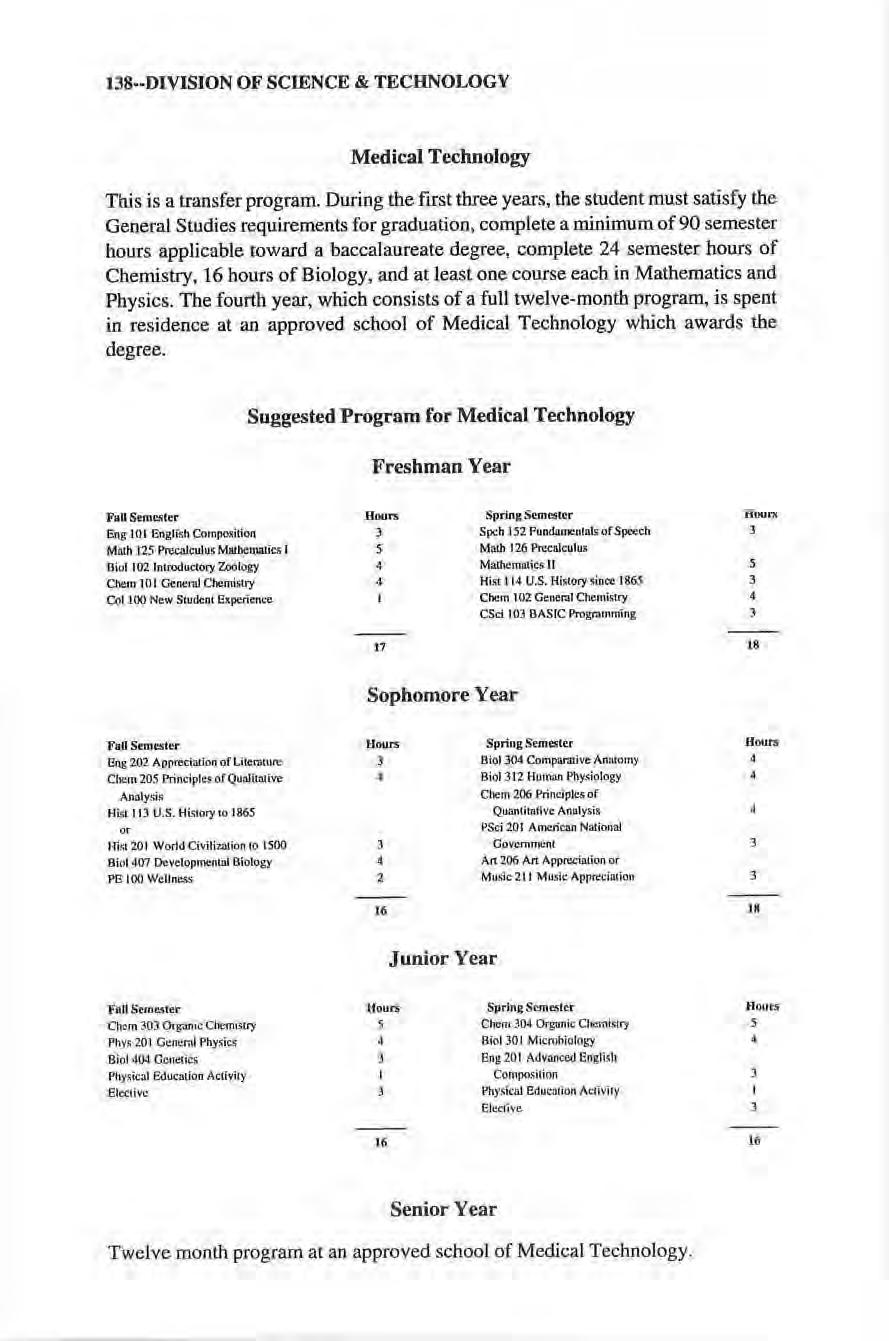
Freshman Year
Fa ll Semester
Eng 101 Engl ish Cotnf)OSilion
M<Uh l 2S Precalcul•$ M,atbcmatics I
ijiol 102 lnlroductory Zoology
Chem IOI General Chemi,try
C.Ol 100 New S1udcnl E,pericn,-e
Hoon, J s 4 17
FaUSmu ter
&_g 202 Appmcia.tion of L ifcratunt
Ch•m 205 Principles orQualitruive
Analys is
Hist I 13 U.S Hl<tory to 1865 or
H1st 201 WortdCivili"'1ion to 1500
Biol 407 Developmental Biology
PE I 00 WcU m:ss
Fa USemester
Chem 30) Orgwiic Cli:mimy
Phy, 201 General Physic.s
Biol 4~ Genetic, Phy~ic-;il &1ucn1io n Adlvily Elccti'°i.:
Sprin~ S<me!ler
Speh J S2 Fundamc111alsQf Speech
Malb 126 l'roollculw; Malhcmoties II
Hist 11 4 lf.S. History !ince 186$
Chem 102 Getter:i.l Chemistry
CSd 101 BASIC Progrornrning
Sophomore Year
Hows
S pring Se-nu:sler
Biol 304 Compar:u_jve Ansmmy
Biol 3 1.! Hun,.,, Phy,<iology
C hem 206 Prindplc.,Qf
Q u1mtit11H\'c Amilysis
l'Sci 201 AnieriCM Nruionnl Govc.mmcnt
An 206 Art Appreciation or
Mu.slc2 ll Mu,lc Appm:iaiton
Junior Year Kours
~)Iring S cm,.ler
Chom 304 01pmio Cl.,misiry
Biol 30 I Micrnlliology
Bng 201 AdvonccJ Bogli,b Composition
l'hysfcal Educ~llon Act1vl1¥
138--DIVISION OF SCIENCE & TECHNOWGY
1 4 2 16
5 16
lcdlve
Tw elve mo nth program at a n approved schoo l of Medica l T echnology. Hounrc J 18 Boo rs 4 ffcx 1rs 3 I 3 16
E
Senior Year
Natural Resources
2 Plus 2 Agreement
The 2 Plus 2 Agreement in Natural Resources is a joint program between Peru State College (PSC) and the Colleges of Agricultural Sciences and Natural Resources (CASNR) at the University of Nebraska Lincoln (UNL) which allows PSC students to continue their education and study in a major leading to a Bachelor of Science Degree in Natural Resources. The agreement provides a basic knowledge plus specialized course work in natural resources. A student enrolled in this program may transfer all satisfac torily completed academic credits identified in the course sch edu le listed below, and enter CASNR to study in a major leading to a Bachelor of Science Degree in Naturnl Resources. Details of the agreement may be obtained from the Chair of the Division of Science and Technology.
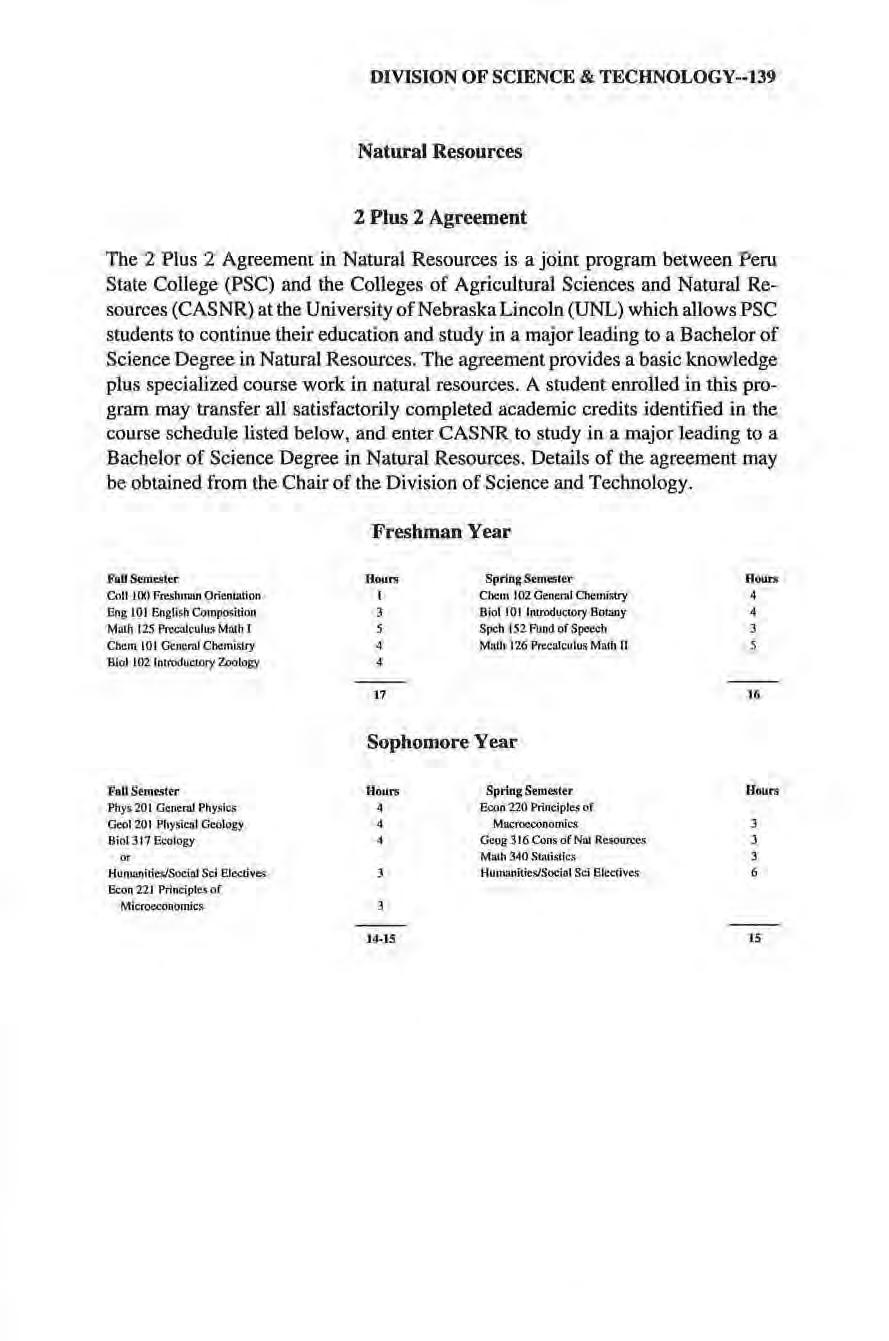
DIVISION OF SCIENCE & TECHNOLOGY--139
fall S.-m..t<r Coll 100 F~hmnn OrienUJtion llllg IOI BnglishComll0$ilio~ Mttth 125 Prccalculu, Math I Chem 101 Gencml Chem1,uy 810I 102 lntroductOI)' 7..oology Fall Stmcsler Phy• 201 Gcncml Phy,ics Geo! WI Phy,ical C.Ology Bini 317 Ecology or Hun'AAili~Socitd Sci Elcc.ti'i'CS' Econ 221 Principle, ot M;croeconomics Freshman Year Hour, I 3 5 4 4 17 Spnog Scme.ttr Chem J02 Gener-J I Chemistry Biol IOI Introductory Bot:1ny Speh IS2 Fund of Spe..:h Mnlh 126' Precolculus Moth II Sophomore Year llourg 4 4 4 J 14-15 Sp~ Semester llcon 220 Principles of Macroc.conomiCS Geog 316 Cons of Nat Ret0uruco Moth 3"0 S~'li<ilc,, Humanlties/Social Sc{ e.1ee1rve.c. Hoors 4 4 3 5 16 Hours 3 J 3 6 15
COURSE DESCRIPTIONS
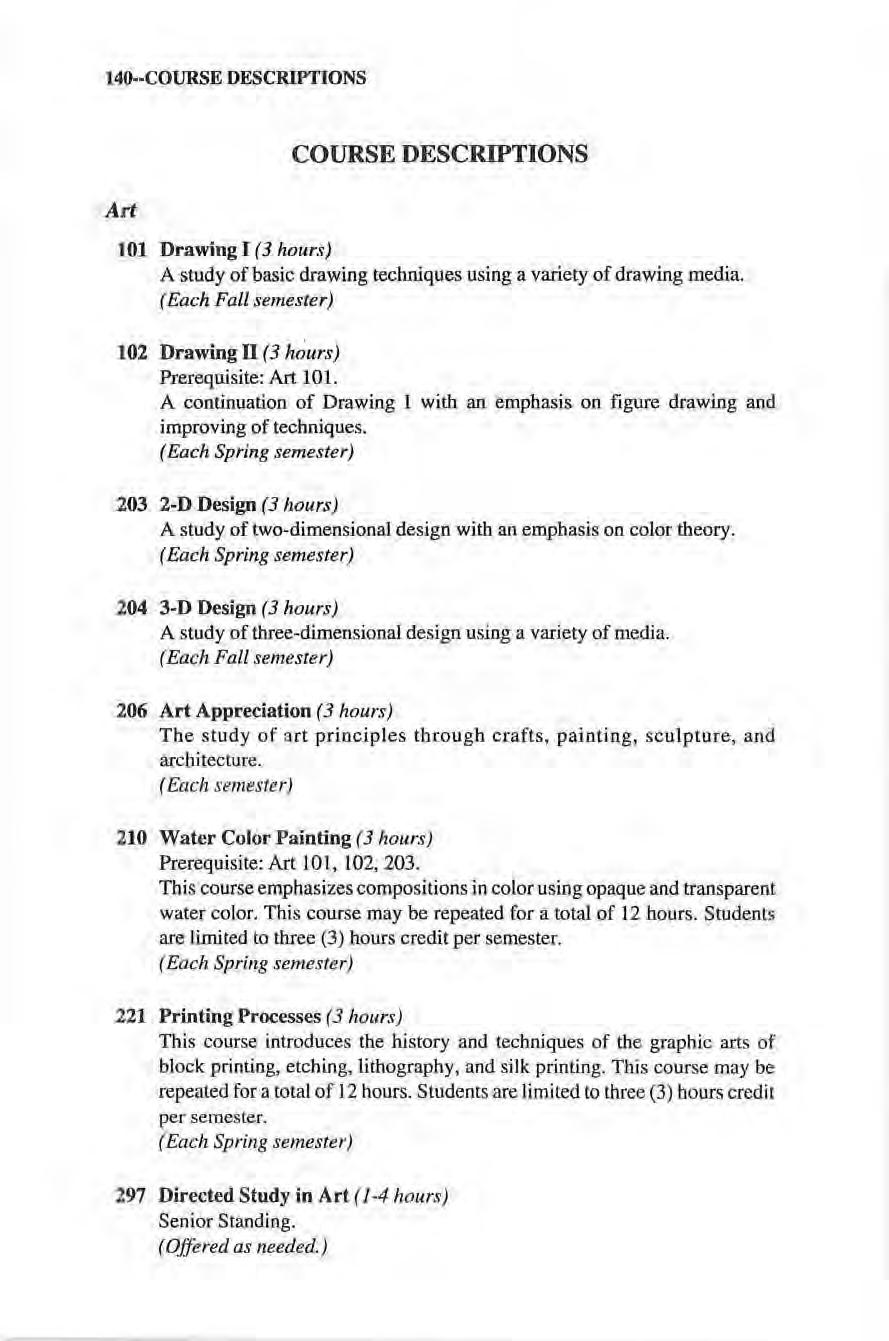
Art
101 Drawing I (3 hours)
A study of basic drawing techniques using a variety of drawing media.
(Each Fall semester)
102 Drawing 11 (3 hours)
Prerequisite: Art 101.
A continuation of Drawing I with an e{llphasis on figure drawing and improving of techniques.
(Each Spring semester)
203 2-D Design (3 hours)
A study of two-dimensional design with an emphasis on color theory.
(Each Spring semeste r)
204 3-D Design (3 hours)
A study of three-dimensional des ign using a variety of media.
(Each Fall semester)
206 Art Appreciation (3 hours)
The study of a rt principles through crafts, painting, sculpture , and architec ture .
(Ea ch semes ter)
210 Water Color Painting (3 hours)
Prerequisite: Art 101 , 102,203. This course emphasizes compos itions in color using opaque and transparent water col.or. This course may be repeated for a total of 12 hours. Students are limited to three (3) hours credit per semes ter.
(Each Spring seme ster)
2 21 Printing Processes (3 hours)
This course introduces the history and techniques of the graphic arts of block printing, etching, lithography, and silk printin g . This course may be repeated for a total of 12 hours. Students are limited to tllree (3 ) hours credit per semes ter.
(Each Spring semester)
297 Directed Study in Art ( 1-4 hours )
Senior Standing.
( Offered as neede d.)
140-•COURSE DESCRIPTIONS
298 Special Topics in Art ( 1-4 hours)
Freshman-Sophomore standing
(Offered as needed)
300 Pottery (3 hours)
Prerequisite: Art 204.
This course offers experiences in h and -bu il t and thrown projects includin g a basic study of glaze preparation ad clay analy s is . Students are limited to three (3) hours c redit per se m ester Thi s course may be repeated for a total of 12 hours.
(Each Fall semester)
3 05 Methods and S upervision (2 hours)
Prerequis ites: Art 101, 103, a nd 203 or 204. The study of contemporary art educatio n teaching techniques, lesson plans, teaching experiences, and the orderin g of materials with an emphasis upon the use of materials in the school art program
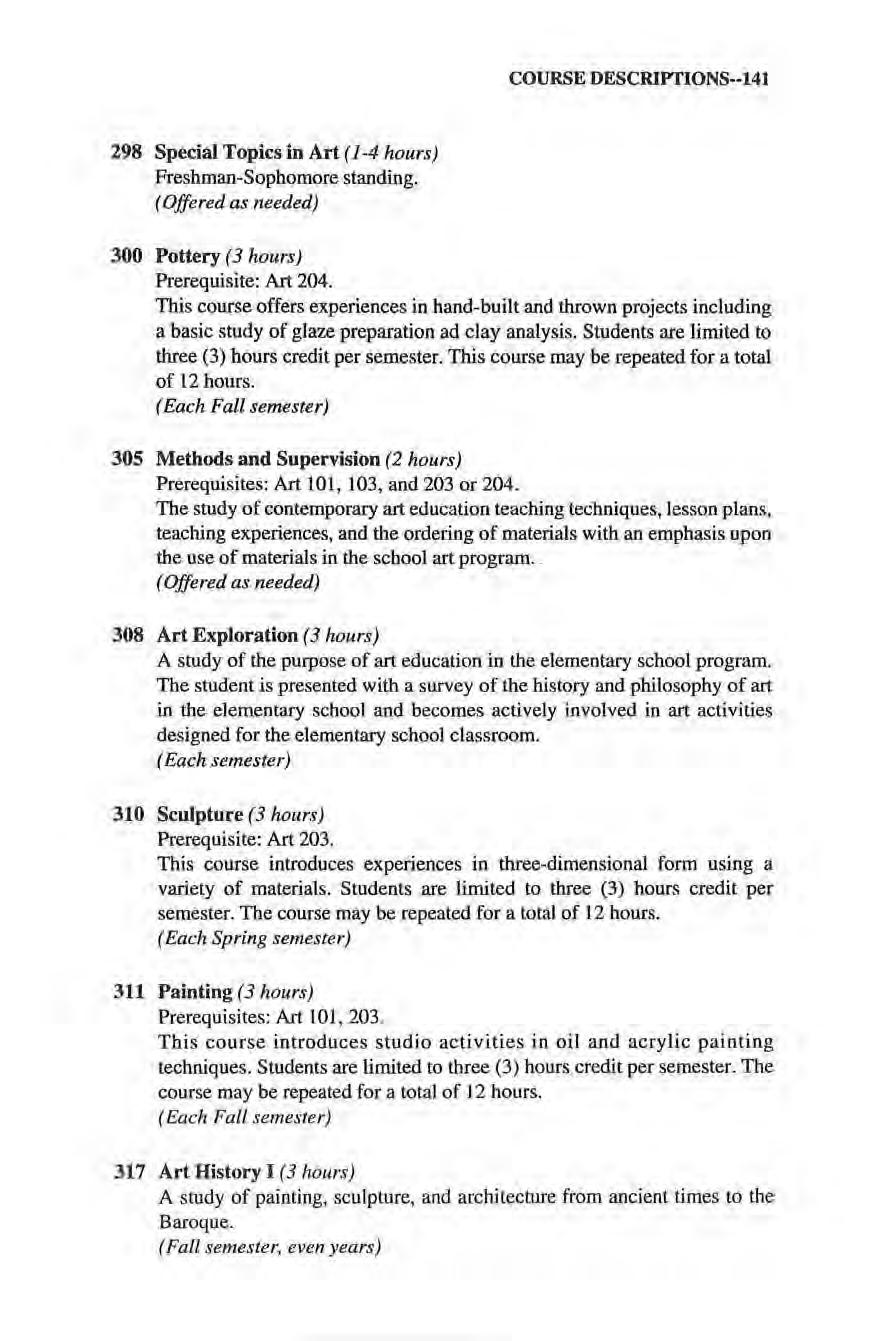
(Offered as needed)
308 Art Exploration (3 hours)
A study of the purpose of art education in the elemen tary school program. The student is presented with a survey of the history and philosophy of art in the el e men tary school aod becomes actively in vol ved io art activ ities des i gned for the e le mentary school class room
.( Each .semester)
3 10 Sculpture (3 hours)
Prerequisite: Art 203.
This course in troduces experiences in three-d imensional form using a variety of materials. Stud ents are limited to three (3) hours credit per semester. The course may be repeated fo r a total of 12 hours.
( Each Spring semester)
311 Painti ng (3 hours)
Prerequisites: Art 101 ,203
This co ur se introduce s stud io acti v ities in oi l and acry li c painting techniques. Students are limited to three (3) hours credit pe r semester. The course may be repeated for a total of 12 hours
( Each Fall semester)
317 Art H istory I (3 hours)
A study of painting, sculpture, and architecture from ancient times to the Baroq ue.
( Fall semester, even years)
COURSE DESCRIPTIONS- -141
DESCRIPTIONS
318 Art History Il (3 hours)
A s tudy of art from the 1800s through contemporary art trends. (Fall semester, odd years)
325 Figure Drawing ( 3 hours)
Prerequis ite: Art 101, 102, 20 3.
Figure drawing is a course that deals with drawing of the human anatomy from live models. This co urse may be repeated for a total of 12 tiours . Students are limited to three (3) hours credit per semester.
(Each Fall semester)
350 Studio Activities (3 hours)
An integrated course consisting of students working in vari ous art mediums. Students will be allowed to work in the field of their choosing; painting, sculpture, etc. This course may be repeated for a total of 12 hours. Students are limited to three (3) hours credit per semester.
( Each semester)
400 Senior Exhibition (0 hours)
Prerequisite: Senior standing.
A student in this course must create a minimum of two (2) n ew major pieces, mount and ban g their ex.bibition, design and print announcements/mailers, create their resume, as well as document their work by the u se of s lides (20 slid es su bmitted to the department). Senior Exhibition is the capstone course for a student's creative experience in art at PSC.
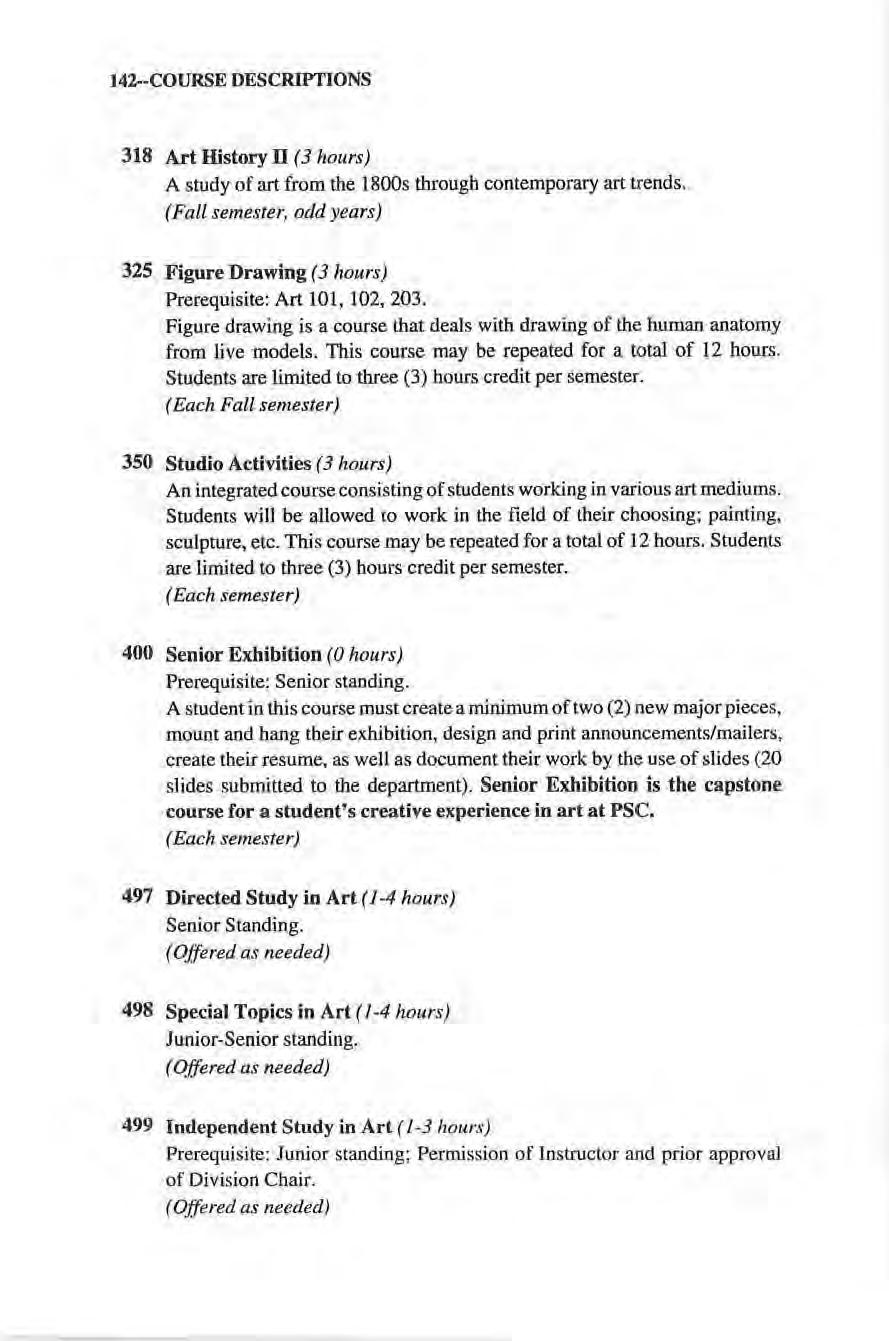
( Each semester)
497 Directed Study in Art ( 1-4 hours)
Senior Standing.
(Offered as needed)
498 Special Topics in Art ( 1-4 lwurs)
Jun ior-Sen ior standing.
( Offere d as needed)
499 Independent Study in Art ( 1-3 hours)
Prerequisite: Junior standing; Permiss ion of Ins tructor and prior approval of Division Chair.
(Offered as needed)
142--COURSE
Biological Science
101 Introductory Botany (4 hours)
This is a cou rse designed for science and n on -science majors which includes theoretical and practical aspects of plant functions. T hree hours classwork. two hours l aboratory
(Each Spring semester)
102 Introductory Zoology (4 hours)
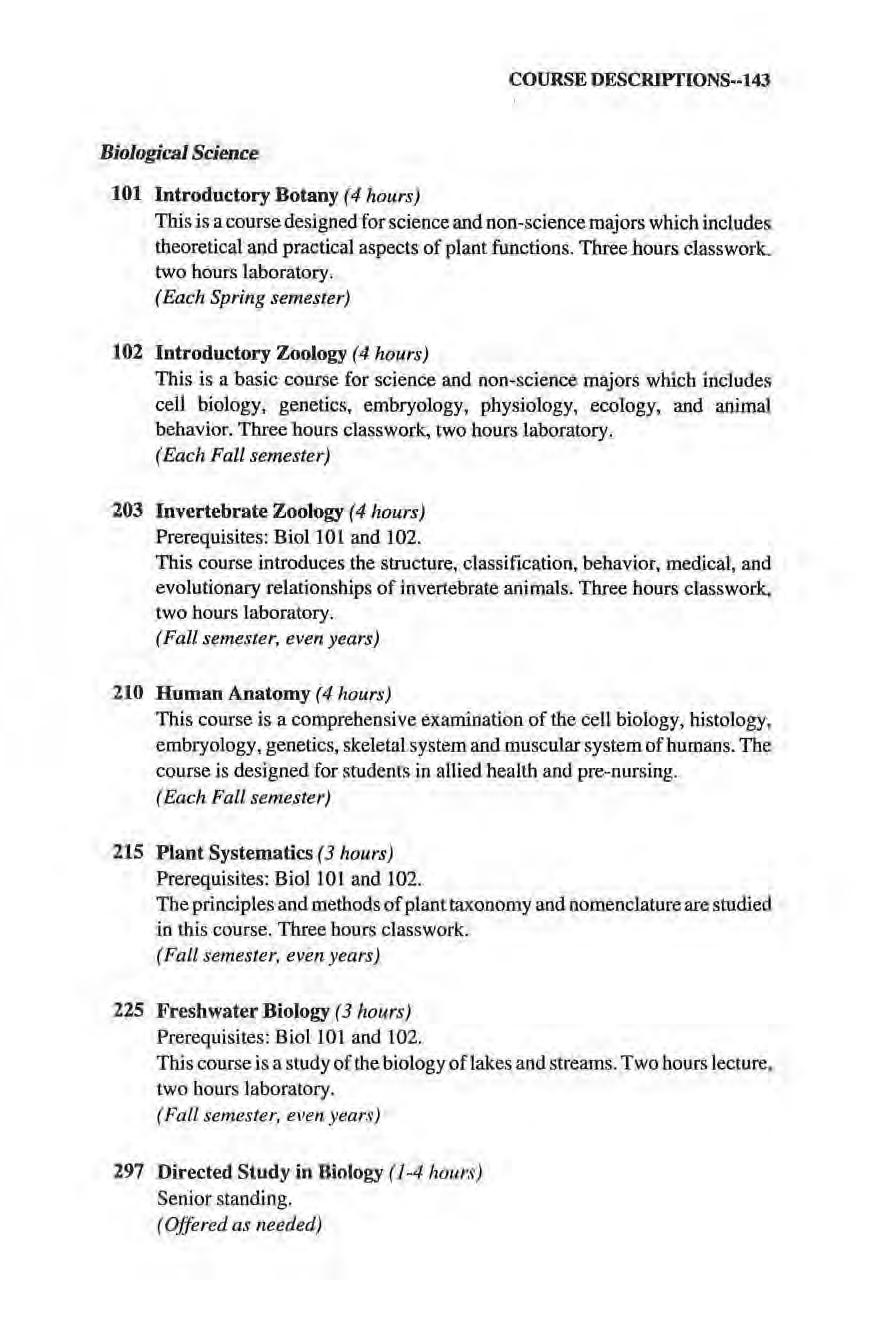
This is a basic course for science and no n-science majors which includes ceU biology, genetics, embryology, physiology, ecology, a nd animal behavior. Three hours classwork, two hours laboratory.
(Each Fall semester)
203 Invertebrate Zoology (4 hours)
Prerequisites: Biol 101 and 102. This course introduces the structure, c l assification, behavior, medica l, and evol utionary relationships of invertebrate animals. Three hours classwork, two hours laboratory.
(Fall semester, even years)
210 Human Anatomy (4 hours)
This course is a comprehensive examination of the cell bio logy, histology, embryology, gene tics, skeletal system and muscular system of hum ans. The co urse is designed for students in alli ed health and pre-nursing
(Each Fall semester)
215 Plant Systematics (3 hours)
Prerequisites: Biol 101 and 102.
The principles and methods of plant taxonomy and nomenclature are studied in this course. Three hours classwork .
( Fall semester, everi years)
225 Freshwater Biology (3 hours)
Prerequisi tes: Biol 101 and 102. This course is a study of the biology oflakes and streams. Two hou rs lecture , two hours laboratory.
( Fall semeste r, even years)
297 Directed Study in Bio logy (1-4 hour.~ ) Senior standing.
(O.ffered as needed)
COURSE DESCRIPTIONS--143
DESCRIPTIONS
298 Special Topics in Biology ( 1-4 hours)
Freshman-Sophomore s tanding. (Offered as needed)
301 Microbiology (4 hours)
Prerequisites: Biol 101 and 102; or 210. This course provides an introduction to the fteld of microbiology with emphasis on medical laboratory skills and microbiology technique. Two hours classwork, four hours laboratory.
(Each Spring semester)
304 Comparative Anatomy (4 hours)
Prerequisites: Biol IO I and 102.

The evoluti o nary relationships of vertebrates are studied anatomically in this course. Three hours classwork, two hours l aboratory
(Spring semester. odd years )
312 Human Physiology (4 hours)
Prerequisites: Biol 102 and 2 10.
This course ex.amines the functions of the human body i ncluding the nervous, cardiovascular, respiratory, endoc rin e, urinogenital, cligestive. and immune systems. Emphasis is placed on the body's homeostatic control mechanisms.
(Each Spring semester)
317 Ecology (4 hours)
Prerequisites: Biol 101 and 102 .
Organi s ms includi n g th eir interactions with each other and th eir environment are studied i.n this course Three hours class work, t wo hours laboratory.
(Fall semester, odd years)
395 Mam ma logy (3 hou rs)
Prerequ isites: Biol 101 and 102.
This course is a study oJ mammals w ith an emphasis on mid western species. Two hours lecture, two hours laboratory. (Fall semester, od.d yea rs)
40 4 Genetics (3 h ours)
Prerequisites: Biol 101 and 102.
In this course, Mendelian princi pl es of be redity w ith spec ial emphasis on current advances are covered. Three hours classwork (Fall semester, odd years)
144--COURSE
405 Histology (4 hours)
Prerequisite: Biol l02.
This course studies the microscopic anatomy ofmammaHan tissue and organ systems with an emphasis on medical applications. Three hours classwork, two hours l aboratory.
(Offered as needed)
407 Developmen tal Biology (4 hours)
Prerequisites: Biol 101 and 102. This course is a study of the mechanisms of development in plants a nd animals. Three hours classwork, two hours laboratory.
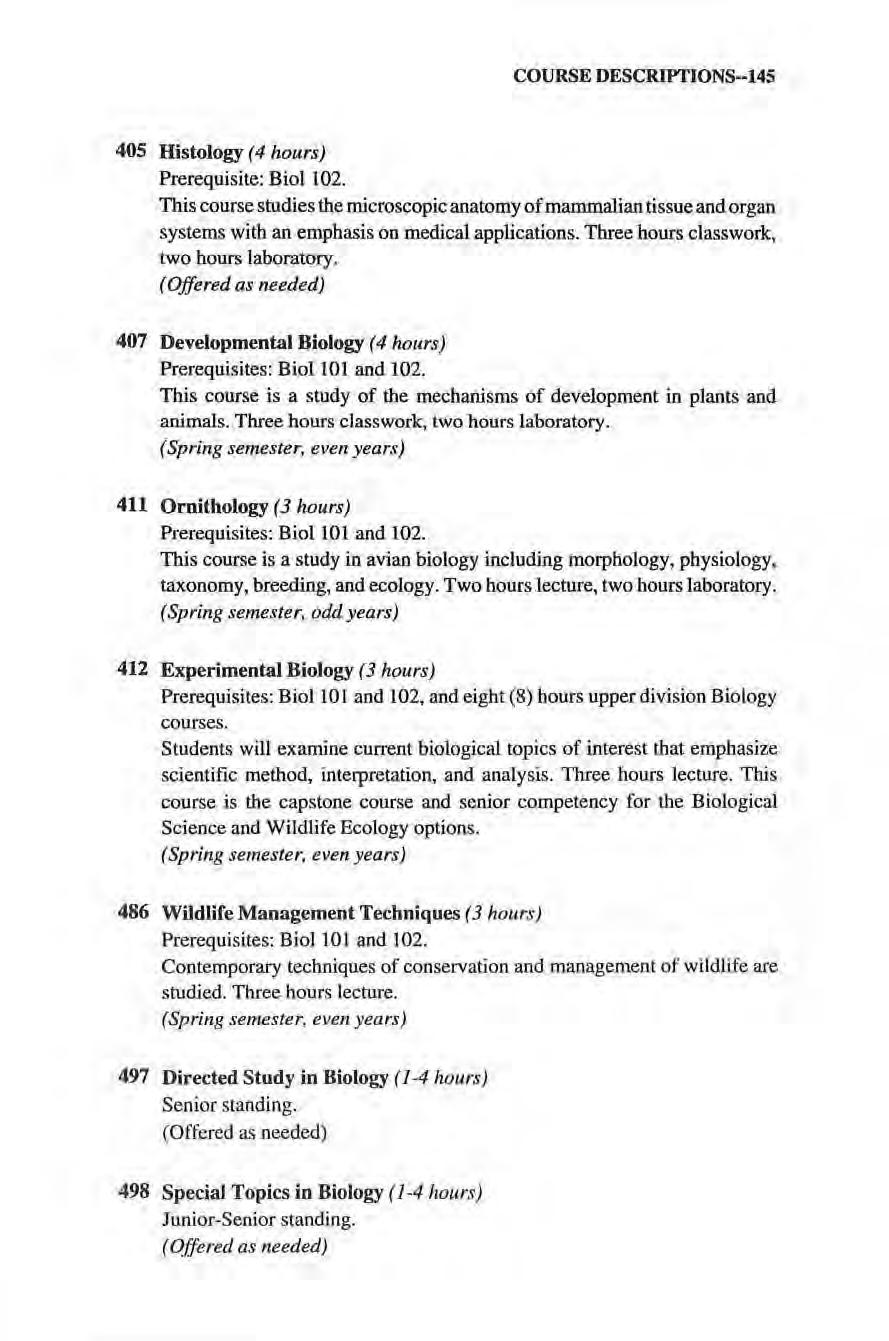
(Spri11g semester, even years)
411 Ornithology (3 hours)
Prerequisites: Biol 101 and 102. This course is a study in avian biology including morphology, physiology, taitonomy, breeding, and ecology. T wo hou rs lecture, two hours laboratory. (Spring semester, odd years)
412 Experimen tal B iology (3 hours)
Prerequisites: Biol 101 and 102, and eight (8 ) hours upper division Biology courses.
Students will examine current b iological topics of interest that emphasize scie ntific method, interpretation, and analysis. Three hoUIS lecture. This course is the capstone course and senior competency for the Biological Science and Wildlife Ecology options.
(Spring semester, even years)
486 Wildlife Management Techniques (3 hours)
Prerequ isites: Biol 10 1 and 102.
Contemporary techniques of conservation and management o f wildlife are studied. Three hours lecture. (Spring semester, even years)
497 Directed Study in Biology (1-4 hours)
Senior standing.
( Offe red as needed)
498 SpeciaJ Topics in Biology (1-4 hours)
Junior-Senior standing
(Offered as needed)
COURSE DESCRIPTIONS-•14S
DESCRIPTIONS
499 Independent Study in Biology ( 1-3 hours)
Prerequisite: Junior standing; Permission of Ins tructor and prior apptoval of Division Chair
( Offered as n eeded)
Business
080 Computer Keyboarding ( 1 hour)
Prerequisite: Permission of Instructor required.
This is a beginning course for persons with little or no previous keyboarding instruction. It introduces the s tandard computer keyboard and develops correct techniques for attaining useful levels of speed and accuracy. This course is graded on a credit/no c redit basis.
(Each semester)
137 Principles of Management (3 hours)
Th.is ~ourse is a comprehensive introductory course for managers in all organizations. P lanning, problem solving, goal attaining, controlling, and leading are studjed in thi s course. Contemporary management issues and current trends that affect managers will be discussed.
(Each Fall semester)
229 Software Applications (3 hours)
Prerequisite: Keyboarding Ability
This coUJse is an introducti.on to MS-DOS and IBM-based softw are currently used in industry. Development of proficiency using selected commercial software packages i s stressed.
(Each semester)
231 Principles of Financial Accounting (3 hours)

Th.is course introduces students to the process of recording financial data and preparing periodic financial statements. The comple te accounting cycle will be studied. Four hours of attendance per week is required.
(Each Fall semester)
232 Principles of Managerial Accounting ( 3 hours)
Pre req uisite: Bus 23 1.
This course is a continuation of Bus 231, considering the accounting process for a corporation. The student is introduced to accountLog theory, finan c ial statement analysis and cost accounting. Four hours of attendance per week is required.
(Each Spring ,1·emester)
146--COURSE
241 Cooperative Education Internship ( 1-4 hor,rs)

Prerequisite: 15 hours of completed coursework, minimum GPA 2.0; Permission of Cooperative Education Staff and Division Chair. This program is designed for students with an intended major in theBusiness Division to explore and/or gain work experience related to their major and anticipated career goals. Students may emoll for 1-4 hours of credit which will be graded on a credit/no credit basis. A minimum of forty hours of work experience will be required for every hour of credit per semester. The student will complete necessary paperwork with the employer and the Cooperative Education office. The student's work will be supervised by Cooperative Education staff. A final paper will be prepared at the conclusion of the internship. Three semester hours of Bus 241 or Bus 441 may be applied toward the Management option.
( Each semester; sL<mmer session)
250 Salesmanship (3 hours)
Students focus on the skills and techniques used in selling and persuasion. The course is designed to help the student learn to sell products and ideas through a study of proven techniques used by successful salespeople.
(Each Fall semester)
2S1 Legal Environment and Contract Law ( 3 hours)
This course examines the source and origin of law and the legal system, and obligations of parties to a contract.
( Each Fall semester)
297 Directed Study in Business ( 1-4 hours)
Senior standing.
(Offered as needed)
298 Special Topics in Business (1 -4 hours)
Freshman-Sophomore s tanding.
(Offered as needed)
301 Organizational Communications (3 hours)
Prerequisite: Speh 152; Eng 201.
Students study tbe role of business letters and reports in communication and human relation s and problems faced by writers of letters and reports. Other topics of s tady and analysis include presentational methods in formal business speaking, sales and motivational strategies, conflict reso lution, conducting successful mee tings, using visual aids in the business sett ing and conducting and participating in interview s.
(Each sem este r)
COURSE DESCRIPTIONS--147
328 Principles of Marketing (3 hours)
Students learn the buying, selling, transporting, an d storing functions involved in marketing, with an introduction to retailing, who lesaling, and marketing management.
(Each Fall semester)
329 Advertising ( 3 hours)
Prerequisite: Bus 328 recommended.
Students examine various advertising media, their relati ve costs, the ethics and regulations involved, and the techniques used
(Each Fall semester)
331 Insurance (3 hours)
This course presents essentials of an insurable risk, uses of insurance, and a brief study of the more important types of insurance.
(Offered as 11eeded)
332 Investments (3 hours)
This course utilizes economic principles in evaluating the major uses of investment funds, including savings accoun ts in banks and other financial institutions, governmen t bonds, corporate stocks and bonds, annuities, and real estate.
(Offered as needed)
335 Production/Operations Management (3 hours)
Prerequisite: Bus 232, Math 340, Econ 221. Students study the evolution of operational management and its relationship to the total enterprise. Decision making, production and plant planning, systems design, manpower planning, and conlrol systems are considered.
(Each semester)
337 Intermediate Accounting I (3 hours)
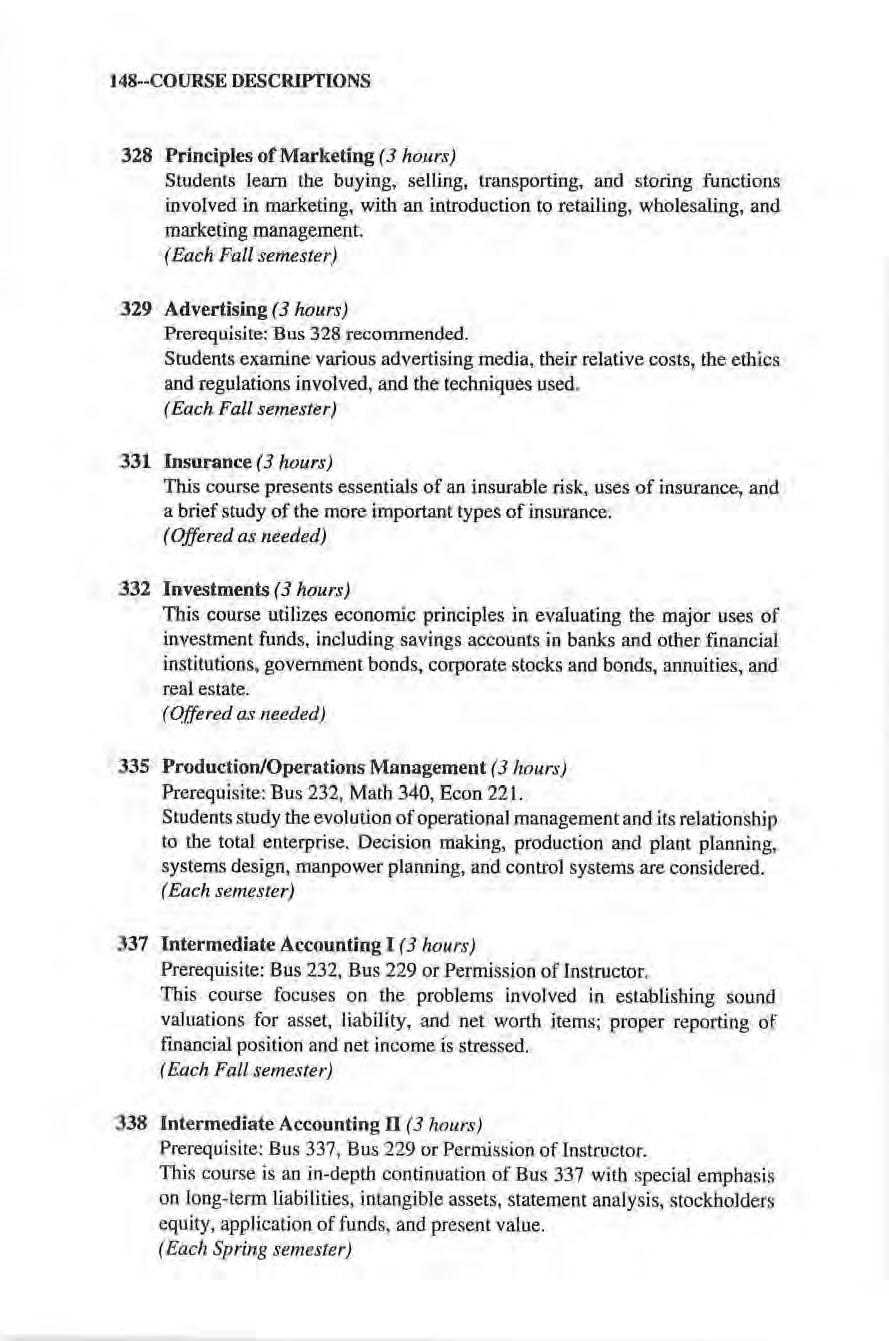
Prerequisite: Bus 232, Bus 229 or Permission of Instructor. Th is course focuses on the problems involved in establishing sound valuations for asset, liability, and net worth items; proper reporting of financial position a nd net income is stressed.
( Each Fall semester)
338 Intermediate Accounting II (3 hours)
Prerequisite.: Bus 337, Bus 229 or Permission of Instructor. This course is an in-depth continuation of Bus 337 with special emphasis on long- term liabilities, intangible assets, statement analy s is, stockholders equity, application of funds, and present value.
( Each Spring semester)
148--COURSE
DESCRIPTIONS
339 Business Finance (3 hours)
Prerequisite: Bus 232, Econ 220, Econ 221; Math l25 and Math 340 recommended.
Students examine the uses of funds to finance assets, internal and external sou rces of funds, and the costs of funds obtained from alternative sources under various conditions.
(Each semester)
341 Federa l Income Taxes - Individual (3 hours)
Prerequisite: Bus 232.
This course details federal law s, regulations, etc., as they pertain to the income taxation of individuals. A review of the history of taxation is included. Practice in tax return preparation and problem solving is provided. (Each Fall semester)
342 Accounting Information Systems Analysis and Design (3 hours)
Prerequisite: 'Bus 232, Bus 229 or Permission ofJnstructor.
This course provides an examination of accounting system co ncepts, applications, and the process by which they are analyzed, designed and implemented. Ao emphasis is placed on computer-based systems through the use of extensive case analysis
( Each Fall semester)
345 Real Estate Principles and Practices (3 hours)
This co urse presents real estate law as it affects marketing, ownership, interests, sales, leases, and agencies. Tbe financial, marketing, and managerial aspects of real property will be introduced,
(Offered as needed)
346 Financial Institutions and Markets (3 hours)
Prerequisite: Econ 220
Students study the various institutions which constitute the United States financial system, an analysis of financial markets, and study of inte rest rate determination.
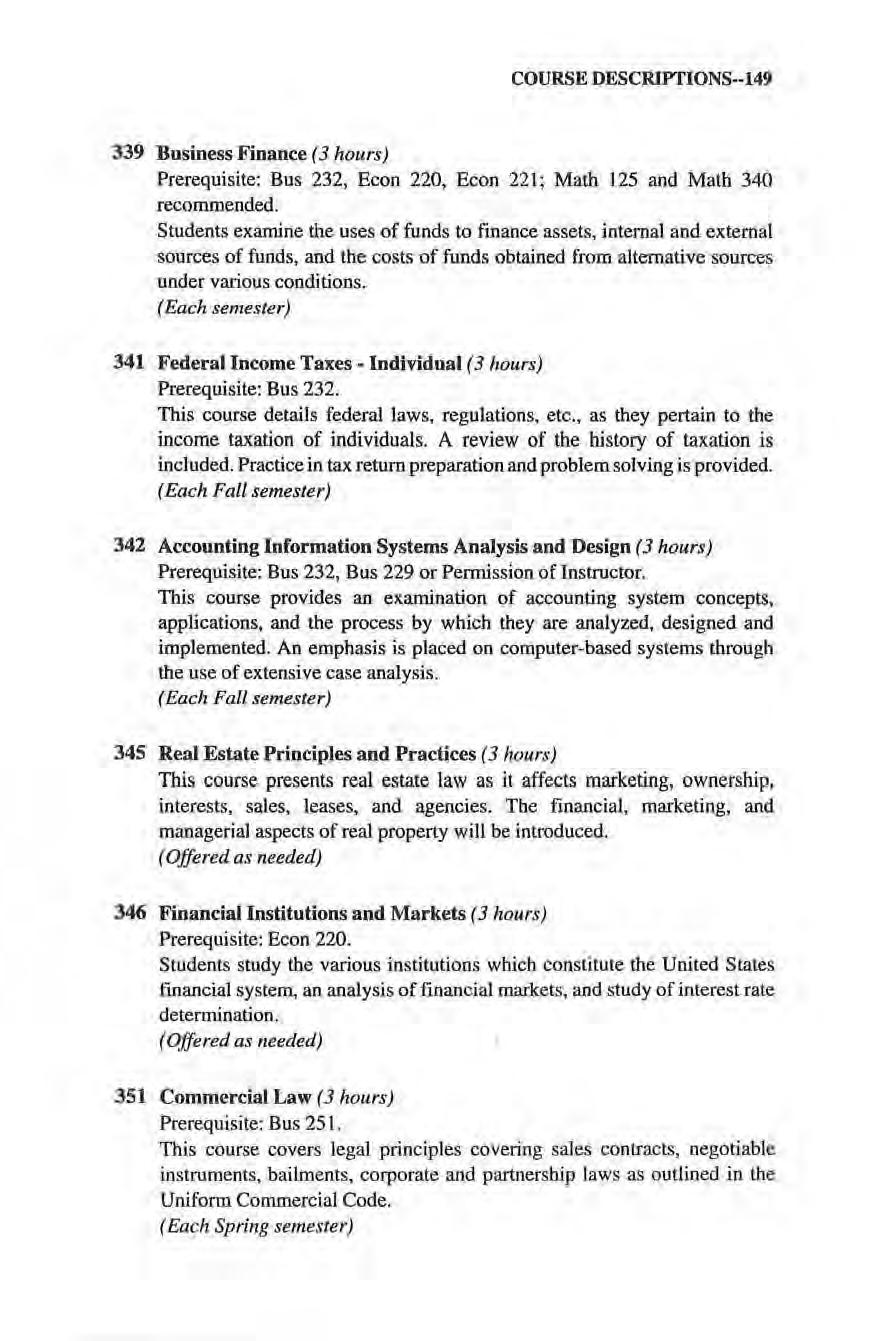
(Offered as needed)
351 Commercial Law (3 hours)
Prerequisite: Bus 25 l.
This course covers legal principles covering sales contracts, negotiable instruments, bailments, corporate and partnership laws as o utlined i n the Uniform Commercial Code.
( Each Spring sem este r)
COURSE DESCRIYflONS--149
353 Organizational ~thics (3 hours)
Tttis course applies ethical concepts and principles to moral issues in business: corporate responsibility , iliscrimination, advertising, competition, whistle-blowing , trade secrets, multinationals, enviionment, workers rights, government regulation, investment, bribes, product liability and consumerism.
(Each Spring semester)
360 Real Estate Finance (3 hours)
Prerequisite: Bus 345 .
This course is a detailed analys is of the methods an d techniques of financing the purchase of real estate. Areas of study incl ude fund sources, analysis of mortgage risk, FHA underWriting, other government influences and agencies, l egal aspec t s, and the policies and procedllfes of lending inst itutions.
(Offered as needed)
361 Real Estate Law (3 hours)
Prerequisite: Bus 345
Students learn the legal impl ications of estates - land, deeds, leases, mortgages, easements, zoning ord inances , covenants, trespass, nuisance, licenses, invitees, and desce ndants estates.
( Offered as needed)
371 Cost/Managerial Accounting (3 hours)
Prerequisites: B u s 232, Math 340, Bus 229 or Permission of Instructo r.

Cost concepts, determination, control, and analysis are stud ied. Emphasis is placed on communicating cost data for internal decision making. Top ics include cost behavior and estimation, direct costing, standard cost, capita] budgeting, a nd inventory contro l.
(Each Fall semester)
372 Advanced Cost/Managerial Accounting (3 hours)
Prerequisites: Bus 335, Bus 371.
Students study advanced topics in cost accounting including new costing methods. Coverage includes cost allocations, transfer pricing, and performance evaluation. An emphasis is placed on cost analys is for deci sionmaking and budgetin g as a planning and control tool for both operations and capital expenditures.
(Each Spring semester)
150--COURSE DESCRIPTIONS
373 Organizational Behavior (3 hours)
This course presents the foundations of the history, theory, and a pplication s of organizational behavi or includin g personality, stress, motivation, job desig n, goal setting, learning th eory, behav ior modification , group behavior, power, l eadership, organizational structure, deci s ion- making, and control.
( Each sem est er)
374 Advanc ed Spreadsheet Applications ( 3 hours)
Prerequisite: Bus 229.
This course startii: a t the departure p o i nt for LOTUS 1-2-3 in Bus 229, Software Applications. There will be a review of material covered in Software Application s. This course will cover advanced techniques in LOTUS 1-2-3 using business applications for the coursework. Advanced comma nds and some macro programming in LOTUS will be co vered. Advanced LOTUS applications wiU be utilized for case analysis including spreadsheet modeUng, information system development, and a utomated fo rm s oriented database management.

(Spring semester, odd years)
375 Advanced Database Applications (3 hours)
Prerequisite: Bus 229
This course starts a t the departure point of dBASE in Bus 229, Software Applications. There will be a review of the materi a l covered i n Bus 229. This course will cover advanced techniques in dBAS E using business applica ti o n s for the coursework. Advanced commands and some programming in dBASE w ill be covered.
(Sp r ing semester, even years)
380 Human Resources Management (3 hours)
Prereq uisite: Bus 373.
Students learn management of employees and the efficient u se of human resources for both the personne l manager and the operating manager. Recruiting, motivation, aod compensatin g are cons idered along with th e current law s, career deve lopment, unions, and other topics.
(Each Spring semester)
381 Employee Training and Development ( 3 hours)
Prerequisite: Bus 380.
A stud y of corporate trainin g from the needs assessment, costs and benefits, methods used in the evaluation and follow- up. Various training techniques are studied fo r the orientation, re trainin g, and development of workers, superviso rs, and executives.
(Each Fall semester)
COURSE DESCRlPTIONS--151
4 10 Marketing Management (3 hours)
Prerequisite: Bus 328.
This course analyzes marketing principles from the managers' point of view a nd their application toward meeting variou s marketing objectives including the study of markets, consumers, advertising, personal selling, retailing, pricing, and distribution .
(Each Fall semester)
4 12 Sales Management (3 hot~rs)
Prerequisite: Bus 250.
This study of a management position in a sales career includes an analysis of such tasks as recruiting, interviewing, and hiring salespeople. Other areas of study are training and motivating, compe nsa tion methods , assigning terri to ries, and coordinating wi th other managers.
(Each Fall semester)
413 Purchasing a nd Materials Management (3 hours)
Prerequisite: Bus 328.
The study of the procuring of i ndustrial materials includes s u ch topics as S IC codes, negotiated contracts, reciprocity, buying committees, and bidd ing procedures. Buying motives are s tudie d as are pr ocedures s uch a s straight rebuying, value analys is, inventory anal ysis, and other topics from the buyer's viewpoint.
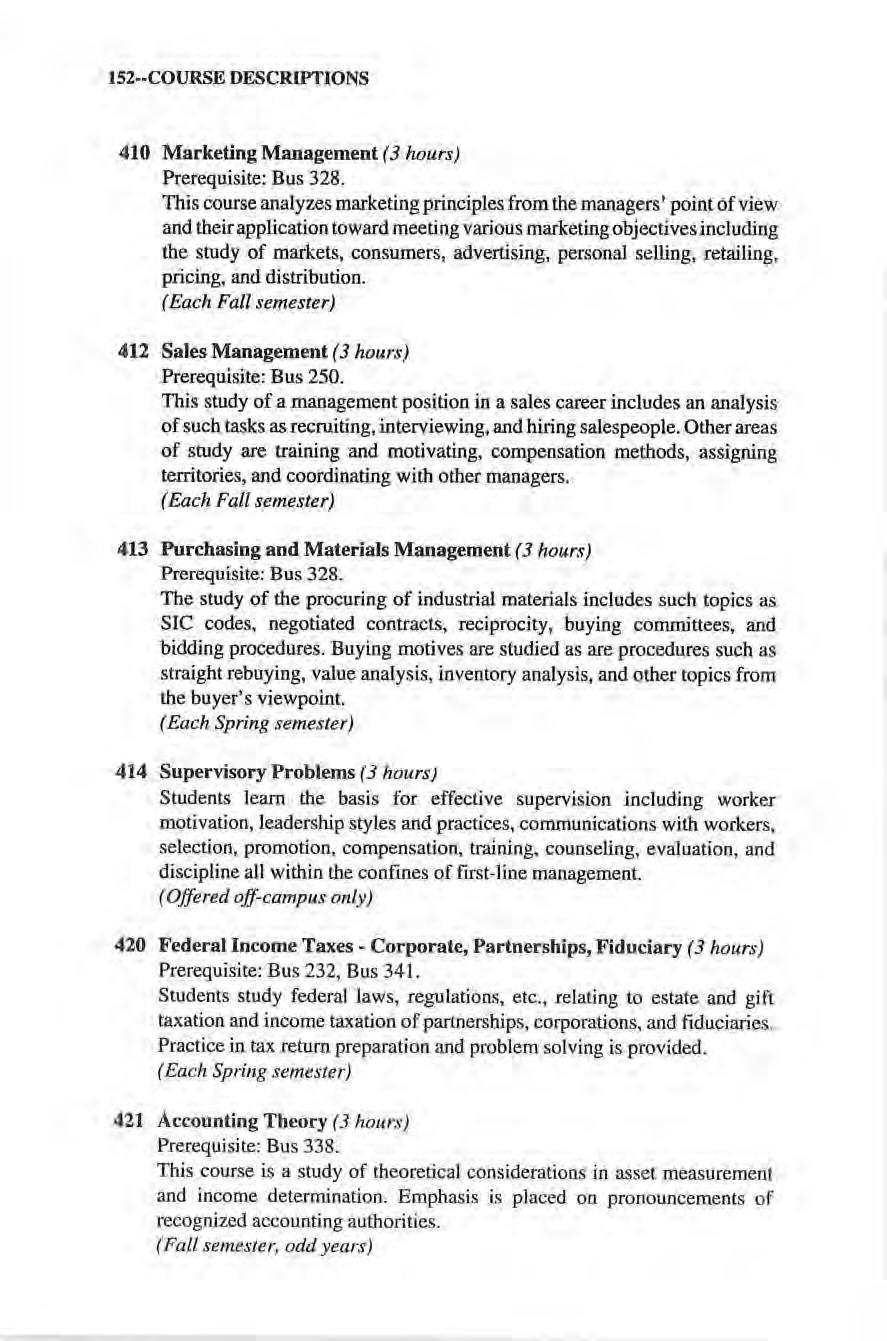
(Each Spring semester)
414 Supervisory Prob lems (3 hours)
S t udents learn the basis for effective supervlSlon including worker motivation, leadership styles and practices, communications with workers, selection, promotion, compensatio n, training, counseling, evaluation, and discipline al l wi thin the confines of first-line management.
(Offered off-campus only)
420 Federal Income Taxes • Corporate, Partnerships, Fiduciary ( 3 hours)
P rerequisite: Bus 232, Bus 34 1.
Stude nts study federal Jaws, regulations, e tc., relating to estate and gift taxa tion and income taxation of partnerships, corporations, and fiduciaries, Practice in tax return preparation and problem solving is provided.
(Each Spring semester}
421 Accoonting Theory (3 hours)
Prerequisi te: B us 338.
This course is a stud y of theoretical considerations in asset measurement and income determination. Emphasis is placed on pronouncements of recognized accounting au thorities.
(Fall semes te,; odd years)
152--COURSE DESCRIPTIO NS
COURSE DESCRIPTIONS--153
430 Industrial Marketing (3 hours)
Prerequisite: Bus 328.
Students analyze industrial distribution considering organizational consumers, demand, buying process, and strategies. Unders tanding planning, product lines, channels, logistics, pricing, and promotion are included.
(Each Spring semester)
441 Cooperative Education Internship {1-12 hours)
Prerequisite: 45 hours of completed coursework, minimum GPA 2.0; Pennission of Cooperative Education Staff and Division Chair. This program is designed for students with a major in Business to gain work experience re lated to their major and career goats. Students may enroll for 1-12 hours of graded cred it. A minimum of forty hours of work experience will be required for every hour of credit per semester. The student will complete necessary paperwork with the employer and the Cooperative Education office. The stud ent's work will be supervised by Cooperative Education staff. A final paper will be prepared at the conclusion of the internship. Three semester hours of Bus 241 or Bus 441 may b e applied toward the Management option.
( Each semester; summer session)
443 Quantitative Management(] hours)
Prerequjsite: Math 340 or Permission of Instructor. Th is study of systems and management science inc ludes the development of analytical reasoning and set concepts, as well as topics in decision processes, linear programming, waiting lines, stochastic processes, forecasting methods, inventory control, input/output analysis, and general modeling.
(Offered as needed)
450 Advanced Accounting ( 3 hours)
Prerequisite: Bus 338. Students app ly accounting theory and practice to business combinations and consolidation of financial statements for parent/subsidiary corporations. Additional emphasis is placed o n accounting for international bu siness activities and investments. SEC reporting , partnersh ip s and other advanced topics are also addre ssed.
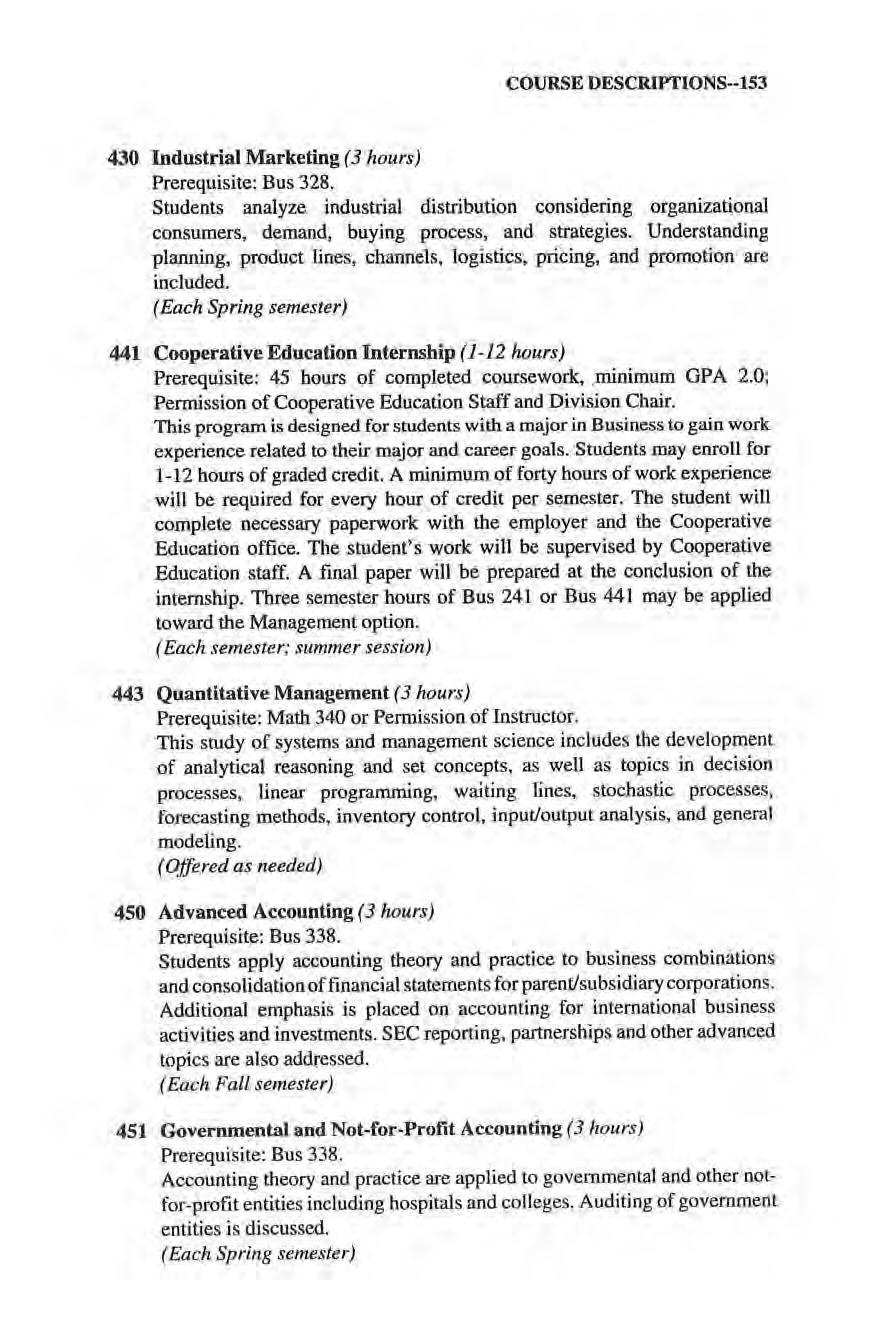
(Ea ch Fall semester)
451 Governmental and Not-for-Profit Accounting(3 hours)
Prerequisite: Bus 338. Accounting theory and practice are applied to governmental and other nolfor- profit entities including hospitals and colleges Auditi ng of government entities is dj scussed.
( Each Spring semester)
1S4--COURSE DESCRIPTIONS
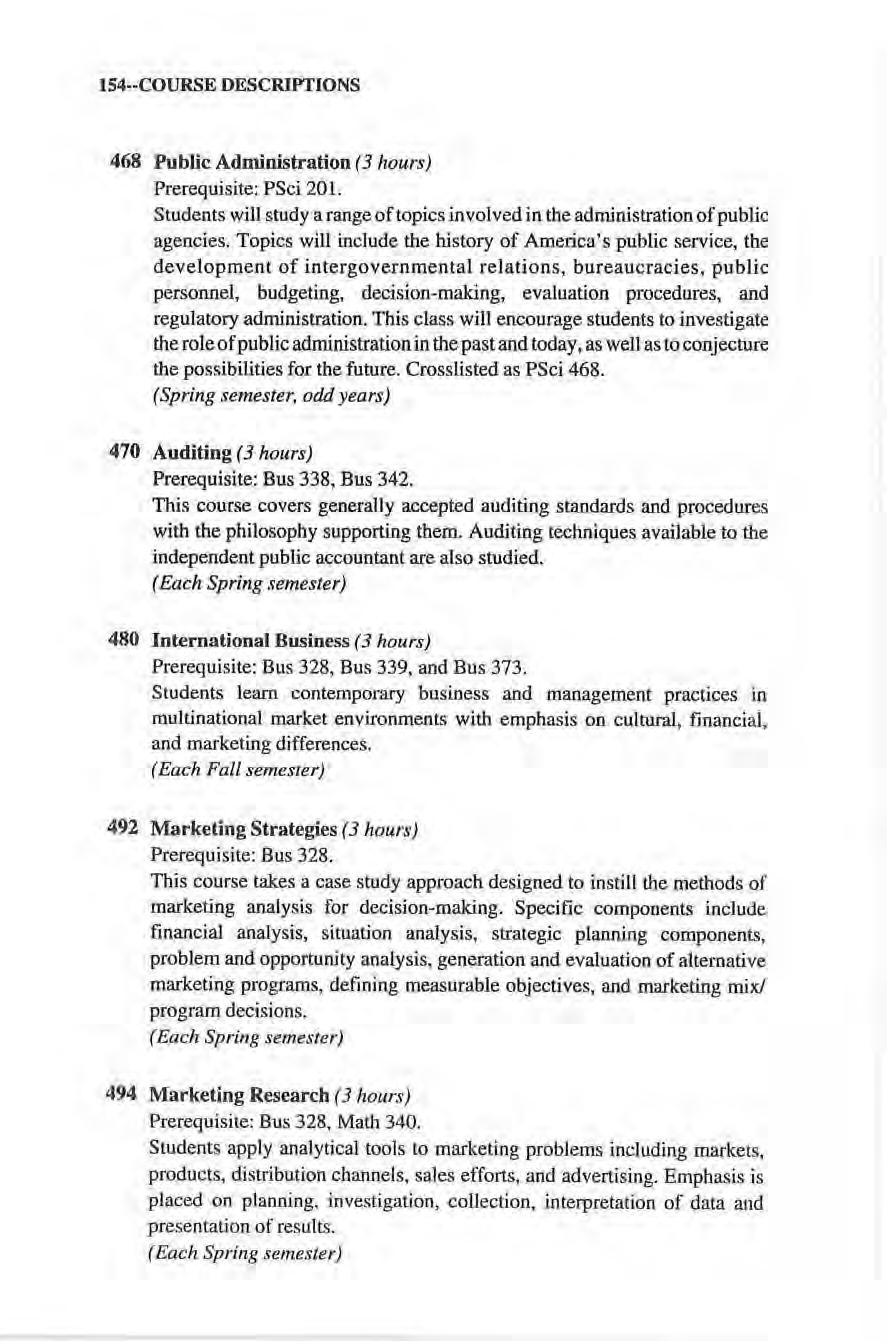
468 Public Administration (3 hours)
Prerequisite: PS ci 201. Students will study a range of topics involved in the adrnirustration of public agencies. Topics will include the history of America 's public service, the development of intergovernmental relations , bureaucracies, publi c personnel, budgeting, decision- making, evaluation procedures, and regulatory administration. This class will encourage students to investigate the role of public administration in the pas t and today, as well as to conjecture the possibilities for the future Crosslisted as PSci 468.
(Sp ring semester, odd years)
470 Auditing ( 3 hours)
Prerequisite: Bus 338, Bus 342. This course covers generally accepted auditing standards and procedures with the philosophy supporting them. Auditing techniques available to the independent public accountant are also studied.
(Each Spring semester)
480 International Business (3 hours)
Prerequisite: Bus 328, Bus 339, and Bus 373. Students learn contemporary business and management practices in multinational market envfronments with emp hasis on c ultural, financial, and marketing differences.
(Each Fall semester)
492 Marketing Strategjes ( 3 hours)
Prerequisite: Bus 328 .
This course takes a case study approach desig ned to instill the methods of marketing analysis for decision-making. Specific component,; include financial analysis, s ituation analysis, strategic planning components, problem and o pportunity analysis, generation and evaluat ion of alternative marketing programs, defi ning meas urable objectives, and marketing mix/ program decisions.
(Each Spring semester)
494 Marketing Research (3 hours)
Prerequisite: Bus 328, Math 340. Students apply analy tical tools to marketing problems including markets, products, distribution channels, sales efforts, and adverti sing. Emphasis is placed on plaoniog, investigation, collection, interpretat ion of data and pre se ntation of results.
(Each Spring semestet1
495 Business Policy (3 hours)
Prerequisite: Senior business major having completed 45 semester hours of business major which includes: Bus 229, Bus 339, Econ 220, and Econ 221. Recommended for student's last semester. This course talces a case-study approach requiring in-depth analytical and communication skills. Requirements include a thorough review of all given and acquired data, formul ation of well-defined problems, and structured plans of action to be presented in written and o ral form. This course is the capstone course and seniot competency for tbe Business Administration major.
(Each semester)
496 Organizational Policy (3 hours)
Prerequisite: Students should have completed a minimum of one-half of the business courses required in their major prior to enrollment in this cou rseincluding Bus 231 or Mgmt 233, B us/Mgmt 328, and Bus/Mgmt 373. This course takes a case-study approach requiri ng in-depth analytical and communication skills. Requirements include a thorough review of all given and acquicred data, formul ation of well-defined problems and structured plans of action to be presented in written and oral form. Cases will be selected to match the student's major area of study. This course is the capstone course and senior competency for the Bachelor of Technology degree - Distribution option and Supervision option.
(Offered off-campus only)
497 Directed Study in Business ( 1-4 hours)
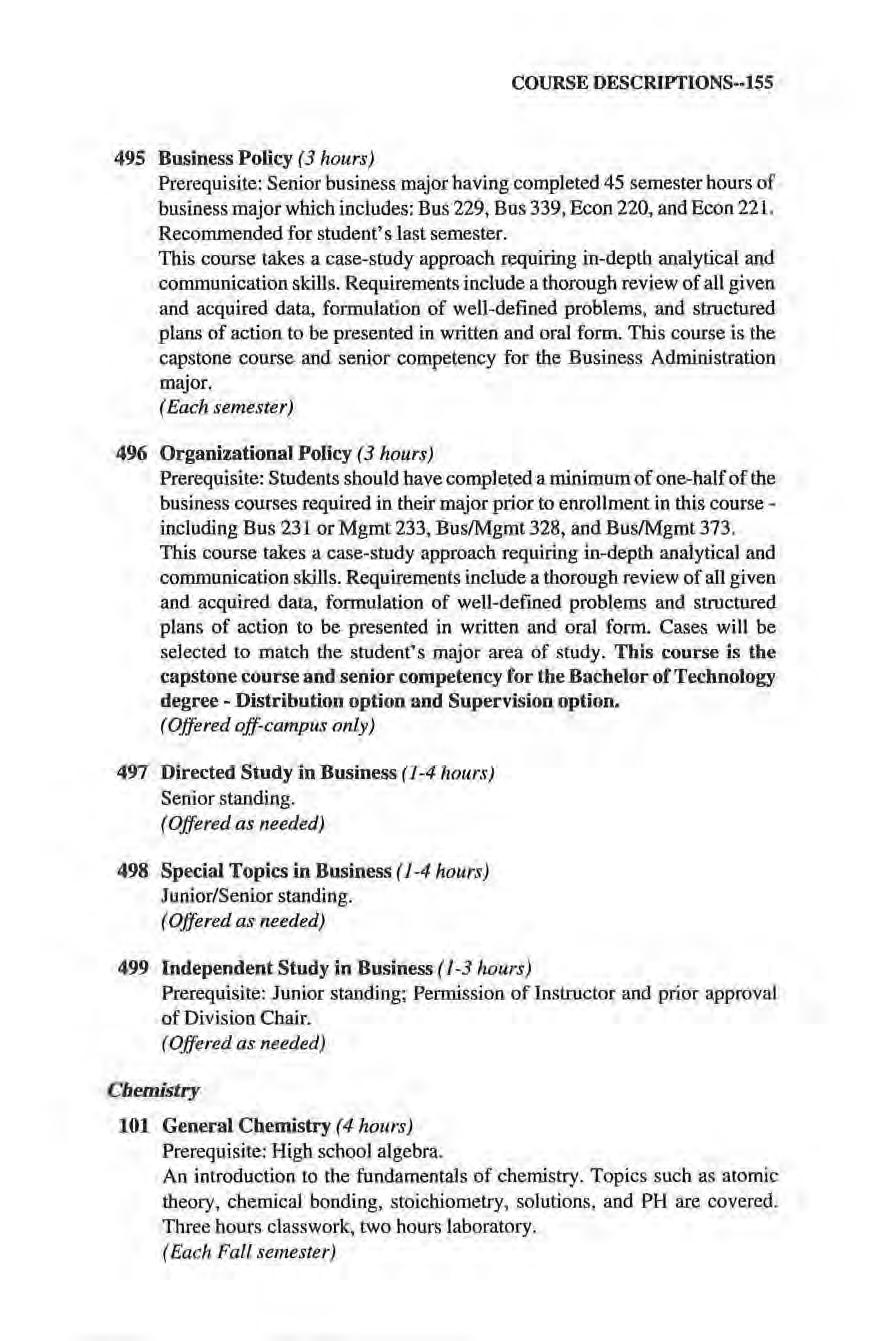
Senior standing.
(Offered as needed)
498 Special Topks in Business (1-4 hours)
Junior/Senior standing.
(Offered as needed)
499 Independent Study in Business ( 1-3 hours)
Prerequisite: Junior standing; Permission of Instructor and prior approval of Division Chair.
(Offered as needed)
Chemistry
101 General Chemistry (4 hours)
Prerequisite: High school al gebra. An introduction to the fundamentals of chemis try. Topics such as atomic tbeory, chemical bonding, stoichiometry, sol utions , and PH are covered. Three hours classwork, two hours l aboratory.
(Each Fall semester)
COURSE DESCRIPTIONS--155
DESCRJPfIONS
102 General Chemistry (4 hours)
Prerequisite: Chem 101.
This course is an application of the fundamentals of chemistry. including states of matter, oxidation-reduction, thermochemistry, chemica l equilibrium , kinetics, nuclear chemistry, and descriptive chemistry. Three hours classwork, two h ours labor:atory.
(Each Spring semester)
142 Introductory Organic and Biochemistry (4 hours)
This is a terminal course in organic and biochemistry. T hree hours classwork, two hours laboratory.
(Offered as needed)
205 Principles of Qualitative Ana lysis ( 4 hours)
Prerequisite: Chem 102.
The princip les of qualitative analysis and their application i n the laboratory are studied. Two hours classwork, four hours laboratory. (Fall semester, odd yea rs)
206 Principles of Quantitative Analysis (4 hours)
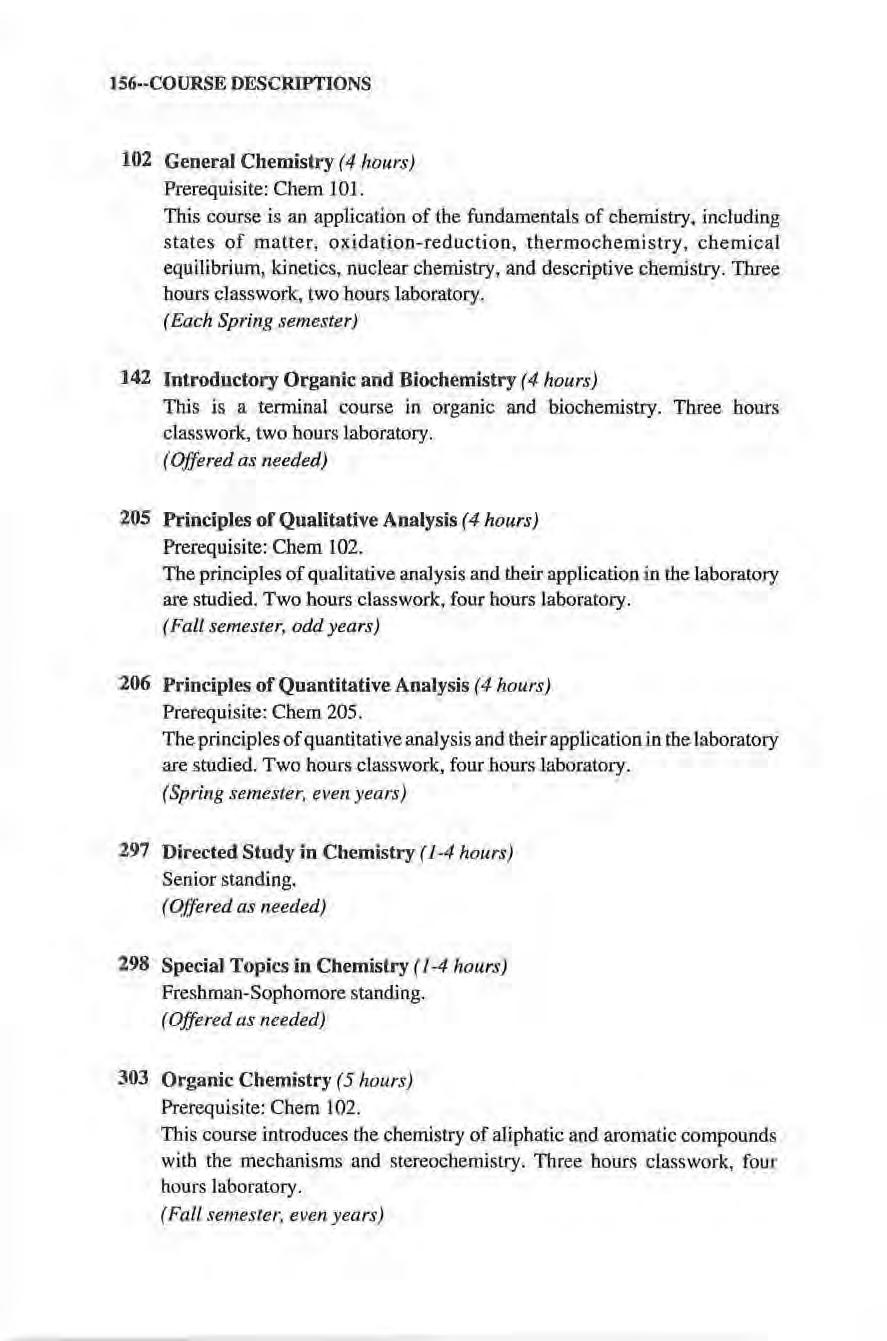
Prerequis ite: Chem 205.
The principles of quantitative analysis and their applicationin the laboratory are stud ied. Two hours classwork, fou r hours laboratory. (Spri11g semester, even years)
297 D irected Study in Chemistry ( 1-4 hours) Senior standing.
(Offered as needed)
298 Special Topics in Chemistry ( 1-4 hours)
Freshman-Sophomore standing.
(Offered as needed)
303 Organic Chemistry (5 hours)
Prerequisite: Chem 102.
This course introduces th e chemistry of aliphatic and aromatic compounds with the mechanis ms and stereoch emislry. Three hours classwork, four hours l aboratory.
( Fall semester, even years)
J56--COURSE
304 Organic Chemistry (5 hours)
Prerequisite: Chem 303.
Th.is course is a co ntinuation of Chem 303 with emphasis o n the chemistry and detection of functional groups. The laboratory emphasis is o n methods of qu alitati ve organic analysis Three hou i:s c la ssw ork , four hour s laboratory.
(Spring semester, odd yea rs )
431 Biochemistry (4 hours)
Prerequisite: Chem 304.
The chemical foundations of molecular biology with an emphasis on the molecular aspects of intermediary metabolism are studied. Three hours classwork, two hours laboratory

(Fall semester, odd years)
497 Directed Study in Chemistry ( 1- 4 hours)
Senior standing.
(Offered as needed)
498 Special Topics in Chemistry ( 1-4 hours)
Junior-Senior s tanding.
(Offered as needed)
499 Independent Study in Chemistry (1 -3 hours)
Prereq ui s ite: Junior standing; Permission of lnstructor and prior approval of Division Chair.
(Offered as needed)
College
100 New Student Experience ( 1 hour)
All degree seeki ng students enrolled on campus with l ess than 30 hours at the time of admission are required to take New Student Expe1ience CourseCollege l 00
( Each semester)
400 Career Strategies ( I hour)
Tbjs is a one hour course, open to all majors, designed to teach j ob hunting techn iques: an educational approach for professional development.
(Each semester)
COURSE DESCRIPTIONS--157
Computer Science
100 Introduction to Computer Applications (3 hours)
Thjs course provides an overview of the history and evolution of computers and software. Issues such as the future of computers, their social impact, and the ethics of computer use are also considered Students receiv e direct instructio n and directed experience on an integrated software package that includes word piocessor, spreadsheet, and data file manager. Two hour lecture, two hours laboratory.
(Each semester)
102 Introduction to Computer Concepts (3 hours)
This course is designed to develop a genera l knowledge about compu ters. This includes technica l knowledge about hard ware and software with regard to their operation and how they are used to solve problems. Toe course al so includes an awareness of how computer s affect society Students will use software simulation projects that demonstrate the use of the computer to solve common problems.

(Each semester)
103 BASIC Programming (3 hours)
The BASIC language and its application to problem solving in mathematics, sc ience, and business. Microcomputer applications are emphasized, starting with simple operations and progressing into s tring manipulation, arrays, subroutines, graphics and file manipulation.
(Each semester)
203 COBOL Programming(] hours)
Prerequisite: CSci 102 or permission. An introduction to ANS COBOL and its application to business computing. This co urse emphasizes structured analysis and design of programs illu strating business applications.
(Fall semester, odd years)
204 Computer Programming I (3 hours)
This course provides an introduction to programming and algorithm development using Pascal with e lement s of program structure and subprogram usage. Problem solving techniques, includin g stepwise refinement, are applied to problems in mathematics and business wit h algorithms for searching, merging, and sorting introduced.
(Each Fall semester)
158--COURSE
DESCRIPTIONS
206 Computer Programming U (3 hours)
Prerequisite: CSci 204.
This course introduces programming and algorithm deve lopment u si ng the C Programming Language. The study of s tepwise refinement and top-down programming, testin g, and debugging is continued with an emph asis on string processing, internal searching and sorting, and recursion. Data s truc tures including stacks, queues, deques and liriked lists are al so built and manipulated.
(Each Spring semester)
2 08 Computer Sys tems (3 hours)
Pre requisite: CSci 203 or 204. The principl es of operation and assembly programming of the DEC VAX syste ms are introduced Topics to be studi ed include computer structure and machine lang uage, addressing techniques, macros, prog ra m segmentation and linkage co nve ntion s, fil e input-output, assemblers, and interpreters.
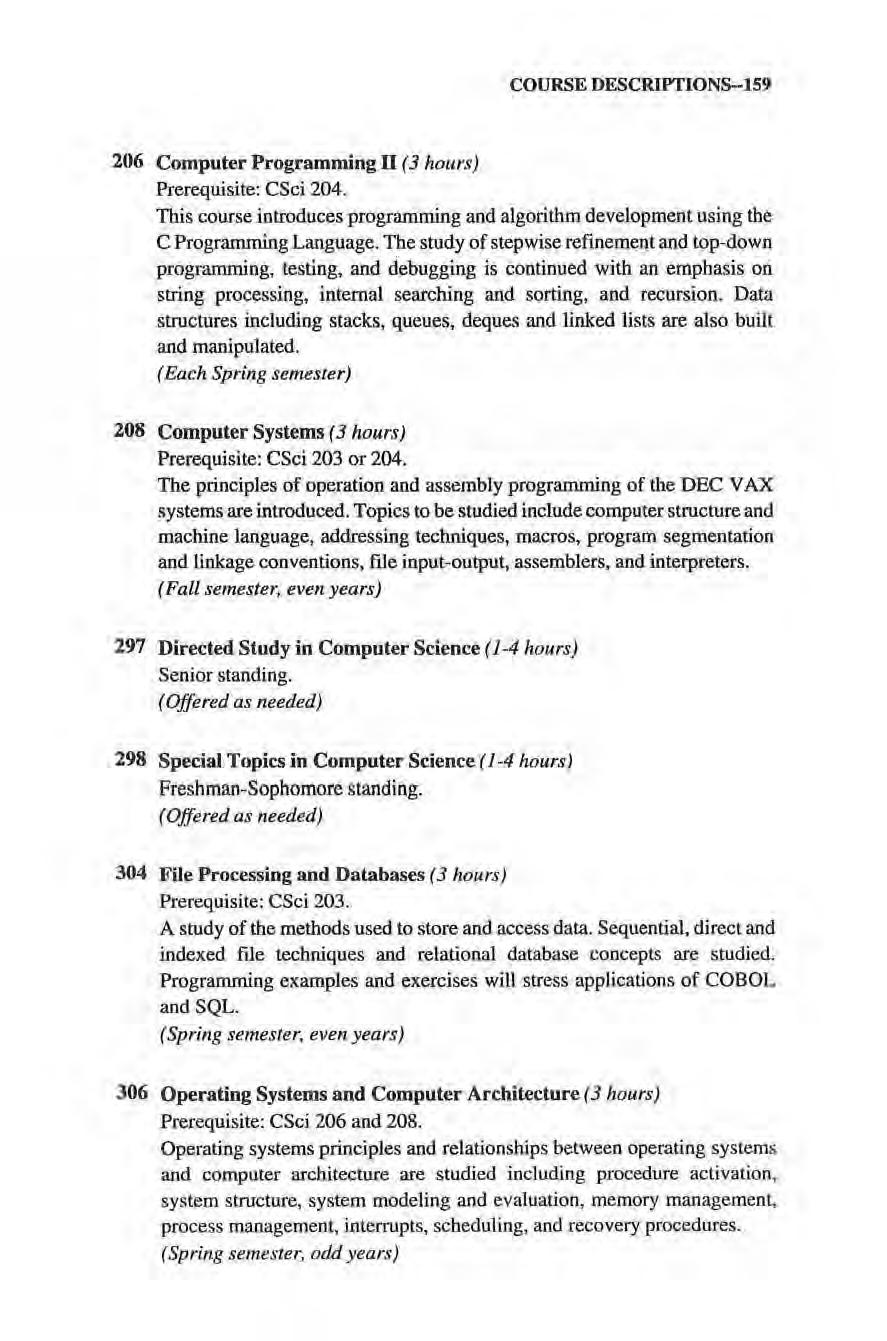
( Fall semester, even years)
297 Directed Study in Computer Science (1-4 hours)
Seni or stand ing.
(Offered as needed)
298 Special Topics in Computer Sci ence ( 1-4 hours)
Fres hman-Sophomore s tand ing.
(Offe r ed as needed)
304 File Processing and Databases ( 3 hours)
Prereq uis ite: CSci 203.
A s tud y of the methods u sed to store a nd access data. Seque ntial, direct and indexed fil e techniques and relatio nal database concepts are studied. Programming examples and exercises will s tress applications of COBOL and SQL.
(Spring semeste r, even years)
3 06 Operating System s and Computer Architecture (3 hours)
Prerequisite: CSci 206 a nd 20 8.
Operating systems principles and relationships between operating systems and computer architecture are s tudi ed inclu ding procedure activation , system structure, system modeling and evaluatio n, memory management, process management, interrupts, scheduling, and recovery procedures.
(Spring semester, odd years)
COURSE DESCRIPTIONS--159
312 Systems Analysis and Design (3 hours)
Prerequisite: CSci 203
A study of the methods used in des i gn of computer pro grams and app li cations systems, with empha sis on Computer Aided Software Engineering (C ASE) tools and prototyping using fourth generation languages (4GL).
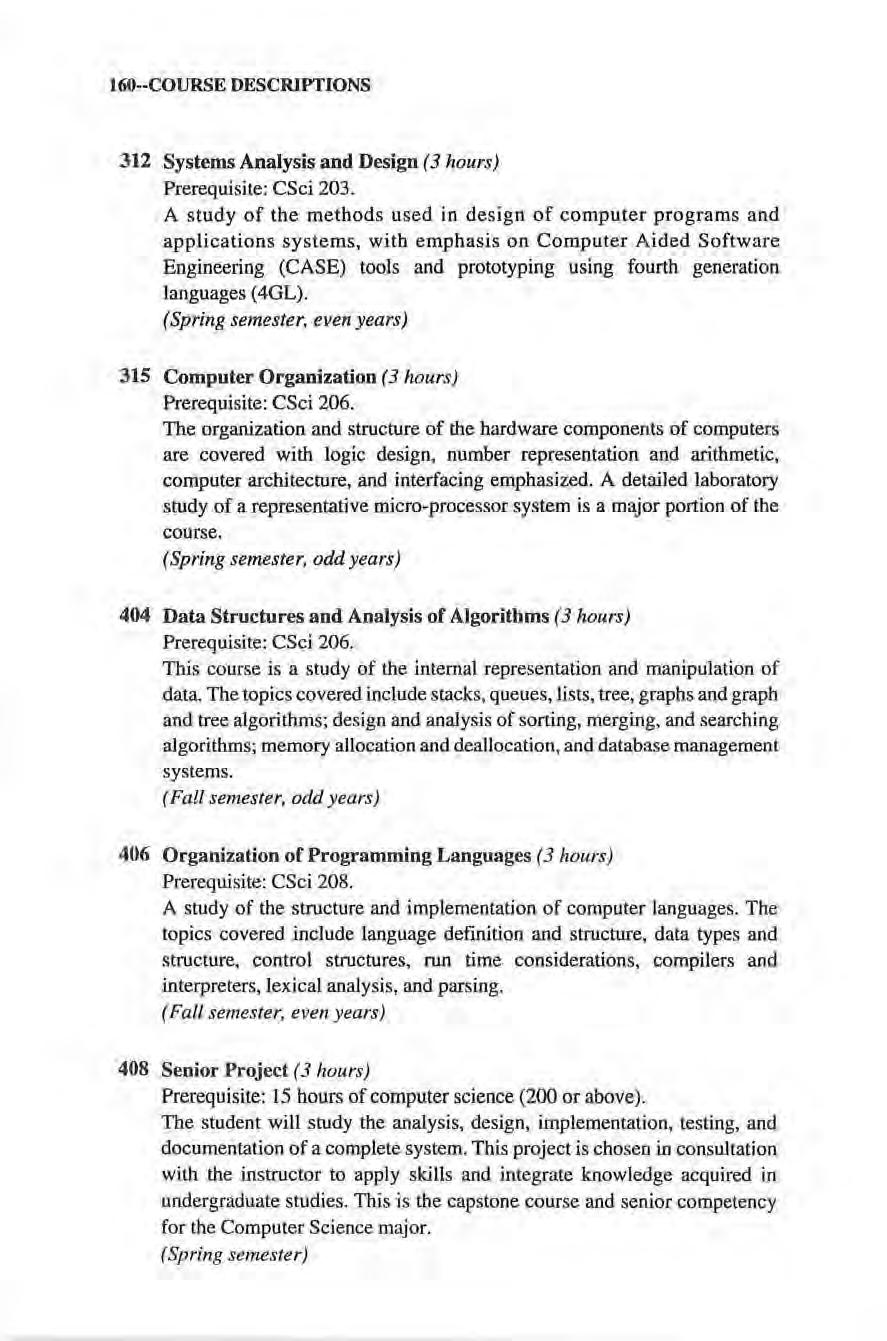
(Spring semester, even years)
315 Computer Organization (3 hours)
Prerequ isi te: CSci 206.
The organization and structure of the hardware components of computers are covered with l ogic design, number representation and arithmetic, computer architecture, and interfacing e mph asi zed. A detailed laboratory study of a representative micro.processor system is a major portion of the course.
(Spring semester, odd years)
404 Data S tructures and Anal ysis of Algorithms (3 hours)
Prerequisite: CSci 206.
This course is a study of the internal representation and manipulation of data. The topics covered include stacks, queues, li sts, tree, g raphs and graph and tree algorithms; design and analysis of sorting, merging, and searching algorithms; memory allocation and deallocation, and database management systems.
(Fall semester, odd years)
406 Organization of Programming Languages ( 3 hours)
Prerequisite: CSci 208.
A study of t he structure and implementation of computer languages. The topics covered include language definition and structure, data types and structure. control structures, run time considerations, compilers and interpreters, lexical analysis, and parsing.
( Fall semester, even years)
408 Senior Project (3 hours)
Prerequisite: 15 hours of computer science (200 or above).
The student will study the analysis, design, imp lementation, testing, and documentation of a complete system. This project is chosen in consultation with the _instructor to apply skills and integrate knowledge acqu ired in undergraduate st udies. This is the capstone course and senior competency for the Computer Science major.
(Spring s e mester)
160--COURSE DESCRIPTIONS
497 Directed Study in Computer Science ( 1-4 hours)
Senior standing
(Offered as needed)
498 Special Topics in Computer Science ( 1-4 hours)
Junior-Senior standing.
(Offered as needed)
499 Independent Study in Computer Science ( 1-3 hours)
Prerequisite: Junior standing; Permissio n of Instructor and prior approval of Division Chair.
(Offered as n eeded)
Consumer Economics
332 Nutrition (3 hours)
Fundamental principles of human nutnt1on, it~ development through research as related to the needs of individuals according to their age, sex, and occupation are studied.

(Each Fall semester)
Criminal Justice
HO Survey of Criminal Justice (3 hours)
This course will introd uce s tudents to genera l c riminal justice concepts and knowledge about the relationships of crime and criminal behavior. The purp ose, role, and interrelationships of the police, other law enforcement official s, the courts and judiciary, corrections, and parole system will be discussed.
(Each Fall semester)
220 Introduction to Corrections (3 hours)
Prerequisite: CJus 110.
This course will be a general introductory course that describes the history and development of corrections in Amei:ica, the various aspect s of correctional practices, and issues and perspectives affecting institutional life within the correctio na l system. Organizational and administrative practices will be examined
( Each Spring semester)
297 Directed Study in Criminal Justice ( 1-4 Jiollrs)
Senior Standing.
(Q_lfered as needed.)
COURSE DESCRIPTIONS-·161
330 The Police ( 3 hours)
Prerequisite: CJus 110 and Junior standing. This course will cover the major roles of tbe police in Ameri can society. The course will investigate the ori gins of policing, law enforcement, police organization, tbe functions of police in society, and the police's relationships to the components of tbe criminal justice system. Issues confronting police administration will also be addressed
(Each Fall semester)
440 Juvenile Justice (3 hours)
Prerequisite: CJus 110 and Junior standing. This course will examine the historical and philosophical development of the Juvenil e Justice System. In addition, the role of various criminaJ justice organizations and their approaches to prevention and treatment techniques will be examined
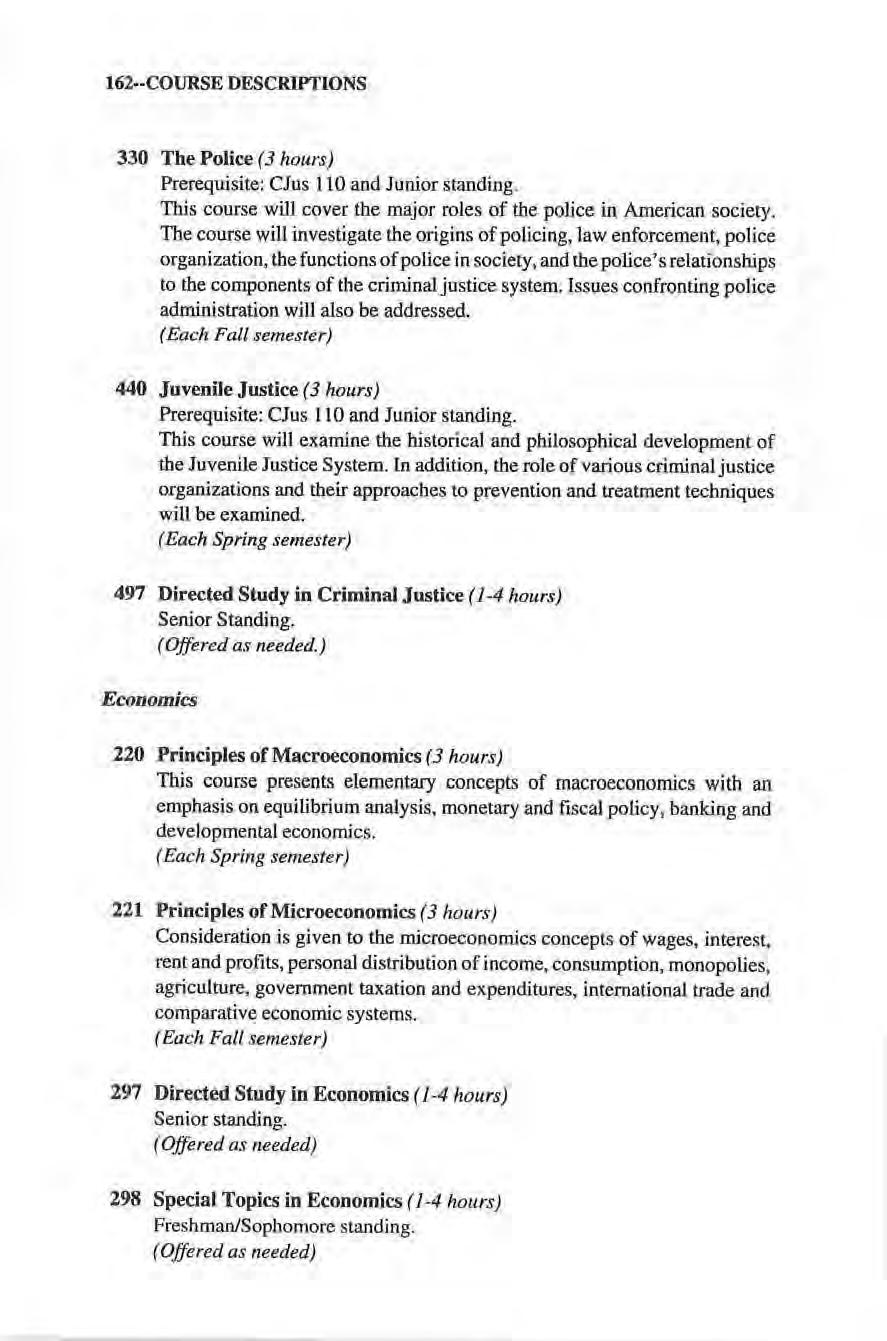
(Each Spring semester)
497 Directed Study in Criminal Justice (1-4 hours) Senior Standing.
(Offered as needed.)
Economics
220 Principles of Macroeconomics (3 hours) This course presents e lementary concepts of macroeconomics with an emphasis on equilibrium analysis, monetary and fi scal policy, banking and developmental economics.
(Each Spring semester)
221 Principles of Microeconomics (3 hours) Consideration is given to the microeconomics concepts of wages, interest , rent and profits, personal distribution of income, consumption, monopolies, agriculture, government taxation and expenditures, international trade and comparative economic systems.
(Each Fall semester)
297 Directed Study in Economics ( 1-4 hours) Senior standing.
(Offered as needed)
298 Special Topjcs in Economics ( 1-4 hours) Freshman/Sophomore standing. (Offere d as needed)
162--COURSE
DESCRIPTIONS
305 Economic Geography (3 hours)
Prerequisite: Geog IOI and Geog 103.
A n analysis of world land resources, agricultural products, forest and marine resources, basic minin g i ndu stries, manufacturing, trade patterns, and transportation routes. Crossliste d as Geog 305, (Spring semeste r, even yea rs)
320 Macroeconomics for Managers (3 hours)
Prerequi site: Econ 220.
This course presents advanced concepts of macroeconomics with an emph asis o n the appli cation of th eory to practical p roblems faced by managers.
(Offered as needed)
375 Labor and Industrial Relations (3 hours)
Prerequisite: Econ 221.
Students study labor, management, and gove rnment as they involve collective bargaining, l abor la ws, and wage theories.
(Offered as needed)
497 Directed Study in EconoD1ics (1-4 hours) Senior standing .
(Offe red as needed)
498 Special Topics in Economics (1-4 hours)
Junior/Senior standin g.
(Offe red as needed)
499 Independent Study in Economics ( 1-3 hours)
Prerequisi te : Junio r s tandin g ; Permi ssio n o f Ins tructor and prior app roval of Division Chair.
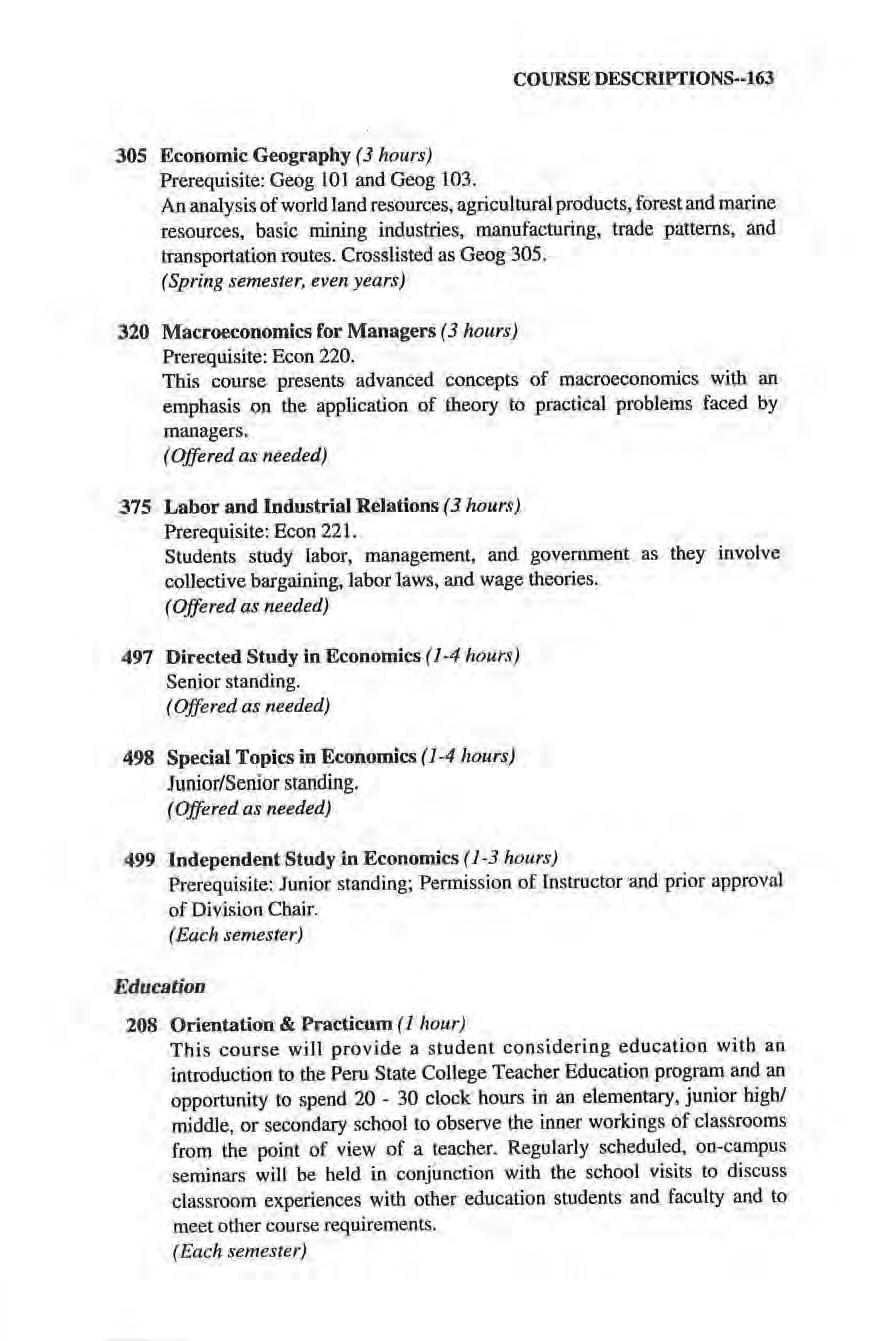
(Each semester)
Education
208 Orientation & Practicum ( J hour)
Thi s course will provide a s tud e nt conside ring edu ca ti o n with an introduction to th..e Peru State College Teacher Education program and an opportuni ty to spend 20 - 30 clock hours in an elementary , junio r hi gh/ middle, or secondary school to observe the inner workings of classrooms from the point of view of a teacher Regularly scheduled, on-campus seminars will be held in conjunction with the school visits to di scuss classroom e xperiences with other education s tud ents and faculty and to meet o ther course requirements.
(Each semester)
COURSE DESCRIPTIONS- -163
241 Cooperative Education Internship ( 1-4 hours)
Prerequisite: 15 hours of completed coursework, nurumum GPA 2.0, permission of Cooperative Education staff and Division Chair. This program is designed foe students with an intended major in the Education Division to explore and/or gain work experience related to their major and anticipated career goals. Students may enroll for 1-4 hours of credit which will be graded on a credit/no credit basis. A minimum of forty hours of work experience will be required for every hour of credit per semester. The student will complete necessary paperwork w ith employer and Cooperativ.e Education Office. The student's work will be supervised by Cooperative Education s taff. A final paper will be prepared at the conclusion of the intership.
( Each semeste r; summer session)
297 Directed Study in Education ( 1-4 hours) Senior standing.
(Offered as needed)
298 Special Topics in Education (1-4 hours) Freshman-Sophomore standing.
(Offered as needed)
300 Classroom Management & Effective Teaching in the Secondary School (2 hours)
Prerequ isite: Admission to Teacher Education. This course is intended to provide prospective secondary education students the opportunity to discuss the relationships between classroom management and effective teaching, to research and discuss current theory, re search, and practice in classroom management and effective teaching, discuss and practice les son and unit planning and curriculum design, and to discuss individual management styles and plans for their own classrooms. (Each semester)

301 Practicum - Social Studies and Language Arts ( I hour)
Prerequisite: Concurrent enrollment in Educ325 & 326. This course provjdes field experience in elementary or middle schools for students enrolled in Social Studies and Language Arts Methods courses. (Each semester)
302 Practicum - Math & Science ( I hour)
Prerequisite: Concurrent enrollment in Educ 327 & 328. This course provides field experience in elementary or middle schools for s tudents enro ll ed in Math and Science Methods courses. (Each semester)
164·-COURSE DESCRIPTIONS
304 E lem/Middle Grades Practicum (1-2 hours)
Pre requisite: Admission to Teacher Education
Th is course provides practical experience for those who need field work at the e lementary or middle level s either i n addition to the hours required i n the elementary or secon dary programs or for e ndorsement programs whicb need to prov ide field work for certifi cation.
(Each semester)
305 P rinciples of Early Ch ildhood Education (3 hours)
Prerequi site: Admission to T eacher Education.
This course is designed to give students the theory and practice necessary for teaching and carin g for children from infancy through age eight. Ct is ao introduction to the professional preparation needed for preschools and child care.
(Each Fall semeste r)
308 Early Childhood P racticum (2 hours)
Prerequis ite: Admission to T each er Education; Co nc urrent registration in Educ 402.
Thls course is designed to provide students an opportuni ty to o b serve the specific methods being studied in th e methods class and to begin to practice those methods. May b e repeated to a total of fou r (4) hours.
(Each Spring semester)
3 09 Secondary Practicum (2 hours)
Prerequisite: T aken in conjunction with Educ 310 (or subject area m ethods): Admission to Teacher Education.
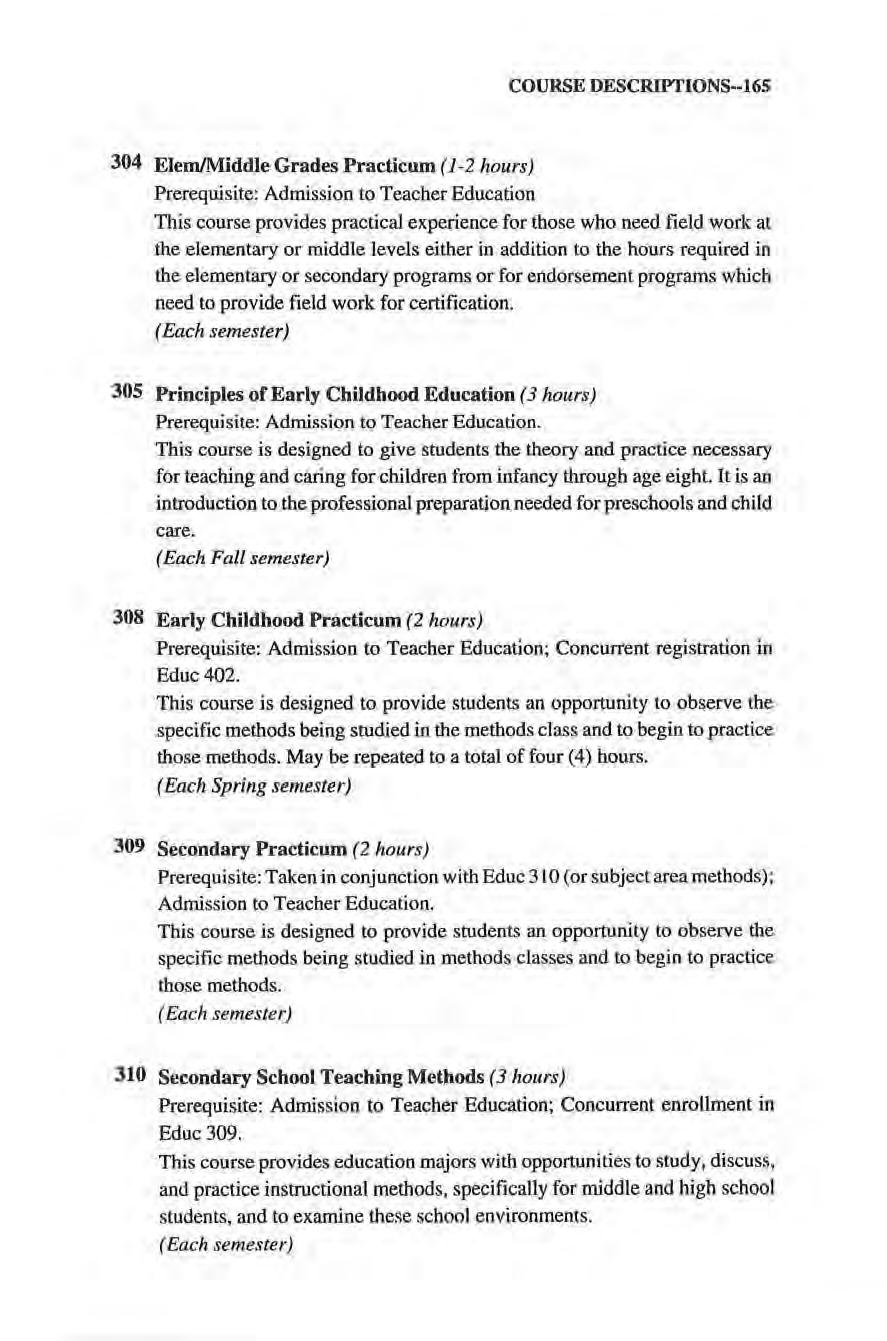
Th is course is designed to provide stud e nts an opportunity to observe the specific methods being studied in m eth ods classes and to begin to practice those methods.
(Each semester)
3 10 Secondary School Teaching Methods (3 hours)
Prerequ i site: Admission to T each er Ed ucation ; Concurrent enrollment in Educ 309.
This course provides education maj o rs with opportunities to study , di scu ss, and pract ice instructiona l methods, speciftcally for middle a nd h igh school students, and to examine these schoo l environments.
(Each semester)
COURSE DESCRIPTIONS--165
317 Tests and Measu rements (2 hours)
Prerequisite: Admission to T eacher Education. The course emphasizes the procedures fo r constructing tests, analyzing teacher made tests, and applying the results of testing to grading and reporting of pupil progress. The course also presents the basic statistics which are used in the analysis, interpretation, and use of test results.
(Each semester)
325 Teaching Language Arts in the Elementary/Middle School (3 hours)
Prerequisite: Admission lo Teacher Education; Concurrent enrollment in Educ 326 & 301.
This course investigates goa l s, methods, materials, and eval u ation techniques i n the area of elementary/middle grades language arts.
(Each semester)
326 Teaching Social Stu dies in the Elementary/Middle School ( 3 hours)
Prerequisite: Admission to Teacher Education; Concurrent enrollment in Educ 325 & 301.
Th is course is designed to make the prospective elementary/middle school teacher aware of the methods, materials, resources, and techniques used to teach social studies in an elementary/midd le school. Students will al so discuss the importance of social studies and the make-up of an elementary/ middle grades social studies curriculum.
(Each semester)
327 Teaching Math in the Elementary/Middle School (2 hours)
Prerequisite: Math 1 I 0; Admiss ion to Teacher Education; Concurrent enrollment in Educ 328, 302.
ihis course introduces and gi ves practice to students in the philosophical basis, techniques, instructional methods, organization, and learning activities of teaching elementary/middle grades mathematics.
(Each semester)
328 Teaching Science in the Elementary/Middle School (2 hours)
Prerequisite: Admission to Teacher Education; Concurrent enrollment in Educ 327,302; and General Studies Science Requirements.
The purposes of the course are to: (1) g ive d irection to prospective teachers on how to organize and conduct meaningful science learning experiences in the elementary/midclle school. (2) to provide simple and easy to understand outli nes of science concepts and conceptual schemes for each area of science concepts and appropriate learning experiences.
(Each semeser)

166--COURSE DESCRIPTIONS
334 Teaching Reading in the Elementary School (3 hours)
Prerequisite: Admission to T eacher Education. The course is a study of current methods, approaches , types and a vailability of reading materials, and their uses in the elementary school. Emphasis will be placed on facilitating instruction in the classroom and the skills of reading.
(Each semester)
350 Computer Applications in Education (3 hours)
Prerequisite: Admission to Teacher Education.
The purposes of tbecourse are to ensure that class members have proficiency in creating documents using word processing, calculating using the spreadsheet, and searchi ng u sing the database; to familiarize the students with a variety of tbe best software programs currently available i n their area; to show the student bow these programs can be applied in the classroom; and to have the students apply useful utility programs to improve the learning process.
(Offered as needed)
375 Education of Gifted Learners ( 3 hours)
This course examines the historic and cu rrently used definitions of gifted and talented, identifying characteristics, means of identifying and choosing the gifted and talented individuals who have been identified in the present and past, and techniques for teaching gifted and talented students in the regu lar classroom.
(Each Spring semester)
400 Philosophical Foundations of Education (3 hours)
Prerequisite: Taken immediately preceding Student Teachjng; Admissio n to Teacher Education.
Philosophical Foundations of Education is a capstone course designed to assist the prospective teacher entering student teaching and, ultimately, the teaching professioo. So that all students can draw on previously learned information when discussing the various objectives of the course, all stude nts will take this cou rse during the semester prior to student teaching.

(Each semester)
401 Language Development & Reading Readiness (2 hours)
Prerequisite: Admission to Teacher Education & Psych 250. This course is designed to provide the learner with a background in the development oflanguage, communication and reading. Methods facilitating these skills will be addressed in a developmental approach.
(Spring semester, odd years)
COURSE DESCIUPTIONS--167
DESCRIPTIONS
402 Methods in Earl y Childhood E d ucation (3 hours)
Prerequisite: Admission to Teacher Education and Educ 305. This course deals with curricuJum, program pl anning , materials, and individu alization in Early Childhood.
(Each Spring semester)
403 Diagnostic and Remed ial Reading (3 hours)
Prerequisite: Admission to Teacher Education, Educ 334 or 434. This course is designed for students and practicing teachers who want to broaden the ir knowledge and ski ll in diagnostic and remedial reading techniques. This course will include the administration and interpretation of diagnostic instruments, the causes of reading problems, remedial techniques, and administrative procedures with which reading teachers should become familiar.
( Each semester)
405 Diagnostic and Remedial Mathematics (2 hours)
Prereq uisite: SpEd 200, Educ 327, Admiss ion to Teacher Education. This course is designed to provide a foundation in working with students who have special needs in the area of mathematics. Learning theory and general techniques for dealing with instruction of students with special mathematics needs will be emphasized.

(Fall semester, even years)
409 Recertification Student Teaching (3-4 hours)
Prerequisite: Must have held an expired Nebraska Initial Standard or Professional Teaching Certificate or its equivalent from another state. This cou rse is designed for those persons whose teaching certificate has expired for longer than S years. The course will provide tlle opportunity for the person to spe nd a minim um of 3 weeks in a K- 12 classroom to become reacquainted with students and classroom pro ced ures. Educ 409 will fulfill the State Department of Education requ i rements for renewal of an expired certificate.
(Each semester)
410 Elementary Student Teaching (8-16 hours)
Prerequisite: Admission to Student Teaching.
A practical application of the principles of learning in the classroom with a progressive introduction into foll teaching responsibilities at the elementary level. Students teach full-time for e ight-s ixteen weeks. This course is the capstone course and senior competency for Elementary Education majors.
(Each semester)
168--COURSE
411 Secondary Student Teaching (6-16 Jwurs)

Prerequisite: Admission to Student Teaching. This is a practical application of learning principles in the classroom with a progressi ve introduction into full teaching responsibilities at the secondary level. Students teach full- time for six-sixteen weeks. This course is the capstone course and senior competency for Secondary Ed ucation majors.
(Each semester)
412 Early Childhood Student Teaching (8-16 hours)
Prerequisite: Admission to Student Teaching. Observations, laboratory and teaching experience in directing the learning activities of children in Prekindergarten through grade 3. During the student teaching experience, the s tudent applies the th eories and prin ciples of learning and instruction. Students teac h full-time for eight-sixteen weeks. This course is the capstone course and senior competency for students receiving the Early Ch ildhood endorsement.
(Ea ch semester)
413 Middle Grades Student Teaching (8-16 hours)
Prerequisite: Admission to Student T e ac hing.
Th.i s is a practical application of learning principles in the classroom with a prog ressive introduction into fuU teaching responsibility at the midd le grades level. Students teach full-tim e for e ig ht-sixteen weeks. This course is the capstone course and senior competency for students receiving the Middle Grades,endorsement.
(Each semesler)
415 Drug Use and Abuse (2 ho urs)
This course is a study of the different types of drugs that are prevalent in our American soc iety. E mphas is will be placed on the origins of drug-taking behavior, the problems that dmgs create in society, and th e a llu re tha t drugs have in American cu lture today.
(Each Spring semester)
425 Teaching in the Middle Grades (3 hours)
Prerequi site : Ad.mission to Teacher Education
Thi s course is designed to p rovjde students with a background in the curricu l um, history, and philosop hy of the middle school. It will also investigate the organizational struc ture, team planning and collaboration techniques, and teacher-student advising situations that are unique to the middle grades.
(Each Spring semester)
COURSE DESCRIPTIONS--169
434 Secondary Reading and Writing Across the Curriculum (3 hours)
Prerequisite: Admission to Teacher Education. The course wiJl be a study of the current trends and practices in reacting and writing in the secondary schools. Emphasis w ill be placed on ways for teachers to improve reading skills for students as well as ways to use those skills to improve learning. The reading/writing relationship will be explored and students will be introduced to the process method of writing instruction. Ways to incorporate this metllod of wr iting into content are a clasrooms will be presen ted as well as other composition methods that can be used in the content areas.
(Each semester)
441 Cooperative Education Internship (1-12 hours)
Prerequisite: Upper-class standi ng, permissi on of Director of Cooperative Education and Chair of Education Division
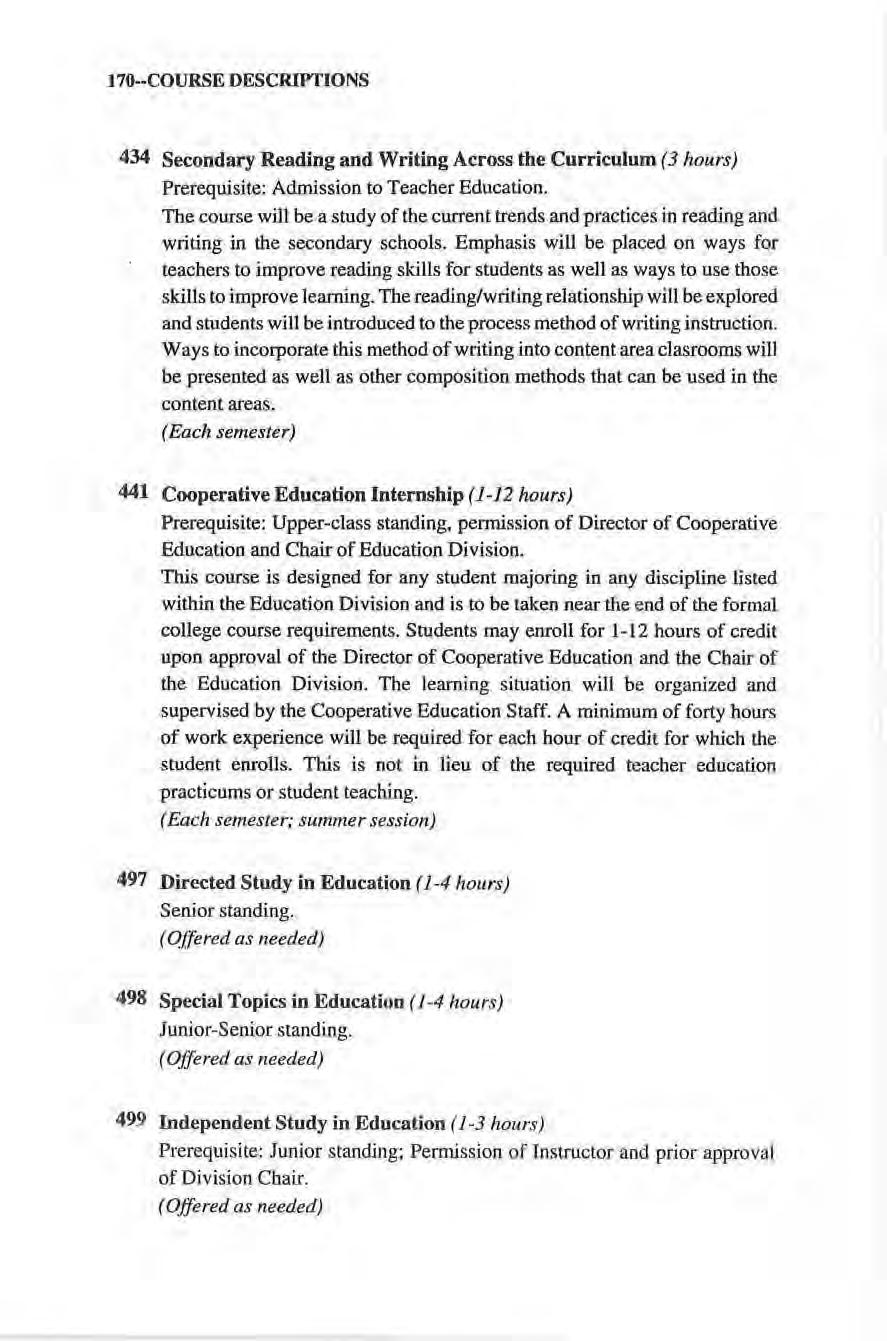
This course is designed for any student majoring in any discipline listed within the Educatio n Di vision and is to be taken near the end of the formal college course requirements. Students may enroll for 1-12 hours of credit upon approval of the Direc tor of Cooperative Education and the Chair of the Education Division. The learning s i tuation will be organi zed and supervised by the Cooperative Education Staff. A minimum of forty hours of work experience will be required for each hour of credit for which the student enrolls. This is not in lieu of the re qu ired teacher education practic ums or student teaching.
(Each semester; summer session)
497 Directed Study in Education ( 1-4 hours) Senior standing.
(0.lfered as needed)
498 Special Topics in Education ( 1-4 hours) Junior-Senior s tanding.
(Offered as needed)
499 Independent Study in Education ( 1-3 hours)
Prerequisite: Jun ior standing; Permission of Instructor and prior approval of Division Chair.
(Offered as needed)
170--COURSE DESCRIPTIONS
English
060 Study Skill s ( 1 hour, credit/no credit)
This course is desi gned to help s tuden ts l earn effective s tudy ski ll s w hic h can be u sed to promote academic success in college. Units to b e covered include manag ing time, improving memory , taking l ecture notes, reading textbook s, taking examinations, writing themes and reports, making oral re ports, improving scholastic mot ivation, improving interpersonal ski ll s, and improving concentration. Th.is course is required of all freshman probationary s tudents who have attempted 2 1 hours or less. This course i s open to all s tudents .
(Each semester)
070 Reading ( 1 hour, credit/no credit)
This course is des igned to help students learn effective reading skills which can be used to promote academic success in college. Units to be covered include reading comprehen sion, vocabulary development, and word knowledge. This course is a de ve lopmental re quirement for stude nts identified as needing reading improvement training. S tudents required t o enroll in English 070 must successfully co mplete the po st-test with the necessary passing score before enrolling in English 101. Students who do n ot earn the necessary passing score will be requ ired to enroll in E ng li sh 071.
(Each seme ster)
071 Reading ( 1 hour, credit/no c redit)
This cou rse is a continuation of Engl ish 070 reading; that is, this course is des ig ned to help students learn effective reading skills which can be used to promote academic s uccess in college. U nit s to be covered include reading comprehe nsion , vocabulary developme nt, and word knowledge. This course is a developmental requirement for st ude nts identified as needing reading improvement training. Students required to enroll in E nglish 071 must successfully complete the post- test with the necessary passing score before enrolling in Englis h 101. Students who do not earn the necessary passing score will be req uired to meet w ith the Vice President for Stu dent Affairs to discuss independent course options that can be devised by the Director of the Communication Skills Cente r to promote s tudent s uccess.
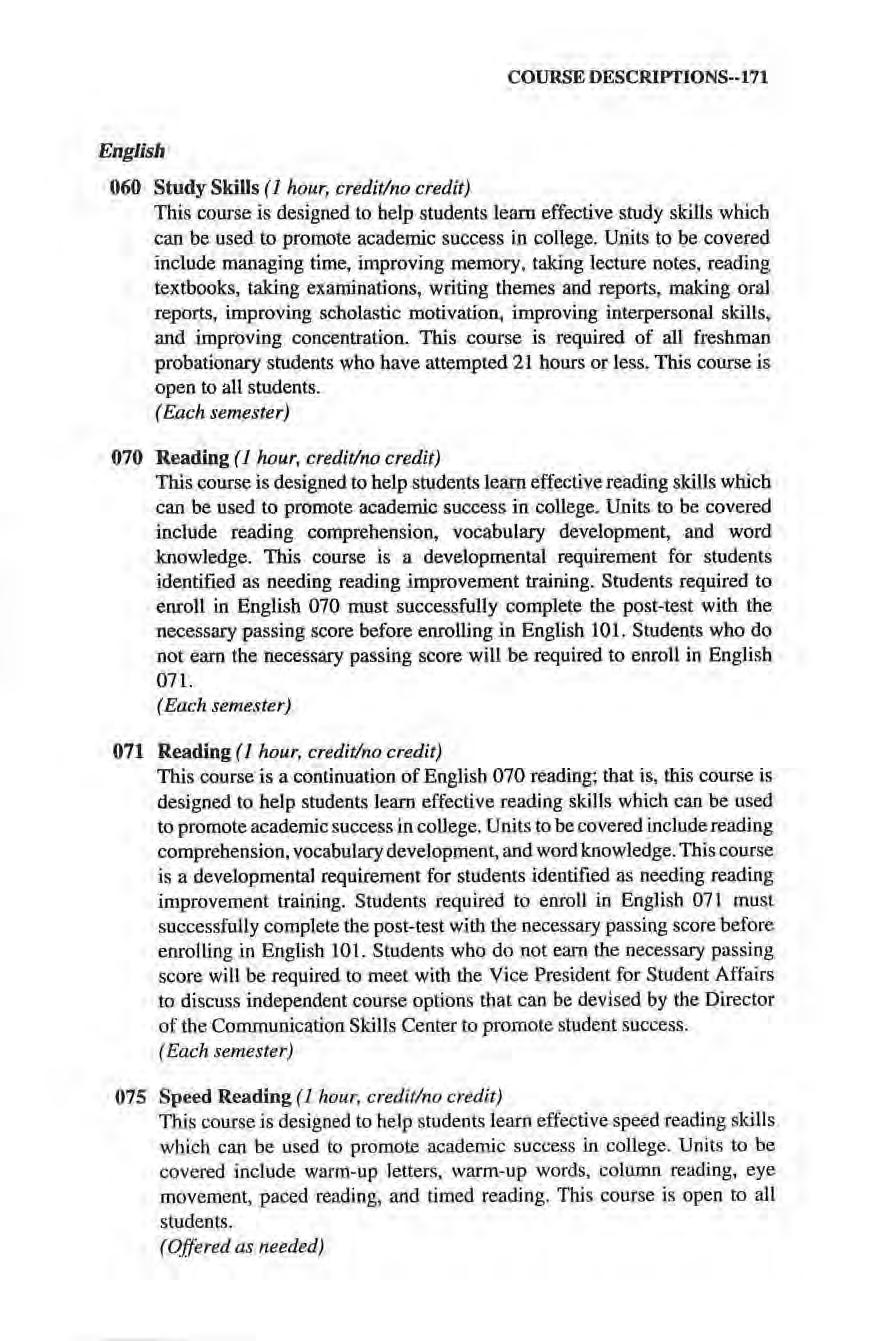
(Each semester)
075 Speed Reading (1 hour, credit/no c redit)
Thi s course is designed to help s tudents learn effective speed reading s kill s which can be used to promote academi c s u ccess in college. Units t o be covered include warm-up letters, warm-up words, column reading, eye movement, p aced reading, and timed readi ng. Thi s course i s open to all students.
(Offered as needed)
COURSE DESCRIPTfONS--171
080 Composition ( 1 ho14', credit/110 credit)
This course is designed to help students learn effective writing skills which can be used to promote academic success in college. Units to be covered inc l ude capitalization, grammar, punctuation, spelling, planning , developing paragraphs, composition skills, and English fundamentals. This course is a developmental requirement for students identified as needing writing improvement training. Students required to enroll in English 080 must successful ly complete the post-test with the necessary passing score before enromng in English 101. Students who do not earn the necessary passing score will be required to enroll in English 081.
(Each semester)
081 Composition (1 hour, credit/no credit)
This course is a continuation of English 080 composition; that is, this course is designed to help students learn effective writing skills which can be used to promote academic success in college. Units to be covered include capitalization, grammar, punctuation, spelling, planning, developing paragraphs, composition slcills, and English fundamentals This course is a developmental requirement for s tudents identified as needing writing improvement training. Students required to enroll in English 081 must successfully complete the post-test with the necessary passing score b efore e nrolling in English 101. Students who do not earn the.necessary passing score will be required to meet with the Vice President fm· Student Affairs to discuss independent course options that can be devised by the Director of the Communication Skills Center to promote student success.
(Each semester)
101 English Composition (3 hours)
A study of the principles of clear and effective expression as applied to the sentence, paragraph, and the whole composition. A review of grammar, mechanics, and correct usage . Training in organization, and the writing of short and long papers. Required course for all freshmen (Note: Students who rank a tthe85th percentile or higher on the English portion of the ACT may be excused from English 101.)
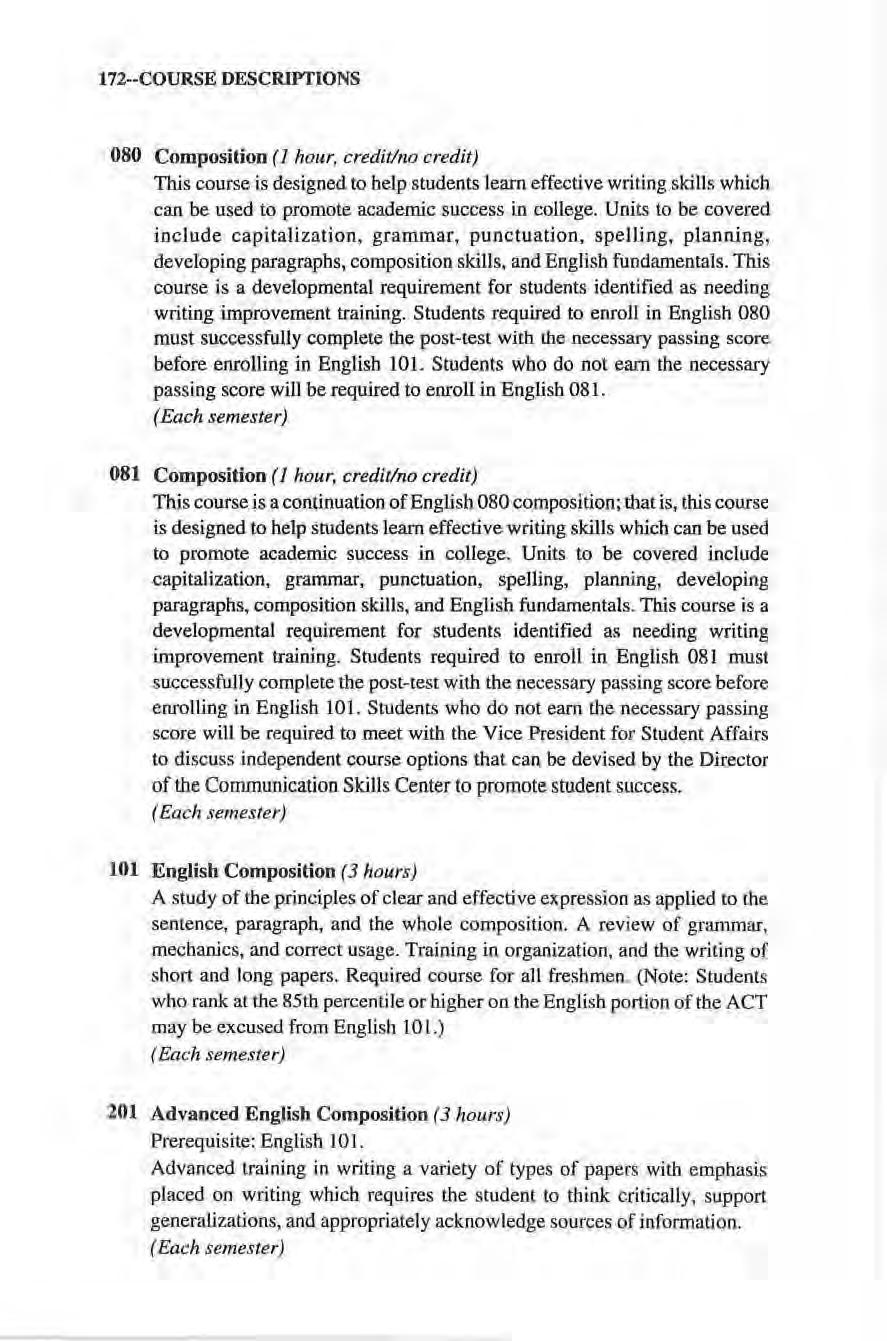
(Eac h semester)
2 01 Advanced English Composition (3 hours)
Prerequisi1e: English 101.
Advanced training in writing a variety of types of papers with emphasis placed on writing which requires the s tudent to think critically, s upport generalizations, and appropriately acknowledge sources of informatio n.
(Each semester)
172--COURSE DESCRIPTIONS
202 Appreciation of Literature (3 hours)
Meets a general education requirement designed to increase the student's appreciation of literature with an emphasis on modem literary forms. ( Each semester)
203 Literature for Children through Adolescence (3 hours)
A survey of literature for children through adolescence with an emphasis on applying the principles of evaluation to selected books from both traditional and modem picture books, poems, and stories. (Each Spring semester)
222 World Literatu:re to 1500 (3 hours)
An introduction to classical and medieval traditions in Western literature. (Spring semester, even years)
223 Non-Western Literature(] hours)
An examination of significant literary works of Africa, the Middle East, Asia, Australia, New Zealand, Latin America, and the Caribbean (Each semester)
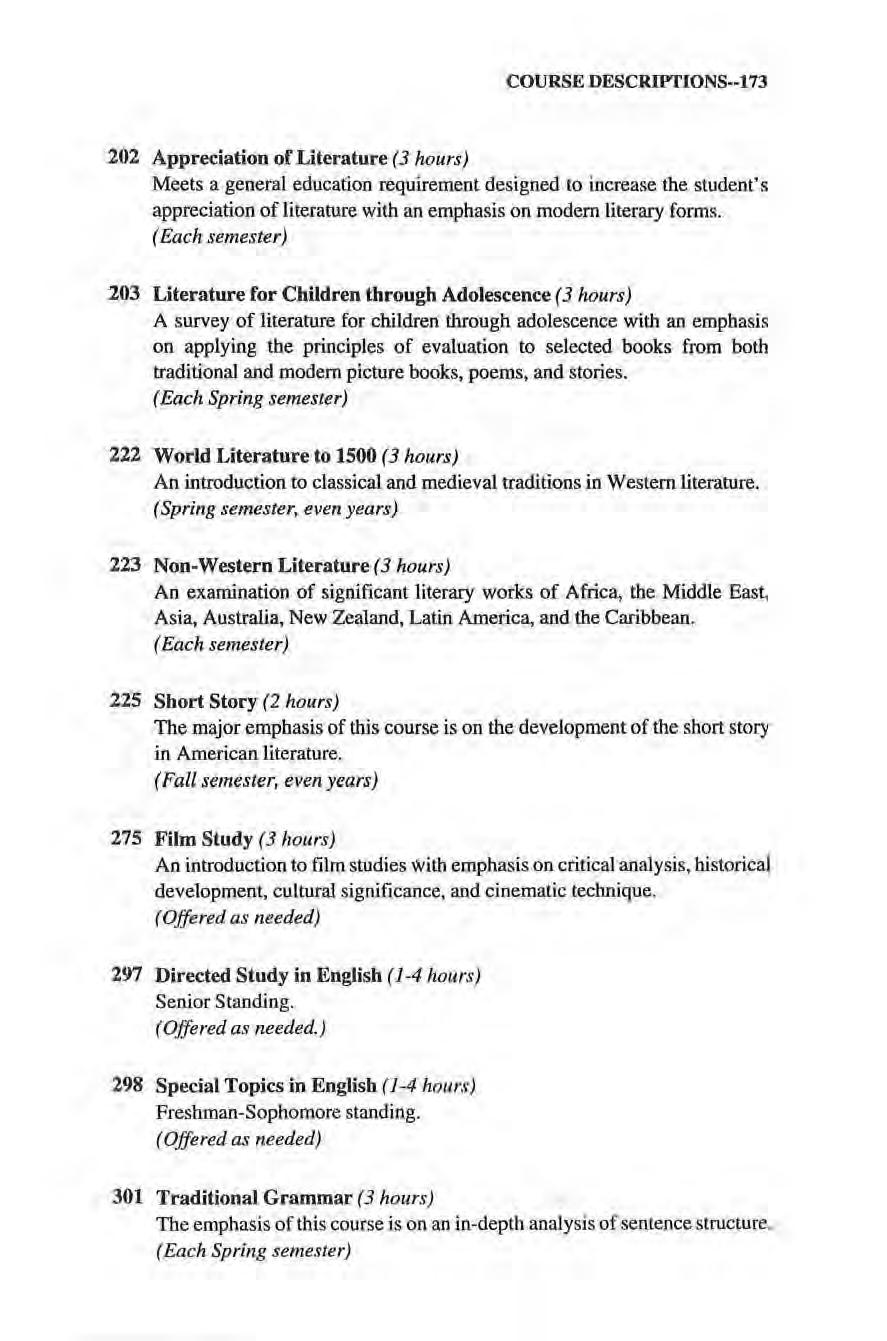
225 Short Story (2 hours)
The major emphasis of this course is on the development of the short story in American literature. (Fall semester, ever1 years)
275 Film Study (3 hours)
An introduction to film studies with emphasis on critical analysis, historical development, cu ltural significance, and cinematic technique.
(Offered as needed)
297 Directed Study in Engl ish ( 1-4 hours) Senior Standing.
(Offered as needed.)
298 Special Topics in English (l-4 hours)
Freshman-Sophomore standing.
(Offered as needed)
301 Traditional Grammar (3 hours)
The emphasis of this course is on an in-depth analysis of sentence structure, (Each Spring semester)
COURSE DESCRIPTIONS--173
DESCRIPTIONS
305 Practicum in Composition (3 hours)
An investigation of current practices, research, issues, and theories about teaching composition to see how they apply to classroom teaching (Fall semester, even years)
306 Nebraska Literature (3 hours)
Prerequisite: Consent of the instructor. An introduction to the works o f Nebraska writers and literature about Nebraska. (Spring semester, even years)
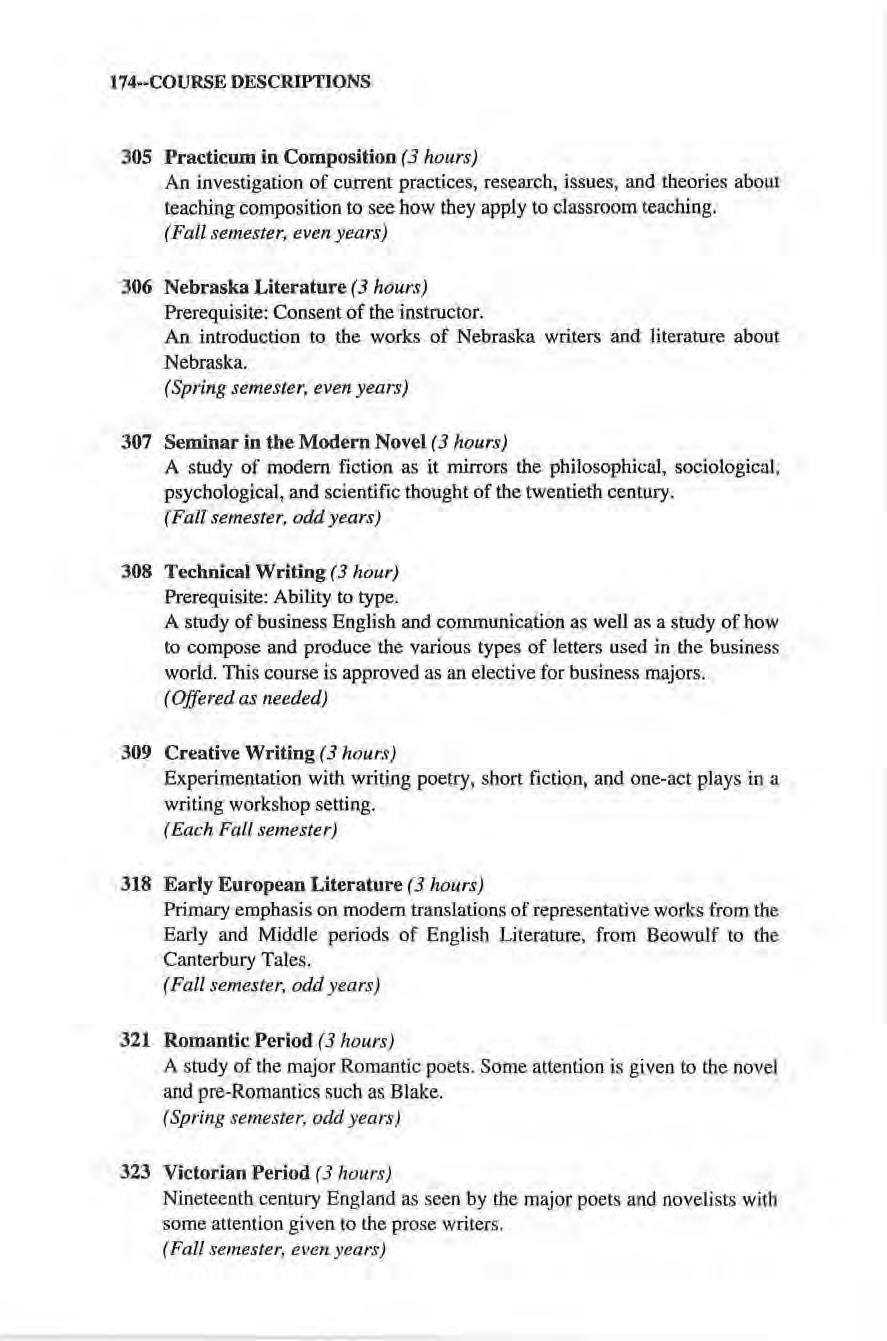
307 Seminar in the Modern Novel (3 hours)
A s tudy of modem fiction as it mirrors the philosophical, sociological, psychological, and scientifi c thought of th.e twentieth century. (Fall semester, odd years)
308 Technical Writing (3 hour)
Prerequisite: Ability to type. A study of business E ng li sh and communication as well as a study of how to compose and produce the variou s types of letters used in the business world Th is cou rse is approved as an elective for bu siness majors. ( Offered as needed)
309 Creative Writing (3 hours)
Experimentation with writing poetry, s hort fiction, and one-act p lays in a writi ng workshop setting. (Each Fall semester)
3 18 Early Eu ropean Literature (3 hou r s)
Primary emphas is o n modem translations of re presentative work s from the Early and Middl e periods of Engli sh Literature, from Beowulf to the Canterbury Tales (Fall semester, odd years)
321 Romantic Period (3 hours)
A s tudy of the major Romantic poets. Some attention is given to the novel and pre-Romantics such as Blake. (Spring semester, odd years)
323 Victorian Perio d (3 hours)
Nineteenth century England as see n by the major poets and novelists with so me attent ion given to the prose writers. (Fail semester, even years)
174-•COURSE
324 American Literature I (3 hours)
An historical survey of significant American writing from the Colonial Period to 1865. Major writers receive chief emphasis. (Fall semester, odd years)
325 American Literature O (3 hours)
A continuation of English 324 from 1865 to present. ( Each Spring semester)
328 Modern Poetry ( 3 hours)
A study of British and American poetry of this century and its relevance to contemporary literature and life.
(Spring semester, even years)
405 Teaching English and Speech (2 hours)
A study of the basic objectives and the scope of English, speech, and debate in the secondary curriculum. C urrent techniques used in teachin g the three areas are examined and eva luated.
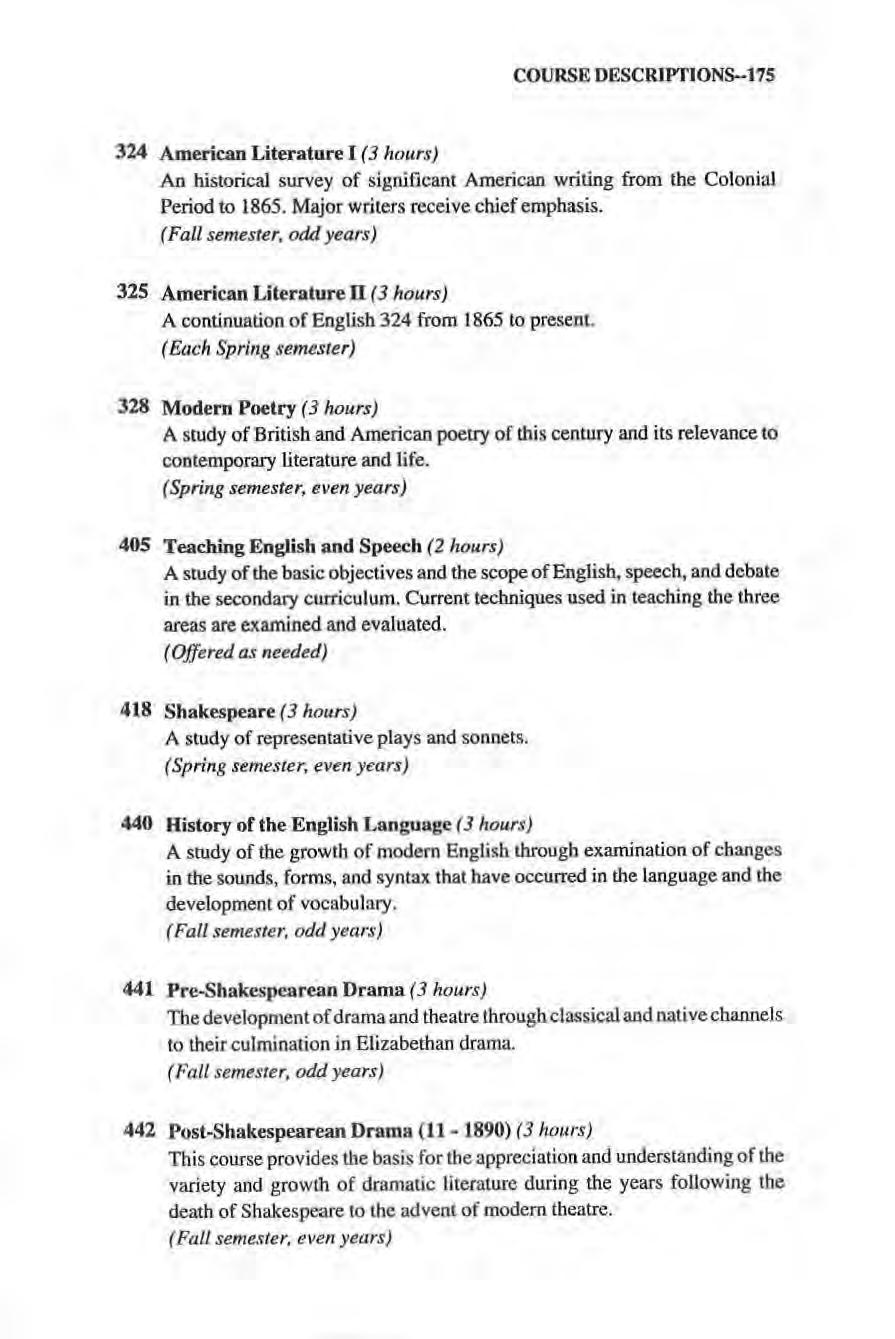
(Offered as needed)
418 Shakespeare (3 hours)
A study of representative plays and sonnets.
(Spring semester, even years)
440 History of the English Language ( 3 hours)
A study of the growth of modern English through examination of changes in the sounds, forms, and syntax that have occurred in the l anguage and the development of vocabul ary.
(Fall semester, odd yea rs)
441 Pre-Shakespearean Drama (3 hours)
The development of drama and theatre through classical and native channels to their culmination in Elizabethan drama .
( Fall semester, odd years)
442 Post-Shakespearean Drama (11- 1890) (3 hours)
This course provides the basis for the appreciatio n and understanding of the variety and growth of dramatic literature during the years following th e death of Shakespeare to th e advent of modern theatre.
(Fall semester, even years)
COURSE DESCRlPTIONS-175
443 Modern Drama 1890 - present (3 hours)
This course provides the student the opportunity to follow the growth of modem dramatic techniques in the western world, the interaction of these techniques with the modem movements i n art. music and other art forms, and to make the student aware of his recent heritage of dramatic literature and its position in the world of thought and emotion.
(Spring semester, odd years)
497 Directed Study in English ( 1-4 hours) Senior Standing.
(Offered as needed.)
498 Special Topics in English ( 1-4 hours)
Junior-Senior standi ng.
(Offered as needed)
499 Independent Study in English ( 1-3 hours)
Prerequisite: Junior standing; Permission of Instructor and prior approval of Division Chair.
(Offered as needed)
General Science
100 Physics ( 4 hours)
Th.is course is designed to acquaint the student with physics. The areas of energy, mechanics , heat , electricity, sound, and light are surveyed. Three hours c lasswork, two hours laboratory.
(Fall semester, even years)
20S Introductory Biology ( 3 Jwurs)
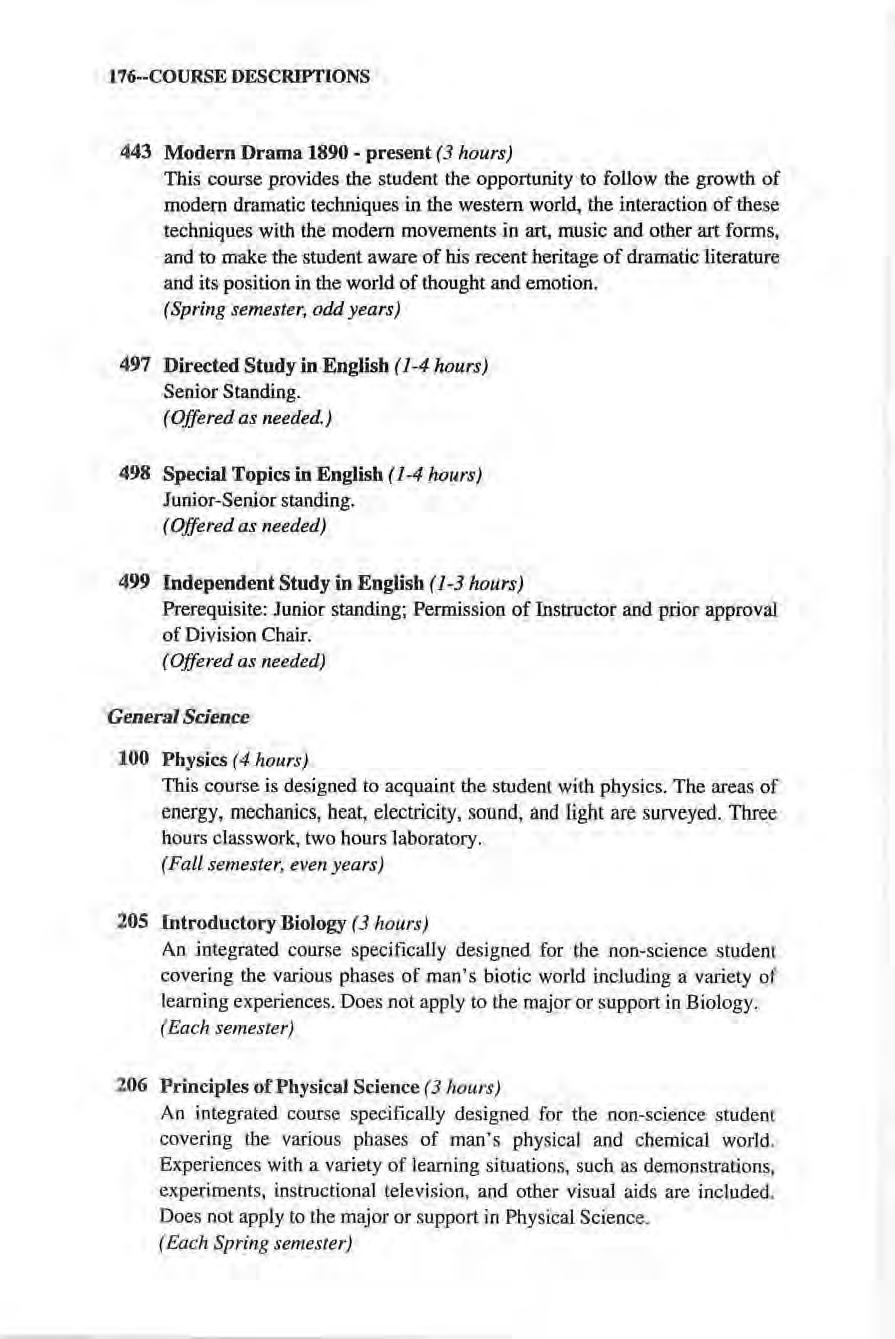
An integrated course specifi cally designed for ~he non-science student covering the various phases of man's biotic world including a variety of Leaming experiences. Does not apply to the major or support in Biology.
(Each semester)
2 06 Principles of Physical Science (3 hours)
An integrated course specifically designed for the non-science student covering the various phases of man 's physical and chemical world. Experiences wlth a variety of learning situations, such as demonstrations, experiments, instru c tion al television , and other visual aids are included. Does not apply lo the major or s upport in Physical Science.
(Each Sprin g semester)
176--COURSE
DESCRIPTIONS
232 Energy (3 hours)
A study of energy resources with a focus on both nuclear and conventional power stations, design operation, cost, governmental regulations, safety, and environmental effects. Field trips to nuclear and conventional generation stations are required .
(Each Fall semester)
241 Cooperative Education Internship . ( 1-4 hours)
Prerequisite: 15 hours of completed coursework, nurumum GPA 2.0. permission of Cooperative Education staff and Division Chair. This program is designed for students with an intended major in the Science and Technology Division to explore and/or gain work experience related to their major and anticipated career goals. Students J,Tiay enroll for l-4 hours of credit which will be graded on a credit/no credit basis. A minimum of forty hours of work experience will be required for every hour of credit per semester. The student will complete necessary paperwork with employer and Cooperative Education office. The student's work will be sup erv ised by Cooperative Education staff. A final paper will be prepared at the conclusion of the internship.
(Each semester; summer session)
297 Directed Study in General Science (1-4 hours)
Senior standing.
(Offered as needed)
298 Special Topics in General Science ( 1-4 hours)
Freshman-Sophomore standing.
(Offered as needed)
441 Cooperative Education Internship ( 1-12 hours)
Prerequisite: 45 hours of completed coursework, mmtmum 2.0 GPA, permission of Cooperative Education staff and Divi sion C hair. This p rogram is designed for students :with a major in the Science and Technology Divisjon to gain work experience related to their major and career goals. Students may enroll for 1- 12 hours of graded credit. A mini mum of forty hours of work experience will be required for every hour of credit per semester. The student will c omplete necessary paperwork with employer and Cooperative Education office. The student's work will be supervised by Cooperative Education staff. A final paper will be prepared at the conclusion of the internship.
(Each semester; summer session)
497 Directed Study in Genera) Science ( l-4 hours)

Senior standi ng.
(Offered as needed)
COURSE DESCRIPTIONS--177
498 Special Topics in General Science ( 1-4 hour s)
Junior-Senior standing
(Offered as needed)
499 Independent Study in General Science ( 1-3 hours)
Prerequisite: Junior standing; Permission of Instructor and prior approval of Division Chair.
(Offered as needed)
Geography
101 Principles of Physical Geography (3 hours)
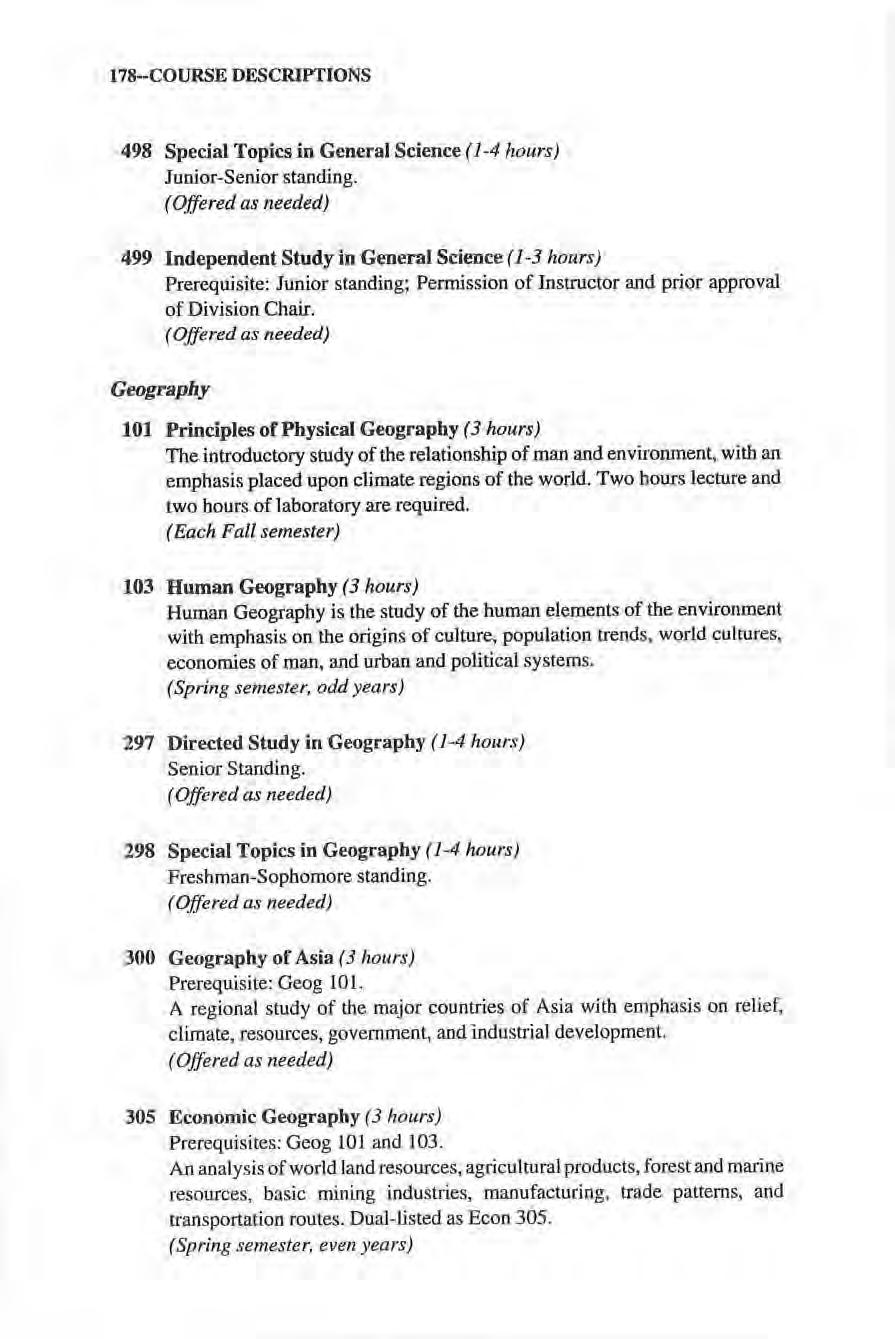
The introductory study of the relationship of man and environment, with an emphasis placed upon climate regions of the world . Two hours lecture and two hours of laboratory .are required.
(Each Fall semester)
103 Human Geography (3 hours)
Human Geography is the study of the human elements of the environment with emphasis on the origins of culture, popul ation trends, world cu lrures, economies of man, and urban and political systems.
(Spring semester, odd years)
297 Directed Study in Geography (1- 4 hours)
Senior Standing.
(Offered as needed)
298 Special Topics in Geography ( l -4 hours)
Freshman -Sophomore standing.
(Offered as neede d)
300 Geography of Asia (3 hours)
Prerequisite: Oeog 10 l.
A regional study of the major countries of Asia with emphasis on relief, climate, resources, government, and industrial development.
(Offered as needed)
305 Economic Geography (3 hours)
Prerequisites: Geog 101 and 103 .
Art analysis of world land resources, agricultural products, forest and marine reso urce s, basic mining industries, manufacturing , trade patterns, and transportation routes. Dual -listed as Econ 305.
(Spring semester, even yea rs)
178--COURSE DESCRIPTIONS
310 Geography or Africa (3 hours)
Prerequisite: Geog 101.
A geograprucal analysis of the continent. Emphasis is placed upon the recent spirit of nationalism and the economic and physical base of selected nations.
(Offered as needed)
311 Urban Geography (3 hours)
Study of the origin, distribution, internal structure and functions of urban developments with an emphasis on location features of economics and cultural phenomena.
(Offered as needed)
312 Geography of Anglo-America (3 hours)
Prerequisite: Geog 101 or senior standing.
A study of the United States and Canada by natural regions. In each case an evaluation of the physical and economic base will be made in the light of the present economic condition.
(Offered as needed)
313 Geography of South America (3 hours)
Prerequisite: Geog 101.
The geographic regions of South America are analyzed in their natural, political, and economic settings as well as the economic relations between South America and the United States.
(Offered as needed)
326 Conservation of Natural Resources (3 hours)

An evaluation of soil, water, mineral, forestry, fish, air, lll)d recreation . resources in order to develop an appreciation of their importance and the seriousness of environmental problems.
(Offered as needed)
404 History and Philosophy of Geography (2 hours)
Prerequisites: Geog IO l and 103.
A study of the basic philosophies including the study of the basic geographic thought from ancient to modem times. Independent study through readjngs and research papers.
(Offered as needed)
496 Political Geography (3 hours)
Prerequisites: Geog 101 and 103.
The study of Geography as a factor in the d ifferentiation of political phenomena in various parts of the world. The modern state in relation to its environment and the interrelationship of nations as a result of their geographical strengths and weaknesses is stressed.
(Offered as TLeeded)
COURSE DESCRIPTIONS--179
497 Directed Study in Geography (1 -4 hoi1rs)

Senior Standing.
(Offered as needed)
498 Special Topics in Geography ( 1-4 hours)
Junior-Senior standing.
(Offered as needed)
499 Independent Study in Geography ( 1-3 hours)
Prerequisite: Junior standing; Permission of Instructor and prior approval of Division Chair.
(Offered as needed)
Geology
201 Physical Geology (4 hours)
An introduction to the theories of the earth 's origin and the study of the earth's structure and materials with a special emphasis on rock, minerals, landforms , oceanography and environmental studies Three hours l ecture, two hours laboratory.
(Offered as needed)
202 Rocks and Minerals (1-3 hours)
An introductory course to the study of the physical properties of rocks and minerals stressing field work at mineral and rock localities in Southeast Nebraska.
(Offered as needed)
203 Introduction to Fossils ( 1-3 hours)
This is an introductory course to the methods of interpreting the fossil record through actual field work at fossil locations in Southeast Nebraska.
(Offered as needed)
297 Directed Study in Geology (1-4 hours)
Senior standing.
(Offered as needed)
298 Special Topics in Geology ( 1-4 hours)
Freshman-Sophomore standing.
(Offered as n eeded)
180-- COURSE DESCRIPTIONS
301 Historical Geology (4 hours)
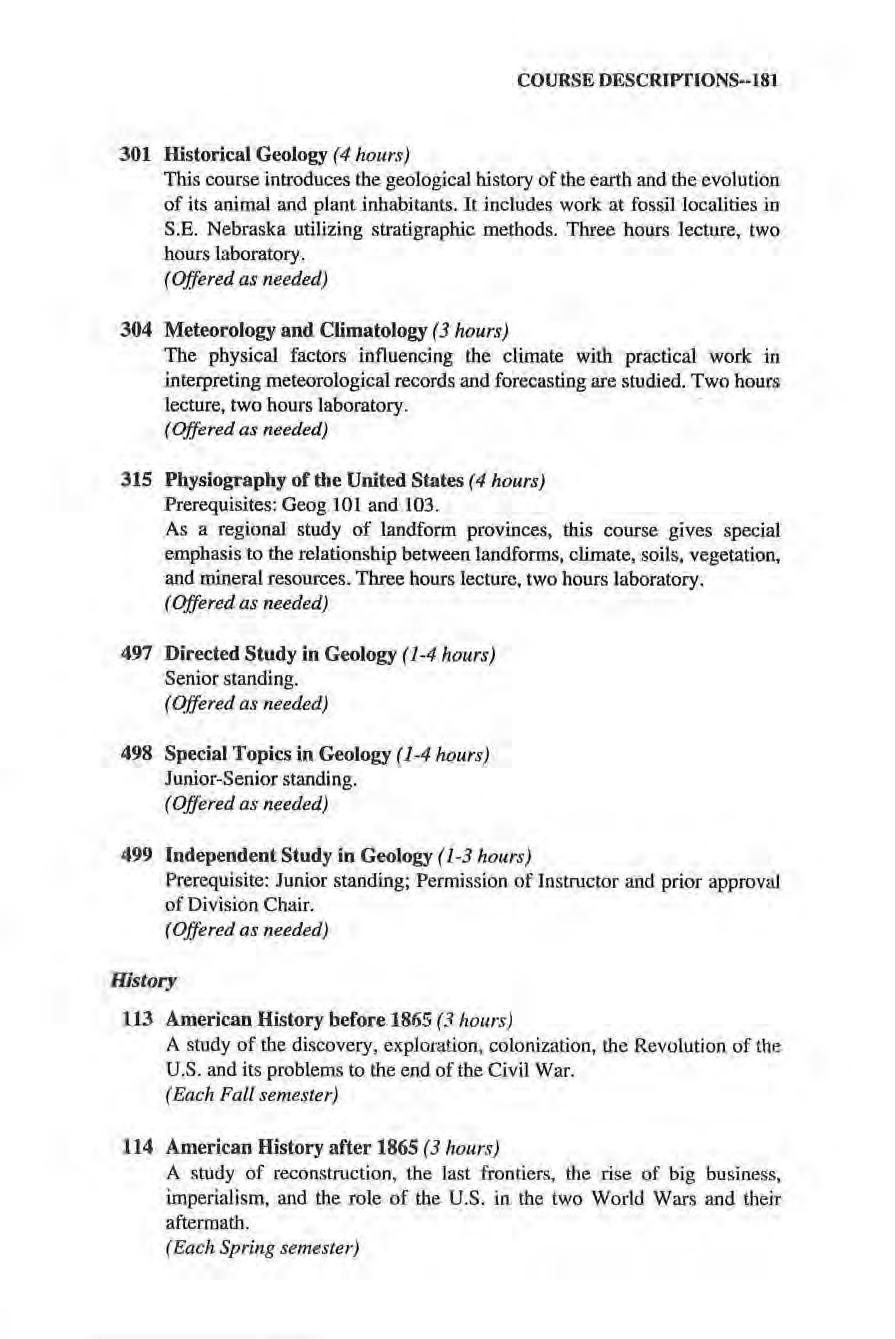
This course introduces tbe geological history of the earth and the evol u tion of its animal and p lant inhabitants. It includes work a t fossil localities in S.E. Nebraska utilizing stratigraphic metbods. Three bours lecture, two hours laboratory .
(Offered as needed)
304 Meteorolo gy and Climatology (3 hours)
The pbysical factors infl uencing th e cl imate wi th practical work i n jnterpreting meteorological records and forecasting are studied. Two hours lecture, two hou rs laboratory. ·
(Offe red as needed)
315 Physiography of the United States (4 hours)
Prerequisi tes: Geog IO I and 103.
As a reg ional study of landform provinces, th is course gives special emphas is to the relationship bet ween landforms, climate, so ils, vegetati on, and mineral resources. Three hours lecture, two hours laboratory.
(Offered as needed)
497 Directed Study in Geology ( 1-4 hours)
Senior standing.
(Offered as needed)
498 Special Topics in Geology (J-4 hours)
Junior-Senior standing.
(Offered as needed)
499 Independent Study in Geology ( I -3 hours)
Prerequisite: Junior standing; Permission of Instructor and prior -approval of Division Chair.
(Offered as needed)
History
113 American History before 1865 (3 hours)
A study of the discovery, exploration, co lo ni zation, the Revolution of the U.S. and its problems to the end of tile Civil War.
(Each Fall semester)
114 American History after 1865 (3 hours)
A study of reconstruction, the last frontiers., the ri se of big bu siness, imperialism, and the .role of tbe U.S. in the two World Wars and their aftermath.
(Each Spring semester)
COURSE DESCRIP'flONS--181
2 01 World Civi lization before 1500 (3 hours)
A survey of the beginnings of civilizations in the great river valleys a nd their diffusion to l ater civilizations in the Middle East and Europe. Particular attention wHI be given to the cultural and political institutions o f the West which furnish our own cultural heritage.
(Each Fall semester)
202 World Civilization after 1500 (3 hours)
The rise and decline of European predominance will be analyzed with emphasis upon the maj or social, political, and economic ideologies and institutions that evol ved.
(Each Spring semester)
251 Modern Africa (3 hours)
Modem Africa presents the history of sub-Saharan Africa, concentrating on the events of the last three centuries. The course illuminates the history o f Africa and provides comparisons with European and American history.
(Each Fall semester)
297 Directed Study in History (1-4 hours) Senior Standing
(Offered as needed)
298 Special Topics in His tory (]-4 hours) Freshman-Sophomore standing.
(Offered as needed)
3 01 Colo nial Amer ica (3 hours)
Prerequisi tes: History 113 or instructor's permiss ion.

A study of colonial rivalry between the Spanish, French, English, ao <;l Dutch in North America, the Revolution, and U.S. history to 1823.
(Offere d as needed)
302 The C ivil War and Reconstruction (3 hours)
A st11dy of the U .S. from 1823 through Manifest Destiny to the war with Spain.
(Fall semester. even years)
303 U.S. In T he Twentieth Century (3 hours)
Prerequisite: History 114 or instructor's permission
A study of the U.S. in modern times w ith an emphasis upon the changing social and economic theories of the period and the internal forces that influenced the ir development.
(Sp ring semeste1~ odd yectrs)
182--COURSE DESCRIPTIONS
304 The Black Experience in America (3 hours)
This survey course investigates black life and culture in America from 1619 to the present.
(Fall semester, odd years)
329 History of Nebraska (3 hours)
A survey of the political, economic, social, and constitutional development of Nebraska from prehistoric times to the present.
(Spring semester, even years)
343 English History from 1688 (3 hours)
Prerequisite: History 202 or instructor's permission.
A survey of the social, political, and economic development of England since the Glorious Revolution. The course covers the social and religious impact of the English Parliamentary system, the effects of the lndustral Revolution upon the British Empire, and the prospects of the modem welfare state of contemporary England.
(Spring semester, odd years)
345 Modero Europe(J hours)
Prerequisite: History 202 or instructor's permission.
A comparative historical analysis of the ongoing process of modernizat ion in Europe. The empha sis i s on movements and in stitut ions such as Liberali sm, Conservatism, Romanticism, Socialis m, Imperialism, and Totalitarianism from 1815 to the present.
(Spring semester, even years)
400 Methods of Teaching History and Social Science (2 hours)

Instruction in the methods of teaching high school History and Social Science.
(Offered as needed)
411 American Frontier (3 hours)
Prerequisite: History 113 or permission.
A study of the importance of the frontier in America from colonial times to the 20th century.
(Spring semester, odd yea rs)
425 Seminar in American History (3 hours)
Prerequisite: Senior standing
This course describes the major fields and periods of American history, the contributio ns of Jeading historians, and the conflicting interpretations of major issues in American history. Th is course is the capstone course and senior competency for the Social Science major.
(Each Fall semester)
COURSE DESCRIPTIONS--183
DESCRIPTIONS
426 American ConstitutionaJ Law (3 hours)
Prerequisite: PSci 201 or 202 or in structor's permission.
A study of the historical political context of constitutional doctrine through major decisions. The emphasis is on const.itutional growth as it relates to the fundamental structure of American government an.d the social order.
Dual-listed as PSci 426.
455 History of Russia and the Soviet Union ( 3 hou.rs)
An analysis of the social, cultural: political, and economic evolution of Russia under the Czars and the formation of the Soviet Union.
(Offered as needed)
497 Directed Study in History ( 1-4 hours)
Senior Standing.
(Offered as needed)
498 Special Topics in History (1-4 hours)
Junior-Senior stan ding.
(Offered as needed)
499 Independent Study in History ( 13 hours)
Prerequisite: Junior standing; permission of fn structor an<l prior approval of D ivis io n Chair.
(Offered as needed)
Honors Program
101 Twentieth Century Issue-Literary Styles (3 hours)
Permission of Honors Program Coordinator required.
(Satisfies the General Studies Literature requirement)
Through literature suc h as fict ion, poetry, drama, biography, autobiography, and historical narrative, this course will focus on selected issues such as education, the environment, racism, behaviorism, nuclear war, political leadership and the psychology of leadership, mass political movements, and the use of propagand a.
(Each Fall Semester)
201 Making Sense: Art in the World (3 hours)
Permission of Honors Program Coordinator required.
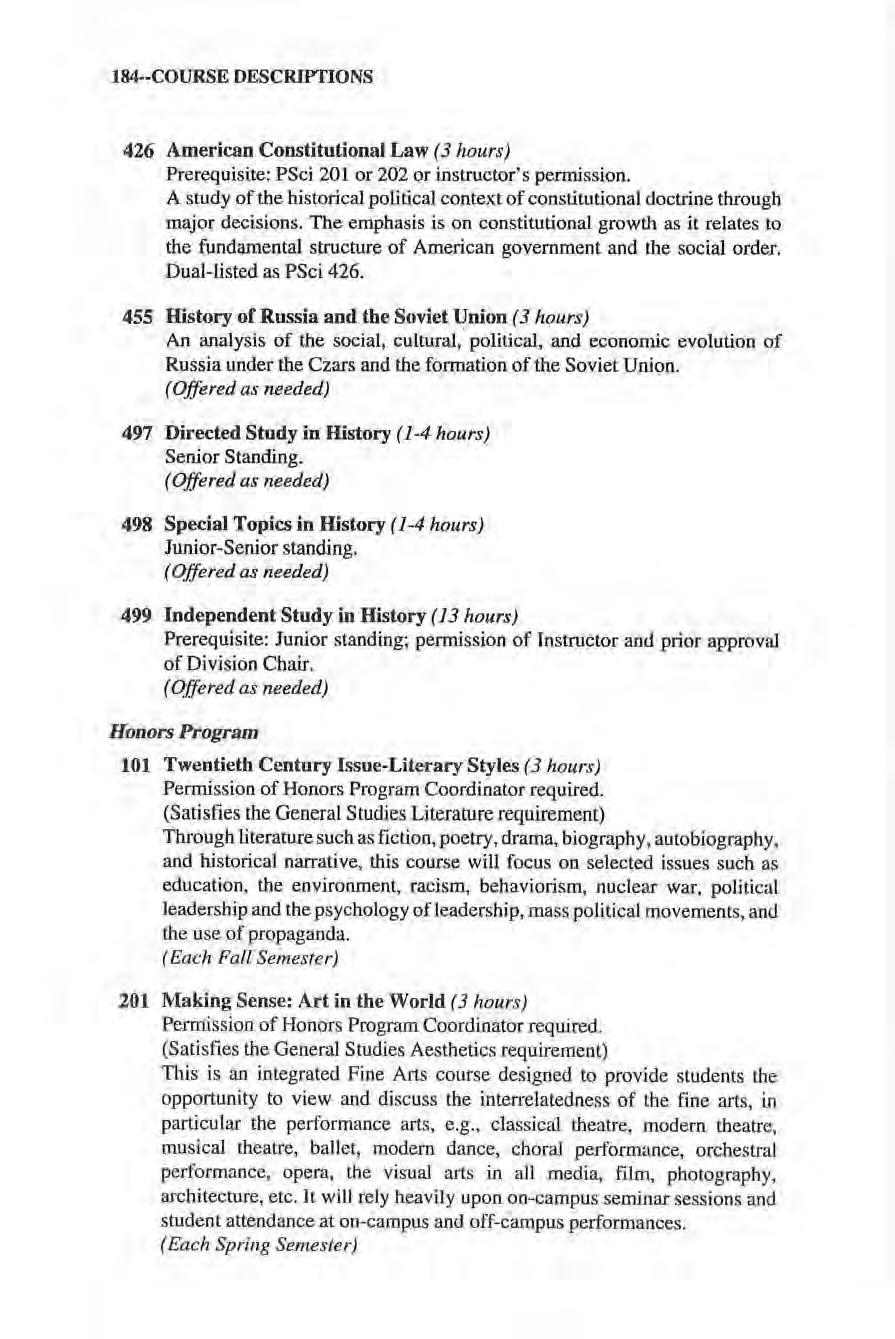
(Satisfies the General Studies Aesthetics requirement)
This is an integrated Fine Arts course designed to provide students the opportunity to view and discuss the interrelatedness of the fine arts, in particular the performance arts, e.g., classical theatre, modern theatre, musical theatre, ballet, modem dance, choral performance, orchestral performance, opera, the visual arts in all media, film, photography, architecture, etc. It will rely heavily upon on-campus seminar sessions and student attendance at on,campus and off-campus performances.
(Each Spring Semester)
184--COURSE
204 Contemporary Asian Cultures (3 ho1trs)
Permission of Honors Program Coordinator required.
(Satisfies the General Studies Non-Western Studies or Buman Relations requirement., but not both)
Thi s course will introduce societies and cultures of the Far Eastern countries with emphasis on Japan, Korea, and China. The course covers such topics as the group, relativism, education, business, religion, role of women, and psychological traits. In addition, s tudents will look at the current i ssues affecting the United States and Asian countries.
(Each Spring semester)
20S Science and Society (3 hours)
Permission of the Honors Program Coordinator required.
(Satisfies one of the General Studies Science course requirements)
This course will focus on the scie ntific method, and the impact that science has on society and individuals. Topics to be considered will be the relationships of science, ethics, politics, moral issues, and societal goals. Students will read published articles, write about, and discuss the topics of this class The course topics will be considered in light of a single discipline within science, evolu tion ary biology.
( Each Spring semester)
212 Introduction to Non-Western Musics (3 hours)
Permission of the Honors Program Coordinator required.
(Satisfies the General Studies Non-Western St1.1dies req1,1irement)
Thi s course is an introduction to ethnomusicology in which the student will learn to experience and understand music in t he context of human life . Students will experience a nd anaJyze the musics of Africa, Native America, Black America, Asia, the Near East, the Pacific, and Eastern Europe. Thi s course will also prov ide th e student the tools with which to discover the meanings of mu sic in the life of any society.
( Each Fall semester)
400 Ethics and Social Justice (3 hou rs)
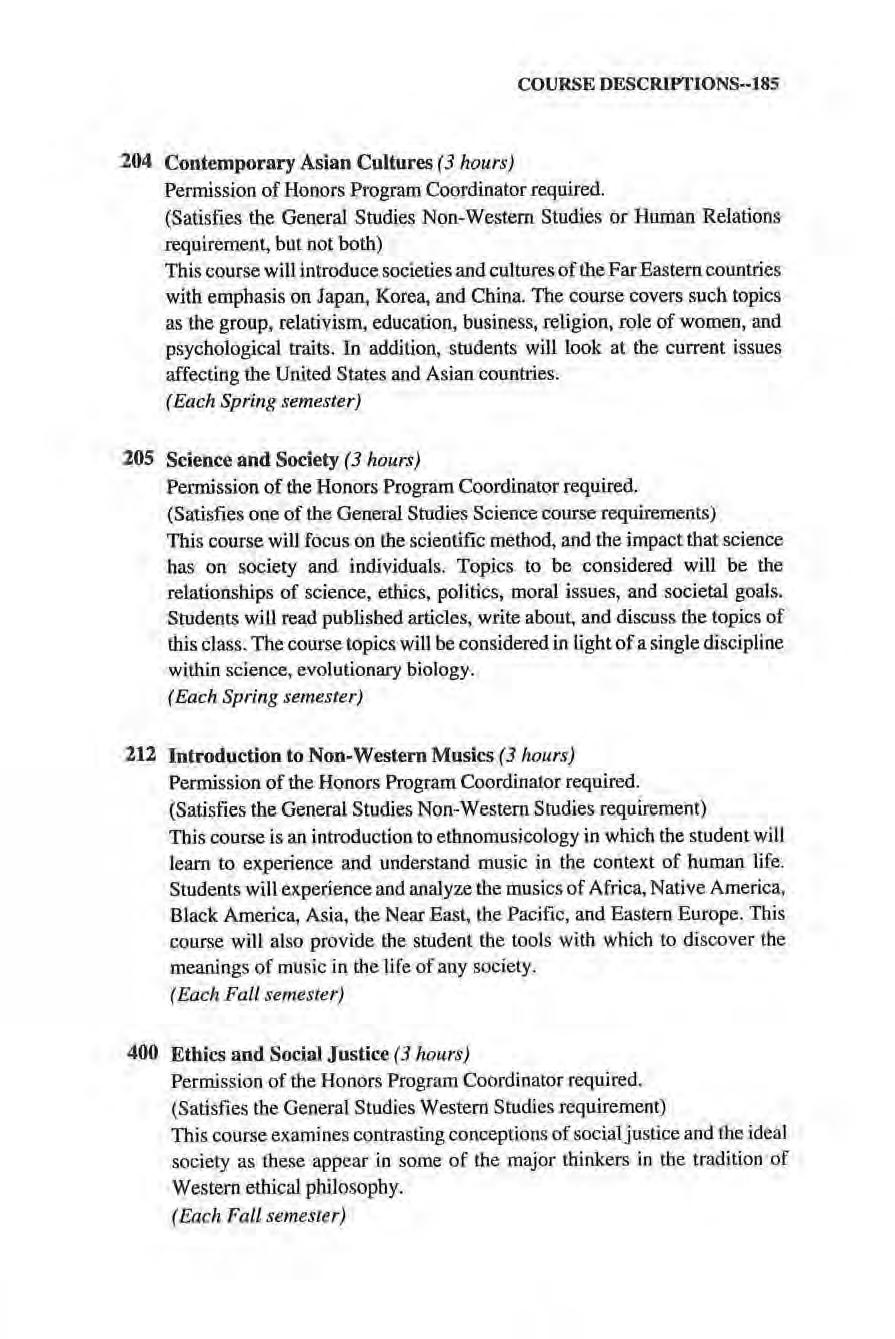
Permission of the Honors Program Coordinator required .
(Satisfies tbe General Studies Western Studies requirement)
This course examines contrasting conceptions of social justice an d the ideal society as these appear in some of the major thinkers in the tradition of Western ethical philosophy.
(Each Fall semester)
COURSE DESCRIPTIONS--185
Humanities
241 Cooperative Education Internship ( 1-4 hours)
Prerequisite: 15 hours of completed coursework, lllllllDlum GPA 2.0, permission of Cooperative Education staff and Division C hair.
The program is designed for students with an intended major i n the Humanities Di vision to explore and/or gain wo rk experience related to their major and anticipated career goals. Students may enroll for 1-4 hours of credit which will be graded o n a credit/no credit basis. A minimum of forty hours of work experience will be required for every hour of credi t per semester. The student will complete necessary paperwork with employer and Cooperative Education office. The student's work will be supervised by Cooperative Education s taff. A final paper will be prepared at the co nclusion of the internship.
(Each semester; summer session)
441 Coop erative Education Internship (1 -12 hours)
Prerequisi te: Approval from Director of Cooperative Education and Division Chair.
This course is des ig ned for any student majoring in any d iscipline listed within the Humanities Di vision. A minimwn of forty hours of work experience will be required for each hour of credi t for which the student enrolls. If any hou rs from t he internship are to be applied toward the completion of a major's requirements, approval to do so m ust be obtained in writ in g fro m the Human i ties Division C h air prior to th e time o f registration. Not more than three (3) ho urs may be applied toward the completion of a major's requireme nts.
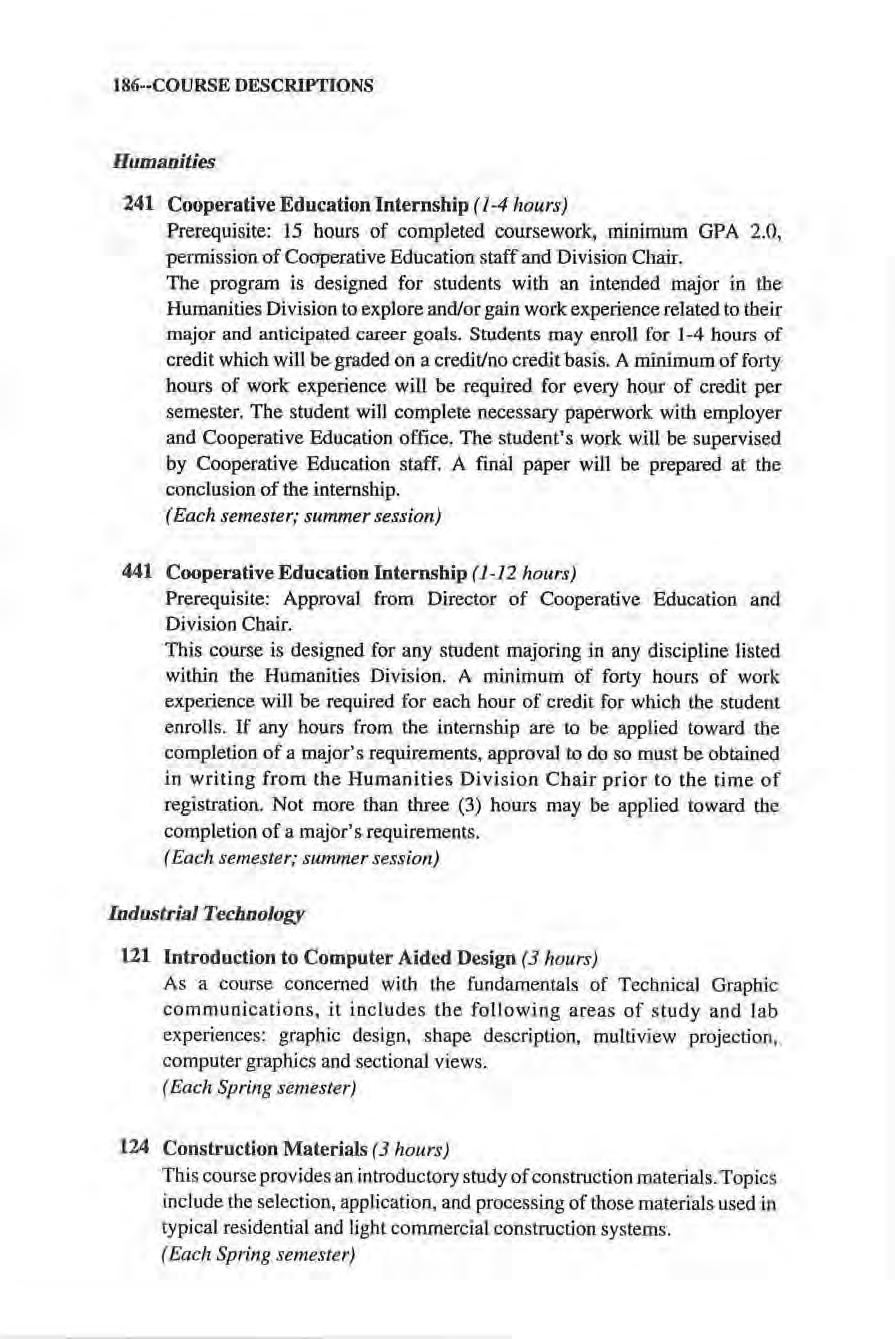
(Each semester; summe r session)
Industrial Technology
121 Introduction to Com puter Aided Design (3 hours)
As a course concerned with the fundamentals of Technical Graphic communications, it includes the following areas of stud y aod Jab experiences: graphic design, shape descripti on, roultiview proj ection, computer graph_ics and sectional views
( Each Spring semester)
124 Construct ion Materials (3 hours)
Thi s course provides an introductory study of construction materials. Topics include the selection, application, and processing of those materials used in typical residential and light commercial construction systems.
(Each Spring semester)
186--COURSE
DESCRIPTIONS
125 Graphic Communications (3 hours)
A course to study the theory and practice of graphic communications and related career s. The course will include basic study and practice in drafting, design, graphic arts, and photography. A ser ies of interrelated activities will be completed to demonstrate the industrial practices utilizedin each area.
(Each Fall semester)
127 Principles of Power Transmission (3 hours)
This course is a basic study of t he production control and transportation of mechanical, electrical, and tluidic power. It deals wi th the interrelationships of these three factors as they are in tegrated into the power/transportation systems of modem technology.
(Each Fall semester)
132 Material Processing I (3 hours)
This course provides an introduction to the study of separating, Conning, and combini ng of industrial materials Areas of study will include the processing technology assoc iated with metals, composites, and synthetic materials.
(Each Spring semester)
226 Photography I (2-3 hours)
This course studies the theory and practice in the bas ic fundamentals of photography including composition, exposure, lighting, developing, contact printing and enlarging. The third hour credit is gained by additional assignments. Each student must have a camera.
(Each Fall semester)
233 Electricity/E lectronics ( 3 hours)
Prerequisite: IT 127 or special permission. Principles and applications of AC and DC theory as utilized in home, business, and industry are covered. Areas of instruction include: electrical/ electronic theory, lighting, heating, motors and generators, residential and industrial wiring, and basic automotive electrical systems.
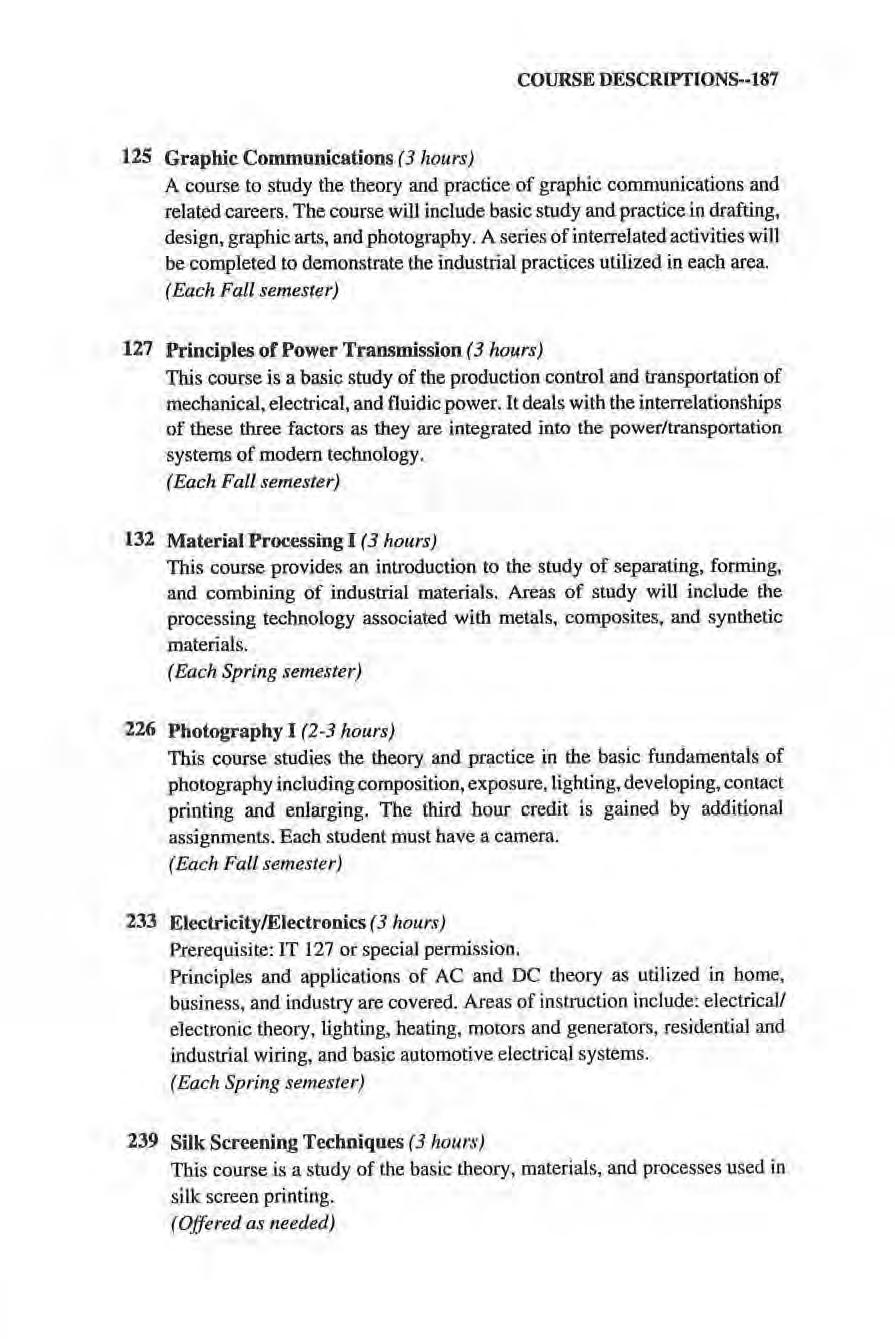
(Each Spring semester)
239 Silk Screening Techniques (3 hou r s)
This course is a study of the basic theory, materials. and processes used in silk screen pri nting.
(Offered as needed)
COURSE DESCRlPTIONS--187
240 Car Care (2 hours)
This course is designed to provide the student with a bas ic knowledge of purchasing, maintaining, insuring, and operating the modern automobile Consumer information is stressed together with basic knowledge of automotive lubrication, tune--up, and diagnosis. This course does not apply on the Industrial Tech nology and Education major.
( Offered as needed)
242 Principles of Technology (3 /lours)

This course presents the principles of technology. Units will include the study of force, work, rate, resistance, energy and power. Center for Occupational Research and Development materials will be used
(Each Fall semester)
297 Pirected Study in Industrial Technology ( 1-4 hours)
Senior standing.
(Offered as needed)
298 Special Topics in Industrial Technology ( 1 -4 ho urs)
Freshman-Sophomore standing.
(Offe red as needed)
323 Materia l Processing II (3 hours)
Prerequisite: IT 132.
Advanced techniques i n manufacturing processes of machining and casting are covered, T his course will also include the study of chemical and phys ical properties of metals, composite, and synthetic materia1s .
( Each Fall semester)
324 Construction Processes (3 hours)
Prerequisite: IT 124.
Thi s course will examine the management and p roduction techniques associ ated with residential, commercial, and civil construction projects. The course is organized upon t he Construction Specifications Index (C.S.I.) concept. Emphasis will be on s ite preparation, and on substructure and superstructure systems.
(Bach Fall semester)
325 Photography II (2-3 hours)
Prerequisite: IT 226,
A course designed to continue with the practices and techniques learned i n Photography I. The subj ect matter will include such items as: types of cameras, lenses, fi lms and developers, as well as color s lides and color prints.
(Offered as needed)
188--COURSE DESCRlPTlONS
328 Analog Electronics (3 hours)
Prerequisite: IT 233 or special pennission.
As a study of the principles and applications of electronics in control and communication equipment. Instruction in the theory and application of solid state and electronic devices in power supplies, amplifiers, oscillator, and various other circuits will be given.
(Offered as needed)
329 Desktop Publishing (3 hours)
Prerequisites: CSd 100, Eng 201 and ability to type.
This course is designed to study and utilize the modern techniques of th e computer scanner and laser printer to develop a publishing system. Emphasis will be placed on computer principles and functional applications of desktop publishing. Business communications in the fonn of reports, forms and resumes will also be addressed.
(Each Spring semester)
333 Computer Aided Design/Computer Aided Manufacturing ( 3 hours)
The purpose of this course is to integrate the design process (CAD) with the manufacturing process (CAM). Emphasis will be placed on CAD applications (AutoCad) and C N.C. operation and control.
(Each Spring semester)
334 Automotive Syste,ns and Maintenance (3 hours)
The student will acquire technical information jn the fundamentals and economic operation of the modern automob ile in this course.
(Offered as needed)
337 Driver Education and Traffic Safety I (3 hours)
Prerequisite: Twenty thousand miles or two years of driving experience free of repeated chargeable accidents and moving violations. This course will include presentat ion of materials and methods of traffic safety and driver traini ng, wi th emphas is upon attitude, skil l development, organization and administration, driving regulations and safe automotive operation.
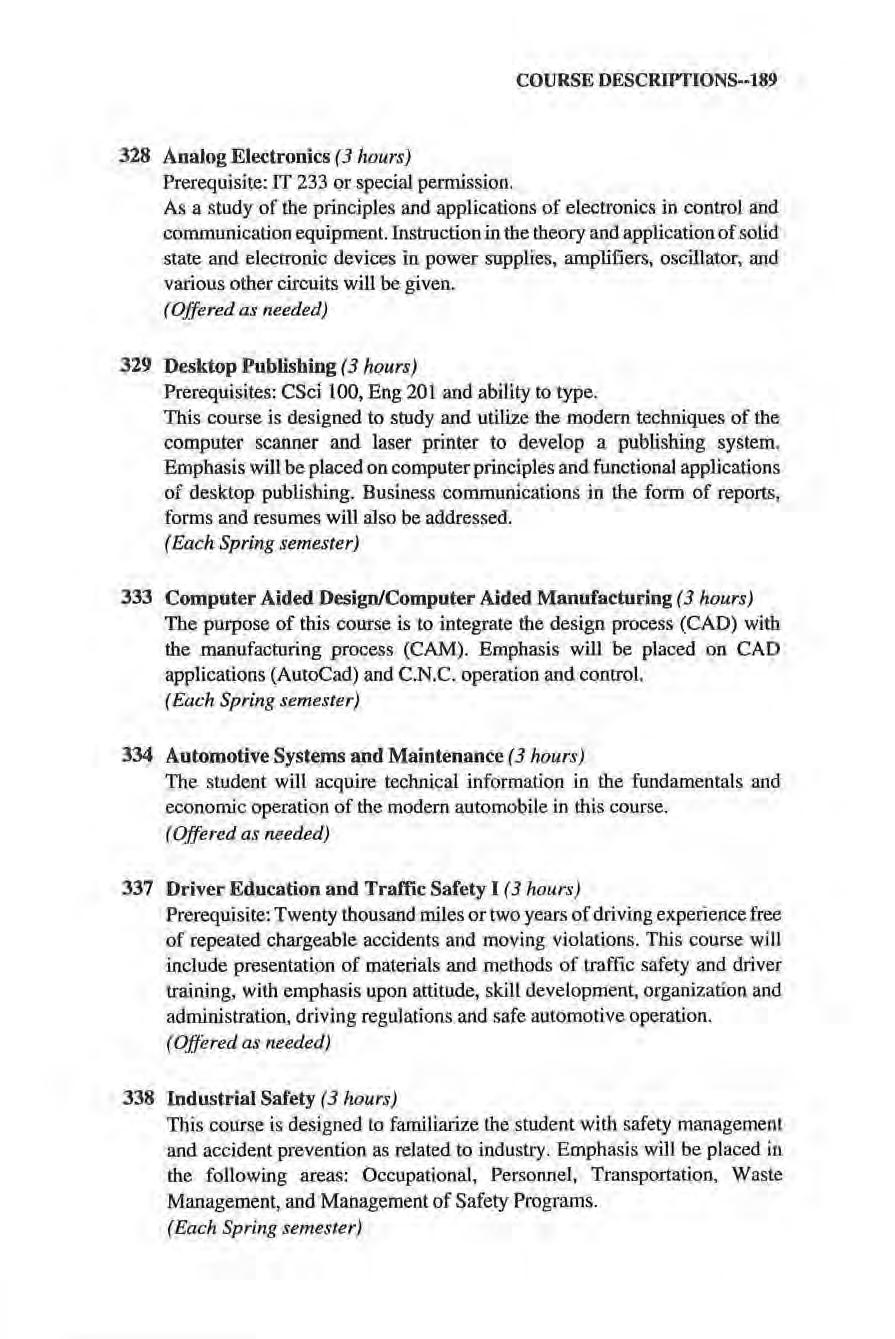
(Offered as needed)
338 Industrial Safety (3 hours)
This course is designed to familiarize the student with safety management and accident prevention as related to indus try. Emphasis will be placed in the following areas: Occupational, Personnel, Transportation, Waste Management, and Management of Safety Programs.
(Each Spring semester)
COURSE DESCRIPTIONS--189
339 Computer Aided Design (3 hours)
Prerequisite: IT 121.
Computer Aided Design is a course designed to introduce tbe student to tbe use of computers, digitizing pad and plotters in designing and drawing products in the industrial world. Proj ects will be e ncountered that will deal with graphs and charts, architectural design and technical drawings.
(Each Fall semester)
340 Driver Education and Traffic Safety II (3 hours)
This course will provide an opportunity to construct materials relating to and experimenting with metbods of presenting lessons in traffic safety and behind-the-wheel driving Each student will be expected to teach a beginning driver.
(Summer Session, offered as needed)
343 Hydraulics and Pneumatics (3 hours)
This course w ill cover fluid power principles with practical application of hydraulics, pneumatics, and fl uidics.
(Each Spring semester)
350 Facilities Management (3 hours)
This course i s designed to acquaint the student with procurement, and disbursement of materials and equipment in the industrial setting. Planning, design, and organization of indu strial facilrties and materials handling will also be included.
( Each Fall semester)
370 Robotic Applications (3 hours)
This course provides instruction in the fundamentals and management of robots in i ndustry. It will introduce the student to the evolution, class i fication, safety. economics, sociological imp act, and future capabilities of indu s trial robots, as well as developing a familiarization of p resent uses in a variety of indusri al applications.
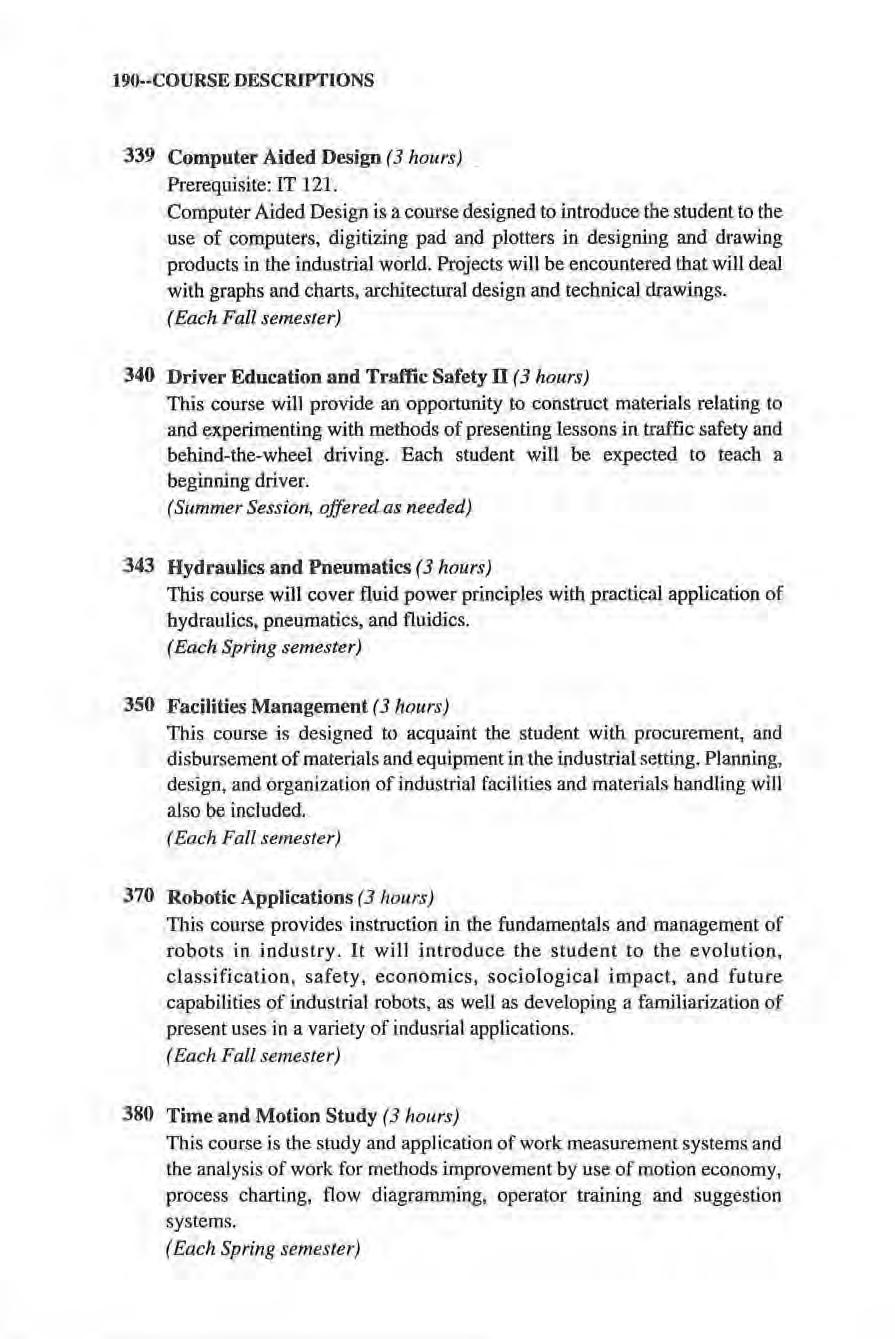
(Each Fall semester)
380 Time and Motion Study (3 hours)
Tb is course is the study and appl icati.on of work measurement systems and the analys i s of work for methods improvement by use of motion economy, process charting, flow diagramming, operator training and suggestion systems.
(Each Spring semester)
190--COURSE
DESCRIPTIONS
381 Quality Assurance (3 hours)
The techniques and procedures of determining and maintaining the quality of industrial products, random sampling and o ther statistical procedures used in the manufacturing and service sector to determine if products meet specifications are covered in this course. Also, product quality improvement by design and s tructural features is discovered.
(Each Spring semester)
410 Digital Electronics (3 hours)
Prerequisite: IT 328 or permission.
As a study o f digital integrated circuits, topics covered will include numbering systems, log ic gates, flip flops, registers, clocks, and memories
(Offered as needed)
415 Microprocessors (3 hours)
Prerequisite: IT 410.
The fundamental concepts of microprocessors including software, hardware, and interface techniques are covered. Industrial applications will also be examined.
(Offe red as ,ieeded) ·
420 Technology Lab Management(] hours)
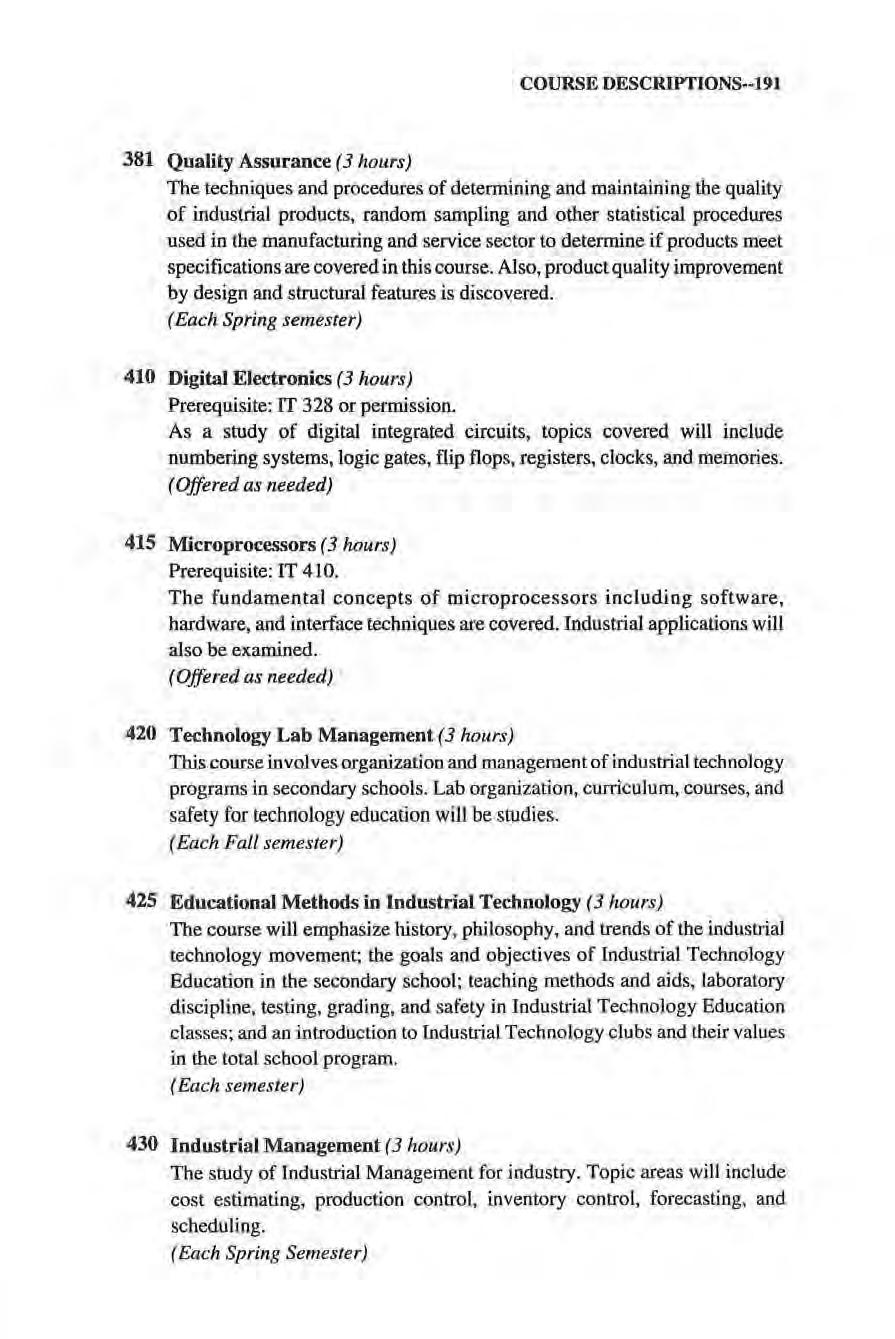
This course involves organization aod management of industrial technology programs in secondary schoo ls. Lab organization, curriculum, courses, and safety for technology education will be stu dies.
(Each Fall semester)
425 Educational Methods in Industrial T echnology (3 hours)
The course w ill emphasize history, philosophy , and trends of the industrial technology movement; the goals and objectives of In dustrial Technology Education in the secondary schoo l; teaching methods and aids, laboratory d iscipline, testing, grading, and safety in Industrial Technology Education classes; and an introduction to Industrial T echnology clu bs and their valu es in the total school program.
(Each semester)
430 Industrial Ma nagement (3 hours)
The study of fndustrial Manageme nt for industry. Topic areas will include cost estimati ng, production control, inventory control, forecasting, and schedul ing.
(Each Spring Semester)
COURSE DESCRIPTIONS--191
192--COURSE DESCRIPTIONS
450 Flexible Manufacturing Systems (3 hours)
Prerequis ite: Junior or Senior IT major. This course will address computer programming concepts for computer numerically controlled (C.N.C.) machines. Standard industry G-codes and M-codes will be utilized. I ntroductory robotic programming and applications will be an integral part of the course.
( Offered as needed)
455 Computer Aided Manufacturing in Education (3 hours)
Prerequisite: Junior or Senior IT major. This course will address compute programming concepts for computer numerically controlled (C.N.C.) machines. Standard industry G-codes and M-codes wiJI be initialized. Introductory robotic programming and applications will be an integral part of the course.
(Ojfered as needed)
480 Industrial Management Internsh ip (6 hours)
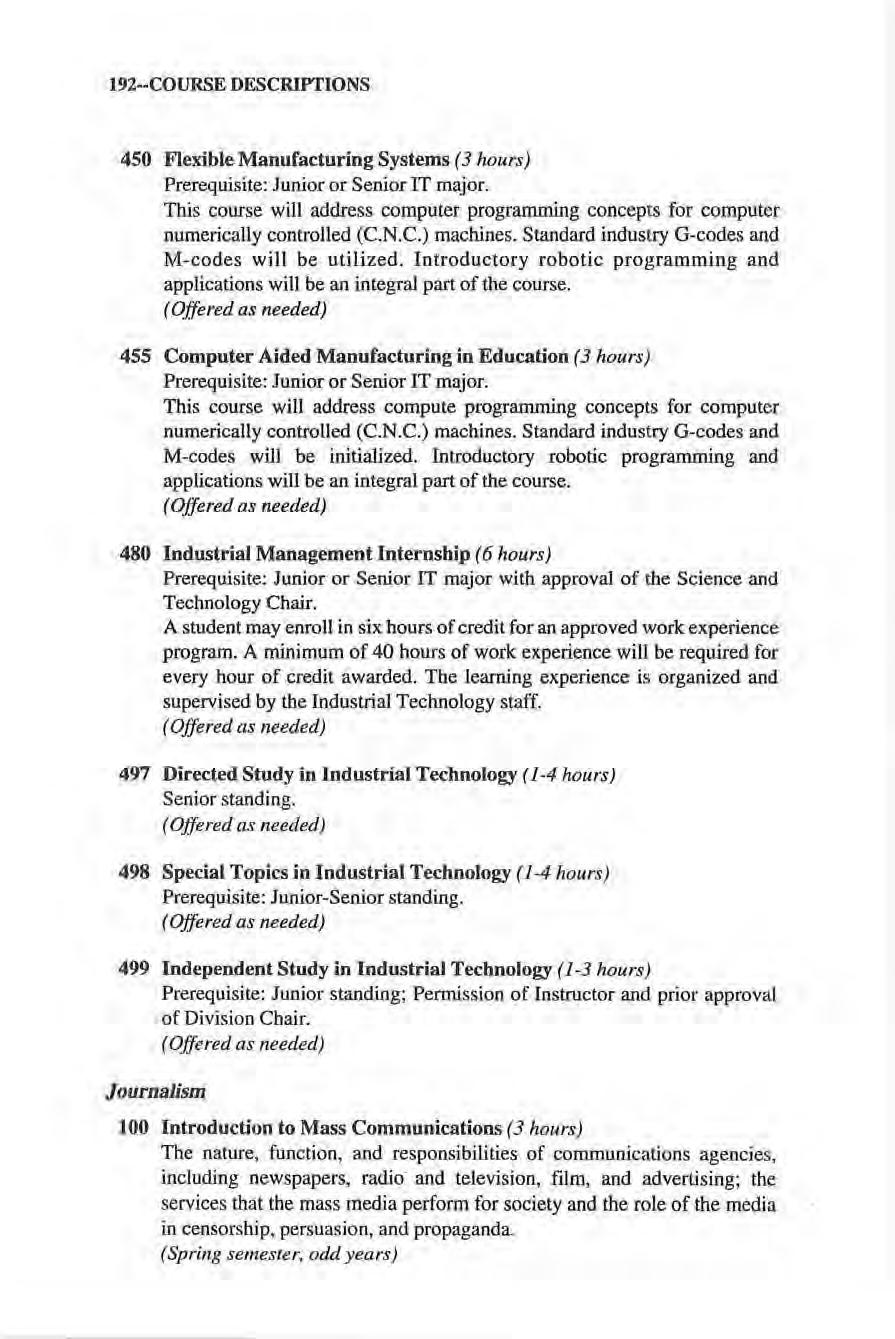
Prerequisite: Junior or Senior IT major with approval of the Science and T echnology Chair.
A student may enroll in six hours of credit for an approved work experience program. A minimum of 40 hours of wotk experience will be req uired for every hour of credit awarded . The learning expe1ience is organized and superv ised by the Lndustrial Technology staff.
( Offered as needed)
497 Directed Study in Industrial Technology ( I-4 hours)
Senior standing.
(Offered as needed)
498 Special Topics in Industrial Technology ( 1-4 hours)
Prerequisite: Junior-Senior standing.
(Offered as needed)
499 Independent Study in lndustri.a) Technology ( I-3 hours)
Prerequisite: Junior standing; Permission of Instructor and prior approval of Division Chair
(Offered as needed)
Journalism
100 Introduction to Mass Communications-(3 hours)
The nature, function, and responsibilities of communications agencies, including newspapers, radio· and television, film, and advertising; the services that the mass media perform for society and the role of the media in censorship, persua~ion, and propaganda.
(Spring semester, odd years)
COURSE DESCRIPTIONS-• 193
234 Beginning Journalism (3 hours)
Prerequisite: Ability to type.
The fundamental principles of gathering and writing news: practice in reporting campus news; work on the Peru State Times, college newspaper.
(Each Fall semester)
235 Newspaper Editing (2 hours)
Prerequisite: Joum 234 or permission of instructor. An intensive course in journalistic desk work that includes copy preparation, headline writing, page l ayout; extensive work on the Peru State Times desk. Credit not to exceed a total of four hours.
(Each Fall semester)
297 Directed Study in Journalism ( 1-4 hours)
Senior Standing.
(Offered as needed)
298 Special Topics in Journalism (2 hours)
Prerequisite: Journalism 234 or permission of instructor. The fundamental principl es of designing, organizing and publishing a college publication will be experienced in this class through work on college projects.
(Offered as needed)
300 Communications Law (3 hours)
A study of the media's legal context with an emphasis on the issues oflibel, contempt, access to public records, invasion of privacy, criticism, and copyright.
(Offered as needed)
401 Journalism Practicum ( 1 hour)
Prerequisites: Journalism 234.
Practicum students will be involved in the production of the college newspaper and/or college yearbook. Credit not to exceed one credit hour each semester. May be repeated for up to six hours credit.
( Ec,ch semester)
497 Directed Study in Journalism ( 1-4 hours)

Senior Standing.
(Offe red as needed)
498 Special Topics in Journalism (2 hours)
Prerequisites: Journalism 298.
A continuation of Journali sm 298 involving advanced techniques in layoul and design.
(Offered as needed)
499 Independent Study in Journalism (1-4 hours)
Junior-Senior standing.
(Offered as needed)
Management
220 Economic Concepts 1 (3 hours)
This course presents elementary concepts of macroeconomics with an emphasis on equilibrium analysis, monetary and fiscal policy, banking and developmental economics.
221 Economic Concepts fl (3 hours)
Consideration is given to the microeconomics concepts of wages, interest, rent and profits, personal distribution of in come, consumption , monopolies , agriculture, government taxation and expenditures, international trade and comparative economic systems.
233 Financial Management (3 h ours)
Accounting principles, concepts and procedures of recording and reporting financial data to serve as the foundation for understanding financial accounting is considered.
234 Accounting Management (3 hours)
This co urse expands the management students' awareness , understanding, and interpretation of the management of financial accounting essentials and stresses planning and control.
251 Legal Concepts (3 hours)
This course examines the source and origin of law and the legal system. and obligations of parties co a contract.
301 Organizational Communications (3 hou rs)
Students s tudy the role of bus i ness letters a nd reports in communication and human relations and problems faced by writers of letters and reports. Other topics of study and analysis include presentational methods in formal business speaking, sales and motivational strategies, conflict resolution, co nducting successful meetings, using visual aids in the business setting, and conducting and participating in interviews.

194--COURSE DESCRIPTIONS
328 Marketing Strategies (3 hours)
Students learn the buying, seUing, transporting, and storing functions involved i n marketing, with an introduction to retailing, wholesaling, and marketing management.
335 Production/Operations Management (3 hours)
Prerequi s ite: Math 340 or Equivalent. Students study the evolution of operational management and its relationship to the total enterprise. Decision making, production and plant p l anning, systems design, manpower planning, and control systems are considered.
373 Organizational Management (3 hours)
This course presents the foundations of the hi s tory, theory, and applications of organizational behavior including personality, stress, motivation, job design, goal setting, learning theory, behavior modification, group behavior, power, leadership, organizational structure, deci s ion-making, and control.
380 Human Resources Management (3 hours)
Prerequisite: Mgmt 373 Recommended. Students learn management of employees and the efficient use of human resources for both the personnel manager and the operating manager. Recruiting, motivation, and compensating are considered along with the current laws, career development, unions, and other topics.
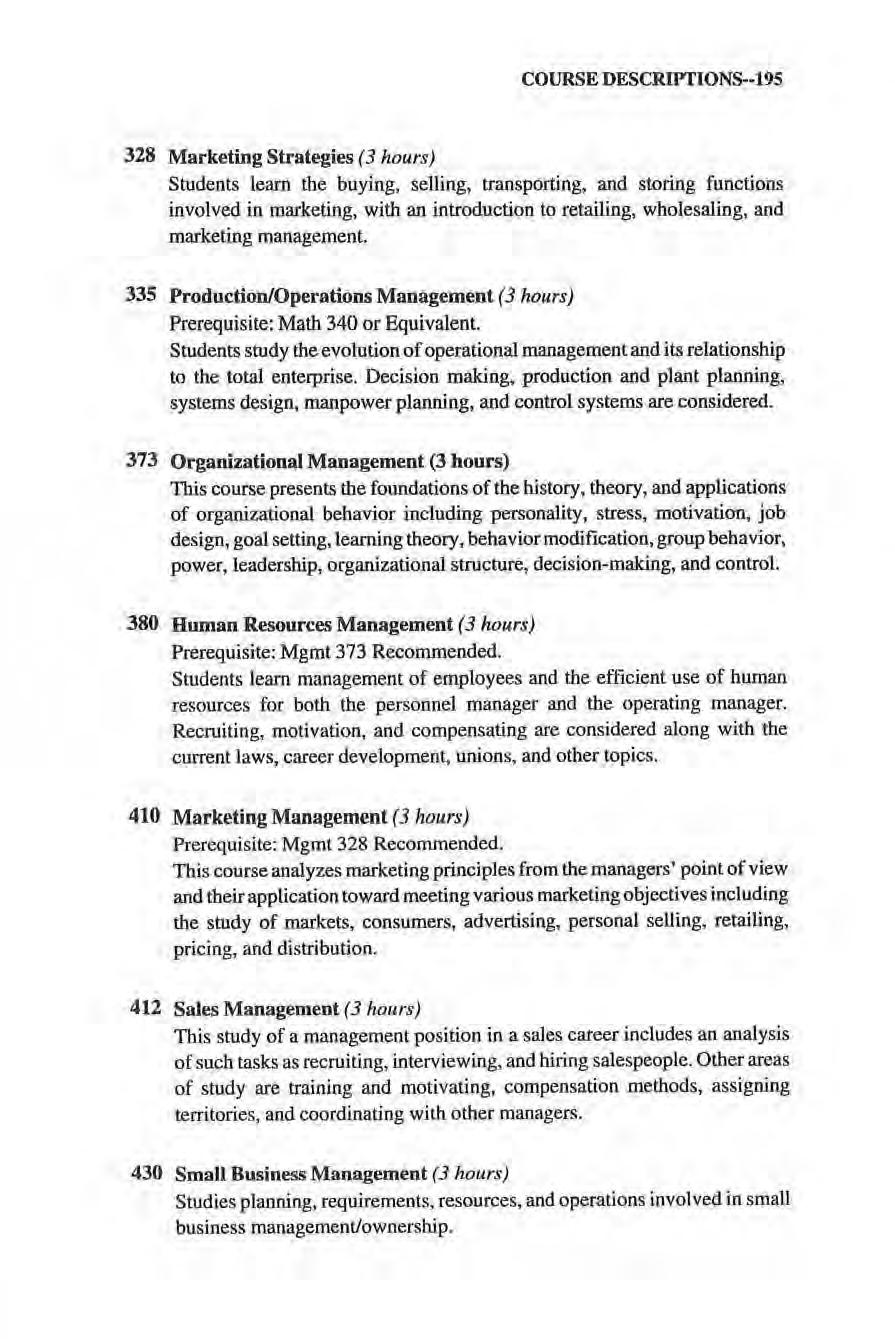
410 Marketing Management (3 hours)
Prerequisite: Mgmt 328 Recommended. This course analyzes marketing principles from the managers' point of view and their application toward meeti ng various marke ting objectives including the study of markets, consumers, advertising, personal selling, retailing, pricing, and distribution.
412 Sales Management (3 hours)
This study of a management position in a sales career includes an analysis of such tasks as recruiting, interviewing, and hiring salespeople. Other areas of study are training and motivating, compensation methods, assigning terri tories, and coordinating with other manage rs
430 Small Business Management (3 lwurs)
Studies planning, requirements, resources, and operations involved in small business management/ownership.
COURSE DESCRIPTIONS--19S
196--COURSE DESCRIPTIONS
443 Quantitative Management (3 hours )
Prerequisite: Math 340 or Equivalent. This study of systems and management science includes the development of analytic al reasoning and set concepts, as well as topics in dec ision processes, linear programming, waiting lines, stochas tic processes, forecasting methods, inventory control, input/output analysis, and general modeling.
496 Organizational Policy (3 hours)
Prerequisite: Students should have completed a minimum of one-half of the business courses required in their major prior to enrollment in this courseincluding Bus 231 or Mgmt 233, Bus/Mgmt 328, and Bus/Mgmt 373. This course takes a case-study approach requiring in-depth analytical and communication skills. Requirements include a thorough review of allgiveo and acquired data, fonnulation of well-defined problems and structured plans of action to be presented in written and oral form. Cases will be selected to match the major area of study. This course is the capstone course and senior competency for the Bachelor of Technology degreeManagement option,
497 Directed Study in Management (1-4 hours)
Senior standing.
498 Special Topks in Management ( 1-4 hours)
Junior/Senior standi ng.
Approved topics are: StressffimeManagement; Effective Public Relations; Equal Opportunity Regulations; Effective Personnel Relation s ; OSHA Regulations; Benefit Programs; Entrepreneurship; and Practical Management Techniques (TQM).
499 Independent Study in Management ( 1-3 hours)

Prerequisite: Junior standing; Permission of fns tmctor and prior approval of Division Chair.
Mathematics
060 Surveying ( 1 hour)
Prerequisite: Knowledge of Trigonometry. Thi s course introduces fundamental theory and practice, use of the transit, U.S. Public Land Surveys, and field office work.
( Offe red as needed)
080 Arithmetic ( 1 hour, credit/no credit)
This course is designed to help students learn effective mathematics skills which can be used to promote academic success in college. Units to b e covered include compu tations, concepts, word problems, and algebra and geometry. This course is a developmental :requ irement for students identified as needing mathematics improvement training. Students required to enroll in Math 080 Arithmetic must successfully complete the post-test with the necessary passing score before enrolling in the general studies mathematics elective. Students who do not earn the necessary passing score will be required to enroll in Math 081 Arithmetic.
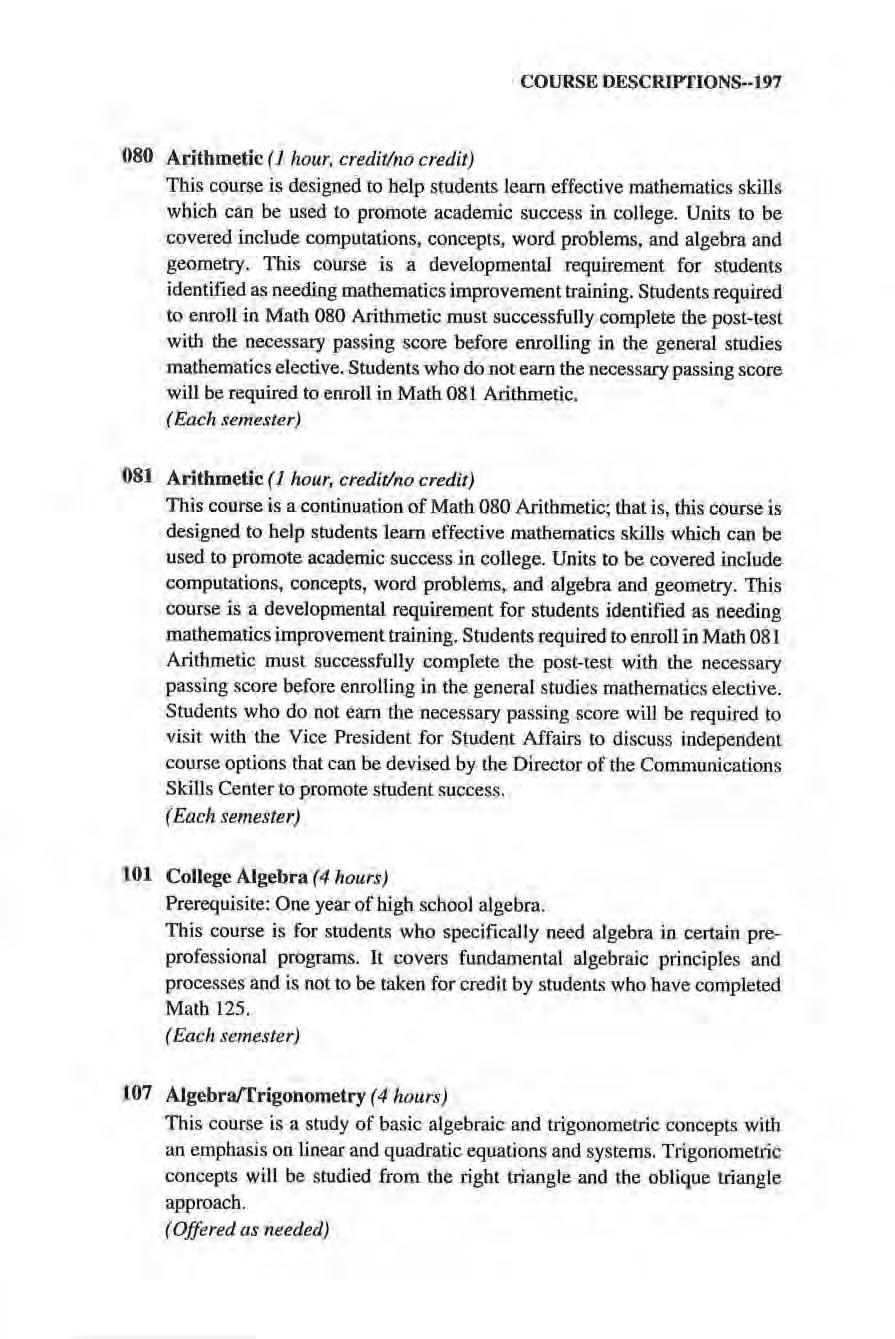
(Each semester)
081 Arithmetic ( I hour, credit/no credit)
This course is a continuation of Math 080 Arithmetic; that is, this course is designed to help students learn effective mathematics skills which can be u sed to promote academic s uccess in college. Units to be covered include computations, concepts, word problems, and algebra and geometry. This course is a developmental requirement for students identified as needing mathematics improvement training. Students required to enroll in Math 081 Arithmetic must successfully complete the post-test with the necessary passing score before enrolling in the general studies mathematics e lective. Students who do not earn the necessary passing score will be requ_ired to visit with the Vice President for Student Affairs to di sc uss independent course options that can be devised by the Director of the Communications SkiIIs Center to promote student success.
(Each semester)
'101 College Algebra (4 hours)
Prerequisite: One year of high school algebra. This cou rse is foe students who specifically need algebra in certain preprofessional programs. It covers fundamental algebraic princi ples and processes and is not to be taken for credit by students who have co mpleted Math 125.
(Each semester)
107 Algebra/frigonometry (4 hoim)
This course is a study of basic algebraic and trigonometric concepts with an emphasis on ljnear and quadratic equations and systems. Trigonometric concepts will be studied from the right triangle and the oblique triangle approach.
(Offered as needed)
COURSE DESCRIPTIONS--197
110 Elements of Mathematics (3 hours)
This course is designed to give the non-mathematical student the opportunity to use basi c operations, succeed in mathematical modeling and understand deductive and inductive reasoning. The general concepts covered will include sets, lo gic, numeration systems, the number system (natural numbers through the reals), metric system, equations, inequalities, probl em solving, graphs, functions and geometry.
(Each semester)
111 Elements of Statistics (2 hours)
This course is designed to give the non-mathematical student an association with el ementary probability and descripti ve statistics. The course will give the studen t t h e opportu nity to use the basic operations, succeed in mathematical modeling, u nderstand deductive reasoning and, most of all, become familiar w ith statistical procedures The general concepts covered w i ll include permutat i ons, combinat i ons, probab il ity, frequency distributions, graphs, measures of central tendency and dispersi on, use of the Normal Curve, and regression and correlation.

(Each semester)
12S Precalcu lus Mathematics I (5 hours)
Th is course is intended for students wbo plan to pursue a college program requiring a substantial amo unt of training in mathematics. The content of the course includes a review of algebra, including number systems, equations, inequalities and graphing, an introduction to the study of functio n s and their gra p hs, the study of algebraic, exponent i a l and logarithmic functions, and an introduction to systems of equations and l inear algebra.
(Each Fall semester)
126 Precalculus Mathematics ll ( 5 hours)
Prerequisite: Math 125.
Tbjs course is intended to conti nue the mathe matic training of the student whose college program requires a substantial amount of traini ng in mathem atics. This course i ncludes the study of trigonometric functions and analytic trigonometry, an introduction to analytic geometry and an introduction to the study of sequences and series.
(Each Spring semester)
209 Business Calculus (3 ho1trs)
Prerequisite: Math 107 and 125 or equivalent. This course introduces the theory and application of d ifferentiation and integration to business decisions. Does not apply toward the Mathematics major.
(Each Spring semester)
198--COURSE
DESCRIPTIONS
225 Calculus with Analytic Geometry I (5 hours)
Prerequisite: Math 125 and 126 or equivalent. This course i ncludes the study of analytic geometry, functions, limits, continuity, velocity, differentiation, max ima and minima, higher order derivatives, techniques of graphing, and re lated topics.
(Each Fall semester)
226 Calculus with Analytic Geometry II (5 hours)
Prerequisite: Math 225 or equi valent.
This course in cludes the study of the differentiation o f logarithmi c and exponential functions, antiderivatives and the definite integral, integration, inverses a nd related topics.
(Each Spt'ing semester)
297 Directed Study in Mathematics (1-4 hours)
Senior standing.
(Offe red as needed)
298 Special Topics in Mathematics ( 1-4 hours)
Freshman- Sophomore standing.
(Offered as needed)
304 Modern Geometry (3 ho urs)
Prerequisite: 10 hours of college Mathematics. This is a course designed pri mari ly to prepare mathematics teachers for de aling with a modern hi gh school mathematics program including the point set approac h to geo metry.
(Fall semester, even years)
306 Modern Algebra (3 hours)
Prerequi si te: 10 ho urs of coll ege Mathematics. This co urse is a study of the vario us algebraic systems arising in modern mathematical computatio ns. It includes a study of sets, mapping and operations, relat io ns, development of the real number system, integral domains and fields, polynomial domains, and the complex number field
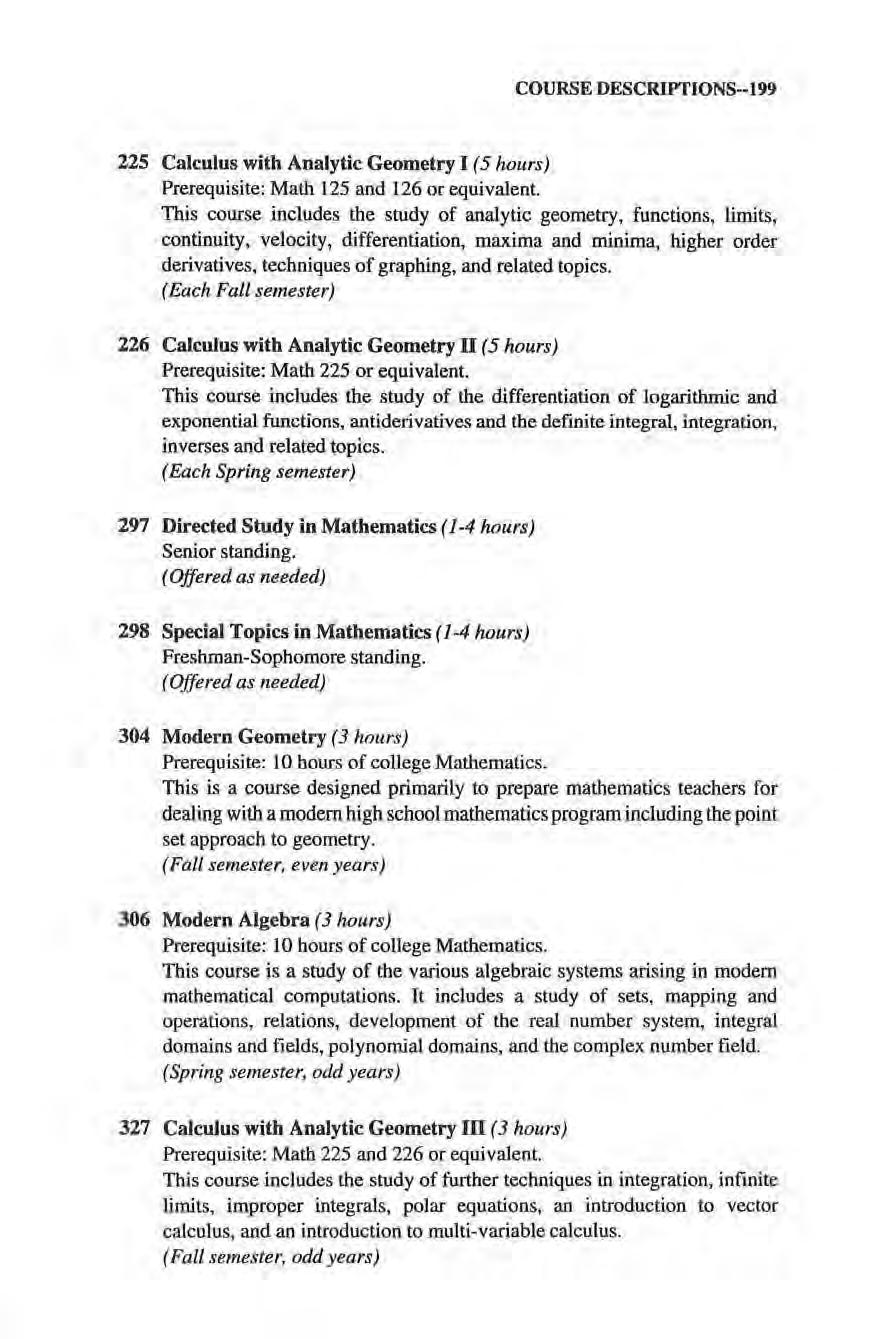
(Spring semester, odd years)
327 Calculus with Analytic Geometry ill (3 hours)
Prerequisite: Math 225 and 226 or equivalent. This course incl udes the study of further techniques in integration, infinite limits, improper integrals, polar equatio ns, an introduction to vector calculus, and an introduction to multi- variable calcul u s.
(Fall semester, odd years)
COURSE DESCRIPTIONS--199
DESCRIPTIONS
328 Differential Equations (3 hours)
Prerequisite: Math 327 or equivalent. This course will review differentiation and integration. Solutions and methods for solv ing first and second order ordinary differential equation wiII be discussed and applied.
(Spring semester, even years)
340 Statistics (3 hours)
A study of the method of summarizing and interpreting data. elementary probability, and its relation to distributions. The meanings, importance, and application of the normal and binomial distributions and the methods of random sampling, testing of hypotheses, analysis of paired data, and interpretation of standardized test scores are covered.
(Each semester)
404 Mathematical Modeling (3 hours)
Prerequisite: 10 hours of college Mathematics. This course provides an introduction to topics in modem mathematics including graphs and networks, map coloring, finite differences, Pascal's triangle, the Pigeonhole Principle, Markov chains, linear programming, and game theory.
(Fall semester, even years)
418 Linear Algebra (3 hours)
The theory of linear transformation in vector spaces, the representation of linear spaces in matrices, linear functional, and the application of these concepts are covered.
(Fall semester, odd yea rs)
419 Topology (3 hours)
A modern treatment of topol ogy with an emphasis on fundamental concepts and the principal results of homology theory, topolog ical spaces, linear graphs, set theory, metric interpretations, and related topics.
(Spring semester, even years)
430 Discrete Structures (3 hours)
Prerequis i te: Ma th 126.
A study of some of the mathematical concepts useful to the computer sciences including number systems, logic, truth tables, sets and relatio ns, boolean algebra, logic circuits, vectors, matrices, determinants, graphs, · directed gtaphs, finite machines, and automata.
(Qffered as needed)
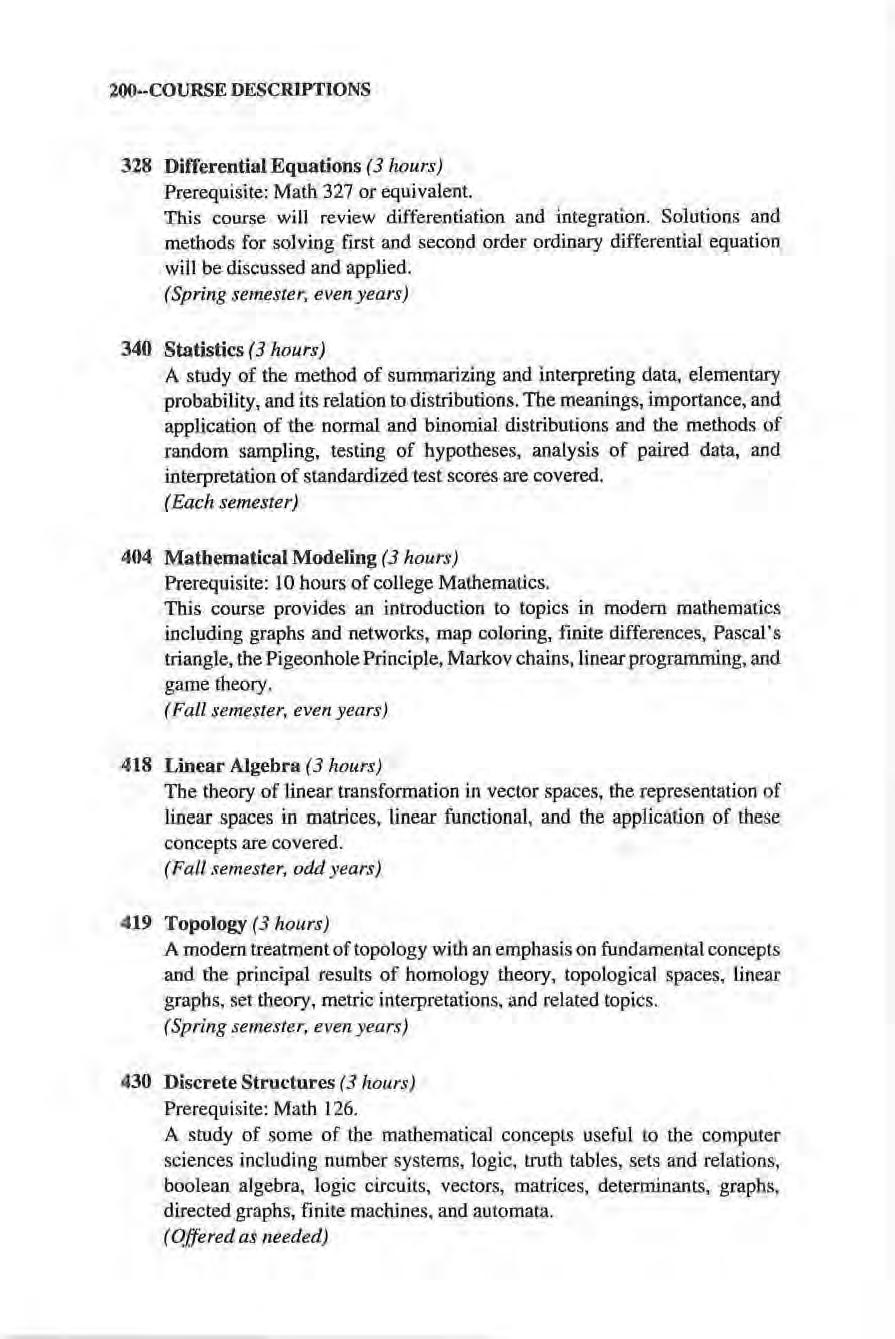
200--COURSE
440 Advanced Statistics (3 hours)
Prerequisite: Math 340.
This course continues the study of methods of summarizing and interpreting data, with special emphasis on non-normally distributed statistics, hypotheses testing, multivariate analysis aind non-linear analysis of data.
(Spring semester, odd years)
490 Seminar in Mathematical Research (1 hour)
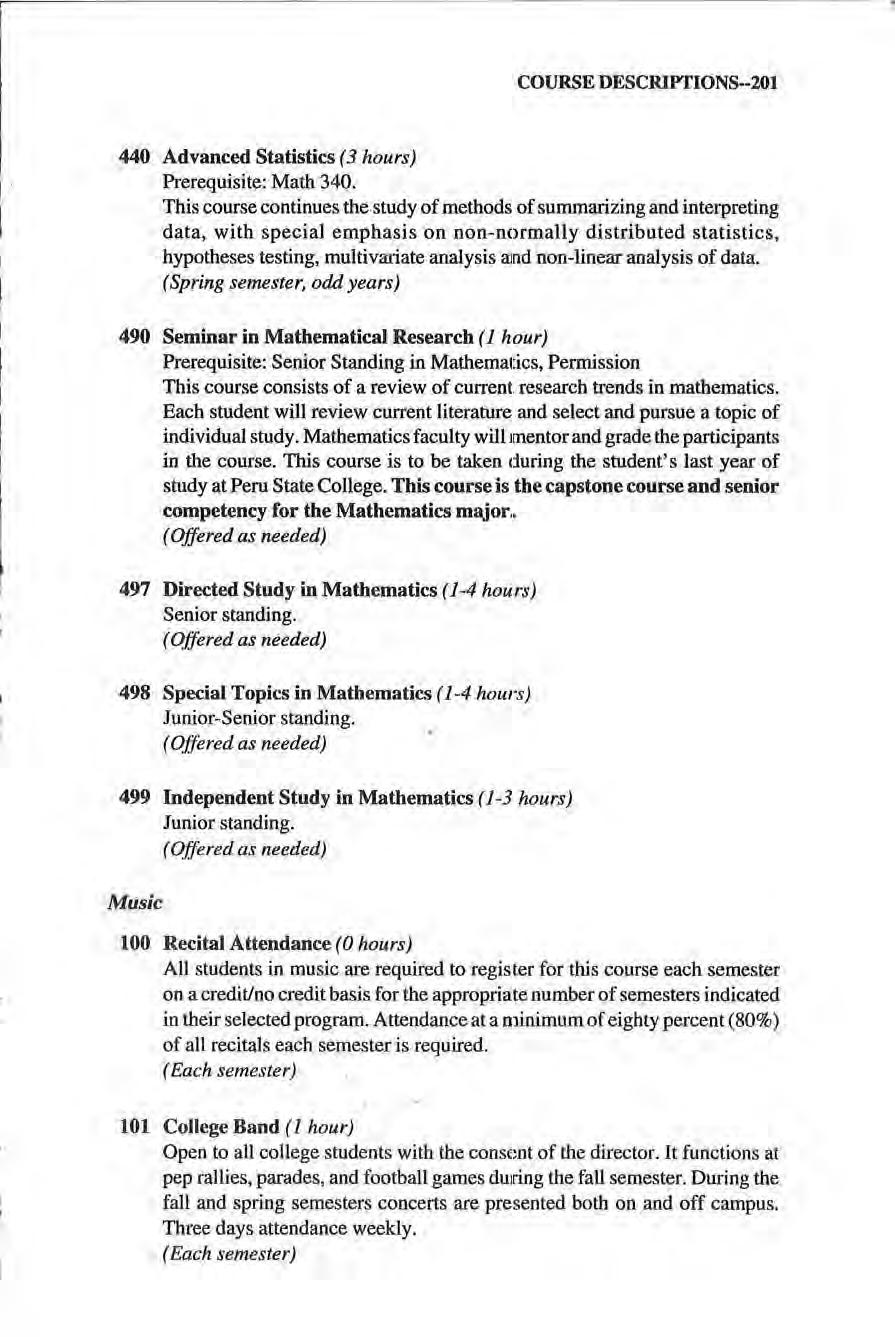
Prerequisite: Senior Standing in Mathematics, Permission
This course consists of a review of c urrent. research trends in mathematics. Each student will review current literature and select and pursue a topic of individual study. Mathematics faculty will mentor and grade the participants in the course. 'This course is to be taken during the student's last year of study at Peru State College. Th.is course is the capstone course and senior competency for the Mathematics major..
(Offered as needed)
497 Directed Study in Mathematics (1-4 hours) Senior standing.
(Offered as needed)
498 Special Topics in Mathematics (1-4 hours) Junior-Senior standing.
(Offered as needed)
499 Independent Study in Mathematics (1-3 hours) Junior standing.
(Offered as needed)
Music
100 Recital Attendance (0 hours)
All students in music are required to register for this course each semester on a c redit/no credit basis for the appropriate number of semesters indicated in their sel ected program Attendance at a minimum of eighty percent (80%) of all recitals each semester is required.
( Each semester)
101 College Band (1 hour)
Open to all college s t udents with the consent of the director. It functions at pep rallies, parades, and football games duiring the fall semester. During the fall and spring semesters concerts are presented both on and off campus. Three days attendance weekly.
(Each semester)
I I
COURSE DESCRIPTIONS--201
l02 College Choir (1 hour)
Open to all students with the consent of !the director. An emphasis on the study and performance of representative c:horal works of a'.l periods. Three days attendance weekly.
(Each semester)
103 Jazz Ensemble (1 hour)
Open to all students by audition and the consent of the instructor. An emphasis is placed on the study and performance of music in all popular idioms and performs concerts on and off campus.
(Each semest er)
104 Show Choir (1 hour)
Open to all students by audition and cons,ent of the instructor.
An emphasis is placed upon the study and performance of vocal music in all popular idioms and performs concerts on and off campus.
(Each semester)
105 Brass Ensemble ( 1 hour)
Open to all students with the consent of the instructor
An emphasis is placed upon the study and performance of brass literature in all the chamber music idioms and concerts are performed on and off campus.
(Each semester)
106 Woodwind Ensemble(l hour)
Open to all students with the conse nt of the instructor.
An emphasis is p laced upon the study and performance of wood wind literature in all the chamber music idioms and concerts are performed on and off the campus.
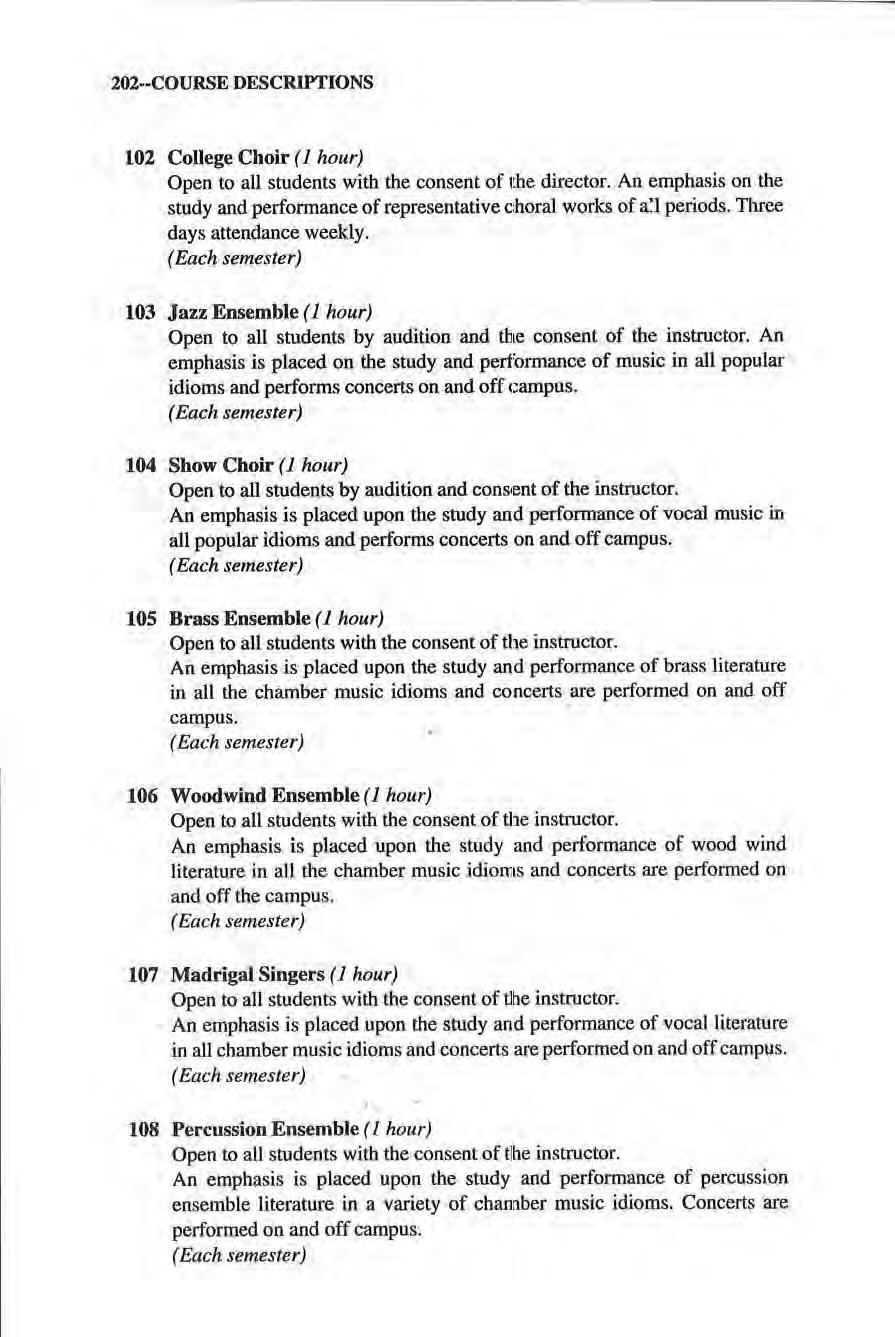
(Each semester)
107 Madrigal Singers (1 hour)
Open to all students with the consent of tlhe instructor
An emphasis is placed upon the study and performance of vocal literature in all chamber music idioms and concerts are performed on and off cam pus.
(Each semester)
108 Percussion Ensemble ( l hour)
Open to all students with the consent of tlhe in structor.
An emphasis is placed upon the study and performance of percussion ensemble literature in a variety of chamber music idioms. Concerts are performed on and off campus.
(Each semester)
202--COURSE DESCRIPTIONS
111 Fund amentals of Music (2 hours)
An introduction to the rudiments of music, including letter and syllable names of notes, time values of notes a nd rests, time and key signatures, chromatics, intervals, chords, keyboard experience, and the writing of original me lodies
(Each Fall semester)
112 Beginning Class Piano (1 hour )
Beginning .instruction on the piano.
(Each semester)
113 Beginning Cla ss Guitar (1 hour)
An introduction to the basic chords, mel odies, note reading, tuning, and styles of perfonnance for the beginning guitarist.
(Offered as needed)
114 Class Piano D ( 1 hour)
Prerequis ite: Muse 11 2.
Class Piano Il is a continuation of Class P iano I. Students continue to improve their p ianistic skills by playi ng standard repertoire in a variety of keys, learning new techniques, and improv ing their knowledge of the fundamentals of music.
(Each semester)
US Class Vo ice
Ths course will provjde non-voice majors wi th the fundamentals of vocal technique. The course will include basic concepts of breathing, posture, tone production. vocal projection, stage presence, and healthy use of the speaking voice.
( Each semester)
120 App lied Music
Private music instruction for voice, instruments, or piano on the Freshman level. May be repeated for credit.

(Each semester)
141 Music Theory I (3 hours)
This course is an integrated study of the theoretical practices of the 18th and 19th centuries. It includes a review of clefs, sca les, key s ignatures, intervals, triads, and basic rhythmic notation, stu dies io melodic, rhythrnc, and harmonic dictation, and sightsinging.
(Each Fall semeste r)
COURSE DESCRIPTIONS--203
204--COURSE DESCRIPTIONS
142 Music Theory II (3 hours)
Prerequisite: Muse 141. This course i s an integrated study of the theoretical practices of the 18th and l9thcenturies.1t includes the study of secondary triads, six-four chords, dominant and supertonic sevenths, elementary modulation, studies in melodic, rhythmic and harmonic dictation, and sightsinging.
(Each Spring semester)
200 Piano Proficiency Examination (0 hours)
All students in music education (K-6 or K-12) are required to register for Mus 200 on a credit/no credit basis during the semester they intend to take the required p iano proficiency examination. Successful completion of Music 200 is required before enrolling for student teaching. S tudent s must be enrolled for applied piano concurrently with Muse 200.
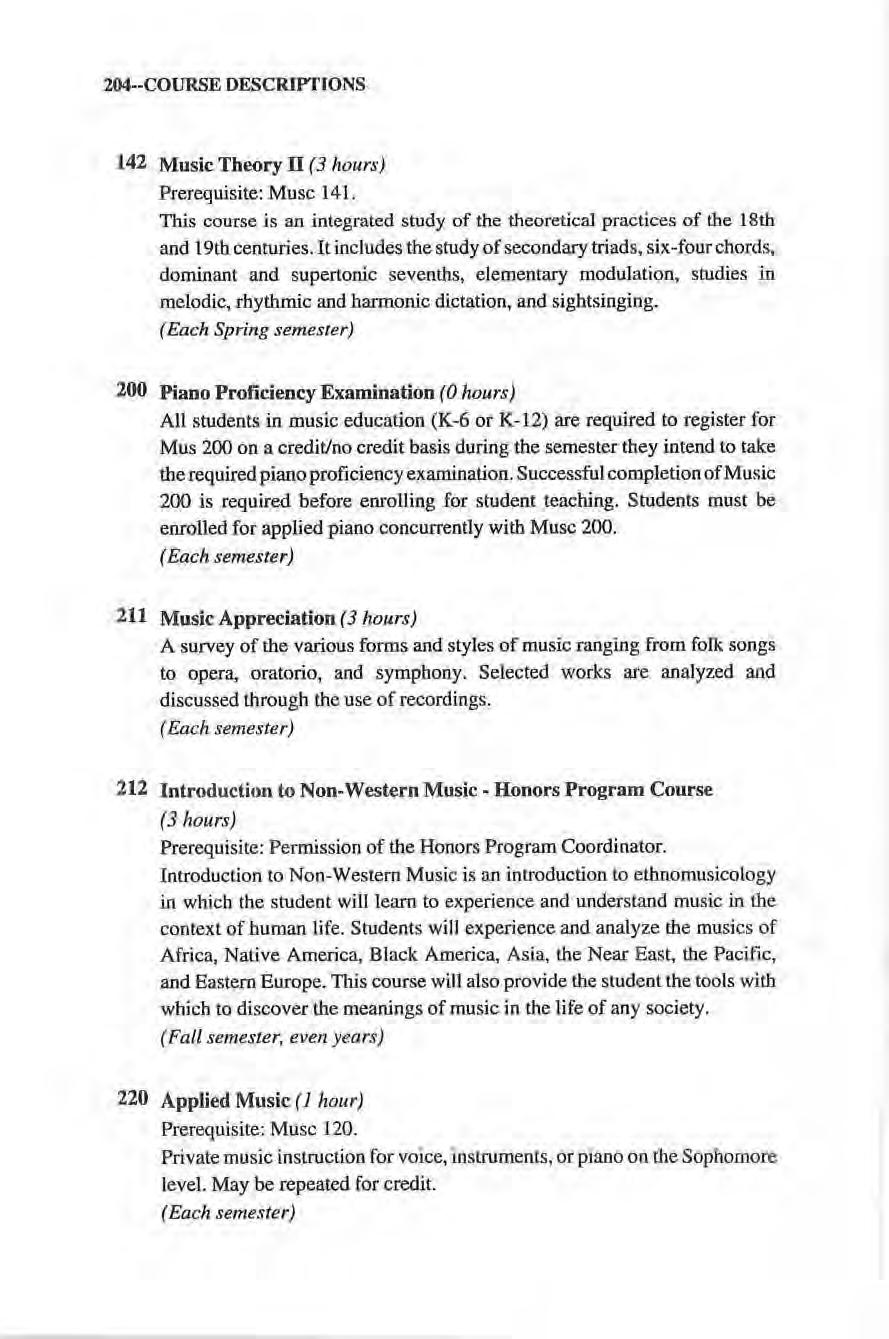
(Each semester)
211 Music Appreciation (3 hours)
A survey of the various forms and styles of music ranging from folk songs to opera, oratorio, and symphony. Selected works are analyzed and discussed through the use of recordings.
(Each semester)
212 Introduction to Non-Western Music - HonorsJ.>rogram Course (3 hours)
Prerequisite: Permission of the Honors Program Coordinator. Introduction to Non-Western Music is an introduction to ethnomusicology in which the student will learn to experience and understand music in the context of human Hfe. Students will experience and analyze the musics of Africa, Native America, Black America, Asia, the Near East, the Pacific, and Eastern Europe. This course will also provide the stude nt the tools with which to discover the meanings of music in the life of any society.
(Fall semester, even years)
220 Applied Music () hour)
Prerequisite: Muse 120.
Private music instruction for voice, instruments, or piano on the Sophomore level. May be repeated for credit.
(Each semester)
COURSE DESCRIPTIONS--20S
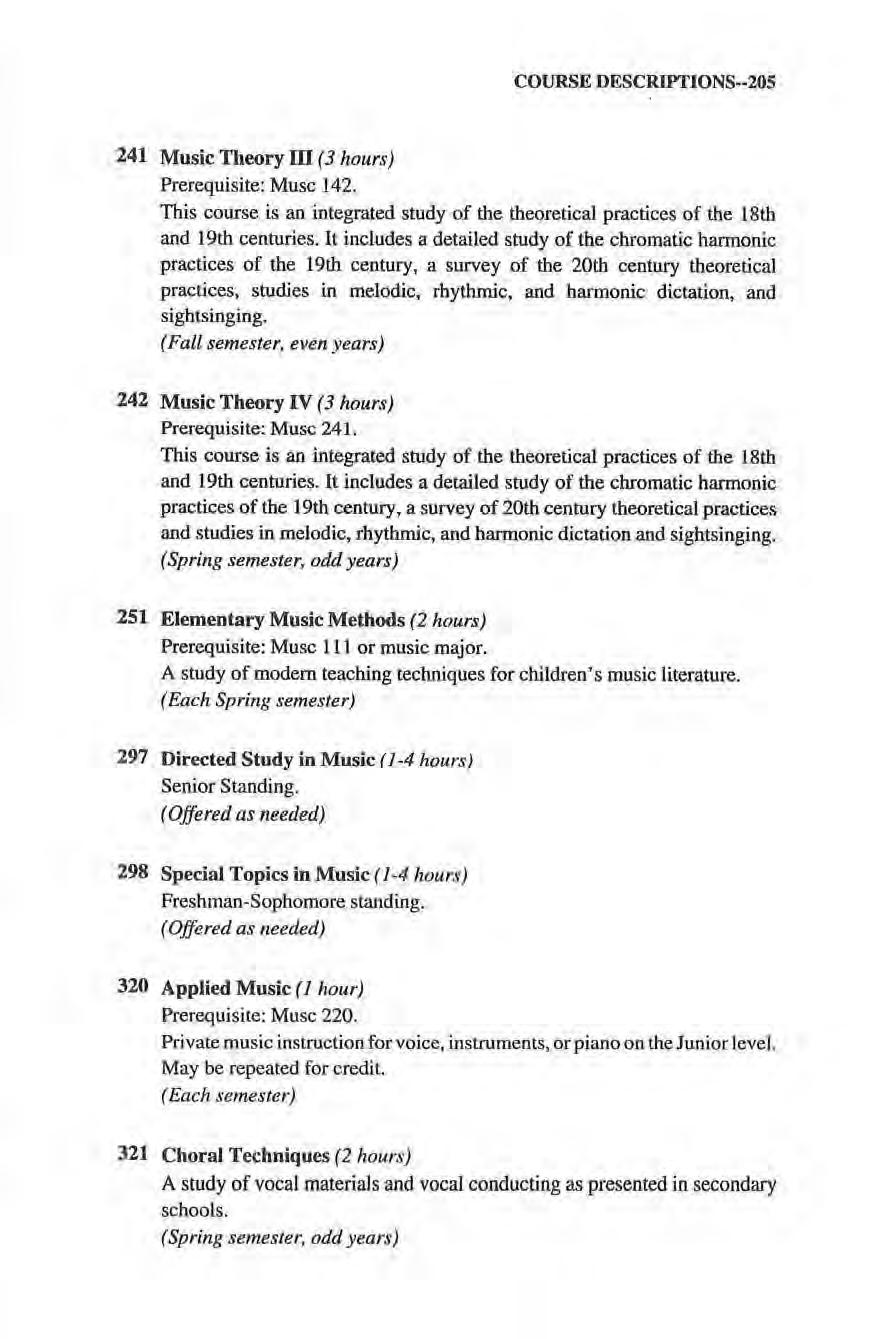
241 Music Theory m (3 hours)
Prerequisite: Muse 142
This course is an integrated s tudy of the theoretical prac tices of the 18th and 19th centuries. It incl ud es a detailed study of the c hromatic harmon ic practices of the 19th century, a survey of the 20th century theoretical practices, studies i n melodic, rhythmic, and harmonic dictation, and sightsing ing.
(Fall semester, even years)
242 Music Theory IV (3 hour.t)
Prerequisite: Mu se 241.
This course i s an integrated s tudy of the theore tical practices of the 18th a nd 19th centu ries. It includes a detailed s tudy of the chromatic harmonic practices of the 19th century, a s urvey of 20th century t heoretica l practices and s tudies in melodic, rhythmic, and harmonic dfotatioo and sightsingin g. (Sprin g semester, odd yea rs)
251 Elementary Music Methods (2 hours)
Prerequisite: Muse 111 or music major
A study of modem teaching techniques for children's music lite ratu re.
(Each Sprit1g semester)
297 Directed Study in. Music ( 1-4 hours) Senior Standing.
(Offere d as needed)
298 Special Topi cs in Music ( 1-4 hours)
Freshman-Sophomore s tanding.
(Offered as needed)
320 Applied Music ( 1 hour)
Prerequisite: Muse 220.
Private music instruction fo r voice, instruments, or piano on t he Juni or \eve I, May be repeated for credit.
(Each semeste r)
321 C horal Techniq ues (2 hours)
A s tud y of vocal materials and vocal conducting as presented in secondary schools.
(Spring semest er, odd years)
322 Band Techniques (2 hours)
Pterequisite: Sophomore standing. An introductory study o f organizational skills and pedagogical tec hniques for the concert band, jazz band, elementary band, middle s chool band, and marching band.

(Spring semesters, even years)
340 Junior Recital (1 lwur)
Prerequisite: Muse 320.
Selection, preparation, direction and rehearsal ofa recital of music for voice, ins truments, or piano culminating in a thirty-minute p erformance. Students must be concurrently enrolled for applied music during the semester they are enrolled for the junior recital.
( Each semester)
342 Arranging (2 hours)
Prerequisite: Muse 142. A course in practical scoring and arranging for band and orchestra and voices.
(Spring semester, even years)
351 Brass Methods (2 hours)
A s tudy of brass instruments and brass pedagogical techniques with actual playing experience.
(Spring semester, odd years)
352 Woodwind Methods (2 hours)
A s tudy of woodwind in struments and woodwind pedagogical techniques with actual playing experience.
(Fall Semester, odd years)
361 String Methods (2 hours)
A study of strin ged in struments, including the guitar, an d stringed pedagogical techniques with ac tual playing expe1ience
(Offered as needed)
362 Percussion Methods (2 hours)
A study of percussion instruments an d percussion pedagogical techniques with actual playing experience.
( Fall semester, even years)
206--COURSE DESCRIPTIONS
420 Applied Mu.Sic ( I hour)
Prerequisite: Muse 320.
Private music instruction for voice, instruments, or piano on the Senior level. May be repeated for credit.
(Each semester)
440 Senior Recital ( 1 hour)
Prerequisite: Muse 420.
Selection, preparation, direction, and rehearsal of a recital of music for voice, instruments, or piano culminating in a sixty-minute performance. Students must be concurrently enrolled for applied music during the semester they ace enrolled for the senior rec ital. This course is the capstone course and senior competency for the Music major.
(Each semester)
441 Music History 1 (antiquity to 1750) (2 hours)
A study of the development of music from antiquity through the end of th e Baroque period with stylistic analysis of musical examples. (Fall semester, odd years)
442 Music History II (1750 - present) (2 hours)
A study of the development of music from the beginning of the Classical period to the present with sty listic analysis of mu sical examples. (Spring semester, even years)
461 Choral Conducting (3 hours)
Prerequisite: Permission of the instructor. In this course stu dents will learn the basics of choral conducting including score preparation and conducting rehearsals. (Fall semester, even years)
462 Instrumental Conducting (3 hours)
Prerequjsite: Muse 242
The knowledge of baton techniques, reading and interpreting a musical score, and the presentation of techniques of rehearsing instrumental organizations are stressed. (Fall semester, odd years)
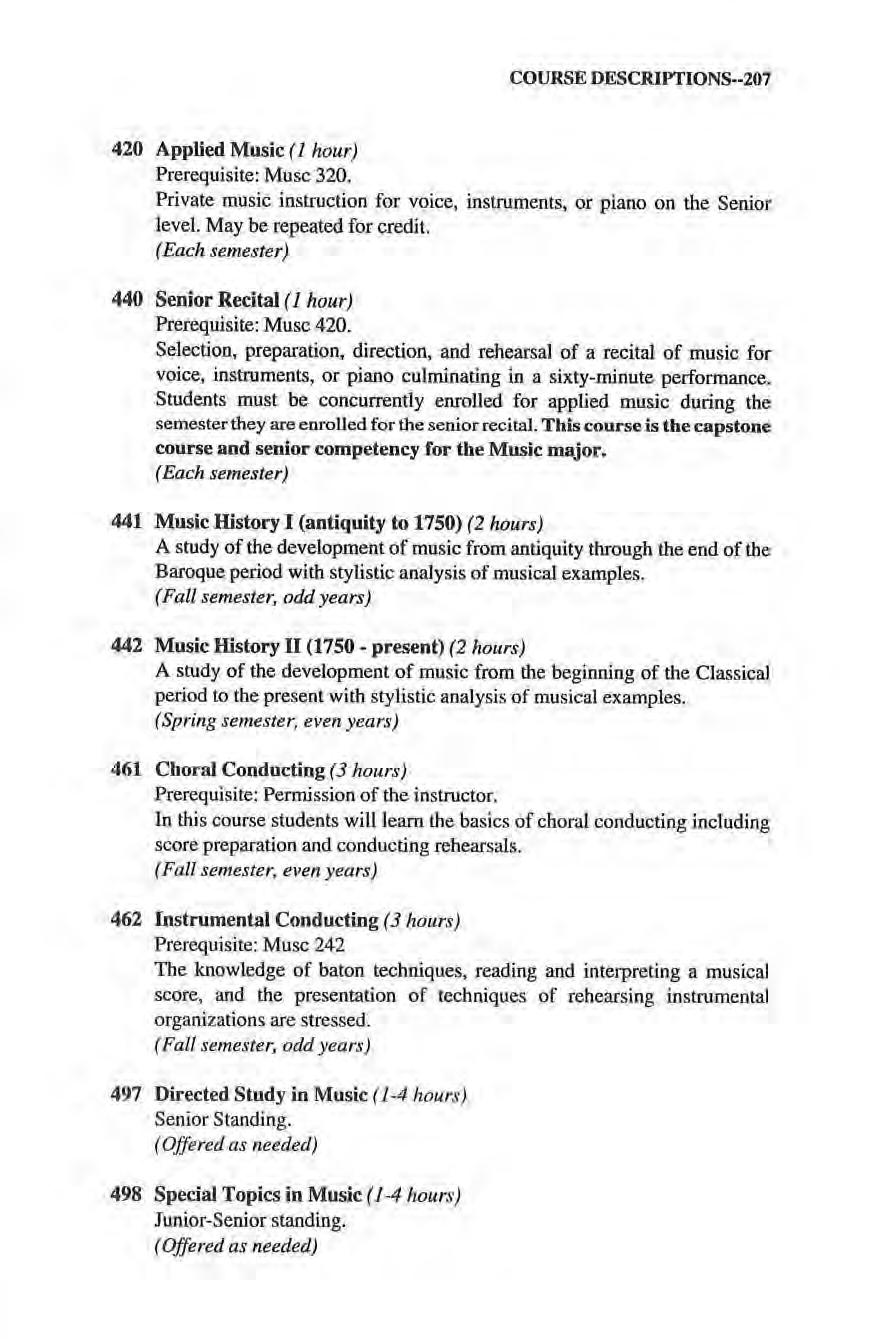
497 Directed Study in Music ( 1-4 hours) Senior Standing. (Offe red as needed)
498 Special Topics in Music ( 1-4 hours) Junior-Senior standing (Offered as needed)
COURSE DESCRIPTIONS--207
DESCRIPTIONS
499 Independent Study in Music ( 1-3 hours)
Prerequisite: Junior standing; Permission of Instructor and prior approval of Division Chair.
(Offered as needed)
Philosophy
201 Introductioo to Philosophy (3 hours)
An introduction to philosophy through the selected writings of outstanding philosophers. Lectures and class discussions o n such topics as ethics, philosophy of history, phil osophy of reli g i on, and metaphysics are stressed.
(Each Fall semester)
Physical Education
Each student i s required to enroll in PE 100 Wellness. It is followed by two activity courses, of which one is developmental. Physical Education activities courses require two hours of attendance per week.
100 Wellness (2 hours)
This course is designed to acquaint the students with the philosophy, knowledge, and techniques necessary to write a personalized life-time fitness and wellness program. Th e course will include both theory and practical application in the study of physical fitness and wellness.
(Each semester)
I 04 Golf and Ten nis-Maintenance ( 1 hour)
Prerequisite: PE 100.
This course is designed to interest the student in golf and tennis. Emphasis will be placed on fundamental techniques of the game, mies of the game and etiquette.
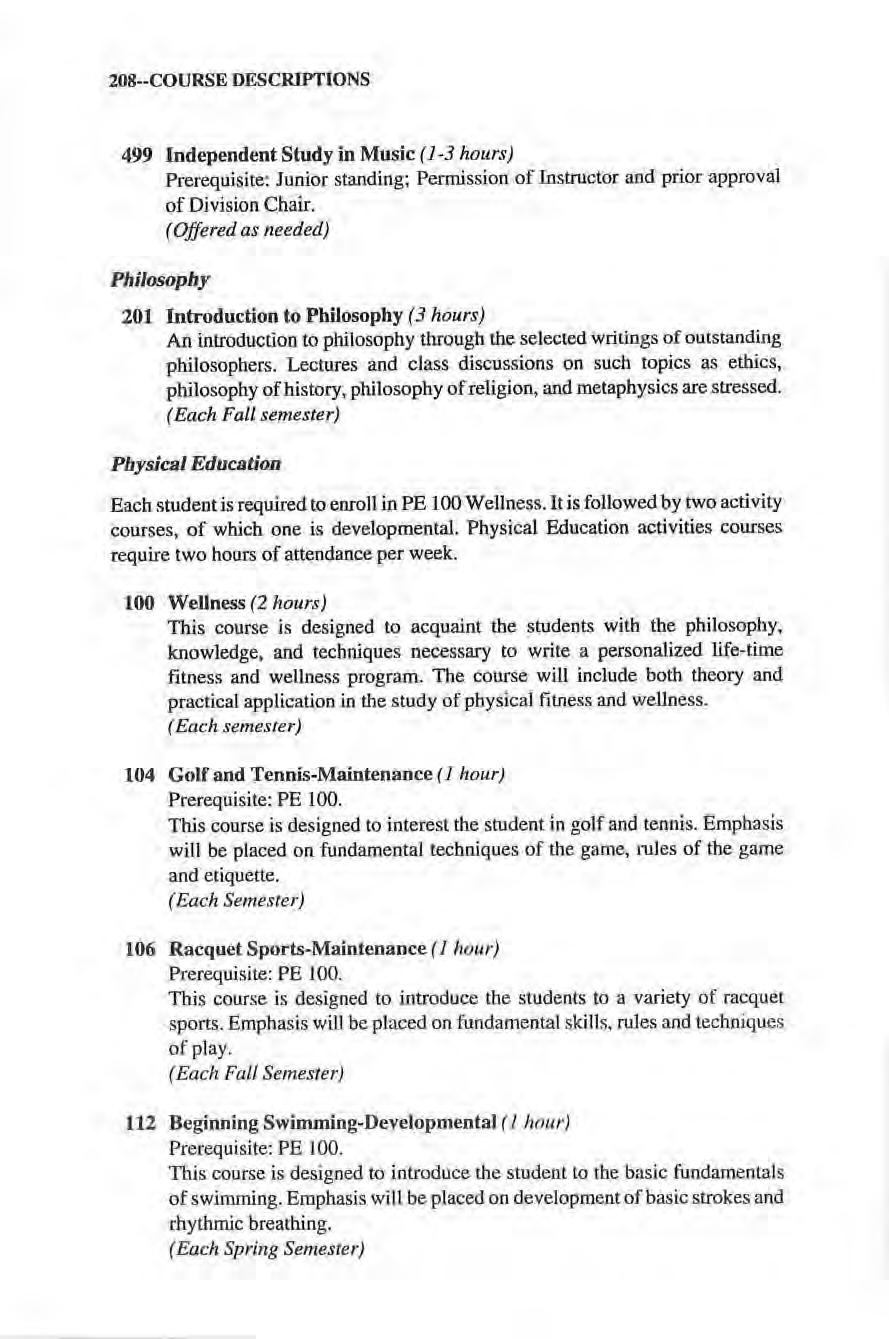
( Each Semester)
106 Racquet Sports-Maintena nce ( 1 hour)
Prerequisite: PE 100.
Thi s course is designed to introduce the students to a variety of racquet sports. Emphas is will be pl aced on fundame n tal skills, rules and t echniques of play.
(Each Fall Semester)
112 Beginning Swimming-Developmental ( 1 hour)
Prerequisite: PE 100.
This course is designed to introduce the student to the basi c fundamentals of swimming. Emphasis will be placed on development of basic strokes and rhythmic breathing.
(Each Spring Semeste r)
208- -COURSE
116 Volleyball and Basketball-Maintenance (J hour)
Prerequisite: PE 100.
This course is designed to introduce the student to the basic fundamentals of volleyball and basketball. Emphasis will be placed on skill s, rules and strategies of the games.
(Each Fall Semester)
117 Strength Training-Developmental (I hour)
Prerequisite: PE 100.
This course is designed to introduce students to a variety of philosophies and strength devel opment techniques. Programs will be developed to meet indiv idul needs.
(Each Semester)
119 Restricted Activities-Developmental (1 hour)
Prerequisite: PE I 00.
This course is designed to meet the needs of students who are unable, because of medical reasons, to take general physical education activ i ty courses. The class is conducted on an individual basis in order to meet the personal fitness needs of the student.
(Offered as needed)
121 Aerobic Dance-Developmental ( 1 hour)
Prerequisite: PE 100.
This course is designed to introduce the student to a variety of aerobic conditioning activities and techniques . Emphasis is on modes of training, aerobic capacity, fitness development and program des ign to meet individual needs and demands.
(Each Spring Semester)
122 Walking, Jogging and Cycling-Developmental ( I hour)
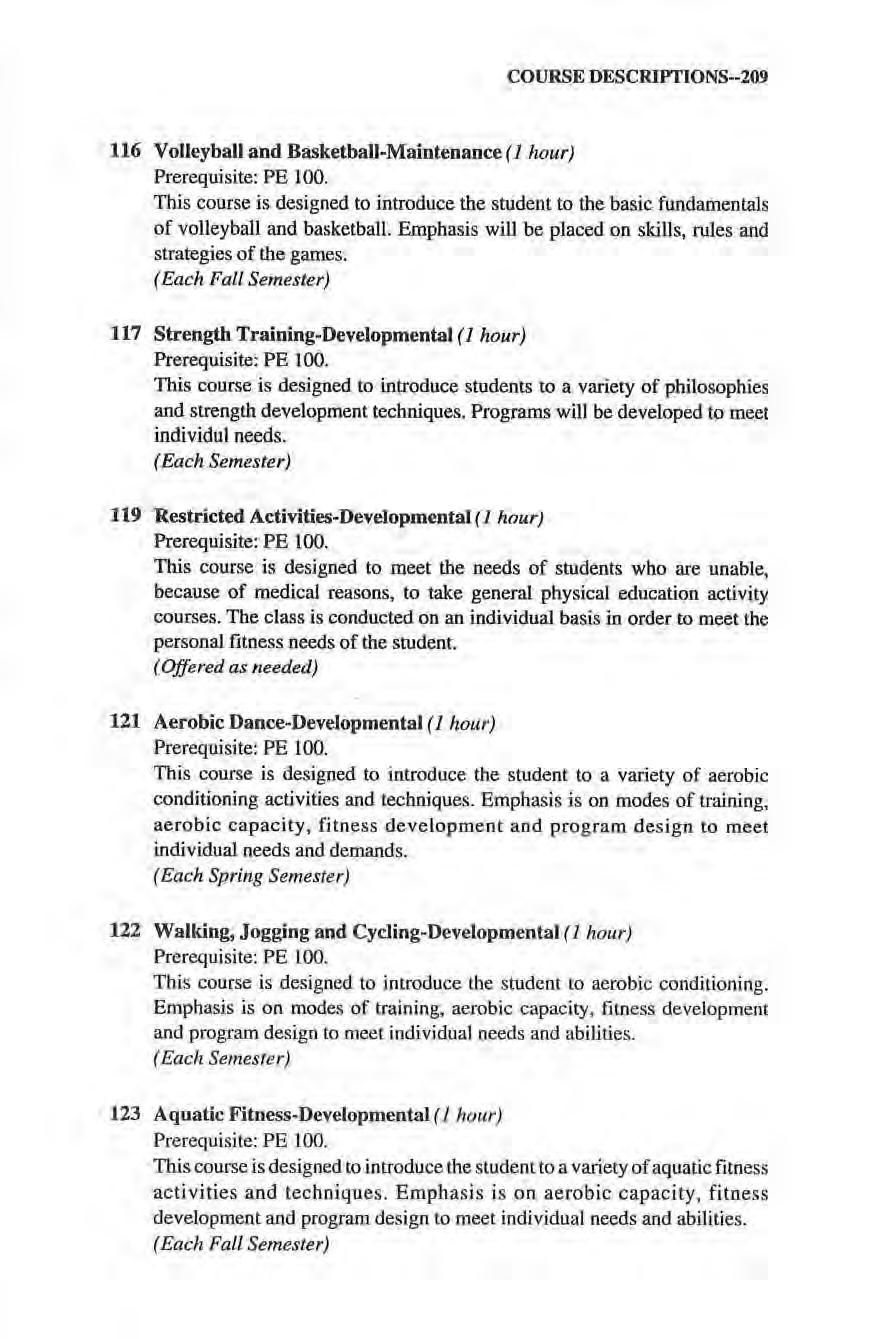
Prerequisite: PE 100.
This course is designed to .introduce the s tudent to aerobic conditioning. Emphasis is on modes of training, aerobic capacity, fitness development and program design to meet individual needs and abiJjties.
(Each Semester)
123 Aquatic Fitness-Developmental ( 1 hour)
Pre requisite: PE 100.
This course is designed to introduce the student to a variety of aquatic fitness activities and techniques. Emphasis is on aerobic capacity, fitness development and program design to meet individual needs and abilities.
(Each Fall Semester)
COURSE DESCRIPTIONS--209
131 Folk, Square and Social Dance-Maintenance ( 1 hour)
Prerequisite: PE 100
This course is designed to introduce s tudents to dance as a recreational and physical education activity. Dance e lements and social responsibilities associated with dancing will be d isc ussed. Various social, folk, and square d ance patterns will be introduced.
(Each Spring Semester)
190 Varsity Sports ( I hour)
Requires successful participation in a varsity sport. (A maximum of four (4) hours may be applied to the degree requirements .)
(Eac h Semester)
2 0 1 Principles of Physical Education (3 hours)
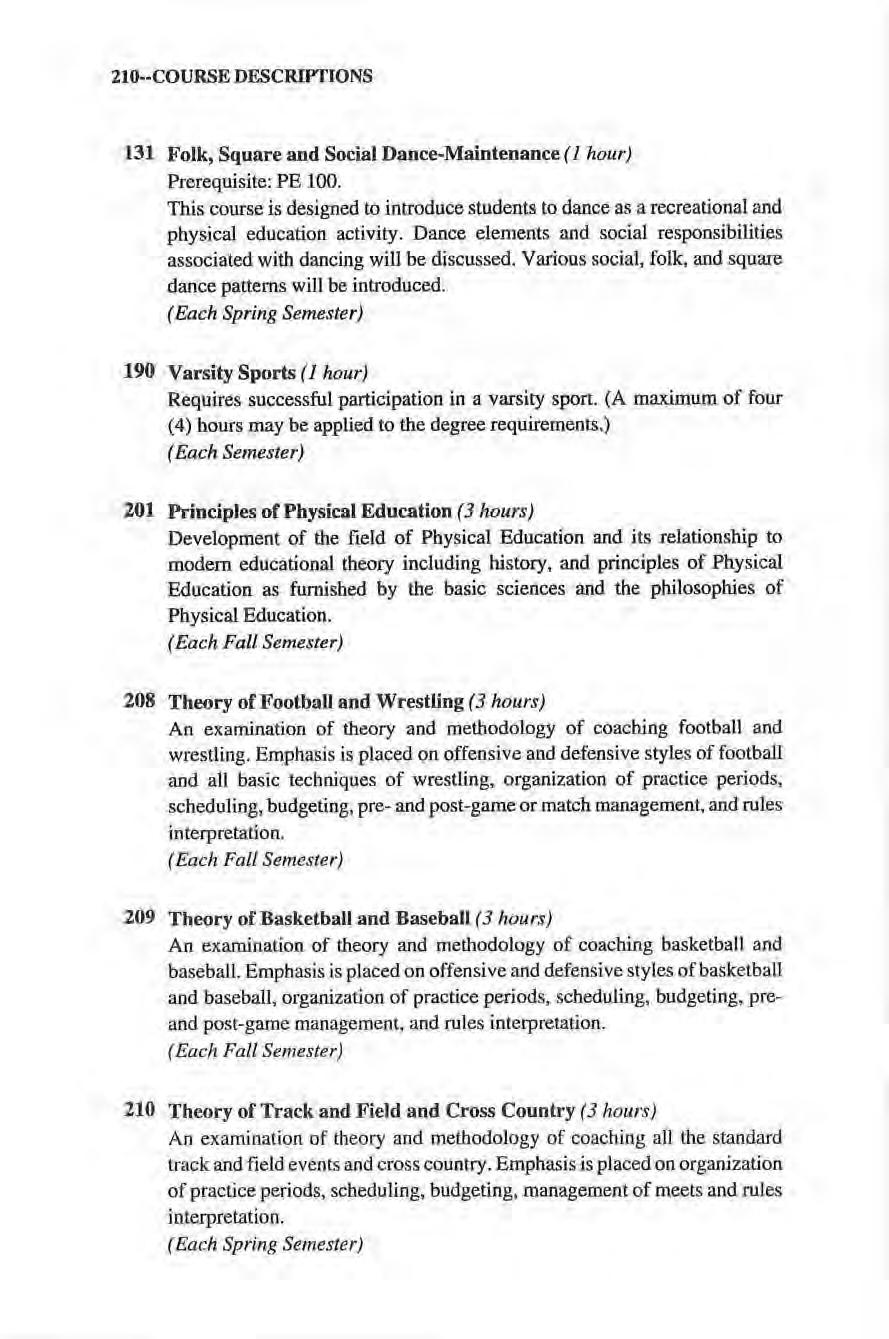
Development of the field of Physical Education and i ts relati onship to modem educa tio nal theory including hl s tory, and principles of Physical Education as furnished by the basic scie nces and th e philosophies of Physical Education
(Each Fall Semester)
2 08 Theory of F ootball and Wrestling (3 hours)
An examination of theory and methodology of coaching foo tball and wrestling Emphasis is placed on offen sive and defensive s tyles of foo t batl and all basic techniques of wrestling, organization of practice periods, sch ed uling, budgeting, pre- and post-game or match management, and rules interpretatio n
(Each Fall Semester)
209 Theory of Basketball and Baseball (3 hours)
An examination of theory and methodo logy of coaching basketball and baseball. Emphasis is placed o n offensive and defensive styles of basketball and baseball, organization of practice periods, sch eduling, budgeting, preand post-game management, and rules inte1pretatio n.
( Each Fall Semester)
2 10 Theory of Track and Field a nd Cross Country ( 3 hours)
An examination of theory and methodology of coaching all the standard track and field events a nd cross country. Emphasis i s placed on organization of practice periods, scheduling, budgeting, management of meets and rul es interpretation.
(Each Spring Semester)
210--COURSE
DESCRIPTIONS
211 Theory of Women's Basketball and Softball (3 hours)
An examination of theory and methodology of coaching women's basketball and softball. The course will address gender differences in selection of activities and psychologicaJ approaches to the game. Emphasis is p laced on organization of practice periods, scheduling, budgeting, pre- and post-game management and rules interpretation.
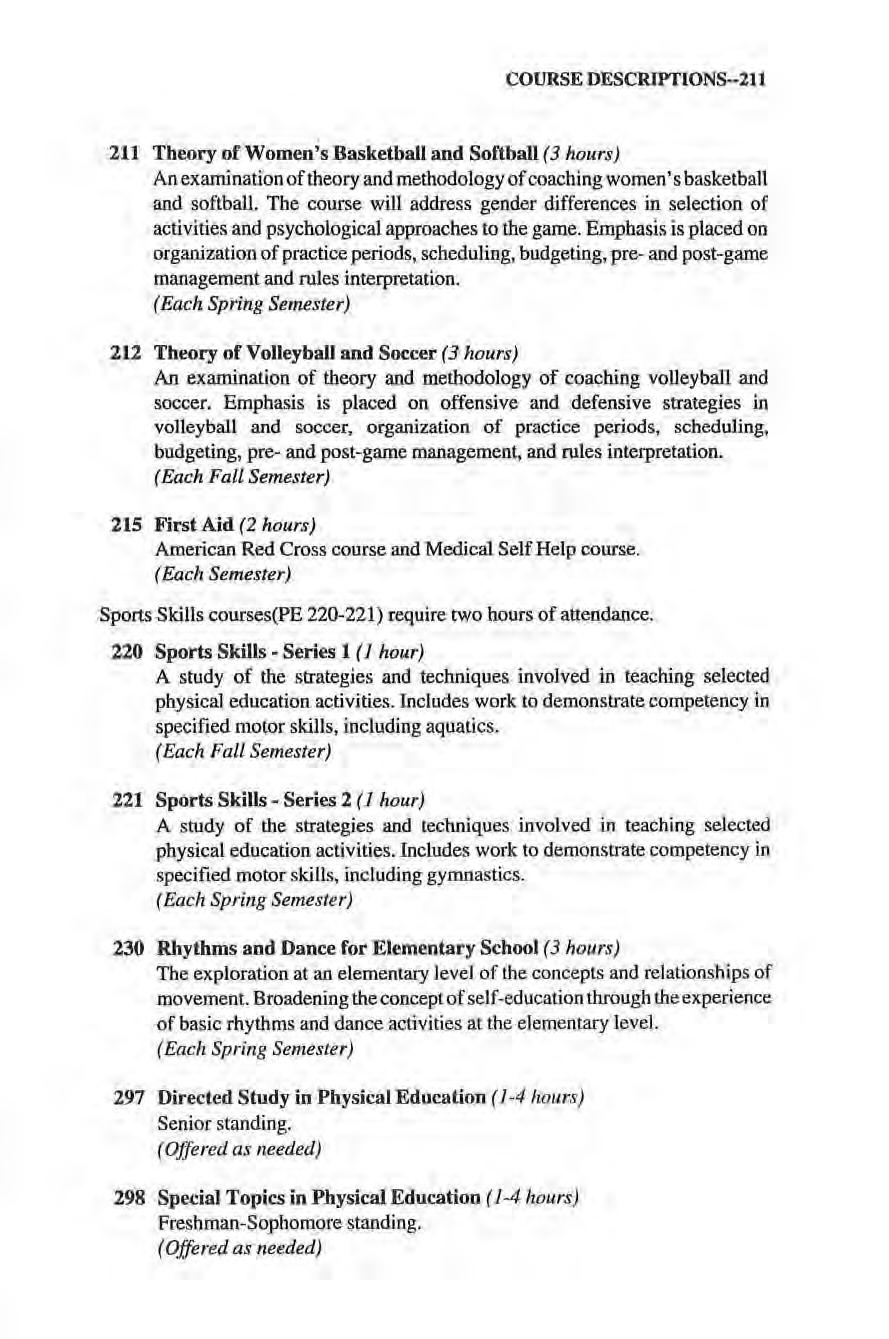
(Each Spring Semester)
212 Theory of Volleyball and Soccer (3 hours)
An examinatio n of theory and methodology of coaching volleyball and soccer. Emphasis is p laced on offensive and defensive strategies in volleyball and soccer, organization of practice periods, scheduling, budgeting, pre- and post-game management, and rules interpretation.
(Each Fall Semester)
215 First Aid (2 hours)
American Red Cross course and Medical Self Help course.
(Each Semester)
Sports Skills courses(PE 220-22 1) require two hours of attendance.
Z.20 Sports Skills• Series 1 ( 1 hour)
A study of the strategies and techniques involved in teaching selected physical education activi ties. Includes work to demonstrate competency in specified motor skills, includjng aquatics
(Each Fall Semester)
221 Sports Sk ills • Series 2 ( 1 hour)
A study of the strategies and techniques involved in teaching selected physical education activities. Includes work to demonstrate competency in specified rnotor skills, including gymnastics.
(Each Spring Semester)
230 Rhythms and Dance for Elementary School (3 hours)
The exploration at an elementary level of the concepts and relationships of movement. Broadening the concept of self-education through the experience of basic rhythms and dance activities at the elementary level.
(Each Spring Semester)
297 Directed Study in Physical Education ( 1-4 hours) Senior standing.
(Offered as needed)
298 Special Topics in Physical Education (1-4 hours)
Freshman -Sophomore standing.
( Offered as needed)
COURSE DESCRIPTIONS-·211
300 Prevention and Care of Sports Injuries (3 hours)
The nature and cause of injuries related to the physical activities of children and athletes.
(Each Fall Semester)
309 Organization and Administration of Programs in Physical Education (2 hours)
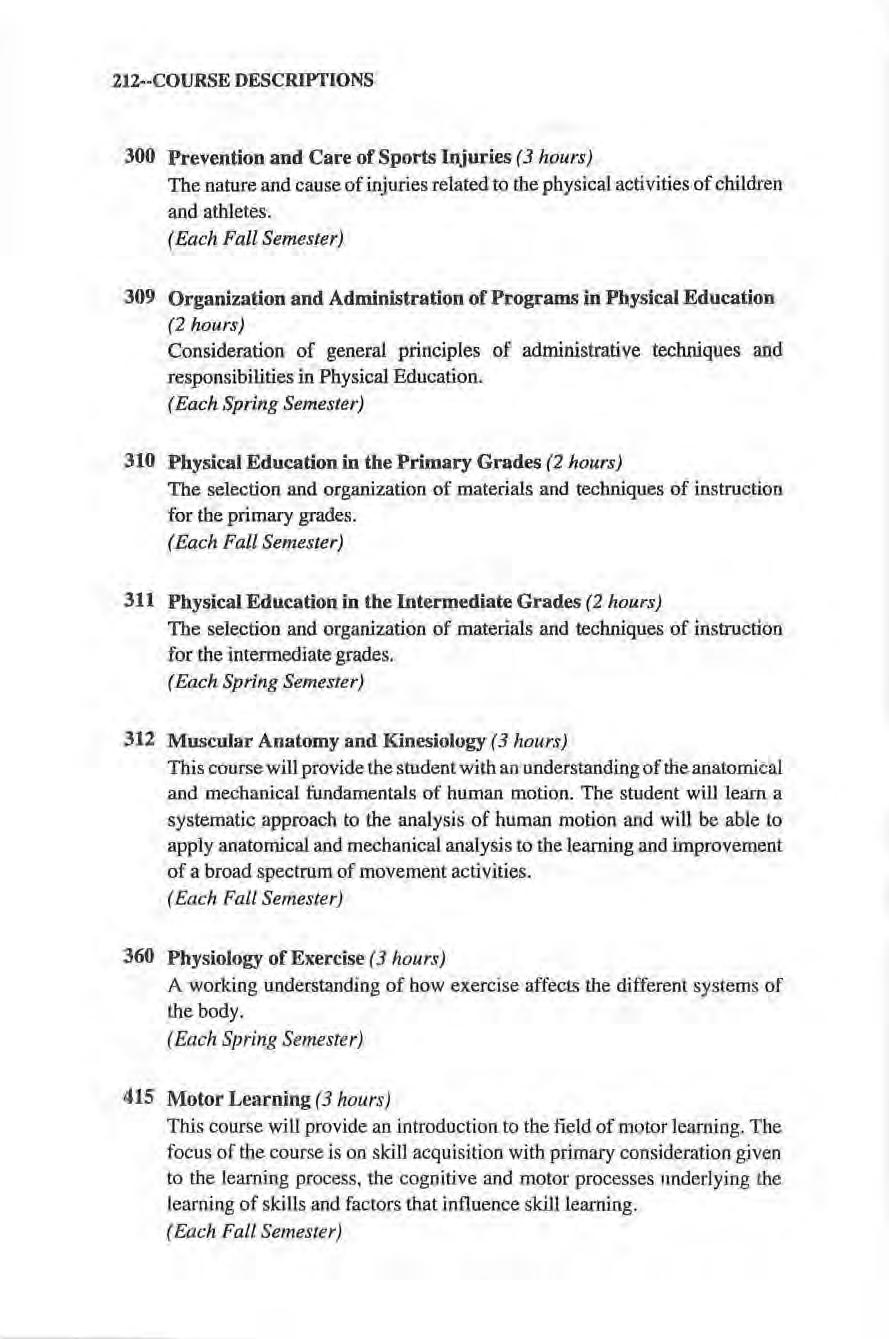
Consideration of general principles of administrative techniques a_nd respons ibilities in Physical Education.
(Each Spring Semester)
3 10 Physical Education in the Primary G.rades (2 hours)
The selection and organization of materials and techniques of instruc tion for the primary grades.
(Each Fall Semester)
311 Physical Education in the Intermediate Grades (2 hours)
The selectio n and organization of materials and techniques of instruc tion for t he intermediate grades.
(Each Spring Semester)
312 Muscular Anatomy and Kinesiology (3 hours)
This course will provide the student with an understanding of the anatomic al and mechanical fundamentals of human motion. The student will learn a systematic approach to the analysis of human motion and will be able to apply anatomical and mechan ical analysis to the learning and improvement of a broad spectrum of movement activities.
(Each Fall Semester)
360 Physiology of Exercise (3 hours)
A working understanding of how exercise affects the different systems of the body.
(Each Spring Semester)
415 Motor Learning (3 hours)
This course wiU provide an introduction to the field of motor learning. The focus of the course is on skill acquisition with primary consideration given to the learning process. the cognitive and motor processes nnderlying the learning of skills and factors that influence skill learning.
(Each Fall Semester)
212--COURSE DESCRIPTIONS
416 Tests and Measurements in Physical Education (3 hours)
The purpose of this course is to provide an understanding of essential statistical techniques, relevant measurement theo,ry and available tests to enable the sude nt to develop valid methods of evaluation.
(Each Spring Semester)
417 Adaptive Physical Education (3 hours)
Prerequisites: Psych 25 0 and PE 312
A stody of philosophy, procedures and practices in adapted physical education.
(Each Spring Semester)
433 Seminar in Physical Education (2 hours)
Designed to expl ore issues and challenges in physical education. This course is the capstone course and senior competency for the Physical Education major.
(Each Spring Semester)
497 Directed Study in Physical Education ( 1-4 hours)
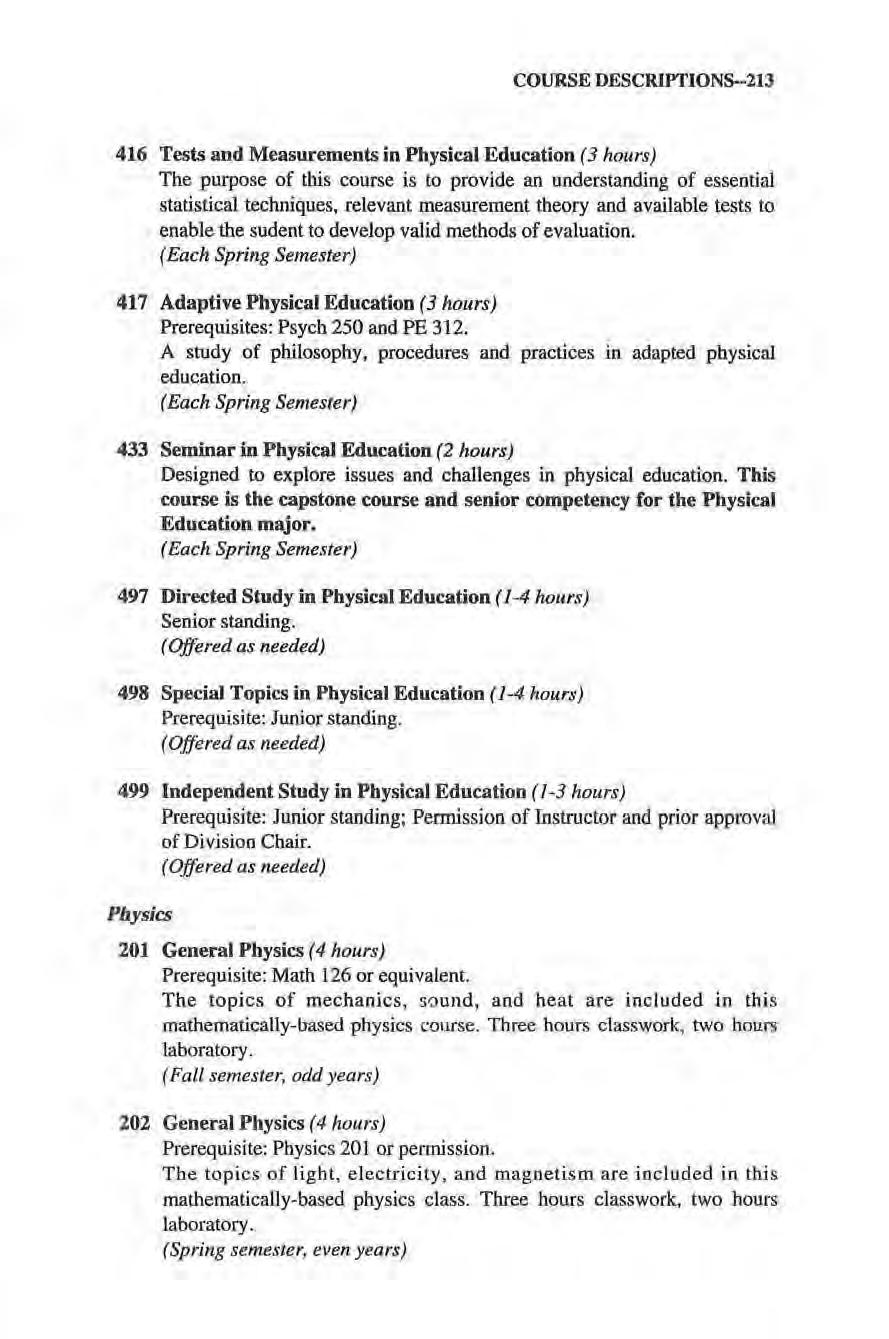
Senior standing.
(Offered as needed)
498 Special Topics in Physical Education ( 1-4 hoitrs)
Prerequisite: Junior standing.
(Offered as needed)
499 Independent Study in Physical Education ( 1-3 hours)
Prerequisite: Junior standing: Permission of Instructor and prior appmval of Division Chair.
(Offered as needed)
Physics
201 General Physics (4 hours)
Prerequisite: Math 126 or equivalent. The top i cs of mecha nics, sound, and heat are included in thi s mathematically-based physics cmuse. Three hours classwork, two hours laboratory.
(Fall semester, odd years)
202 General Physics ( 4 hours)
Prerequisite: Physics 201 or permission.
The topics of light, electricity, and magnetism are included in this mathematically-based physics class. Three hours classwork, two hours laboratory.
(Spring se mester, even years)
COURSE DESCRIPTIONS--213
206 Great Ideas in Astronomy (3 hoi,rs)
This course is an introduction to astronomy, with emphasis on those ideas and discoveries which have had, and continue to have, strong influence on our modem culture and world view.
(Offered as needed)
297 Directed Study in Physics (1-4 hours)
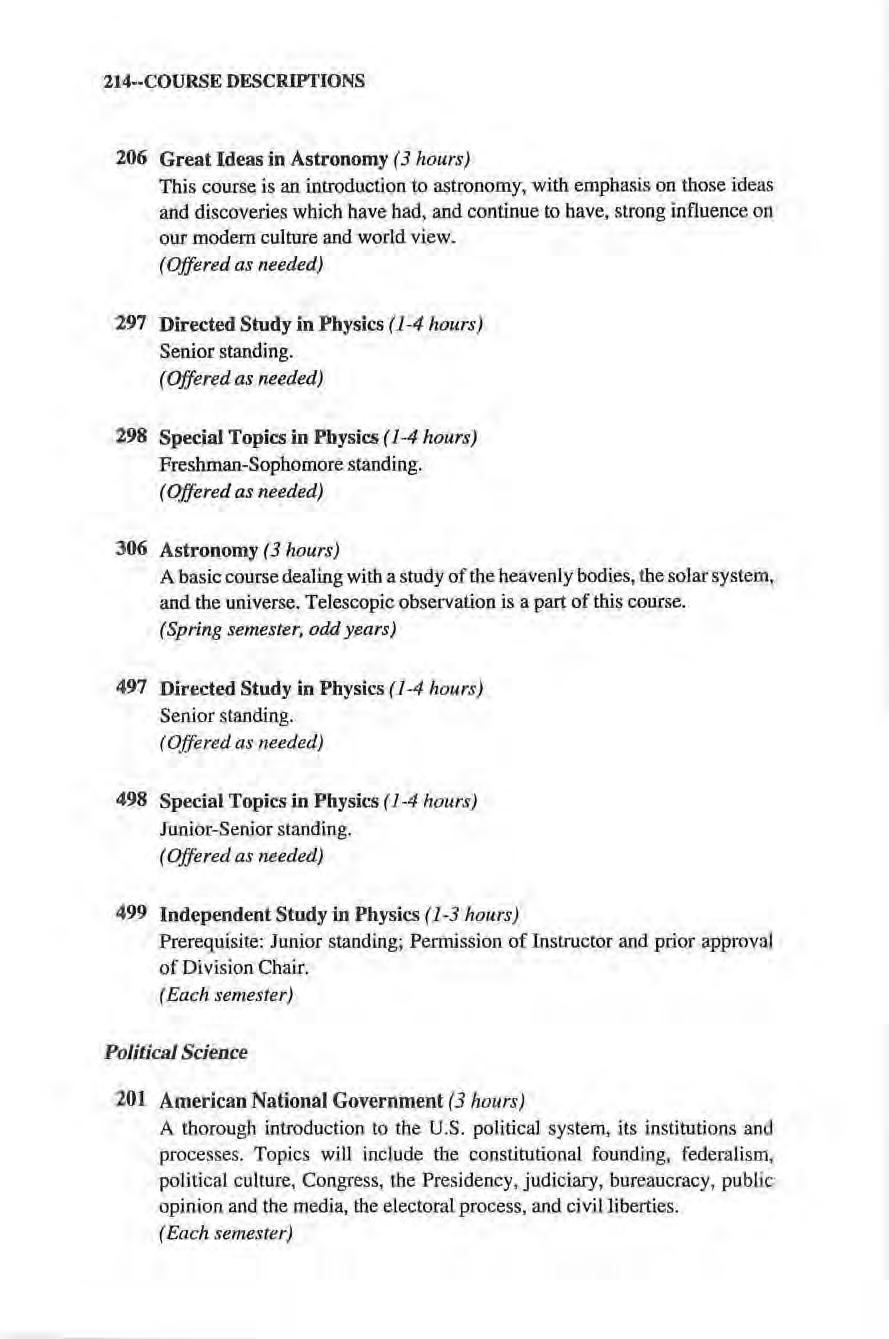
Senior s tanding.
(Offered as needed)
298 Special Topics in Physics (1-4 hours)
Freshman-Sophomore standiug.
(Offered as needed)
306 Astronomy (3 hours)
A basic course dealing with a study of the heavenly bodies, the solar system, and the universe. T elescopic observation is a part of this course.
(Spring semester, odd years)
497 Directed Study in Physics (l-4 hours)
Senior standing.
(Offered as needed)
498 Special Topics in Physics ( 1-4 hours)
Junior-Senior standing.
(Offered as needed)
499 Independent Study in Physics (1-3 hours)
Prerequisite: Junior standing; Permission of Instructor and prior approval of Division Chair.
(Each semester)
Political Science
201 American National Government (3 hours)
A thorough introduction to the U.S. political sys tem, its institutions and processes . Topics will include the constitutional found jng, federalism, political culture, Congress, the Presidency, judiciary, bureaucracy, public opin i on and the med ia, the electoral process , and civil liberties.
(Each semester)
214--COURSE DESCRIPTIONS
202 State and Local Government (3 hours)
Description and an alysis of politi cal institutions and behavior in American states with interstate comparisons and comparisons between state and nati onal political systems. Lecture topics i ncl ude the development and role of American l ocal government, its forms and structu res, and the relationship to the federal government.

(Fall semeste r, even years)
298 Special Top ics in Political Science ( 1-4 hours)
Freshman-Sophomore standing.
(Offered as n eeded)
301 Comparative Government (3 hours)
A comparative analysis of pol itical systems and institution s of several n ations; the nations studied may change with each offering. The course emphasis is on political cu lture, comparative political history, chief executives, leg islatures, political parties, interest groups, courts, and policy making w ith ample comparison s to the U.S
(Fa ll sem ester, odd years)
426 American Co nstitutional Law (3 hours)
P rerequisite: PSci 20 1 or 202 or instructor's permission.
A s tudy of the historical and poli tical context of constitutional doctrine through major decisions. The emphasis is on constitutional growth as i t relates to the fundamental stmcture of American gover:nment and the socia l order Dual-listed as Rist 426
(Sp ring semester, even years)
467 The Far East (3 hours)
This course is concerned with the political traditions and historical evolution of the area, the impact of the West and its profound influences on the political order, and today's revolution ary situ ation.
(0.ffered as needed)
468 Public Administration (3 hou rs)
Prerequisite: PSci 20 1
Students wi1J study a range of topics involved in the administration of public agencies. Topics will include the history of America's p ubli c service, the deve l opment of in t ergovernmental relations, bureaucracies, public personnel, budgeting, decision making, evalu ation procedures, and regulatory admin istration. This class will encourage students to i nvestigate the role of public administration in the past and today, as well as to conjecture the possibili ties for the fu ture.
(Spring semester, odd years)
COURSE DESCRIPTIONS--215
497 Directed Study in Political Science (1-4 hours)
Senior Standing.
(Offered as needed)
498 Special Topics io Political Science ( 1-4 hours)
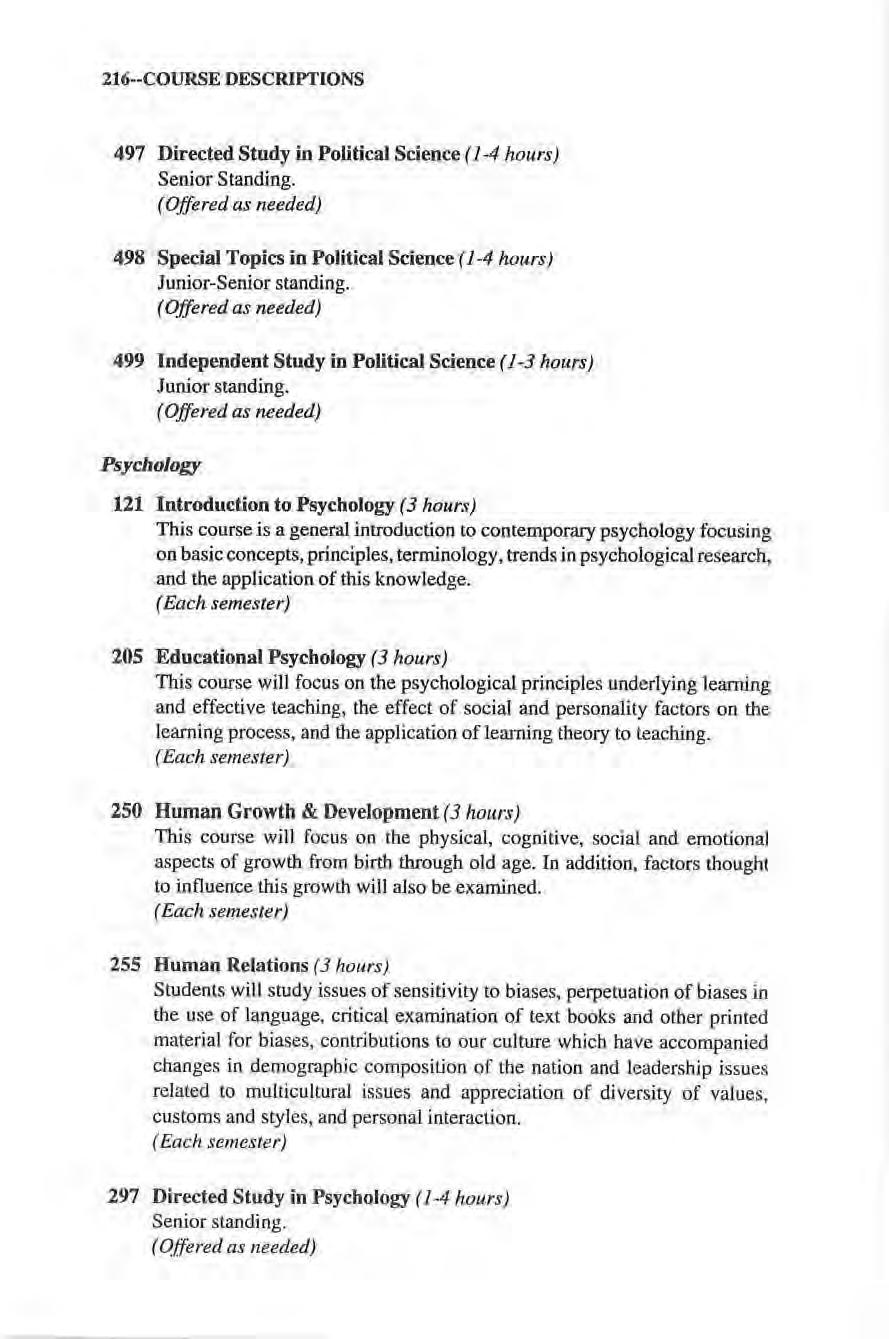
Junior-Senior standing.
( Offered as needed)
499 Independent Study in Political Science ( 1-3 hours)
Junior standing.
(Offered as needed)
Psychology
121 Introduction to Psychology (3 hours)
This course is a general introduction to contemporary psychology focusing on basic concepts, principles, terminology, trends in psychological research, and the appl ication of this knowledge.
( Each semester)
205 Educational Psychology (3 hours)
This course will focus on the psychological principles underlying learning and effective teaching , the effect of social and personality factors on the learning process, and the application of1earning theory to teaching.
(Each semester)
250 Human Growth & Development (3 hours)
Th.is coorse will focus on the physical, cognitive, social and emotional aspects of growth from birth through old age. In addition, factors thought to influence this growth will also be examined.
( Each semester)
255 Human Relations (3 hours)
Students will study issues of sensitivity to biases, perpetuation of biases in the use of langu11ge, critical examination of text books and other printed material for biases, contributions to our culture which have accompa nied changes in demographic composition of the nation and leadership issues related to multicultural issues and appreciation of diversity of value s, customs and styles, and personal interaction.
( Each semester)
297 Directed Study in Psychology ( 1-4 hours)
Senior standing.
( O.ffered as needed)·
216- -COURSE
DESCRIPTlONS
298 Special Topics in Psychology ( 1--4 hours)
Freshman-Sophomore s tandin g.
(Offered as needed)
304 Experimenta1Psychology(3 hours)
Prereq ui site: Psych 12 1 and Math 340.
The cou rse is designed to assist students in the comprehension and use of experim e n tal methods, basic statistical analysis, and experimental literature. Research exercises are provided to illustrate course content.
(Spring semester, even years)
305 Social Psych ology (3 hours)
Prerequisite: Psych 121 or Soc 101.
This course will focus on the effects of cul ture, society, social institutions, and social learning on the social attitudes and behavior of individuals within groups.
(Spring semester, odd years)
310 Psychology of Sports & Physical Activities (3 hours)
Prerequisite: Psych 121.
This course examines the place of psychology in p hysical education and sports. It includ es personality, ane nti on a nd arousal, anxiety and intervention, theories of motivation, and social psychology of sports aggressfon, audience effects, team cohesion, and leaders hip in sports.
(Fall semester, even years)
320 Psych~logy of Learning (3 hours)
Prerequisite: Psych 121.
This course wi II provide students with a bro:id , eclectic coverage of the field of learning and memory by addressing the wide range of i ssues and problems within the field from stimulus-response to cognitive psychology.
(Spring semester, odd years)
345 Psychology of Personality (3 hours)
Th is course will focus on the process of personality growth and adjustment. Through a n exam in a tion of se lected theoretical systems, different interpretations of this process will be presented.
( Fall semest e r, odd years)
431 Psychological Tests and Measurements (3 hours)
Prerequisite: Psych 121 and Math 345 o r permission of the instructor. The course will focus on the issues and problems surroundin g psychological testing. Topics to be discussed include reliability, validity, construction, administration, norms, and interpretati on as well as a survey of current psychological tests.
(Offered as needed)

COURSE DESCRIPTIONS-·217
437 Techniques of Counseling (3 hours)
Prerequisite: Psych 121.
The content, process, and practice of various counseling techniques will be examined for their applicability to education, psychology and social work. Practical experience in the use of these techniques will also be provided.
(Sp ring semester, even years)
438 Approaches to Parent & Family Counseling (3 h ours)
P rereq uisite: SpEd 200.
This course is designe d for persons who are preparing to work with paren ts in family co unselin g . The changing nature and definition of "family '' as i t relates to today 's society will b e introduced The ethics, settings, refen'al process, basic counseling strate gies and approaches will be addressed.
(Eac h Fall semes_ter)
440 Behavior Management & Modification (3 hours)
The course will foc u s o n the basic princ iples of behavior mod ification as we ll as survey some of the practical appli cations of this general approach to behavior change.
(Fall semester)
4 50 Abnormal Psychology (3 hours)
Prerequisite: Psych 121, 250 and junior standing. Focusing o n personali ty disorders, schizophrenia an d manic depressives, this coutse would deal exte nsively with DSM-ill- R categories of abnormal psychology.
(Spring semester, odd years)
460 Psychology of Correctional and At-Risk Youth Education & Therapy (3 hours)
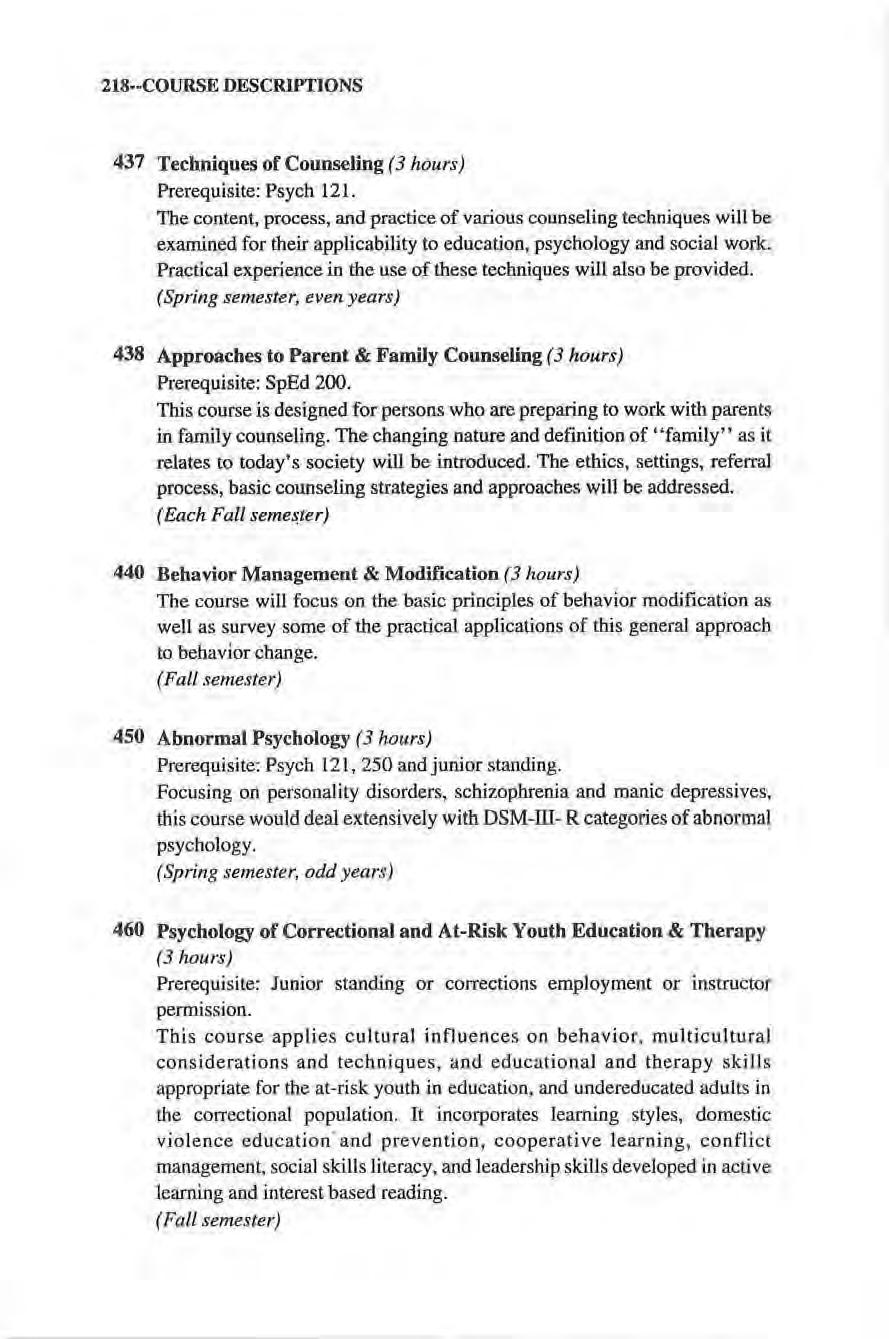
Prerequ is ite: Junior standing or corrections employment or instructor perrnissjon.
Thi s course app lies c ultur al i n flu ences on behav i or, multicultural considerat ions and techn iqu es, and educat io n aJ and therapy ski ll s approp ri ate for the at-risk youth in ed ucation, and undereducated adults in the correct ional population. It incorporates learning styles, domestic vio l ence education· and pr e vention , cooperative learning , co n flict management, soc ial skills literacy, a nd leadership skills deve lop ed in active learning and interest based reading.
(Fall semester)
218--COURSE DESCRIPTIONS
465 Corrections Practicum (3 hours)
Prerequis ite: P sych 460.
As a companion course of Psych 460, •' Psychology of Correc tion al Education and Therapy.'' Practicum will s upervise students tutoring and me ntoring offenders in the Nebraska Department of Corrections. Students will develop library and referencing skills for applied research.
(Each semester)
497 Directed Study in Psychology (1-4 hours)
Senior s tanding.
(Offered as needed)
498 Special Topics in Psychology ( 14 hours)
Junior-Senior standing.
(O.ffered as needed)
499 Independent Study in Psychology ( 1-3 hours)
Juni or standing; Permiss ion of Instmctor and prior approval of Division Chair.
( Each semester)
Social Work
280 Introduction to Social Work (3 hours)
An introdu ction to the profession of social work with an emphasis on history, philosophy, methods, and processes of social work.
(Eac h Fall semester)
297 Directed Study in Social Work (1-4 hours)
Senior Sta nding.
(Offered as needed)
298 Special Topics in Social Work ( 1 -4 hours)
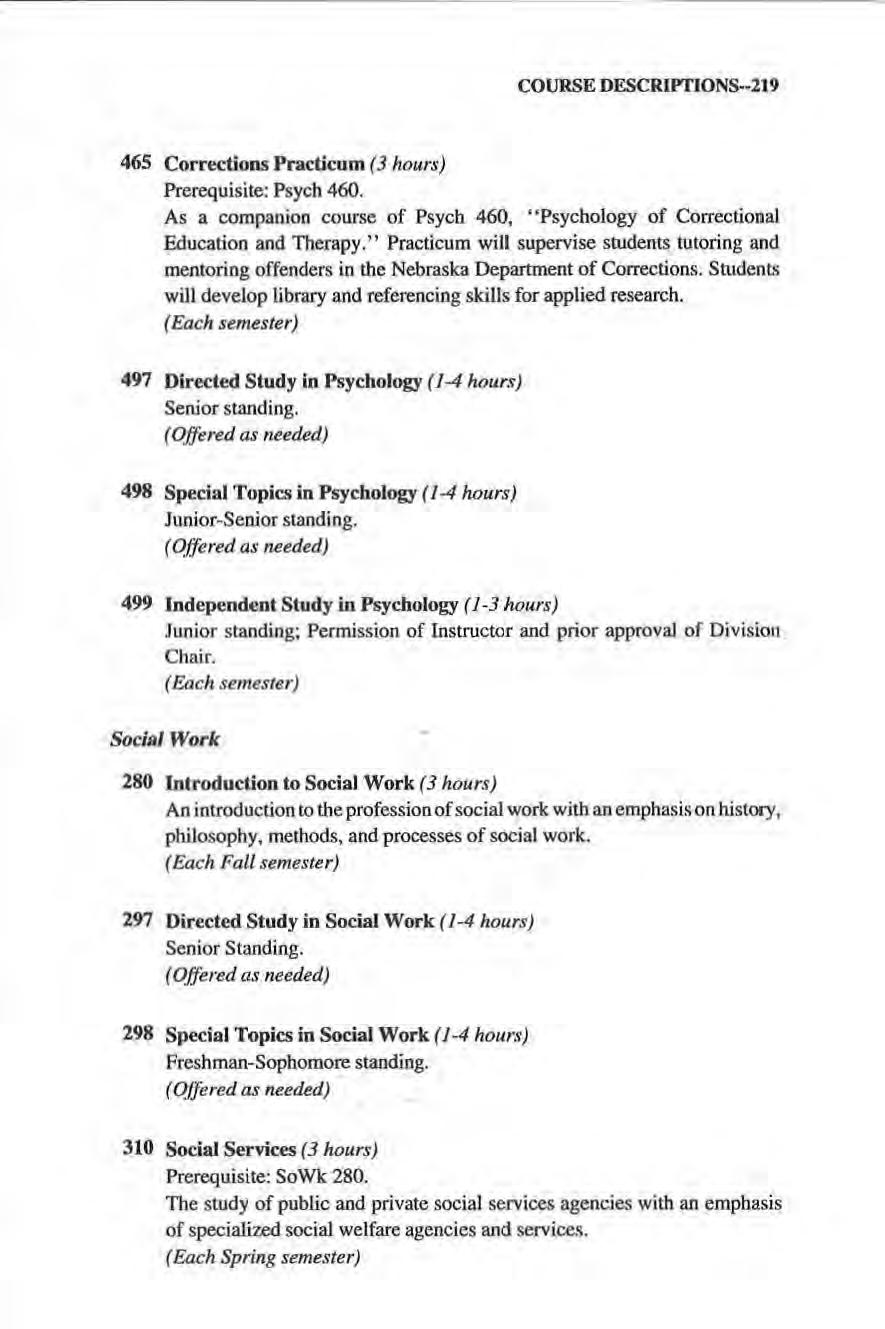
Freshman-Sophomore standing.
(0.fjered as needed)
310 Social Services (3 hours)
Prerequisite: SoWk 280.
The study of public and private social services agencies with an emphasis of specialiud social welfare agencies and serv ices.
(Each Spring semester)
COURSE DESCRIPTIONS- -219
375 Casework (3 hours)
Prerequisite: So Wk 280.
The art, theory, and practice of the dynamics of case work with an emphasis on current social work techniques used to meet group and individual needs.
( Each Fall semester)
390 Group Work (3 hours)
Prerequisite: SoWk. 280.
The theory and practice of the dynamics of group work with an emphasis on techniques used in meeting group and ilndividual needs.
(Each Spring semester)
430 Field Work Practicum (3 hours)
Prerequisite: 10 hours of Social Work and permission. Supervised experience in social work.
(Offered as needed)
497 Directed Study in Social Work ( 1 -4 hours) Senior Standing.
(Offered as needed)
498 Special Topics in Social Work ( 1-4 hours)
Junior-Senior standing.
(Offered as needed)
499 lndependent Study in Social Work (1-3 hours)

Prerequisite: Junior standing; Permission of Instructor and prior approval of Division Chair.
(Offered as needed)
Sociology
201 Principles of Sociology (3 hours)
A study of cultures and their relationship to s pecific social problems, social institutions, ethnic groups, and the major problems of social policies. (Each semester)
225 Introduction to Cultural Anthr-opology (3 hours)
A comparative and historical approach to itbe religion, social organization, subsistence patterns, and the other aspect!; of the great variety of cultures around the world.
(Each Fall semestu)
220--COURSE
DESCRIPTIONS
230 Sociology of Women (3 hours)
A brief history of women's ro le and status as well as society' s attitude toward women.
(Each Spring semester)
250 Community Organization (3 hours)
Prerequisite: Soc 201.
The focus of this course is on the urban community, basic patterns of social and ecological o rganization, and factors contributing to community integration and d isorganization.
(Each Spring semester)
260 RuraJ Sociology (3 hours)
Prerequisite: Soc 201.
An examination of rural societies with an analysis of rural g ro up s, institutions, and rural-u rban relations.
(Fall semester. e ven years)
297 Directed Study in Sociology (1-4 hours)
Senior Stand ing.
(Offered as needed)
298 Special Topjcs in Sociology (1 - 4 hours)
Freshman-Sophomore standing.
(Offered as n eeded)
300 Contemporary Social Problems ( 3 ho urs)
An introduction to the causes, treatment, and prevent ion of selected social problems with particuJar emphasis on the problems of conflict and inequality
(Spring semester, even yea rs)
320 Sociology of Educatio n (3 hours)
Prerequisite: Soc 201.
Ao application of soc iologica l principles to the education process. The relationship between stratification and education, th e importance of interaction patterns on tJ1e educational process, theeffectofother in s titutions on education, an d the role of education as a dynamic institulion in a c hangi ng society are s tre ssed.
(Fall semester, odd years)
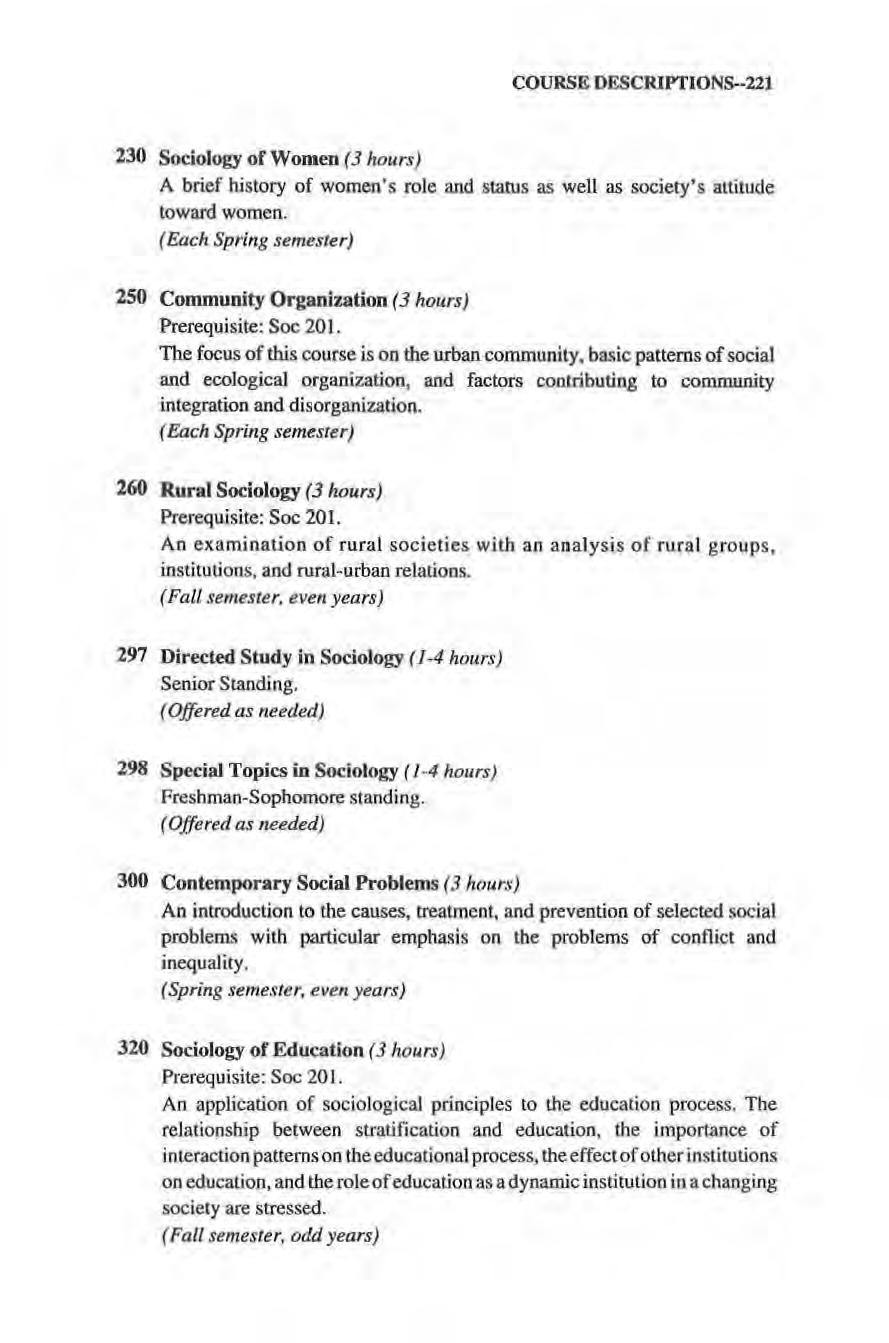
COURSE DESCRIPTIONS--221
321 Sociology of Religion ( 3 hours)
A study of the role of religion in life, from early societies to the present. The course stresses Sociological Theory of Reli gion and includes materials from Anthropology, Archeology, Macrosociology, History , and comparative religions.
(Spring semester, odd years)
340 The Family (3 hours)
Prerequisite: Soc 201.
An examination of the role of the famil y in contemporary society with an emphasis on the factors influencing the fami ly structure, functions, and roles, and their implications for both the community and individua ls at varying stages of the family life cycle.
(Each Spring semester)
360 Criminology (3 hours)
Ao examination of the nature and causes of crime as a social phenomenon.
(Each Spring semester)
370 Eth nic-Group Relations ( 3 hours)
Prerequisite: Soc 201.
A study of the nature of minority groups and their distribution in American society with an examination of the melting pot thesis in a p lural is tic society.
(Fall semester, odd years)
420 SocioJogical and Psychological Theory ( 3 hours)
Prerequisite: Soc 201 and permission.
An overview of earlier sociological theorists and their contributions to current sociological theory. This course is the capstone coul"Se and senior competency for the Psychology/ Sociology major.
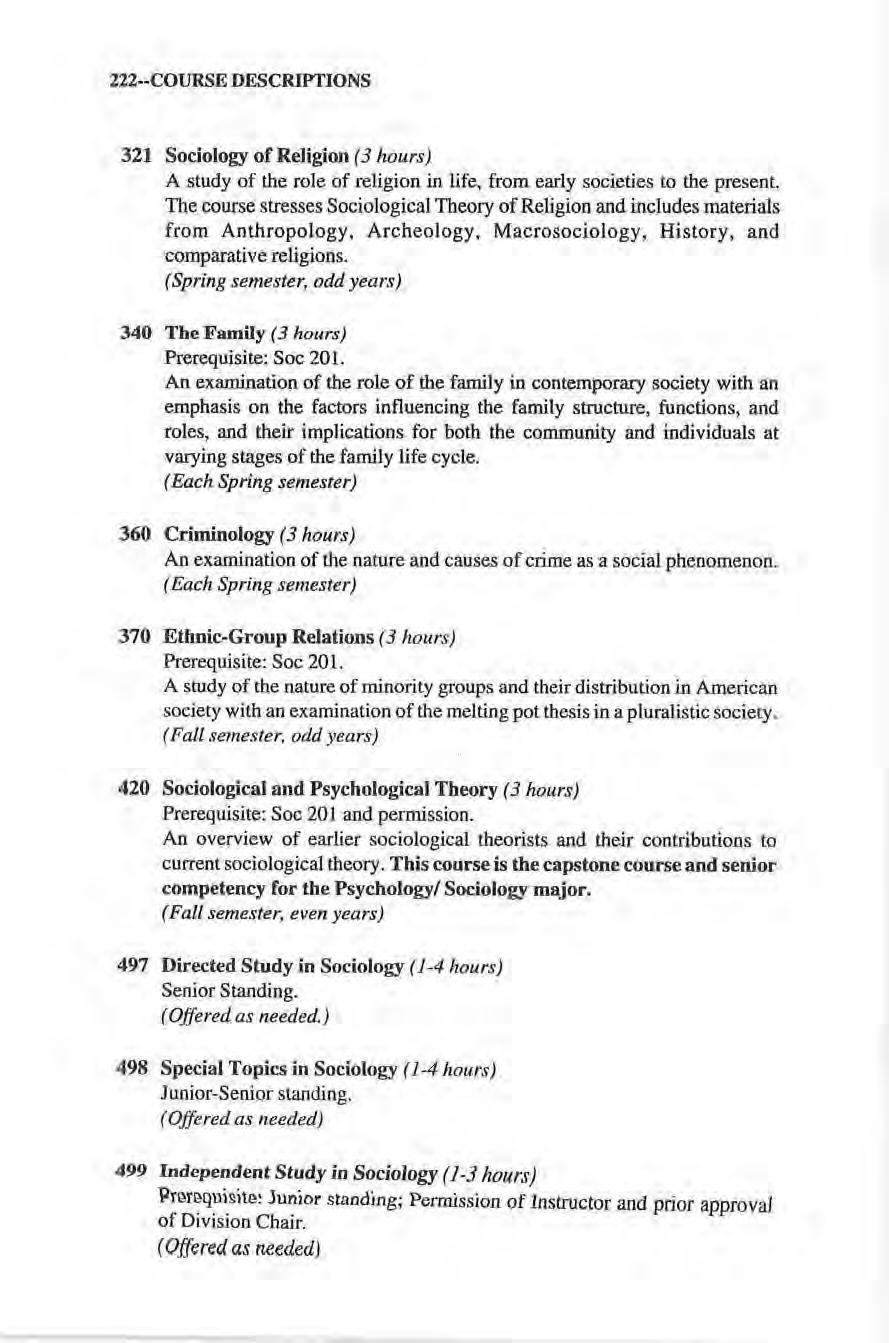
(Fall semester, even years)
497 Directed Study in Sociology ( 1-4 hours) Senior Standing.
(Offered as needed.)
498 Special Topics in Sociology ( 1-4 hours)
Junior-Senior standing.
(Offered as needed)
499 Independent S tudy in Sociology (1-3 hours)
Pr~rnqu1!lite: Junior standing; Permission of lnstructor and prior approval of Divi sion Chair.
(Offered as needed)
222--COURSE DESCRIPTIONS
Spanish
101 Introductory Spanish (5 hours)
An introductory course in Spanish dealing with grammar, reading, writing, and conversing.
(Each Fall semester)
102 Spanish II (5 hours)
Prerequisite: Span 101.
Spanish II emphas izes increased proficiency in conversational situations, granunar, reading, and writing.
(Each Spring semester)
Special Education
200 Introduction to Special Education (3 ho1"s)
This course is designed to provide a historical , political and sociological survey of the areas of exceptionality in the field of special education. The course will identify significant changes which have occurred in the education of exceptional populations and provide an introductory experience concerning the various disability groupings.
(Each semester)
285 Education of Learning Disabled (2 hours)
Prerequisite: SpEd 200 or concurrent enrollment. This course bas been designed to prepare the prospective teacher with the ability to diagnose deficit areas and areas of s trengths, and to be able to know and implement various instructional procedures and appropriate educational materials of the L.D. child.
(Each Spring semester)
290 Education of Mentally Handicapped Learners (2 hours)
Prerequisite: SpEd 200 or concurrent enrollmentThis course is des igned to provide a survey of the characteristics, abilities , and needs of the mentally handicapped learner as well as the psychological and environmental and cultural factors which contribu le to retardation.
(Each Fall semester)
l97 Directed Study in Special Education ( 1-4 hours)
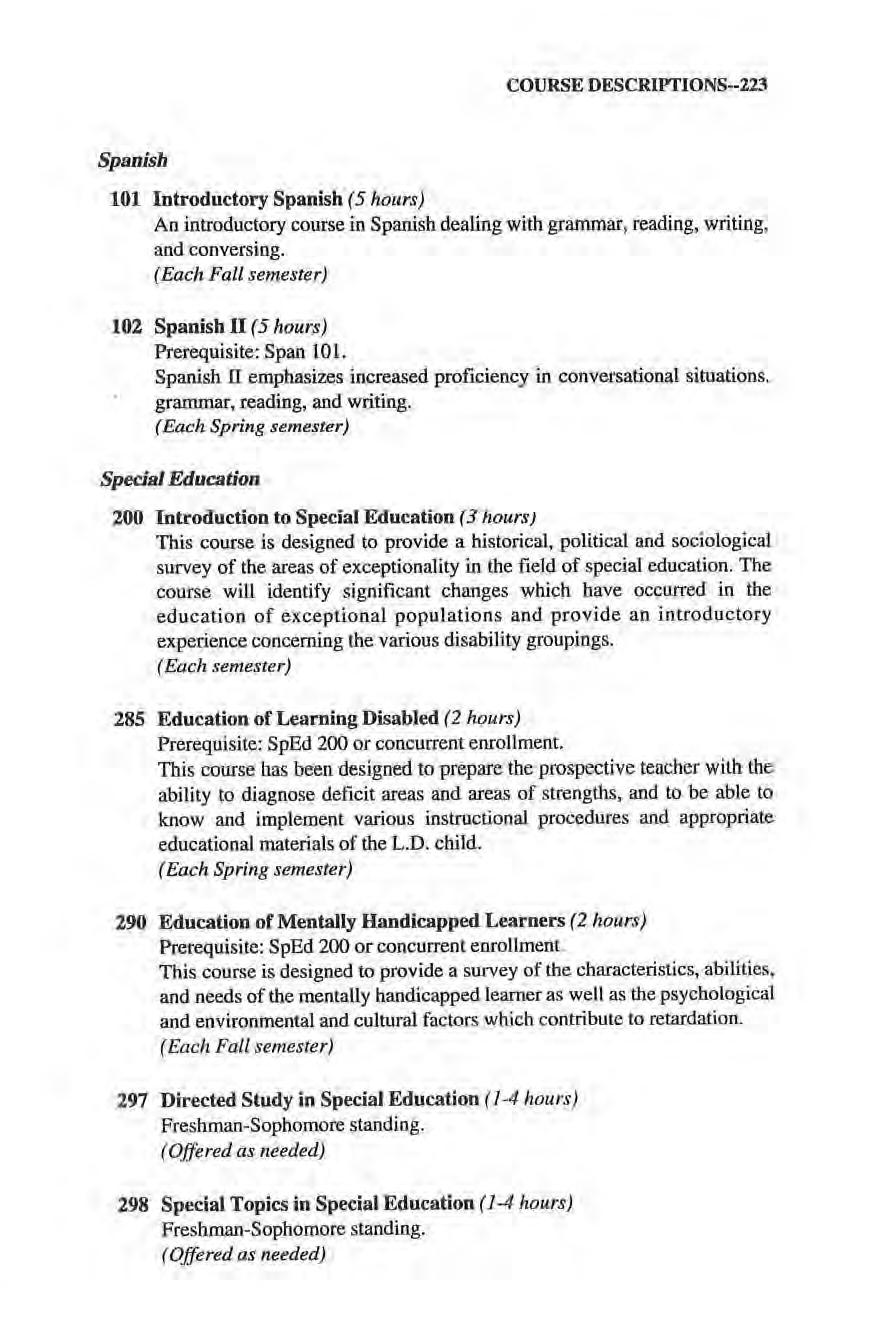
Freshman-Sophomore standing.
(Offered as needed)
298 Special Topics in Special Education (1-4 hours)
Freshman-Sophomore standing.
(Offered as needed)
COURSE DESCRIPTIONS--223
300 Assessment in Special E ducation (3 hours)
Prerequisite: Admission to Teacher Educat ion and SpEd 200. Tests commo nly used for childre n with suspected handicaps are interpreted. (Completion of Math 1 I 1 Elements of Statistics prior to en ro llment is recommended.)
(Each Fall Semester)
307 Special Edu cation Practicum (2 hours)
Prerequisite: Admission to Teacher Education. The purpose of the,course•is to provide a classroom experience in a Special Education setting.
(Each Fall semester)
3 09 Preschool H and icapped Practicum (2 hours)
Prereq uisite: Admiss ion to Teacher Ed ucation; SpEd 200; SpEd 405. This course is designed to provide students with an opportunity to observe the specific methods in Preschool thro ugh Kindergarten being s tudi ed in handicapped met hods classes and to b egin to practice those method s.
(Spring semester, even years)
405 Special E ducation/E arly Childhood Characteristics & Methods
(3 ho u rs)
Prerequisite: SpEd 200 and Admission to Teacher Education. This course is d es igned to enable the stu dent to master the knowledge of the purposes, unique feat ures, service delivery and issues in the field of early childhood special education. Basic information about the foundations of early childhood special education progmms and sources of c111Tent research about this rapidl y growing field will be studied. Current best p ractice instructional methods will be a major focus of this course.
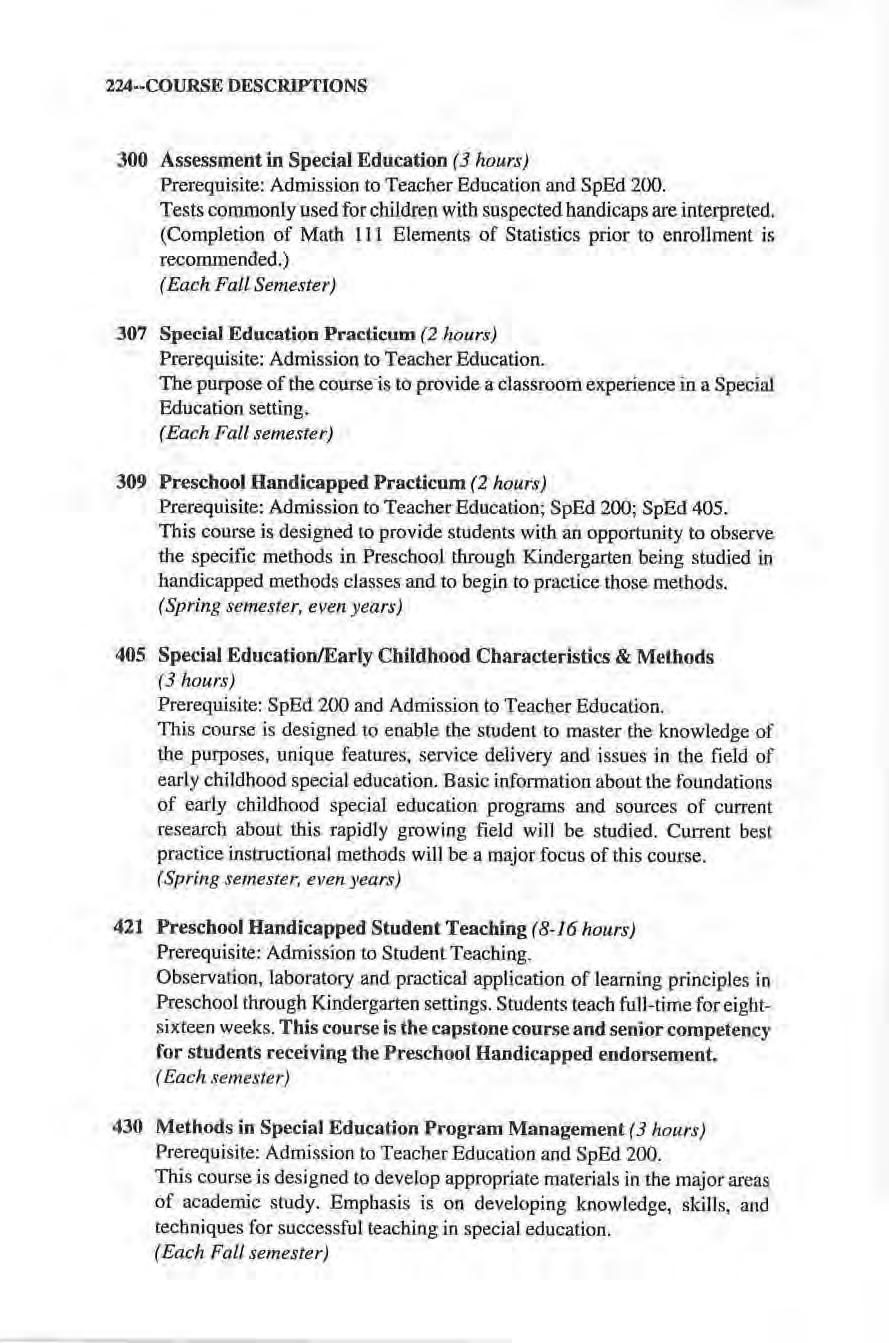
(Spring semester, even years)
421 Preschool Handicapped Student Teaching (8-16 hours)
Prerequisite: Admission to Student T eaching. Observation, laboratory and practical applicati on of learning principles i n Preschool through K inde rgarten settings. Students teach full-ti me for eightsixteen weeks. This course is the capstone course and senior compete ncy for students rece iving the Preschool Handicapped endorsement.
(Each semester)
430 Method s in Special Ed ucati on Program Management (3 hou rs)
Prerequisite: Admiss io n to Teacher E ducati on and SpEd 200. This course is designed to develop appropri ate materials in the major areas of academic stu dy. Emphasis is on deve lopi ng knowledge, skil ls, and techniques for successful teaching in spec.ial education.
(Each Fall semester)
224--COURSE
DESCRIPTIONS
435 Special Education Student Teaching ( 8-16 hours)
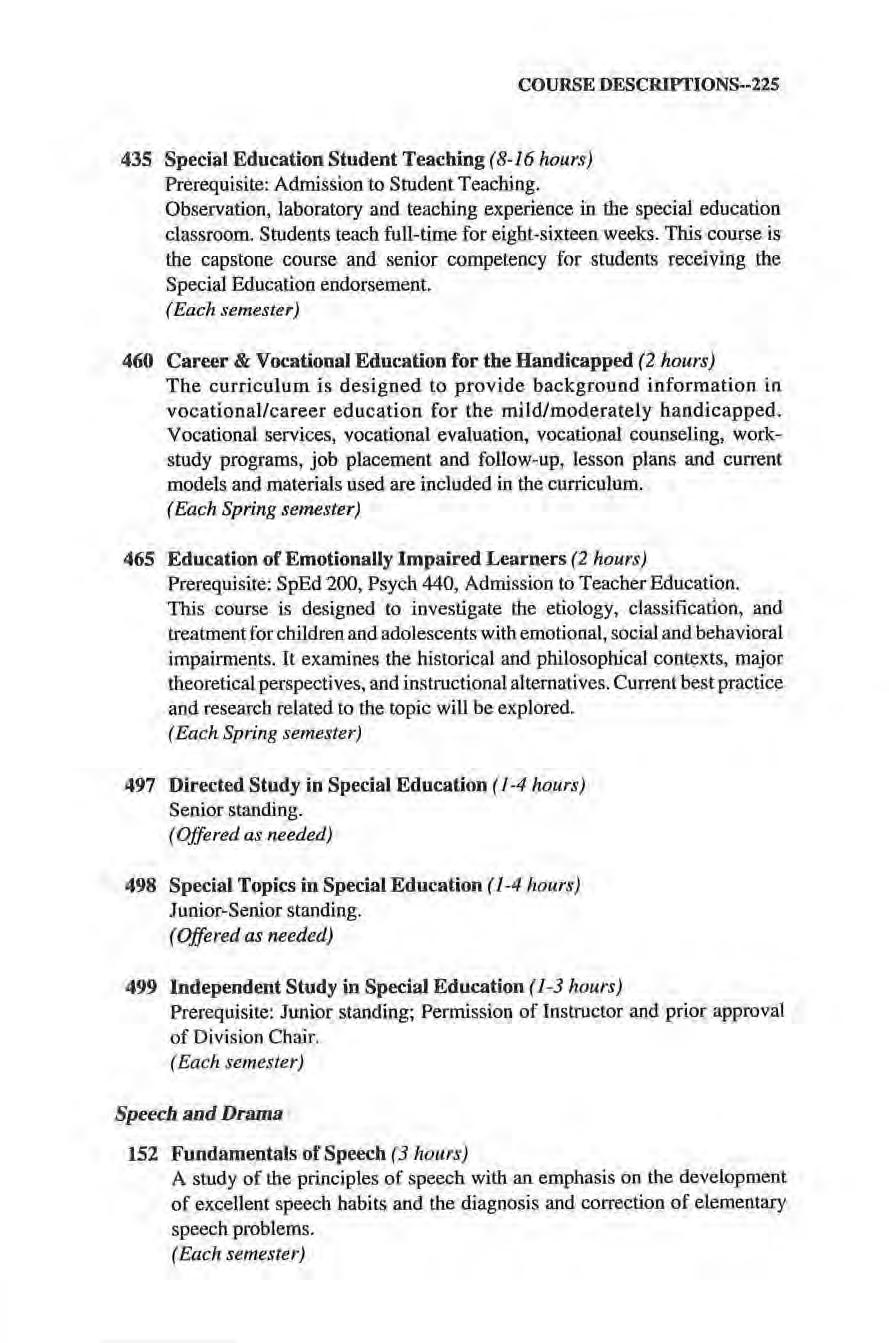
Prerequisite: Admission to Student Teaching. Observation, laboratory and teaching experience in the special education classroom. Students teach full-time for eight-sixteen weeks. This course is the capstone course and senior competency for students receiving the Special Education endorsement.
(Each semester)
460 Career & Vocational Education for the Handicapped (2 hours)
The curricu lum is designed to provide background information in vocational/career ed ucatio n for the mild/moderately h andicapped. Vocational services, vocational evaluation, vocational counseling, workstudy programs, job placement and follow-up, lesson plans and current models and materials used are included in the curriculum.
(Each Spring semester)
465 Education of Emotio nally Impaired Learners (2 hours)
Prerequisite: SpEd 200, Psych 440, Admission to Teacher Education. This course is designed ' to investigate the etiology, classificatio n , and treatment for children and adolescents with emotional, social and behavioral impairments. I t examines the historical and philosophical contexts, major theoretical perspectives, and instructional alternatives. Current best practice and research related to th e t opic wi ll be explored.
(Each Spring semester)
497 Directed Study in Special Education ( 1-4 hours) Senior standing.
(Offered as needed)
498 Special Topics in Special Education ( 1-4 hours)
Junior-Senior standing.
(Offered as needed)
499 Independent Study in Special Education (1- 3 hours)
Prerequisite: Junior stand ing; Permission of Instructor and prior approval of Division Chair.
(Each semester)
Speech and Drama
152 Fundamentals of Speech (3 hours)
A study of the principles of speech with an emphas is on the development of excellent speech habits and the diagnosis and correction of elementary speech problems.
(Each semester)
COURSE DESCRIPTIONS--22S
226--COURSE DESCRIPI'IONS
232 Introduction to Theatre (3 hours)
An introduction to all forms of drama and styles of theatrical presentation and production as a means of developing the student's critical appreciation of the theatre arts
(Each semester)
235 Stagecrafts ( 3 hours)
An introduc tion to ·the study and practice of the basic aspects of technical theatre production including sets, lighting, costuming, sound, properties, and make-up .
(Spring semester, even years)
254 Public Speaking (3 hours)
A study of the forms of address, speech organization, composition. deli very, and Parliamentary rules with practice required in various public speaking situations including publ ic meetings and group d iscussions, radio and television broadcasting, interviewing, role-playing and debate.
(Spring semester, even years)
256 Acting Techniques (3 hours)
A concentration on stage movement and pantomime with an emphasis on the development of the creative imagination and the use of stage conventions and techniques.
(Fall semester, even years)
257 Acting Styles (3 hours)
This course provides intensive training in stage business, dialogue and characterization, character analysis, and the principles of dramatic interpretation as applied to various historic periods and acting styles.
(Fall semester, odd years)
297 Directed Study in Speech and Drama ( 1-4 hours)
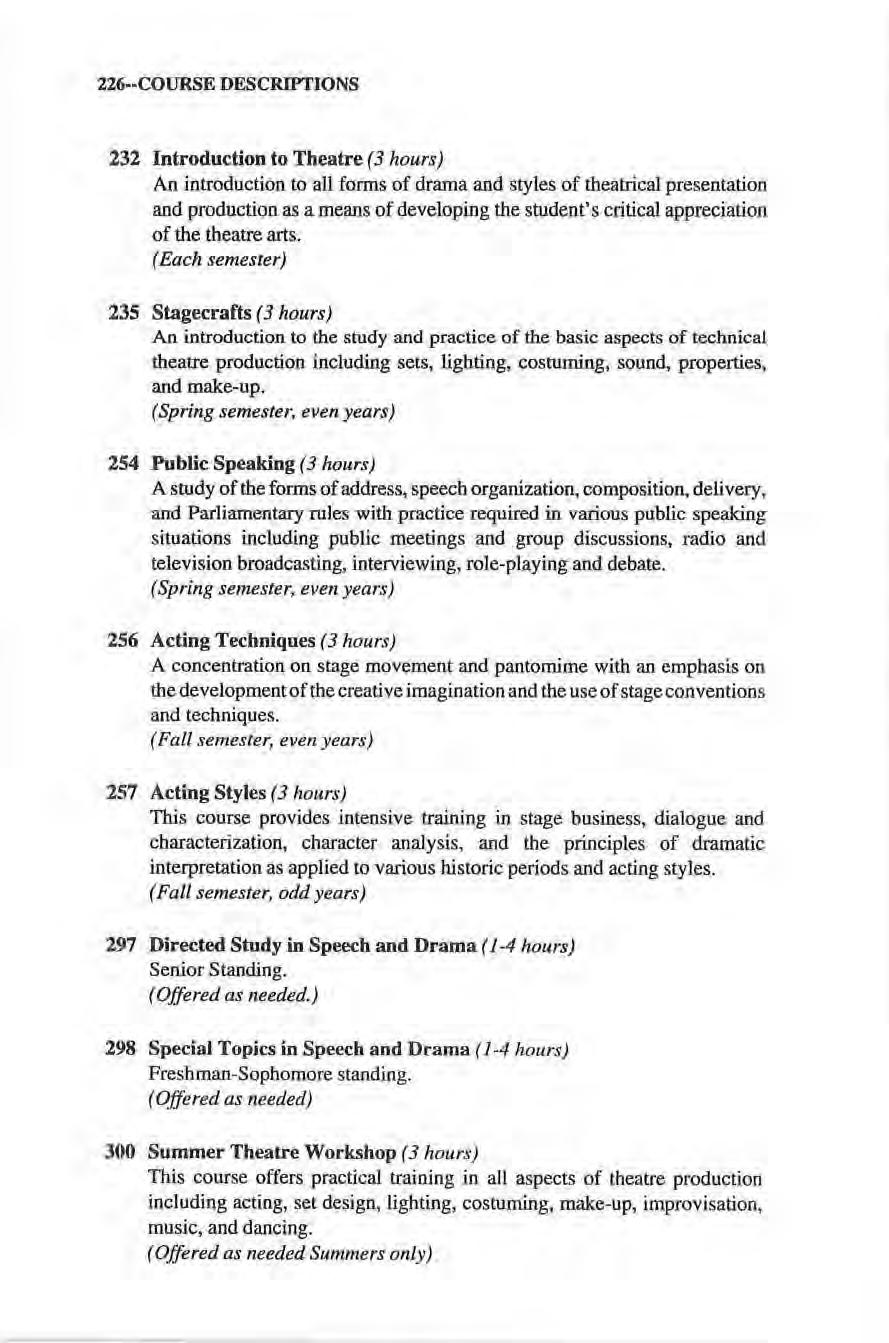
Senior Standing.
(Offered as needed.)
298 Special Topics in Speech and Drama (1-4 hours)
Freshman-Sophomore standing.
(Offered as needed)
300 Summer Theatre Workshop (3 hours)
This course offers practical training in all aspects of theatre produc tion including acting, set design, lighting, costuming, make-up, improvisation, music, and dancing.
(Offered as needed Summers only)
327 Light and Sound Design for Stage and Television (3 hours)
Prerequisite: Speh 235.
This course studies the theory and practice of stage and television lighting and sound systems with an emphasis on color, acoustical, and light problems.
(Spring semester, odd years)
353 Speech Correction and Development (3 hours)
This course identifies the unique educational problems of children with speech deficiencies with an emphasis on identification and remediation.
(Each Spring semester)
355 Principles of Play Production (3 hours)
This course for the director of dramatics in schools and communities answers the fundamental questions of play selection, casting, directing, steps in rehearsal, scenery, lighting, costume, make-up, and business organization .
(Fall semester, odd years)
357 Interpretative Reading ( 3 hours)
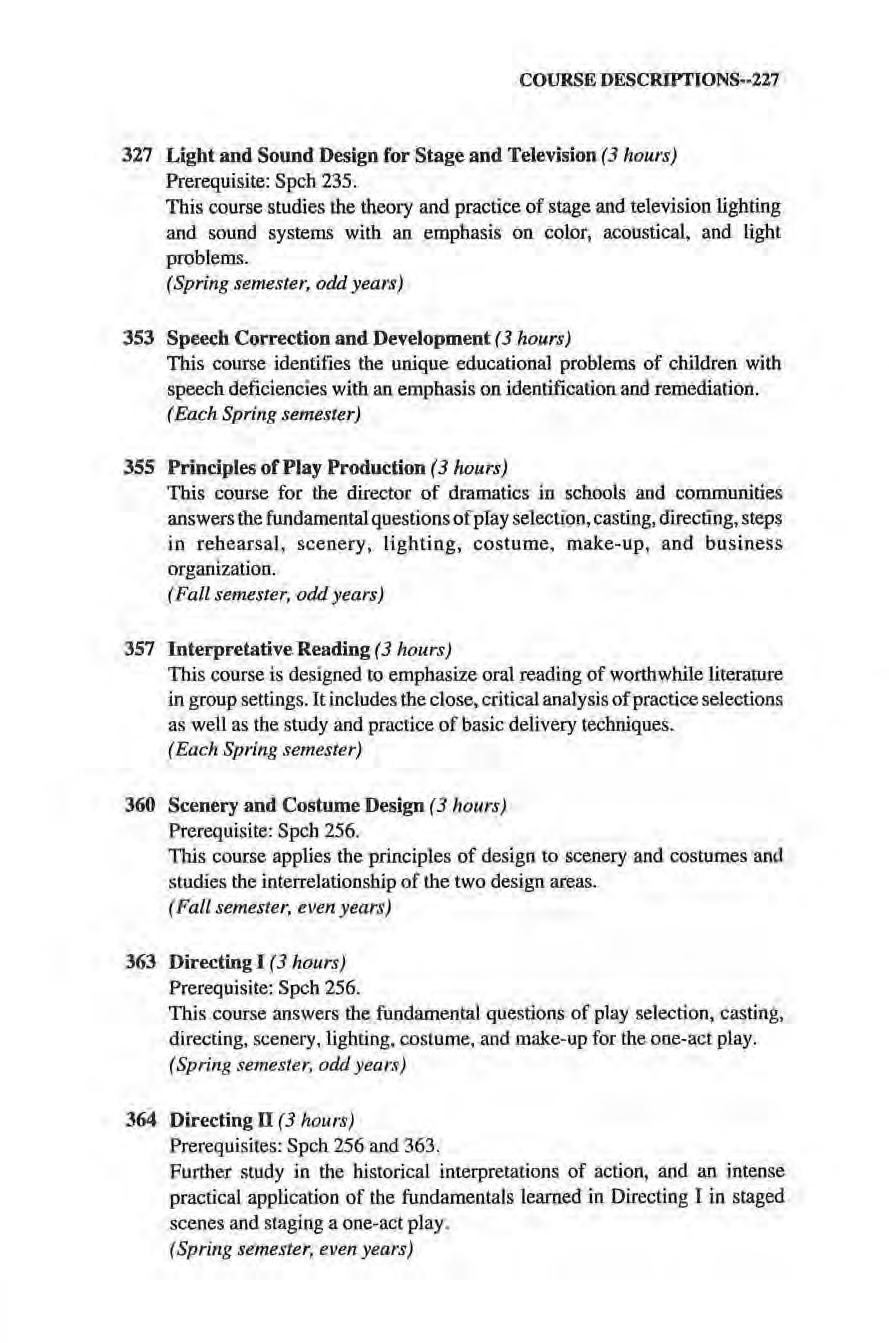
This course is designed to emphasize oral reading of worthwhile literature in group settings. It includes the close, critical analysis of practice selections as well as the study and practice of basic deli very techniques.
(Each Spring semester)
360 Scenery and Costume Design ( 3 hours)
Prerequisite: Speh 256.
This course applies the principles of design to scenery and costumes and studies the interrelationship of the two design areas.
( Fall semester, even years)
363 Directing I (3 hours)
Prerequis ite : Speh 256.
This course answers the fundamental questions of play selection, casting, d i rec ting, scenery, lighting, costume, and make-up for the one-act play.
(Spring semester, odd years)
364 Directing II (3 hours)
Prerequisites: Speh 256 and 363.
F urther study i n the historical interpretations of action, and an intense. practical application of the fundamenta ls l earned in Directing I in staged scenes and staging a one-act play .
(Spring semester, even years)
COURSE DESCRIPTIONS-•227
369 Children's Theatre and Creative Dramatics (3 hours)
The study and active participation in the two different concepts of drama for young people. Creative dramatics, in which children with the gu idance of an imaginative leader create scenes or plays and perform them using improvised dialogue and action with personal development as the goal, and Children's Theatre which utilizes written scripts directed and performed as a complete production for child audiences.
(Fall semester, even years)
400 Theatre History (3 hours)
This course will examine the nature, function, and literature of the theatre from its beginning to the present day. The approach will consist of a study of each of the major periods in theatre history and representative plays of the period.
(Fall semester, odd years)
450 Senior Project (1 hour)
Prerequisites: Theater major; permission of instructor. Senior Project will require the student to apply the principles and theories learned through coursework and practical experience in the theatre to the production of a main stage production. The student will choose a specific area theatre production, i.e. directing, design or acting, and be responsible for all aspects of their chosen area. This course is the capstone course and senior competency for the Speech and Drama major.
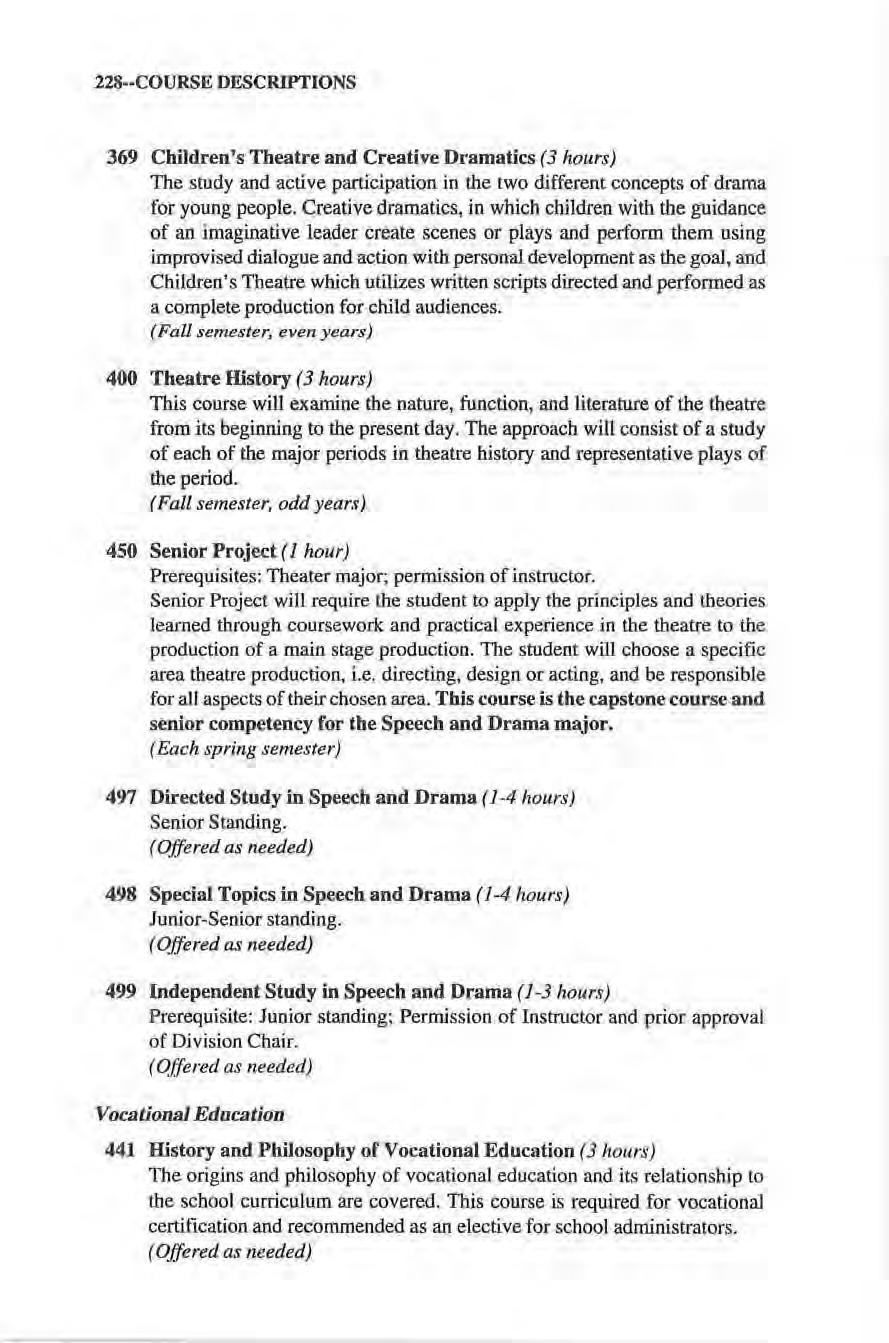
(Each spring semester)
497 Directed Study in Speech and Drama ( 1 -4 hours) Senior Standing.
(Offered as needed)
498 Special Topics in Speech and Drama ( 1-4 hours)
Junior-Senior standing.
(Offered as needed)
499 Independent Study in Speech and Drama ( 1-3 hours)
Prerequisite: Junior standing; Permission of Instructor aod pri.or approval of Division Chair.
(Offered as needed)
Vocational Education
441 History and Philosophy of Vocational Education (3 hou rs)
The origins and philosophy of vocational education and its relationship to the school c urricu lum are covered. This course is required for vocational certification and recommended as an elective for school administrators.
(Offered as needed)
228--COURSE
DESCRIPTIONS
442 Organization and Administration of Vocational Education (3 hours)
This course provides a study of the principles and policies governing the administration of vocational educational programs in high schools, technical schools, junior colleges, and adult education programs.
(Offered as needed)
443 Coordination Techniques in Vocational Education Programs (3 hours)
T hi s co u rse analyzes Vocational Cooperati ve Programs a nd their relationsrup to the rugh school , junior college, and adult vocational programs. The emphas is i s on the organization and supervis i on of cooperative programs, duties and responsibilities of the coordinator, selection and placement of students, and evaluation of students. training stations and the cooperative program.
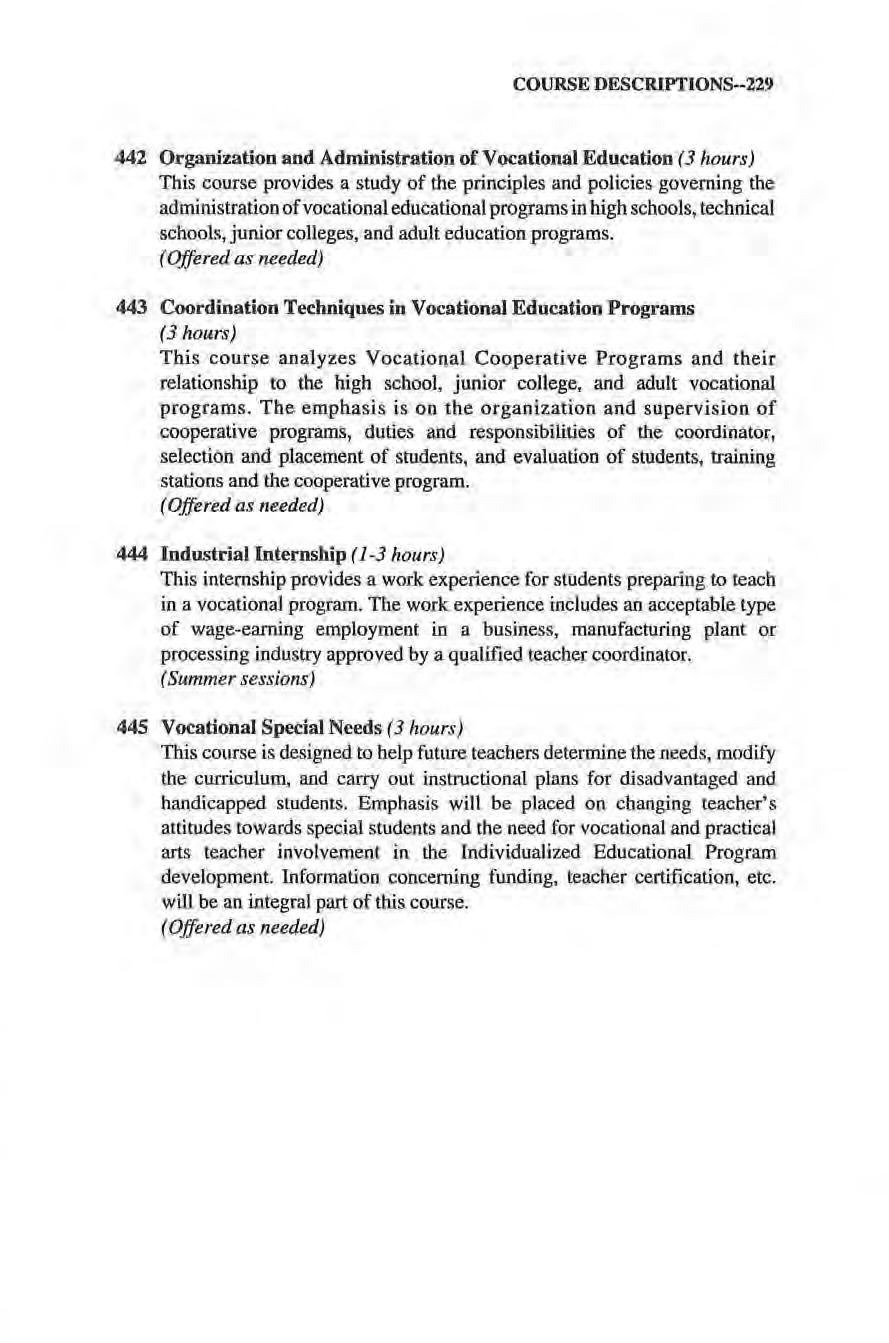
(Offered as needed)
444 Industrial Internship (1-3 hours)
This internship provides a work experience for students preparing to teach in a vocational program. The work experience includes an acceptable type of wage-earning employment in a business, manufacturing plant or processing industry approved by a q ualified teacher coordinator.
(Summer sessions)
445 Vocational Special Needs (3 hours)
This course is designed to help future teachers determine the needs, modify the curriculum, and carry out instructional plans for disadvantaged and handicapped students. Empha sis will be placed oo changing teacher's attitudes towards special students and the need for vocational and practical arts teacher involvement in the Individual ized Educational Program development. Information concerning funding, teacher certification, etc will be an integral part of this course.
(Offered as needed)
COURSE DESCRIPTIONS--22!>
Boa rd of Trus tees Of The Nebraska State CoJleges
Jeff Renner
Gera ld Conway. . .. .
L. H. "Rick" Kolkman. .. ...
· Frances Grim es
Al Gigstad .
Kath i J. S wanson
Doug Christensen, State Commiss ione r of Educatio n
Cnrrol Kra use, Execu ti ve Di rector. ..................
Emeriti
Alma Ashley ( 1946- 1970)
Clyde Barrett (1965- / 993)
Faye Brandt ( 1959 1985)
Everett Brow11i11g ( 1969·1986)
Esther Divney ( 1975- / 990)
Royal Eckert (/975- 1994)
John Hahn ( / 968·1993)
Wreathca Hicks (1968-I 985)
Lucy Hovey (]967•1972)
Don Jacobs ( 1980-1994)
Dee Jarvis ( 1948·1978)
Harold Johllson (1951-/982)
Pa ul Kruse( / 969- 1994)
Ly le McKerche r ( I 959-1990)
Ervin R. Pitts (1964- 1982)
Frieda D. Rowoldl ( 1952-1970)
Lester Rus.9ell ( /956-1995)
Leland S he rwood (1963-/993)
Scott Williams ( /966-1990)
Gil bert Wlls cm (/957-1 982)
Mo ry Ruth. Wil son ( /966 -1982)
Faculty
Professor Emeritus ofElementary Education
Professor Emeritus of English
Professor Emeritus ofLibrary Scien ce
Professor Emeritus of Journalism
Professor Emeritus ofE(lucatio11
Profe.uor Emeritus ofSpeeclt/T'heatre
Professor Emeritus of Political Science
Professor Emeritus of Engli$11
Professor Emeritus of Home Economics
Profe.vsor Emerims of Business
Professor Emeritlls ofIndustrial Ans
Professor Emeritus ofEd11cati011
AssL~ta11t Professor Emeritus of Library Science
Professor Emeritus ofMath ematics
Professor Eme ritus of Health and Physical Education
Professor Emeritus ofBusi ru;ss
Professor Emeritus of /11d1L5tria/ Tech n ology
Professor Emeritus ofArt
Professor Emeritus of Geography
Professor Emerillis ofMusic
Professor Emerit us of Eriglislt
(Date indicates year i11 which service at Peru State began.)
David Ains worth (1994)
Professor of Educario11, Chair of Ed11catio11
B.A., Kansas Wesleyan University; M A., Adams State Co llege ; Ed ,D , U niversity of Moncana
Kenneth Anderso n ( 1984) Professor ofArr
6 , O.S ., B.F.A.. M F.A., U niversity of Nebraska Omaha
Ta mara Arth aud ( / 995) Assistant Professor ofSpecial Education
B.S M.S. , University of Missouri
Kelly Asmussen (1994) Assistanr Professor ofHuman Servius
B.S. , University ofNebmska•Lincoln, M.Ed. Co lorado St ate, Ph .D., University ofNebraska-Li ncoln
Russell Beld in ( 1970) Assista/11 Professo r ofB1isi11ess
B.S. , Dakota State College; M.S., Mankato Stale College
Rooort Burns ( 199 1) Preside111_; Professor ofE11glish
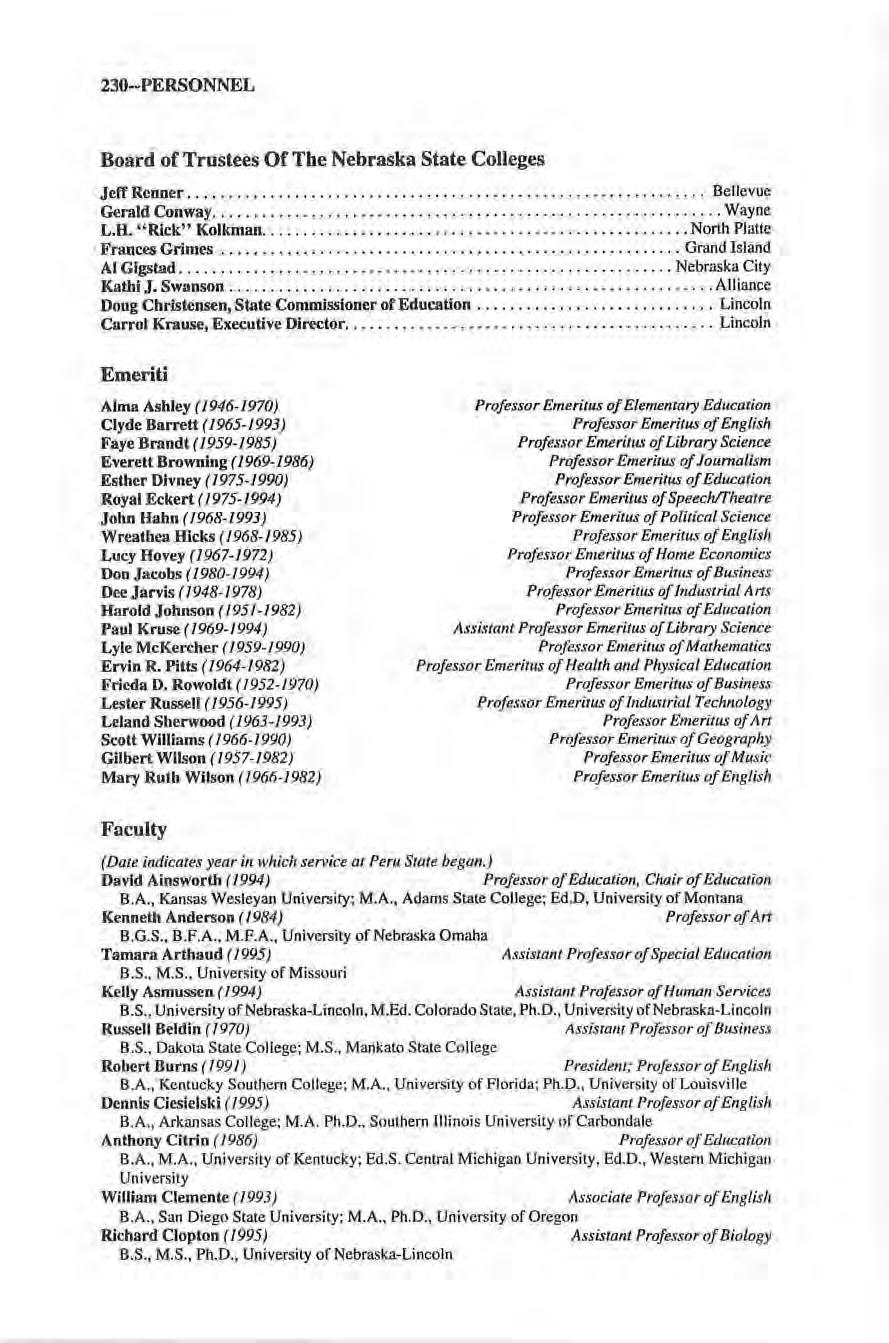
B.A., Kentucl<y Southern College; M.A. , Univer sity of Florida: Ph.D., University of Louisville
Dennis Ciesielski ( /995) Ass-istant Professo r ofE nglish
B.A, , Arkansas Co ll ege; M.A. Ph D Southern Illinois Un ive rsity or Carbondale
Antltony Citri.11 ( 1986) Professor of Educ ation
B.A., M.A., Un i vers ity of Kentucky; &1.S. Centra l Michigan Universi ty, Ed.D., Western Michigan University
Wi lliam Clemente ( /993 ) Associate Profe.isor of E11glish
8.A., San Diego State U n iver sity; M.A., Ph.D. , University of Oregon
Richard Clopton ( 1995) Assisranl Professor ofBiology
B.S.. M.S., Ph.D., University of Nebraska- Lincoln
230--P E RS ONNEL
. .......... . . . . ...... . ........ , , . . . . . . . Be
. ... ................... .
llevue
.
.. ... . . . ... .. .. . ............ . ......
.. ...
..... . ..........
Wayne
. ..... . .......... . .... ... ... . .. . . . . ...... North
.. ...
Pl atte
Grand
I sland
.•. Nebraska
City
.. ...... .. .... . .... . . ........ .. .. ... . . .... , , ......... ,
.. . ..
Alliance
. .............
...............
Lincoln
. . , ..... , ... ..
............ L incoln
Daniel Cox (1988) Associate Professor of Education
B.A., Tarlcio College; M.A., University or Nebraska-Omaha; Ph.D., University of Nebraska-Lincoln
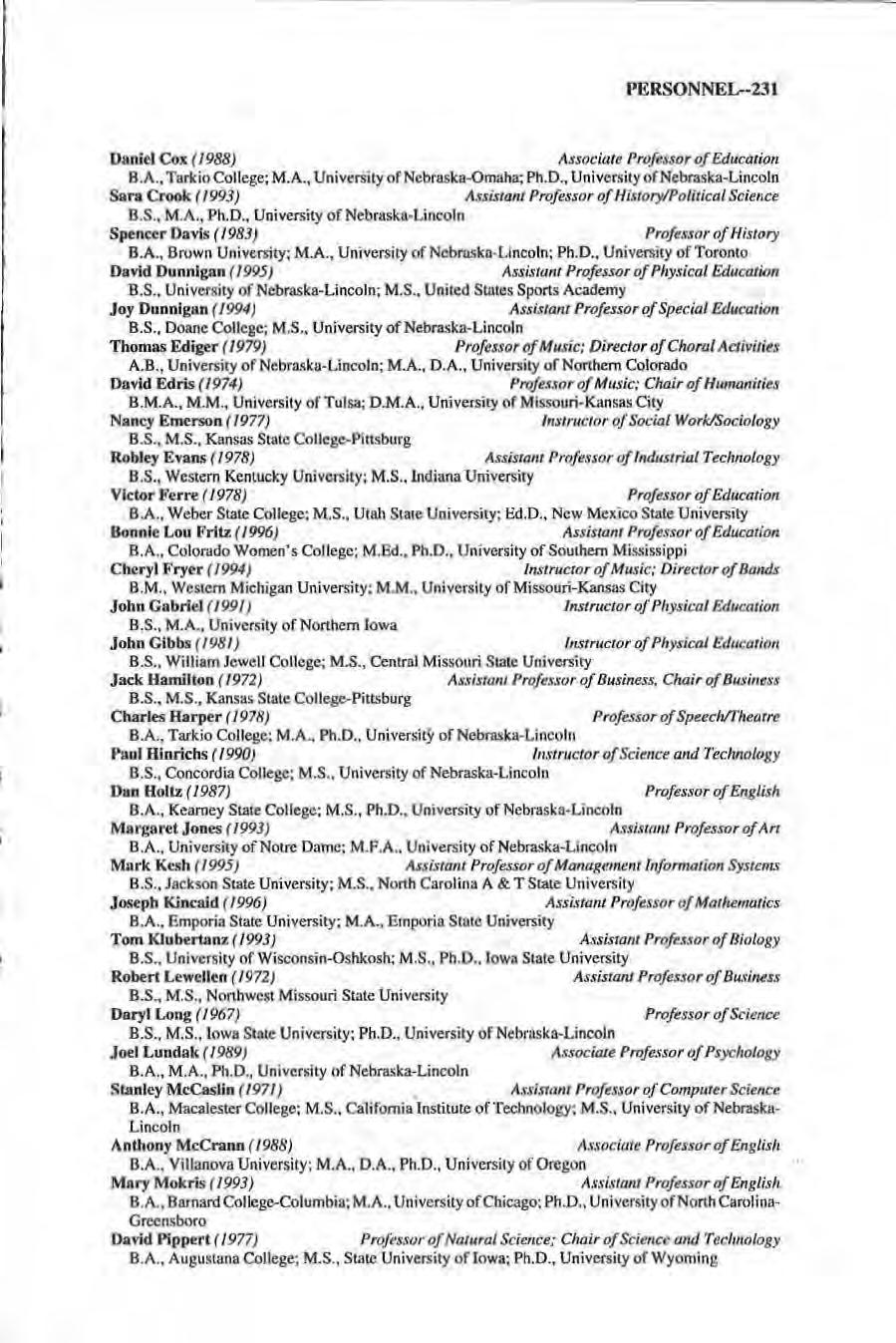
Sara Crook ( 1993) Assistant Professor of History/Political Sciellce
B.S., M A., Ph.D., University of Nebraska-Lincoln
Spencer Davis ( 1983) Professor of History
B.A., Brown Univcrsity; M.A., University of Nebrusko-Linooln; Ph.D., Univernity of Toronto
David Dunn igan ( 1995) Assistant Professor of Physical Education
13.S., Univ&sity of Nebraska-Lincoln; M.S., United States Sports Academy
J oy Dunnigan ( I 994) Assistanr Professor of Special Education
B.S., Doane College; M S University of Nebraska-Lincoln
Thomas Ed iger ( 1979) Professor of Mu sic; Director /Jf Choral Activities
A.B., University of Nebraska-Lincoln; M.A., D.A., University of Northern Colorado
Duvld Edris (1974) Professor ofM11sic; Chair of Humanities
B.M.A., M.M., University of Tulsa; D.M.A., Universicy of Mi ssouri-Kansas City
Na ncy Emerson ( 1977) Instruc tor ofSocial Work/Sociology
B.S., M.S., Kansas State Co llegc-Piusburg
Robley Evans ( 1978) Assista111 Prrlje.uor of /11dus1rial Technology
B.S Western Kentucky University; M.S l ndiana University
Victor Ferre ( 1978) Professor of Education
B.A.. Weber State College; M.S., Utah State University; tld. D., New Mexico State Un iversity
Bon nie Lou Fritz ( /996) Assistant Professor ofEducation
B.A., Colorado Women's College; M Bd., Ph.D., University of Southern Mississippi
C heryl Fryer ( 1994) Instructor ofMusic; Director ofBands
B.M., Western Michigan University; M.M., University of Missouri-J<ansas City
John Gabriel ( 1991) Instructor of Physical Ed11ca1ion
B.S., M.A., University of Northern Iowa
Joh n G ibbs (1981) f11stmctor ofPhysical £d11cation
B.S., William Jewell College; M.S., Central Missouri State University
Jack Hami lto n ( 1972) Assisra,11 Professor of Business. Chair of Busi11ess
B.S., M.S., Kansas Stale College- Pittsburg
Charles Ha r per ( 1978) Professor ofSpeeclJ/Thea trc
B.A., Tarkio College; M.A .. Ph.D .. Universit~ of Nebraska-Lincoln
Paul Hinrichs ( /990} lt1srr11ctor ofScience a11d 1'ec/1110/ogy
B.S., Concordia College; M.S., University of Nebraska-Lincoln
Dan Holtz (1987) Professor of English
B.A., Kearney Stale College; M.S., Ph.D., University of Nebrask a-Lincoln
Margaret Jones ( /993) Assista/11 Professor ofAn
B.A., University ofNotre Dame; M. P.A., University of Nebraska-Lincoln
Mark Kcsh ( J995) Assistant Professor of Ma11agement hiforma1io11 Sy.I/ems
B S Jackson State University; M.S ., North Carolina A & T State University
Joseph IGn ca.i d (1996) Assistant ProfessorofMar/iematics
B.A., Emporia State University; M.A., Emporia State University
Tom KJubertonz ( /993) Assistant Prof~ssor of Biology
B.S University of Wi sconsin -Oshkosh; M.S., PhD Iowa State University
Robert Lewellen (1972) Assistant Professor of Bu.viness
B.S~ M.S., Nonhwcst Missouri State Univers ity
Daryl Long (1967) Professor of Scierrce
B.S., M.S ., Iowa State University; Ph .D., University of Nebraska-Lincoln
Joe l L undak ( 1989) A ssociare Professor of Psychology
B.A., M.A. , Ph.D., University of Nebraska-Lincoln
Sta nley McCaslin ( 1971) A.f,1isra111 Professor of Computer Science
B.A., Macalester College; M.S California Institute of Technology; M.S., University of NebraskaLincoln
Anthony McCrann (1988) A.1·sociale Professor ofEnglish
B.A., V11Janova University; M.A .. D.A., Ph.D., University of Oregon
Mary Mok ris (1993) Assi.rta,11 Professor of English
B.A., Barnard College-Columbia; M.A .. University of Chicago; Ph.D. , University of North CarolinaGreensboro
David Pipper t ( / 97i) Professor of Natural Scie11ce; Choir ofScie11ce and Tcc l,110/ogy
B.A., Augustan a College; M.S. , State University of Iowa; Ph.D., University of Wyoming
PERSONNEL--231
Kathryn Rempp ( 1993)
Assi'stallt Professor ofEleme111a,y Education
B.A Yankton College; M.A .• South Dakota State University; Ed.S., University of South Dakota
Ca rol Ruck ( 1989) Assisrat11 Professor of Bu.ti11e.$S
C.M.A., B.S., M.S., California State University-Chico
William S nyder ( 1979) Professor of Busfness
8 .S., M.Ed., Ed.D • Un iversity of Nebraska-Li nco ln
Harry Ta bata ( 1989) Assistanr Professor ofBusiness
B A., Unive rsity of Washington; M.B.A , Auburn Univer:,ity-Montgomery
James T homas (1985) Professor ofBusiness
B.S., Wayne State University; M.A., Ph.D ., Michigan State University
Ross Ud ey ( 1988)
B.A., M. S., Wayne State College
Administrative Officers
Assistant Professor ofIndustrial 1'ec/11wlogy
Rqbert B urns(J99/) President
8.A., Kentucky Southern College; M.A., University of Fl orida; Ph.D., University of Louisville
Daryll Herseman n (1995) Vice Presideizr for Student Affairs
B A., University of Illi nois; M.A., Ph.D., Northwestern University
S usan Udey (1993) Vice President/or Admin istration aru/ Finance
B.A.• M.S., Wayne State College
Professional Staff
Barb Bender ( 1988)
B.S., Kent State University
Bob Brcazile ( /979)
Delyn Clifton ( /993)
B.S., Peru State Co llege
Linda Estes ( I 994)
B .';,., Peru State College
Assi.stam to Director of Co111i11ui11g Educarton
Facilities Manager Progra111mer/A11aly.rt
Health Center Director
Ron Fabry (1986) Director ofPhysical Plam
F ra nk Ferrante (199J) Direczor ofDevelopme111a/ StudieJ
B.S., Unive rsity of Nebraska-Omaha; M.A., Appalachian State University
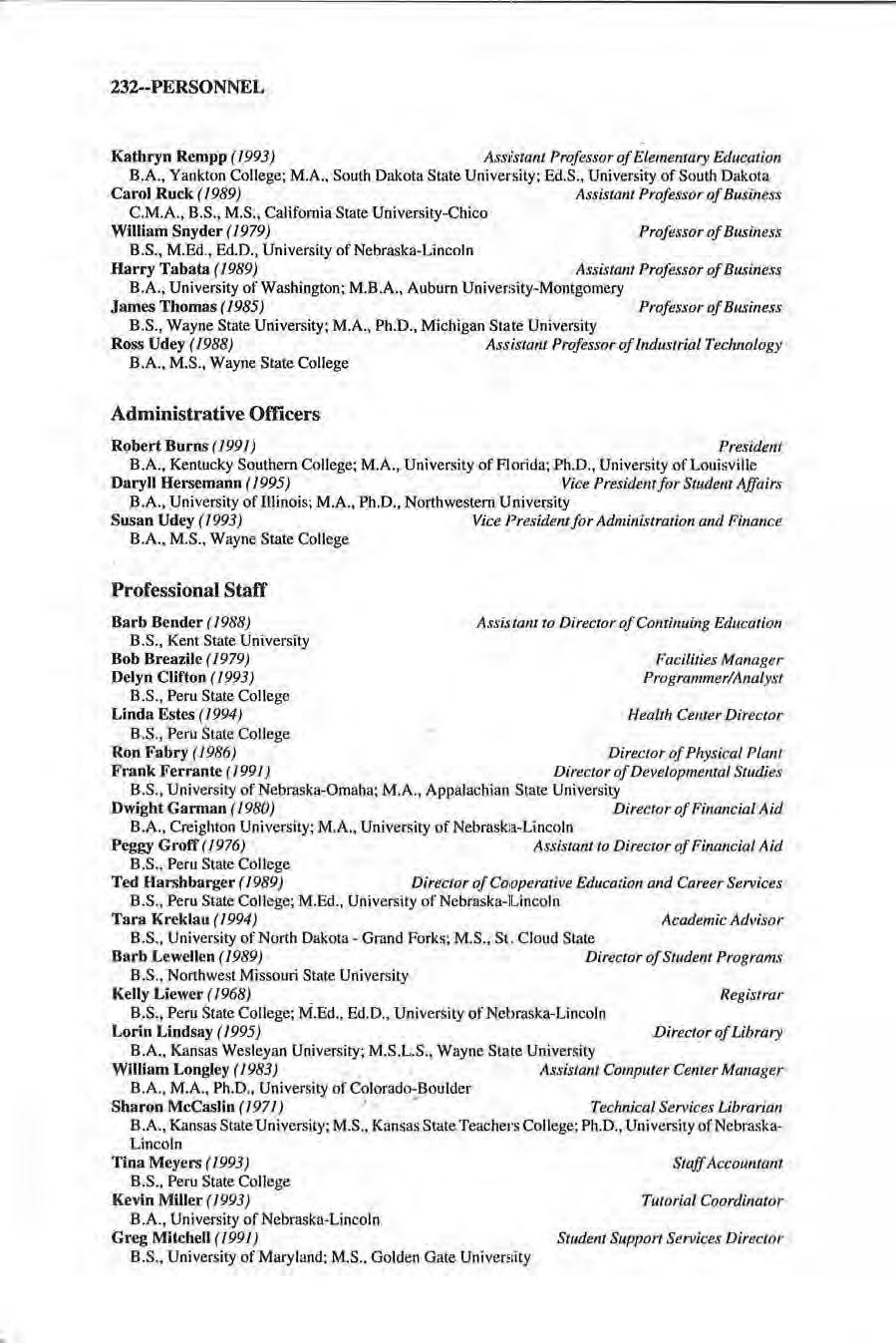
Dwight Cannan ( 1980) Director of Fi11nncia/ Aid
B.A., Creighton University; M.A., University of Nebraska-Lincoln
Peggy Groff (1976)
B.S., Peru State College
Assistant to Director of Financial Aid
Ted Harshbarger (1989) Director of Co,operative Education and Career Services
B.S., Peru State College; M.Ed. , University of Nebraska-Jl..inco ln
'l'ara Krcklau ( 1994) Academic Advisor
B.S., University of North Dakota- Grand Forks; M.S , St. Cloud State
Barb Lewelle n ( 1989) Director ofSwdem Programs
B.S., Northwesr Missouri State University
Kelly Liewer (1968)
8.$., Peru State College; M.Ed., Ed.D., University of Nebraska-Lincoln
Lorin Lindsay ( 1995)
B.A., Kansas Wesleyan University; M.S.L.S., Wayne State Unive rsity
William Longley ( /983)
B.A., M.A., Ph.D., University of Colorado-Bou lder
Sharon McCaslin ( 1971)
Registrar Director ofLibrary
Assistant Computer Center Manager
• • Technical Services Ubrarian
B.A., Kansas State University; M.S., Kansas State Teachers College; Ph D., University of NebraskaLincoln
Tina Meyers (1993)
B.S Peru State College
Kevin Miller (/993)
B.A., University of Nehraska•Lincoln
Greg Mitchell ( 199I )
B.S., University of Mary la nd; M. S • Gold en Gate Un iver11ity
Staff Accountallt
Tutorial Coordinator
S111de,it Support Services Director
232--PERSONNEL
James Mulder (1984) Reference libraria11
8.A., Northwestern College; M.A., University of Iowa
Jul.lo Pcny ( JM6) Coordu1ator for Cooperative £ducalion and Career Services
B.S., Peru S tate College
Kent Propst ( I 983) Director of College Adva,11:eme11t
B.S , Peru State College
Bev Ramsey (1991) Person11e/ Specialist
B.S. , Peru Stale College; M.S. University of Nebraska-Lincoln
Nancy Reeves ( 1974) /,rsti/Uliona/ Research Specialist
David Ruenholl (1993) Director of NBDC
B.S M.B.A , University of Nebraska- Li ncoln; B.S., College of St. Mary-Oma!Ja
Erin Sayer ( 1992) Director of Reside11ce Ufe
B.S., Peru State College; M.Ed., University of Nebraska-Lincoln
Donna Simon ( 1995) Admissio11s Counselor
B.A. , Western Washington University; M.A., California State Univei:sity-Northridge
Steve Sims ( 1994) Programmer/Analyst
B.S Peru State College
Robert Smallfoot ( 1996) Director of Continuing Educatfo11
B.S., M.S., Ph.D., University of Nebraska-Lincoln
Dick Strittmatter ( 1995) flead Football Coach
B.S., Western lllinois University
David Teske ( 1995) Director of Intramural:, ll.A. Simpson College
Pam W i lliams ( 1989) Student S11gpon Services Intervention Coordillato,. B.S., Peru State College
Support Staff
Phyllis Adams
Carolyn Allgood
Alma Anthony
Jolene Block
Deb Breazj[e
Jerry BreazUe
Carolyn Bredemeier
Daniel Bridgewater
Cynthia Campbell
Yvonne Chandler
Arden Chapin
Nancy Cooper
Phyllis Davis
Barb Edmonds
Malinda Edris
Janice Ellner
Kelly Furnas
Lisa Gebers
Barb George
.Janet Hawley
Nancy Hawley
Jerry Henrichs
Bonnie Henzel
.lulicHopp
Bob Judd
Connie Kearney
Eldo11 l{jstncr
Thelma Liewer
Gloria Lini nger
Charlotte McComas
Connie Moody ·
Registrar's Offic e Ubra1y
Cooperarive Educatio11/CareerServices Office
Business Office • Payroll
Cl!StQdial leader
ln.venlory
PSC F()undation Office
Building & Grounds Atlendcmt
Athletic Office/Physical Education Office
Complller Cen/er
Admissions Office
Physical Pla111 Office
Registrar's Office
Cusr,1dia11
Vice President Student Affuirs/Rcside11ce Life Office Education Office
Cusrodia11
Co111in11i11g Educalion Office Library
Science a11d 1'«hnology Office
811siness Office• Accounts Payable Custodian Library
Vice Presidefll for Administration and Finance Office

Maimena11ce Forema11
Vice Presidelltfor Academic Affairs Office
Carpente r
811si11ess Office
Admissions Office
Cus1odia11
Communications Servi ces
PERSONNEL--233
Linda Moody
Cindy Moran
James Rey nolds
Jim Ro bbins
Marily n S ayer
J eanne Sch izas
S ue Sede rs ten
Do nna S heph erd
Tim S pa ngle r
Gary S tap les
Linda S taples
Nanc y S trit tmatter
Gerald Stuc k
Grace Stuck
Ko ri Stuthe it
Dixie Teten
Kathy Tynon
Kath y Volkm er
Jackie Willi ams
President'., Office
Swde11I S upport Services
Build ing and Grounds Auendanl
C1is1odian
Post Office/Switchboard
Career Services/Cooperative Education Office
Economic Deve/opme11t/NBDC/Co11ti1111ing Education Offices
Custodia/I
Electrician
Gro1111dskeeper
Business Divfaio11 Office
Vice President/or Student Affairs Office
Building and Grounds Attendant
C11stodia11
C11stodian
Computer Operator II
Brtsiness Office - Cashier
Industrial Technology Office
College Advancement/Vice President for Academic Affairs Office

234--PERSONNEL
Index
·A·
Academic Appenl
Academic Bankruplcy
Academic Calendar •
Academic Credit
Academic Dishonesty
Academic Probation
Academic Progres.5 Sheet
Academic R~q uirements for Financial Eligibility
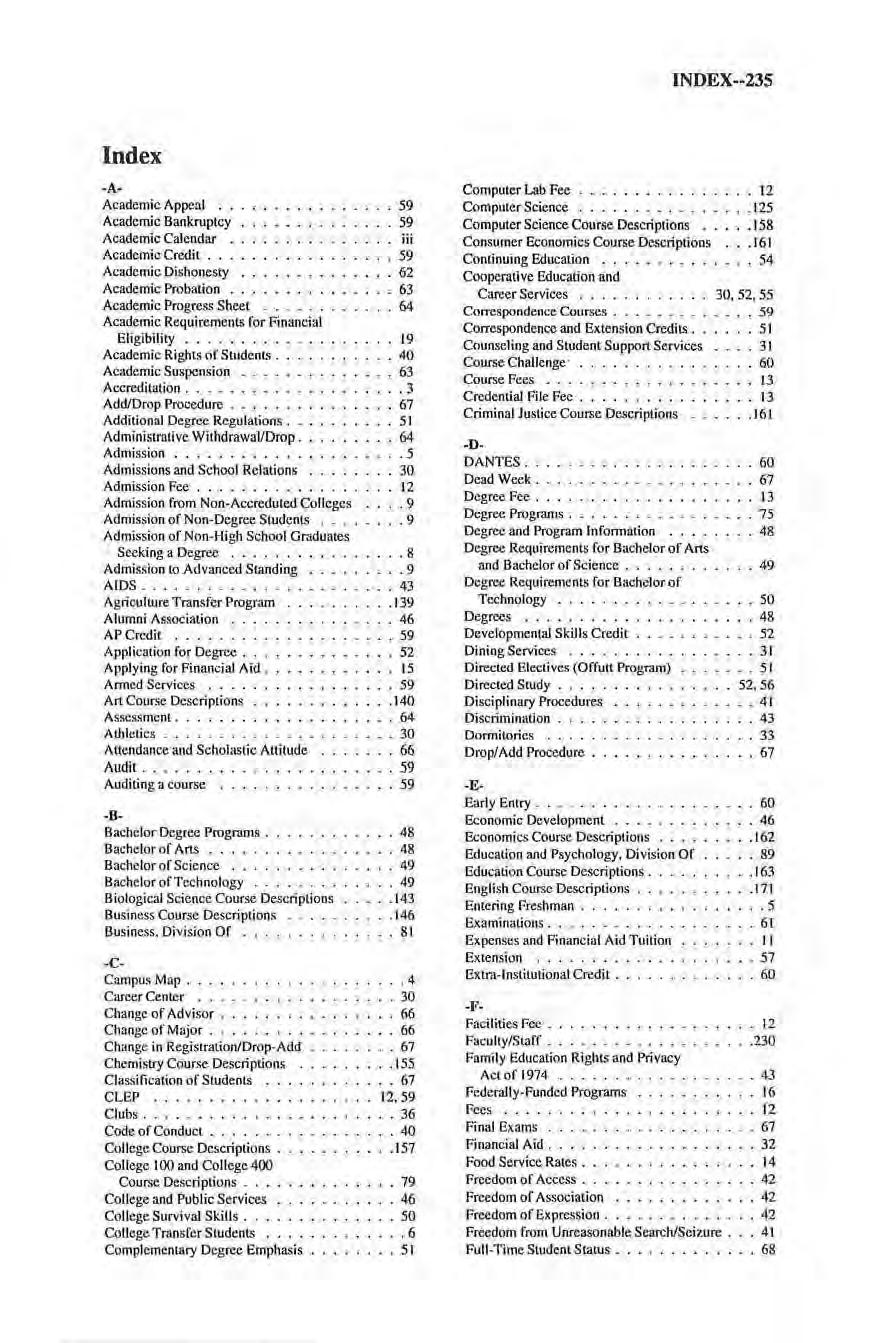
Academic Rights of StudenL~
Acade mic Suspension
Accreditation . . . • . . • . . .
Add/Drop Procedu re
Addition•I Degree Regulations
Admin1stralive WithdrawaVDrop.
Admission ,
Admissions and School Relations
Admission Fee ,
Admission from Non •Accredulcd Coll eges
Admission of Non-Degree Students ,
Admission of Non-High School Graduates
Seeking a Degree . . . . . , .
Admission to Advanced Standing
AIDS. , ,
Agrioulture Transfer Progr.tm
Alumni Association . .
APCrtdil
Applicntiun for Degree •
Applying for Financial Aid
Armed Services
Art Course Descriptions
Assessment
All1lclics , Attend3nce and Scholastic Auitude
Dining Services
Directed 81cc1ives (Offutt Progr3111)
Directed Study
Disciplinary
Drop/Add Procedure .
-F-
Audit. Auditing
course -DBachclor Degree Programs Bachelor of ArtS
Bac helorof Science Bac he lor ofTcchnolQgy Biological Science Course Descriptioos Bus,ness Course Descripdons Business. Division Of ....... . -CCampu~ Mnp. Career Center Change or Advisor Change of Mnjor Change in Registra1ion/DrQp•A<ld Chemlsll)' Cour~e Description~ Classification or Students CLEP Clubs ,
Code of Conduct College Course Descriptions College HJO and College400 Course Descriptions , College and Public Services College Su rv ival Skills College Transfer Sludenls Complementary Degree Emphasis 59 . 59 jjj 59 62 63 64 19 40 63 .3 67 51 64 .5 30 12 .9 .9 8 .9 43 .139 . 46 , 59 52 , 15 , 59 .140 • 64 30 66 59 5.9 48 48 49 49 143 146 . 81 ,4 30 66 . 66 67 .155 • 67 12,59 36 40 .157 79 46 50 .6 51 INDEX--235 Computer Lab Fee , Conlpuler Science Computer Science Course Demip1ions Consumer Economics Course Descriptions Continuing Education CQOpcrative Education and 12 125 158 . 161 54 Career Services . . . . . 30, 52, 55 Corres pondence Courses ._Correspondence and Extension Credits Counseling and Student Support Sarviccs Course Challenge · Course Fees , • Credential File Fee Criminal Justice Course Descriptions
DANTl,S
Degree Rcquireme nu; for Bac helor
and
Degree Requirements for Bachelor of Technology . , . . . . . . Degrees
a
•
. ,
-D·
. Dead Week. Degree Fee. Degree Programs , Degree and Program Information
or Arts
Bachelor of Science
, , Developmental Skills Credit
Procedures Discrimination > • • Dormitories
and Psychology, Di vision Of EduC3
Course Descriptions Engli.sh Course Descriptions Entering Freshman , Bxaminatio11s • • • Expenses and Financial Aid Tuitio n Ex1ensio11 , Extra-Institutional Credit
-EEarly Entry , > • Economic Development Economics Course Descriptions Education
tion
Financial
Facllities Fee Facully/St;lff • Family Education Ri ght~ and Privacy Act o f 1974 , Federally-Funded Programs r-ces Fim~ Exams
Aid
Food Service Rates
Ex pr"l!sion Freedom from Unreasonable Sean:h/Seiwre Full-Time Studont Status . . . . . . . . . . . 59 51 31 60 13 13 161 60 67 13 . ,5 48 49 50 48 • 52 , 31 , 51 52,56 • 41 43 33 67 . 60 46 .162 . 89 .163 .171 5 61 II • 57 60 • 12 .230 • 43 16 12 67 32 14 42 42 42 41 68
Freedom of Access . Freedom of Association Freedom of
Philosophy
Physical
Descriptions

Physics
Polilical
Pre--Pmfcssio
236--INDEX -GGeogrnphy Course Descriptions Geology Course Descriptions General Science Course Description• General Studies Generd! Studies and Major , Goals of tile College Grade Point Average Gradi ng System Graduate Studies Graduation Honors G-rnduation Requireme nts HHeallh Ce nter . . _ Health Center Fee History Course Descriptio ns . . History of the College •. Honorary Soc ict.lcs •. Honors List. Honors Prog111n1 .178 .180 .176 71 49, SI 3 49, 51, 64 68 57 69 , 48 , 35 12 .181 I 38 69 Course Descriptioa s • Housing Housing a nd Food Service Contracts Housing and Food Service Refunds • Housing Rates _ • ..•.. .78, 184 14, 15, 52 14 How to Detcnninc Credit •... Humanities Course Description, Humanities, Division Of .,. Incomplete Coursework Indcpendcnl Study • Index of Buildings lndustrinl Technology Course Descriptions Instituti onal Bxaminations JnstiMionally-Fundcd Programs . International S tudent Admission lntmmurals and Recreation , lnternat ional S tudcnis • • Internshi p lntro<tuction to Peru St.ate ·JJournalism Course Descript ions ·LL.ale Registrati on Fee • La te Tuition Fee . • _ . _ Li hr;u-y and f ns tructionru Services Center Louns -M• Majors • _ Major Grade Point Avc,age Mnnagcmcnl Course Descriplions Malhcmatics CouM D~scriptions Medical Technology . Memberships and Accreditati ons Mid-year Admissions Minors Mission of the College Motor Vehic le Registra1ion Music Cou rse Descriptions • • -N• • 15 15 . 60 186 .103 60 52. 57 .4 .186 61 • 17 • . 7 , 32 .7 57 .] 192 • 13 13 _ 47 15, 16 75 ,49, 51 •.•J94 196 .J38 ••. 3 9 - • 75 '2 13 .201 Nebraska Business Development Cente r . 46 Nebr~~ka Resideucy Regulations ror Tu11ton. II Newspaper Notification of Admission
Off-site L<x.-ations
Extension Progmms Orien1a1ion
Sources of
Oulcomes Assessmenl Overload
Parking PEP
Curriculum Guide
Peru State
Petition Philosopby
0Off-<:ampus Serv ice Fee
Offuu
Other
Financial Aid ..
.p.
Personal
Pen,, Slate Cred its
Times
•
Course Descripllons
Education Cour.;c
Course Descriptions
Course De.~criplions
S cienoc
nol Programs
and Pre-Mcdicru Pre-Dental Hygiene , _ Pre-Engineering Pre-Forestry Pre-Mortuary . Pre-Nursing Pre-Optoinclry , Pre-Osteopathic Medicine Pre-Pharmacy Pre-Physical Tiierapy _ • Pre-Physician Assis1ant Pre-Podiatric Medicine
ialion Science Technology Pre-Respiratory Therapy Pre-Veterinary Medicine
Music Lessons Probation .. .. ..... . Profossional and Social Organizations Professional School Residen ce CredilS Progress ShCCI Psychology Course Descriptions Publications Fee Readmission . Refund Policy Reg istration Repeat Co urse 39 10 13 54 54 32 18 69 69 45 61 73 4 9 39 69 .208 .208 .208 .213 .214 .• 57 , 131 .132 .132 .132 .133 .133 134 .134 . • . 135 .135 .136 196 136 .137 .137 13 69 36 • 52 • 69 .216 12 9 13, 14. 15 67 Repla0emen1 I.D. Card . . • . . . Residence Halls and Living Acoomodations Residence Hall Regulalions • 61 12 32 42 Re.<ridency RcquircmenlS Residen t Credits . . , Room Deposit Refu nd .5. Scho lan;hips Science-& Technology , Division of "Seamless TrJnsfer" Second Unde rgrad uate Degree Selecting a Major • Senior Competencies . . . . . . . II 49 15 . 19 120 .. 7 52 69 65
Pre-Dental
Pre-Rad
Priv~le
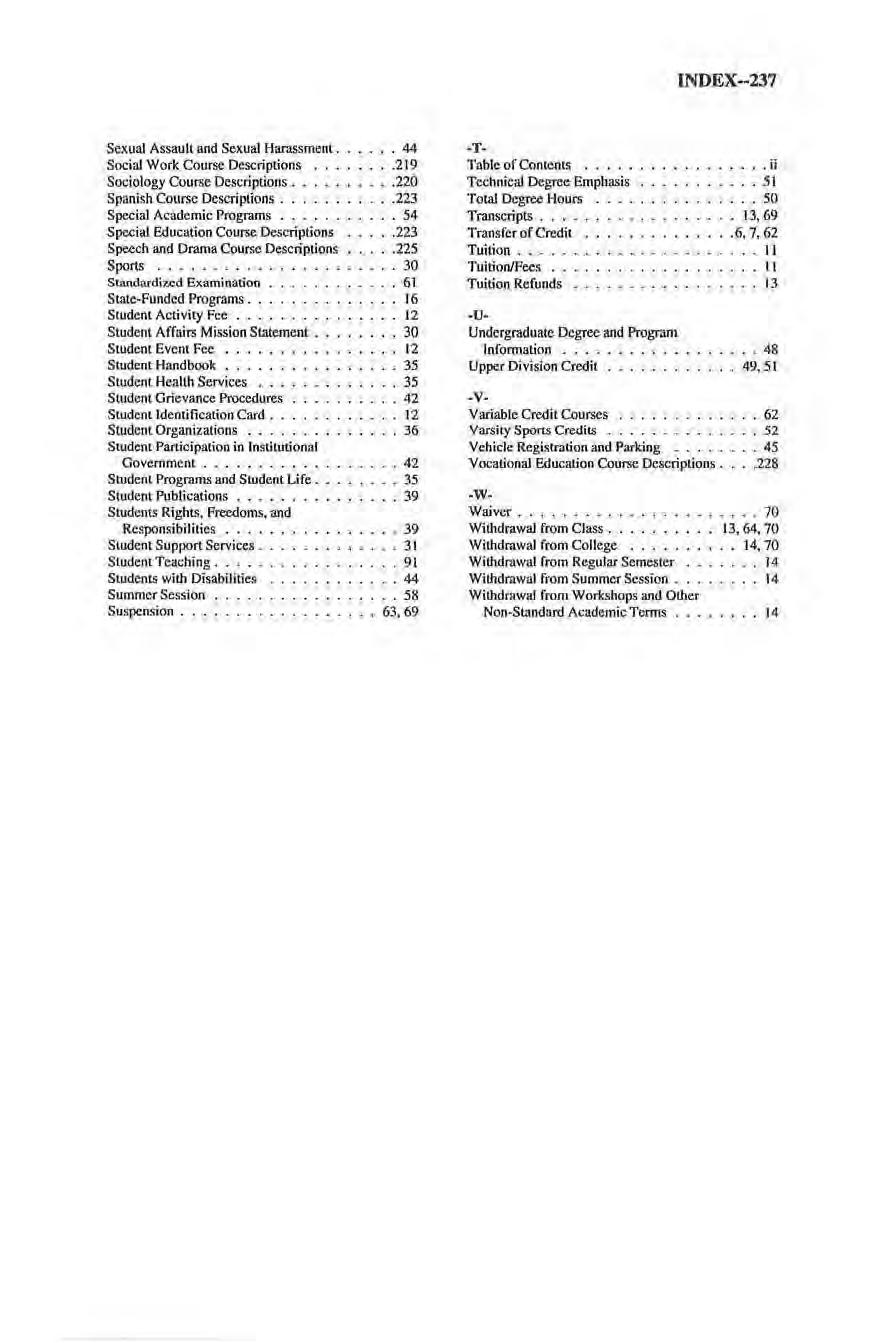
Assault and
Harassment. Social Work Course Descriptions Sociology Courae Descriptions • Spanish Courae Descriptions Special Academic Programs Special Education Course Descriptions Speech and Drama Course Descriptions Sports .... ..• ... Slafldardi1..od Examinalion S~1tc-Funded Programs S1udcnt Activity Fee Student Affaira Mission Statement Student Even, Fee . • • SludentHandbook • Student Health Services Student Grievance Procedures Student Jden1ilica1ion Card • Student Organizations Student Participa1ion in lnstitutiorml Government Student Programs and Student Life Student P\Jblic~tions • • Students Rights, Freedoms. and RcspoMibili1ies Student Support Services • Studem Te~ching • •. Students with Disabilitic.• Summer Session Susvension . . . . . . . 44 219 .•.220 223 54 .223 .215 30 61 16 12 30 12 35 35 42 12 36 42 35 39 . 39 31 91 44 58 63,69 INDEX--237 -T• Table of Contents Technical Degree Emphasis Tolal Degree Hours 'Transcripts Transfer of Credit Tuition ,. ..•. Tuition/Pee.~ Tuition Refunds .u. Undergraduate Degree and Program lnfonnation Upper Dlvision Credit .y. Variable. Credit Coul1>CS Varsity Sports Credits ..•.. , Vehicle Regislration and Parking Vocational Education Cour"e Descriptioas .w. ,ii 51 50 13, 69 .6, 7, 62 Ji 11 13 • 48 49, 51 62 . 52 45 .228 \Vaivcr , 1 • • , Withdrawal from Class , 70 13, 64, 70 Withdrawal from College Withdrawal froon Reg ular Semester Withdrawa l from Summer Session Withdrawal from Workshops and Oilie r Non-Standard AcademicTenns 14, 70 14 14 14
Sexual
Sexual
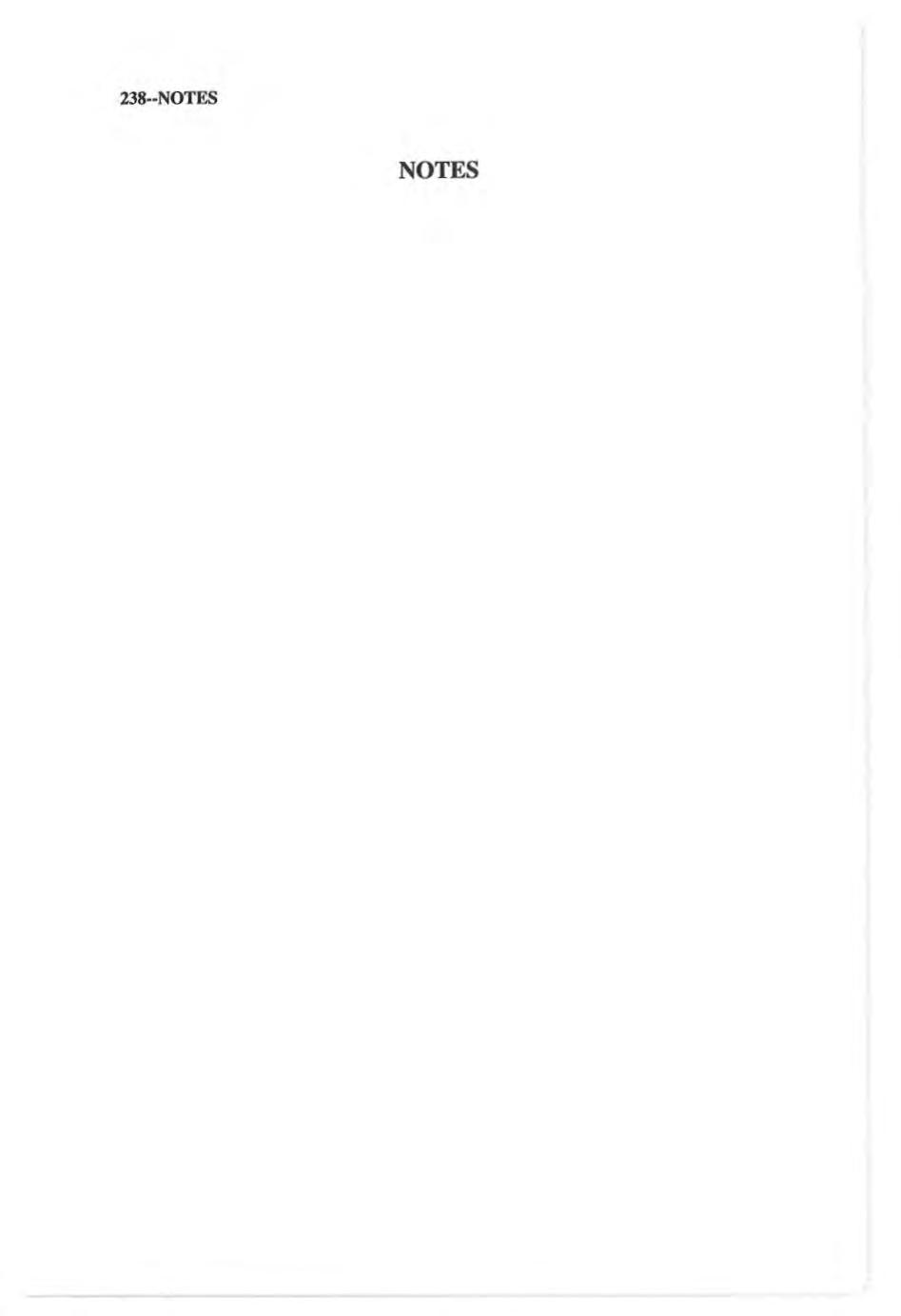
238--NOTES
NOTES
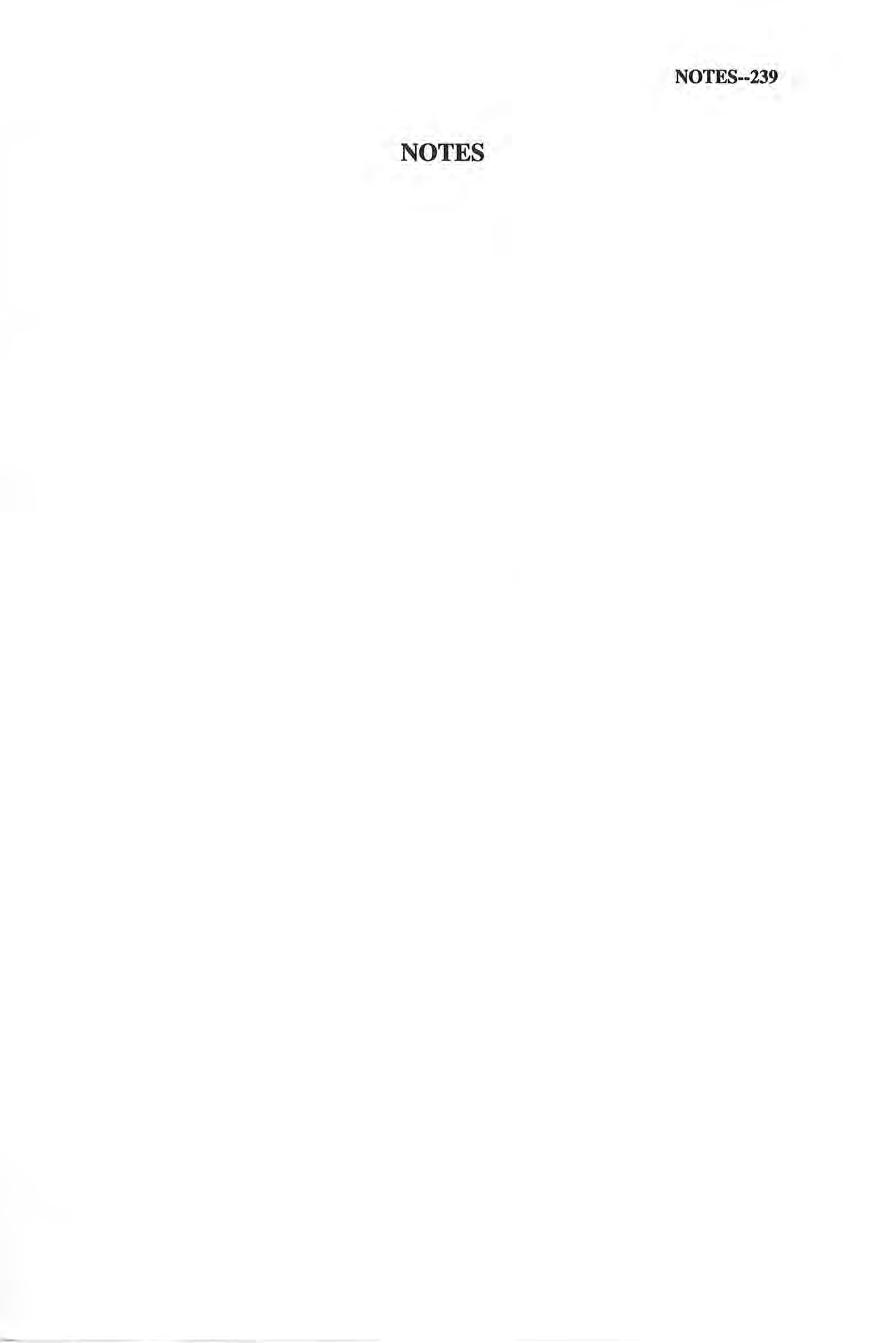
NOTES-- 239
NOTES
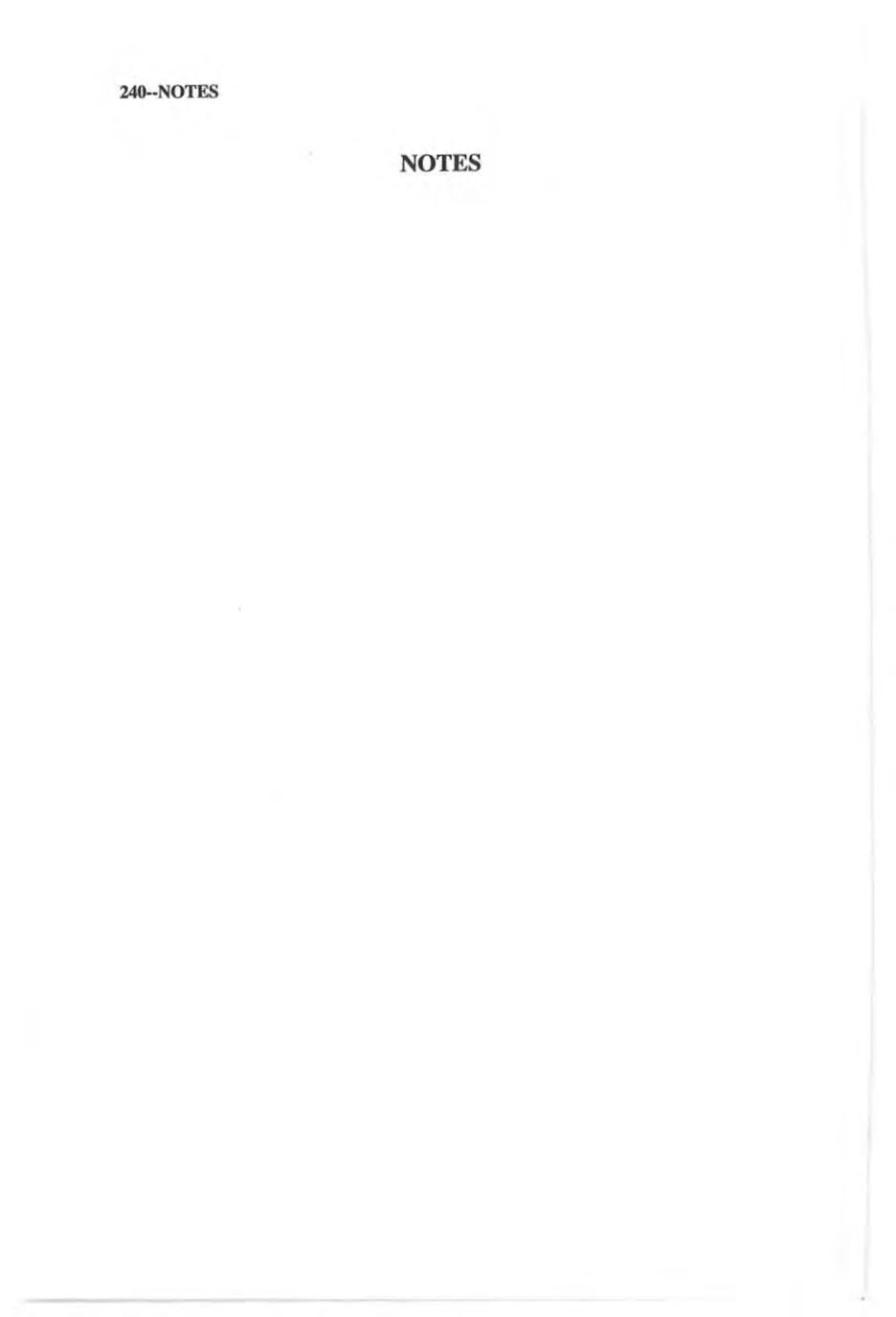
240--NOTF.S
NOTES


























































































































































































































































